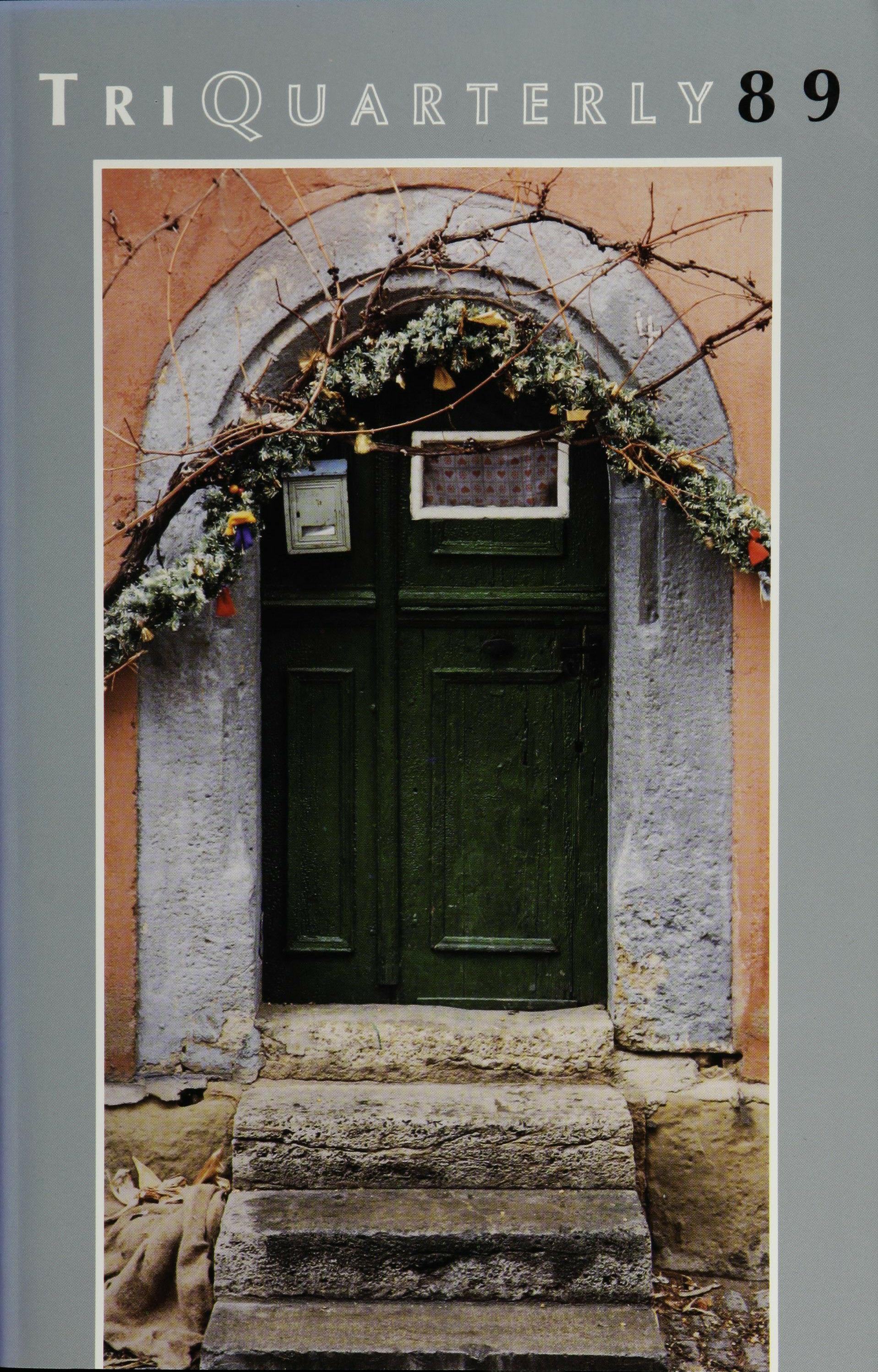
• IL Wi 89
Publication of TriQuarterly is made possible in part by the donors of gifts and grants to the magazine. For their recent and continuing support, we are very pleased to thank the Illinois Arts Council, the Lannan Foundation, the National Endowment for the Arts, the Sara Lee Foundation, the Wendling Foundation, and individual donors. Major new marketing initiatives at TriQuarterly have been made possible by the Lila Wallace Reader's Digest Literary Publishers Marketing Development Program, funded through a grant to the Council of Literary Magazines and Presses.
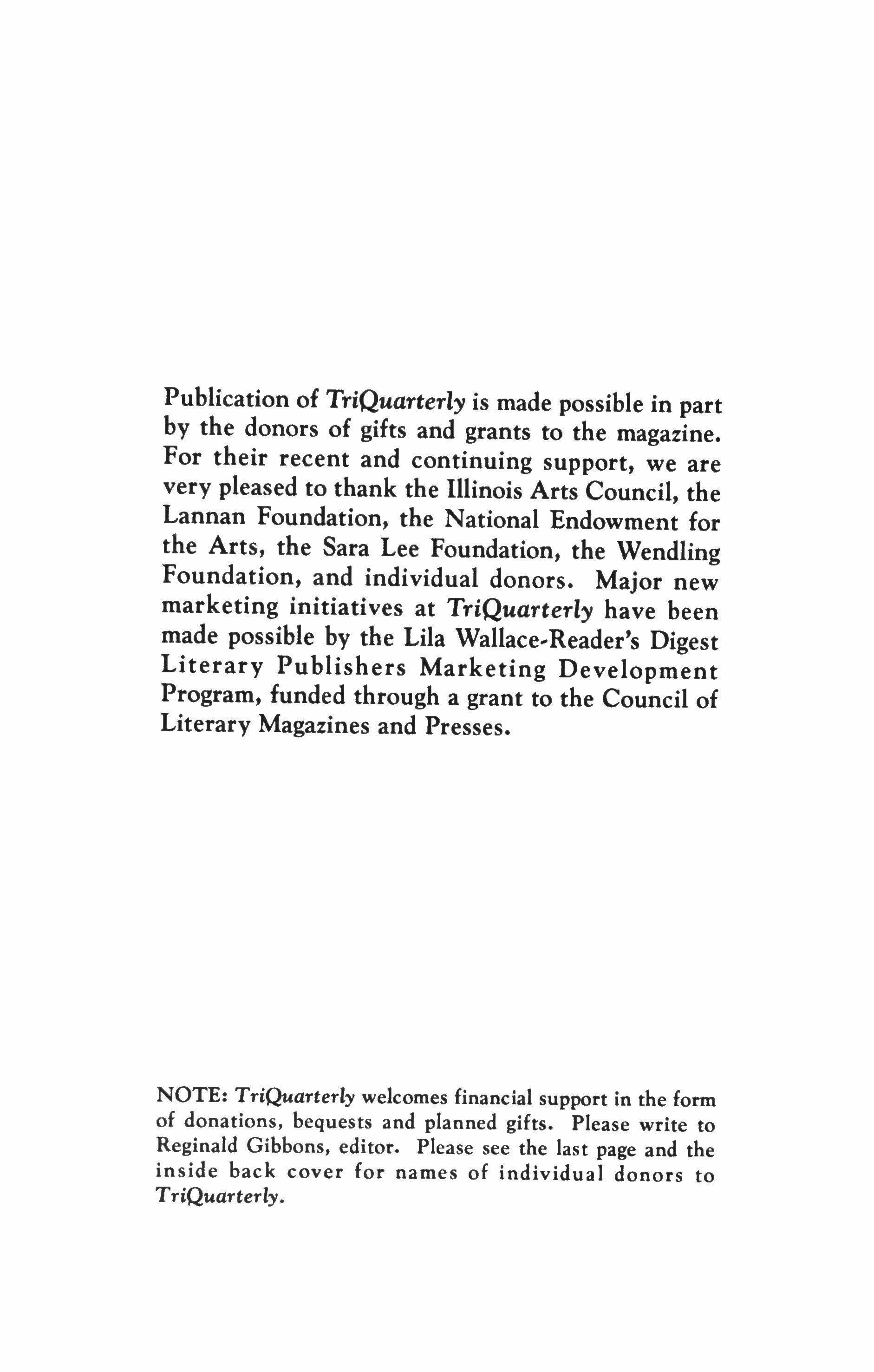
NOTE: TriQuarterly welcomes financial support in the form of donations, bequests and planned gifts. Please write to Reginald Gibbons, editor. Please see the last page and the inside back cover for names of individual donors to TriQuarterly.
Please sign me up for:
o a two-year subscription for $36.
o a one-year subscription for $20.
Foreign subscribers please add $5per year.

Please begin my subscription with issue#
SUBSCRIBE TO TRIQUARTERLY!
Please sign me up
o
Please
SUBSCRIBE TO TRIQUARTERLY!
life
Name Address Or call US toll-free at 800-832-3615 to charge it! BI89
o a
subscription for $500. o $,_____ enclosed. 0 This is a renewal.
for:
a two-year subscription for
one-year
for
$36. o a
subscription
$20.
Foreign subscribersplease add $5peryear.
my subscription
issue# o a life subscription
o $. enclosed.
is
renewal. Name Address Or call US toll-free at 800-832-3615 to charge it! GIVE TRIQUARTERLY! o $ enclosed. Buy your first TriQuarlerly gift subscription for $20, and each additional gift subscription costs only $17!! 1st gift subscription ($20) Name Address Gift-card message Add $5/year forforeign subscriptions. BI89 Name Address 2nd gift subscription ($17) Name Address Gift-card message BG89
begin
with
for $500.
0 This
a
TriQuarterly
NORTHWESTERN UNIVERSITY
2020 RIDGE AVE.
EVANSTON, IL 60208-4302

TriQuarterly
NORTHWESTERN UNIVERSITY
2020 RIDGE AVE.
EVANSTON, IL 60208-4302
TriQuarterly
NORTHWESTERN UNIVERSITY
2020 RIDGE AVE.
EVANSTON, I L 60208-4302

SPRING 1994 BOOKS and backlist
WILLIAM GOYEN
Arcadio
Completed while he was dying, William Goyen's Arcadio is one of the most affecting and imaginative farewells to life ever written.
Arcadio, whose voice is inimitably Goyenesque, is a creature from beyond the normal walks of life.
Half man, half woman, raised in a whorehouse and for years the veteran exhibitionist of an itinerant circus sideshow, he has escaped from the show and has been wandering in a quest for his lost family. Speaking intimately and secretly to the reader, he tells the bizarre and fantastic tale of his life.
This unforgettable and unique novel is the crown of Goyen's exploration of the forms and feelings that could be compassed within the story and the novel. As memorable as The House of Breath, Arcadio is returned to print as the first in the TriQuarterly Books reprinting of all of Goyen's work. In addition, the University of Texas Press will publish in 1994 a selection of Goyen's letters, in effect a landmark autobiography of a writer's career in America from the end of World War II to the 1980s.
[Arcadio] virtually pulses with life; it is both audacious and wise; a timelessfable that manages to be boldly contemporary as well.
-JOYCE CAROL OATES

June 1994
53/4 x 9 inches /147 pages $12.95, paper (0-8101-5006-9)
WILLIAM GOYEN (1915-83) was one of the most innovative American writers of fiction. Read and acclaimed abroad, while remaining too little-known at home, his work has nevertheless found a loyal following in readers whose understanding of themselves, of inner life, and of the novel itself, has been transformed by his first novel, The House ofBreath (1950), and who have been entranced and astonished by his short stories. In addition to reprinting Arcadio, TriQuarterly Books/Northwestern University Press is publishing Halfa Look of Cain (see next page).
Hal a Look 0 Cain:A Fantastical Narrative
I uJas tu1enty uhen IfollauJed aUJayfrom my toum a trapezefamily, aerialists, a grOZJp ofbeautiiu!unngedpeople, mother,fatlzer, son and daughter. Tlzey uJere the Islzbels
Chris, whose leg is injured, and his lover Stella, with whom he lives in a ruined, abandoned house; Chris's male nurse; Marvello, the circus aerialist; a lighthouse keeper; a flagpole-sitter in smalltown America these are the creatures of William Goyen's visionary fable of love, lust and loneliness. Half a Look of Cain: A Fantastical Narratioe was written in the 1950s and early 1960s, and is now being published for the first time.

June 1994
5 3/4 x 9 inches / 220 pages
$22.50, cloth (0-8101-5031-X)
Part fable and part rhapsodic exploration of desire and loss, Halfa Look ofCain bears Goyen's unmistakable artistic signature on every page. Too far ahead of its time in its swirling visionary structure and treatment of sexuality, this novel was rejected by Goyen's first publisher as not sufficiently conunercial and remained unpublished. Constructed of episodes like short stories (Vance Bourjaily, in the New York Times Book Reoieio, described Goyen's stories as "among the great short stories of the cen '), this novel is shaped as a group of "medallions," as he called them a series of related episodes. It dreams of defying mortality as if living in the air, like the aerialists or the flagpole sitter and of findingperfect companionship in lover and friend. The novel is a celebration of passion and a cry against the conformity and suppressed emotions of the 1950s.
III. (/1 "'" I�IIII -'III """"" "" fIt, "'1;",,1 _��llf'
PRAISE FOR CAROL FROST'S EARLIER WORK:
These are poems ofstaggering strength, unuieldingpower and elusive beauty. This is a book with vision andform.
Pure is a fierce, passionate series of meditations on experience and consciousness, morals and customs, and on the natural world that surrounds and shapes human life. Frost's poems bear the stamp of a thoroughly original artistic vision and style they are discursive yet filled with concrete images; they inquire into moral issues (responsibility, pleasure, guilt, jealousy) without moralizing; they catch the echoes of western myths in domestic and quotidian events; they sharply diagnose relations between the sexes,

April 1994
51/8 x 7 inches / 64 pages
$26.95, cloth (0-8101-5029-8)
$10.95, paper (0-8101-5004-2)
CAROL FROST has published five books of poems since The Salt Lesson (1976), including Chimera, which was a runner-up for the Poets' Prize in 1990. Her work has appeared in the Atlantic, American Poetry Review, Antaeus, Partisan Review and other magazines. She is a two-time recipient of an NEA Fellowhip and is Writer-in-Residence at Hartwick College. She has also taught in the MFA Program for Writers at Warren Wilson College, the Breadloaf Writer's Conference, the Vermont Studio Center and elsewhere. She lives in upstate New York with her husband, the poet Richard Frost.
Pure
-CHOICE
ulele
usic • Perduta Gente
'I'his double volume of poems is the first U.S. publication of one of the most important and exciting contemporary English poets. ''There is nothing safe about Peter Reading's work," one reviewer has written, and a storm of letters to the London Times and the Times Literary Supplement, attacking and defending Reading's work, have made him the most controversial English poet of the age. Rarely has any poet's work elicited such passionate responses, but even more rarely has any poet found a way to address the most appalling and dispiriting aspects of life with such astonishing artistic virtuosity, bitter humor and disconcerting honesty.
Ukulele Music (1985) is a narrative of violence that ranges from urban London to Patagonia, and finds its way to "Not Caring/Hopelessly Caring." Perduta Gente (1989) is an intense depiction of the pathos and ironies of urban frenzy, squalor, money and power, complete with a variety of visual textures-> including newspaper clippings, handwritten notebook pages, typed memos, a scientific table and an advertisement.
These two book-length poetic collages are Reading at his besteach shapes the chaos and sadness of life by means of an exquisite craft that draws on poetic resources and forms from the contemporary to the ancient.
PETER READING was bom in 1946. His poetry has won numerous prizes, including a Lannan Foundation Fellowship and the Whitbread Prize. He has published more than a dozen works in England.
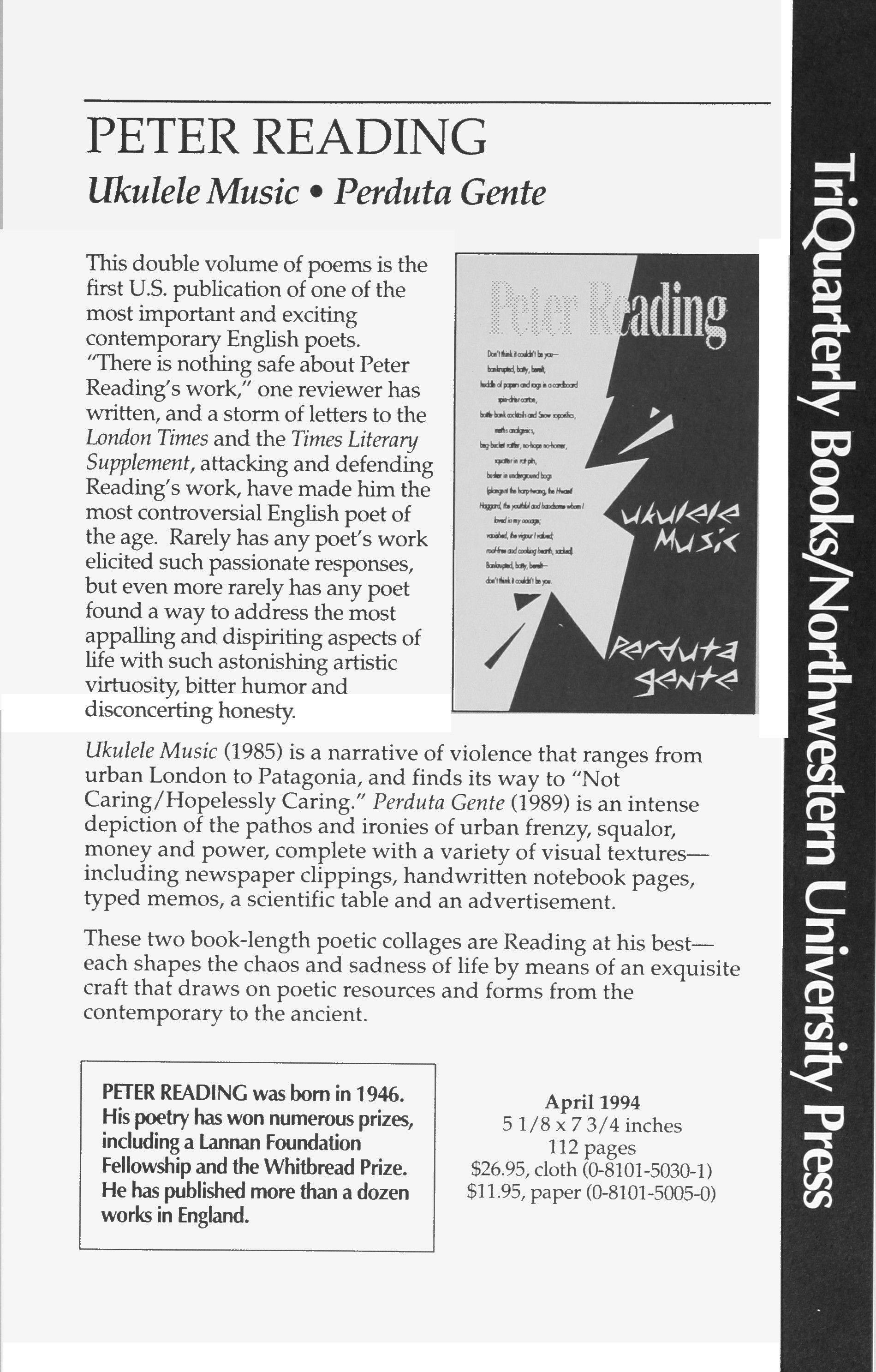
April 1994
51/8 x 73/4 inches 112 pages
$26.95, cloth (0-8101-5030-1)
$11.95, paper (0-8101-5005-0)
,', :.: :.:. .:,',. ',' ',' ',' ,', ','",.,',',', ,', ,', ,',',' ,', ,', .', .:.: .:._ -;- :.:.: :. '.'......'. ,', '.' '.' D;.',""'iI·· t..",b aI Jl4*'a.iasp io I,,-d bt' 41"'¥ -'*."kopl "H oJ .r..J, I»�'� ...J'.mdw.b9'-'. � hI .I"__ t all 'i ;......" <b'tWI··"'W'!.)OI.
The Urgency ofIdentity: Contemporary English-Language Poetryfrom Wales
Edited by David Lloyd
This anthology of poems and interviews is a double revelation for U'S, readers, presenting for the first time in this country the important English-language Welsh poetry of the 1980s and 1990s, and illuminating the complexity, constant flux and political implications of the poet's sense of inherited culture. These superb poems have been rigorously selected to showcase the Welsh poets' skill and seriousness and the sensuous density of their language, which,like that of contemporary Irish poets, offers the reader memorable expressive riches and a striking depiction of landscape and society.
The featured poets practice their craft amid a lively cultural and political debate: although the number of Welsh citizens who do not speak Welsh has grown substantially in recent decades, cultural nationalists view English as the language of oppression whose dominance erodes the richness and depth of local custom and history. Thus,like Latino writers working in English in the U'S; the Englishlanguage Welsh poets create a divided art. Included in the anthology are John Davies, Gillian Clarke and R. S. Thomas, among others.
A collection of fascinating interviews with the poets rounds out this exploration of the Welsh-English cultural divide. David Lloyd has written a lucid introduction that provides the historical background of the cultural debate over language, and alerts the reader to the virtues of each poet.

DAVID LLOYD grew up in the Welsh-American community of Utica, New York. He is currently Associate Professor and Chair of the Department of English at LeMoyne College. He has published essays, interviews and reviews in many journals, as well as poetry and short fiction. Lloyd's work on Welsh poetry has received support from the National Endowment for the Humanities.
June 1994
6 x 9 inches / 200 pages
$39.95, cloth (0-8101-5032-8); $14.95, paper (0-8101-5007-7)
ANGELA ACKSON
Dark Legs and Silk Kisses.' The Beatitudes 0 tile
Angela Jackson brings her remarkable linguistic and poetic gifts to the articulation of African-American experience. Jackson's poetry features an impressive variety of characters in compelling explorations of social identity, the rituals of race relations, the female psyche, creativity and spiritual experience.
Angela Jackson is a poet, novelist and playwright who has knoum, for long, what is rightfor her attention and scrupulous investigation.
-GWENDOLYN BROOKS
120 pages
$25, cloth (0-8101-5026-3)
$10.95, paper (0-8101-5001-8)
Adversaria
Winner ofthe 1993 Terrence Des Pres PrizeforPoetry
Adversaria celebrates the rough beauty of ordinary life and laments its inevitable decline. These poems, titled in Latin, combine colloquial style with a late imperial tone to capture the stark contrasts and contradictions of a life lived between a steel mill and the quiet, graceful natural world.
To read Adversaria is to be in the presence of a lively and supple and oarious mind, as tough as it is American....
LI-YOUNG LEE
Spinners
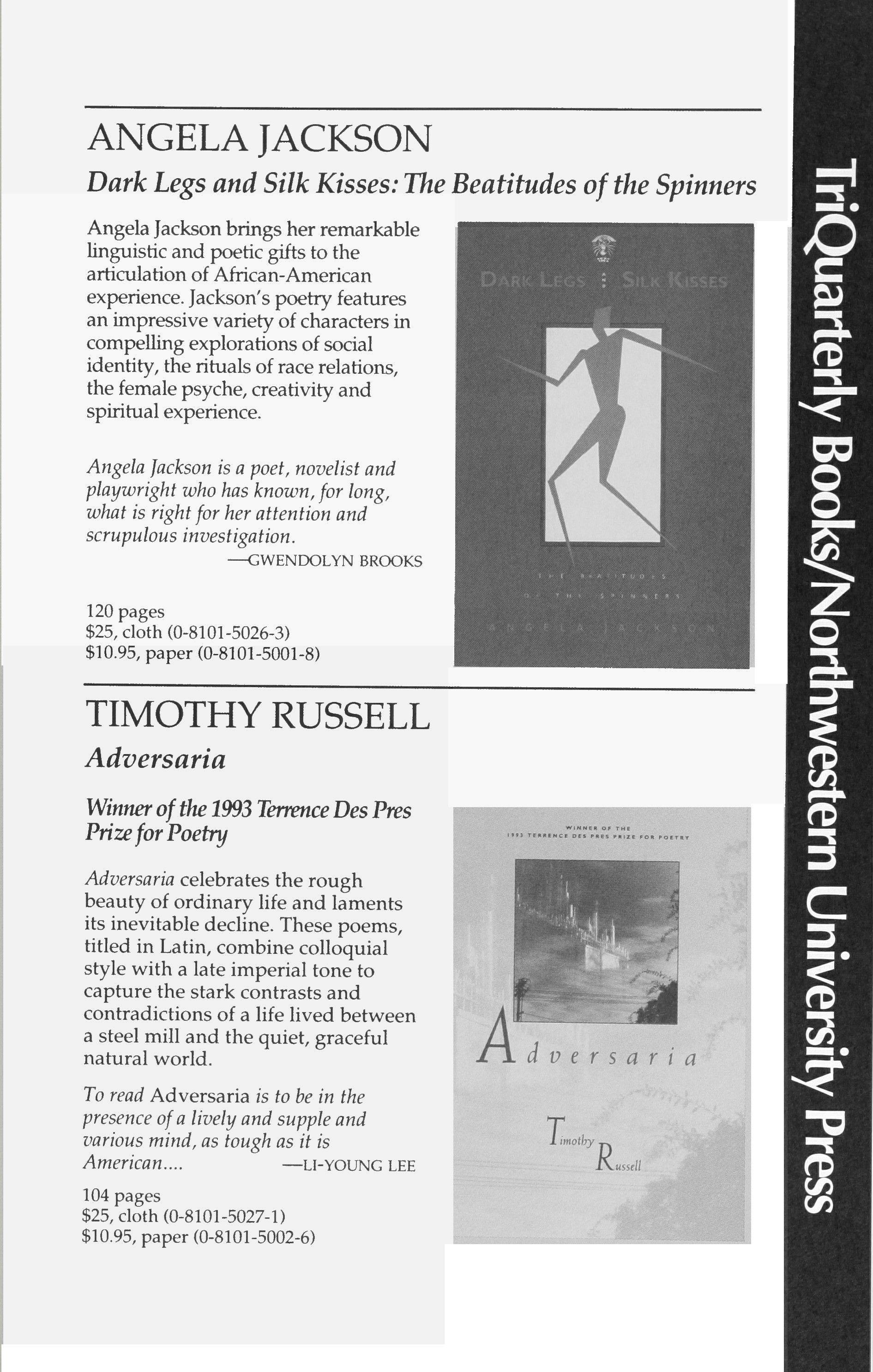
104 pages
$25, cloth (0-8101-5027-1)
$10.95, paper (0-8101-5002-6)
IlnOllJYRussell
WtNNf:. Of Tot' t." T'II"'�Hr;� D(5 ,..lts '1Ilze 'Oil ,"O(TIT dversaria
ALAN SHAPIRO
In Praise 0 the Impure:Poe and the EthicalImagination
A collection of passionate, rigorously argued essays on the situation of poetry in American culture today. These essays speak forcefully to the literary debates concerning the use of tradition, the openness of American poetry to diverse subjects, and the teaching of creative writing. This book should be read by any poet who teaches in the United States and by anyone with an interest in contemporary poetry. It will become a benchmark for discussion of contemporary American poetry.
200 pages
$39.95, cloth (0-8101-5025-5)
$12.95, paper (0-8101-5028-X)
ANNE CALCAGNO
Pray or Yoursel (
Anne Calcagno vividly captures the textures of women's lives in this exhilarating collection of short stories. Her characters grapple with problems ranging from domestic violence to obsessiveness with body weight; the dramatic situations are extreme, edgy and utterly convincing.
Calcagno has the clean ooice and sharp unblinking eye of a true storyteller.
-LARRY HEINEMANN I I
Language as maddeninglv[ascinaiing as a fifty-car locomoiioe, perfectly carted, from a single piece oftoood. LYNDA BARRY
136 pages
$26.95, cloth (0-8101-5000-X)
$12.95, paper (0-8101-5003-4)
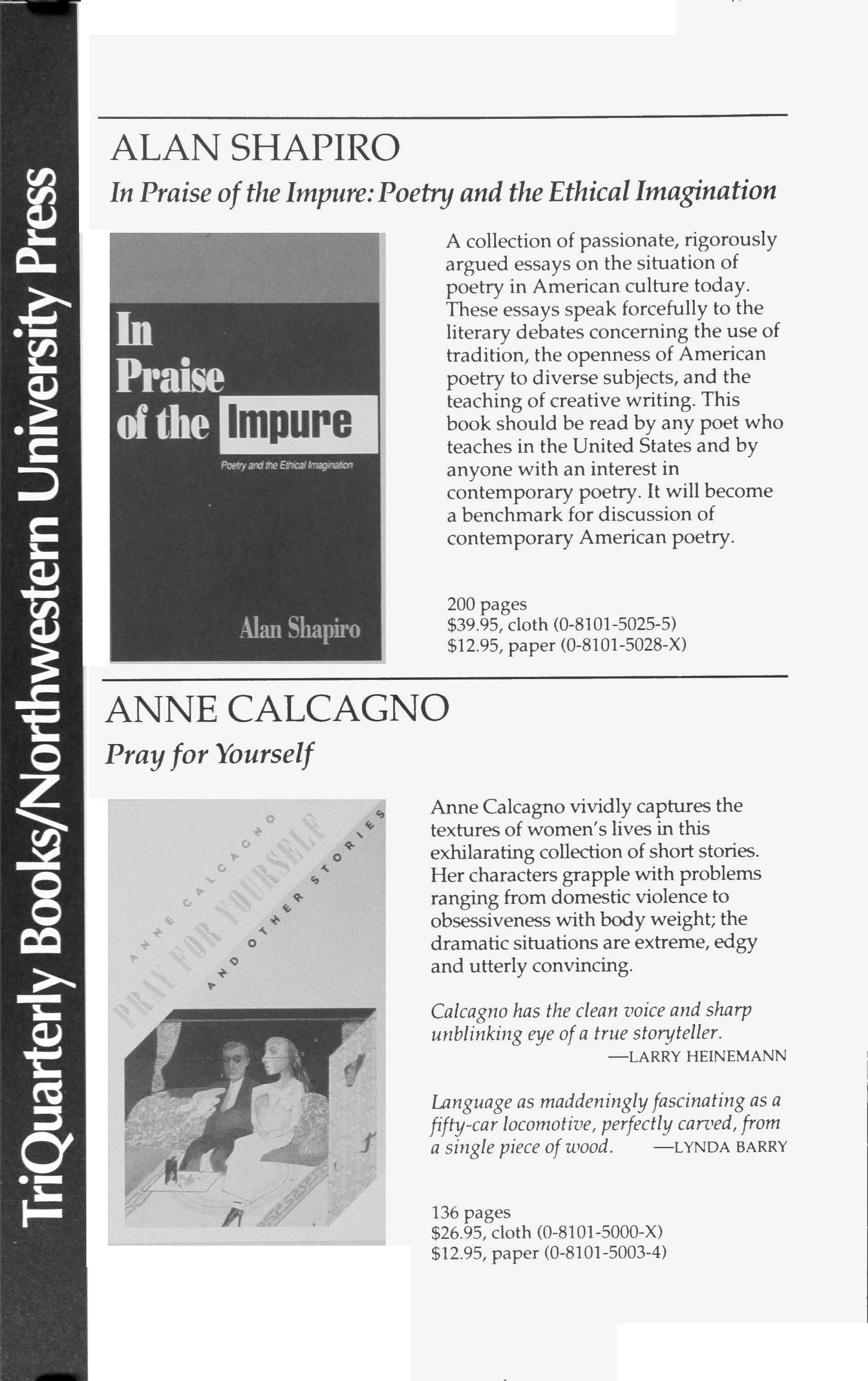
"
EVAN ZIMROTH
Dead, Dinner, or Naked
We hear in these poems a song of tenderness, anger, intelligence and wit. Evan Zimroth's erotic, intense poems are rooted in history, myth and everyday life. Her strong, singular voice makes us look where we might not have looked, see what we might have missed, face what we would avoid.
llooe thecombination ofsmartness,pain, and what one might call conscious postmodern trashiness in this book: A profoundly urban book, ofharsh memory andfantasy, set in harsher reality.
-AUOA OSTRIKER
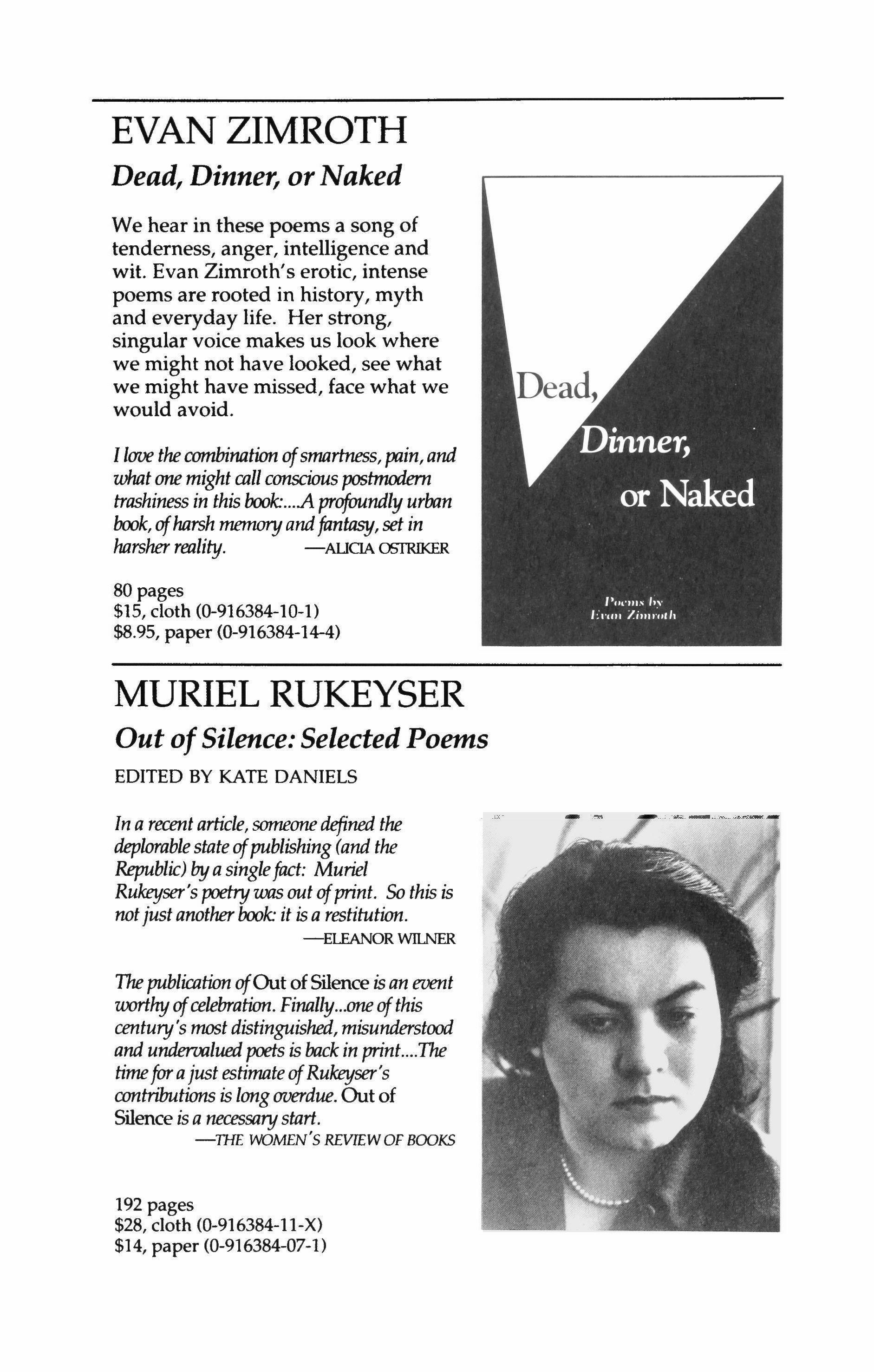
80 pages
$15, cloth (0-916384-10-1)
$8.95, paper (0-916384-14-4)
MURIEL RUKEYSER
Out ofSilence: Selected Poems
EDITED BY KATE DANIELS
In a recent article, someone defined the deplorable state ofpublishing (and the Republic) by a singlefact; Muriel Rukeyser'spoetry was out ofprint. So this is notjust another book: it is a restitution.
-ELEANOR WILNER
The publication ofOut ofSilence is an event worthyofcelebration. Finally one ofthis century's most distinguished, misunderstood and underoaluedpoets is back in print The timefor a just estimateofRukeyser's contributions is long ooerdue. Out of Silence is a necessary start.
-mE WOMEN'S REVlEWOF BOOKS
192 pages $28, cloth (0-916384-11-X) $14, paper (0-916384-07-1)
BRUCE WEIGL
What Saves Us
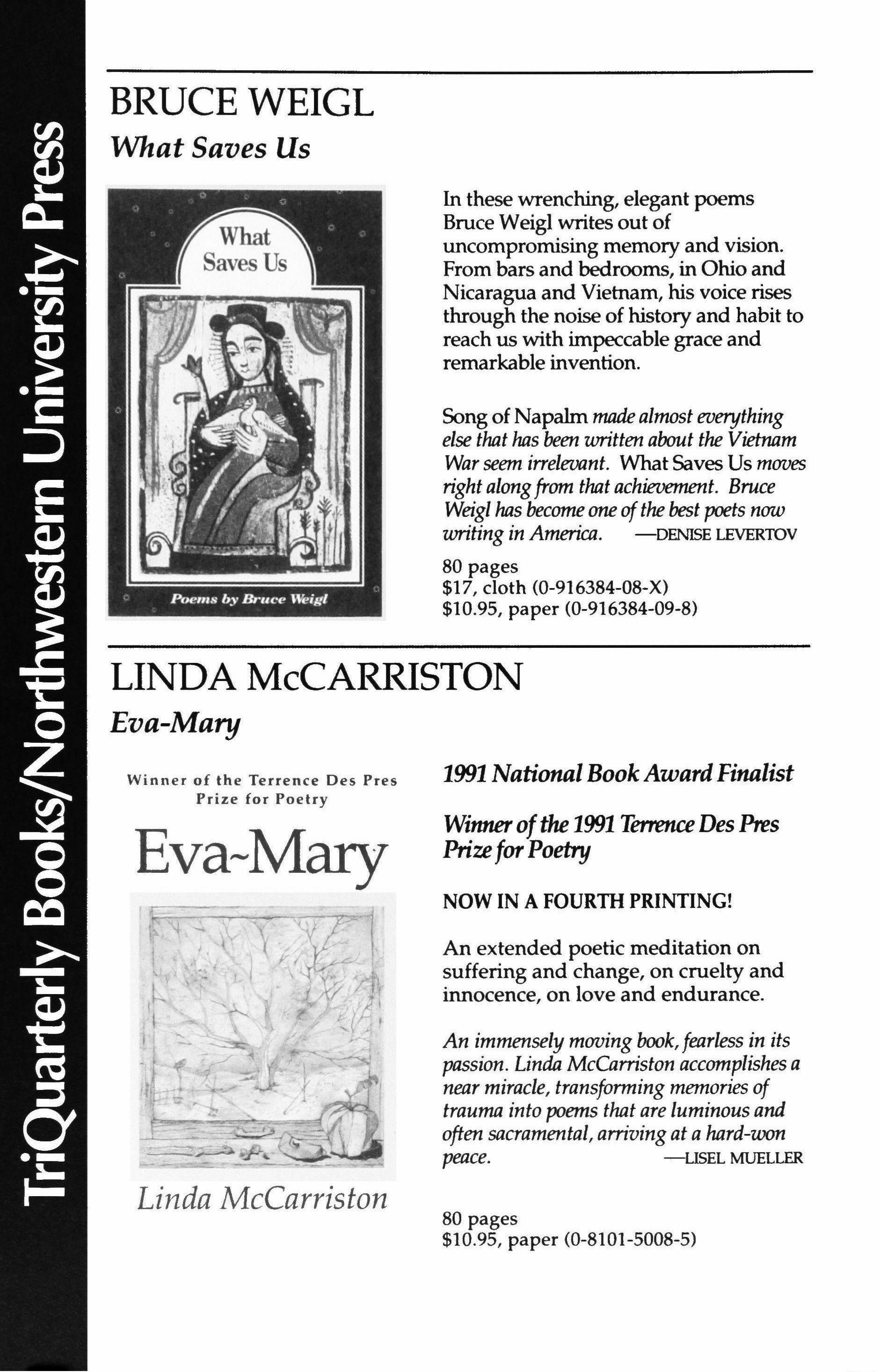
Eva-Mary
Winner of the Terrence Des Pres Prize for Poetry
Eva-Mary
In these wrenching, elegant poems Bruce Weigl writes out of uncompromising memory and vision. From bars and bedrooms, in Ohio and Nicaragua and Vietnam, his voice rises through the noise of history and habit to reach us with impeccable grace and remarkable invention.
Song of Napalm made almost everything else that has been written about the Vietnam War seem irrelevant. What Saves Us maves rightalongfrom that achievement. Bruce Weigl has become one ofthe best poets now writing in America. -DENISE LEVERlOV
80 pages
$17, cloth (O-916384-08-X)
$10.95, paper (0-916384-09-8)
Linda McCarriston
1991 NationalBookAwardFinalist
Winnerofthe 1991 Terrence Des Pres PrizeforPoetry
NOW IN A FOURTH PRINTING!
An extended poetic meditation on suffering and change, on cruelty and innocence, on love and endurance.
An immensely moving book,fearless in its passion. Linda McCarriston accomplishes a near miracle, transforming memories of trauma into poems that are luminous and often sacramental, arriving at a hard-won peace.
80 pages
-LISEL MUELLER
$10.95, paper (0-8101-5008-5)
LINDA McCARRISTON
New Writingfrom Mexico
Edited by Reginald Gibbons
This large anthology is a carefully chosen and scrupulously translated sampling of the most vigorous and exciting new short fiction, poetry and essays being written in Mexico today.
Gibbons has been guided by a healthy eclecticism and a sense offreshness and authenticity ofconception and execution.
-HARVARD REVIEW
a feastofreadingenjoyment. Gibbons's collection gives us people worth caring about and writing not afraid to be at once serious and joyful.
448 pages
$27, cloth (0-916384-12-8)
$15, paper (0-916384-13-6)
-SMALL PRESS
Fiction of the Eighties
Edited by Reginald Gibbons and Susan Hahn
A landmark anthology honoring TriQuarterly's 25th anniversary, this substantial volume includes 47 of the best short stories to have appeared during the past decade. These stories range widely over the experience of modern life, and share a high level of artistry and an unmistakable atmosphere of the 1980s. An incomparable primer of the contemporary possibilities of fiction.
For contemporaryfiction [Fiction of the Eighties] is a standard-bearer The multiplicity and depth ofthefictional lives here are astonishing wisdom and wildness ofwriters too numerous to thank.
-PUBUSHERS WEEKLY

592 pages
$26.95, cloth (0-916384-05-5)
$16.95, paper (0-916384-06-3)
Stephen Deutch, Photographer:
From Paris to Chicago, 1932-1989

The gift book-with stunning photos of Chicago over decades of change, including Deutch's Pulitzer-nominated photos from the Daily News. This collection and analysis of Deutch's work, with plates both in duotone and in color, is the first full record of Deutch's achievement to be published.
144 pages $45, cloth (0-929968-05-0)
$23.50, paper (0-929968-06-9)
Writers from South Africa
Based on the proceedings of a literary conference hosted by TriQuarterly magazine and Northwestern University in the autumn of 1987, this collection of speeches and dialogues by fourteen leading South African writers, poets and intellectuals opens up the world of contemporary South African literary culture to U.S. audiences, outlining such concerns as writing and censorship, worker poetry, the place of poetry in society and many others.
Writers from South Africa
CULTURE, POLITICS AND LITERARY THEORY AND ACTNITY IN SOUTH AFRICA TODAY
128 pages $6.50, paper (0-916384-03-9)
Ste De Ph(
0/"""'"' "f "�(J IIJ �II'r; ." (',. {
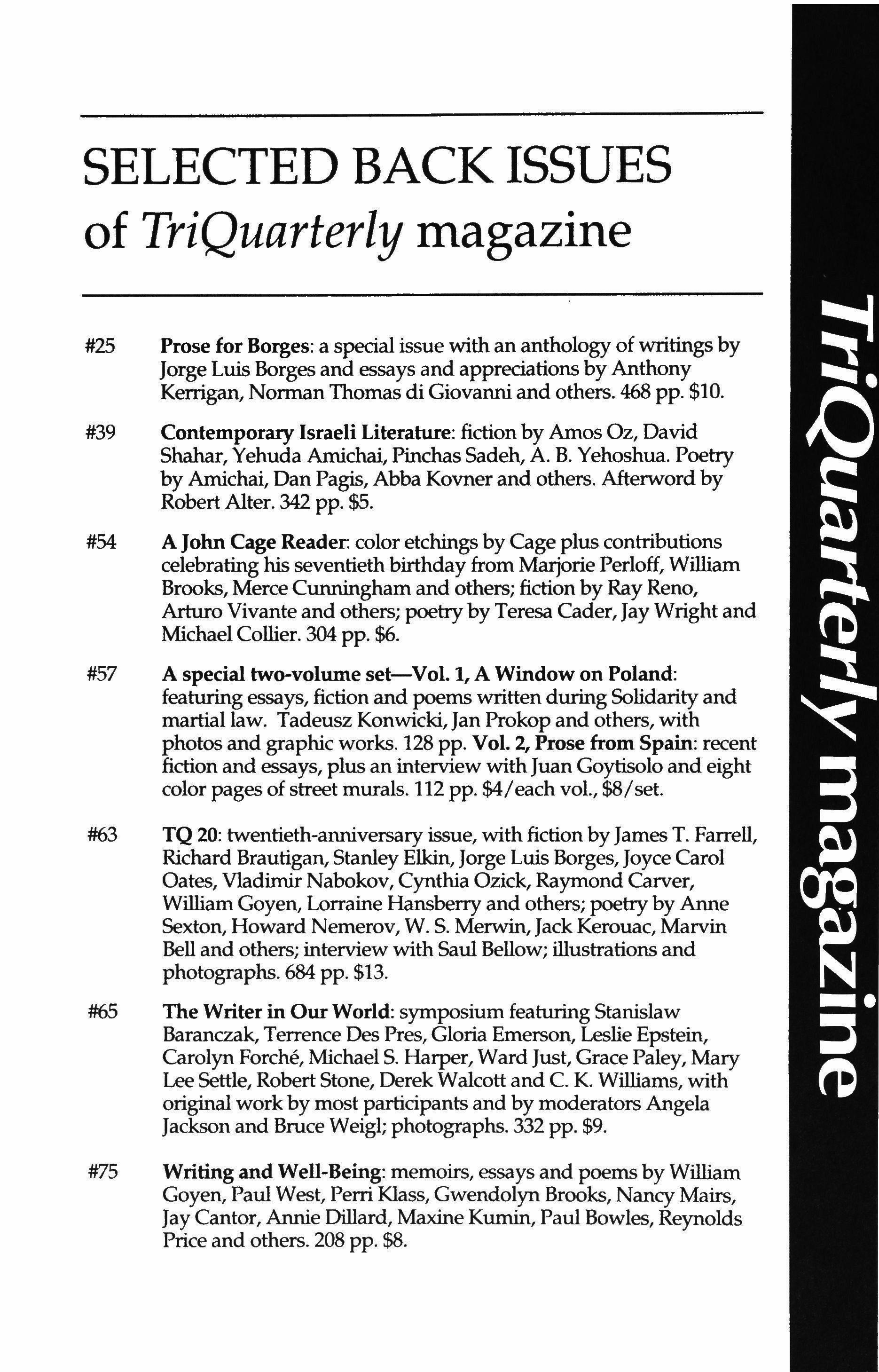
SELECTED BACK ISSUES
of TriQuarterly magazine
#25 Prose for Borges: a special issue with an anthology of writingsby Jorge Luis Borges and essays and appreciationsbyAnthony Kerrigan, Norman Thomas di Giovanni and others. 468 pp. $10.
#39 Contemporary Israeli Literature: fiction by Amos Oz, David Shahar, Yehuda Amichai, Pinchas Sadeh, A. B. Yehoshua. Poetry by Amichai, Dan Pagis, Abba Kovner and others. Afterword by Robert Alter. 342 pp. $5.
#54 A John Cage Reader: color etchingsbyCage plus contributions celebrating his seventieth birthday from Marjorie Perloff, William Brooks, Merce Cunningham and others; fiction by Ray Reno, Arturo Vivante and others; poetryby Teresa Cader,JayWright and Michael Collier. 304 pp. $6.
#57 A special two-volume set-Vol. 1, A Window on Poland: featuring essays, fiction and poems written during Solidarity and martial law. Tadeusz Konwicki,Jan Prokop and others, with photos and graphic works. 128 pp. Vol. 2, Prose from Spain: recent fiction and essays, plus an interview with Juan Goytisolo and eight color pages of street murals. 112 pp. $4/each vol., $8/set.
#63 TQ 20: twentieth-anniversary issue, with fiction byJames T. Farrell, Richard Brautigan, Stanley Elkin, Jorge Luis Borges,Joyce Carol Oates, Vladimir Nabokov, Cynthia Ozick, Raymond Carver, William Goyen, Lorraine Hansberry and others; poetry by Anne Sexton, Howard Nemerov, W. S. Merwin, Jack Kerouac, Marvin Bell and others; interview with Saul Bellow; illustrations and photographs. 684 pp. $13.
#65 The Writer in Our World: symposium featuring Stanislaw Baranczak, Terrence Des Pres, Gloria Emerson, Leslie Epstein, Carolyn Forche, Michael S. Harper, Ward Just, Grace Paley, Mary Lee Settle, Robert Stone, Derek Walcott and C. K. Williams, with original work by most participants and by moderators Angela Jackson and Bruce Weigl; photographs. 332 pp. $9.
#75 Writing and Well-Being: memoirs, essays and poems by William Goyen, Paul West, Perri Klass, Gwendolyn Brooks, Nancy Mairs, Jay Cantor, Annie Dillard, Maxine Kumin, Paul Bowles, Reynolds Price and others. 208 pp. $8.
ORDERING INFORMATION
TriQuarterly Books/Northwestern University Press
You may order titles listed above, up to and including New Writingfrom Mexico, from:
Northwestern University Press
Chicago Distribution Center 11030 South Langley Avenue
Chicago,IL 60628
Tel. 800/621-2736
312/568-1550 (local)
Fax 312/660-2235
You may order the remaining three TriQuarterly Books titles (Fiction of the Eighties; Stephen Deutch, Photographer and Writers from South Africa) and back issues of the magazine from our editorial office:
TriQuarterly Books
Northwestern University
2020 Ridge Avenue Evanston,IL 60208-4302
Tel. 800/832-3615
Fax 708/467-2096
Subscriptions to TriQuarterly magazine
TriQuarterly is available to individuals at the following rates:

Subscribers may purchase additional gift subscriptions for only $17/year ($3 off the usual gift subscription rate). Foreign subscribers please add $5 per year. Direct subscription inquiries to our editorial office: TriQuarterly, Northwestern University, 2020 Ridge Avenue, Evanston, IL 60208-4302, Tel. 800/832-3615, Fax 708/467-2096
1 year-$20 2 years-$36 Life-$500
Editor Reginald Gibbons
Managing Editor Kirstie Felland

Winter 1993/94
Co-Editor Susan Hahn
Executive Editor Bob Perlongo Assistant Editor Gwenan Wilbur
Special Projects Editor Fred Shafer
TriQuarterly Fellow
Deanna Kreisel
Advisory Editors
Design Director Gini Kondziolka
Editorial Assistants
Hans Holsen, Sarah Holsen, Kemba Johnson, Amy Rosenthal, Kelly Riggio
Hugo Achugar, Michael Anania, Stanislaw Baranczak, Cyrus Colter, Rita Dove, Richard Ford, George Garrett, Michael S. Harper, Bill Henderson, Maxine Kumin, Grace Paley, Michael Ryan, Alan Shapiro, Ellen Bryant Voigt
TRIQUARTERLY IS AN INTERNATIONAL JOURNAL OF WRITING, ART AND CULlURAL INQUIRY PUBLISHED AT NORTHWESTERN UNIVERSITY.
Subscription rates (three issues a year) - Individuals: one year $20; two years $36; life $500. Institutions: one year $26; two years $44; life $300. Foreign subscriptions $4 per year additional. Price of single copies varies. Sample copies $4. Correspondence and subscriptions should be addressed to TriQuarterly, NORTHWESTERN UNIVERSITY, 2020 Ridge Avenue, Evanston, IL 60208. Phone: (708) 491-3490. The editors invite submissions of fiction, poetry and literary essays, which must be received benveen October 1 and March 31; manuscripts received between April 1 and September 30 will not be read. No manuscripts will be returned unless accompanied by a stamped, self-addressed envelope. All manuscripts accepted for publication become the property of TriQuarterly, unless otherwise indicated. Copyright © 1994 by TriQuarterly. No part of this volume may be reproduced in any manner without written permission. The views expressed in this magazine are to be attributed to the writers, no the editors or sponsors. Printed in the United States of America by Thomson-Shore, typeset by TriQuarterly. ISSN: 0041-3097.
National distributors to retail trade: Ingram Periodicals, 1117 Heil Quaker Blvd., La Vergne, TN 37086 (800-627-6247, ext. 4500); B. DeBoer, 113 East Centre Street-Rear, Nudey, NJ 07110 (201-667-9300). Distributor for West Coast trade: Bookpeople, 2929 Fifth Street, Berkeley, CA 94710 (415-549-3030).
Reprints of issues #1-15 of TriQuarterly are available in full format from Kraus Reprint Company, Route 100, Millwood, NY 10546, and all issues in microfilm from University Microfilms International, 300 North Zeeb Road, Ann Arbor, MI 48106. TriQuarterly is indexed in the Humanities Index (H.W.Wilson Co.) and the American Humanities IruI.ex (Whitson PublishingCo.).
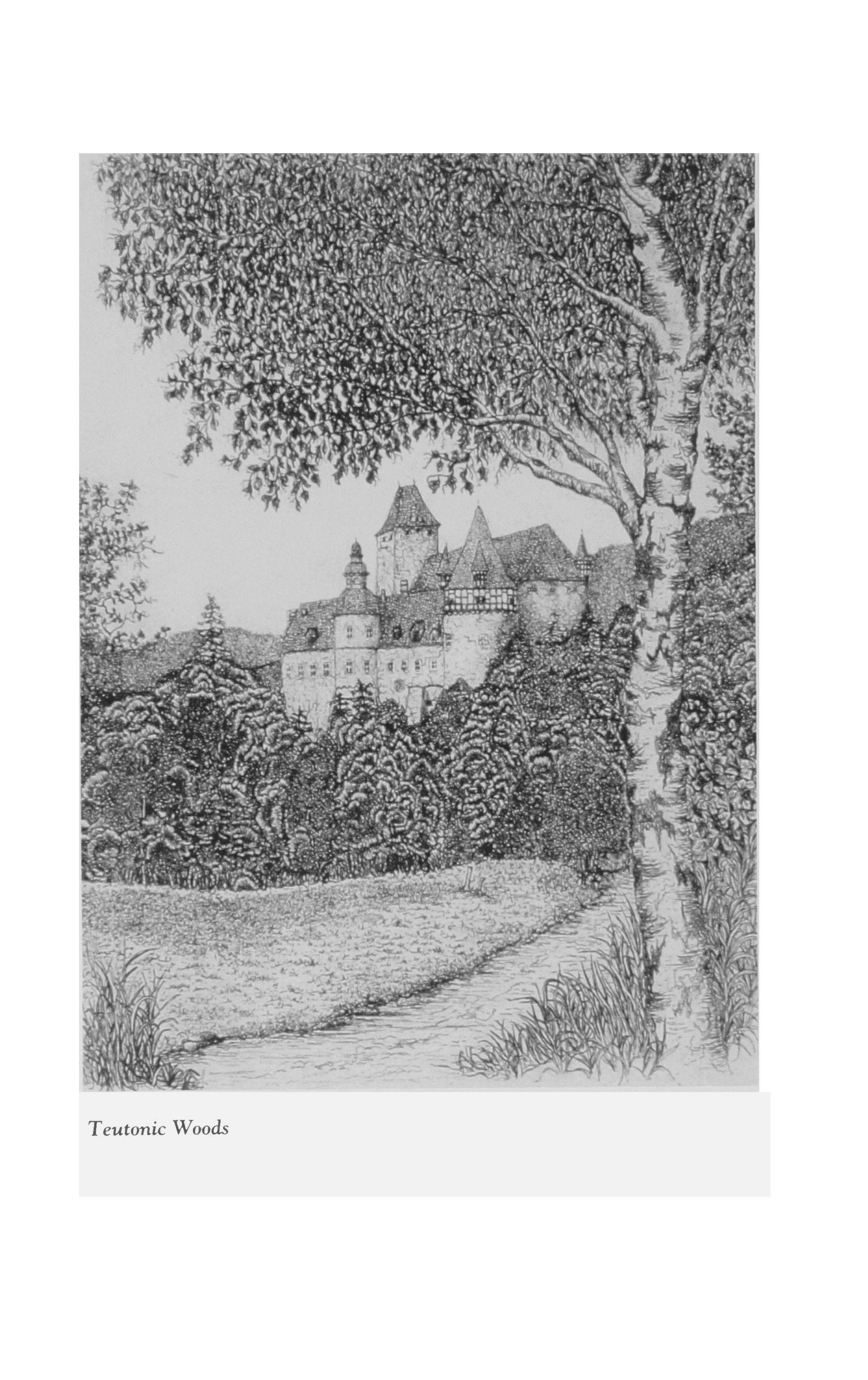
-
Teutonic Woods
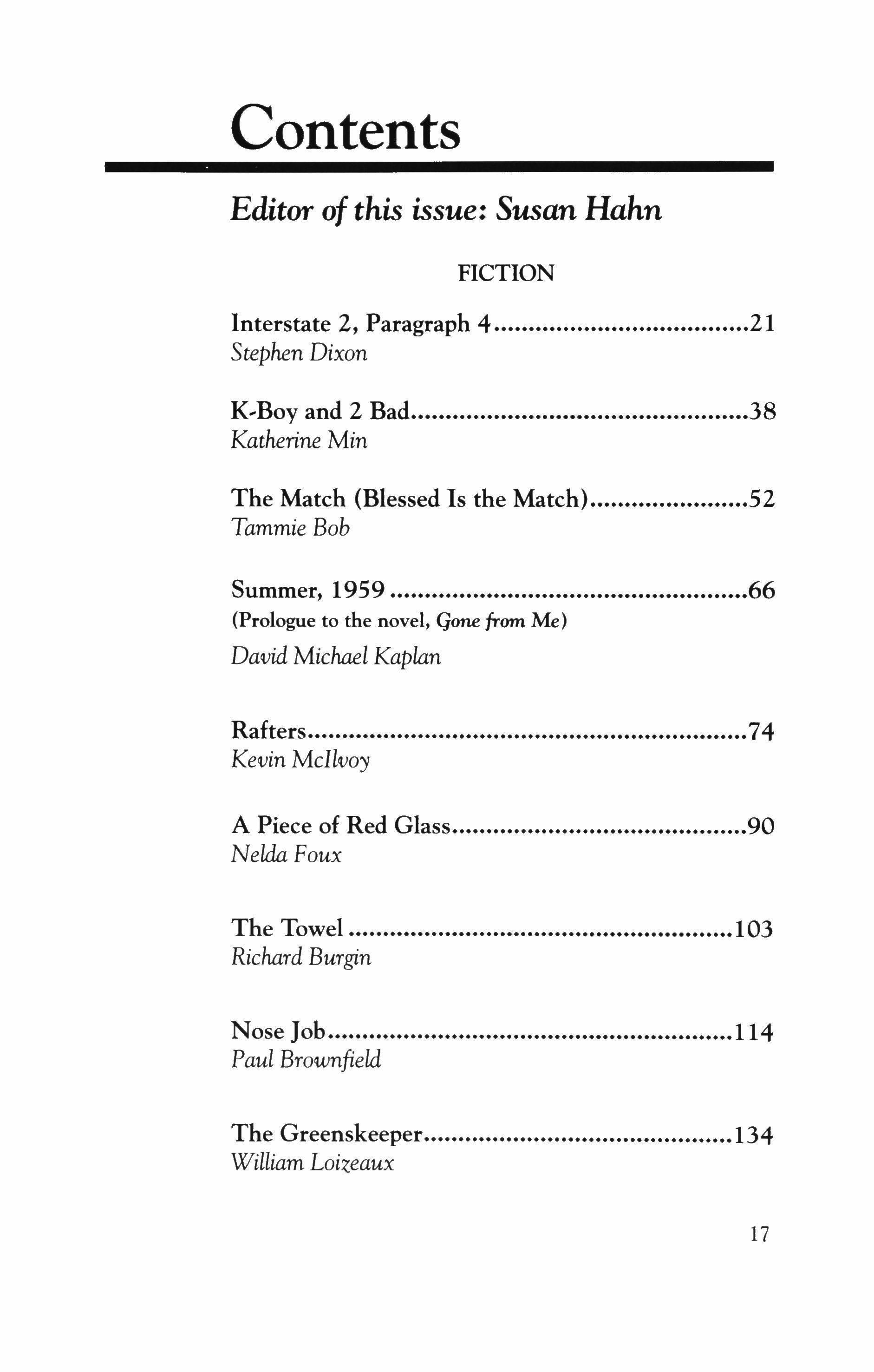
Contents Editor ofthis issue: Susan Hahn FICTION Interstate 2, Paragraph 4 21 Stephen Dixon K Boy and 2 Bad •••••...•...........•............................ 38 Katherine Min The Match (Blessed Is the Match) ••••••••••.••..•..••.•• 52 Tammie Bob Summer, 1959 66 (Prologue to the novel, Gone {rom Me) David Michael Kaplan Rafters 74 Kevin McIlvoy A Piece of Red Glass •.•••••••.•••................••••••........90 Nelda Foux The Towel 103 Richard Burgin Nose Job 114 Paul Brownfield The Greenskeeper ••••••••••••..........•••...........•......•• 134 William Loizeaux 17

Wislawa SzYmborska
Translated by Stanislaw Baranczak and Clare Cavanagh
POETRY Unearthly Voices; Orpheus: The Descent .••••.•.• 174 Edward Hirsch Parting with a View 178
Magpie 180 Alan Michael Parker Things Cheaply Had; Happy Marriage •.....•..•••••• 182
Niisteen
by Carolyne Wright and Mohammad Nural Hudii The Dwelling 185 Caroline Finkelstein A Certain Kind of Eden; Glass Slippers ..••••••••••• 186 Kay Ryan Video 188 Charles Wasserburg A Marriage; In Her Kitchen; Bar Mitzvah at the Wailing Wall 190 Dean Shavit Saturday Night; Disco; At the Van Gogh Museum 195 Alicia Ostriker Peasant Fare: At the Museum of Fine Arts 200 Kevin Bowen 18
Taslima
Translated
Street Scenes I, III, IV, V 202
Marilyn Hacker
Hundreds of Paired and Spinning Seeds; The Long Haul 206
Steven Cramer
Bunting 210
Linda Gregerson
Human Form (Loyola Park); Tomis 215
David Wojahn
ESSAYS
On Building a Violin 158
Arthur H. Kuriloff
Life Here Is Normal 231
Marguerite Feitlowitz
SPECIAL SECTION
Dante's Inferno, Canto XXII: Among the Malebranche 221
Translated and with a note by Robert Pinsky

Cover photograph by Ray Hartl; cover design by Gini Kondziolka
The fifteen etchings appearing throughout this issue are by Patricia Ann Miuccio
CONTRIBUTORS 261
19

Interstate 2, Paragraph 4
Stephen Dixon
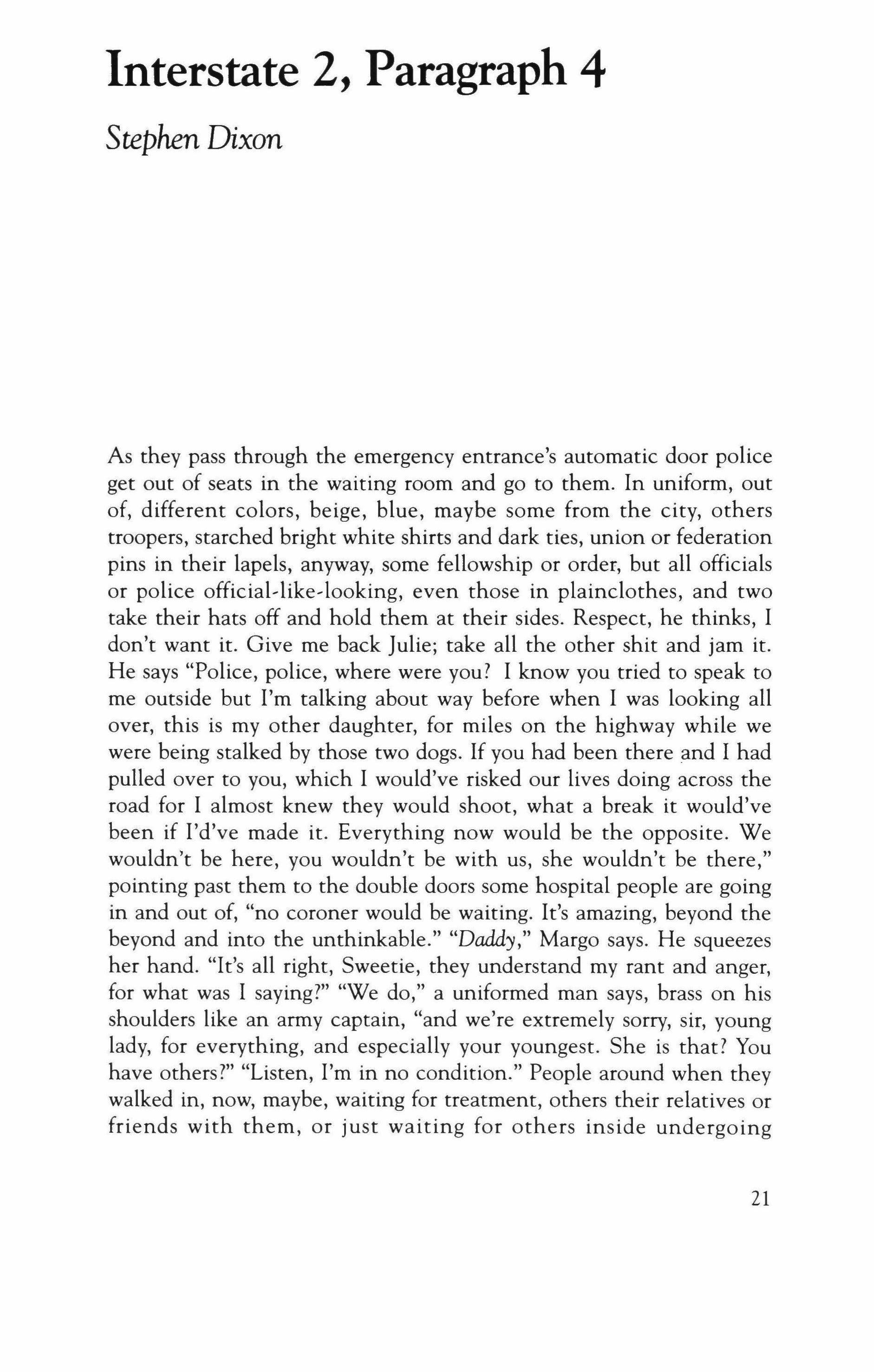
As they pass through the emergency entrance's automatic door police get out of seats in the waiting room and go to them. In uniform, out of, different colors, beige, blue, maybe some from the city, others troopers, starched bright white shirts and dark ties, union or federation pins in their lapels, anyway, some fellowship or order, but all officials or police official,like'looking, even those in plainclothes, and two take their hats off and hold them at their sides. Respect, he thinks, I don't want it. Give me back Julie; take all the other shit and jam it. He says "Police, police, where were you? I know you tried to speak to me outside but I'm talking about way before when I was looking all over, this is my other daughter, for miles on the highway while we were being stalked by those two dogs. If you had been there and I had pulled over to you, which I would've risked our lives doing across the road for I almost knew they would shoot, what a break it would've been if I'd've made it. Everything now would be the opposite. We wouldn't be here, you wouldn't be with us, she wouldn't be there," pointing past them to the double doors some hospital people are going in and out of, "no coroner would be waiting. It's amazing, beyond the beyond and into the unthinkable." "Daddy," Margo says. He squeezes her hand. "It's all right, Sweetie, they understand my rant and anger, for what was I saying?" "We do," a uniformed man says, brass on his shoulders like an army captain, "and we're extremely sorry, sir, young lady, for everything, and especially your youngest. She is that? You have others?" "Listen, I'm in no condition." People around when they walked in, now, maybe, waiting for treatment, others their relatives or friends with them, or just waiting for others inside undergoing 21
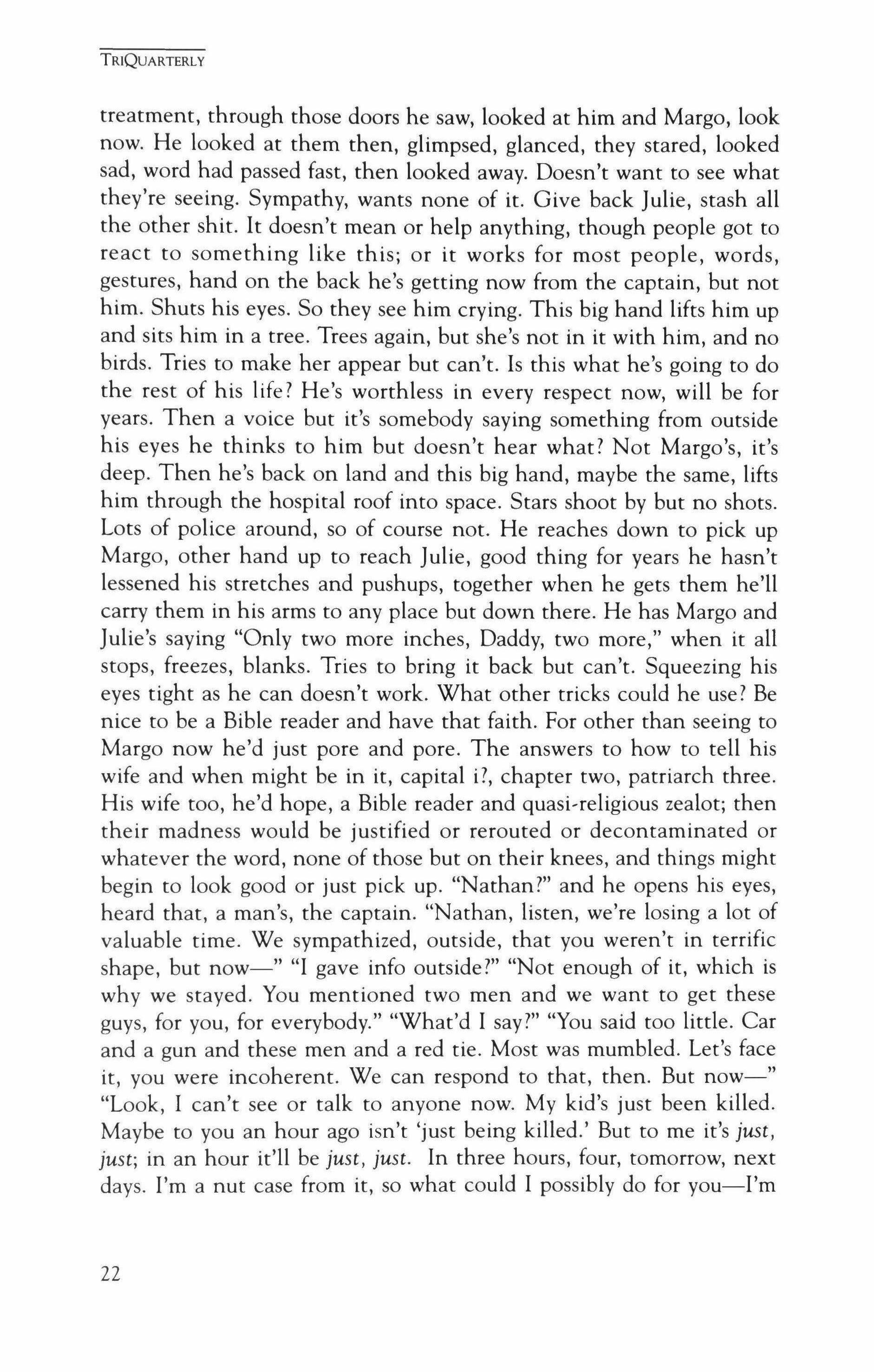
treatment, through those doors he saw, looked at him and Margo, look now. He looked at them then, glimpsed, glanced, they stared, looked sad, word had passed fast, then looked away. Doesn't want to see what they're seeing. Sympathy, wants none of it. Give back julie, stash all the other shit. It doesn't mean or help anything, though people got to react to something like this; or it works for most people, words, gestures, hand on the back he's getting now from the captain, but not him. Shuts his eyes. So they see him crying. This big hand lifts him up and sits him in a tree. Trees again, but she's not in it with him, and no birds. Tries to make her appear but can't. Is this what he's going to do the rest of his life? He's worthless in every respect now, will be for years. Then a voice but it's somebody saying something from outside his eyes he thinks to him but doesn't hear what? Not Margo's, it's deep. Then he's back on land and this big hand, maybe the same, lifts him through the hospital roof into space. Stars shoot by but no shots. Lots of police around, so of course not. He reaches down to pick up Margo, other hand up to reach julie, good thing for years he hasn't lessened his stretches and pushups, together when he gets them he'll carry them in his arms to any place but down there. He has Margo and julie's saying "Only two more inches, Daddy, two more," when it all stops, freezes, blanks. Tries to bring it back but can't. Squeezing his eyes tight as he can doesn't work. What other tricks could he use? Be nice to be a Bible reader and have that faith. For other than seeing to Margo now he'd just pore and pore. The answers to how to tell his wife and when might be in it, capital i?, chapter two, patriarch three. His wife too, he'd hope, a Bible reader and quasi-religious zealot; then their madness would be justified or rerouted or decontaminated or whatever the word, none of those but on their knees, and things might begin to look good or just pick up. "Nathan?" and he opens his eyes, heard that, a man's, the captain. "Nathan, listen, we're losing a lot of valuable time. We sympathized, outside, that you weren't in terrific shape, but now-" "I gave info outside?" "Not enough of it, which is why we stayed. You mentioned two men and we want to get these guys, for you, for everybody." "What'd I say?" "You said too little. Car and a gun and these men and a red tie. Most was mumbled. Let's face it, you were incoherent. We can respond to that, then. But now-" "Look, I can't see or talk to anyone now. My kid's just been killed. Maybe to you an hour ago isn't 'just being killed.' But to me it's just, just; in an hour it'll be just, just. In three hours, four, tomorrow, next days. I'm a nut case from it, so what could I possibly do for you-I'm
TRIQUARTERLY
22

sorry, Margo," patting her hand; "I won't be this way forever. But one of you be nice and get me a Bible?" he says to the police. "You'd like a Bible?" the doctor says. "We have a priest here, he's supposed to be down any moment, I don't know what's delaying him, but any particular kind? I believe we have the King James, Good News, Holy Scriptures if that's what the Jewish one is called, the one without the end." "I don't want a priest. I don't read those things except for the poetry and plots, which I haven't for years and aren't interested in now. But say, wouldn't it be great if I was. If I just had time, as at home, you know, my two kids finished with their dinner, reading their own books or playing quietly with each other-loudly, savagely, anything, for after awhile I'd know how to tone them down and bring them around-and I got out the house Bible, glass of wine by my side on the arm of my armchair, Tanakh, whatever that means, once looked it up but it wasn't there and I've a good dictionary, and red, and just turned to some of my favorite stuff in it or what I remember was, not the brutal, revengeful parts of God's or the Israelites, Solomon, songs of his or was it Ezra's or Samuel's?, Saul hunting down David in the cave and that spider, Joseph when he sees his father again after so many years, if Joseph wasn't the father and it was his son who saw him after so long, something about Ruth, search for a couple of proverbs and psalms that once struck me but will be hard to find. See how bad I am at it? But wouldn't that be a scene. And then I'd call my wife and wouldn't have any trouble how or when. 'Dearest dear, miss you. Kids are fine and fed and asleep, what a relief. ", "Daddy, you're talking that way again, I'm sorry," Margo says. "Am I? I am. It's embarrassing you?" "It's not that so much. But these people are wanting to speak to you and I can tell by some things that they're just being nice waiting." "O.K., I'll stop. I'll try." "Please, Nathan, down this hall, if you would," the captain says, extending his arm, doing something like a headwaiter or restaurant hostess, table this way, sir, miss, nonsmoking, an upside-down wave, to show where he wants them to go, of course. Hey, I'm beginning to catch on to things, he thinks; I'm not so bad off as before. Maybe a help, maybe a hindrance. "Maybe we should follow," to Margo, "what do you say? Give them what they want in a few minutes and then we can be alone to forgive and forget, I mean to figure out what I now can't, like what to say to Mommy, like I must see poor Julie." Starts crying, someone has his arm, it's that damn word poor, he thinks, Margo the hand of his other arm, doesn't want to look at her, she'll start crying if she isn't, down
TRIQUARTERLY
23
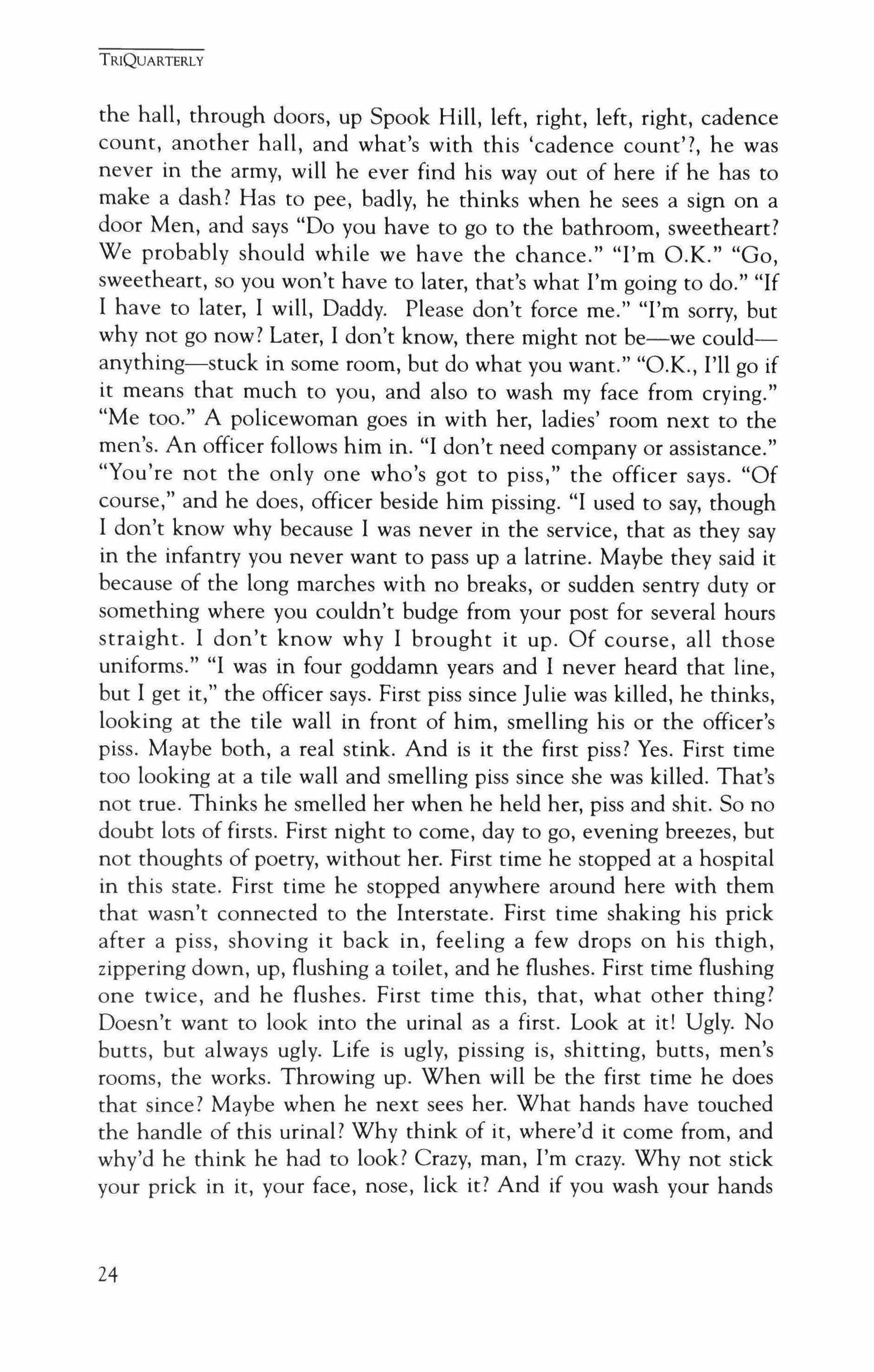
the hall, through doors, up Spook Hill, left, right, left, right, cadence count, another hall, and what's with this 'cadence count'?, he was never in the army, will he ever find his way out of here if he has to make a dash? Has to pee, badly, he thinks when he sees a sign on a door Men, and says "Do you have to go to the bathroom, sweetheart? We probably should while we have the chance." "I'm O.K." "Go, sweetheart, so you won't have to later, that's what I'm going to do." "If I have to later, I will, Daddy. Please don't force me." "I'm sorry, but why not go now? Later, I don't know, there might not be-we couldanything-stuck in some room, but do what you want." "O.K., I'll go if it means that much to you, and also to wash my face from crying." "Me too." A policewoman goes in with her, ladies' room next to the men's. An officer follows him in. "I don't need company or assistance." "You're not the only one who's got to piss," the officer says. "Of course," and he does, officer beside him pissing. "I used to say, though I don't know why because I was never in the service, that as they say in the infantry you never want to pass up a latrine. Maybe they said it because of the long marches with no breaks, or sudden sentry duty or something where you couldn't budge from your post for several hours straight. I don't know why I brought it up. Of course, all those uniforms." "I was in four goddamn years and I never heard that line, but I get it," the officer says. First piss since Julie was killed, he thinks, looking at the tile wall in front of him, smelling his or the officer's piss. Maybe both, a real stink. And is it the first piss? Yes. First time too looking at a tile wall and smelling piss since she was killed. That's not true. Thinks he smelled her when he held her, piss and shit. So no doubt lots of firsts. First night to come, day to go, evening breezes, but not thoughts of poetry, without her. First time he stopped at a hospital in this state. First time he stopped anywhere around here with them that wasn't connected to the Interstate. First time shaking his prick after a piss, shoving it back in, feeling a few drops on his thigh, zippering down, up, flushing a toilet, and he flushes. First time flushing one twice, and he flushes. First time this, that, what other thing? Doesn't want to look into the urinal as a first. Look at it! Ugly. No butts, but always ugly. Life is ugly, pissing is, shirting, butts, men's rooms, the works. Throwing up. When will be the first time he does that since? Maybe when he next sees her. What hands have touched the handle of this urinal? Why think of it, where'd it come from, and why'd he think he had to look? Crazy, man, I'm crazy. Why not stick your prick in it, your face, nose, lick it? And if you wash your hands
TRIQUARTERLY
24
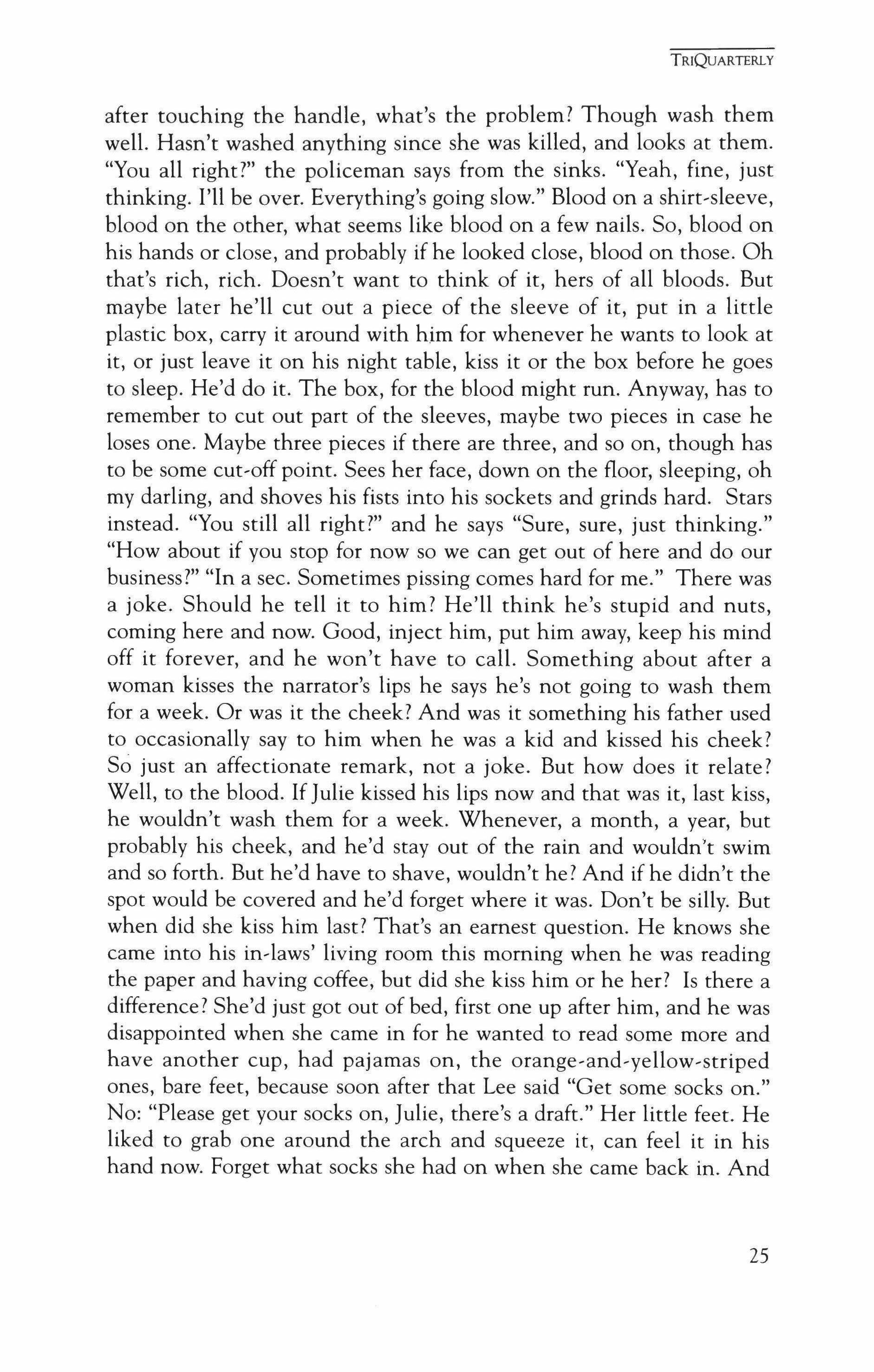
after touching the handle, what's the problem? Though wash them well. Hasn't washed anything since she was killed, and looks at them. "You all right?" the policeman says from the sinks. "Yeah, fine, just thinking. I'll be over. Everything's going slow." Blood on a shirt-sleeve, blood on the other, what seems like blood on a few nails. So, blood on his hands or close, and probably if he looked close, blood on those. Oh that's rich, rich. Doesn't want to think of it, hers of all bloods. But maybe later he'll cut out a piece of the sleeve of it, put in a little plastic box, carry it around with him for whenever he wants to look at it, or just leave it on his night table, kiss it or the box before he goes to sleep. He'd do it. The box, for the blood might run. Anyway, has to remember to cut out part of the sleeves, maybe two pieces in case he loses one. Maybe three pieces if there are three, and so on, though has to be some cut-off point. Sees her face, down on the floor, sleeping, oh my darling, and shoves his fists into his sockets and grinds hard. Stars instead. "You still all right?" and he says "Sure, sure, just thinking." "How about if you stop for now so we can get out of here and do our business?" "In a sec. Sometimes pissing comes hard for me." There was a joke. Should he tell it to him? He'll think he's stupid and nuts, coming here and now. Good, inject him, put him away, keep his mind off it forever, and he won't have to call. Something about after a woman kisses the narrator's lips he says he's not going to wash them for a week. Or was it the cheek? And was it something his father used to occasionally say to him when he was a kid and kissed his cheek? So just an affectionate remark, not a joke. But how does it relate? Well, to the blood. If Julie kissed his lips now and that was it, last kiss, he wouldn't wash them for a week. Whenever, a month, a year, but probably his cheek, and he'd stay out of the rain and wouldn't swim and so forth. But he'd have to shave, wouldn't he? And if he didn't the spot would be covered and he'd forget where it was. Don't be silly. But when did she kiss him last? That's an earnest question. He knows she came into his in-laws' living room this morning when he was reading the paper and having coffee, but did she kiss him or he her? Is there a difference? She'd just got out of bed, first one up after him, and he was disappointed when she came in for he wanted to read some more and have another cup, had pajamas on, the orange-and-vellow-striped ones, bare feet, because soon after that Lee said "Get some socks on." No: "Please get your socks on, Julie, there's a draft." Her little feet. He liked to grab one around the arch and squeeze it, can feel it in his hand now. Forget what socks she had on when she came back in. And
TRIQUARTERLY
25
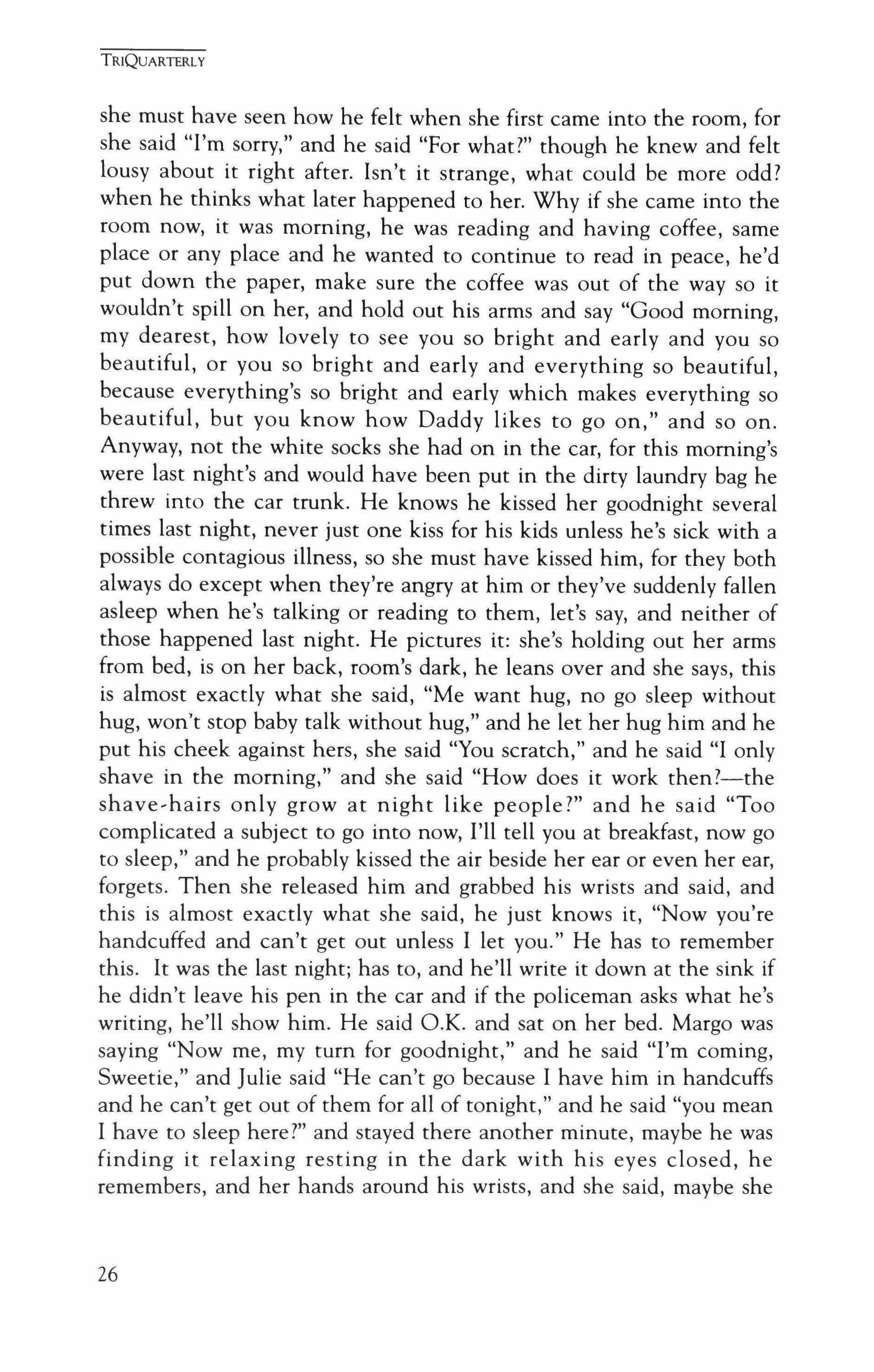
she must have seen how he felt when she first came into the room, for she said "I'm sorry," and he said "For what?" though he knew and felt lousy about it right after. Isn't it strange, what could be more odd? when he thinks what later happened to her. Why if she came into the room now, it was morning, he was reading and having coffee, same place or any place and he wanted to continue to read in peace, he'd put down the paper, make sure the coffee was out of the way so it wouldn't spill on her, and hold out his arms and say "Good morning, my dearest, how lovely to see you so bright and early and you so beautiful, or you so bright and early and everything so beautiful, because everything's so bright and early which makes everything so beautiful, but you know how Daddy likes to go on," and so on. Anyway, not the white socks she had on in the car, for this morning's were last night's and would have been put in the dirty laundry bag he threw into the car trunk. He knows he kissed her goodnight several times last night, never just one kiss for his kids unless he's sick with a possible contagious illness, so she must have kissed him, for they both always do except when they're angry at him or they've suddenly fallen asleep when he's talking or reading to them, let's say, and neither of those happened last night. He pictures it: she's holding out her arms from bed, is on her back, room's dark, he leans over and she says, this is almost exactly what she said, "Me want hug, no go sleep without hug, won't stop baby talk without hug," and he let her hug him and he put his cheek against hers, she said "You scratch," and he said "I only shave in the morning," and she said "How does it work then?-the shave-hairs only grow at night like people?" and he said "Too complicated a subject to go into now, I'll tell you at breakfast, now go to sleep," and he probably kissed the air beside her ear or even her ear, forgets. Then she released him and grabbed his wrists and said, and this is almost exactly what she said, he just knows it, "Now you're handcuffed and can't get out unless I let you." He has to remember this. It was the last night; has to, and he'll write it down at the sink if he didn't leave his pen in the car and if the policeman asks what he's writing, he'll show him. He said O.K. and sat on her bed. Margo was saying "Now me, my turn for goodnight," and he said "I'm coming, Sweetie," and Julie said "He can't go because I have him in handcuffs and he can't get out of them for all of tonight," and he said "you mean I have to sleep here?" and stayed there another minute, maybe he was finding it relaxing resting in the dark with his eyes closed, he remembers, and her hands around his wrists, and she said, maybe she
TRIQUARTERLY
26
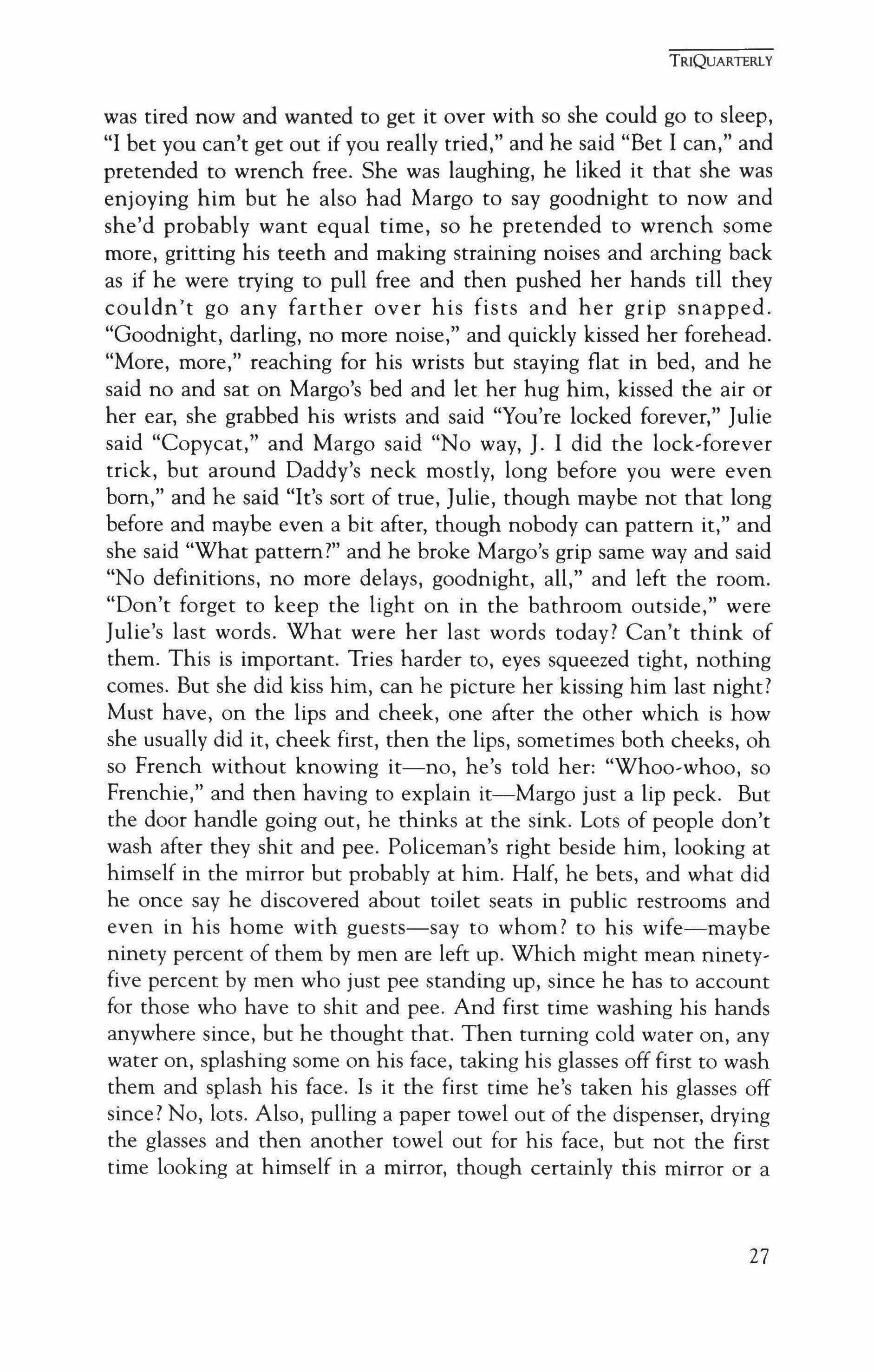
was tired now and wanted to get it over with so she could go to sleep, "I bet you can't get out if you really tried," and he said "Bet I can," and pretended to wrench free. She was laughing, he liked it that she was enjoying him but he also had Margo to say goodnight to now and she'd probably want equal time, so he pretended to wrench some more, gritting his teeth and making straining noises and arching back as if he were trying to pull free and then pushed her hands till they couldn't go any farther over his fists and her grip snapped. "Goodnight, darling, no more noise," and quickly kissed her forehead. "More, more," reaching for his wrists but staying flat in bed, and he said no and sat on Margo's bed and let her hug him, kissed the air or her ear, she grabbed his wrists and said "You're locked forever," Julie said "Copycat," and Margo said "No way, J. I did the lock-forever trick, but around Daddy's neck mostly, long before you were even born," and he said "It's sort of true, Julie, though maybe not that long before and maybe even a bit after, though nobody can pattern it," and she said "What pattern?" and he broke Margo's grip same way and said "No definitions, no more delays, goodnight, all," and left the room. "Don't forget to keep the light on in the bathroom outside," were Julie's last words. What were her last words today? Can't think of them. This is important. Tries harder to, eyes squeezed tight, nothing comes. But she did kiss him, can he picture her kissing him last night? Must have, on the lips and cheek, one after the other which is how she usually did it, cheek first, then the lips, sometimes both cheeks, oh so French without knowing it-no, he's told her: "Whoo�whoo, so Frenchie," and then having to explain it-Margo just a lip peck. But the door handle going out, he thinks at the sink. Lots of people don't wash after they shit and pee. Policeman's right beside him, looking at himself in the mirror but probably at him. Half, he bets, and what did he once say he discovered about toilet seats in public restrooms and even in his home with guests-say to whom? to his wife-maybe ninety percent of them by men are left up. Which might mean ninetyfive percent by men who just pee standing up, since he has to account for those who have to shit and pee. And first time washing his hands anywhere since, but he thought that. Then turning cold water on, any water on, splashing some on his face, taking his glasses off first to wash them and splash his face. Is it the first time he's taken his glasses off since? No, lots. Also, pulling a paper towel out of the dispenser, drying the glasses and then another towel out for his face, but not the first time looking at himself in a mirror, though certainly this mirror or a
TRIQUARTERLY
27
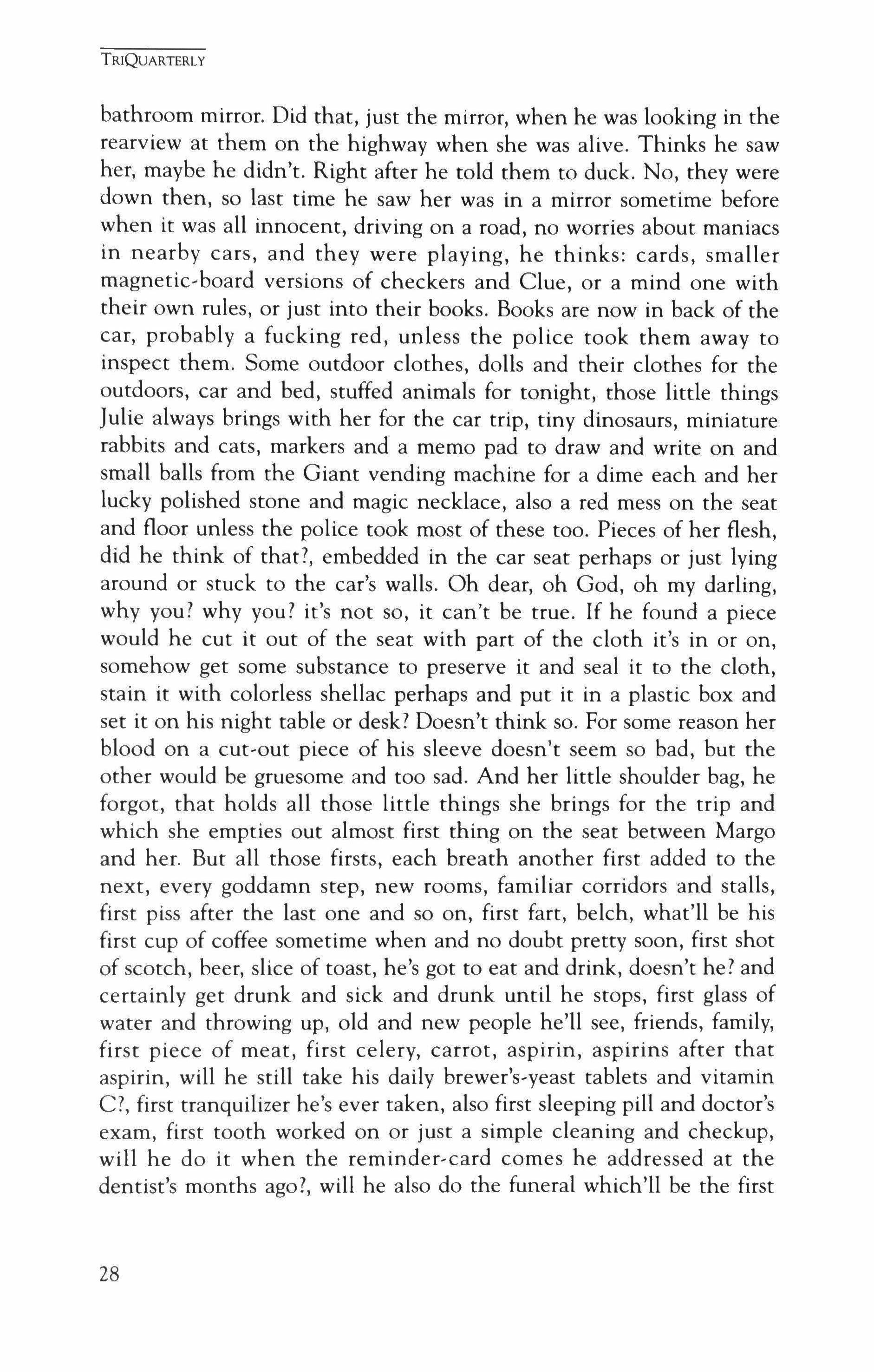
bathroom mirror. Did that, just the mirror, when he was looking in the rearview at them on the highway when she was alive. Thinks he saw her, maybe he didn't. Right after he told them to duck. No, they were down then, so last time he saw her was in a mirror sometime before when it was all innocent, driving on a road, no worries about maniacs in nearby cars, and they were playing, he thinks: cards, smaller magnetic-board versions of checkers and Clue, or a mind one with their own rules, or just into their books. Books are now in back of the car, probably a fucking red, unless the police took them away to inspect them. Some outdoor clothes, dolls and their clothes for the outdoors, car and bed, stuffed animals for tonight, those little things Julie always brings with her for the car trip, tiny dinosaurs, miniature rabbits and cats, markers and a memo pad to draw and write on and small balls from the Giant vending machine for a dime each and her lucky polished stone and magic necklace, also a red mess on the seat and floor unless the police took most of these too. Pieces of her flesh, did he think of that?, embedded in the car seat perhaps or just lying around or stuck to the car's walls. Oh dear, oh God, oh my darling, why you? why you? it's not so, it can't be true. If he found a piece would he cut it out of the seat with part of the cloth it's in or on, somehow get some substance to preserve it and seal it to the cloth, stain it with colorless shellac perhaps and put it in a plastic box and set it on his night table or desk? Doesn't think so. For some reason her blood on a cut-out piece of his sleeve doesn't seem so bad, but the other would be gruesome and too sad. And her little shoulder bag, he forgot, that holds all those little things she brings for the trip and which she empties out almost first thing on the seat between Margo and her. But all those firsts, each breath another first added to the next, every goddamn step, new rooms, familiar corridors and stalls, first piss after the last one and so on, first fart, belch, what'll be his first cup of coffee sometime when and no doubt pretty soon, first shot of scotch, beer, slice of toast, he's got to eat and drink, doesn't he? and certainly get drunk and sick and drunk until he stops, first glass of water and throwing up, old and new people he'll see, friends, family, first piece of meat, first celery, carrot, aspirin, aspirins after that aspirin, will he still take his daily brewer's-yeast tablets and vitamin C?, first tranquilizer he's ever taken, also first sleeping pill and doctor's exam, first tooth worked on or just a simple cleaning and checkup, will he do it when the reminder-card comes he addressed at the dentist's months ago?, will he also do the funeral which'll be the first
TRIQUARTERLY
28
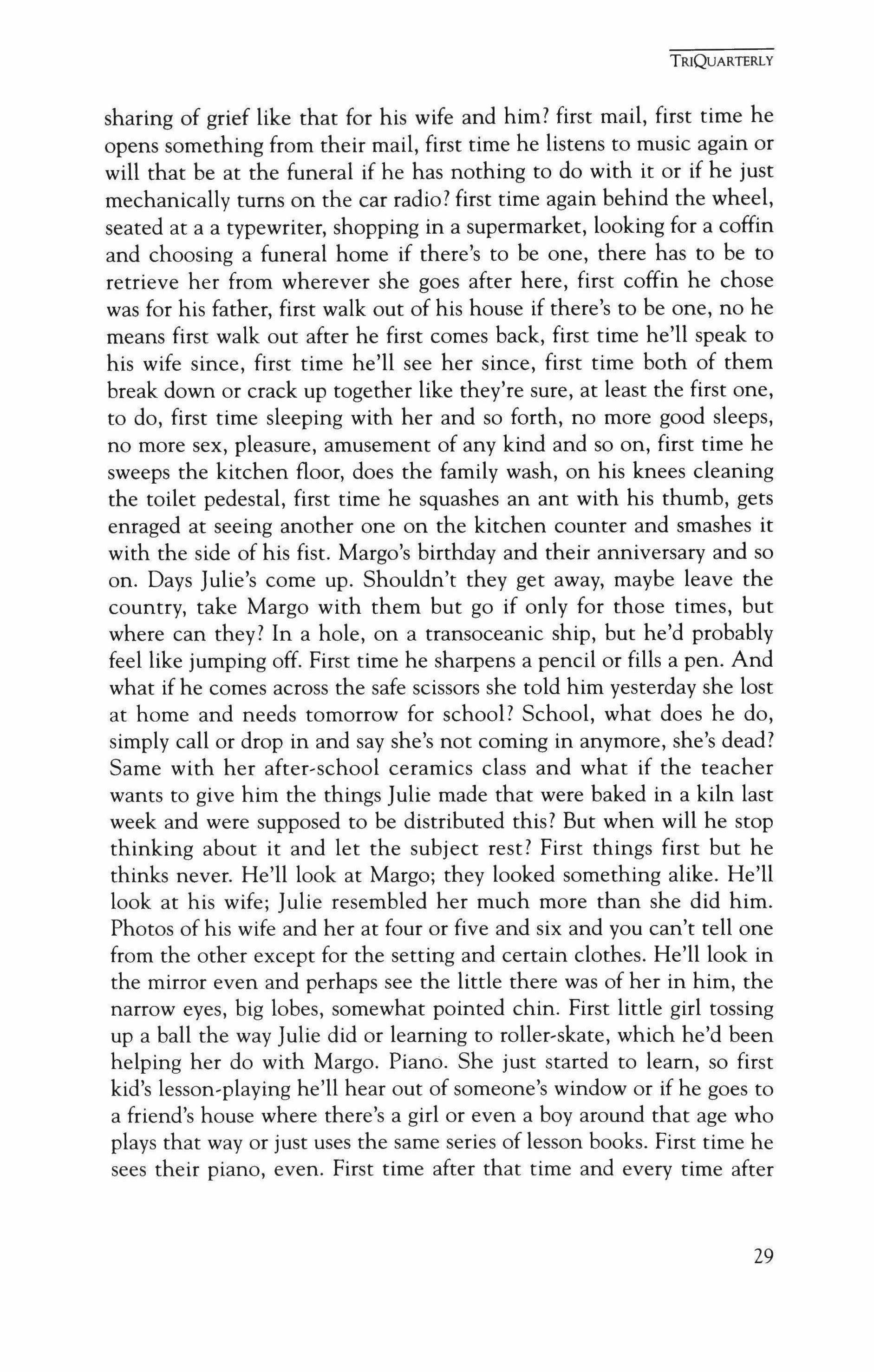
sharing of grief like that for his wife and him? first mail, first time he opens something from their mail, first time he listens to music again or will that be at the funeral if he has nothing to do with it or if he just mechanically turns on the car radio? first time again behind the wheel, seated at a a typewriter, shopping in a supermarket, looking for a coffin and choosing a funeral home if there's to be one, there has to be to retrieve her from wherever she goes after here, first coffin he chose was for his father, first walk out of his house if there's to be one, no he means first walk out after he first comes back, first time he'll speak to his wife since, first time he'll see her since, first time both of them break down or crack up together like they're sure, at least the first one, to do, first time sleeping with her and so forth, no more good sleeps, no more sex, pleasure, amusement of any kind and so on, first time he sweeps the kitchen floor, does the family wash, on his knees cleaning the toilet pedestal, first time he squashes an ant with his thumb, gets enraged at seeing another one on the kitchen counter and smashes it with the side of his fist. Margo's birthday and their anniversary and so on. Days Julie's come up. Shouldn't they get away, maybe leave the country, take Margo with them but go if only for those times, but where can they? In a hole, on a transoceanic ship, but he'd probably feel like jumping off. First time he sharpens a pencil or fills a pen. And what if he comes across the safe scissors she told him yesterday she lost at home and needs tomorrow for school? School, what does he do, simply call or drop in and say she's not coming in anymore, she's dead? Same with her after-school ceramics class and what if the teacher wants to give him the things Julie made that were baked in a kiln last week and were supposed to be distributed this? But when will he stop thinking about it and let the subject rest? First things first but he thinks never. He'll look at Margo; they looked something alike. He'll look at his wife; Julie resembled her much more than she did him. Photos of his wife and her at four or five and six and you can't tell one from the other except for the setting and certain clothes. He'll look in the mirror even and perhaps see the little there was of her in him, the narrow eyes, big lobes, somewhat pointed chin. First little girl tossing up a ball the way Julie did or learning to roller-skate, which he'd been helping her do with Margo. Piano. She just started to learn, so first kid's lesson-playing he'll hear out of someone's window or if he goes to a friend's house where there's a girl or even a boy around that age who plays that way or just uses the same series of lesson books. First time he sees their piano, even. First time after that time and every time after
TRIQUARTERLY
29

that and so on. Will he move the piano out? Then every time he just sees a piano or space where the piano was in their house or hears one played even by a pro and even on the radio, record or tape. It's possible. It could happen. Fathers who cross the street holding their kids' hands, every single one. Any kid, any age, either sex, mothers and nannies too. It's what he always liked but she didn't always like to do. "You're too young to cross the street by yourself," and what would she say? He forgets. "I know what to do. I've watched how. I'm old enough. I'm five. I'm six." "O.K., now that you're almost seven, and maybe I have been too protective, look both ways, then look again, then make sure nobody's in the parked cars and just about to pull out, and even if you hear a car coming but don't see it"-this just last week-"don't go, wait'll it passes till you don't hear it, even if that takes a few minutes, then look both ways again and at the parked cars, and only the not-too-traveled street in front of our house and when Mommy or I am looking, or the one by the school with the crossing guard." Home, her room, all the rooms, bathroom where she washed up and brushed her teeth before going to sleep. He was thinking about firsts before but now he's talking about everything. His clothes which she's seen, every plate and cup and such in the house, all the furniture, carpeted floors, woodpile on the porch, streets she's been on with him and so forth. Jungle Jim he erected and put in with hundreds of pounds of cement, how's he going to take that out? Goddamn neighborhood trees they've passed and huge one in the backyard she's run around. Sky where he's often pointed out to her a cloud. What's he talking about? Wash your face, put soap in your mouth. Bang your head against the mirror till it breaks or you're knocked out. "By the way-excuse me, sir, Mr. Frey," the policeman says. "But by the way, I never said it so far but I couldn't be sorrier over what happened to you and your family and I know I'm talking for every law officer in the county and state." "Yeah, yeah," looking into the sink. Somebody else's black hair there, he hates it, why didn't the guy pick it up and get rid of it or wash it away before he left? "If there was anything we could do, but what possibly could we? But we'd do it in a flash, without question, but even apprehending the rotten fuckers and executing them by injection, what's it in the end mean as help? Damn, it's the pits. There's no comeback from it. I put myself in your position each time." "You mean," not looking at him; turning cold water on and with his fingers pressed to a spout spraying the hair to the drain and then down it. "You're saying, killing a kid like this, it's happened
TRIQUARTERLY
30

with others and maybe in the same way?" Turns off the water, looks down the drain, doesn't see the hair but lets the water run some more to get it all the way down the sewer, or to the river and then the ocean or wherever it winds up but away from here. "Jesus," to the man's reflection in the mirror, "just saying it I feel like I'm being killed myself right here. But I suppose I shouldn't think we're the first. She is. I am. We all are. Oh I don't know what the hell I'm talking about."
There are other hairs in the sink; just noticed them. How come he didn't before and how'd they escape the spray? Gray, that's why, two of them, and one white, so they blended in, plus five or six little black nappy ones which probably have a way of sticking to the porcelain more than what might be the lighter straight ones, but he's not going to do anything about them. To get all the hairs in all the sinks he sees into the ocean or wherever they go from here, something he never thought of before, and all the sinks he sees into the seas he could see, the shining sinks and shrinking stinks and seas he could mean, though he doesn't know how, well-well what? He's lost his train. He's lost it all. Oh, don't get so self-pitying, please. And why not get that? And the objective, not correlative, for he doesn't know what's a correlative, it's just a word he's heard in attachment to that, would be absurd, wouldn't it? Sinking all the hairs in all the sinks, sort of like going around flushing all the toilets in the world that need to be flushed. Slobs don't. Absolute slobs. Who let their shit and stuff stay there to swim and stink so the next stiff can see it and wonder about seas and shifting sinks, though they don't do it for that reason he doesn't think. They do it because they're egotists. "I've actually seen only one child killed," the policeman says, who's actually been talking about that or its correlative for a minute perhaps but he hasn't heard him till now or not words or not exact. "Oh yeah?" still to the mirror but the policeman to him. I want to get out of here, he thinks. I want to go home with my kids. That's absolutely what I want, out of this pool of piss, no small thing. "By a bullet, cross-fire, druggies shooting up each other over some territory dispute from across a street." "Druggies, that's what they were or could have been. Of course," slapping his head. "What are you saying, something essential you only now remembered about them?," taking out a pen and pad. "No, I don't know. But who else could kill kids like that but them? They're out of it. Mind a freaking forest. They've lost consciousness or conscience or both or something like that. They're egotists, aren't they?-people who kill people like that. And kids, imagine. Even if you're aiming at
TRIQUARTERLY
31
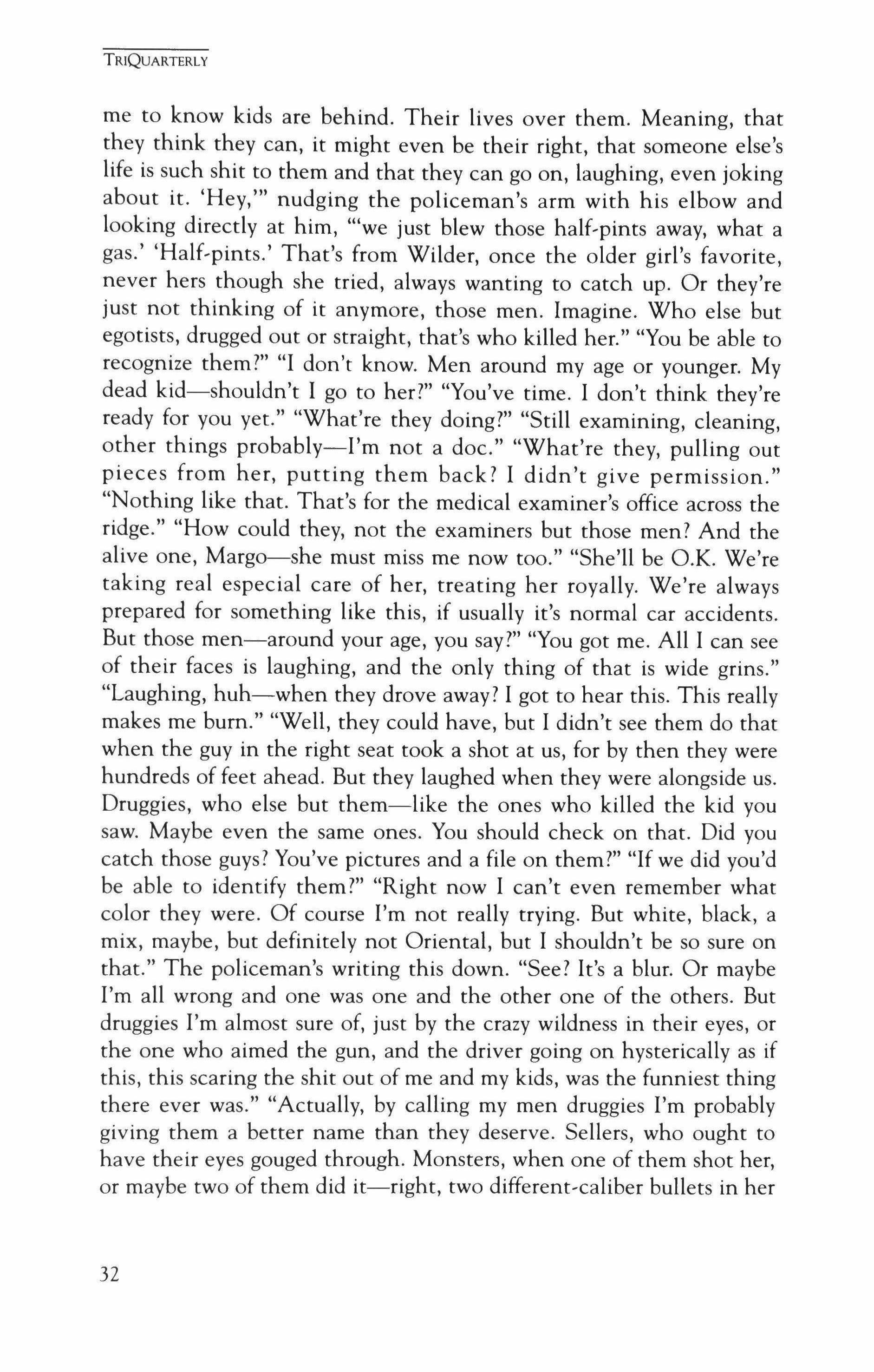
me to know kids are behind. Their lives over them. Meaning, that they think they can, it might even be their right, that someone else's life is such shit to them and that they can go on, laughing, even joking about it. 'Hey,'" nudging the policeman's arm with his elbow and looking directly at him, '''we just blew those half-pints away, what a gas.' 'Half-pints.' That's from Wilder, once the older girl's favorite, never hers though she tried, always wanting to catch up. Or they're just not thinking of it anymore, those men. Imagine. Who else but egotists, drugged out or straight, that's who killed her." "You be able to recognize them?" "I don't know. Men around my age or younger. My dead kid-shouldn't I go to her?" "You've time. I don't think they're ready for you yet." "What're they doing?" "Still examining, cleaning, other things probably-I'm not a doc." "What're they, pulling out pieces from her, putting them back? I didn't give permission." "Nothing like that. That's for the medical examiner's office across the ridge." "How could they, not the examiners but those men? And the alive one, Margo-she must miss me now too." "She'll be O.K. We're taking real especial care of her, treating her royally. We're always prepared for something like this, if usually it's normal car accidents. But those men-around your age, you say?" "You got me. All I can see of their faces is laughing, and the only thing of that is wide grins." "Laughing, huh-when they drove away? I got to hear this. This really makes me bum." "Well, they could have, but I didn't see them do that when the guy in the right seat took a shot at us, for by then they were hundreds of feet ahead. But they laughed when they were alongside us. Druggies, who else but them-like the ones who killed the kid you saw. Maybe even the same ones. You should check on that. Did you catch those guys? You've pictures and a file on them?" "If we did you'd be able to identify them?" "Right now I can't even remember what color they were. Of course I'm not really trying. But white, black, a mix, maybe, but definitely not Oriental, but I shouldn't be so sure on that." The policeman's writing this down. "See? It's a blur. Or maybe I'm all wrong and one was one and the other one of the others. But druggies I'm almost sure of, just by the crazy wildness in their eyes, or the one who aimed the gun, and the driver going on hysterically as if this, this scaring the shit out of me and my kids, was the funniest thing there ever was." "Actually, by calling my men druggies I'm probably giving them a better name than they deserve. Sellers, who ought to have their eyes gouged through. Monsters, when one of them shot her, or maybe two of them did it-right, two different-caliber bullets in her
TRIQUARTERLY
32
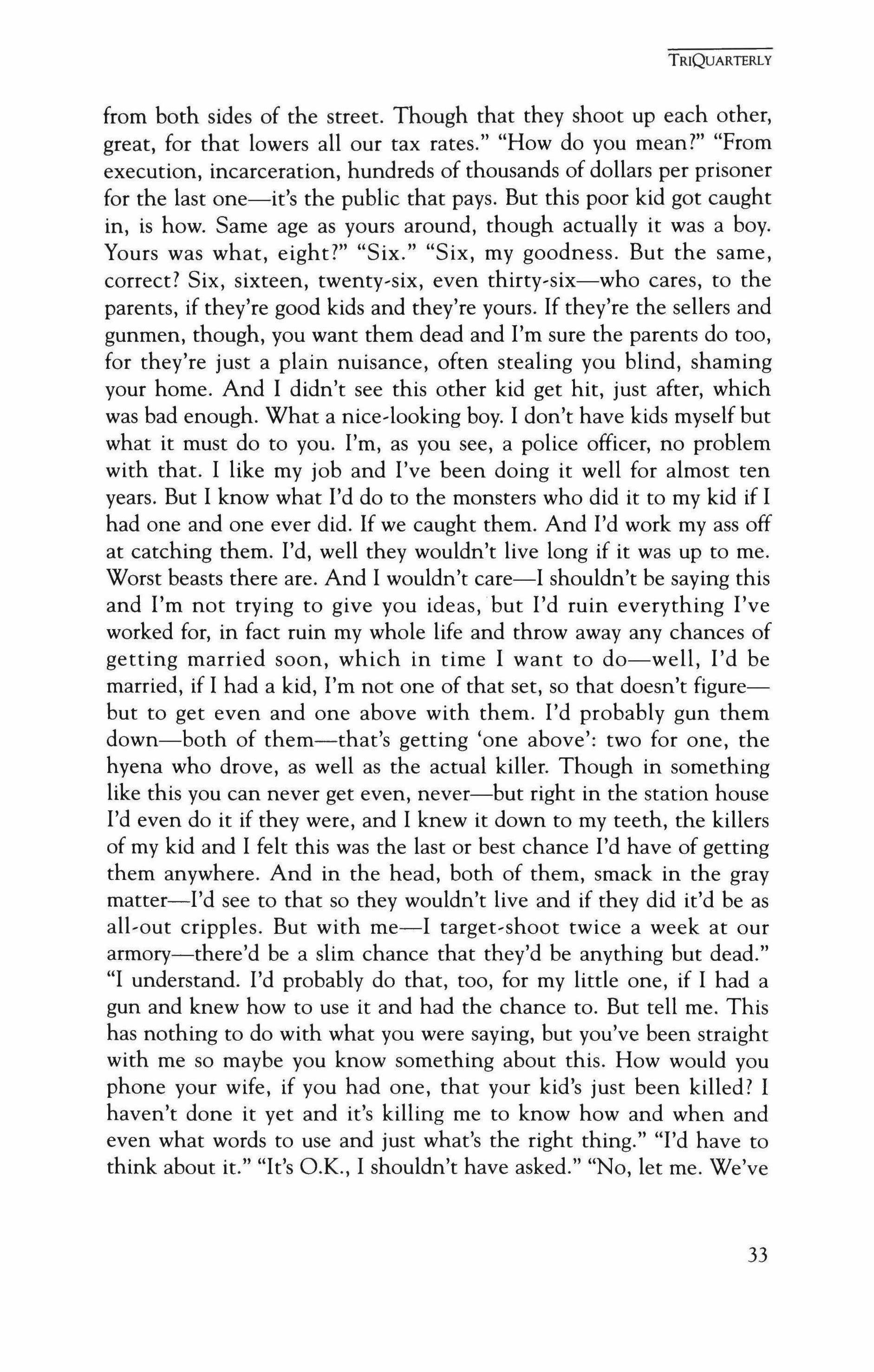
from both sides of the street. Though that they shoot up each other, great, for that lowers all our tax rates." "How do you mean?" "From execution, incarceration, hundreds of thousands of dollars per prisoner for the last one-it's the public that pays. But this poor kid got caught in, is how. Same age as yours around, though actually it was a boy. Yours was what, eight?" "Six." "Six, my goodness. But the same, correct? Six, sixteen, twenty-six, even thlrtv-six=-who cares, to the parents, if they're good kids and they're yours. If they're the sellers and gunmen, though, you want them dead and I'm sure the parents do too, for they're just a plain nuisance, often stealing you blind, shaming your home. And I didn't see this other kid get hit, just after, which was bad enough. What a nice-looking boy. I don't have kids myself but what it must do to you. I'm, as you see, a police officer, no problem with that. I like my job and I've been doing it well for almost ten years. But I know what I'd do to the monsters who did it to my kid if I had one and one ever did. If we caught them. And I'd work my ass off at catching them. I'd, well they wouldn't live long if it was up to me. Worst beasts there are. And I wouldn't care-I shouldn't be saying this and I'm not trying to give you ideas, but I'd ruin everything I've worked for, in fact ruin my whole life and throwaway any chances of getting married soon, which in time I want to do-well, I'd be married, if I had a kid, I'm not one of that set, so that doesn't figurebut to get even and one above with them. I'd probably gun them down-both of them-that's getting 'one above': two for one, the hyena who drove, as well as the actual killer. Though in something like this you can never get even, never-but right in the station house I'd even do it if they were, and I knew it down to my teeth, the killers of my kid and I felt this was the last or best chance I'd have of getting them anywhere. And in the head, both of them, smack in the gray matter-I'd see to that so they wouldn't live and if they did it'd be as all-out cripples. But with me-I target-shoot twice a week at our armory-there'd be a slim chance that they'd be anything but dead." "I understand. I'd probably do that, too, for my little one, if I had a gun and knew how to use it and had the chance to. But tell me. This has nothing to do with what you were saying, but you've been straight with me so maybe you know something about this. How would you phone your wife, if you had one, that your kid's just been killed? I haven't done it yet and it's killing me to know how and when and even what words to use and just what's the right thing." "I'd have to think about it." "It's O.K., I shouldn't have asked." "No, let me. We've
TRIQUARTERLY
33
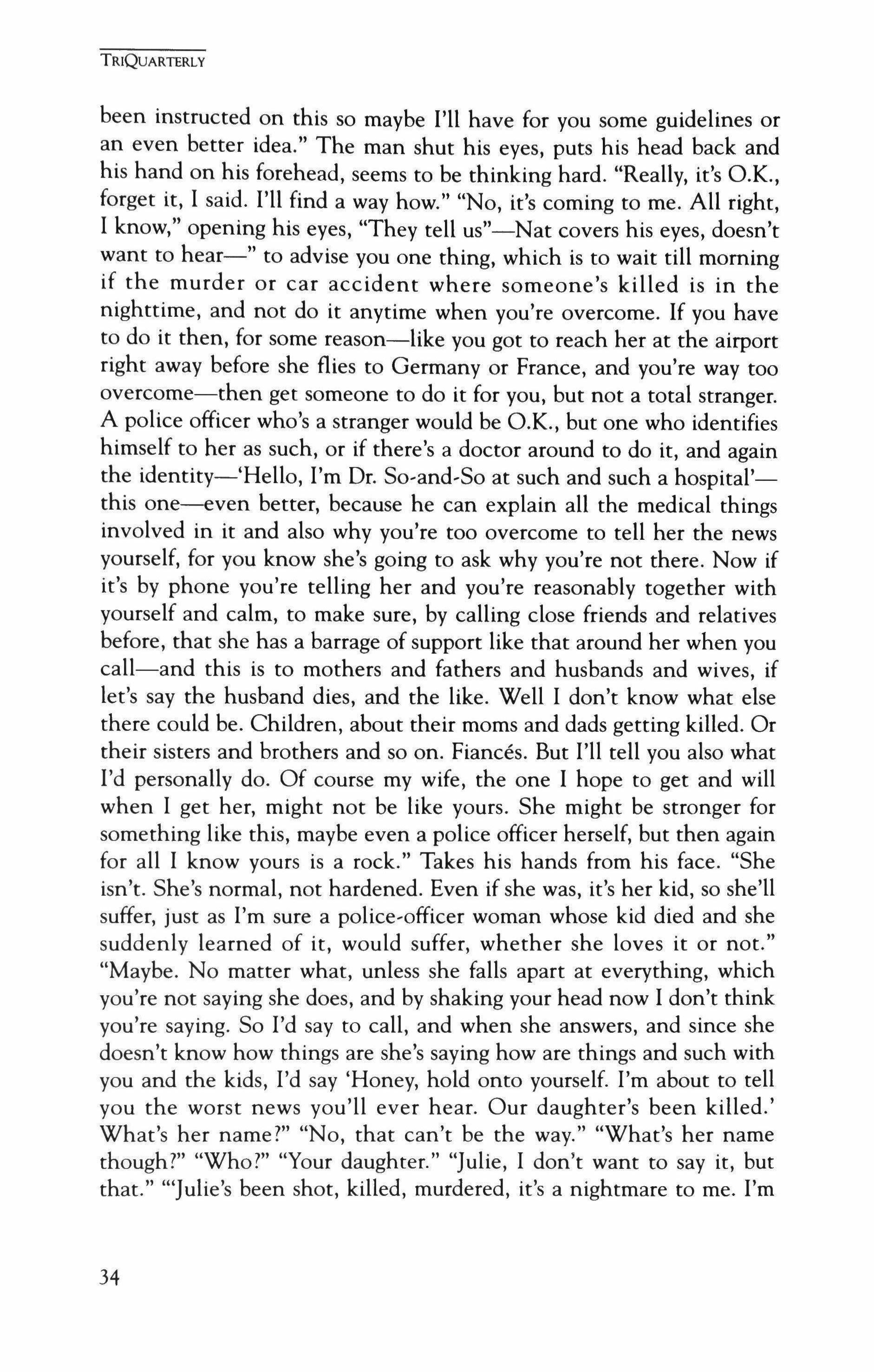
been instructed on this so maybe I'll have for you some guidelines or an even better idea." The man shut his eyes, puts his head back and his hand on his forehead, seems to be thinking hard. "Really, it's O.K., forget it, I said. I'll find a way how." "No, it's coming to me. All right, I know," opening his eyes, "They tell us"-Nat covers his eyes, doesn't want to hear-" to advise you one thing, which is to wait till morning if the murder or car accident where someone's killed is in the nighttime, and not do it anytime when you're overcome. If you have to do it then, for some reason-like you got to reach her at the airport right away before she flies to Germany or France, and you're way too overcome-then get someone to do it for you, but not a total stranger. A police officer who's a stranger would be O.K., but one who identifies himself to her as such, or if there's a doctor around to do it, and again the identity-'Hello, I'm Dr. So-and-So at such and such a hospital'this one-even better, because he can explain all the medical things involved in it and also why you're too overcome to tell her the news yourself, for you know she's going to ask why you're not there. Now if it's by phone you're telling her and you're reasonably together with yourself and calm, to make sure, by calling close friends and relatives before, that she has a barrage of support like that around her when you call-and this is to mothers and fathers and husbands and wives, if let's say the husband dies, and the like. Well I don't know what else there could be. Children, about their moms and dads getting killed. Or their sisters and brothers and so on. Fiances. But I'll tell you also what I'd personally do. Of course my wife, the one I hope to get and will when I get her, might not be like yours. She might be stronger for something like this, maybe even a police officer herself, but then again for all I know yours is a rock." Takes his hands from his face. "She isn't. She's normal, not hardened. Even if she was, it's her kid, so she'll suffer, just as I'm sure a police-officer woman whose kid died and she suddenly learned of it, would suffer, whether she loves it or not." "Maybe. No matter what, unless she falls apart at everything, which you're not saying she does, and by shaking your head now I don't think you're saying. So I'd say to call, and when she answers, and since she doesn't know how things are she's saying how are things and such with you and the kids, I'd say 'Honey, hold onto yourself. I'm about to tell you the worst news you'll ever hear. Our daughter's been killed.' What's her name?" "No, that can't be the way." "What's her name though?" "Who?" "Your daughter." "Julie, I don't want to say it, but that." "'Julie's been shot, killed, murdered, it's a nightmare to me. I'm
TRIQUARTERLY
34
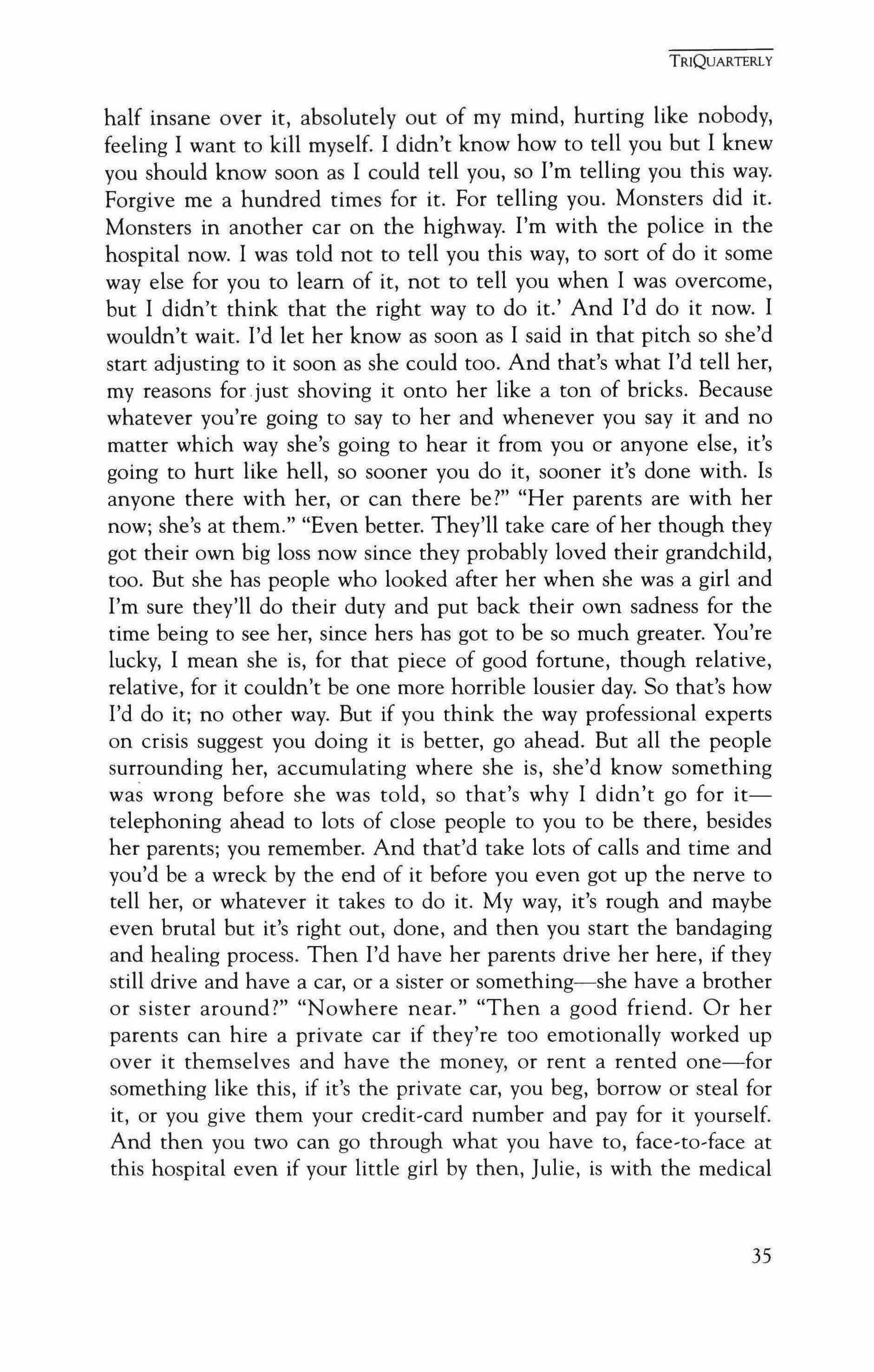
half insane over it, absolutely out of my mind, hurting like nobody, feeling I want to kill myself. I didn't know how to tell you but I knew you should know soon as I could tell you, so I'm telling you this way. Forgive me a hundred times for it. For telling you. Monsters did it. Monsters in another car on the highway. I'm with the police in the hospital now. I was told not to tell you this way, to sort of do it some way else for you to learn of it, not to tell you when I was overcome, but I didn't think that the right way to do it.' And I'd do it now. I wouldn't wait. I'd let her know as soon as I said in that pitch so she'd start adjusting to it soon as she could too. And that's what I'd tell her, my reasons for .just shoving it onto her like a ton of bricks. Because whatever you're going to say to her and whenever you say it and no matter which way she's going to hear it from you or anyone else, it's going to hurt like hell, so sooner you do it, sooner it's done with. Is anyone there with her, or can there be?" "Her parents are with her now; she's at them." "Even better. They'll take care of her though they got their own big loss now since they probably loved their grandchild, too. But she has people who looked after her when she was a girl and I'm sure they'll do their duty and put back their own sadness for the time being to see her, since hers has got to be so much greater. You're lucky, I mean she is, for that piece of good fortune, though relative, relative, for it couldn't be one more horrible lousier day. So that's how I'd do it; no other way. But if you think the way professional experts on crisis suggest you doing it is better, go ahead. But all the people surrounding her, accumulating where she is, she'd know something was wrong before she was told, so that's why I didn't go for ittelephoning ahead to lots of close people to you to be there, besides her parents; you remember. And that'd take lots of calls and time and you'd be a wreck by the end of it before you even got up the nerve to tell her, or whatever it takes to do it. My way, it's rough and maybe even brutal but it's right out, done, and then you start the bandaging and healing process. Then I'd have her parents drive her here, if they still drive and have a car, or a sister or something-she have a brother or sister around?" "Nowhere near." "Then a good friend. Or her parents can hire a private car if they're too emotionally worked up over it themselves and have the money, or rent a rented one-for something like this, if it's the private car, you beg, borrow or steal for it, or you give them your credit-card number and pay for it yourself. And then you two can go through what you have to, face-to-face at this hospital even if your little girl by then, Julie, is with the medical
TRIQUARTERLY
35
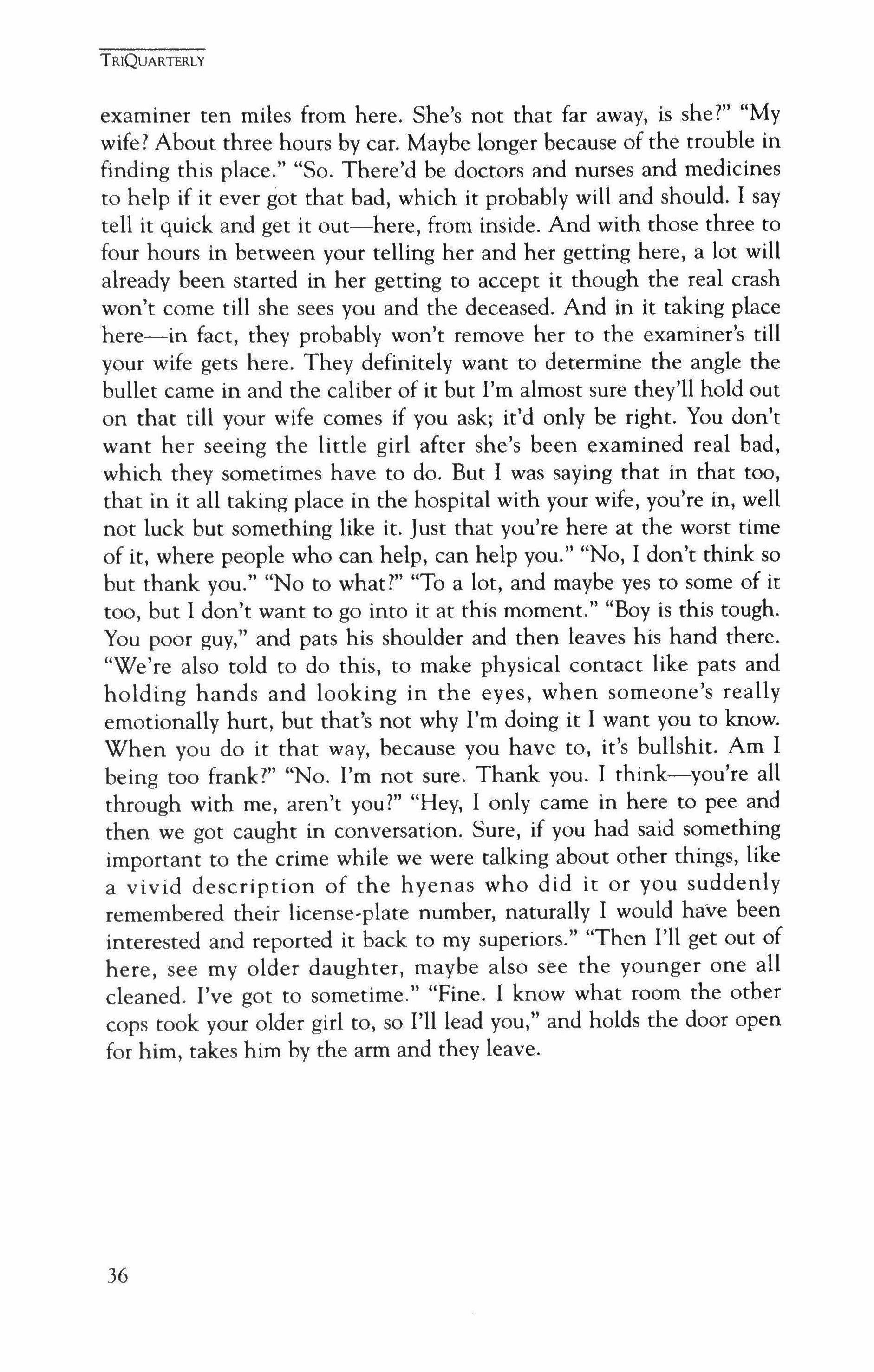
examiner ten miles from here. She's not that far away, is she?" "My wife? About three hours by car. Maybe longer because of the trouble in finding this place." "So. There'd be doctors and nurses and medicines to help if it ever got that bad, which it probably will and should. I say tell it quick and get it out-here, from inside. And with those three to four hours in between your telling her and her getting here, a lot will already been started in her getting to accept it though the real crash won't come till she sees you and the deceased. And in it taking place here-in fact, they probably won't remove her to the examiner's till your wife gets here. They definitely want to determine the angle the bullet came in and the caliber of it but I'm almost sure they'll hold out on that till your wife comes if you ask; it'd only be right. You don't want her seeing the little girl after she's been examined real bad, which they sometimes have to do. But I was saying that in that too, that in it all taking place in the hospital with your wife, you're in, well not luck but something like it. Just that you're here at the worst time of it, where people who can help, can help you." "No, I don't think so but thank you." "No to what?" "To a lot, and maybe yes to some of it too, but I don't want to go into it at this moment." "Boy is this tough. You poor guy," and pats his shoulder and then leaves his hand there. "We're also told to do this, to make physical contact like pats and holding hands and looking in the eyes, when someone's really emotionally hurt, but that's not why I'm doing it I want you to know. When you do it that way, because you have to, it's bullshit. Am I being too frank?" "No. I'm not sure. Thank you. I think-you're all through with me, aren't you?" "Hey, I only carne in here to pee and then we got caught in conversation. Sure, if you had said something important to the crime while we were talking about other things, like a vivid description of the hyenas who did it or you suddenly remembered their license-plate number, naturally I would have been interested and reported it back to my superiors." "Then I'll get out of here, see my older daughter, maybe also see the younger one all cleaned. I've got to sometime." "Fine. I know what room the other cops took your older girl to, so I'll lead you," and holds the door open for him, takes him by the arm and they leave.
TRIQUARTERLY
36
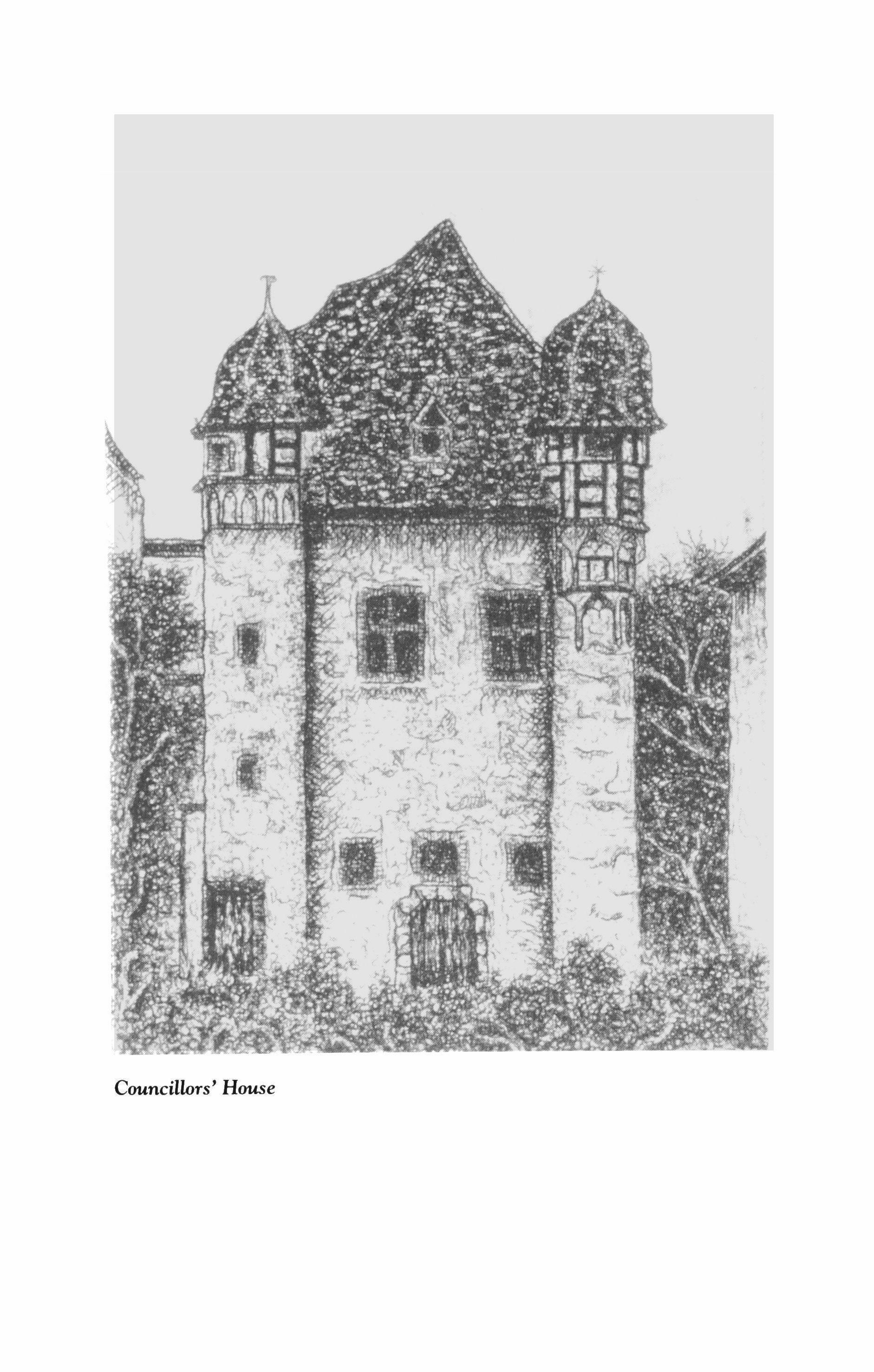
Councillors' House
K,Boy and 2 Bad
Katherine Min
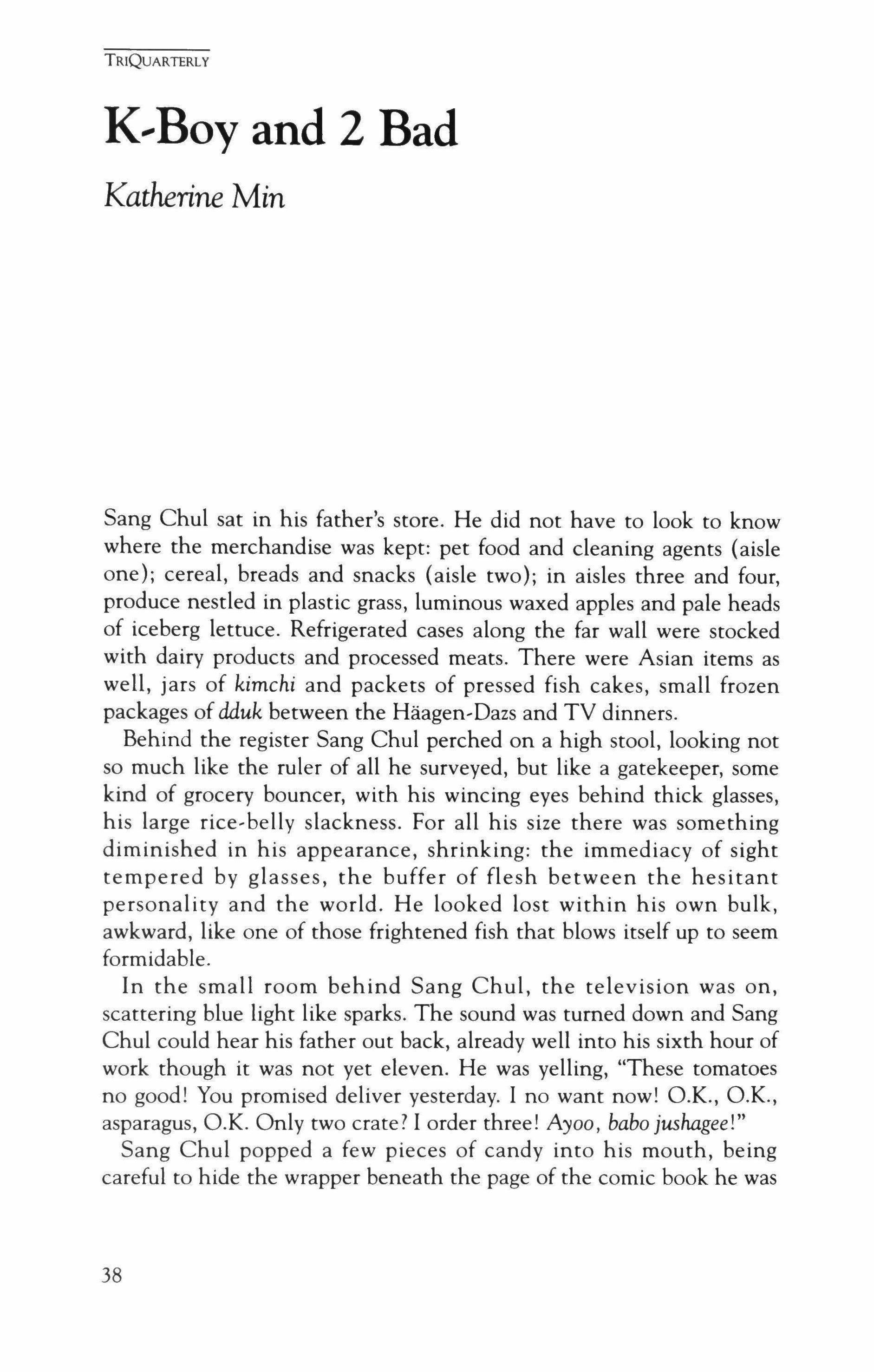
Sang Chul sat in his father's store. He did not have to look to know where the merchandise was kept: pet food and cleaning agents (aisle one); cereal, breads and snacks (aisle two); in aisles three and four, produce nestled in plastic grass, luminous waxed apples and pale heads of iceberg lettuce. Refrigerated cases along the far wall were stocked with dairy products and processed meats. There were Asian items as well, jars of kimchi and packets of pressed fish cakes, small frozen packages of dduk between the Haagen-Dazs and TV dinners.
Behind the register Sang Chul perched on a high stool, looking not so much like the ruler of all he surveyed, but like a gatekeeper, some kind of grocery bouncer, with his wincing eyes behind thick glasses, his large rice-belly slackness. For all his size there was something diminished in his appearance, shrinking: the immediacy of sight tempered by glasses, the buffer of flesh between the hesitant personality and the world. He looked lost within his own bulk, awkward, like one of those frightened fish that blows itself up to seem formidable.
In the small room behind Sang Chul, the television was on, scattering blue light like sparks. The sound was turned down and Sang Chul could hear his father out back, already well into his sixth hour of work though it was not yet eleven. He was yelling, "These tomatoes no good! You promised deliver yesterday. I no want now! O.K., O.K., asparagus, O.K. Only two crate? I order three! Ayoo, babo jushagee!"
Sang Chul popped a few pieces of candy into his mouth, being careful to hide the wrapper beneath the page of the comic book he was
TRIQUARTERLY
38
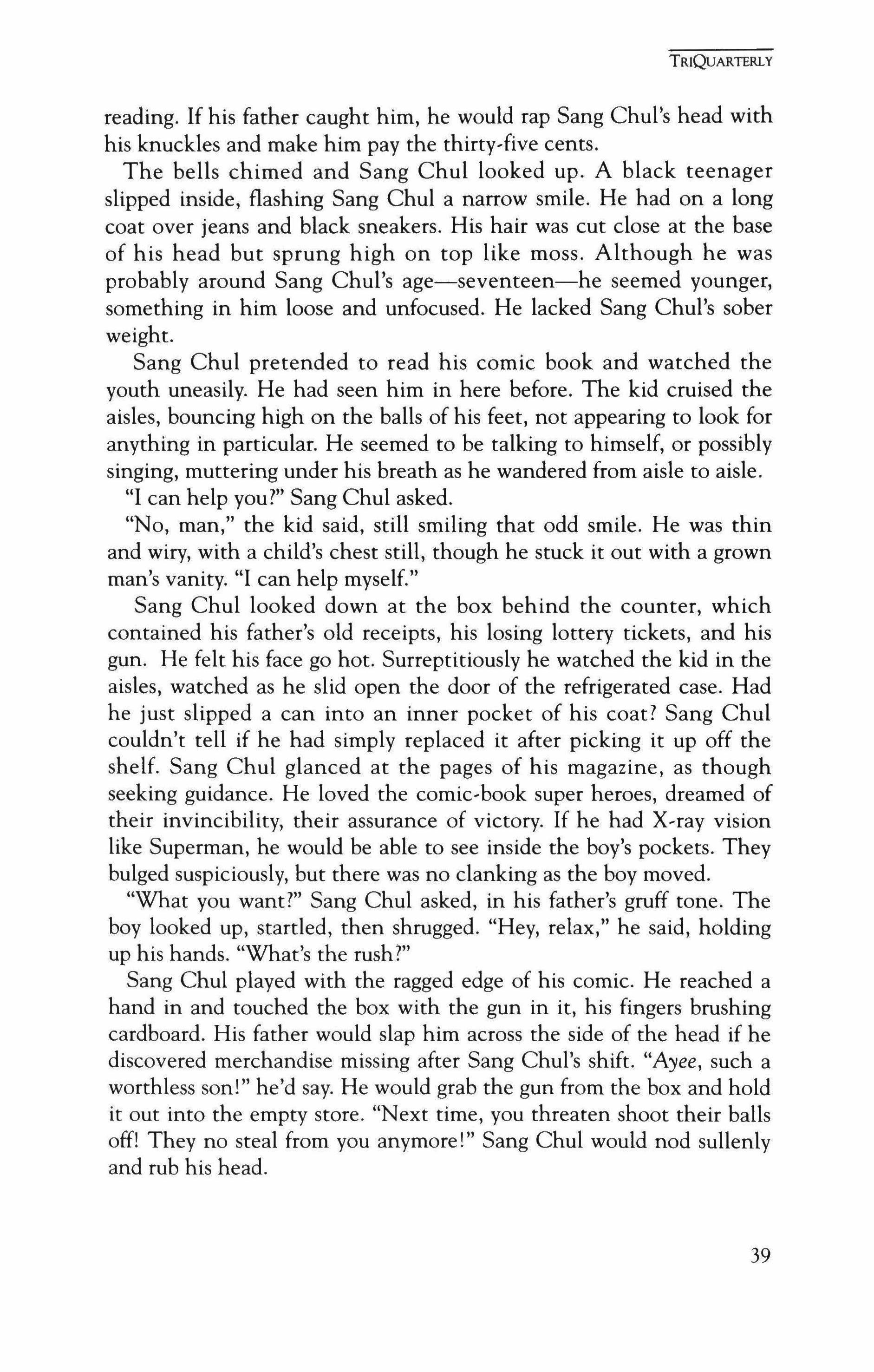
reading. If his father caught him, he would rap Sang Chul's head with his knuckles and make him pay the thirty-five cents.
The bells chimed and Sang Chul looked up. A black teenager slipped inside, flashing Sang Chul a narrow smile. He had on a long coat over jeans and black sneakers. His hair was cut close at the base of his head but sprung high on top like moss. Although he was probably around Sang Chul's age-seventeen-he seemed younger, something in him loose and unfocused. He lacked Sang Chul's sober weight.
Sang Chul pretended to read his comic book and watched the youth uneasily. He had seen him in here before. The kid cruised the aisles, bouncing high on the balls of his feet, not appearing to look for anything in particular. He seemed to be talking to himself, or possibly singing, muttering under his breath as he wandered from aisle to aisle.
"I can help you?" Sang Chul asked.
"No, man," the kid said, still smiling that odd smile. He was thin and wiry, with a child's chest still, though he stuck it out with a grown man's vanity. "I can help myself."
Sang Chul looked down at the box behind the counter, which contained his father's old receipts, his losing lottery tickets, and his gun. He felt his face go hot. Surreptitiously he watched the kid in the aisles, watched as he slid open the door of the refrigerated case. Had he just slipped a can into an inner pocket of his coat? Sang Chul couldn't tell if he had simply replaced it after picking it up off the shelf. Sang Chul glanced at the pages of his magazine, as though seeking guidance. He loved the comic-book super heroes, dreamed of their invincibility, their assurance of victory. If he had X-ray vision like Superman, he would be able to see inside the boy's pockets. They bulged suspiciously, but there was no clanking as the boy moved.
"What you want?" Sang Chul asked, in his father's gruff tone. The boy looked up, startled, then shrugged. "Hey, relax," he said, holding up his hands. "What's the rush?"
Sang Chul played with the ragged edge of his comic. He reached a hand in and touched the box with the gun in it, his fingers brushing cardboard. His father would slap him across the side of the head if he discovered merchandise missing after Sang Chul's shift. "Ayee, such a worthless son!" he'd say. He would grab the gun from the box and hold it out into the empty store. "Next time, you threaten shoot their balls off! They no steal from you anymore!" Sang Chul would nod sullenly and rub his head.
TRIQUARTERLY
39

There was a low candy display in the store, beneath the counter, with open boxes of chocolate bars, rectangular packages of gum and hard, fruit-flavored candies. It was here he had to watch, because the kids would come in and reach below his line of vision, tuck candy bars into the pockets of their jeans, grab handfuls of loose penny candy and slip it into the waistbands of their underwear. His father had had a mirror up, to watch their hands, but it had gotten broken in a robbery two weeks before. The kid was over here now, right in front of Sang Chul, his eyes lowered and scanning the shelves. He smiled at Sang Chul again, slyly, with a look of pure enjoyment. Sang Chul tried to watch the boy's hands without seeming to lean across the counter. He could not tell if they had reached into a box or not, could not see well enough to know for certain if the boy had taken anything.
Sang Chul wished somebody would come in, or that his father would come back. His eyes came to rest on the comic book, at the intricately drawn apparatus of some super villain. Sang Chul had been recently trying to draw some comics of his own, had even made up his own super hero called K,Boy whose amazing ability at taekwondo was aided by jet-propelled devices on his feet that would send out searing death rays on contact. K,Boy was a muscular version of Sang Chul, without glasses, of course, and he had a super Chindo dog whose bite con, tained a rare fatal toxin.
"You want your money?" the kid said, causing Sang Chul to jump. He was staring at him, a bottle of Pepsi in his hand, the change on the counter.
"Svsorry," Sang Chul said, ringing it up. The money was warm and slightly moist.
The kid put his hands deep into his coat pockets and smiled at Sang Chul again. "Want some?" he asked, holding up an open bag of M&Ms.
Sang Chul blinked and stared at the candy. A feeling of excitement, of danger, charged through him. He felt the sweat in a stripe down his back, his Lakers shirt sticking unpleasantly against him. The kid shook the bag on the counter and two red M&Ms rolled out. From out back, Sang Chul could hear his father. "One-eighteen, ninety? No way. Yesterday you tell me 'one-oh-nine even.' I no pay more. Bandit! Aigo
Sang Chul picked up an M&M.
"All right," the boy said. He watched Sang Chul carefully. His face seemed solicitous, considerate.
TRIQUARTERLY
40
Sang Chul slipped the candy into his mouth. The kid nodded.
"Thank you," Sang Chul said.
"No, thank you," the kid said, and slipped out the door.

Jakeellaughed, displaying fine teeth like seed pearls. He was sitting on a low wall by the side of the playground, drinking his Pepsi. Howard and BB were there, and Earl Dwyer with the ball in his hand, their faces lit with sweat and sun.
". so then I twisted the wires, put my foot on the gas, and that baby started purring like a kitten
The boys laughed. "What car was this now, 2 Bad?"
"Jag XJ'S. Red with black leather interior." Jakeel took a swig of soda, wiped his mouth with the back of a nonchalant hand. "And the steering wheel was solid gold, man. I ain't kidding. Fucking solid!"
Howard snorted and pushed Jakeel off the wall. "Shit, who do you think we are? Solid gold steering shit!"
BB looked from Jakeel to Howard anxiously. "Could've been, Howard. This was, where? Over in the Hills, wasn't it, 2 Bad?"
Jakeel nodded. "Drove that sucker all night. Just cruising down to San Pedro, engine humming all the way I tell you, man, it was like a dream."
"That's 'cause it was a dream," said Howard. "Only way you be stealing cars is when you're asleep!"
Jakeel shrugged. "O.K., don't believe me
"Tell you what," Howard said, with a sly smile. "I'll believe you when I see you. You take me out some night, show me how it's done. I got my eye on a silver Rolls I seen parked outside a restaurant on Sunset."
Jakeel kicked at a chunk of asphalt. He looked Howard in the eye, cool and level. "One of these nights, man," he said, smiling his narrow smile, "sure, we'll go for a ride."
BB grinned. "You show him, 2 Bad!"
"We playing some more?" Earl Dwyer said, dribbling the basketball in a tight circle around his body. "Come on!"
Jakeel tipped his soda to get the last swallow. "I gotta be going," he said. "Things to do."
Howard laughed derisively. "Like what? Set the dinner table? Scrub the floor? Your mama got you on a leash."
TRIQUARTERLY
* * *
41
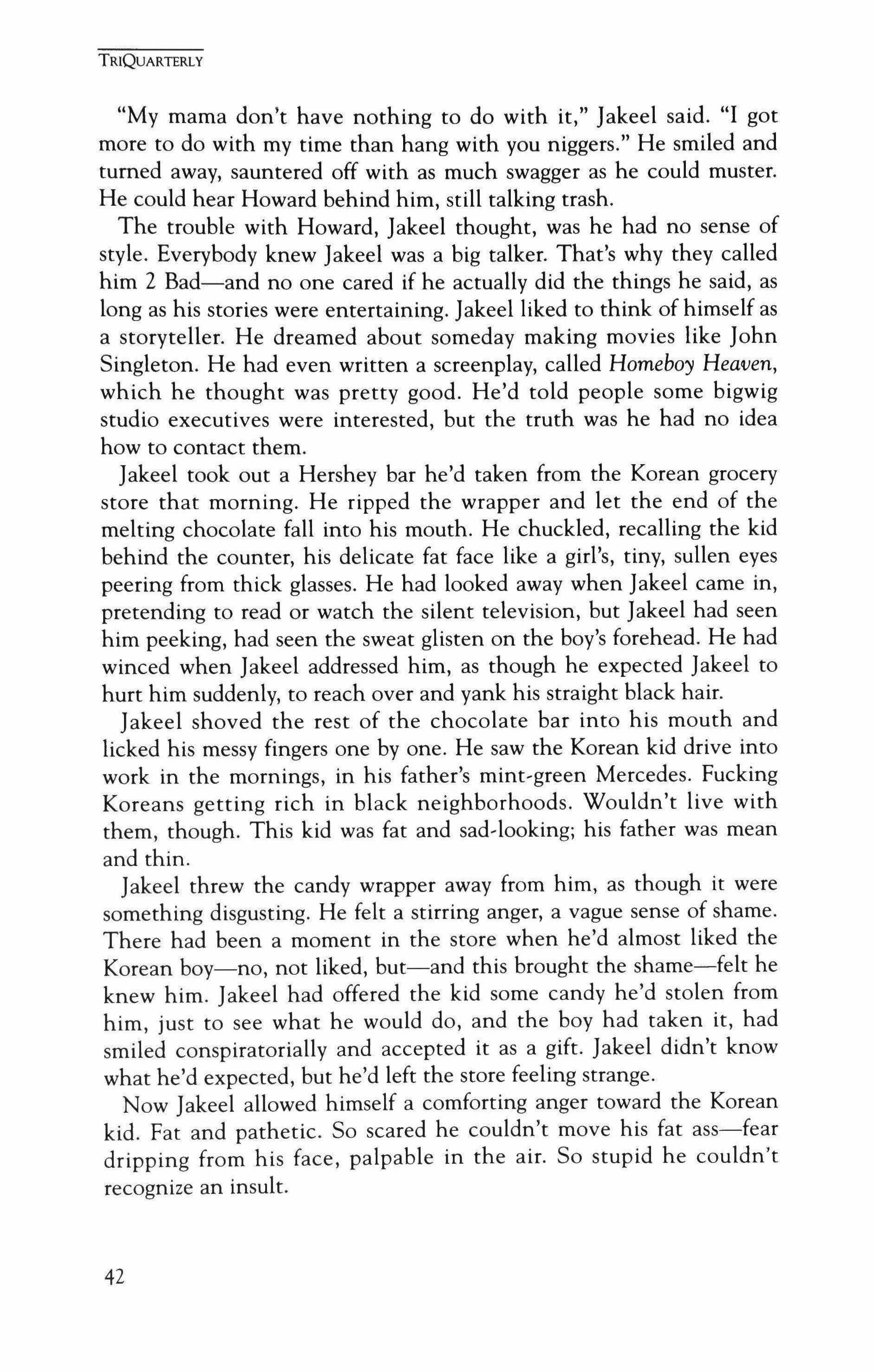
"My mama don't have nothing to do with it," Jakeel said. "I got more to do with my time than hang with you niggers." He smiled and turned away, sauntered off with as much swagger as he could muster. He could hear Howard behind him, still talking trash.
The trouble with Howard, Jakeel thought, was he had no sense of style. Everybody knew Jakeel was a big talker. That's why they called him 2 Bad-and no one cared if he actually did the things he said, as long as his stories were entertaining. [akeel liked to think of himself as a storyteller. He dreamed about someday making movies like John Singleton. He had even written a screenplay, called Homeboy Heaven, which he thought was pretty good. He'd told people some bigwig studio executives were interested, but the truth was he had no idea how to contact them.
Jakeel took out a Hershey bar he'd taken from the Korean grocery store that morning. He ripped the wrapper and let the end of the melting chocolate fall into his mouth. He chuckled, recalling the kid behind the counter, his delicate fat face like a girl's, tiny, sullen eyes peering from thick glasses. He had looked away when Jakeel came in, pretending to read or watch the silent television, but Jakeel had seen him peeking, had seen the sweat glisten on the boy's forehead. He had winced when Jakeel addressed him, as though he expected Jakeel to hurt him suddenly, to reach over and yank his straight black hair.
Jakeel shoved the rest of the chocolate bar into his mouth and licked his messy fingers one by one. He saw the Korean kid drive into work in the mornings, in his father's mint-green Mercedes. Fucking Koreans getting rich in black neighborhoods. Wouldn't live with them, though. This kid was fat and sad-looking; his father was mean and thin.
Jakeel threw the candy wrapper away from him, as though it were something disgusting. He felt a stirring anger, a vague sense of shame. There had been a moment in the store when he'd almost liked the Korean boy-no, not liked, but-and this brought the shame-felt he knew him. Jakeel had offered the kid some candy he'd stolen from him, just to see what he would do, and the boy had taken it, had smiled conspiratorially and accepted it as a gift. Jakeel didn't know what he'd expected, but he'd left the store feeling strange.
Now Jakeel allowed himself a comforting anger toward the Korean kid. Fat and pathetic. So scared he couldn't move his fat ass-fear dripping from his face, palpable in the air. So stupid he couldn't recognize an insult.
TRIQUARTERLY
42

Jakeellet his hand flap against the wrought,iron fence as he walked. He passed the brightly spray-painted side of a liquor store, the barred windows and open doors. He greeted some old men who were sitting on their front stoops. "Hey, Mr. Robley. Hey, Mr. Alton, Mr. Turner." He passed through the courtyard of the housing project where he lived, passed the torn fence that hung over the sidewalk. His mother and some other women had planted geraniums in green rectangular trays and put them in their windows. They gave the concrete some color. His mother and the others had also covered graffiti in the entryway with dark beige paint and replaced the shot-out lights. But the elevator remained out of order, and bags of garbage spilled out across the foyer.
Jakeel climbed the steps to the apartment on the seventh floor. His mother had gotten a neighborhood committee together; they'd attracted the attention of local politicians, been featured on the evening news. She'd gotten rid of the junkies who used to sleep on the stairs, evicted the drug dealers who'd hang in the courtyards as her children went to school in the mornings. "High time we took back our homes," she'd said with the cameras on her, a large woman with broad cheeks and bulging eyes that seemed to scan the atmosphere for signs of trouble, like antennae.
Jakeel was proud of her for her activities, though it embarrassed him among his friends, and sometimes even brought trouble. Word was that Willy D. and Tig were going to bring him down, get even with his mother that way. Jakeel had been afraid to go out with the others, had gotten himself a gun from a friend, but a few weeks went by and Willy D. was busted and Tig got himself shot up in a gang war down in Compton.
"Hey, son," his mother said as she unlocked the front door for him.
"Hey, Mama," said Jakeel, swerving to deflect her hug. The apart, ment had a reassuring feminine smell, of talcum powder and floral perfume, and some kind of cleaner his mother used on the floor.
Jakeel's sisters, Crystal and Charleen, were sitting side by side on the couch, their braided hair in pink barrettes that waved above their heads. "Hello, Jakeel," they said, without looking up from the television. Jakeel smiled at them. "Hey, little girls," he said. He took out a box of Milk Duds and some pieces of bubble gum and handed them over. "Whatch'you watching?"
"Oprah," they said, again in unison. Crystal giggled, showing missing teeth. Charleen hid her smile behind a hand. "Thanks, Jakeel!" They
TRIQUARTERLY
43
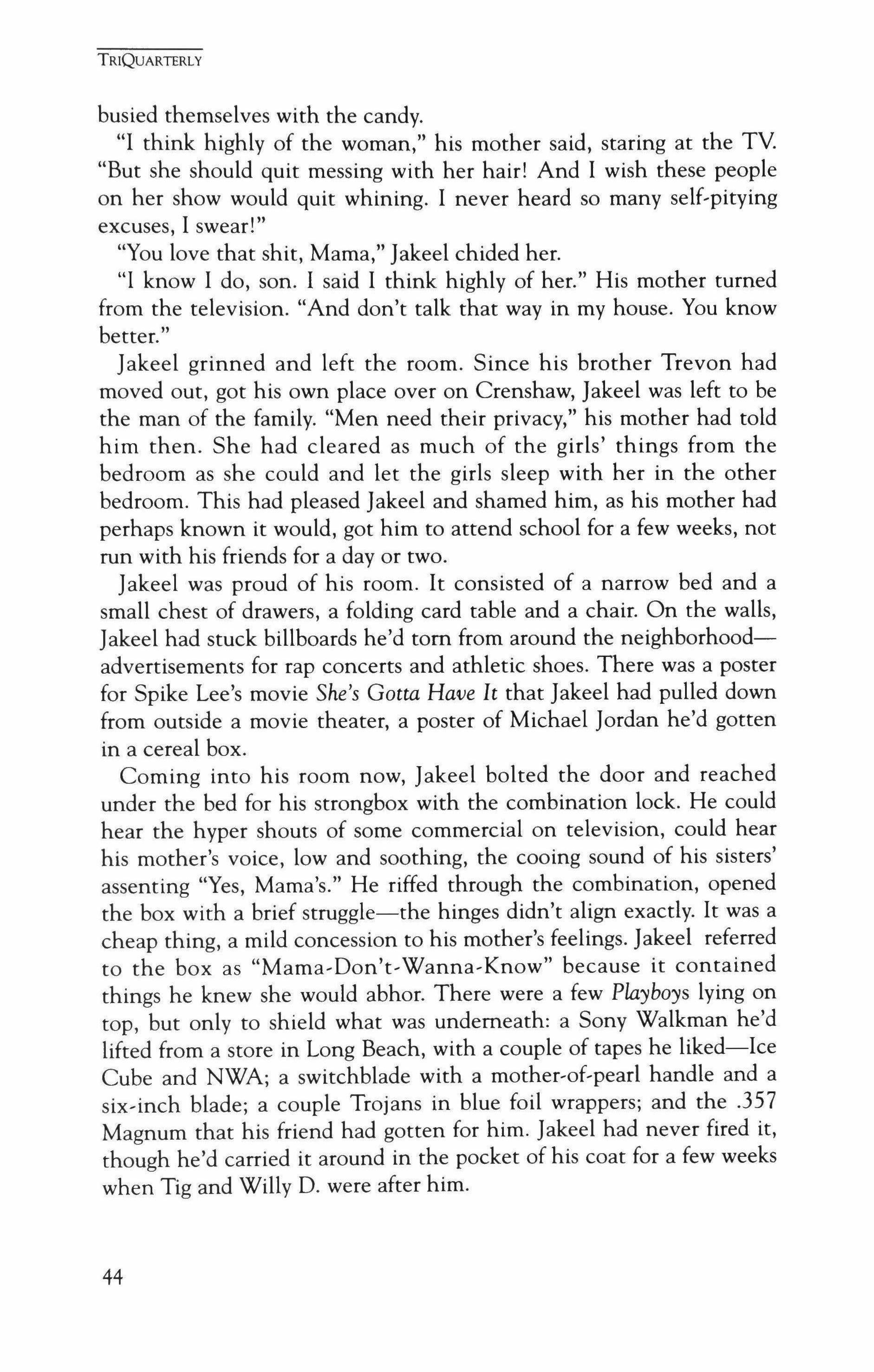
busied themselves with the candy.
"I think highly of the woman," his mother said, staring at the TV. "But she should quit messing with her hair! And I wish these people on her show would quit whining. I never heard so many self-pitying excuses, I swear!"
"You love that shit, Mama," Jakeel chided her.
"I know I do, son. I said I think highly of her." His mother turned from the television. "And don't talk that way in my house. You know better."
Jakeel grinned and left the room. Since his brother Trevon had moved out, got his own place over on Crenshaw, Jakeel was left to be the man of the family. "Men need their privacy," his mother had told him then. She had cleared as much of the girls' things from the bedroom as she could and let the girls sleep with her in the other bedroom. This had pleased Jakeel and shamed him, as his mother had perhaps known it would, got him to attend school for a few weeks, not run with his friends for a day or two.
Jakeel was proud of his room. It consisted of a narrow bed and a small chest of drawers, a folding card table and a chair. On the walls, Jakeel had stuck billboards he'd torn from around the neighborhoodadvertisements for rap concerts and athletic shoes. There was a poster for Spike Lee's movie She's Gotta Have It that Jakeel had pulled down from outside a movie theater, a poster of Michael Jordan he'd gotten in a cereal box.
Coming into his room now, Jakeel bolted the door and reached under the bed for his strongbox with the combination lock. He could hear the hyper shouts of some commercial on television, could hear his mother's voice, low and soothing, the cooing sound of his sisters' assenting "Yes, Mama's." He riffed through the combination, opened the box with a brief struggle-the hinges didn't align exactly. It was a cheap thing, a mild concession to his mother's feelings. Jakeel referred to the box as "Mama'Don't,Wanna,Know" because it contained things he knew she would abhor. There were a few Playboys lying on top, but only to shield what was underneath: a Sony Walkman he'd lifted from a store in Long Beach, with a couple of tapes he liked-Ice Cube and NWA; a switchblade with a mother-of-pearl handle and a six,inch blade; a couple Trojans in blue foil wrappers; and the .357 Magnum that his friend had gotten for him. Jakeel had never fired it, though he'd carried it around in the pocket of his coat for a few weeks when Tig and Willy D. were after him.
TRIQUARTERLY
44
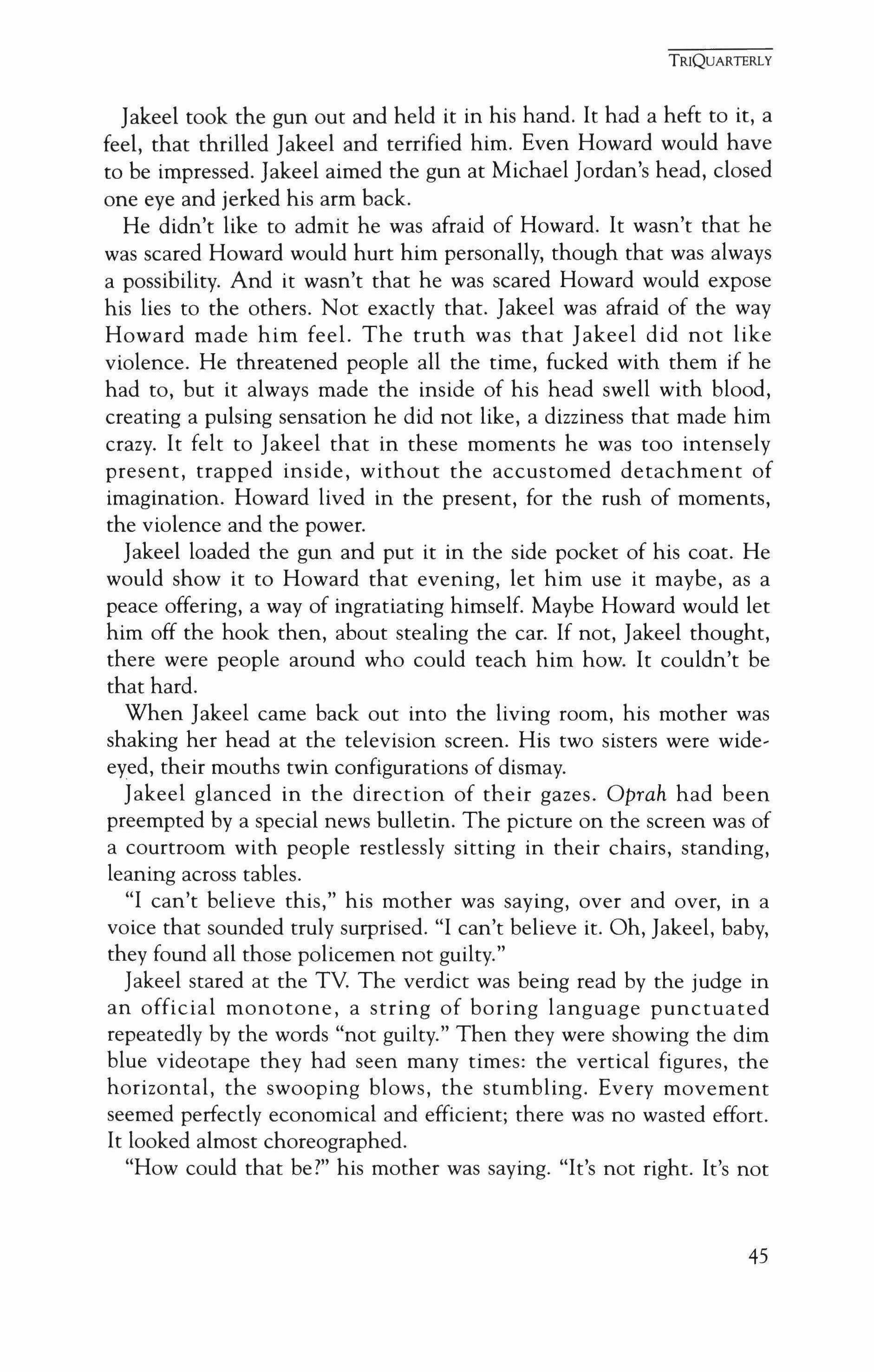
Jakeel took the gun out and held it in his hand. It had a heft to it, a feel, that thrilled Jakeel and terrified him. Even Howard would have to be impressed. Jakeel aimed the gun at Michael Jordan's head, closed one eye and jerked his arm back.
He didn't like to admit he was afraid of Howard. It wasn't that he was scared Howard would hurt him personally, though that was always a possibility. And it wasn't that he was scared Howard would expose his lies to the others. Not exactly that. Jakeel was afraid of the way Howard made him feel. The truth was that Jakeel did not like violence. He threatened people all the time, fucked with them if he had to, but it always made the inside of his head swell with blood, creating a pulsing sensation he did not like, a dizziness that made him crazy. It felt to Jakeel that in these moments he was too intensely present, trapped inside, without the accustomed detachment of imagination. Howard lived in the present, for the rush of moments, the violence and the power.
Jakeel loaded the gun and put it in the side pocket of his coat. He would show it to Howard that evening, let him use it maybe, as a peace offering, a way of ingratiating himself. Maybe Howard would let him off the hook then, about stealing the car. If not, Jakeel thought, there were people around who could teach him how. It couldn't be that hard.
When Jakeel came back out into the living room, his mother was shaking her head at the television screen. His two sisters were wide, eyed, their mouths twin configurations of dismay.
Jakeel glanced in the direction of their gazes. Oprah had been preempted by a special news bulletin. The picture on the screen was of a courtroom with people restlessly sitting in their chairs, standing, leaning across tables.
"I can't believe this," his mother was saying, over and over, in a voice that sounded truly surprised. "I can't believe it. Oh, Jakeel, baby, they found all those policemen not guilty."
[akeel stared at the TV. The verdict was being read by the judge in an official monotone, a string of boring language punctuated repeatedly by the words "not guilty." Then they were showing the dim blue videotape they had seen many times: the vertical figures, the horizontal, the swooping blows, the stumbling. Every movement seemed perfectly economical and efficient; there was no wasted effort. It looked almost choreographed.
"How could that be?" his mother was saying. "It's not right. It's not
TRIQUARTERLY
45
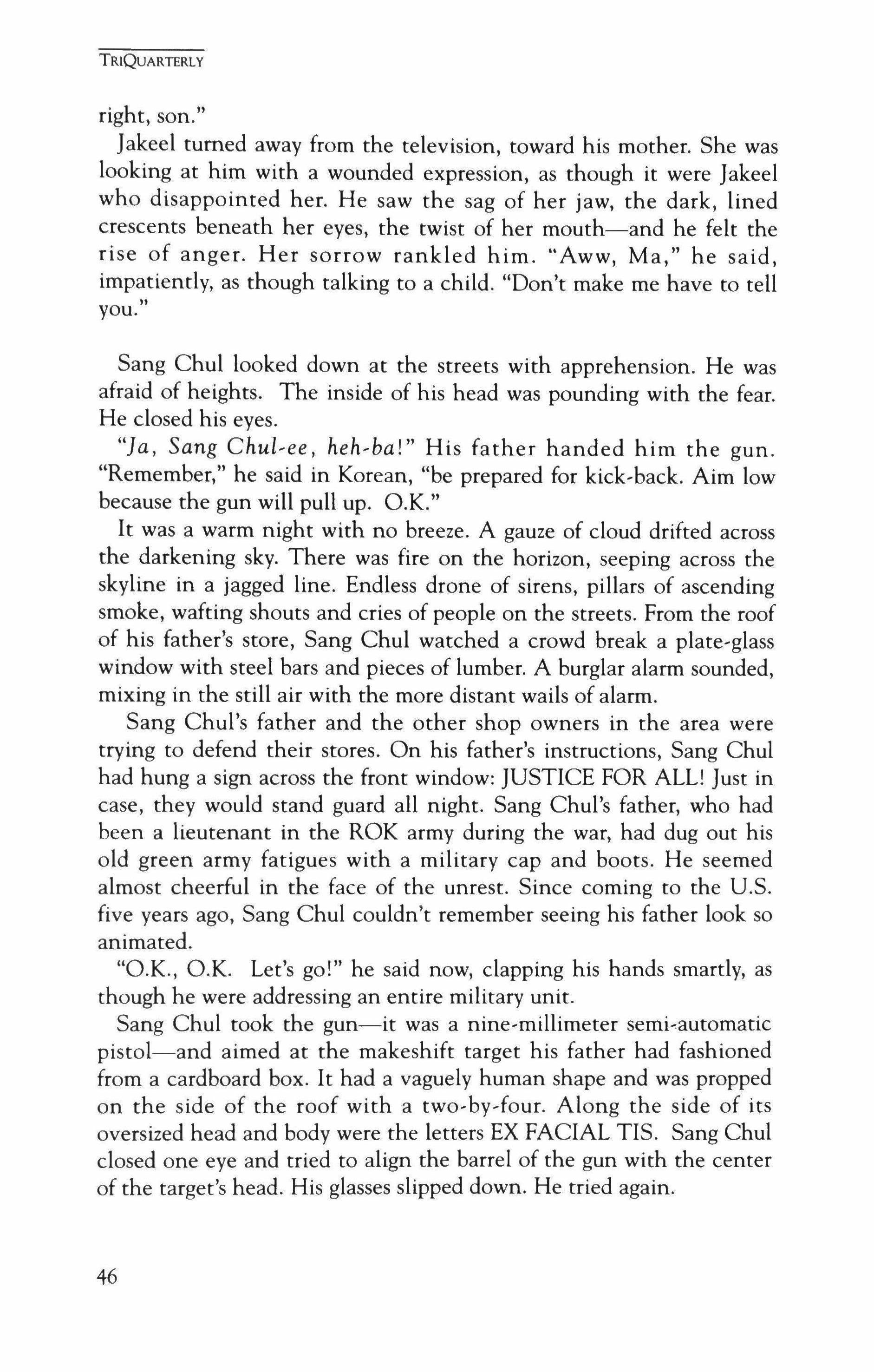
right, son."
Jakeel turned away from the television, toward his mother. She was looking at him with a wounded expression, as though it were Jakeel who disappointed her. He saw the sag of her jaw, the dark, lined crescents beneath her eyes, the twist of her mouth-and he felt the rise of anger. Her sorrow rankled him. "Aww, Ma," he said, impatiently, as though talking to a child. "Don't make me have to tell you."
Sang Chul looked down at the streets with apprehension. He was afraid of heights. The inside of his head was pounding with the fear. He closed his eyes.
"[a, Sang Chui-ee heh,ba!" His father handed him the gun. "Remember," he said in Korean, "be prepared for kick,back. Aim low because the gun will pull up. O.K."
It was a warm night with no breeze. A gauze of cloud drifted across the darkening sky. There was fire on the horizon, seeping across the skyline in a jagged line. Endless drone of sirens, pillars of ascending smoke, wafting shouts and cries of people on the streets. From the roof of his father's store, Sang Chul watched a crowd break a plate-glass window with steel bars and pieces of lumber. A burglar alarm sounded, mixing in the still air with the more distant wails of alarm.
Sang Chul's father and the other shop owners in the area were trying to defend their stores. On his father's instructions, Sang Chul had hung a sign across the front window: JUSTICE FOR ALL! Just in case, they would stand guard all night. Sang Chul's father, who had been a lieutenant in the ROK army during the war, had dug out his old green army fatigues with a military cap and boots. He seemed almost cheerful in the face of the unrest. Since coming to the U.S. five years ago, Sang Chul couldn't remember seeing his father look so animated.
"O.K., O.K. Let's go!" he said now, clapping his hands smartly, as though he were addressing an entire military unit.
Sang Chul took the gun-it was a nine-millimeter semi-automatic pistol-and aimed at the makeshift target his father had fashioned from a cardboard box. It had a vaguely human shape and was propped on the side of the roof with a two-by-four. Along the side of its oversized head and body were the letters EX FACIAL TIS. Sang Chul closed one eye and tried to align the barrel of the gun with the center of the target's head. His glasses slipped down. He tried again.
TRIQUARTERLY
46

"Stop, stop, stop," his father shouted. He stepped forward and seized Sang Chul's arm. "Like this," he said, slapping Sang Chul on the side of the head. "Aigo, stupid boy!"
Sang Chul tried again. His eyes teared with the intensity of his focus, blurring and obscuring his vision. He shot, knocked back by the force of the gun's backward motion. The loudness of the report rang in his ears. He shrank from the edge of the roof so no one, looking up, could see him up there, the lone marksman. His father went to the target and exclaimed, disgusted, when he could find no hole.
The comic-book heroes that Sang Chul admired-Spiderman, The Incredible Hulk, Captain America-had no use, it seemed, for guns. Their clever bodies came equipped with natural protections, enclosed systems for attack, maneuver and escape. They had the benefits of subterfuge and clear mental and physical superiority. Never before had Sang Chul realized how far he was from his fantasies. He was fat, clumsy and inept. There would be no miraculous transformation.
"You miss completely!" his father was saying, shaking his head. "Stupid boy. Try again."
Sang Chul raised the gun in both hands this time, to control the shaking, and this time he imagined the target was his father, the rough contour marking the narrow, silver-haired head, the cardboard face drawn with his father's contemptuous smirk and mocking eyes. He imagined it was his mother's face, beautiful-pale and smooth as porcelain-red,rimmed from crying on the day she'd left them for a wealthy American jeweler from Redondo Beach. He imagined it was everyone who had given him trouble since he'd moved here, called him names, beat him up, looked at him with derision, or spoke to him in condescending words they thought he could not understand. All the hate and rage that seethed in the boy, inexpressible in the languages of his old country and his new, all the frustration, the feeling of helplessness-for he had never wanted to leave Korea in the first place, had never asked to come here where he did not belong-all the stockpiled emotion he had been carrying inside, seemed to gather in the muscles of his arms at that moment, to burrow into the pistol he carried, squeezing out the trigger and straight into the target, exploding a hole in the cardboard head with the force of his will.
"Good, good," his father cried, clapping Sang Chul hard on the back, though this time with pleasure. "Now you are ready!"
There was an air of holiday in the streets. People were everywhere,
TRIQUARTERLY
47

standing around, staring, running. Fires were burning all across the city, sending down sparks and smoking ash like extinguishing fireworks displays. Jakeel winced into the brightness of the flames. The streets looked different illuminated in this crazy way, in oranges and black, dancing fire and shadows intertwining. Glass sparkled like jewels on the sidewalks.
"Look at this," Jakeel said in amazement. "It's like Disneyland!"
"Yeah," Howard slapped him on the back,"and you're fucking Mickey Mouse!"
The boys followed the crowd. People were running into stores and grabbing things: clothes, bottles of liquor, jewelry and cassette tapes. It was like a scavenger hunt, a once-in-a-lifetime close-out sale. There was almost a panic as a store was broken into, people rushing inwild-eyed consumers-scanning shelves and lunging for merchandise. They would carry a load in their arms, drop it when they saw something else they wanted.
"They shouldn't be doing this," Jakeel said at first. "This is supposed to be about justice."
Howard shook his head. "You don't get it, do you, 2 Bad? The law don't apply to us, that's what this is all about, man. We don't get justice, so we don't live by the law."
Jakeel felt uncertain. He watched as a woman ran by clutching a slipping pile of dresses. One or two fell to the ground and were snatched up by the people behind her. Jakeel saw whites and blacks, Hispanics, Asians; it was a melting pot of greed.
"Aw, 2 Bad," Howard said, his eyes narrowing unpleasantly, "you disapprove of this shit? You getting morally outraged, think you're some kind of Boy Scout?"
Jakeel hesitated, then gave Howard his meanest look. "Hell, no," he said. "I'm down with you, bro. Take a look." He took the gun from his pocket.
Howard whistled. "Hey! Give it over here, let me see." He held the gun up; it looked smaller in his large hand. "Now this is a motherfucking gun!" he said, admiringly. He held it out and aimed it. "Yeah, 2 Bad, let me hang on to this for a while."
"O.K.," said Jakeel. He smiled at Howard and beckoned. "Now come on, I know where we can go to have us some real fun
Sang Chul and his father moved down from the roof to patrol the sidewalk outside the store. Around them, fires burned, mobs assembled.
TRIQUARTERLY
48

Sang Chul felt almost faint with tension. His face was so shiny with sweat that his glasses would not stay on, he kept pushing them up every few seconds, peering woefully out until they would slip down again.
Some people had yelled at them. "Fucking Koreans, go home! We don't need your greedy yellow ass!" And his father had threatened one man in a Raiders cap, warning him off with his rifle. "I support this neighborhood!" his father had said. "I always help black peoples." So far, the store had remained untouched.
Sang Chul's father had parked his Mercedes around back, but he worried about it a great deal and kept peeking around the comer to catch sight of it. Whenever he walked to the comer, at the farthest point from Sang Chul, who was instructed to stay on the far side of the store, Sang Chul felt uneasy, abandoned. He clutched the gun tighter and imagined he was back in Seoul eating noodles with his cousins, or rummaging through boxes of comics at the bookstore in Taegyero. He remembered eating roasted sweet potatoes in the alley near his house and watching his mother do the laundry. His father used to take him to movies then, martial-arts films on rasping projectors, in theaters with heavy red-velvet curtains. They used to go to Taechon in the summertime, camping on the beach and swimming in the cold water of the Yellow Sea.
It was becoming hard for Sang Chul to remember what Korea had been like, what it had meant to feel totally at ease in a place. That life seemed like someone else's now, scenes he had witnessed from the other side of a peephole, watched with a blinking guilt and overwhelming longing.
"Yo, Fat Boy! That you?"
Sang Chul squinted, pushed his glasses up.
'S me. Your man. Remember?"
He saw two teenagers. The one on the right was the one who had been in the store this morning. Sang Chul remembered the long coat with the pockets. He blinked and held the gun out.
"You ain't gonna shoot me, are you, Fat Boy?" The boy's voice was taunting, merry. "I thought we was friends."
The big kid, in a black-hooded sweatshirt, laughed. "Ain't it against your religion to kill us?" he said. "Like you won't be re-in-carnated into shit, you smoke somebody? Am I right, 2 Bad?"
The kid in the long coat nodded. "That's right." He pointed a finger at Sang Chul. "You kill me, you be re-in-carnated into fly shit, Fat Boy. You hear me?"
TRlQuARTERLY
49

"No speakee English." Howard stepped closer to Sang Chul. "What you got that gun for, boy? You ain't got the guts to use it."
Sang Chul looked desperately over at his father, who was on the other side of the store with his back toward him. He did not want to move, did not want to betray his terror. He needed, suddenly, to pee very badly. From somewhere in back of them, there was the sound of shattering glass. He felt his heartbeat rush to his throat. He heard his father shout, saw him disappearing around the corner. In his head, Sang Chul saw the Mercedes, its windshield smashed front and back like spiderwebs in the dew. He felt a small tick of satisfaction, before the return to fear.
"Hey, Fat Boy, I'm thirsty! Open up and let us have a Coke!"
"Yeah, man. What you closed for? It's too early!"
Sang Chul stood his ground, watched the boys dance around him, circling, jumping, closer and then back. He watched their faces, bright with amusement and their sense of their own wit.
"We'll help protect your store, man," Jakeel coaxed. "Look, show him, Howard." Howard pointed to the gun in his belt. "We're your friends."
"Come on, let us in." Jakeel was pleading with him, his face almost kind. Sang Chul remembered this morning when the kid had offered him the candy. He felt the same confusion he had then, the complete willingness to be taken in. The boy's face was gleaming, his eyes bright with confidence, focusing on Sang Chul with an intensity, like a spotlight. Something in Sang Chul didn't care if he was being made a fool of, if the boy's words were insincere, as long as he could remain in the dark center of that regard.
Sang Chul smiled at the boys now. He would let them in, let them take what they wanted. Then they would really like him. He got his keys out and started to unlock the door.
"Hey, all right, Fat Boy!" Jakeel said, looking at Howard. "You're all right!"
Howard grinned and shook his head. "This is beautiful, man!"
Sang Chul pushed down on the latch and the door opened.
"Sang Chul-ee!" Sang Chul slammed the door closed at the sound of his father's voice. He turned and saw him running around the comer with his gun forward, his finger on the trigger. His face was distorted with anger, with a twisting rage. Sang Chul was up against the door; he could feel the dig of the keys in his back. He closed his eyes, believing for a moment that his father was going to shoot him.
TRIQUARTERLY
50
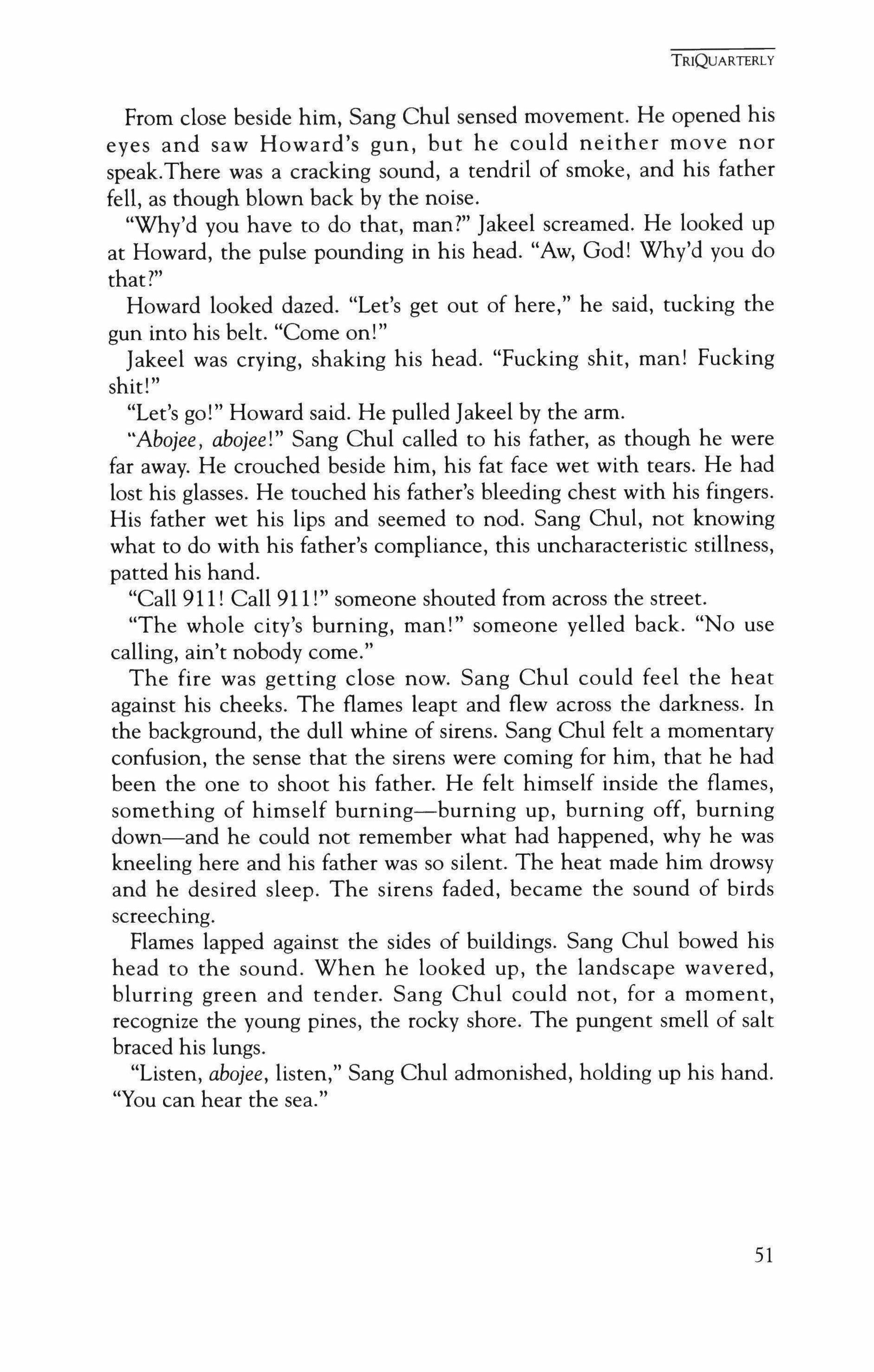
From close beside him, Sang Chul sensed movement. He opened his eyes and saw Howard's gun, but he could neither move nor speak.There was a cracking sound, a tendril of smoke, and his father fell, as though blown back by the noise.
"Why'd you have to do that, man?" [akeel screamed. He looked up at Howard, the pulse pounding in his head. "Aw, God! Why'd you do that?"
Howard looked dazed. "Let's get out of here," he said, tucking the gun into his belt. "Come on!"
Jakeel was crying, shaking his head. "Fucking shit, man! Fucking shit!"
"Let's go!" Howard said. He pulled [akeel by the arm.
"Abojee, abojee!" Sang Chul called to his father, as though he were far away. He crouched beside him, his fat face wet with tears. He had lost his glasses. He touched his father's bleeding chest with his fingers. His father wet his lips and seemed to nod. Sang Chul, not knowing what to do with his father's compliance, this uncharacteristic stillness, patted his hand.
"Call 911! Call 911!" someone shouted from across the street.
"The whole city's burning, man!" someone yelled back. "No use calling, ain't nobody come."
The fire was getting close now. Sang Chul could feel the heat against his cheeks. The flames leapt and flew across the darkness. In the background, the dull whine of sirens. Sang Chul felt a momentary confusion, the sense that the sirens were coming for him, that he had been the one to shoot his father. He felt himself inside the flames, something of himself burning-burning up, burning off, burning down-and he could not remember what had happened, why he was kneeling here and his father was so silent. The heat made him drowsy and he desired sleep. The sirens faded, became the sound of birds screeching.
Flames lapped against the sides of buildings. Sang Chul bowed his head to the sound. When he looked up, the landscape wavered, blurring green and tender. Sang Chul could not, for a moment, recognize the young pines, the rocky shore. The pungent smell of salt braced his lungs.
"Listen, abojee, listen," Sang Chul admonished, holding up his hand. "You can hear the sea."
TRIQUARTERLY
51
The Match (Blessed Is the Match)
Tammie Bob
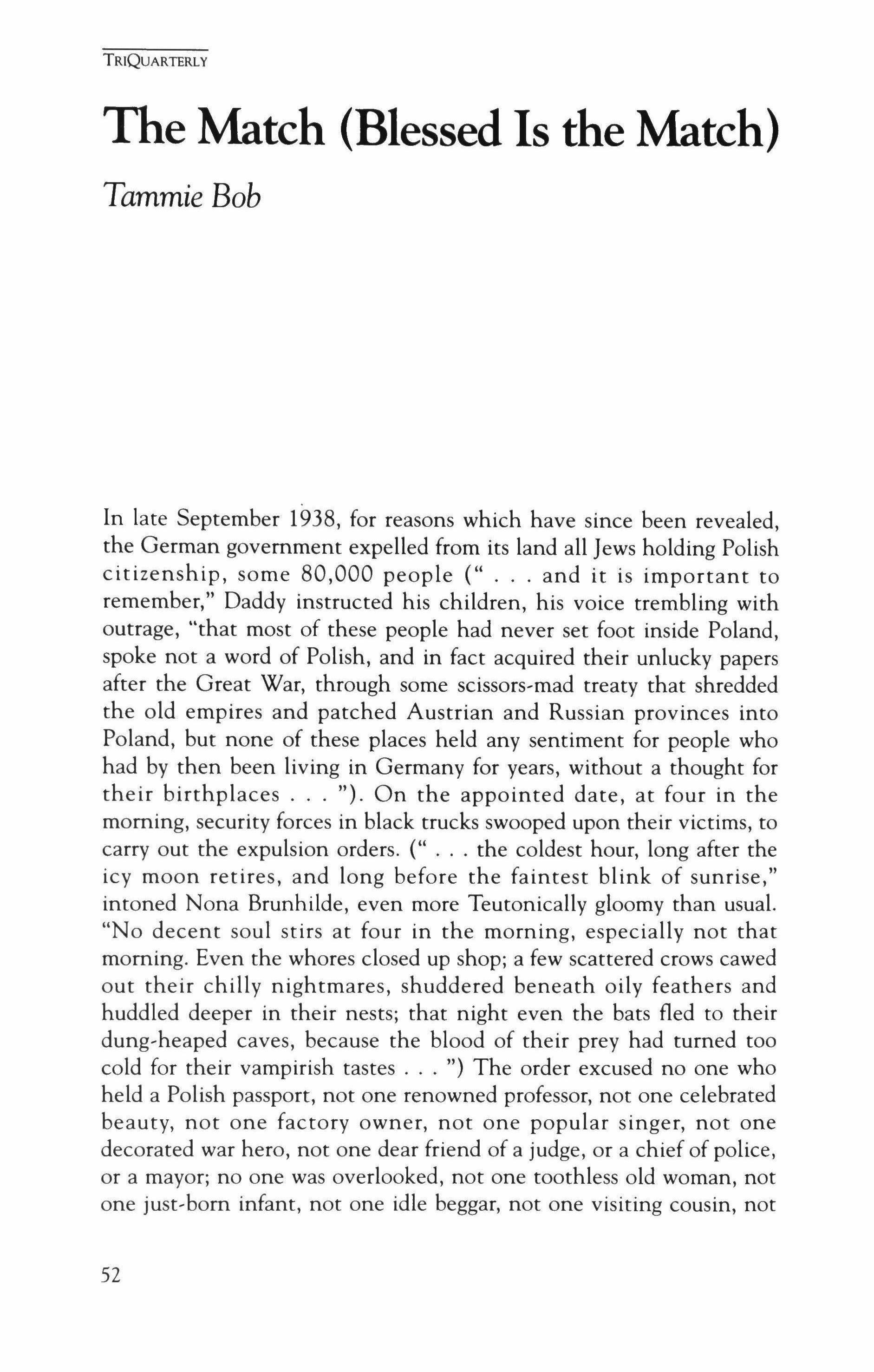
In late September 1�)38, for reasons which have since been revealed, the German government expelled from its land all Jews holding Polish citizenship, some 80,000 people (U and it is important to remember," Daddy instructed his children, his voice trembling with outrage, "that most of these people had never set foot inside Poland, spoke not a word of Polish, and in fact acquired their unlucky papers after the Great War, through some scissors,mad treaty that shredded the old empires and patched Austrian and Russian provinces into Poland, but none of these places held any sentiment for people who had by then been living in Germany for years, without a thought for their birthplaces "). On the appointed date, at four in the morning, security forces in black trucks swooped upon their victims, to carry out the expulsion orders. (U the coldest hour, long after the icy moon retires, and long before the faintest blink of sunrise," intoned Nona Brunhilde, even more Teutonically gloomy than usual. "No decent soul stirs at four in the morning, especially not that morning. Even the whores closed up shop; a few scattered crows cawed out their chilly nightmares, shuddered beneath oily feathers and huddled deeper in their nests; that night even the bats fled to their dung-heaped caves, because the blood of their prey had turned too cold for their vampirish tastes ") The order excused no one who held a Polish passport, not one renowned professor, not one celebrated beauty, not one factory owner, not one popular singer, not one decorated war hero, not one dear friend of a judge, or a chief of police, or a mayor; no one was overlooked, not one toothless old woman, not one just-born infant, not one idle beggar, not one visiting cousin, not
TRIQUARTERLY
52
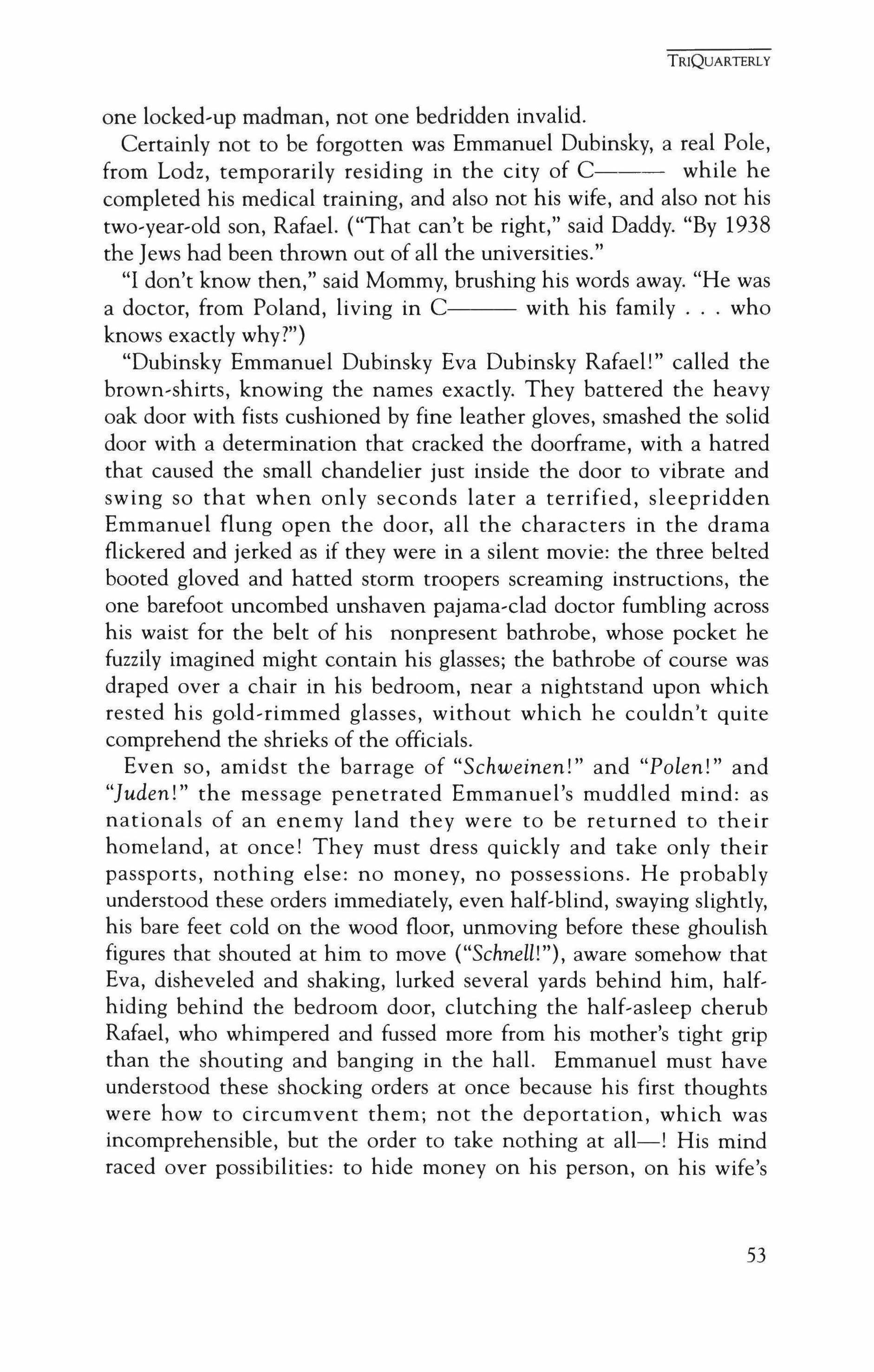
one locked-up madman, not one bedridden invalid.
Certainly not to be forgotten was Emmanuel Dubinsky, a real Pole, from Lodz, temporarily residing in the city of C--- while he completed his medical training, and also not his wife, and also not his two-year-old son, Rafael. ("That can't be right," said Daddy. "By 1938 the Jews had been thrown out of all the universities."
"I don't know then," said Mommy, brushing his words away. "He was a doctor, from Poland, living in C with his family who knows exactly why?")
"Dubinsky Emmanuel Dubinsky Eva Dubinsky Rafael!" called the brown-shirts, knowing the names exactly. They battered the heavy oak door with fists cushioned by fine leather gloves, smashed the solid door with a determination that cracked the doorframe, with a hatred that caused the small chandelier just inside the door to vibrate and swing so that when only seconds later a terrified, sleepridden Emmanuel flung open the door, all the characters in the drama flickered and jerked as if they were in a silent movie: the three belted booted gloved and hatted storm troopers screaming instructions, the one barefoot uncombed unshaven pajama-clad doctor fumbling across his waist for the belt of his nonpresent bathrobe, whose pocket he fuzzily imagined might contain his glasses; the bathrobe of course was draped over a chair in his bedroom, near a nightstand upon which rested his gold-rimmed glasses, without which he couldn't quite comprehend the shrieks of the officials.
Even so, amidst the barrage of "Schweinen!" and "Polen!" and "}uden!" the message penetrated Emmanuel's muddled mind: as nationals of an enemy land they were to be returned to their homeland, at once! They must dress quickly and take only their passports, nothing else: no money, no possessions. He probably understood these orders immediately, even half,blind, swaying slightly, his bare feet cold on the wood floor, unmoving before these ghoulish figures that shouted at him to move ("Schnell!"), aware somehow that Eva, disheveled and shaking, lurked several yards behind him, half, hiding behind the bedroom door, clutching the half-asleep cherub Rafael, who whimpered and fussed more from his mother's tight grip than the shouting and banging in the hall. Emmanuel must have understood these shocking orders at once because his first thoughts were how to circumvent them; not the deportation, which was incomprehensible, but the order to take nothing at a11-! His mind raced over possibilities: to hide money on his person, on his wife's
TRIQUARTERLY
53

person, perhaps a bribe to these fiends traveling with a small child, one needed certain supplies!
"Surely we can take a bag of essentials?" he asked, the first and only words he spoke to his captors.
"Take only your Polish passports!" To conclude the point, a club rammed into his shoulder, sending him stumbling toward the bedroom, where he and his wife numbly dressed, barely looking at each other as they piled on clothes, as many as possible, humiliated, not speaking because in their terror neither one had thoughts that they had words for. The only sensibility the Dubinskys felt was a fierce instinct to protect their child, and a vague supposition that, if they had a few minutes, if they could wake up, warm up, gain control of themselves, they would see that there was something they could do.
And as black trucks carted them away in the blackness, the inhabitants of neighboring apartments rolled over under their heavy down quilts, grateful that they might still catch another hour or two of sleep, sleep which would erase from their minds the existence of the pleasant but after all alien young family who had run afoul of the authorities too bad, reflected Frau Kreuzer, their landlady, who had occasionally cared for little Rafael, a sweet baby, she remembered sadly, turning her face toward the wall, beautiful black curls and so intelligent! A shame that these things had to happen! The way he had patiently stacked small wooden blocks one atop the next until they made a tower as tall as himself! And how he had laughed and clapped when they tumbled down! Reliable tenants, but troublemakers, obviously, traitors of some sort. This created more work for her, now, to scour the rooms in order to show them to prospective tenants to remove the personal items Eva's heavy silver candlesticks, remembered Frau Kreuzer, suddenly sitting up in her bed and adjusting her nightcap. A meter tall, with beautiful grapes and leaves swirling down the fine silver columns just for safekeeping. The Hutschenreuther china she had always admired, service for twelve if they ever came back. Her feet already scuffed the cold floor, seeking her slippers a thick Oriental rug, waiting right next door. Better she than some scavengers!
All the deportees from C were brought to the ballroom of a hotel near the train station, some two thousand terrified people jammed into the room, huddled in miserable groups, crying children, panicked old women but you know all this already, you've heard enough of such scenes.
TRIQUARTERLY
54
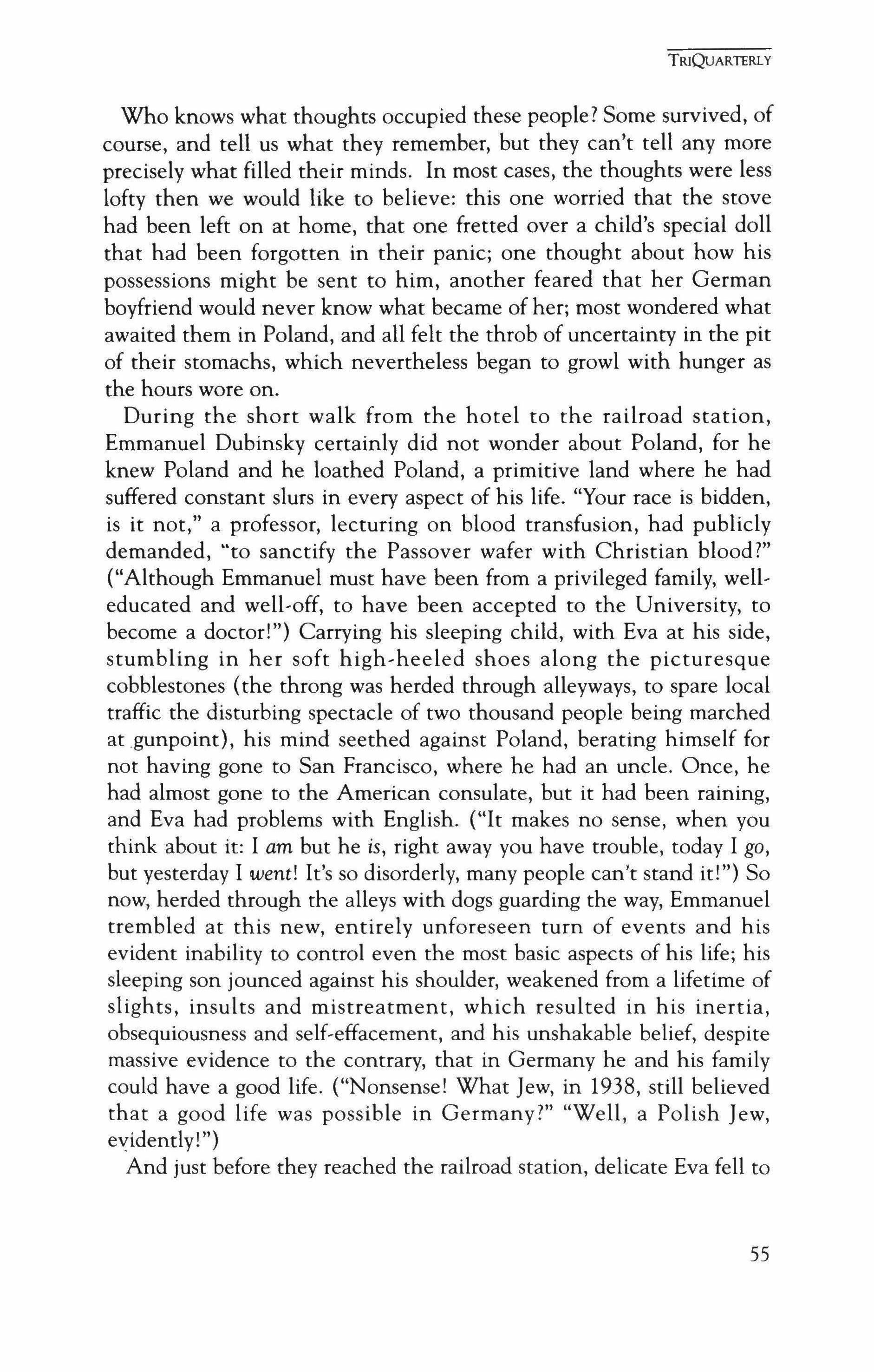
Who knows what thoughts occupied these people? Some survived, of course, and tell us what they remember, but they can't tell any more precisely what filled their minds. In most cases, the thoughts were less lofty then we would like to believe: this one worried that the stove had been left on at home, that one fretted over a child's special doll that had been forgotten in their panic; one thought about how his possessions might be sent to him, another feared that her German boyfriend would never know what became of her; most wondered what awaited them in Poland, and all felt the throb of uncertainty in the pit of their stomachs, which nevertheless began to growl with hunger as the hours wore on.
During the short walk from the hotel to the railroad station, Emmanuel Dubinsky certainly did not wonder about Poland, for he knew Poland and he loathed Poland, a primitive land where he had suffered constant slurs in every aspect of his life. "Your race is bidden, is it not," a professor, lecturing on blood transfusion, had publicly demanded, "to sanctify the Passover wafer with Christian blood?" ("Although Emmanuel must have been from a privileged family, welleducated and well-off, to have been accepted to the University, to become a doctor!") Carrying his sleeping child, with Eva at his side, stumbling in her soft high-heeled shoes along the picturesque cobblestones (the throng was herded through alleyways, to spare local traffic the disturbing spectacle of two thousand people being marched at .gunpoint}, his mind seethed against Poland, berating himself for not having gone to San Francisco, where he had an uncle. Once, he had almost gone to the American consulate, but it had been raining, and Eva had problems with English. ("It makes no sense, when you think about it: I am but he is, right away you have trouble, today I go, but yesterday I went! It's so disorderly, many people can't stand it!") So now, herded through the alleys with dogs guarding the way, Emmanuel trembled at this new, entirely unforeseen turn of events and his evident inability to control even the most basic aspects of his life; his sleeping son jounced against his shoulder, weakened from a lifetime of slights, insults and mistreatment, which resulted in his inertia, obsequiousness and self-effacement, and his unshakable belief, despite massive evidence to the contrary, that in Germany he and his family could have a good life. ("Nonsense! What Jew, in 1938, still believed that a good life was possible in Germany?" "Well, a Polish Jew, evident!y!")
And just before they reached the railroad station, delicate Eva fell to
TRlQuARTERLY
55
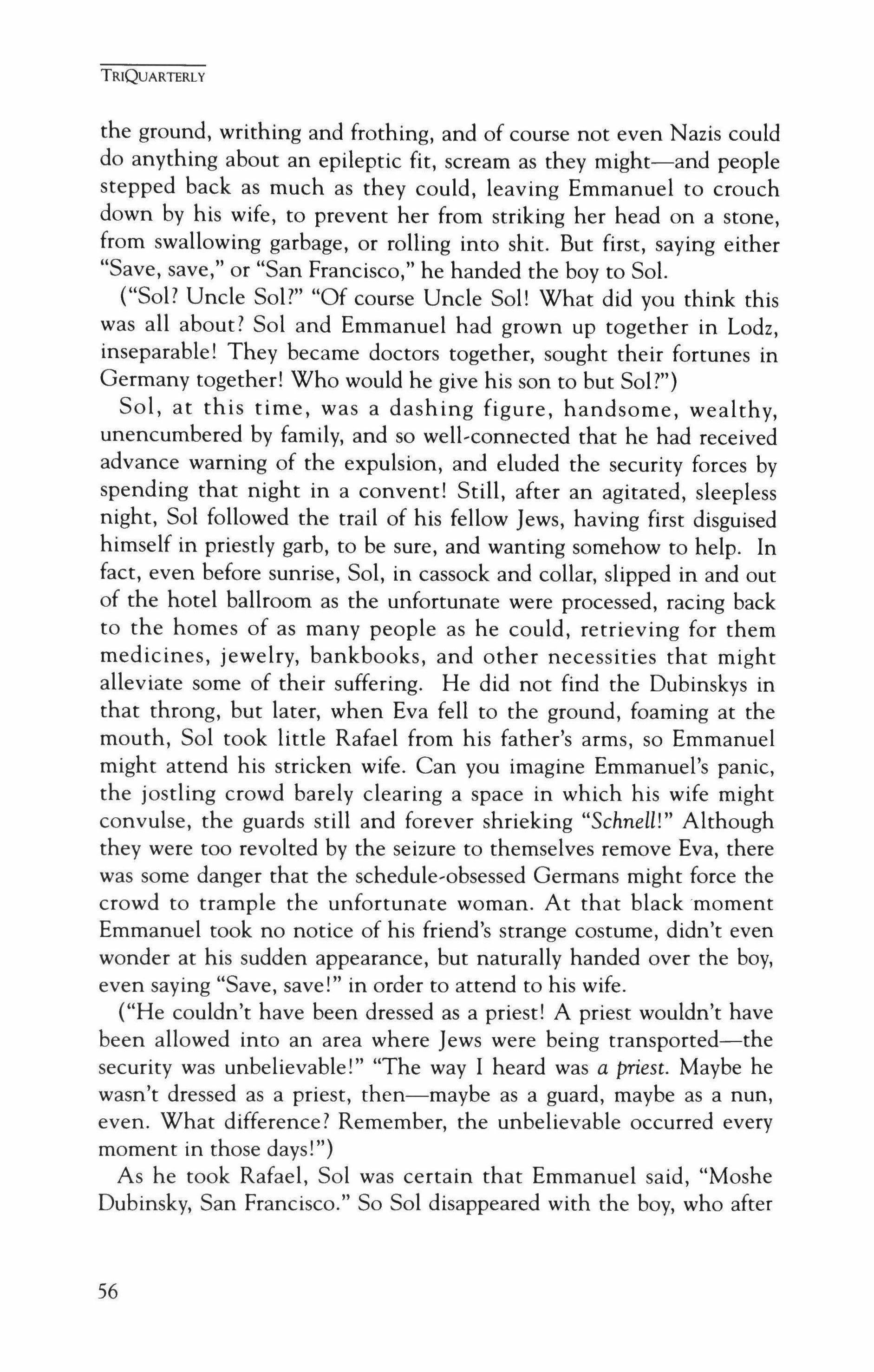
the ground, writhing and frothing, and of course not even Nazis could do anything about an epileptic fit, scream as they might-and people stepped back as much as they could, leaving Emmanuel to crouch down by his wife, to prevent her from striking her head on a stone, from swallowing garbage, or rolling into shit. But first, saying either "Save, save," or "San Francisco," he handed the boy to Sol.
("Sol? Uncle Sol?" "Of course Uncle Sol! What did you think this was all about? Sol and Emmanuel had grown up together in Lodz, inseparable! They became doctors together, sought their fortunes in Germany together! Who would he give his son to but Sol?")
Sol, at this time, was a dashing figure, handsome, wealthy, unencumbered by family, and so well-connected that he had received advance warning of the expulsion, and eluded the security forces by spending that night in a convent! Still, after an agitated, sleepless night, Sol followed the trail of his fellow Jews, having first disguised himself in priestly garb, to be sure, and wanting somehow to help. In fact, even before sunrise, Sol, in cassock and collar, slipped in and out of the hotel ballroom as the unfortunate were processed, racing back to the homes of as many people as he could, retrieving for them medicines, jewelry, bankbooks, and other necessities that might alleviate some of their suffering. He did not find the Dubinskys in that throng, but later, when Eva fell to the ground, foaming at the mouth, Sol took little Rafael from his father's arms, so Emmanuel might attend his stricken wife. Can you imagine Emmanuel's panic, the jostling crowd barely clearing a space in which his wife might convulse, the guards still and forever shrieking "Schnell!" Although they were too revolted by the seizure to themselves remove Eva, there was some danger that the schedule-obsessed Germans might force the crowd to trample the unfortunate woman. At that black moment Emmanuel took no notice of his friend's strange costume, didn't even wonder at his sudden appearance, but naturally handed over the boy, even saying "Save, save!" in order to attend to his wife.
("He couldn't have been dressed as a priest! A priest wouldn't have been allowed into an area where Jews were being transported-the security was unbelievable!" "The way I heard was a priest. Maybe he wasn't dressed as a priest, then-maybe as a guard, maybe as a nun, even. What difference? Remember, the unbelievable occurred every moment in those days!")
As he took Rafael, Sol was certain that Emmanuel said, "Moshe Dubinsky, San Francisco." So Sol disappeared with the boy, who after
TRIQUARTERLY
56
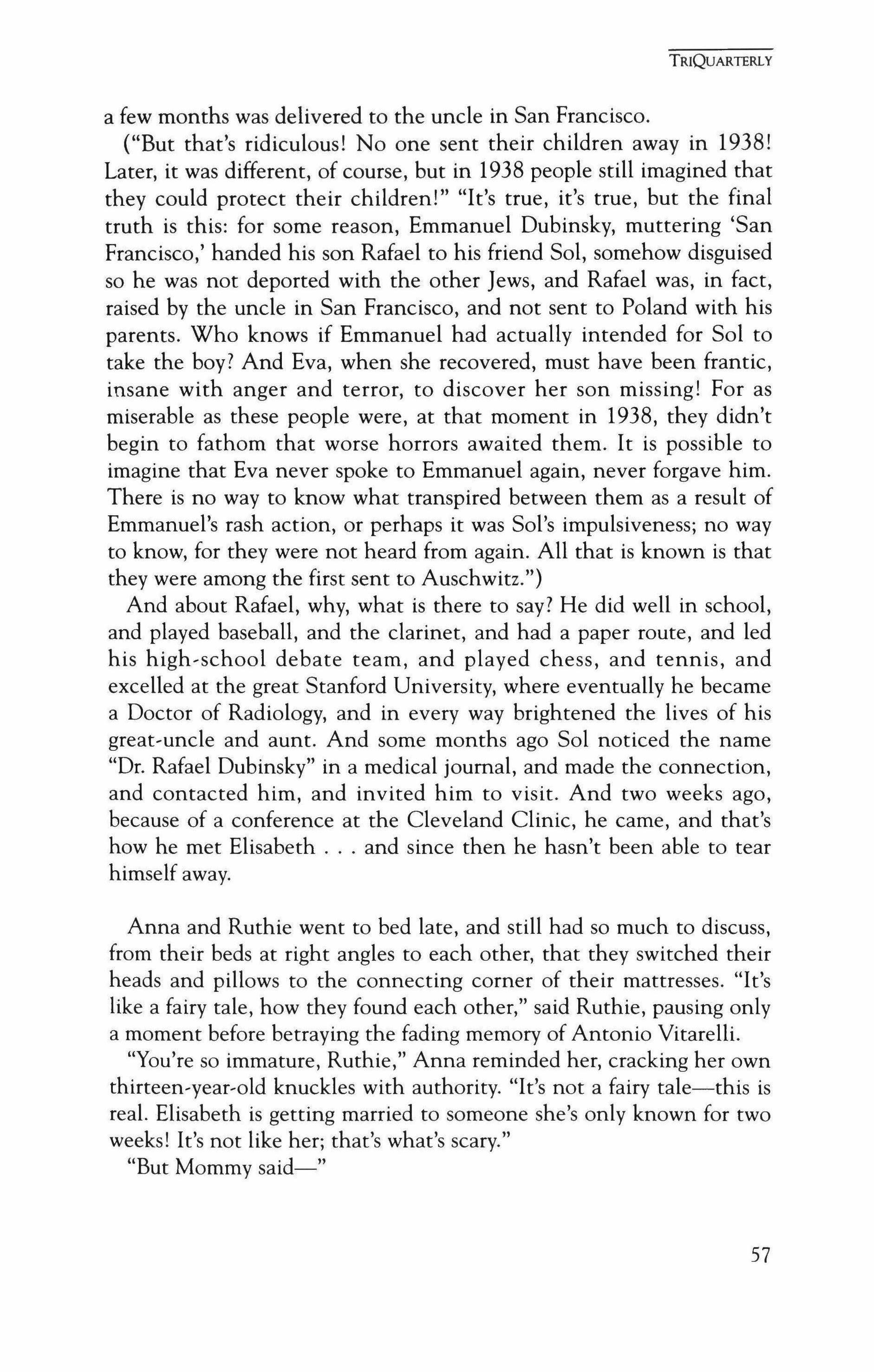
a few months was delivered to the uncle in San Francisco.
("But that's ridiculous! No one sent their children away in 1938! Later, it was different, of course, but in 1938 people still imagined that they could protect their children!" "It's true, it's true, but the final truth is this: for some reason, Emmanuel Dubinsky, muttering 'San Francisco,' handed his son Rafael to his friend Sol, somehow disguised so he was not deported with the other Jews, and Rafael was, in fact, raised by the uncle in San Francisco, and not sent to Poland with his parents. Who knows if Emmanuel had actually intended for Sol to take the boy? And Eva, when she recovered, must have been frantic, insane with anger and terror, to discover her son missing! For as miserable as these people were, at that moment in 1938, they didn't begin to fathom that worse horrors awaited them. It is possible to imagine that Eva never spoke to Emmanuel again, never forgave him. There is no way to know what transpired between them as a result of Emmanuel's rash action, or perhaps it was Sol's impulsiveness; no way to know, for they were not heard from again. All that is known is that they were among the first sent to Auschwitz.")
And about Rafael, why, what is there to say? He did well in school, and played baseball, and the clarinet, and had a paper route, and led his high-school debate team, and played chess, and tennis, and excelled at the great Stanford University, where eventually he became a Doctor of Radiology, and in every way brightened the lives of his great-uncle and aunt. And some months ago Sol noticed the name "Dr. Rafael Dubinsky" in a medical journal, and made the connection, and contacted him, and invited him to visit. And two weeks ago, because of a conference at the Cleveland Clinic, he came, and that's how he met Elisabeth and since then he hasn't been able to tear himself away.
Anna and Ruthie went to bed late, and still had so much to discuss, from their beds at right angles to each other, that they switched their heads and pillows to the connecting comer of their mattresses. "It's like a fairy tale, how they found each other," said Ruthie, pausing only a moment before betraying the fading memory of Antonio Vitarelli.
"You're so immature, Ruthie," Anna reminded her, cracking her own thirteen-year-old knuckles with authority. "It's not a fairy tale-this is real. Elisabeth is getting married to someone she's only known for two weeks! It's not like her; that's what's scary."
"But Mommy said-"
TRIQUARTERLY
57

"Mommy just said she'd have a good life, but she doesn't care about if they love each other or have anything in common. It sounds like an arranged marriage, like in India or the Bible!"
Long after Anna became a shadowy mound, shrouded in blankets, Ruthie lay awake, assaulted by the confusion of dark images that was the story of Dr. Rafael Dubinsky, a two-year-old pulled from the trembling arms of his doomed father by Uncle Sol, who (perhaps disguised as a priest!) escaped deportation. Eighty thousand Jews herded to the trains, forced to walk through back alleys so as not to interfere with the morning traffic of Germans on their way to work. Packed into the dim, stinking cobblestone alleys so that decent people could avoid the stench of hordes of men and women and children and babies and graybeards and babushkas. ("There is a particular odor to a crowd of terrified people," Ruthie had heard once, when an adult had forgotten that she understood German. "Not what you'd expect, sweat or shit or any kind of organic body smell; it's something chemical, like sulfur or melting rubber.") Near the railroad station, Dr. Rafael's mother had fallen to the cobblestones, writhing and foaming among the horse-droppings. Her husband, Emmanuel, handed his two'year, old son to Uncle Sol, and stooped down to help his wife, who was beyond help.
Once, when Ruthie had been in third grade, a boy in her class, Peter Lee, crashed out of his chair onto his back. "Stop that, Peter!" the teacher ordered, but Peter Lee could not stop it, body bridging and collapsing, hands flailing, chin bobbing and swinging in all directions; his classmates held their breath and stared, stared and looked away as a mound of creamy foam burst from Peter's lips, bubbled from between his clenched teeth, strings of foam sliding across first one cheek and then the other as his head jerked from side to side. The teacher ran to Peter Lee, brandishing a pencil, crying "Open his mouth! Open his mouth!" although no one would have dared approach the disgusting figure; the third-graders only clutched the edges of their desks. The teacher stood over the jerking, frothing boy, holding the sharpened pencil in her upraised fist as if she meant to stab him through the heart, and just for a moment her own face convulsed, grimaced and folded up as if she herself might fall to the floor. This facial contortion disappeared so quickly Ruthie thought she might have imagined it, although she knew she had not. The teacher ran to the ancient phone on the wall and shouted into it, "I need help in here! The Chinese boy is having a fit!" Then Ruth ie understood, as the whole class
TRIQUARTERLY
58
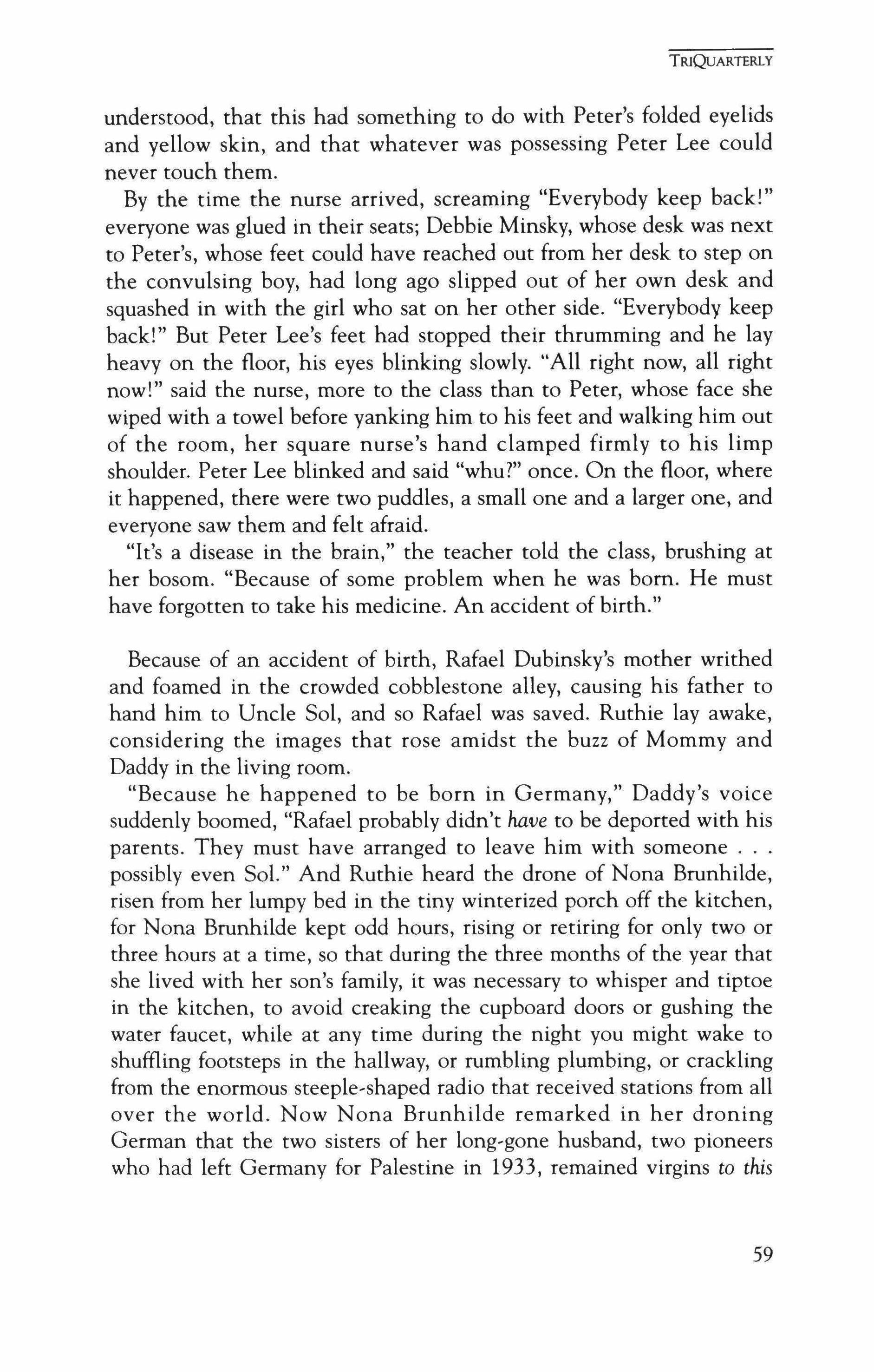
understood, that this had something to do with Peter's folded eyelids and yellow skin, and that whatever was possessing Peter Lee could never touch them.
By the time the nurse arrived, screaming "Everybody keep back!" everyone was glued in their seats; Debbie Minsky, whose desk was next to Peter's, whose feet could have reached out from her desk to step on the convulsing boy, had long ago slipped out of her own desk and squashed in with the girl who sat on her other side. "Everybody keep back!" But Peter Lee's feet had stopped their thrumming and he lay heavy on the floor, his eyes blinking slowly. "All right now, all right now!" said the nurse, more to the class than to Peter, whose face she wiped with a towel before yanking him to his feet and walking him out of the room, her square nurse's hand clamped firmly to his limp shoulder. Peter Lee blinked and said "whu?" once. On the floor, where it happened, there were two puddles, a small one and a larger one, and everyone saw them and felt afraid.
"It's a disease in the brain," the teacher told the class, brushing at her bosom. "Because of some problem when he was born. He must have forgotten to take his medicine. An accident of birth."
Because of an accident of birth, Rafael Dubinsky's mother writhed and foamed in the crowded cobblestone alley, causing his father to hand him to Uncle Sol, and so Rafael was saved. Ruthie lay awake, considering the images that rose amidst the buzz of Mommy and Daddy in the living room.
"Because he happened to be born in Germany," Daddy's voice suddenly boomed, "Rafael probably didn't have to be deported with his parents. They must have arranged to leave him with someone possibly even Sol." And Ruthie heard the drone of Nona Brunhilde, risen from her lumpy bed in the tiny winterized porch off the kitchen, for Nona Brunhilde kept odd hours, rising or retiring for only two or three hours at a time, so that during the three months of the year that she lived with her son's family, it was necessary to whisper and tiptoe in the kitchen, to avoid creaking the cupboard doors or gushing the water faucet, while at any time during the night you might wake to shuffling footsteps in the hallway, or rumbling plumbing, or crackling from the enormous steeple-shaped radio that received stations from all over the world. Now Nona Brunhilde remarked in her droning German that the two sisters of her long-gone husband, two pioneers who had left Germany for Palestine in 1933, remained virgins to this
TRlQuARTERLY
59

day, rather than marry Polish boys like Uncle Sol, which were all that were available in that primitive place "Sol's hardly a Pole, trained in Germany and married twenty years to your daughter!" Daddy shouted at his mother. "Who cares about these things anymore!"
"It always shows up somehow," intoned Nona Brunhilde. "Leonora's Pole is a madman." This new description of Uncle Sol made Ruthie giggle into her pillow, muffling the squeak and clank from the medicine cabinet that was Daddy getting his headache pills.
"The truth is, they're treating that poor girl as if they were still in Lodz," Mommy's voice said. "Marrying her off like that. Poor child. Forcing her into an arranged marriage. Like a hundred years ago. Like Indians. Like Arabs."
And in the dark over Ruthie's bed loomed Elisabeth, chains dripping from her wrists and ankles, beautiful in a harem costume with her stomach exposed, her blond hair bound in a turban, her mouth slack and even drooling as Uncle Sol pulled a long, brilliant anesthetizing needle from her arm, while nearby, a man, also turbaned but visibly Polish in a white peasant shirt and knee boots, a goatee curled to a diabolical point, proffered a pirate's chest of gold coins and jewels and dishes and tablecloths and medical diplomas to Aunt Leonora, whose squat little figure danced in its dark housedress.
On Tuesday evening, Uncle Sol and Aunt Leonora invited all the family to their house to present Dr. Rafael Dubinsky, their almost son' in-law, who as an infant had been saved from Hitler's ovens, saved by Fate (with dramatic assistance by Uncle So1), and swept halfway around the world to find his destiny with their only child Elisabeth, another miracle, born under an American flag at least, but still in Bergen,Belsen, still among ashes, although by then it had become a DP camp.
"It is the most beautiful story I have ever heard," Ruthie told herself Tuesday morning, and during lunch period at Music Academy she told it to the other three sixth-grade girls. They were not her friends exactly, not like her true friends Paula and Jane and Maggie from public school (and barely two months after Mr. Klankert told Mommy there was no place in his school for someone like Ruthie, she hardly saw them anymore, not even her best friend Paula, who had shared with Ruthie a hatred of fractions, and an artistic, mature love for John 'Lennon even though all the other girls preferred the superficial cuteness of Paul, or the silly posturing of Ringo). But in the tiny Music
TRIQUARTERLY
60
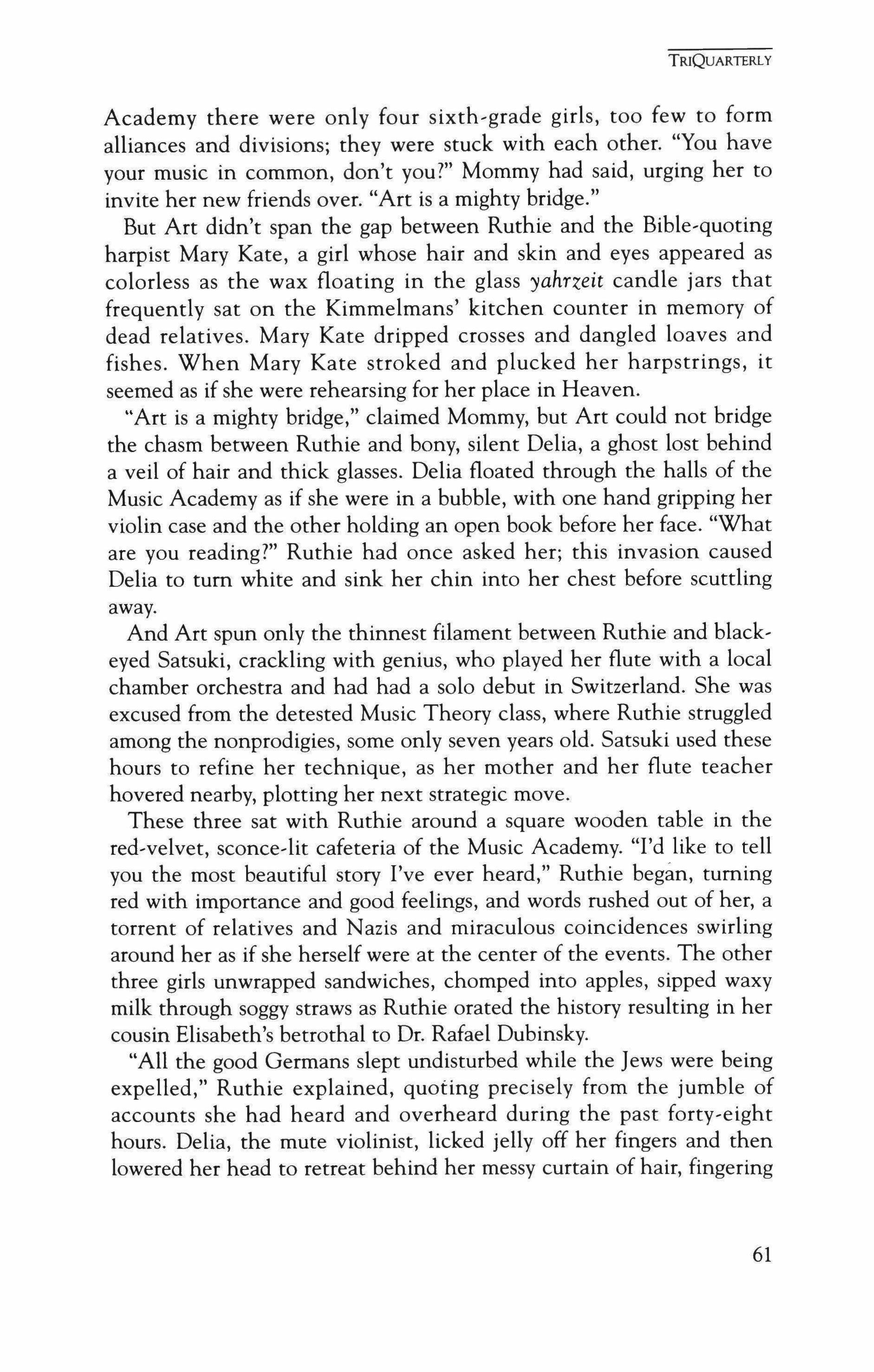
Academy there were only four sixth-grade girls, too few to form alliances and divisions; they were stuck with each other. "You have your music in common, don't you?" Mommy had said, urging her to invite her new friends over. "Art is a mighty bridge."
But Art didn't span the gap between Ruthie and the Bible-quoting harpist Mary Kate, a girl whose hair and skin and eyes appeared as colorless as the wax floating in the glass yahrzeit candle jars that frequently sat on the Kirnmelmans' kitchen counter in memory of dead relatives. Mary Kate dripped crosses and dangled loaves and fishes. When Mary Kate stroked and plucked her harpstrings, it seemed as if she were rehearsing for her place in Heaven.
"Art is a mighty bridge," claimed Mommy, but Art could not bridge the chasm between Ruthie and bony, silent Delia, a ghost lost behind a veil of hair and thick glasses. Delia floated through the halls of the Music Academy as if she were in a bubble, with one hand gripping her violin case and the other holding an open book before her face. "What are you reading?" Ruthie had once asked her; this invasion caused Delia to tum white and sink her chin into her chest before scuttling away.
And Art spun only the thinnest filament between Ruthie and blackeyed Satsuki, crackling with genius, who played her flute with a local chamber orchestra and had had a solo debut in Switzerland. She was excused from the detested Music Theory class, where Ruthie struggled among the nonprodigies, some only seven years old. Satsuki used these hours to refine her technique, as her mother and her flute teacher hovered nearby, plotting her next strategic move.
These three sat with Ruthie around a square wooden table in the red-velvet, sconce-lit cafeteria of the Music Academy. "I'd like to tell you the most beautiful story I've ever heard," Ruthie began, turning red with importance and good feelings, and words rushed out of her, a torrent of relatives and Nazis and miraculous coincidences swirling around her as if she herself were at the center of the events. The other three girls unwrapped sandwiches, chomped into apples, sipped waxy milk through soggy straws as Ruthie orated the history resulting in her cousin Elisabeth's betrothal to Dr. Rafael Dubinsky.
"All the good Germans slept undisturbed while the Jews were being expelled," Ruthie explained, quoting precisely from the jumble of accounts she had heard and overheard during the past forty-eight hours. Delia, the mute violinist, licked jelly off her fingers and then lowered her head to retreat behind her messy curtain of hair, fingering
TRIQUARTERLY
61

her ever-present book. Ruthie, unable to stop, unfolded horror after horror until she revealed the worst: "And his parents were among the first sent to the gas chambers."
Mary Kate blinked her watery eyes and stretched her thin bluish fingers before her as if she expected a harp to appear from the chandeliered ceiling. '''He works judgment upon the nations,'" she recited, fingers twitching, "'heaping up bodies, crushing heads far and wide.' Psalm 110."
This gloomy recitation stopped the flow of Ruthie's story. "He works judgment as if the Jews deserved to be killed, a thought that wafted like a bad smell over the brown formica table in the dim cafeteria, which was quiet but for the hum of conversing musicians and the occasional percussion of clinking forks and rattling coffeecups.
"You mean Hitler," Ruthie said, face heating as she prepared to defend. "You mean Hitler heaped up the bodies." She puffed her cheeks at Mary Kate, trying to look fearsome.
"No, no," trilled Mary Kate. "Hitler wasn't in the Bible." She sat very still, waggling only her lower jaw, like a marionette. "Some people see the devil everywhere, but that psalm is about God helping King David kill his enemies. Another psalm I know goes like this: 'Fair Babylon, you predator, / a blessing on him who seizes your babies, / and dashes them against the rocks.' Don't you think that sounds like Hitler too? But it means that revenge is fair, Ruthie.' Mary Kate spoke wisely, a waxy and transparent witch, angering Ruthie with her babble of smashed heads, of dashed babies, her Hitler and Babylon. What right had Mary Kate to these images? "I have memorized eighty-five psalms so far," Mary Kate said, folding her hands before her.
If only she could finish her story, Ruthie thought. She needed to tell her beautiful story. She began again, detailing Elisabeth's many sad loves and Dr. Rafael Dubinsky's prodigiousness. "And now he's a world-famous radiologist," she exaggerated.
"Fame isn't everything," said Satsuki, stroking her glossy black hair. "When you're famous, people may not love you when they say they do. They might be in love with your fame. This is why your cousin wants to marry this man after only knowing him a few days." She bobbed her head, sure of her own truths. "I will only marry someone as famous as I " am.
It seemed to Ruthie that she was encased in an airtight glass box, suffocating with all that she knew, and that each of the other girls around the table sat in her own glass box, surrounded by her own
TRIQUARTERLY
62

absolute truth; and though the girls gestured and made faces at each other, no meaningful sounds or ideas could pass among the sealed glass cages.
She ripped open her own lunch bag, untouched until now, sorry that she had dared to tell this story to these outsiders. "Two cousins of mine got married after they met for the first time at the wedding of another cousin," Mary Kaye was saying. "They had a baby that died, for punishment. That's just like what happened to your cousin, isn't it, Ruthie?"
Ruthie didn't answer. She had revealed a flower growing from a dungheap, and the girls wanted to trample it. "Save, save," she told herself. After a few minutes the girls talked about something else.
Because Mommy had changed her outfit so many times, the Kimmelmans had to park two blocks away from Uncle Sol and Aunt Leonora's house. Cars were parked on both sides of the quiet street, with no regard for regulations. Some pointed north and some south and some tilted lopsided with two wheels up on the parkway as if they had been abandoned in a hurry.
"My God," Mommy kept saying, as they hurried past hedges, iron fences, mirrored balls on pedestals. "My God. Selling their daughter. That poor girl. In this day and age. Like in the shtetl." Her heels rattled the sidewalk like castanets as she led the procession of Kimmelmans to her sister'in,law's large brick house, thrusting her chin so far before her that the wound coil of red hair faced behind her, looking to Ruthie like a bird's nest that had spilled all its eggs.
"Calm down, Zena," Daddy kept saying, a step behind. "Wait until you've met him, at least." Which caused Mommy to stop in her tracks, grind her fists, and say, "I don't know why I'm here, after the way I'm being treated." For after failing for two days to arrange a preview visit from her dearest niece and the miraculous fiance Dr. Rafael, Mommy decided this match was brought about through deception, coercion and foul play. "I just want to get to know him a little," Mommy had cajoled, bending into the phone, first to Elisabeth herself and then to Leonora. "If not for dinner, then for coffee. Half an hour. Just so I can form an impression. Suddenly she doesn't have half an hour for her aunt and uncle?"
"They've got no time, with the wedding so soon," Leonora insisted. "You'll meet him Tuesday night, at our house, with the rest of the family."
TRIQUARTERLY
63

Something's wrong, Mommy had decided, swearing she wouldn't go Tuesday night, even as she scheduled an extra appointment with her hairdresser. It's a forced marriage, she said, they're tricking that little girl into a wedding with some disgusting old goat and in two months she'll wake up and wonder what happened to her.
Trees and houses blurred past as Ruthie and Anna trailed in the wake of Nona Brunhilde's medicinal cologne, profusely applied in place of the American custom of daily bathing, which wore away the body's natural disease protectors. Suddenly Anna stopped and bent over, sliding her hands over her skinny shins, smoothing nonexistent wrinkles out of the stockings she got to wear because she was thirteen. "I hate these things," she told her sister, although her self-satisfied smile, awash in lip gloss, belied her words. Hours ago Ruthie had dreamed that Elisabeth might ask her to be a bridesmaid, but the white socks sagging and flopping around her own ankles suggested to her that these aspirations were in vain. Anna took off, tugging at her garter belt through her skirt, Ruthie slogging behind as if her waistband were about to break and her shoes might fall off. So many cars, pointing the way to her cousin's house! Bringing so many cousins, old friends from the cheerleading squad, sorority sisters, bridesmaid material whose hair flipped up without ever using a roller and who were old enough to wear lipstick. Who were all these people, anyhow, when Mommy had said just family would be here?
Why would a beautiful nineteen-year-old girl like Elisabeth even think about getting married in this day and age, Mommy's voice rattled on, as if she had never said marrying a doctor was the best thing that could happen to a girl, especially one who had already "experienced life," which Elisabeth had most certainly done with Antonio Vitarelli when they ran away to Florida. Those things happened certainly, it was not the end of the world, but when 'a girl got slightly brown around the edges it was best to make salad quickly. Otherwise, a girl could wilt entirely, turning limp and black and putrid like Mommy's friend Manya Turkletaub, whose skirts got tighter and necklines got longer and lipstick got redder each year that no man married her.
"She's throwing her brains away. And why the rush? What does that look like?"
"Calm down," Daddy was saying as they crowded onto his sister's front porch, which overlooked the remains of last week's tulips. Marvin, the youngest, got to ring the doorbell, while Ruthie was
TRIQUARTERLY
64
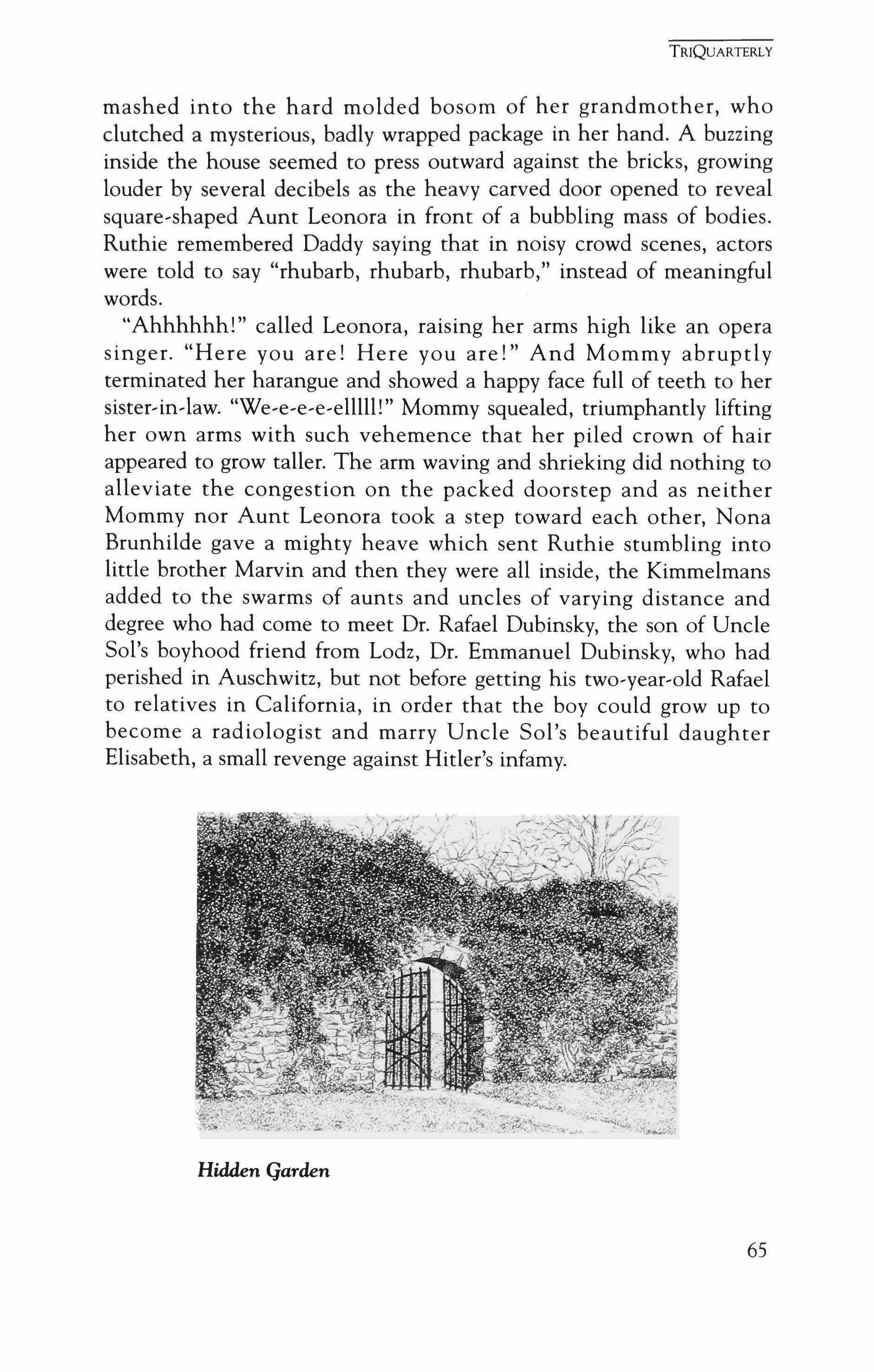
mashed into the hard molded bosom of her grandmother, who clutched a mysterious, badly wrapped package in her hand. A buzzing inside the house seemed to press outward against the bricks, growing louder by several decibels as the heavy carved door opened to reveal square-shaped Aunt Leonora in front of a bubbling mass of bodies. Ruthie remembered Daddy saying that in noisy crowd scenes, actors were told to say "rhubarb, rhubarb, rhubarb," instead of meaningful words.
"Ahhhhhh!" called Leonora, raising her arms high like an opera singer. "Here you are! Here you are!" And Mommy abruptly terminated her harangue and showed a happy face full of teeth to her sister-in-law. "We�e�e�e�elllll!" Mommy squealed, triumphantly lifting her own arms with such vehemence that her piled crown of hair appeared to grow taller. The arm waving and shrieking did nothing to alleviate the congestion on the packed doorstep and as neither Mommy nor Aunt Leonora took a step toward each other, Nona Brunhilde gave a mighty heave which sent Ruthie stumbling into little brother Marvin and then they were all inside, the Kimmelmans added to the swarms of aunts and uncles of varying distance and degree who had come to meet Dr. Rafael Dubinsky, the son of Uncle Sol's boyhood friend from Lodz, Dr. Emmanuel Dubinsky, who had perished in Auschwitz, but not before getting his two-year-old Rafael to relatives in California, in order that the boy could grow up to become a radiologist and marry Uncle Sol's beautiful daughter Elisabeth, a small revenge against Hitler's infamy.
TRIQUARTERLY
65
Hidden Garden
Summer, 1959
(Prologue to the novel, Gone from Me)
David Michael Kaplan
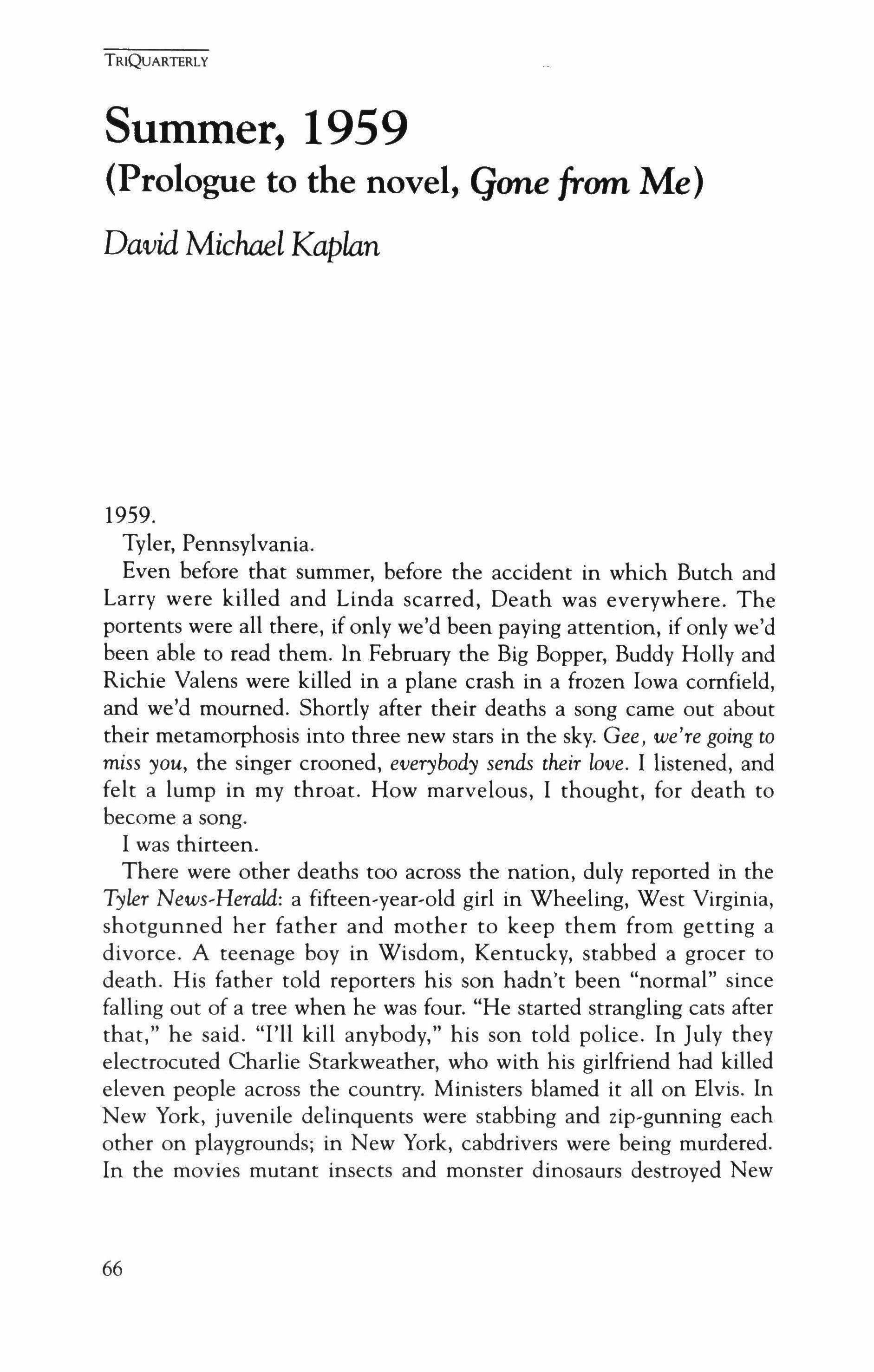
1959.
Tyler, Pennsylvania.
Even before that summer, before the accident in which Butch and Larry were killed and Linda scarred, Death was everywhere. The portents were all there, if only we'd been paying attention, if only we'd been able to read them. In February the Big Bopper, Buddy Holly and Richie Valens were killed in a plane crash in a frozen Iowa cornfield, and we'd mourned. Shortly after their deaths a song came out about their metamorphosis into three new stars in the sky. Gee, we're going to miss you, the singer crooned, everybody sends their love. I listened, and felt a lump in my throat. How marvelous, I thought, for death to become a song.
I was thirteen.
There were other deaths too across the nation, duly reported in the Tyler News,Herald: a fifteen-year-old girl in Wheeling, West Virginia, shotgunned her father and mother to keep them from getting a divorce. A teenage boy in Wisdom, Kentucky, stabbed a grocer to death. His father told reporters his son hadn't been "normal" since falling out of a tree when he was four. "He started strangling cats after that," he said. "I'll kill anybody," his son told police. In July they electrocuted Charlie Starkweather, who with his girlfriend had killed eleven people across the country. Ministers blamed it all on Elvis. In New York, juvenile delinquents were stabbing and zip-gunning each other on playgrounds; in New York, cabdrivers were being murdered. In the movies mutant insects and monster dinosaurs destroyed New
TRIQUARTERLY
66

York, and in the next movie, a week later, destroyed Tokyo.
TV's "Superman," George Reeves, killed himself. Or else he was killed after jumping from a window, madly believing he really could fly. We heard each story and weren't sure.
People were killed in Tyler too. In April Clete Thurston blew his wife's face away with a shotgun in front of their two little dCl'tlghters as she begged for her life. He'd suspected, wrongly as it turned out, that she'd been having an affair with a bagboy at the Bi-Le. After killing her, he drove to the Bi-Le, walked in with his shotgun and demanded to see the boy. Luckily for him, it was his night off. Thurston put down his weapon, sat on the floor, and told the terrified check-out lady to call the police, that he'd done a "dirty thing" back at his house. They found his two daughters, mute and terrified, in the car. Thurston said he hadn't wanted to leave them alone in the house because there was no one to look after them now that his wife was dead.
And others. On New Dairy Road, Herman Kootz, who'd lived alone for years, was found dead in a one-room house piled high with newspapers, hubcaps, boxes of empty soup cans. He'd been shot once in the heart. He was in stocking feet, and mice had nibbled through his socks and partially eaten his toes. A neighbor was soon arrested and confessed. He and Kootz had had a feud of years running, the neighbor swearing that Kootz kept stealing the newspaper from his rural delivery box. And in the Third Ward Aaron Barbee told his estranged wife he was going to go have a few drinks to get up his courage to kill her. He went to the bar, had a few drinks, came back, sent his two little boys out to play, and then did just that. When the police came, he was out in the yard with them, fixing the seat of the swing set.
Nobody was killed for money or possessions. Everyone was killed out of revenge, or jealousy, or love, love gone sour, love gone crazy, although that was little consolation to the loved ones, now the dead.
Others just died:
Mrs. Hannah's husband collapsed of a heart attack as he was carrying in the family's first TV set. The TV smashed on the walkway, and he died. Colleen Mulcahy's father died earlier that winter of lung cancer-the word was still whispered, never spoken aloud, as if it alone were the instrument of contagion-but no one bothered to wonder if he'd smoked. After all, newspapers still advertised "lowcalorie sugar" and "healthy cigarettes." Baseball stars puffed away in magazine ads. Marlboro Country had just been discovered. A lot of
TRIQUARTERLY
67

connections had yet to be made. We bought cigarettes from anonymous machines, kept them under our mattresses, smoked one or two a week in the alley behind the YMCA. We dreamed of tattoos, like those on the cowboys who rode Marlboro Country's ranges, but only Butch had one.
Even before the accident, people had been dying at the rate of four a month on the serpentine country roads that hugged the French River and the Allegheny Mountains. Sometimes they smashed into one another, but more often they just drove off the road, missing a curve, driving too fast, or too sleepy, or too preoccupied, or too drunk. They hit trees, they hit bridge abutments, they overturned in ditches and culverts, they slid down hillsides and ended up in the woods or the river. They slid on ice and water and snow. They hit deer, they swerved to avoid deer and drove off the road and died just the same. A salesman from Cleveland hit a cow. "I've killed a cow," he kept repeating. The News�Herald decried the alarming accident rate. They kept a running count on the front page, outlined in black, like a funeral card. We followed it like a box score. We heard lurid tales of decapitations, impalings, dismemberments. We saw movies about car wrecks in high school, to scare us, but they were only movies, we were sure, and the dead only actors with fake blood.
Death was everywhere, if only we'd been paying attention, if only we could have read its signs. But who among us, young as we were, could be so discerning?
And so we lived.
What our parents did: Emmet Scurry's father cleaned septic tanks; Jennifer Reisinger's drove the school bus and repaired watches. Ellen Deitz's worked at the bearing plant; Christy Elliot's was a beer distributor. Ira Dunn's father was an alcoholic and check bouncer and was usually gone, in jail or on the run. Larry's father was an optometrist; Linda's repaired lawn mowers. Butch's father left him and his mother when Butch was in fifth grade, and no one really remembered him anymore. Many fathers worked two jobs. I remember how surprised I was in third grade to see my principal painting houses during the summer. Most mothers were mothers and didn't work, and we felt sorry for those who had to, like Butch's, who ran Helen's Beauty Shoppe below their apartment. Helen, I found out years later, wasn't her name at all.
Colleen Mulcahy's father was dead, of course. That's what he did.
Earl Lovelette's father owned the funeral home. We kidded him
TRIQUARTERLY
68
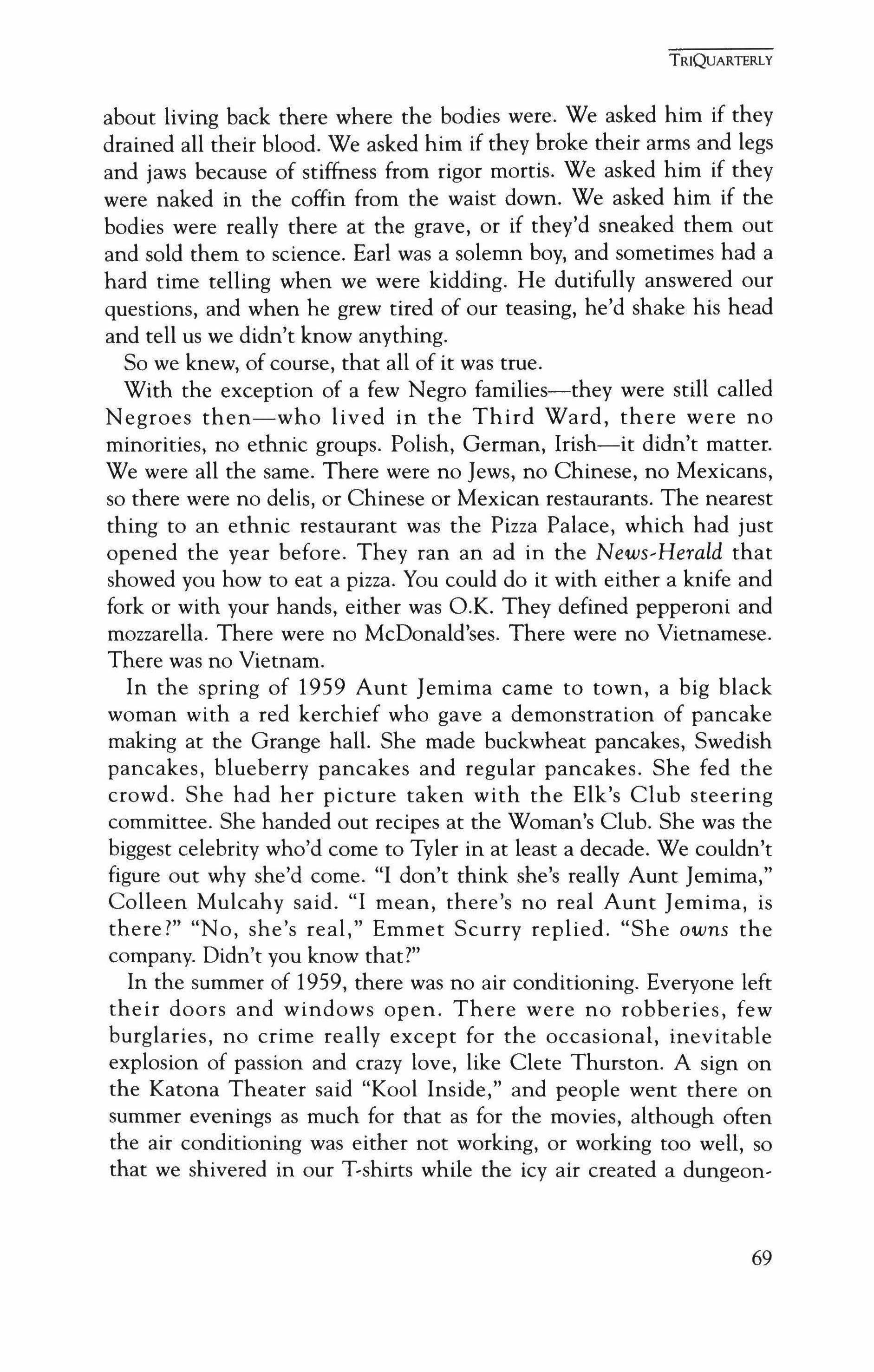
about living back there where the bodies were. We asked him if they drained all their blood. We asked him if they broke their arms and legs and jaws because of stiffness from rigor mortis. We asked him if they were naked in the coffin from the waist down. We asked him if the bodies were really there at the grave, or if they'd sneaked them out and sold them to science. Earl was a solemn boy, and sometimes had a hard time telling when we were kidding. He dutifully answered our questions, and when he grew tired of our teasing, he'd shake his head and tell us we didn't know anything.
So we knew, of course, that all of it was true.
With the exception of a few Negro families-they were still called Negroes then-who lived in the Third Ward, there were no minorities, no ethnic groups. Polish, German, Irish-it didn't matter. We were all the same. There were no Jews, no Chinese, no Mexicans, so there were no delis, or Chinese or Mexican restaurants. The nearest thing to an ethnic restaurant was the Pizza Palace, which had just opened the year before. They ran an ad in the News�Herald that showed you how to eat a pizza. You could do it with either a knife and fork or with your hands, either was O.K. They defined pepperoni and mozzarella. There were no McDonald'ses. There were no Vietnamese. There was no Vietnam.
In the spring of 1959 Aunt Jemima came to town, a big black woman with a red kerchief who gave a demonstration of pancake making at the Grange hall. She made buckwheat pancakes, Swedish pancakes, blueberry pancakes and regular pancakes. She fed the crowd. She had her picture taken with the Elk's Club steering committee. She handed out recipes at the Woman's Club. She was the biggest celebrity who'd come to Tyler in at least a decade. We couldn't figure out why she'd come. "I don't think she's really Aunt Jemima," Colleen Mulcahy said. "I mean, there's no real Aunt Jemima, is there?" "No, she's real," Emmet Scurry replied. "She owns the company. Didn't you know that?"
In the summer of 1959, there was no air conditioning. Everyone left their doors and windows open. There were no robberies, few burglaries, no crime really except for the occasional, inevitable explosion of passion and crazy love, like Clete Thurston. A sign on the Katona Theater said "Kool Inside," and people went there on summer evenings as much for that as for the movies, although often the air conditioning was either not working, or working too well, so that we shivered in our 'Tshirts while the icy air created a dungeon-
TRIQUARTERLY
69
TRIQUARTERLY
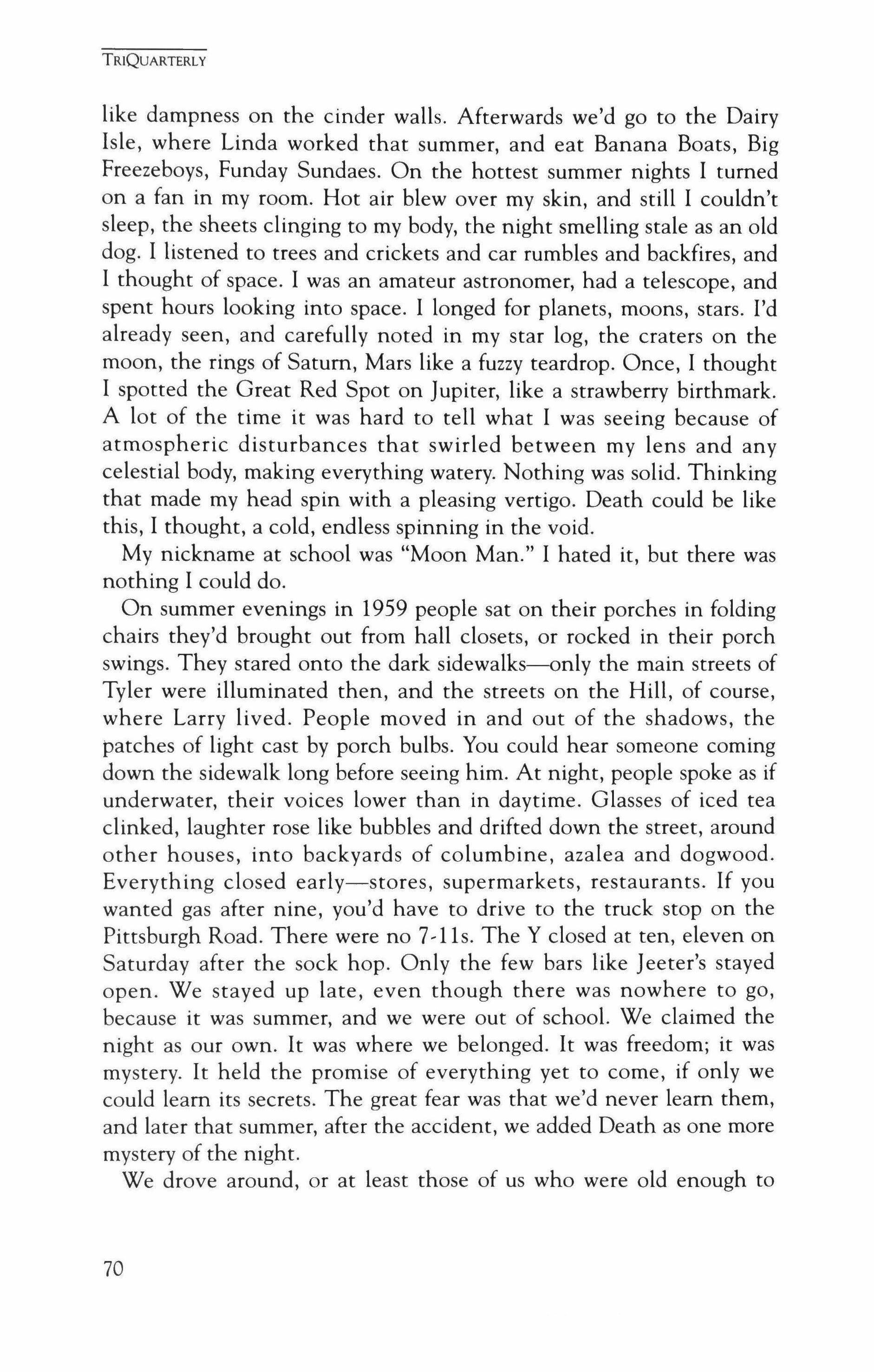
like dampness on the cinder walls. Afterwards we'd go to the Dairy Isle, where Linda worked that summer, and eat Banana Boats, Big Freezeboys, Funday Sundaes. On the hottest summer nights I turned on a fan in my room. Hot air blew over my skin, and still I couldn't sleep, the sheets clinging to my body, the night smelling stale as an old dog. I listened to trees and crickets and car rumbles and backfires, and I thought of space. I was an amateur astronomer, had a telescope, and spent hours looking into space. I longed for planets, moons, stars. I'd already seen, and carefully noted in my star log, the craters on the moon, the rings of Saturn, Mars like a fuzzy teardrop. Once, I thought I spotted the Great Red Spot on Jupiter, like a strawberry birthmark. A lot of the time it was hard to tell what I was seeing because of atmospheric disturbances that swirled between my lens and any celestial body, making everything watery. Nothing was solid. Thinking that made my head spin with a pleasing vertigo. Death could be like this, I thought, a cold, endless spinning in the void.
My nickname at school was "Moon Man." I hated it, but there was nothing I could do.
On summer evenings in 1959 people sat on their porches in folding chairs they'd brought out from hall closets, or rocked in their porch swings. They stared onto the dark sidewalks-only the main streets of Tyler were illuminated then, and the streets on the Hill, of course, where Larry lived. People moved in and out of the shadows, the patches of light cast by porch bulbs. You could hear someone coming down the sidewalk long before seeing him. At night, people spoke as if underwater, their voices lower than in daytime. Glasses of iced tea clinked, laughter rose like bubbles and drifted down the street, around other houses, into backyards of columbine, azalea and dogwood. Everything closed early-stores, supermarkets, restaurants. If you wanted gas after nine, you'd have to drive to the truck stop on the Pittsburgh Road. There were no 7-l l s. The Y closed at ten, eleven on Saturday after the sock hop. Only the few bars like Jeeter's stayed open. We stayed up late, even though there was nowhere to go, because it was summer, and we were out of school. We claimed the night as our own. It was where we belonged. It was freedom; it was mystery. It held the promise of everything yet to come, if only we could learn its secrets. The great fear was that we'd never learn them, and later that summer, after the accident, we added Death as one more mystery of the night.
We drove around, or at least those of us who were old enough to
70
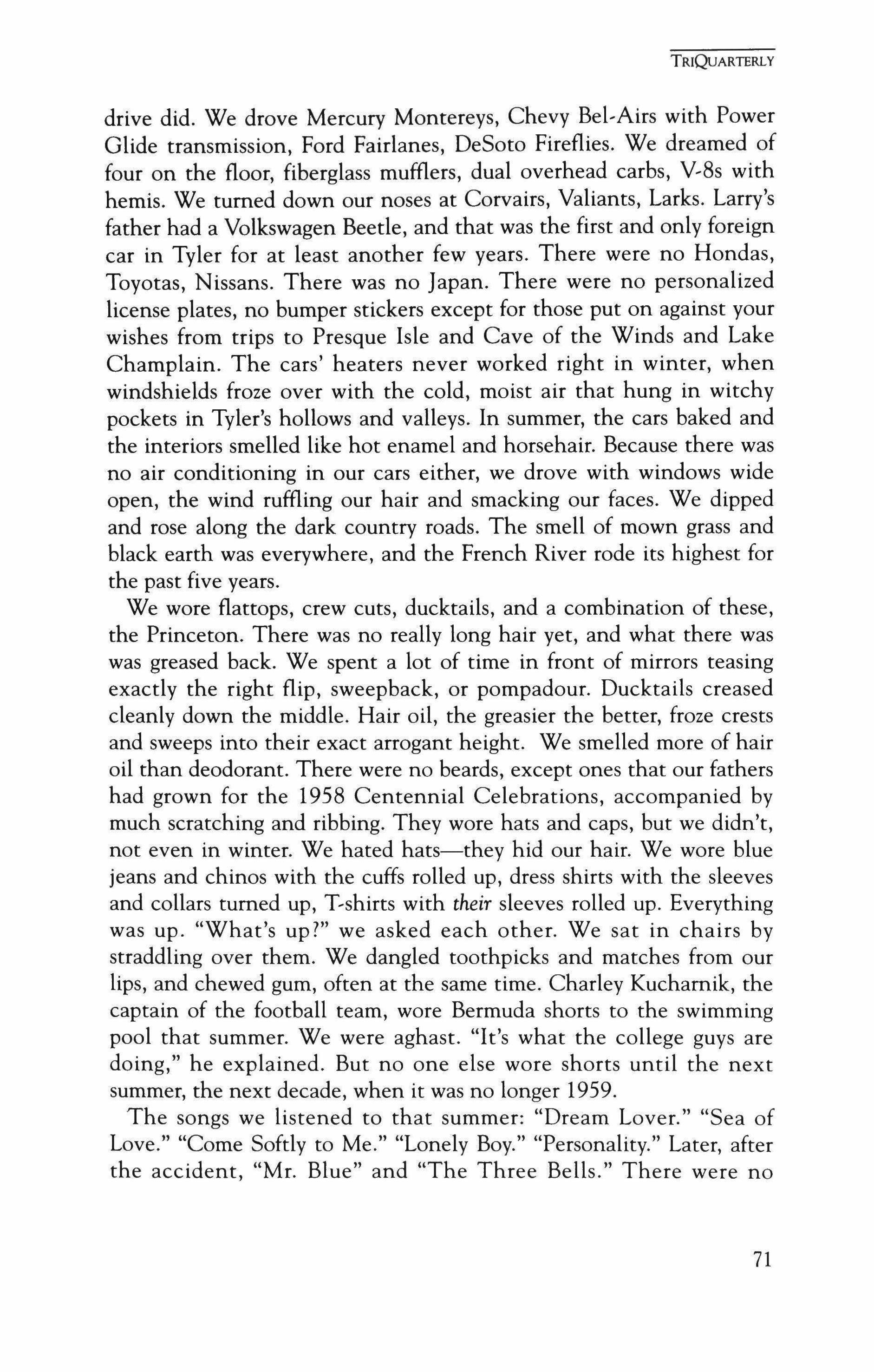
drive did. We drove Mercury Montereys, Chevy Bel-Airs with Power Glide transmission, Ford Fairlanes, DeSoto Fireflies. We dreamed of four on the floor, fiberglass mufflers, dual overhead carbs, V,8s with hemis. We turned down our noses at Corvairs, Valiants, Larks. Larry's father had a Volkswagen Beetle, and that was the first and only foreign car in Tyler for at least another few years. There were no Hondas, Toyotas, Nissans. There was no Japan. There were no personalized license plates, no bumper stickers except for those put on against your wishes from trips to Presque Isle and Cave of the Winds and Lake Champlain. The cars' heaters never worked right in winter, when windshields froze over with the cold, moist air that hung in witchy pockets in Tyler's hollows and valleys. In summer, the cars baked and the interiors smelled like hot enamel and horsehair. Because there was no air conditioning in our cars either, we drove with windows wide open, the wind ruffling our hair and smacking our faces. We dipped and rose along the dark country roads. The smell of mown grass and black earth was everywhere, and the French River rode its highest for the past five years.
We wore flattops, crew cuts, ducktails, and a combination of these, the Princeton. There was no really long hair yet, and what there was was greased back. We spent a lot of time in front of mirrors teasing exactly the right flip, sweepback, or pompadour. Ducktails creased cleanly down the middle. Hair oil, the greasier the better, froze crests and sweeps into their exact arrogant height. We smelled more of hair oil than deodorant. There were no beards, except ones that our fathers had grown for the 1958 Centennial Celebrations, accompanied by much scratching and ribbing. They wore hats and caps, but we didn't, not even in winter. We hated hats-they hid our hair. We wore blue jeans and chinos with the cuffs rolled up, dress shirts with the sleeves and collars turned up, T,shirts with their sleeves rolled up. Everything was up. "What's up?" we asked each other. We sat in chairs by straddling over them. We dangled toothpicks and matches from our lips, and chewed gum, often at the same time. Charley Kucharnik, the captain of the football team, wore Bermuda shorts to the swimming pool that summer. We were aghast. "It's what the college guys are doing," he explained. But no one else wore shorts until the next summer, the next decade, when it was no longer 1959.
The songs we listened to that summer: "Dream Lover." "Sea of Love." "Come Softly to Me." "Lonely Boy." "Personality." Later, after the accident, "Mr. Blue" and "The Three Bells." There were no
TRlQuARTERLY
71

Golden Oldies. All the songs were new. They perfectly matched our moods in a strange, mystical way. "I don't know how they do it," Emmet said, "but it's like they know exactly what I'm thinking." "It's X rays," Ricky Dunn said. "They got government projects now to read our minds with X rays. The Commies have been doing it for years."
There were no record albums, or at least we didn't buy them---our music was only on 45s. Experience was a single-play. Those of us who had some money bought them at Woolworth's and McCroy's and listened to them on the small record players we got as Christmas and birthday gifts. There were no portable radios, so we mostly heard the songs on jukeboxes at the Dairy Isle, the Arrow Cafe, the bowling alley, the Pizza Palace. We heard them on Saturday nights at the sock hops. Most of all we heard them on car radios, tuned up loudly as we drove along with the windows open, so that music and wind and night seemed as much a part of us as blood and bone. Wally Weird, the WTYR deejay, spun the discs. His voice was everywhere that summer, the bass undercurrent to the night. He'd ask us if we were lonely, and if so, here was a song for us. He'd segue into "Sea of Love." "Come with me," he'd sing along, "to the sea"-and then lower, breathier, as if each of us were the only one in the night he was speaking to-"of Love."
"Weird" wasn't his real name, of course-it was "Weir," but we'd changed it.
Those of us who had television also heard the songs on American Bandstand. Philadelphia, although also in Pennsylvania, was another country, as far away and strange as New York, where juvenile delinquents murdered cabdrivers and mutant insects toppled skyscrapers. Philadelphia, however, was a city of teenagers who chewed gum with their mouths open and spoke through their noses and had names like Rhonda, Stacey, Anthony, Sal. They had all the names we didn't. They knew the songs, silently mouthing the words like a rosary as they danced. They danced easily, without effort or emotion. They had all the moves we didn't.
We liked our songs fast, we liked them slow, but most of all we liked them with a bit of scorn and a lot of loneliness. They had to either sneer or sigh. We distrusted urban groups like Little Anthony and the Imperials and Dion and the Belmonts and felt more kinship with the Everly Brothers and Elvis, who was getting out of the army soon and would, we knew, be bigger than ever. There was no surfing music. There was no California. Buddy Holly was our favorite singer,
TRIQUARTERLY
72
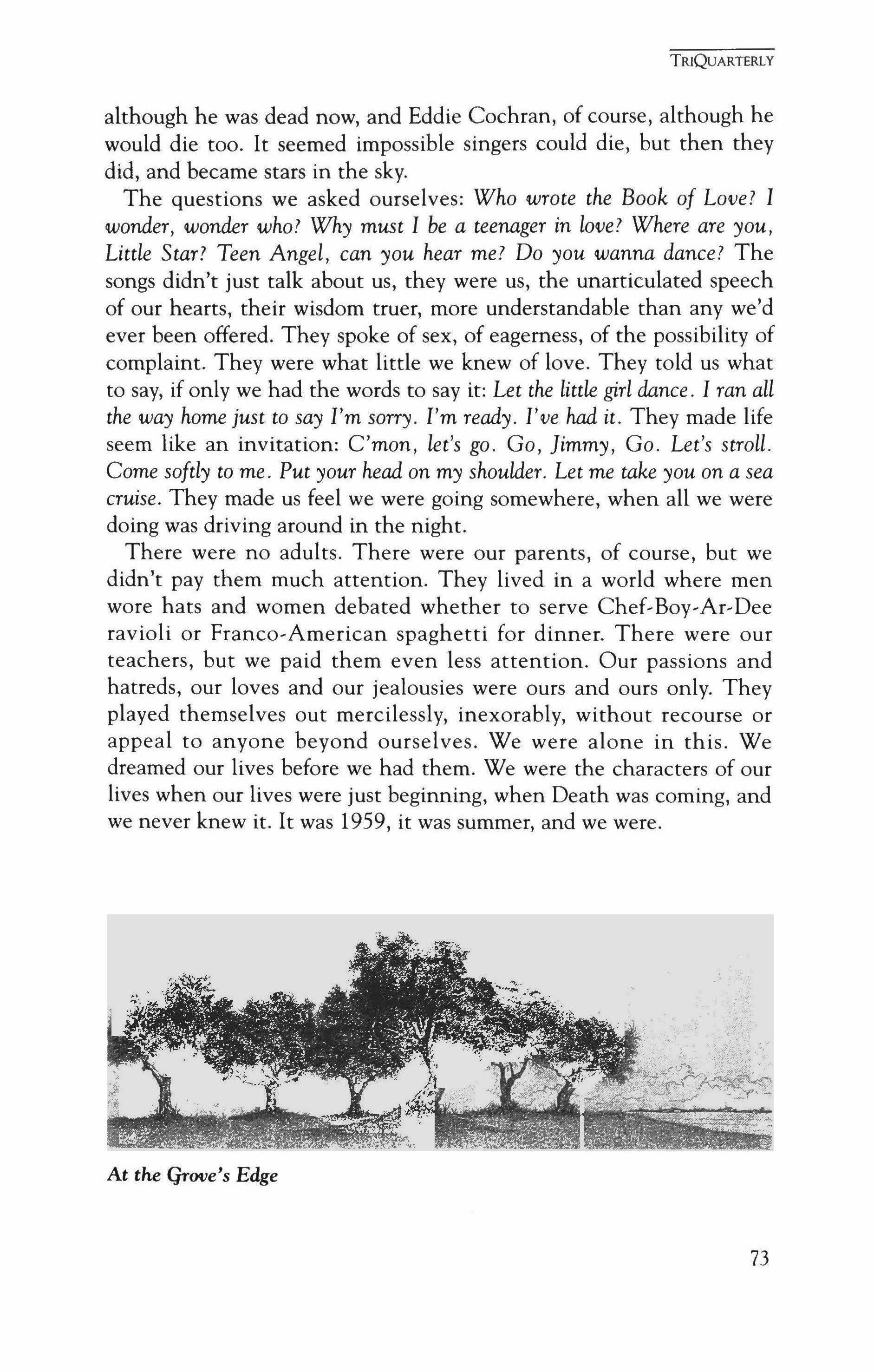
although he was dead now, and Eddie Cochran, of course, although he would die too. It seemed impossible singers could die, but then they did, and became stars in the sky.
The questions we asked ourselves: Who wrote the Book of Love? I wonder, wonder who? Why must I be a teenager in love? Where are you, Little Star? Teen Angel, can you hear me? Do you wanna dance? The songs didn't just talk about us, they were us, the unarticulated speech of our hearts, their wisdom truer, more understandable than any we'd ever been offered. They spoke of sex, of eagerness, of the possibility of complaint. They were what little we knew of love. They told us what to say, if only we had the words to say it: Let the little girl dance. I ran all the way home just to say I'm sorry. I'm ready. I've had it. They made life seem like an invitation: C'mon, let's go. Go, Jimmy, Go. Let's stroll. Come softly to me. Put your head on my shoulder. Let me take you on a sea cruise. They made us feel we were going somewhere, when all we were doing was driving around in the night.
There were no adults. There were our parents, of course, but we didn't pay them much attention. They lived in a world where men wore hats and women debated whether to serve Chef-Boy-Ar-Dee ravioli or Franco-American spaghetti for dinner. There were our teachers, but we paid them even less attention. Our passions and hatreds, our loves and our jealousies were ours and ours only. They played themselves out mercilessly, inexorably, without recourse or appeal to anyone beyond ourselves. We were alone in this. We dreamed our lives before we had them. We were the characters of our lives when our lives were just beginning, when Death was coming, and we never knew it. It was 1959, it was summer, and we were.
TRIQUARTERLY
73
At the Grove's Edge
Rafters
Kevin McIlvoy
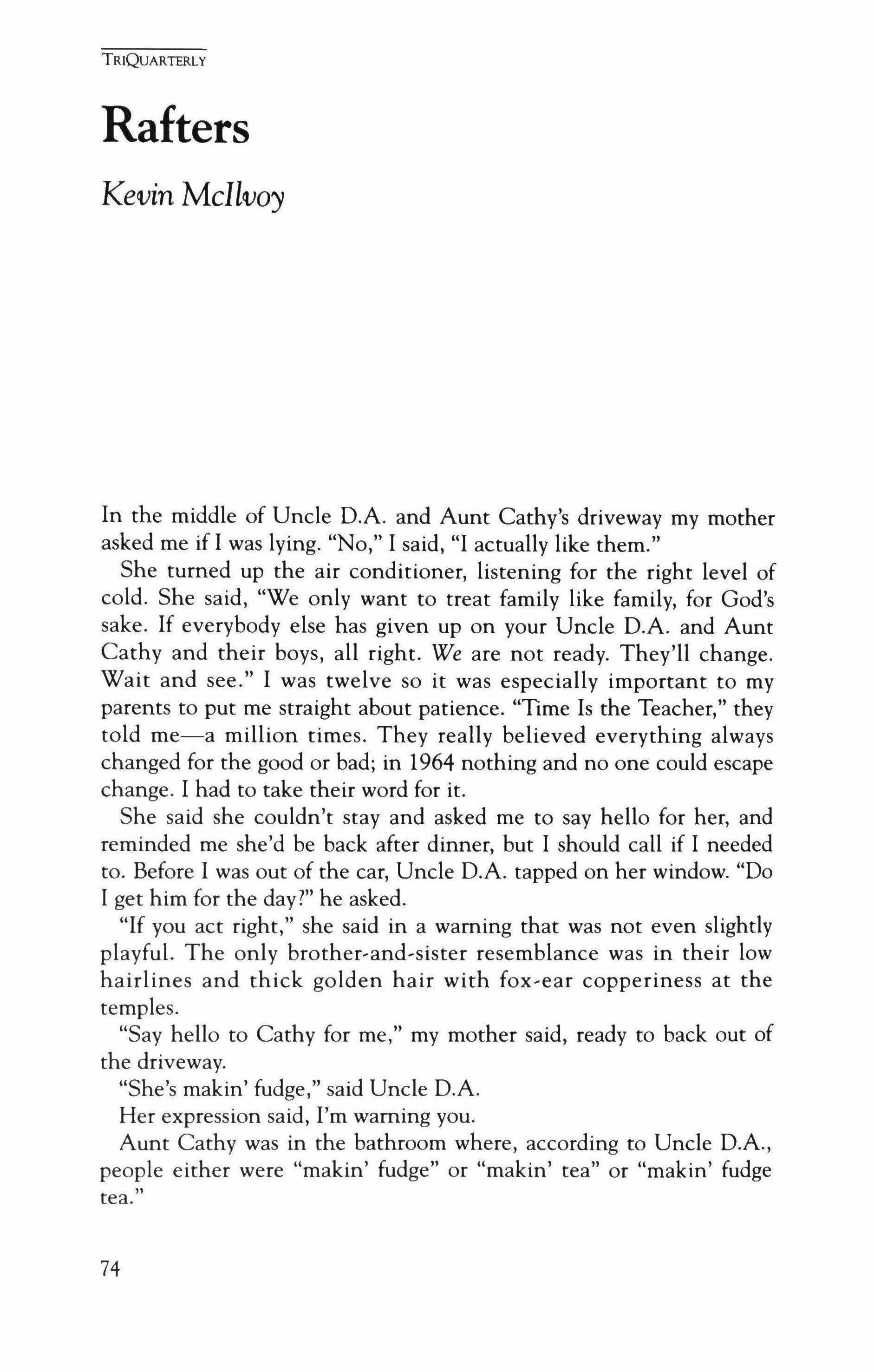
In the middle of Uncle D.A. and Aunt Cathy's driveway my mother asked me if I was lying. "No," I said, "I actually like them."
She turned up the air conditioner, listening for the right level of cold. She said, "We only want to treat family like family, for God's sake. If everybody else has given up on your Uncle D.A. and Aunt Cathy and their boys, all right. We are not ready. They'll change. Wait and see." I was twelve so it was especially important to my parents to put me straight about patience. "Time Is the Teacher," they told me-a million times. They really believed everything always changed for the good or bad; in 1964 nothing and no one could escape change. I had to take their word for it.
She said she couldn't stay and asked me to say hello for her, and reminded me she'd be back after dinner, but I should call if I needed to. Before I was out of the car, Uncle D.A. tapped on her window. "Do I get him for the day?" he asked.
"If you act right," she said in a warning that was not even slightly playful. The only brother-and-sister resemblance was in their low hairlines and thick golden hair with fox-ear copperiness at the temples.
"Say hello to Cathy for me," my mother said, ready to back out of the driveway.
"She's makin' fudge," said Uncle D.A.
Her expression said, I'm warning you.
Aunt Cathy was in the bathroom where, according to Uncle D.A., people either were "makin' fudge" or "makin' tea" or "makin' fudge tea."
TRIQUARTERLY
74
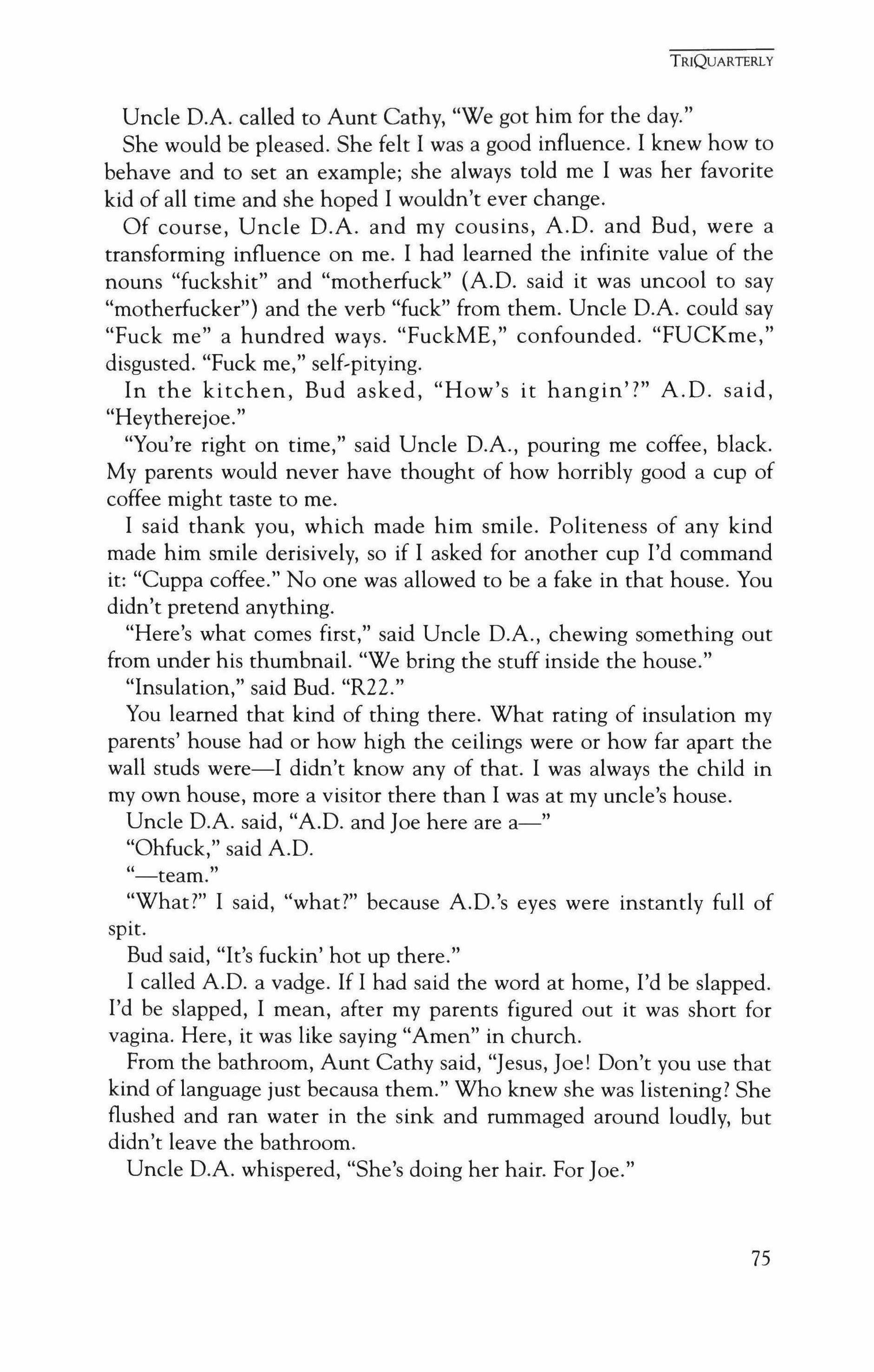
Uncle D.A. called to Aunt Cathy, "We got him for the day."
She would be pleased. She felt I was a good influence. I knew how to behave and to set an example; she always told me I was her favorite kid of all time and she hoped I wouldn't ever change.
Of course, Uncle D.A. and my cousins, A.D. and Bud, were a transforming influence on me. I had learned the infinite value of the nouns "fuckshit" and "motherfuck" (A.D. said it was uncool to say "motherfucker") and the verb "fuck" from them. Uncle D.A. could say "Fuck me" a hundred ways. "FuckME," confounded. "FUCKme," disgusted. "Fuck me," self-pitying,
In the kitchen, Bud asked, "How's it hangin'?" A.D. said, "Heytherejoe."
"You're right on time," said Uncle D.A., pouring me coffee, black. My parents would never have thought of how horribly good a cup of coffee might taste to me.
I said thank you, which made him smile. Politeness of any kind made him smile derisively, so if I asked for another cup I'd command it: "Cuppa coffee." No one was allowed to be a fake in that house. You didn't pretend anything.
"Here's what comes first," said Uncle D.A., chewing something out from under his thumbnail. "We bring the stuff inside the house." "Insulation," said Bud. "R22."
You learned that kind of thing there. What rating of insulation my parents' house had or how high the ceilings were or how far apart the wall studs were-I didn't know any of that. I was always the child in my own house, more a visitor there than I was at my uncle's house.
Uncle D.A. said, "A.D. and Joe here are a-" "Ohfuck," said A.D. "-team."
"What?" I said, "what?" because A.D.'s eyes were instantly full of spit.
Bud said, "It's fuckin' hot up there."
I called A.D. a vadge. If I had said the word at home, I'd be slapped. I'd be slapped, I mean, after my parents figured out it was short for vagina. Here, it was like saying "Amen" in church.
From the bathroom, Aunt Cathy said, "Jesus, Joe! Don't you use that kind of language just becausa them." Who knew she was listening? She flushed and ran water in the sink and rummaged around loudly, but didn't leave the bathroom.
Uncle D.A. whispered, "She's doing her hair. For Joe."
TRIQUARTERLY
75
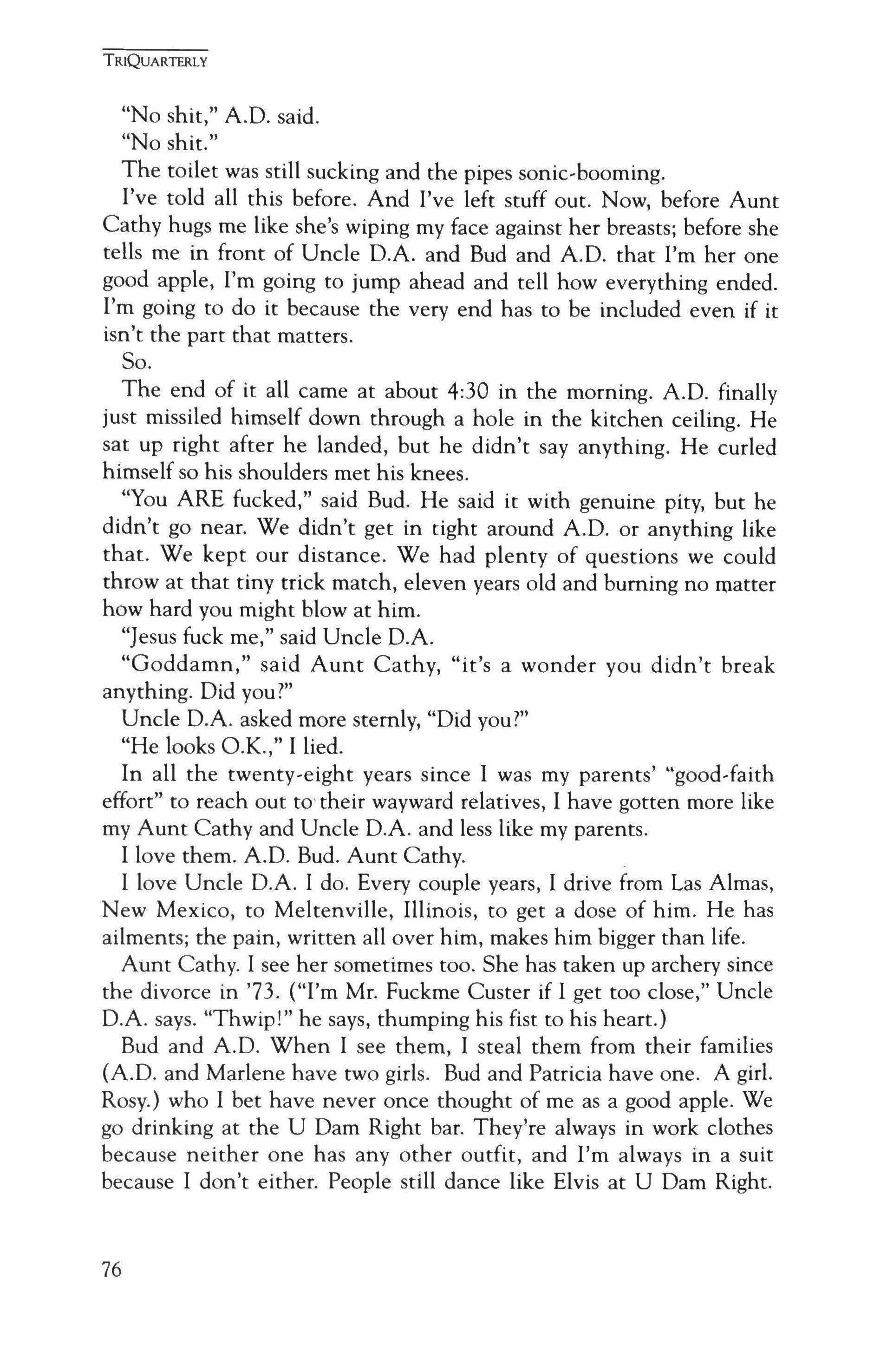
"No shit," A.D. said. "No shit."
The toilet was still sucking and the pipes sonic,booming. I've told all this before. And I've left stuff out. Now, before Aunt Cathy hugs me like she's wiping my face against her breasts; before she tells me in front of Uncle D.A. and Bud and A.D. that I'm her one good apple, I'm going to jump ahead and tell how everything ended. I'm going to do it because the very end has to be included even if it isn't the part that matters.
So.
The end of it all came at about 4:30 in the morning. A.D. finally just missiled himself down through a hole in the kitchen ceiling. He sat up right after he landed, but he didn't say anything. He curled himself so his shoulders met his knees.
"You ARE fucked," said Bud. He said it with genuine pity, but he didn't go near. We didn't get in tight around A.D. or anything like that. We kept our distance. We had plenty of questions we could throw at that tiny trick match, eleven years old and burning no matter how hard you might blow at him.
"Jesus fuck me," said Uncle D.A.
"Goddamn," said Aunt Cathy, "it's a wonder you didn't break anything. Did you?"
Uncle D.A. asked more sternly, "Did you?"
"He looks O.K.," I lied.
In all the twenty-eight years since I was my parents' "good-faith effort" to reach out to-their wayward relatives, I have gotten more like my Aunt Cathy and Uncle D.A. and less like my parents.
I love them. A.D. Bud. Aunt Cathy.
I love Uncle D.A. I do. Every couple years, I drive from Las Almas, New Mexico, to Meltenville, Illinois, to get a dose of him. He has ailments; the pain, written all over him, makes him bigger than life.
Aunt Cathy. I see her sometimes too. She has taken up archery since the divorce in '73. {"I'm Mr. Fuckme Custer if I get too close," Uncle D.A. says. "Thwip!" he says, thumping his fist to his heart.)
Bud and A.D. When I see them, I steal them from their families {A.D. and Marlene have two girls. Bud and Patricia have one. A girl. Rosy.} who I bet have never once thought of me as a good apple. We go drinking at the U Dam Right bar. They're always in work clothes because neither one has any other outfit, and I'm always in a suit because I don't either. People still dance like Elvis at U Dam Right.
TRIQUARTERLY
76
It's the nineties but nobody cares.
The End. That's it, the very end.
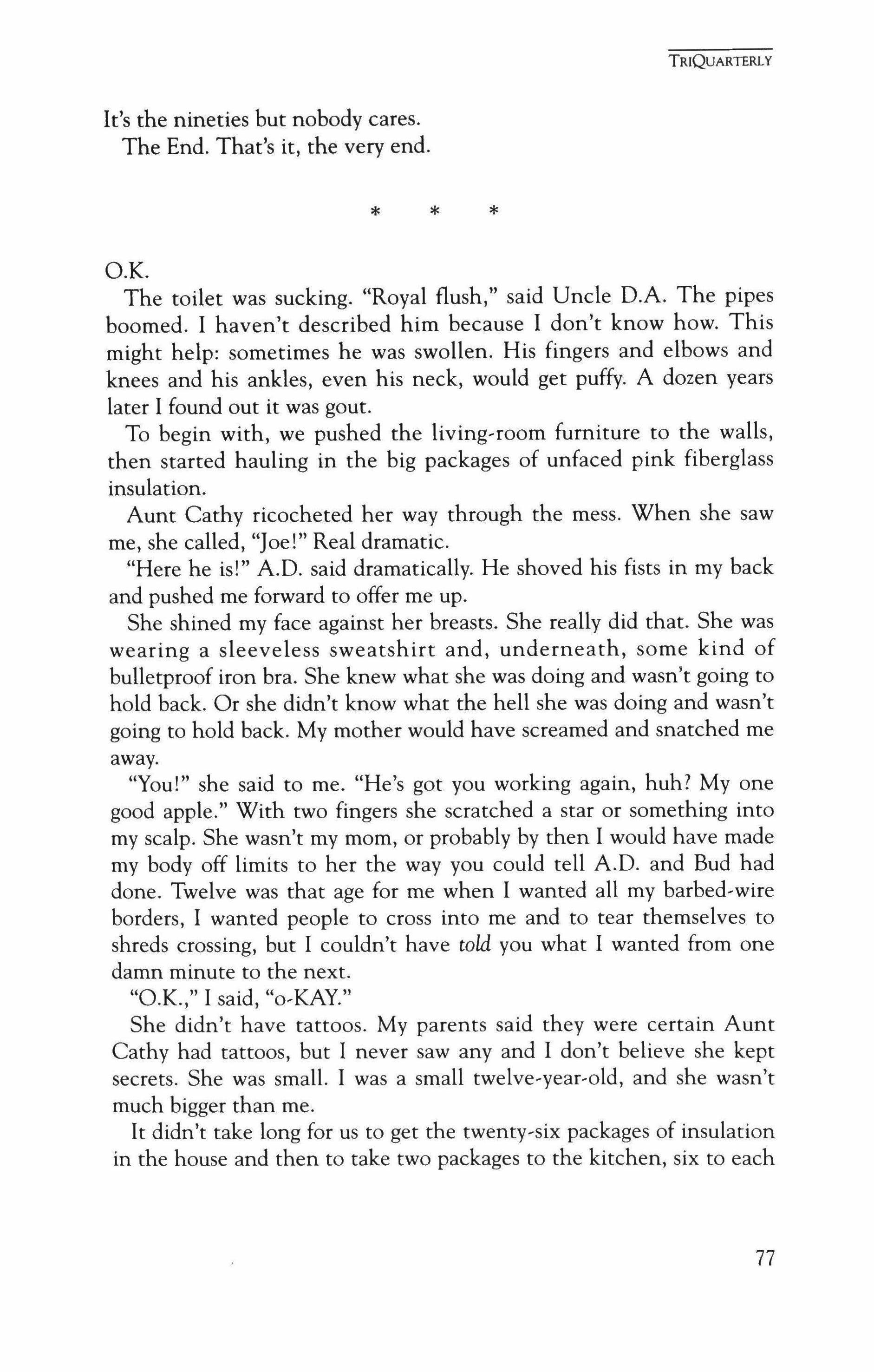
O.K.
The toilet was sucking. "Royal flush," said Uncle D.A. The pipes boomed. I haven't described him because I don't know how. This might help: sometimes he was swollen. His fingers and elbows and knees and his ankles, even his neck, would get puffy. A dozen years later I found out it was gout.
To begin with, we pushed the living-room furniture to the walls, then started hauling in the big packages of unfaced pink fiberglass insulation.
Aunt Cathy ricocheted her way through the mess. When she saw me, she called, "Joe!" Real dramatic.
"Here he is!" A.D. said dramatically. He shoved his fists in my back and pushed me forward to offer me up.
She shined my face against her breasts. She really did that. She was wearing a sleeveless sweatshirt and, underneath, some kind of bulletproof iron bra. She knew what she was doing and wasn't going to hold back. Or she didn't know what the hell she was doing and wasn't going to hold back. My mother would have screamed and snatched me away.
"You!" she said to me. "He's got you working again, huh? My one good apple." With two fingers she scratched a star or something into my scalp. She wasn't my mom, or probably by then I would have made my body off limits to her the way you could tell A.D. and Bud had done. Twelve was that age for me when I wanted all my barbed-wire borders, I wanted people to cross into me and to tear themselves to shreds crossing, but I couldn't have told you what I wanted from one damn minute to the next.
"O.K.," I said, "o-KAY."
She didn't have tattoos. My parents said they were certain Aunt Cathy had tattoos, but I never saw any and I don't believe she kept secrets. She was small. I was a small twelve-year-old, and she wasn't much bigger than me.
It didn't take long for us to get the twenty-six packages of insulation in the house and then to take two packages to the kitchen, six to each 77
TRIQUARTERLY
* * *
TRIQUARTERLY
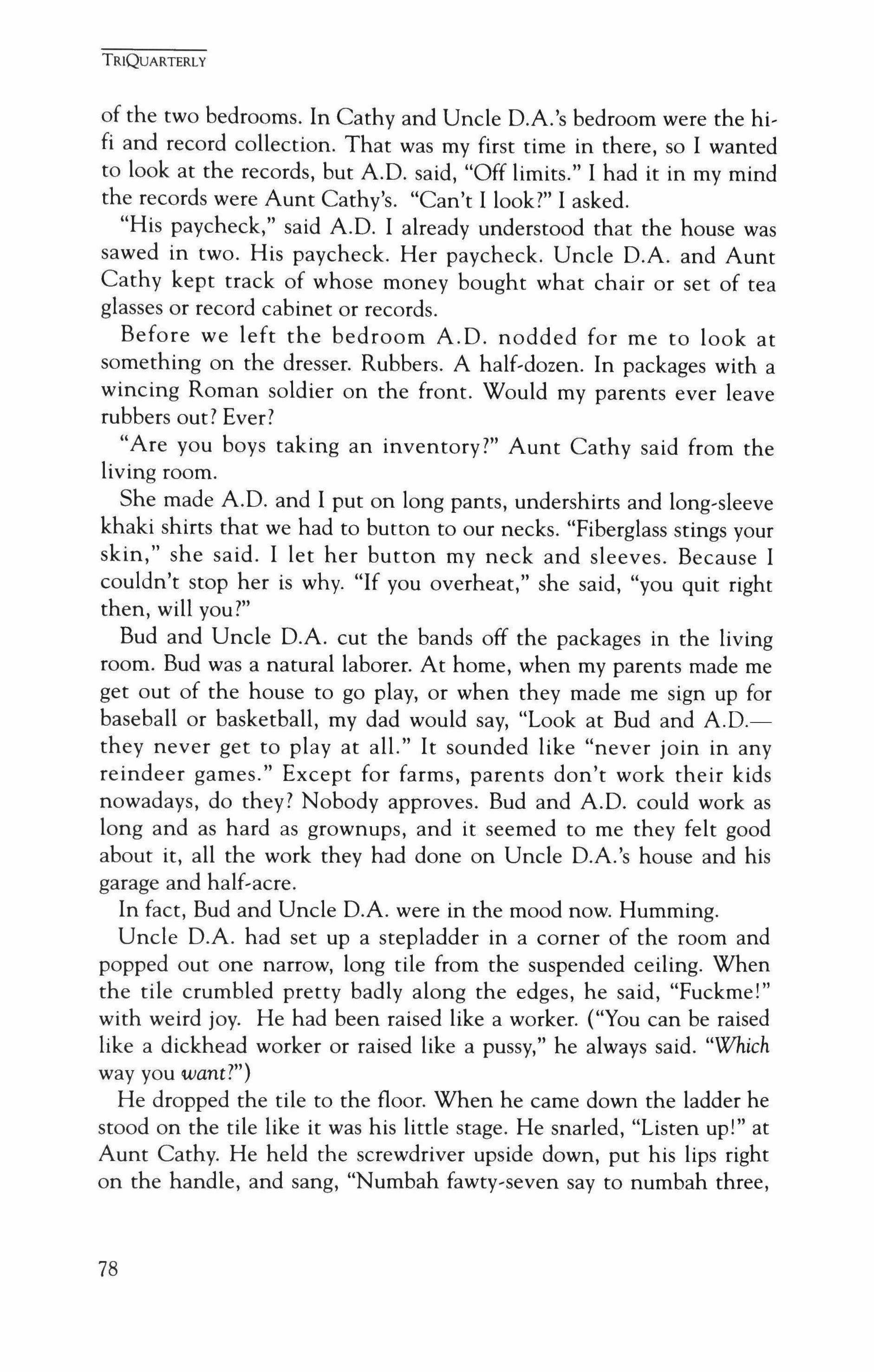
of the two bedrooms. In Cathy and Uncle D.A's bedroom were the hifi and record collection. That was my first time in there, so I wanted to look at the records, but A.D. said, "Off limits." I had it in my mind the records were Aunt Cathy's. "Can't I look?" I asked.
"His paycheck," said AD. I already understood that the house was sawed in two. His paycheck. Her paycheck. Uncle D.A. and Aunt Cathy kept track of whose money bought what chair or set of tea glasses or record cabinet or records.
Before we left the bedroom A.D. nodded for me to look at something on the dresser. Rubbers. A half-dozen. In packages with a wincing Roman soldier on the front. Would my parents ever leave rubbers out? Ever?
"Are you boys taking an inventory?" Aunt Cathy said from the living room.
She made A.D. and I put on long pants, undershirts and long-sleeve khaki shirts that we had to button to our necks. "Fiberglass stings your skin," she said. I let her button my neck and sleeves. Because I couldn't stop her is why. "If you overheat," she said, "you quit right then, will you?"
Bud and Uncle D.A. cut the bands off the packages in the living room. Bud was a natural laborer. At home, when my parents made me get out of the house to go play, or when they made me sign up for baseball or basketball, my dad would say, "Look at Bud and AD.they never get to play at all." It sounded like "never join in any reindeer games." Except for farms, parents don't work their kids nowadays, do they? Nobody approves. Bud and A.D. could work as long and as hard as grownups, and it seemed to me they felt good about it, all the work they had done on Uncle D.A.'s house and his garage and half-acre.
In fact, Bud and Uncle D.A. were in the mood now. Humming.
Uncle D.A. had set up a stepladder in a corner of the room and popped out one narrow, long tile from the suspended ceiling. When the tile crumbled pretty badly along the edges, he said, "Fuckme!" with weird joy. He had been raised like a worker. ("You can be raised like a dickhead worker or raised like a pussy," he always said. "Which way you want?")
He dropped the tile to the floor. When he came down the ladder he stood on the tile like it was his little stage. He snarled, "Listen up!" at Aunt Cathy. He held the screwdriver upside down, put his lips right on the handle, and sang, "Numbah fawty-seven say to numbah three,
78

'You da cutest jailbird I evah did see. '" Aunt Cathy batted her eyelashes at Uncle Elvis.
I was sing-thinking the next words, I sure would be delighted with your company. There was a rhythm there. I could fit into it. I wanted to be a part of it.
A.D. was already climbing up the ladder. "Come on," he said.
I put my gloves on, brand-new leather gloves, and followed him up. Hold it. There's a part I left out of the beginning.
Well, hell, I left out a lot.
This won't take too long.
Once, one day, my family and their family did get together. We all went to the two-block zoo in Alton. Even when I was twelve the Alton Zoo seemed like what it was: two blocks long. This was a few months after Uncle D.A. had volunteered to prune my parents' peach tree. With his bare hands, he had stripped off branches-big ones and small ones, he called them all "suckers"-and even after my mother begged him to stop, he ripped and twisted and cracked off limbs saying, "It's a sucker, Rita. I know what I'm doin'."
Time is the teacher. The tree thrived after that.
When Time inclined my mother to forgive and forget, we went to the zoo where we all got along fine but where (I'm only guessing now) my parents decided to never ever invite them to our home even though I would be sent to their home once in a while as a "good faith effort."
What happened is that A.D. dared me to mash my face on the glass of the herpetological exhibit, which I wouldn't do, which led him to call me a vadge, which caused no problem since my parents didn't hear any of it.
A.D. kept at it. He got Bud to join in.
I brought up swimming snakes. "Do you think you could outswim a venomous snake?" I asked.
Bud said no, of course not.
"Could you, A.D.?"
"Maybe," he said. "They swim faster than the ones with no poison?"
"We can't swim," said Bud. "Neither of us."
I knew that already. And I knew they'd never been in a boat when I asked if they ever water-skied. I said my mother's words before I thought twice about who would hear them: "Being in a boat is the free-est feeling."
"You vadge," Bud said. "Who the fuck wants to be in a frying pan on
TRIQUARTERLY
79

the water?"
A.D. tapped the glass cage over the four or five lazy "Snakes of the Desert Southwest." They stretched around volcanic rocks painted phosphorescent white.
"I'll teach you to swim sometime if you want," I said to A.D.
"Yeah," he said. "That would be the free-est feeling."
At the aviary Bud wanted me to answer him about whether, when, where, and exactly how I masturbated. "Teach us," he said. We had a shouting match loud enough to upset some of the birds. It ended about the time our parents caught up with us.
None of that caused the problem.
Later in the day, A.D. showed me how to bend over and crunch my thumb against one side of my nose so I could blow a thick, unbroken noodle of booger out of the other side. He'd wipe some of the mucus on your neck if you didn't duck quick.
I learned well. A week after the zoo expedition I did it expertly when I thought my parents weren't looking. I had to explain who taught me.
Well, they already knew.
Now I'll tell all the rest.
I put my hands on the rungs of the ladder to follow A.D. like the astronaut Wally Schirra climbing the steps into the Mercury-Atlas. These days they come in all sizes, but in those days astronauts were never allowed to be over five feet tall. You had to have guts but you had to be a shrimp. I could see that A.D. and I had been chosen for the rafter crew because we had half the qualifications of Wally Schirra. I pushed my shoulders toward my ears to squeeze into the rafters.
"In 'er?" asked Uncle D.A.
I spider-crawled over the web of ceiling joists. My eyes were still adjusting when A.D. spit "Boo!" into the back of my head. I lost the butt-and-hands part of my balance but somehow stayed on with my sprawled legs or I would have fallen right through. "Fuck you!" I shouted. That and "Boo!" reverberated so much my head clanged like a bell.
"Let's rock!" That was Uncle D.A.'s Elvis voice. "Honey," Aunt Cathy asked, "watch it now."
TRIQUARTERLY
* * *
80
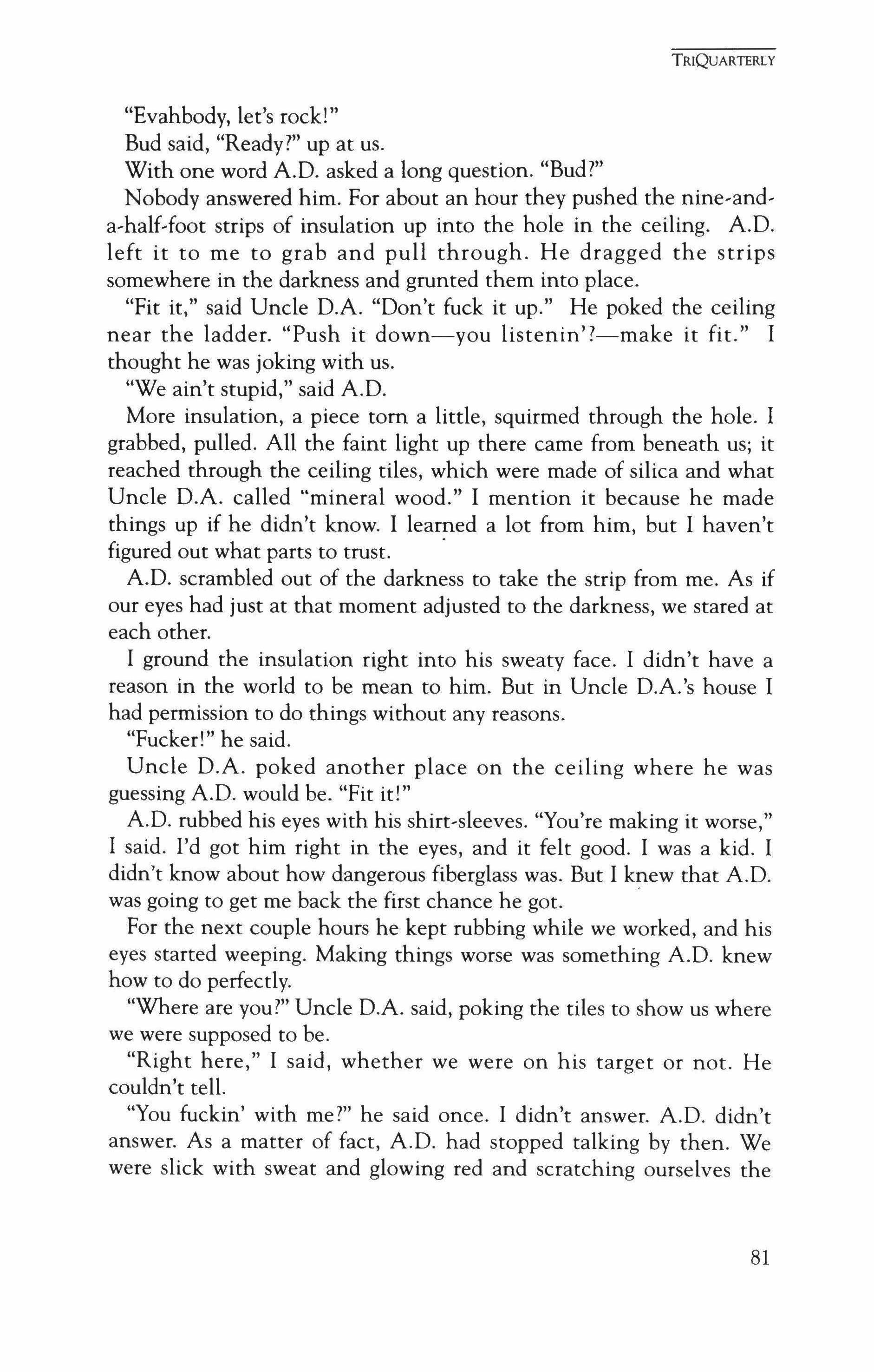
"Evahbody, let's rock!"
Bud said, "Ready?" up at us.
With one word A.D. asked a long question. "Bud?"
Nobody answered him. For about an hour they pushed the nine-anda-half-foot strips of insulation up into the hole in the ceiling. A.D. left it to me to grab and pull through. He dragged the strips somewhere in the darkness and grunted them into place.
"Fit it," said Uncle D.A. "Don't fuck it up." He poked the ceiling near the ladder. "Push it down-you listenin'?-make it fit." I thought he was joking with us.
"We ain't stupid," said A.D.
More insulation, a piece torn a little, squirmed through the hole. I grabbed, pulled. All the faint light up there came from beneath us; it reached through the ceiling tiles, which were made of silica and what Uncle D.A. called "mineral wood." I mention it because he made things up if he didn't know. I learned a lot from him, but I haven't figured out what parts to trust.
A.D. scrambled out of the darkness to take the strip from me. As if our eyes had just at that moment adjusted to the darkness, we stared at each other.
I ground the insulation right into his sweaty face. I didn't have a reason in the world to be mean to him. But in Uncle D.A.'s house I had permission to do things without any reasons.
"Fucker!" he said.
Uncle D.A. poked another place on the ceiling where he was guessing A.D. would be. "Fit it!"
A.D. rubbed his eyes with his shirt-sleeves. "You're making it worse," I said. I'd got him right in the eyes, and it felt good. I was a kid. I didn't know about how dangerous fiberglass was. But I knew that A.D. was going to get me back the first chance he got.
For the next couple hours he kept rubbing while we worked, and his eyes started weeping. Making things worse was something A.D. knew how to do perfectly.
"Where are you?" Uncle D.A. said, poking the tiles to show us where we were supposed to be.
"Right here," I said, whether we were on his target or not. He couldn't tell.
"You fuckin' with me?" he said once. I didn't answer. A.D. didn't answer. As a matter of fact, A.D. had stopped talking by then. We were slick with sweat and glowing red and scratching ourselves the
TRIQUARTERLY
81
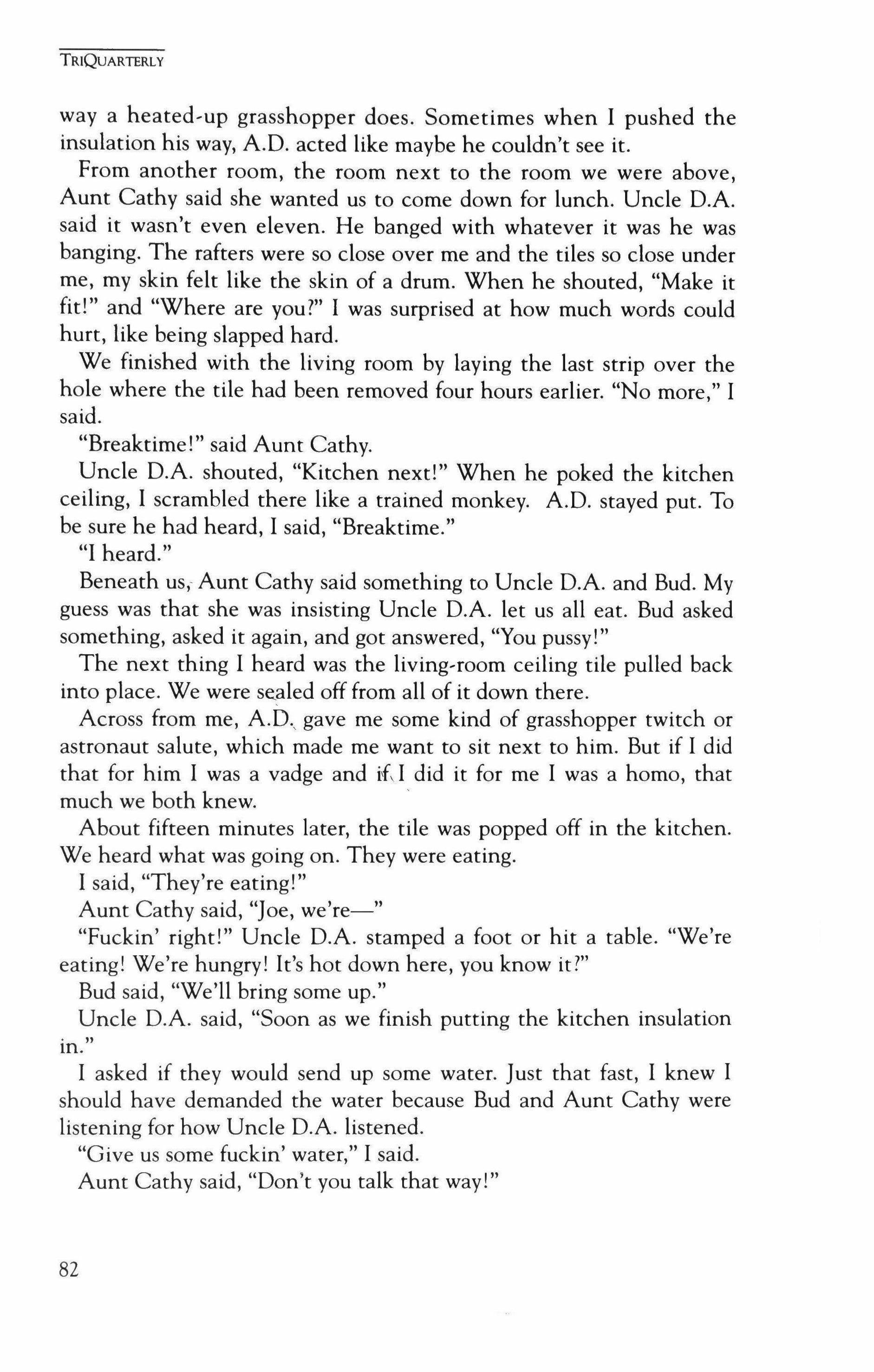
way a heated-up grasshopper does. Sometimes when I pushed the insulation his way, A.D. acted like maybe he couldn't see it.
From another room, the room next to the room we were above, Aunt Cathy said she wanted us to corne down for lunch. Uncle D.A. said it wasn't even eleven. He banged with whatever it was he was banging. The rafters were so close over me and the tiles so close under me, my skin felt like the skin of a drum. When he shouted, "Make it fit!" and "Where are you?" I was surprised at how much words could hurt, like being slapped hard.
We finished with the living room by laying the last strip over the hole where the tile had been removed four hours earlier. "No more," I said.
"Breaktime!" said Aunt Cathy.
Uncle D.A. shouted, "Kitchen next!" When he poked the kitchen ceiling, I scrambled there like a trained monkey. A.D. stayed put. To be sure he had heard, I said, "Breaktime."
"I heard."
Beneath us; Aunt Cathy said something to Uncle D.A. and Bud. My guess was that she was insisting Uncle D.A. let us all eat. Bud asked something, asked it again, and got answered, "You pussy!"
The next thing I heard was the living,room ceiling tile pulled back into place. We were sealed off from all of it down there.
Across from me, A.D., gave me some kind of grasshopper twitch or astronaut salute, which made me want to sit next to him. But if I did that for him I was a vadge and if, I did it for me I was a homo, that much we both knew.
About fifteen minutes later, the tile was popped off in the kitchen. We heard what was going on. They were eating. I said, "They're eating!"
Aunt Cathy said, "Joe, we're-" "Fuckin' right!" Uncle D.A. stamped a foot or hit a table. "We're eating! We're hungry! It's hot down here, you know it?"
Bud said, "We'll bring some up."
Uncle D.A. said, "Soon as we finish putting the kitchen insulation m.
I asked if they would send up some water. Just that fast, I knew I should have demanded the water because Bud and Aunt Cathy were listening for how Uncle D.A. listened.
"Give us some fuckin' water," I said.
Aunt Cathy said, "Don't you talk that way!"
TRIQUARTERLY
82
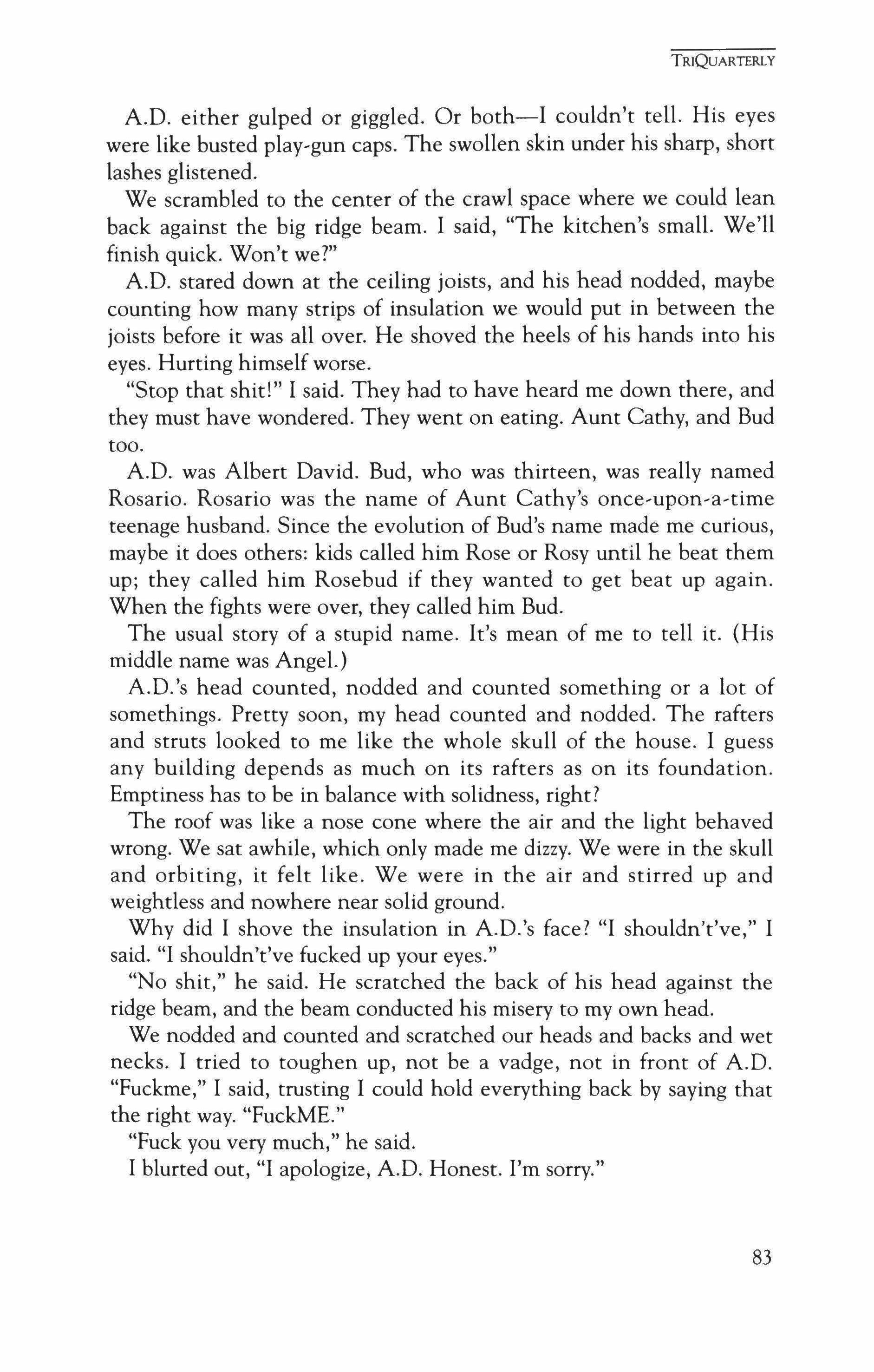
A.D. either gulped or giggled. Or both-I couldn't tell. His eyes were like busted play-gun caps. The swollen skin under his sharp, short lashes glistened.
We scrambled to the center of the crawl space where we could lean back against the big ridge beam. I said, "The kitchen's small. We'll finish quick. Won't we?"
A.D. stared down at the ceiling joists, and his head nodded, maybe counting how many strips of insulation we would put in between the joists before it was all over. He shoved the heels of his hands into his eyes. Hurting himself worse.
"Stop that shit!" I said. They had to have heard me down there, and they must have wondered. They went on eating. Aunt Cathy, and Bud too.
A.D. was Albert David. Bud, who was thirteen, was really named Rosario. Rosario was the name of Aunt Cathy's once-upon-a-time teenage husband. Since the evolution of Bud's name made me curious, maybe it does others: kids called him Rose or Rosy until he beat them up; they called him Rosebud if they wanted to get beat up again. When the fights were over, they called him Bud.
The usual story of a stupid name. It's mean of me to tell it. (His middle name was Angel.)
A.D.'s head counted, nodded and counted something or a lot of somethings. Pretty soon, my head counted and nodded. The rafters and struts looked to me like the whole skull of the house. I guess any building depends as much on its rafters as on its foundation.
Emptiness has to be in balance with solidness, right?
The roof was like a nose cone where the air and the light behaved wrong. We sat awhile, which only made me dizzy. We were in the skull and orbiting, it felt like. We were in the air and stirred up and weightless and nowhere near solid ground.
Why did I shove the insulation in A.D.'s face? "I shouldn't've," I said. "I shouldn't've fucked up your eyes."
"No shit," he said. He scratched the back of his head against the ridge beam, and the beam conducted his misery to my own head.
We nodded and counted and scratched our heads and backs and wet necks. I tried to toughen up, not be a vadge, not in front of A.D. "Fuckme," I said, trusting I could hold everything back by saying that the right way. "FuckME."
"Fuck you very much," he said.
I blurted out, "I apologize, A.D. Honest. I'm sorry."
TRIQUARTERLY
83
TRIQUARTERLY

He knocked his head against mine. Hard. It hurt so much it made me sob. 1 apologized again.
He got quiet. He was accepting my apology, 1 could tell. He said, "Grow up, Joe."
1 was thankful to him for helping get it all over with. We shrugged it off.
After they sent up the next strip of insulation, Bud poked his head in. He whispered, "Joe, A.D. Come down and eat." He popped back down so fast you couldn't be sure he had been there.
"Did you hear?" I asked. A.D. ignored me.
Uncle D.A. banged the tiles on the opposite side from us. "Start here!" he yelled. He told Aunt Cathy to stop something-or-other, and then he said, "And stop moaning like a jackass." 1 heard part of what she was saying, which 1 think she must have been saying to Bud: "1 don't know if we should."
The ceiling jumped. "Start here!"
A.D. put down the insulation he had hold of. He rubbed his eyes. Godzilla always rubbed his eyes in the Godzilla movies. Does anybody remember that? He scrambled to the place Uncle D.A. banged. With a blind jump, he crashed his legs through the tiles and caught the joists with his hands so he would not fall all the way to the floor below. You can imagine what that did to his hands. He said, "Hello. Anybody home?"
"FuckME!" Uncle D.A. beat A.D.'s legs and ankles. I figured what he was thwacking A.D. with was a broomstick.
"A.D.!" Aunt Cathy shouted.
"He's O.K.," said Bud, and he asked, "A.D., you O.K.!"
Uncle D.A. screamed, "Fuckshit! A.D.! A.D.?" He called up to me: "J 7" oe.
"He's O.K.," 1 said. A.D. was already scrambling over to another joist and making himself into a skewer. This time, he only crashed through as far as his knees. He caught the joists, and swimkicked his legs, and pulled up, and looked down through the hole where the broomhandle whipped at him.
Uncle D.A. stung the walls, the floor. His breathing started to sound like buzzing.
"All right!" said Uncle D.A., as final as a human voice can get. He banged the broomhandle once, real hard, on one tile. A.D. scrambled to that particular tile and hammered his legs through to his knees and screwed himself around to break out as much of the tile as possible, 1
84
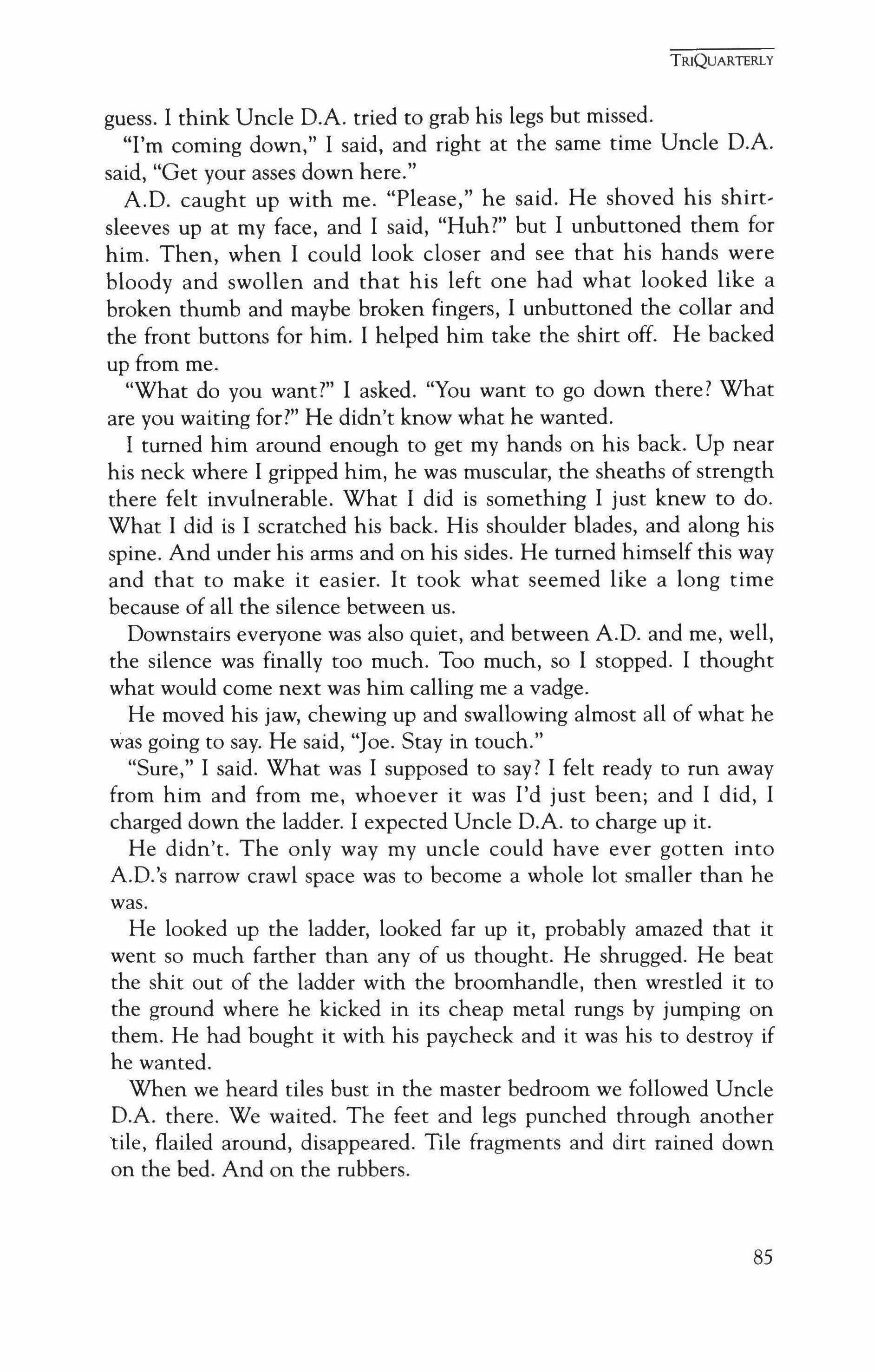
guess. I think Uncle D.A. tried to grab his legs but missed.
"I'm coming down," I said, and right at the same time Uncle D.A. said, "Get your asses down here."
A.D. caught up with me. "Please," he said. He shoved his shirtsleeves up at my face, and I said, "Huh?" but I unbuttoned them for him. Then, when I could look closer and see that his hands were bloody and swollen and that his left one had what looked like a broken thumb and maybe broken fingers, I unbuttoned the collar and the front buttons for him. I helped him take the shirt off. He backed up from me.
"What do you want?" I asked. "You want to go down there? What are you waiting for?" He didn't know what he wanted. I turned him around enough to get my hands on his back. Up near his neck where I gripped him, he was muscular, the sheaths of strength there felt invulnerable. What I did is something I just knew to do. What I did is I scratched his back. His shoulder blades, and along his spine. And under his arms and on his sides. He turned himself this way and that to make it easier. It took what seemed like a long time because of all the silence between us.
Downstairs everyone was also quiet, and between A.D. and me, well, the silence was finally too much. Too much, so I stopped. I thought what would come next was him calling me a vadge.
He moved his jaw, chewing up and swallowing almost all of what he was going to say. He said, "Joe. Stay in touch."
"Sure," I said. What was I supposed to say? I felt ready to run away from him and from me, whoever it was I'd just been; and I did, I charged down the ladder. I expected Uncle D.A. to charge up it.
He didn't. The only way my uncle could have ever gotten into A.D.'s narrow crawl space was to become a whole lot smaller than he was.
He looked up the ladder, looked far up it, probably amazed that it went so much farther than any of us thought. He shrugged. He beat the shit out of the ladder with the broomhandle, then wrestled it to the ground where he kicked in its cheap metal rungs by jumping on them. He had bought it with his paycheck and it was his to destroy if he wanted.
When we heard tiles bust in the master bedroom we followed Uncle D.A. there. We waited. The feet and legs punched through another tile, flailed around, disappeared. Tile fragments and dirt rained down on the bed. And on the rubbers.
TRIQUARTERLY
85
TRIQUARTERLY
Aunt Cathy said, "We don't have money to fix it with." She didn't seem to be talking to any of us.
The Wrecker punched out three more tiles. We could hear him doing some kind of flamenco on the boards, panting.
Bud said, "You ain't gettin' lunch now, motherfuck." His voice was calm, admiring. For a long time after he said it, nothing happened.
We went to work. We threw the rubble into the middle of the rooms, and didn't bother with trash cans. We all worked in different rooms. I noticed how we were all apart like that. I noticed because when my family cleaned house we worked together in one room at a time and we talked and horsed around and forgot who was doing what, which was stupid and inefficient and meant we never really did a good job.
Bud said, "He's done."
A.D. didn't come down. I offered to go up after him but Aunt Cathy said, "Let him be, now."
Uncle D.A., who was in one of the bedrooms, said to Aunt Cathy, "You know what he's doin'?"
"What?" she said, but now Uncle D.A. put his head back and spoke up at the ceiling. "What are you doin'?"
From the back bathroom, Bud asked, "Should I go up?"
"No," I said, "don't go up there."
"A.D.," Uncle D.A. said, "Answer me. What are you doin'?"
It made sense to me he wouldn't answer.
"Like a damned child," Uncle D.A. said.
In the kitchen again, A.D. punched through. We went there and watched the ceiling grow legs three more times.
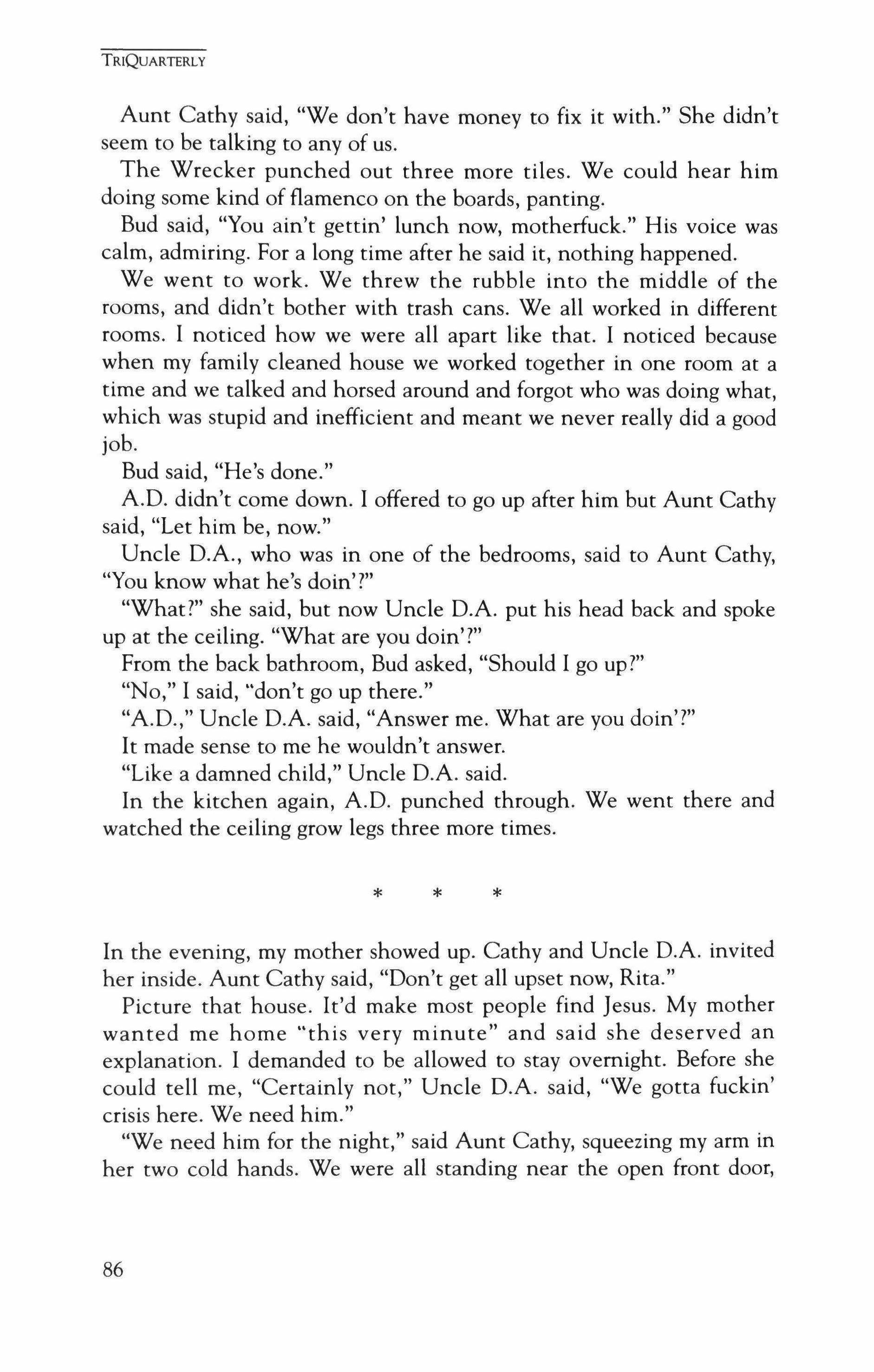
In the evening, my mother showed up. Cathy and Uncle D.A. invited her inside. Aunt Cathy said, "Don't get all upset now, Rita."
Picture that house. It'd make most people find Jesus. My mother wanted me home "this very minute" and said she deserved an explanation. I demanded to be allowed to stay overnight. Before she could tell me, "Certainly not," Uncle D.A. said, "We gotta fuckin' crisis here. We need him."
"We need him for the night," said Aunt Cathy, squeezing my arm in her two cold hands. We were all standing near the open front door,
* * *
86

but gazing inside not outside.
My mother looked Aunt Cathy over as if she were trying to discover the hidden tattoos. "He's-this isn't good for Joe," she said.
Uncle D.A. said, "The hell it's not!"
I told her A.D. was my best friend in the world. "This is all my fault," I said. I said leaving him wouldn't be fair. "He wouldn't leave me if it was me!"
She wasn't convinced. She stared straight at Uncle D.A.
"Fuuu-uuck meee, fuuck-uuck-MEE," said Uncle D.A. like someone singing "Amazing Grace" in the electric chair. She still wasn't convinced.
Right then, a voice came from heaven. Actually. "Please," A.D. said. His mouth must have been right up against one of the tiles. "Let Joe stay."
It scaredmy mother into wrapping her arms around herself, backing up to the doorframe, and leaning on it. "We are going," she said.
I shook off Aunt Cathy's hands. One word at a time, I commanded my mother: "Stay here with us. Or get out."
"You will not-" "Get out!"
Aunt Cathy said, "Joe!"
"You will not talk to me like that!" said my mother. "Just did," Bud said.
"Get out!"
"I'll bring your father!"
"Bring him," Bud said, the executioner's assistant.
My mother said, "I will."
Uncle D.A. turned her on her heels toward the door. "We need Joe," he said.
"I'm sending him!" she shouted at me. "You get in this car right now!"
Uncle D.A. hustled her to the car. He promised, "Things're going to change for the good around here. Give us time."
"It's too late-for all of you!" my mother said. We were already back in the house as she drove away.
"What'll she do? Ground you?" Bud said. I felt like I was part of his finest moment. When I swallowed that down, it burned, then felt good, then sickening.
"I'm in the living room," A.D. announced. His voice didn't travel down naturally. It poured through all the holes all at once.
TRlQuARTERLY
87
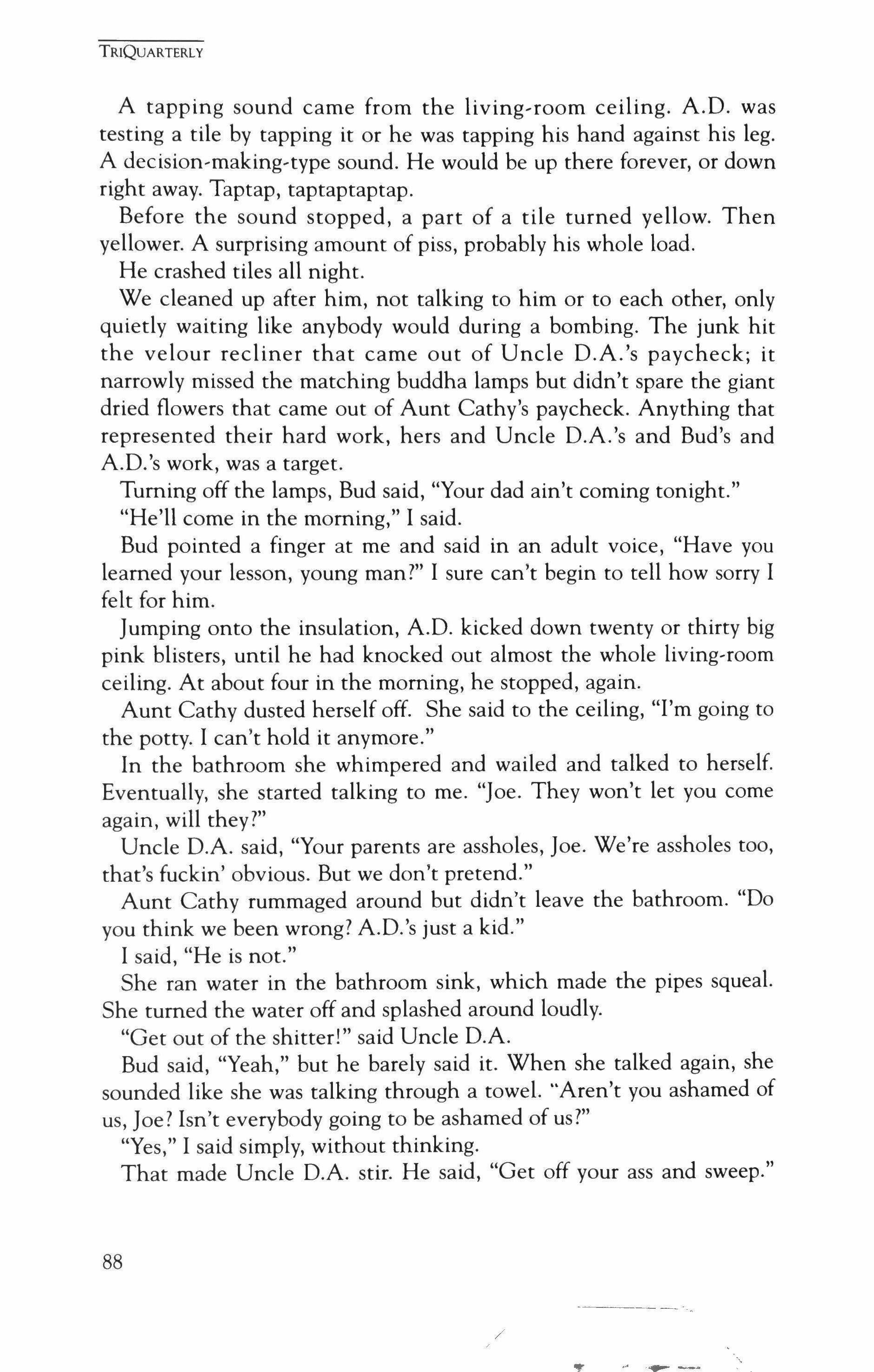
A tapping sound came from the living-room ceiling. A.D. was testing a tile by tapping it or he was tapping his hand against his leg. A decision,making,type sound. He would be up there forever, or down right away. Taptap, taptaptaptap.
Before the sound stopped, a part of a tile turned yellow. Then yellower. A surprising amount of piss, probably his whole load.
He crashed tiles all night.
We cleaned up after him, not talking to him or to each other, only quietly waiting like anybody would during a bombing. The junk hit the velour recliner that came out of Uncle D.A.'s paycheck; it narrowly missed the matching buddha lamps but didn't spare the giant dried flowers that came out of Aunt Cathy's paycheck. Anything that represented their hard work, hers and Uncle D.A.'s and Bud's and A.D.'s work, was a target.
Turning off the lamps, Bud said, "Your dad ain't coming tonight."
"He'll come in the morning," I said.
Bud pointed a finger at me and said in an adult voice, "Have you learned your lesson, young man?" I sure can't begin to tell how sorry I felt for him.
Jumping onto the insulation, A.D. kicked down twenty or thirty big pink blisters, until he had knocked out almost the whole living-room ceiling. At about four in the morning, he stopped, again.
Aunt Cathy dusted herself off. She said to the ceiling, "I'm going to the potty. I can't hold it anymore."
In the bathroom she whimpered and wailed and talked to herself. Eventually, she started talking to me. "Joe. They won't let you come again, will they?"
Uncle D.A. said, "Your parents are assholes, Joe. We're assholes too, that's fuckin' obvious. But we don't pretend."
Aunt Cathy rummaged around but didn't leave the bathroom. "Do you think we been wrong? A.D.'s just a kid."
I said, "He is not."
She ran water in the bathroom sink, which made the pipes squeal. She turned the water off and splashed around loudly.
"Get out of the shitter!" said Uncle D.A.
Bud said, "Yeah," but he barely said it. When she talked again, she sounded like she was talking through a towel. "Aren't you ashamed of us, Joe? Isn't everybody going to be ashamed of us?"
"Yes," I said simply, without thinking.
That made Uncle D.A. stir. He said, "Get off your ass and sweep."
TRIQUARTERLY
88
.,.

He nudged Bud, who didn't move from the rocker he was rocking in. He nudged me. "Fuck you," I said.
He didn't like it. He grabbed up the wrecked ladder in the kitchen and banged it into the ceiling. "I'm coming up, you sorry little shit. You're going to be a sorrier little shit."
Uncle D.A. wasn't going anywhere. He shook the ladder the way a prisoner shakes the bars in prison movies.
Directly overhead, A.D. was crouched and looking down. He looked down at all of us but saw nothing. The next time the ladder was rattled up at him he unleashed a big God's laugh, his mean imitation of God's laughter.
We laughed with him. Bud first. Aunt Cathy. Uncle D.A. Me.
TRIQUARTERLY
89
Beside Open Pastures
A Piece of Red Glass
Nelda Foux
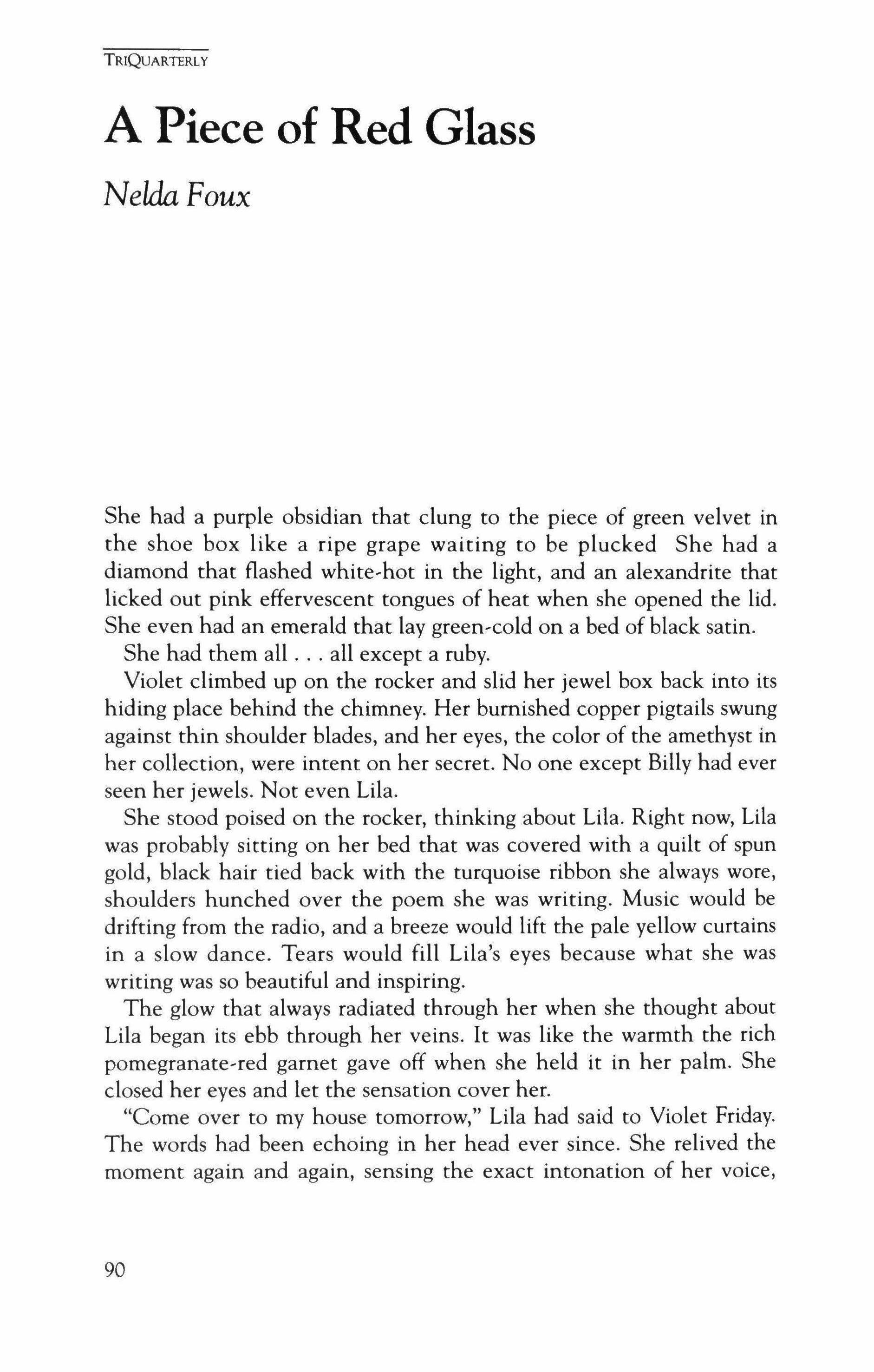
She had a purple obsidian that clung to the piece of green velvet in the shoe box like a ripe grape waiting to be plucked She had a diamond that flashed white-hot in the light, and an alexandrite that licked out pink effervescent tongues of heat when she opened the lid. She even had an emerald that lay green-cold on a bed of black satin.
She had them all all except a ruby.
Violet climbed up on the rocker and slid her jewel box back into its hiding place behind the chimney. Her burnished copper pigtails swung against thin shoulder blades, and her eyes, the color of the amethyst in her collection, were intent on her secret. No one except Billy had ever seen her jewels. Not even Lila.
She stood poised on the rocker, thinking about Lila. Right now, Lila was probably sitting on her bed that was covered with a quilt of spun gold, black hair tied back with the turquoise ribbon she always wore, shoulders hunched over the poem she was writing. Music would be drifting from the radio, and a breeze would lift the pale yellow curtains in a slow dance. Tears would fill Lila's eyes because what she was writing was so beautiful and inspiring.
The glow that always radiated through her when she thought about Lila began its ebb through her veins. It was like the warmth the rich pomegranate-red garnet gave off when she held it in her palm. She closed her eyes and let the sensation cover her.
"Come over to my house tomorrow," Lila had said to Violet Friday. The words had been echoing in her head ever since. She relived the moment again and again, sensing the exact intonation of her voice,
TRIQUARTERLY
90
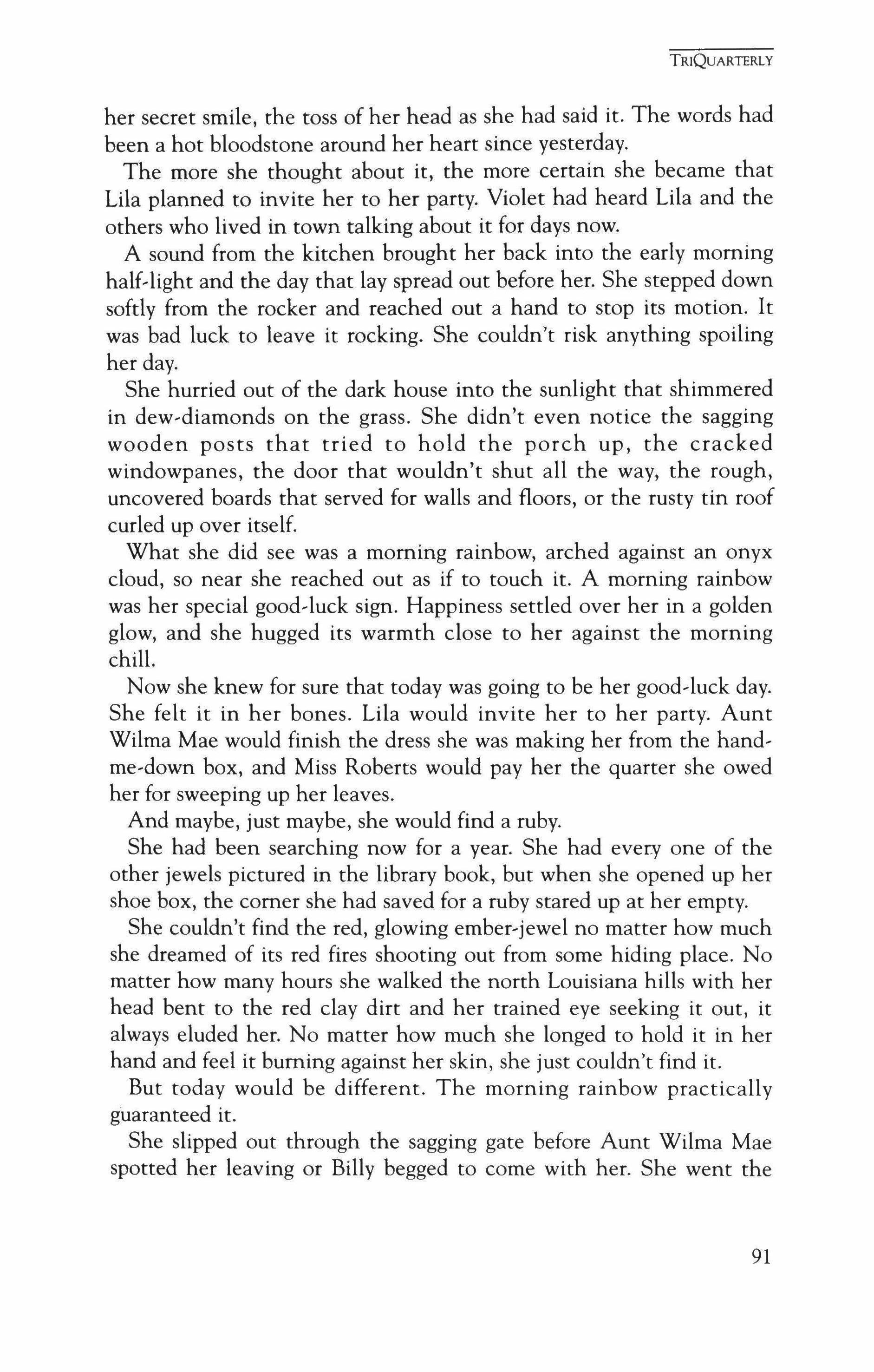
her secret smile, the toss of her head as she had said it. The words had been a hot bloodstone around her heart since yesterday.
The more she thought about it, the more certain she became that Lila planned to invite her to her party. Violet had heard Lila and the others who lived in town talking about it for days now.
A sound from the kitchen brought her back into the early morning half-light and the day that lay spread out before her. She stepped down softly from the rocker and reached out a hand to stop its motion. It was bad luck to leave it rocking. She couldn't risk anything spoiling her day.
She hurried out of the dark house into the sunlight that shimmered in dew-diamonds on the grass. She didn't even notice the sagging wooden posts that tried to hold the porch up, the cracked windowpanes, the door that wouldn't shut all the way, the rough, uncovered boards that served for walls and floors, or the rusty tin roof curled up over itself.
What she did see was a morning rainbow, arched against an onyx cloud, so near she reached out as if to touch it. A morning rainbow was her special good,luck sign. Happiness settled over her in a golden glow, and she hugged its warmth close to her against the morning chill.
Now she knew for sure that today was going to be her good-luck day. She felt it in her bones. Lila would invite her to her party. Aunt Wilma Mae would finish the dress she was making her from the hand, me-down box, and Miss Roberts would pay her the quarter she owed her for sweeping up her leaves.
And maybe, just maybe, she would find a ruby.
She had been searching now for a year. She had every one of the other jewels pictured in the library book, but when she opened up her shoe box, the comer she had saved for a ruby stared up at her empty.
She couldn't find the red, glowing ember-jewel no matter how much she dreamed of its red fires shooting out from some hiding place. No matter how many hours she walked the north Louisiana hills with her head bent to the red clay dirt and her trained eye seeking it out, it always eluded her. No matter how much she longed to hold it in her hand and feel it burning against her skin, she just couldn't find it.
But today would be different. The morning rainbow practically guaranteed it.
She slipped out through the sagging gate before Aunt Wilma Mae spotted her leaving or Billy begged to come with her. She went the 91
TRIQUARTERLY
TRIQUARTERLY
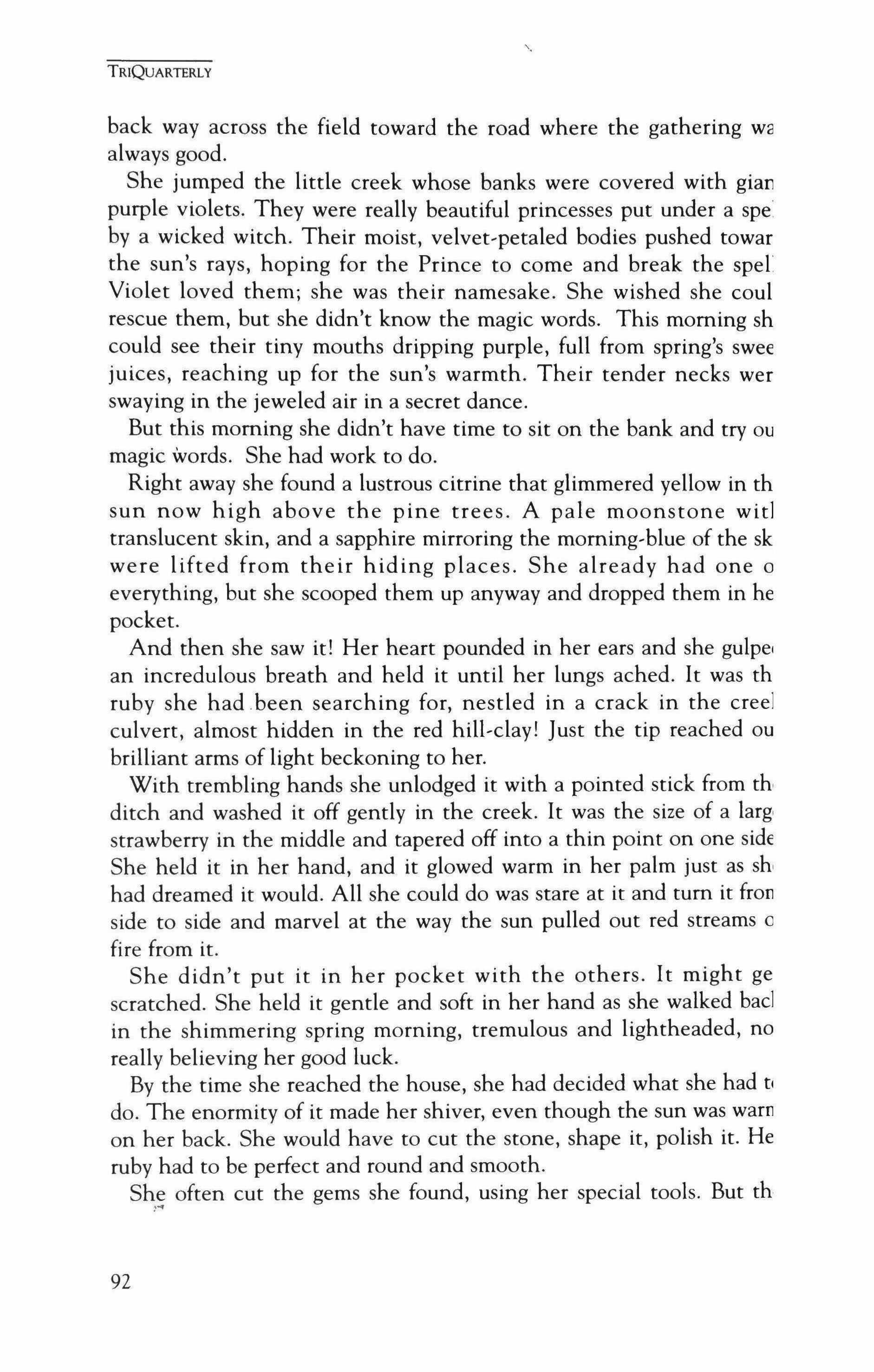
back way across the field toward the road where the gathering wa always good.
She jumped the little creek whose banks were covered with gian purple violets. They were really beautiful princesses put under a spe by a wicked witch. Their moist, velvet-petaled bodies pushed towar the sun's rays, hoping for the Prince to corne and break the spel Violet loved them; she was their namesake. She wished she coul rescue them, but she didn't know the magic words. This morning sh could see their tiny mouths dripping purple, full from spring's swee juices, reaching up for the sun's warmth. Their tender necks wer swaying in the jeweled air in a secret dance.
But this morning she didn't have time to sit on the bank and try ou magic words. She had work to do.
Right away she found a lustrous citrine that glimmered yellow in th sun now high above the pine trees. A pale moonstone witl translucent skin, and a sapphire mirroring the morning-blue of the sk were lifted from their hiding places. She already had one 0 everything, but she scooped them up anyway and dropped them in he pocket.
And then she saw it! Her heart pounded in her ears and she gulpe an incredulous breath and held it until her lungs ached. It was th ruby she had .been searching for, nestled in a crack in the creel culvert, almost hidden in the red hill-clay! Just the tip reached ou brilliant arms of light beckoning to her.
With trembling hands she unlodged it with a pointed stick from th ditch and washed it off gently in the creek. It was the size of a larg strawberry in the middle and tapered off into a thin point on one side She held it in her hand, and it glowed warm in her palm just as sh had dreamed it would. All she could do was stare at it and tum it fron side to side and marvel at the way the sun pulled out red streams 0 fire from it.
She didn't put it in her pocket with the others. It might ge scratched. She held it gentle and soft in her hand as she walked bad in the shimmering spring morning, tremulous and lightheaded, no really believing her good luck.
By the time she reached the house, she had decided what she had tl do. The enormity of it made her shiver, even though the sun was warn on her back. She would have to cut the stone, shape it, polish it. He ruby had to be perfect and round and smooth.
She often cut the gems she found, using her special tools. But th
92
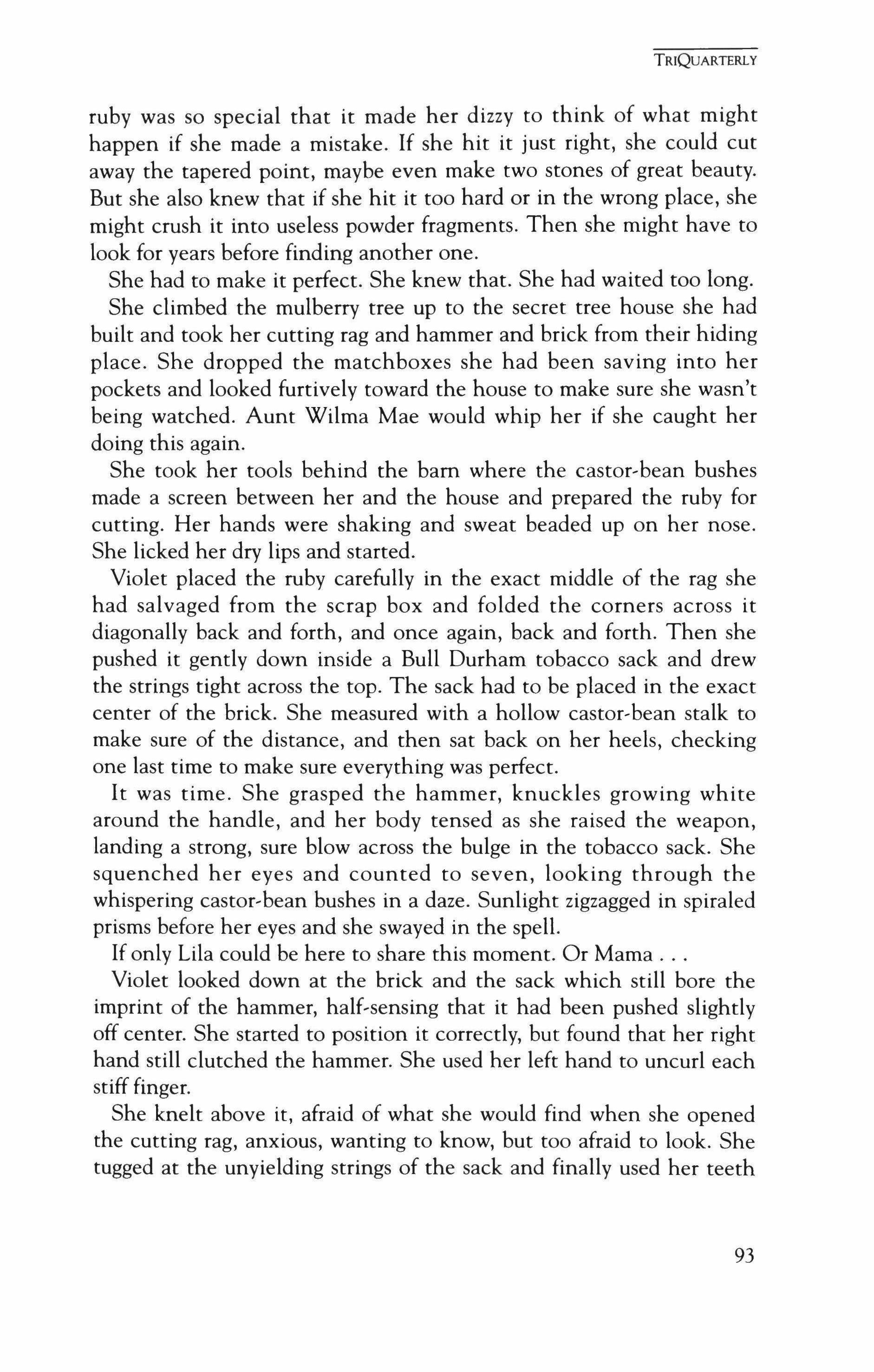
ruby was so special that it made her dizzy to think of what might happen if she made a mistake. If she hit it just right, she could cut away the tapered point, maybe even make two stones of great beauty. But she also knew that if she hit it too hard or in the wrong place, she might crush it into useless powder fragments. Then she might have to look for years before finding another one.
She had to make it perfect. She knew that. She had waited too long. She climbed the mulberry tree up to the secret tree house she had built and took her cutting rag and hammer and brick from their hiding place. She dropped the matchboxes she had been saving into her pockets and looked furtively toward the house to make sure she wasn't being watched. Aunt Wilma Mae would whip her if she caught her doing this again.
She took her tools behind the bam where the castor-bean bushes made a screen between her and the house and prepared the ruby for cutting. Her hands were shaking and sweat beaded up on her nose. She licked her dry lips and started.
Violet placed the ruby carefully in the exact middle of the rag she had salvaged from the scrap box and folded the corners across it diagonally back and forth, and once again, back and forth. Then she pushed it gently down inside a Bull Durham tobacco sack and drew the strings tight across the top. The sack had to be placed in the exact center of the brick. She measured with a hollow castor-bean stalk to make sure of the distance, and then sat back on her heels, checking one last time to make sure everything was perfect.
It was time. She grasped the hammer, knuckles growing white around the handle, and her body tensed as she raised the weapon, landing a strong, sure blow across the bulge in the tobacco sack. She squenched her eyes and counted to seven, looking through the whispering castor,bean bushes in a daze. Sunlight zigzagged in spiraled prisms before her eyes and she swayed in the spell.
If only Lila could be here to share this moment. Or Mama
Violet looked down at the brick and the sack which still bore the imprint of the hammer, half-sensing that it had been pushed slightly off center. She started to position it correctly, but found that her right hand still clutched the hammer. She used her left hand to uncurl each stiff finger.
She knelt above it, afraid of what she would find when she opened the cutting rag, anxious, wanting to know, but too afraid to look. She tugged at the unyielding strings of the sack and finally used her teeth
TRIQUARTERLY
93
TRIQUARTERLY
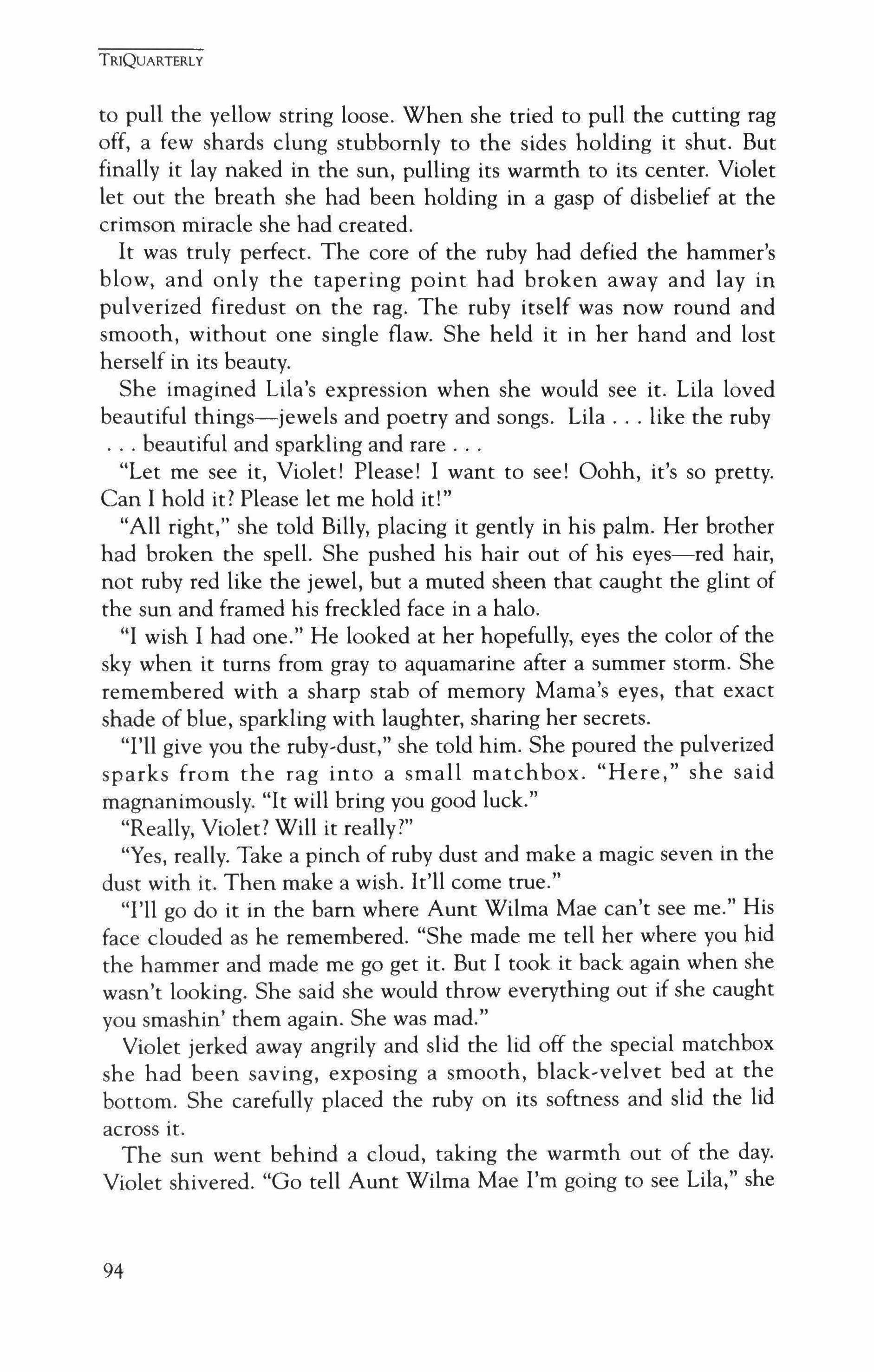
to pull the yellow string loose. When she tried to pull the cutting rag off, a few shards clung stubbornly to the sides holding it shut. But finally it lay naked in the sun, pulling its warmth to its center. Violet let out the breath she had been holding in a gasp of disbelief at the crimson miracle she had created.
It was truly perfect. The core of the ruby had defied the hammer's blow, and only the tapering point had broken away and lay in pulverized firedust on the rag. The ruby itself was now round and smooth, without one single flaw. She held it in her hand and lost herself in its beauty.
She imagined Lila's expression when she would see it. Lila loved beautiful things-jewels and poetry and songs. Lila like the ruby beautiful and sparkling and rare
"Let me see it, Violet! Please! I want to see! Oohh, it's so pretty. Can I hold it? Please let me hold it!"
"All right," she told Billy, placing it gently in his palm. Her brother had broken the spell. She pushed his hair out of his eyes-red hair, not ruby red like the jewel, but a muted sheen that caught the glint of the sun and framed his freckled face in a halo.
"I wish I had one." He looked at her hopefully, eyes the color of the sky when it turns from gray to aquamarine after a summer storm. She remembered with a sharp stab of memory Mama's eyes, that exact shade of blue, sparkling with laughter, sharing her secrets.
"I'll give you the ruby-dust," she told him. She poured the pulverized sparks from the rag into a small matchbox. "Here," she said magnanimously. "It will bring you good luck."
"Really, Violet? Will it really?"
"Yes, really. Take a pinch of ruby dust and make a magic seven in the dust with it. Then make a wish. It'll come true."
"I'll go do it in the barn where Aunt Wilma Mae can't see me." His face clouded as he remembered. "She made me tell her where you hid the hammer and made me go get it. But I took it back again when she wasn't looking. She said she would throw everything out if she caught you smashin' them again. She was mad."
Violet jerked away angrily and slid the lid off the special matchbox she had been saving, exposing a smooth, black-velvet bed at the bottom. She carefully placed the ruby on its softness and slid the lid across it.
The sun went behind a cloud, taking the warmth out of the day. Violet shivered. "Go tell Aunt Wilma Mae I'm going to see Lila," she
94

told Billy. "If you do, I'll bring you something."
"What'll you bring me?"
"You'll see. Don't wait for me, though. Go play with Dog."
She thought about Lila as she headed out of Milltown. She lost herself in a favorite dream of the time when she would move next door to Lila in a twelve-room house, and she would wear lovely storebought dresses and pretty white sandals, and lots of jewelry. And she and Lila would be friends forever. Mama would bake cookies and play songs for them on the piano, and Daddy would come home and bring her and Lila and Billy presents.
With a start she found that she had taken the shortcut through the tie yard without thinking. It stretched for miles along the railroad tracks, with creosote ties crisscrossed into squares higher than her head. Each square was open in the middle, and Violet felt sorry for the captive princess who lived inside them. Her name was Estelle, and the evil Tolmar moved her from one square to another so that the Prince could never find her and rescue her for his bride.
Violet had never seen her. But one day she found one of the translucent opals from her necklace at the foot of the biggest square. When she looked deep into its center, she saw a flash of blue light and knew Estelle was begging for her help to escape. The opal was hid away in the shoe box behind the chimney until Violet could get her away from Tolmar.
Suddenly she heard a sound behind her, and she began to hurry, finally breaking into a run, until she got through the maze of tie squares. She was terrified that Tolmar would capture her and put her in his cross-tie prison.
She breathed in relief when she emerged by the sawdust pile. Even though it was the devil's territory, it was better than the tie yard. The devil lived below the sulfurous stalagmite which he had coned into a yellow topaz peak even with the pine trees. Acrid fumes that came from his evil home far below teased her nostrils. She would have liked to climb to the top to be even with the treetops, but she was afraid that the devil would grab her ankles and pull her down to the fiery hell underneath the sawdust. She carefully skirted the edge and took the road that crossed the railroad tracks near where the gypsies camped last fall.
Today there was a dragon train stalled across her path and she had to crawl underneath his crusty belly to get to the other side. Just as she slid under his massive bulk, he flexed his dragon-body and let out a
TRIQUARTERLY
95

groan and a belch of black smoke and began to move on razor-honed feet. Violet scrambled up the bank on the other side, clutching the matchbox in her pocket.
The tracks divided Milltown from the rest of Summerville. Now the houses began to get larger and the yards were greener and kept up better.
There were curtains at windows; there were fewer places in the sidewalk where trees pushed up the concrete in angry thrusts; there was no garbage or junk cars.
Her heart beat faster as she got closer to Lila's house. But when she rounded the comer by the high school and crossed over the street in front of old Judge Martin's, her spirits sank. Barbara was standing outside in Lila's front yard, and she and Lila had their heads close together looking at a piece of paper which Lila put in her pocket when she saw Violet.
Violet was disappointed. She wanted to have Lila all to herself today, but now she would have to share her with Barbara, who lived next door and was Lila's best friend. They were always together; they even had their own private telephones that Lila's father had connected between the two houses, and they talked to each other for hours. Violet didn't like Barbara. She made Violet feel awkward and tongue-tied.
"I'm glad you could come over today, Violet," said Lila graciously with the faraway look she wore when she was someone else. She wanted to be an actress and go to New York when she grew up. She was always very dramatic and intense and could even cry anytime she wanted to.
Violet recognized her role for today right away. She could tell by the way she walked and talked that today she was Athena. It had been her favorite part since she had gone to the Greek theater in Natchitoches last week with her mother. She had told Violet all about the outdoor stage and seats built into the hillside and the beautiful goddess. She had been Athena almost every day since. Barbara laughed at her, but Violet knew it was the perfect role for her. She was a goddess, rich and beautiful and superior to the mortals who lived below Olympus. She was so far above Violet that Violet could only worship at her feet.
Violet touched the matchbox in her pocket, and the heat of the ruby inside it seemed to bum her fingers, radiating heat throughout her body, making her feel warm and special. The treasure she carried was rare and godlike too.
TRIQUARTERLY
96 /

ra. She liked to flirt with boys and look in the drugstore at the makeup.
Violet didn't want to go, but Lila and Barbara were already down the driveway. "Come on, Violet," said Lila, in her Athena voice. "Don't you want to come to town with us?"
"O.K.," Violet said. She wished she could think of something else to say, that she could talk and laugh as they did all the way to town, that she had on a pretty skirt like Lila or jeans like Barbara instead of the print dress that was too long for her.
Violet would have rather stayed in Lila's room, writing poetry and getting inspired by listening to music or just thinking beautiful thoughts. Lila's eyes would fill with tears and they would sit for hours and think up poems for the book they were making.
They had been friends now for a year. Not best friends, but sharing a special bond because they liked to write stories about Indian princesses who jumped off cliffs because of lost love or compose lovely poems about beautiful sunsets and flowers and stars. They were conspirators together in a secret world. Those moments were rare and sparkling, like the ruby Violet carried in her pocket.
She and Lila were the smartest ones in the class. Violet had stood one day, listening to her teacher talking to Mrs. Johnson when they thought she was out of earshot at the water fountain. "I don't know where she got her brains. Lives in Milltown, you know. Her aunt's raising her-her daddy just took off after her mama died. You know Wilma Mae Smith yes, the one that works at the Red Rose and broke up Dan Rivers and his wife " Then they had seen Violet still standing there, listening, and hadn't said more. It had made Violet feel strange and different from the others.
Violet had never invited Lila to Milltown to visit her. Sometimes, like today, she would walk over to Lila's house, but she could never invite her to the unpainted shack perched on the side of the hill where chickens ran loose and tom plastic curtains half covered broken windows. What if Lila would have to go to the bathroom and Violet would have to lead her out to the leaning, dirty toilet.
Today she walked beside them, but rarely joined in the conversation. She kept waiting for them to talk about the party Lila was having after school Friday. It was a boy-girl party, and they might even dance. It was all the town kids had talked about now for days. But neither Lila nor Barbara mentioned it. If they talked about it, Lila would have to invite her. Athena was not cruel.
TRIQUARTERLY
97
TRIQUARTERLY
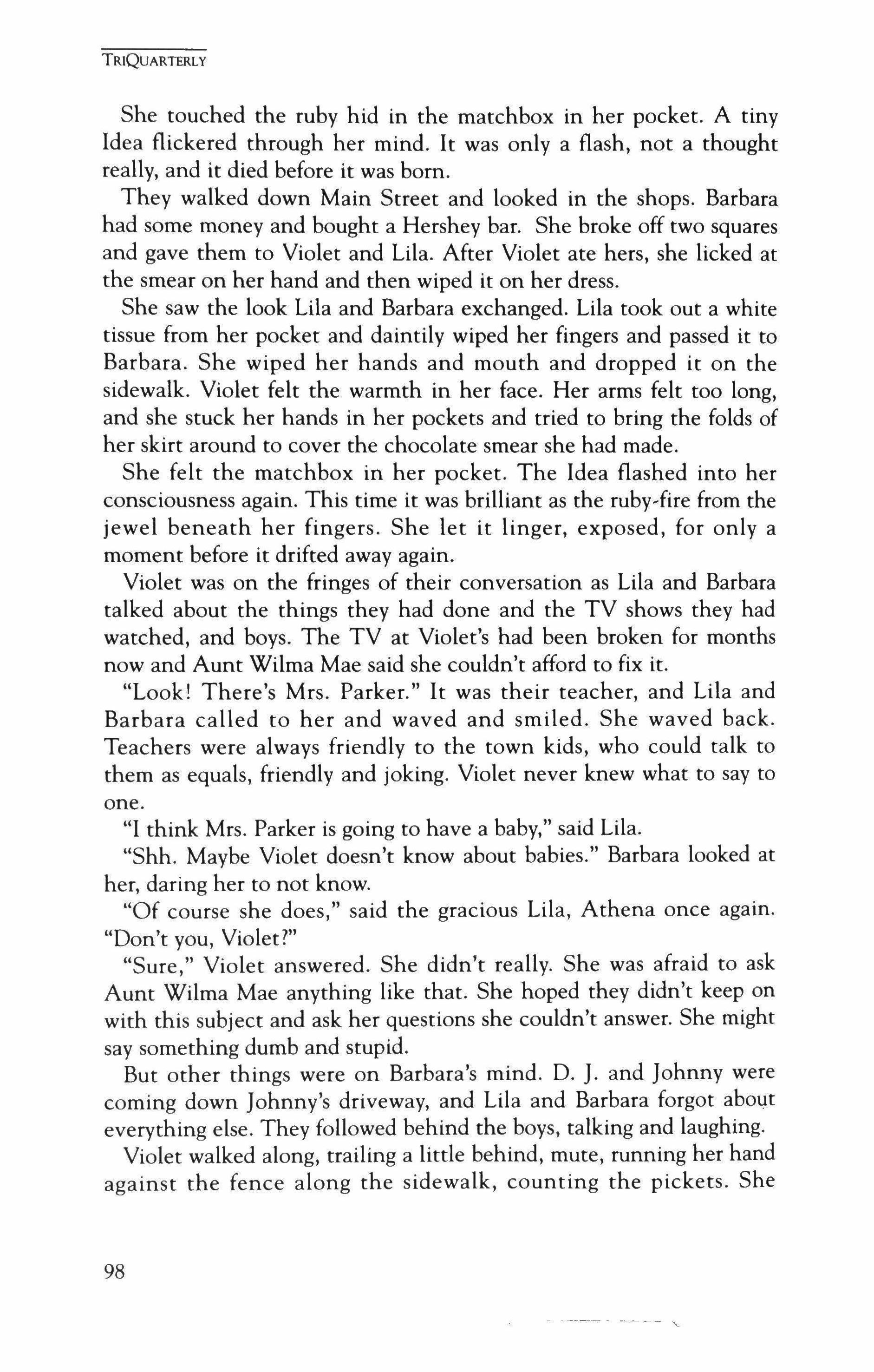
She touched the ruby hid in the matchbox in her pocket. A tiny Idea flickered through her mind. It was only a flash, not a thought really, and it died before it was born.
They walked down Main Street and looked in the shops. Barbara had some money and bought a Hershey bar. She broke off two squares and gave them to Violet and Lila. After Violet ate hers, she licked at the smear on her hand and then wiped it on her dress.
She saw the look Lila and Barbara exchanged. Lila took out a white tissue from her pocket and daintily wiped her fingers and passed it to Barbara. She wiped her hands and mouth and dropped it on the sidewalk. Violet felt the warmth in her face. Her arms felt too long, and she stuck her hands in her pockets and tried to bring the folds of her skirt around to cover the chocolate smear she had made.
She felt the matchbox in her pocket. The Idea flashed into her consciousness again. This time it was brilliant as the ruby-fire from the jewel beneath her fingers. She let it linger, exposed, for only a moment before it drifted away again.
Violet was on the fringes of their conversation as Lila and Barbara talked about the things they had done and the TV shows they had watched, and boys. The TV at Violet's had been broken for months now and Aunt Wilma Mae said she couldn't afford to fix it.
"Look! There's Mrs. Parker." It was their teacher, and Lila and Barbara called to her and waved and smiled. She waved back. Teachers were always friendly to the town kids, who could talk to them as equals, friendly and joking. Violet never knew what to say to one.
"I think Mrs. Parker is going to have a baby," said Lila.
"Shh. Maybe Violet doesn't know about babies." Barbara looked at her, daring her to not know.
"Of course she does," said the gracious Lila, Athena once again. "Don't you, Violet?"
"Sure," Violet answered. She didn't really. She was afraid to ask Aunt Wilma Mae anything like that. She hoped they didn't keep on with this subject and ask her questions she couldn't answer. She might say something dumb and stupid.
But other things were on Barbara's mind. D. J. and Johnny were coming down Johnny's driveway, and Lila and Barbara forgot about everything else. They followed behind the boys, talking and laughing.
Violet walked along, trailing a little behind, mute, running her hand against the fence along the sidewalk, counting the pickets. She
98�'-
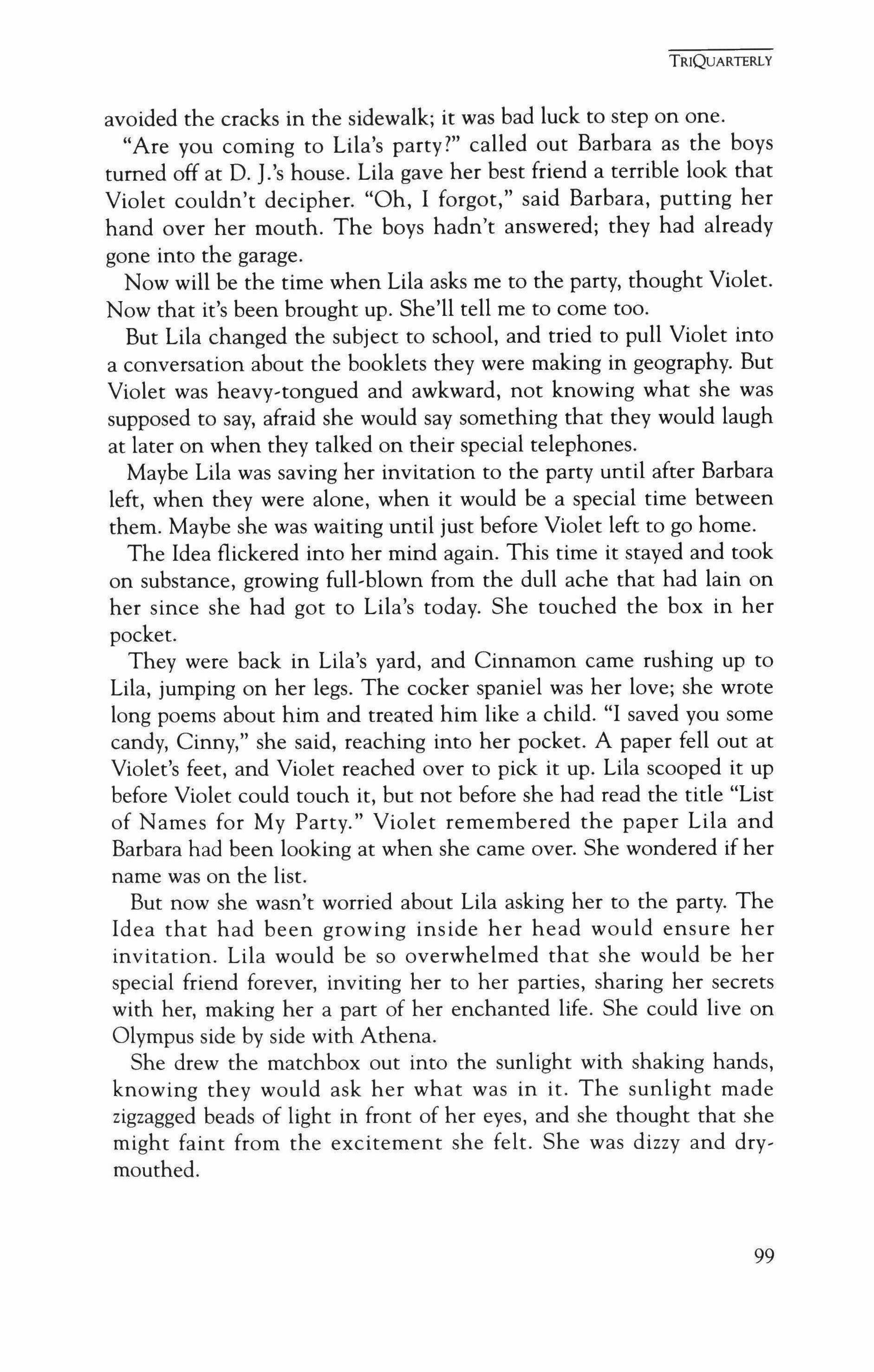
avoided the cracks in the sidewalk; it was bad luck to step on one.
"Are you corning to Lila's party?" called out Barbara as the boys turned off at D. J.'s house. Lila gave her best friend a terrible look that Violet couldn't decipher. "Oh, I forgot," said Barbara, putting her hand over her mouth. The boys hadn't answered; they had already gone into the garage.
Now will be the time when Lila asks me to the party, thought Violet. Now that it's been brought up. She'll tell me to corne too.
But Lila changed the subject to school, and tried to pull Violet into a conversation about the booklets they were making in geography. But Violet was heavy-tongued and awkward, not knowing what she was supposed to say, afraid she would say something that they would laugh at later on when they talked on their special telephones.
Maybe Lila was saving her invitation to the party until after Barbara left, when they were alone, when it would be a special time between them. Maybe she was waiting until just before Violet left to go horne.
The Idea flickered into her mind again. This time it stayed and took on substance, growing full-blown from the dull ache that had lain on her since she had got to Lila's today. She touched the box in her pocket.
They were back in Lila's yard, and Cinnamon carne rushing up to Lila, jumping on her legs. The cocker spaniel was her love; she wrote long poems about him and treated him like a child. "I saved you some candy, Cinny," she said, reaching into her pocket. A paper fell out at Violet's feet, and Violet reached over to pick it up. Lila scooped it up before Violet could touch it, but not before she had read the title "List of Names for My Party." Violet remembered the paper Lila and Barbara had been looking at when she carne over. She wondered if her name was on the list.
But now she wasn't worried about Lila asking her to the party. The Idea that had been growing inside her head would ensure her invitation. Lila would be so overwhelmed that she would be her special friend forever, inviting her to her parties, sharing her secrets with her, making her a part of her enchanted life. She could live on Olympus side by side with Athena.
She drew the matchbox out into the sunlight with shaking hands, knowing they would ask her what was in it. The sunlight made zigzagged beads of light in front of her eyes, and she thought that she might faint from the excitement she felt. She was dizzy and drymouthed.
TRIQUARTERLY
99
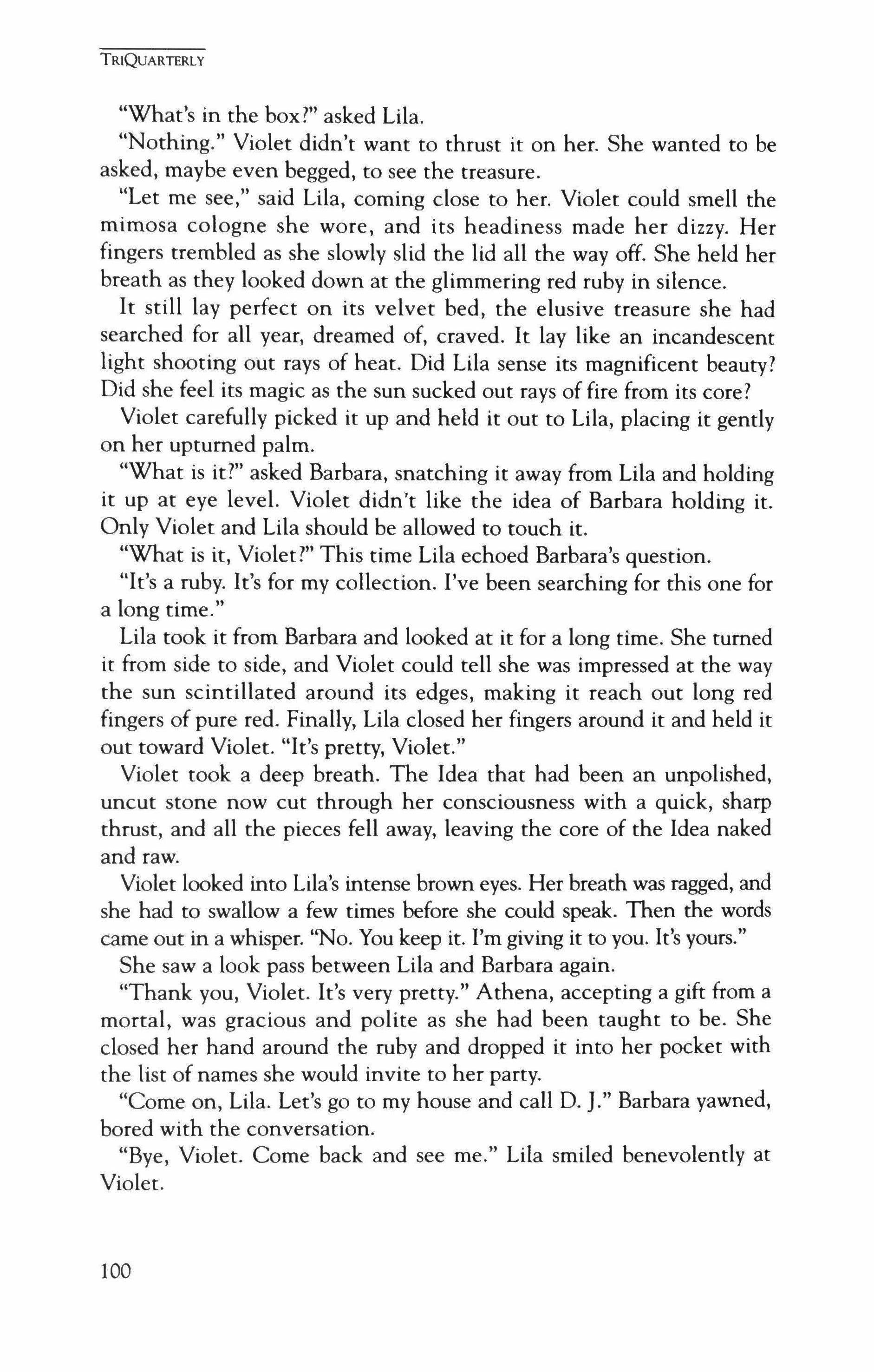
"What's in the box?" asked Lila.
"Nothing." Violet didn't want to thrust it on her. She wanted to be asked, maybe even begged, to see the treasure.
"Let me see," said Lila, coming close to her. Violet could smell the mimosa cologne she wore, and its headiness made her dizzy. Her fingers trembled as she slowly slid the lid all the way off. She held her breath as they looked down at the glimmering red ruby in silence.
It still lay perfect on its velvet bed, the elusive treasure she had searched for all year, dreamed of, craved. It lay like an incandescent light shooting out rays of heat. Did Lila sense its magnificent beauty? Did she feel its magic as the sun sucked out rays of fire from its core?
Violet carefully picked it up and held it out to Lila, placing it gently on her upturned palm.
"What is it?" asked Barbara, snatching it away from Lila and holding it up at eye level. Violet didn't like the idea of Barbara holding it. Only Violet and Lila should be allowed to touch it.
"What is it, Violet?" This time Lila echoed Barbara's question.
"It's a ruby. It's for my collection. I've been searching for this one for a long time."
Lila took it from Barbara and looked at it for a long time. She turned it from side to side, and Violet could tell she was impressed at the way the sun scintillated around its edges, making it reach out long red fingers of pure red. Finally, Lila closed her fingers around it and held it out toward Violet. "It's pretty, Violet."
Violet took a deep breath. The Idea that had been an unpolished, uncut stone now cut through her consciousness with a quick, sharp thrust, and all the pieces fell away, leaving the core of the Idea naked and raw.
Violet looked into Lila's intense brown eyes. Her breath was ragged, and she had to swallow a few times before she could speak. Then the words came out in a whisper. ''No. You keep it. I'm giving it to you. It's yours."
She saw a look pass between Lila and Barbara again.
"Thank you, Violet. It's very pretty." Athena, accepting a gift from a mortal, was gracious and polite as she had been taught to be. She closed her hand around the ruby and dropped it into her pocket with the list of names she would invite to her party.
"Come on, Lila. Let's go to my house and call D. J." Barbara yawned, bored with the conversation.
"Bye, Violet. Come back and see me." Lila smiled benevolently at Violet.
TRIQUARTERLY
100
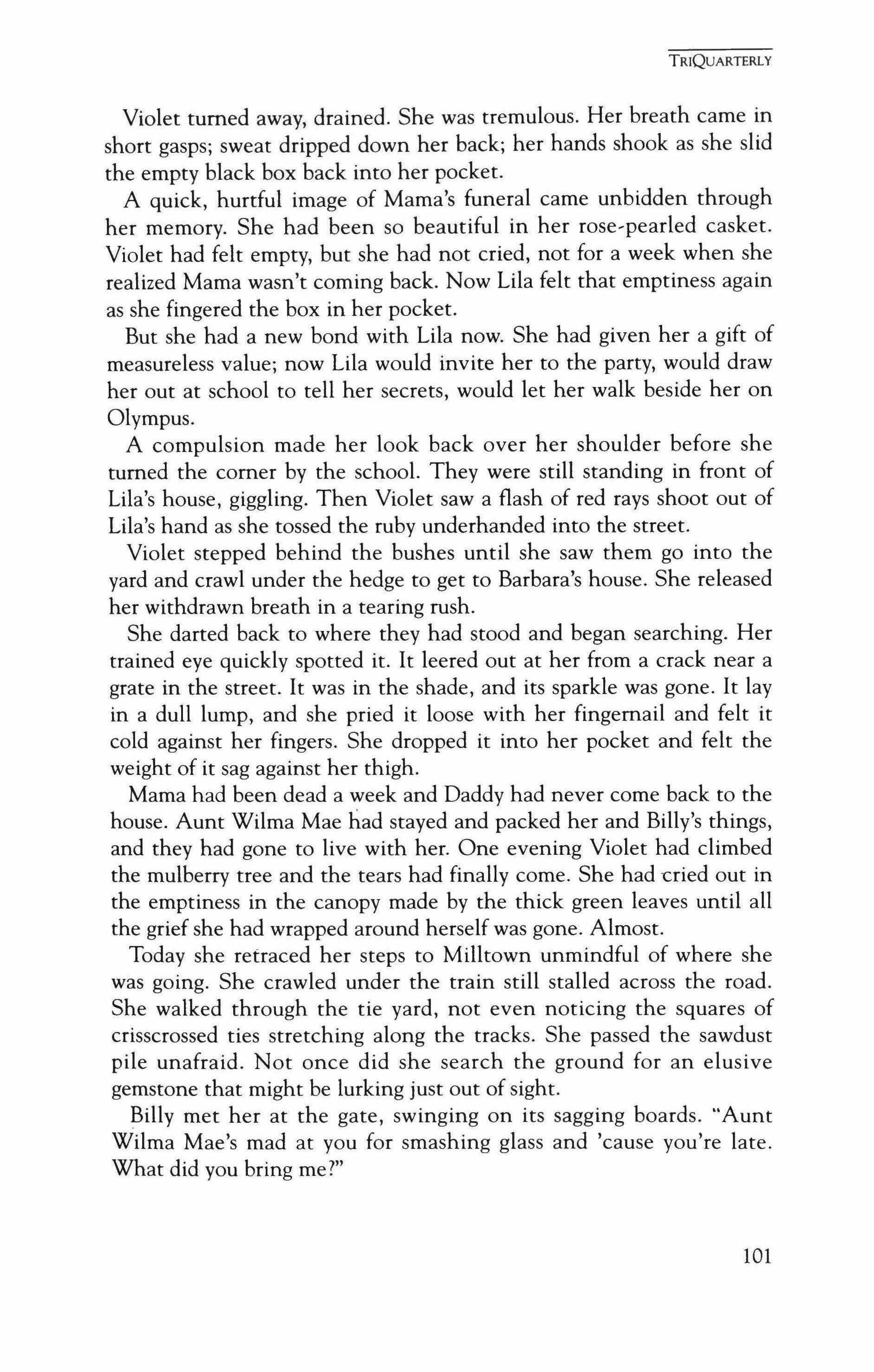
Violet turned away, drained. She was tremulous. Her breath came in short gasps; sweat dripped down her back; her hands shook as she slid the empty black box back into her pocket.
A quick, hurtful image of Mama's funeral came unbidden through her memory. She had been so beautiful in her rose-pearled casket. Violet had felt empty, but she had not cried, not for a week when she realized Mama wasn't coming back. Now Lila felt that emptiness again as she fingered the box in her pocket.
But she had a new bond with Lila now. She had given her a gift of measureless value; now Lila would invite her to the party, would draw her out at school to tell her secrets, would let her walk beside her on Olympus.
A compulsion made her look back over her shoulder before she turned the corner by the school. They were still standing in front of Lila's house, giggling. Then Violet saw a flash of red rays shoot out of Lila's hand as she tossed the ruby underhanded into the street.
Violet stepped behind the bushes until she saw them go into the yard and crawl under the hedge to get to Barbara's house. She released her withdrawn breath in a tearing rush.
She darted back to where they had stood and began searching. Her trained eye quickly spotted it. It leered out at her from a crack near a grate in the street. It was in the shade, and its sparkle was gone. It lay in a dull lump, and she pried it loose with her fingernail and felt it cold against her fingers. She dropped it into her pocket and felt the weight of it sag against her thigh.
Mama had been dead a week and Daddy had never come back to the house. Aunt Wilma Mae had stayed and packed her and Billy's things, and they had gone to live with her. One evening Violet had climbed the mulberry tree and the tears had finally come. She had cried out in the emptiness in the canopy made by the thick green leaves until all the grief she had wrapped around herself was gone. Almost.
Today she retraced her steps to Milltown unmindful of where she was going. She crawled under the train still stalled across the road. She walked through the tie yard, not even noticing the squares of crisscrossed ties stretching along the tracks. She passed the sawdust pile unafraid. Not once did she search the ground for an elusive gemstone that might be lurking just out of sight.
Billy met her at the gate, swinging on its sagging boards. "Aunt Wilma Mae's mad at you for smashing glass and 'cause you're late. What did you bring me?"
TRIQUARTERLY
101
TRIQUARTERLY

She reached into her pocket and took out the piece of red glass. "Here," she said, offering it to him unceremoniously.
His eyes got wide. "For me? Honest? To keep? For my collection?" "You can have it. It's just a piece of red glass."
She went to the fireplace, avoiding Aunt Wilma Mae reading the movie magazine and drinking a bottle of beer at the table. She pulled the shoe box down from its hiding place. Her arms were leaden as she opened it. Her heart did not beat fast, and her eyes were dull with the certain knowledge of what lay inside.
She looked down at the piece of blue medicine vial, fingered the pink lump from a broken plate, ran her finger across the amber-colored bit of whiskey bottle. They were inert and quiescent chunks of broken glass. All of them.
Violet put the lid on the box and climbed on the rocker. She pushed the shoe box far back in the opening behind the chimney. Then she went and sat in the mulberry tree for a long time.
Beneficient Beast 102
The Towel
Richard Burgin
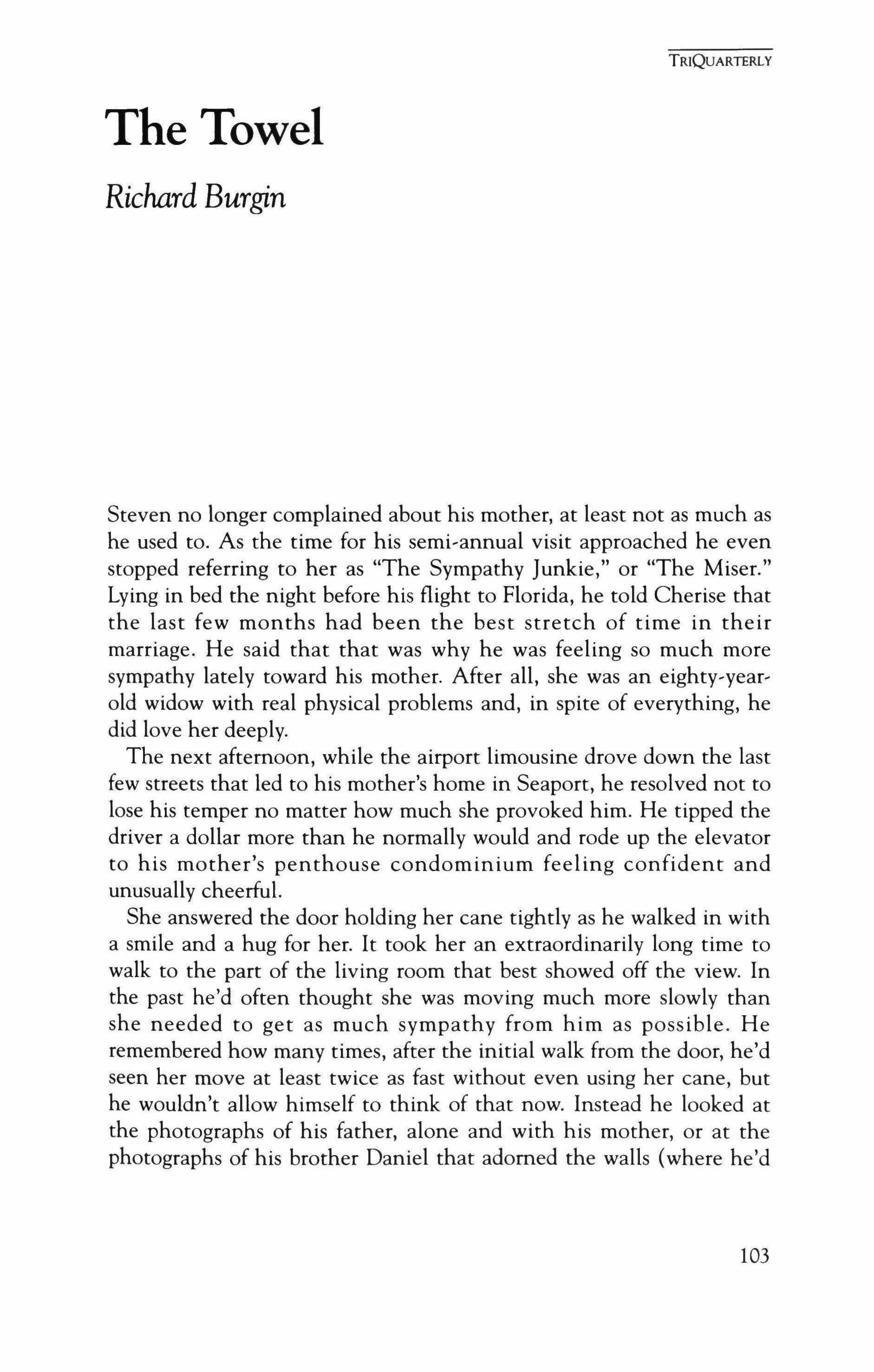
Steven no longer complained about his mother, at least not as much as he used to. As the time for his semi-annual visit approached he even stopped referring to her as "The Sympathy Junkie," or "The Miser." Lying in bed the night before his flight to Florida, he told Cherise that the last few months had been the best stretch of time in their marriage. He said that that was why he was feeling so much more sympathy lately toward his mother. After all, she was an eighty-yearold widow with real physical problems and, in spite of everything, he did love her deeply.
The next afternoon, while the airport limousine drove down the last few streets that led to his mother's home in Seaport, he resolved not to lose his temper no matter how much she provoked him. He tipped the driver a dollar more than he normally would and rode up the elevator to his mother's penthouse condominium feeling confident and unusually cheerful.
She answered the door holding her cane tightly as he walked in with a smile and a hug for her. It took her an extraordinarily long time to walk to the part of the living room that best showed off the view. In the past he'd often thought she was moving much more slowly than she needed to get as much sympathy from him as possible. He remembered how many times, after the initial walk from the door, he'd seen her move at least twice as fast without even using her cane, but he wouldn't allow himself to think of that now. Instead he looked at the photographs of his father, alone and with his mother, or at the photographs of his brother Daniel that adorned the walls {where he'd 103
TRlQuARTERLY

always felt pictures of him were underrepresented) until she finally arrived at her reclining chair by the picture window. He sat down at her desk opposite her, still looking around, periodically, for an additional photograph of himself he might have missed.
"Let me look at you. I haven't seen you for a year," she said. "It hasn't been a year. I visited you last Thanksgiving." "Really? Well, eight months you've stayed away then instead of twelve, isn't that long enough? You look good, Stevie. You look better than you did last year."
He wanted to tell her about how well things were going now in his career and with Cherise, but before he could she said "Here's a new postcard from Danny." She was waving it in the air as if it were a winning lottery ticket.
Then she put her glasses on and, holding the postcard up to the window, began reading it loudly. Steven only half listened. It was a scene that had happened before. He would arrive on a visit bursting with things to tell her, and as if to ward him off center stage and reduce him to his proper place in the audience, she'd immediately read him one of Daniel's postcards followed by her testimony (as she was also doing now) about how thoughtful Daniel was. The injustice of the word "thoughtful" applied to his brother always stung him. By his calculations Daniel visited her one fifth as frequently as he did, and never alone, though he'd been divorced for years. Yet he was described as "thoughtful" simply because he wrote her little postcards about his inane career as an arts administrator.
When she was finally through with her tributes to Daniel, she began cataloging the pain that filled "the few days I have left before I'll be dead forever." Her large brown eyes looked fierce as she spoke, commanding his attention. He noticed that her dyed black hair was combed back, her makeup meticulously painted on her face. Clearly she had spent an enormous amount of time on her face-yet she didn't have a moment to ask about his promotion in the University Relations office, and when she finally asked him about his wife she paused a few seconds (as she often did) as if it were so difficult to remember that her name was Cherise.
Slowly he felt himself withdraw until he was no longer listening to the words she spoke but had converted them to a tone he responded to only when it went up a few degrees while she asked him a question or, much less frequently, when it stopped and he was expected to respond. It was a technique he'd developed over the years that he felt
TRIQUARTERLY
104
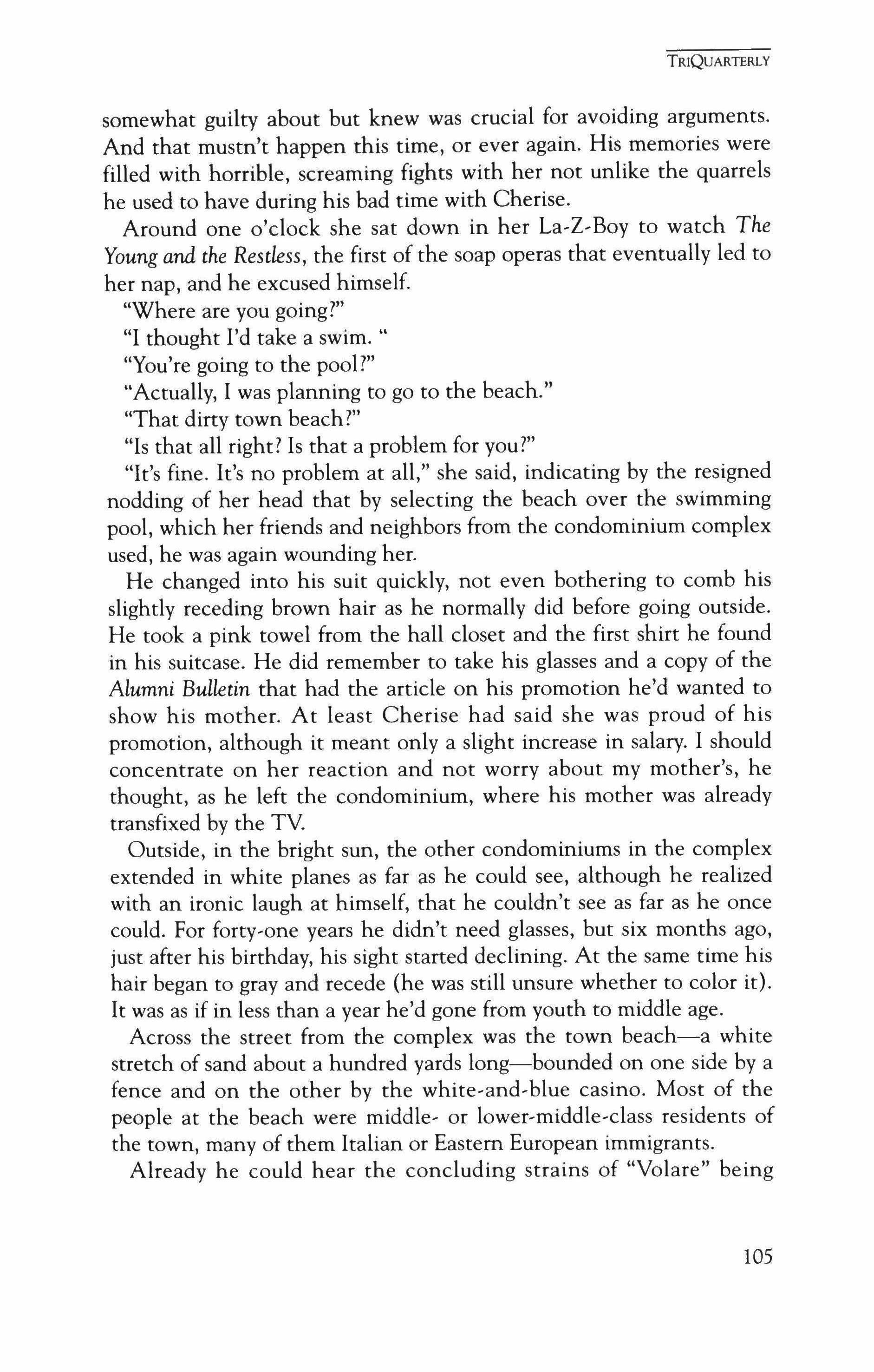
somewhat guilty about but knew was crucial for avoiding arguments. And that mustn't happen this time, or ever again. His memories were filled with horrible, screaming fights with her not unlike the quarrels he used to have during his bad time with Cherise.
Around one o'clock she sat down in her La-Zvboy to watch The Young and the Restless, the first of the soap operas that eventually led to her nap, and he excused himself.
"Where are you going?"
"I thought I'd take a swim.
"You're going to the pool?"
"Actually, I was planning to go to the beach."
"That dirty town beach?"
"Is that all right? Is that a problem for you?"
"It's fine. It's no problem at all," she said, indicating by the resigned nodding of her head that by selecting the beach over the swimming pool, which her friends and neighbors from the condominium complex used, he was again wounding her.
He changed into his suit quickly, not even bothering to comb his slightly receding brown hair as he normally did before going outside. He took a pink towel from the hall closet and the first shirt he found in his suitcase. He did remember to take his glasses and a copy of the Alumni Bulletin that had the article on his promotion he'd wanted to show his mother. At least Cherise had said she was proud of his promotion, although it meant only a slight increase in salary. I should concentrate on her reaction and not worry about my mother's, he thought, as he left the condominium, where his mother was already transfixed by the TV.
Outside, in the bright sun, the other condominiums in the complex extended in white planes as far as he could see, although he realized with an ironic laugh at himself, that he couldn't see as far as he once could. For forty-one years he didn't need glasses, but six months ago, just after his birthday, his sight started declining. At the same time his hair began to gray and recede (he was still unsure whether to color it). It was as if in less than a year he'd gone from youth to middle age.
Across the street from the complex was the town beach-a white stretch of sand about a hundred yards long-bounded on one side by a fence and on the other by the white-and-blue casino. Most of the people at the beach were middle, or lower-middle-class residents of the town, many of them Italian or Eastern European immigrants. Already he could hear the concluding strains of "Volare" being
TRIQUARTERLY
105

played by a small dance band. Twenty or so elderly couples were dancing to it in a large open-air tent. Though some of the dancers looked feeble, on the whole they seemed to be having a good time. They made Steven feel better. Going to the beach was a good idea, he thought, and under the circumstances it was probably the best medicine he could have taken. When the band shifted to a snappy polka the old people began clapping their hands and dancing more spiritedly. Steven smiled. It was fun to watch but it was too noisy to read the article by the tent. He walked past the bocce courts and swings, then past a number of occupied picnic tables shaded by pine trees until he settled at a free table near the casino end of the beach.
Above the article about his promotion, which consisted of four small paragraphs, was a headshot of him smiling. Cherise had said it was a great picture, and he had to admit it was pretty flattering. He read the piece twice and was pleased. His mother would have liked it, too, especially since it had references to both his father's career as a successful banker and to her own years as a private-school English teacher. It was a well-written article, done by Mark Stem, a twentyfive-year-old who'd been in the department less than a year. He's already a better writer than I am, Steven thought a little nervously. He flipped through the magazine looking for something else to read, while an old man with sky-blue eyes and a vaguely dreamy smile sat next to him. Steven smiled back briefly, and to be polite, waited a couple of minutes before moving two tables away. He was now next to the casino at the extreme end of the beach. He read the first paragraph of an article on last year's alumni donations drive (looking over guiltily a couple of times at the old man, who still hadn't moved his head an inch) when he heard a siren from a police car that was suddenly driving right over the sand. The car was going very fast and was followed ten seconds later by two other police cars. They drove on the firmer sand about fifteen feet from the water scattering sea gulls and sandpipers and parked at the opposite end of the beach. Steven closed the magazine and stood up. Was there a robbery, or a fight of some kind? He wondered why he hadn't heard any cries for help and so, of course, hadn't seen anything either. Already a small circle of people had formed in front of the police cars near the water. Walking toward them, Steven noticed that the dancing had stopped, and that no one was playing bocce either. Most of the people at the beach were drifting towards the circle. Thirty feet away he asked an elderly woman in a faded purple bathing suit what had happened. She threw
TRIQUARTERLY
106

up her arms like a giant bird spreading its wings. He turned from her to one of the bocce players and asked the same question. The man shook his balding head and Steven kept walking until he saw a boy with orange hair standing in a daze.
"You know what happened?"
"He went belly-up. I pulled him in," the boy said with an accent, pointing to the body of a man lying on the sand. Steven looked at the boy doubtfully. Was he lying? He seemed to be about fifteen and on the slender side but perhaps was strong enough to do what he'd said. Besides, who would be grotesque enough to lie about such a thing?
"Did he drown?"
The boy's lips twitched but he said nothing. Steven moved nearer the old man on the sand in the center of the circle whose eyes were half closed and whose stomach was puffed out like a blowfish. A policeman kept pounding his heart with his hand, while another put a new tube in his mouth.
"Anybody here have a towel?" a third policeman said, turning toward the crowd.
"I do," Steven said, handing it to the policeman, who immediately rubbed the chest and legs of the old man.
The police worked quickly and precisely. Steven was too nervous to watch them for long, however-only fifteen or twenty seconds at a stretch before he'd look at the crowd, at the two open-mouthed eightyear-old boys or at the little girl in the China-blue bathing suit staring as silently as the bocce players and the dancers. Then he made eye contact with a fiftyish woman with enormous blue eyes and thickly knotted gray hair and walked next to her.
"Is he going to make it?"
"I don't know. They say he has a faint pulse.
"Did he drown? Is that what happened?"
"I think he had a heart attack, that boy found him.
"It's crazy. I didn't hear anything. Why didn't anybody scream for help?"
"The boy was with him," she said, pointing again to the orangehaired boy standing next to an obviously distraught woman of indeterminate age who was talking to yet another policeman.
"He and that woman were with the man. Just thirty minutes ago they were taking his picture on the beach. They're Serbians and they're afraid to identify the man or themselves for some reason. Maybe they don't have the right papers to be here, I don't know. I said
TRIQUARTERLY
107
TRIQUARTERLY
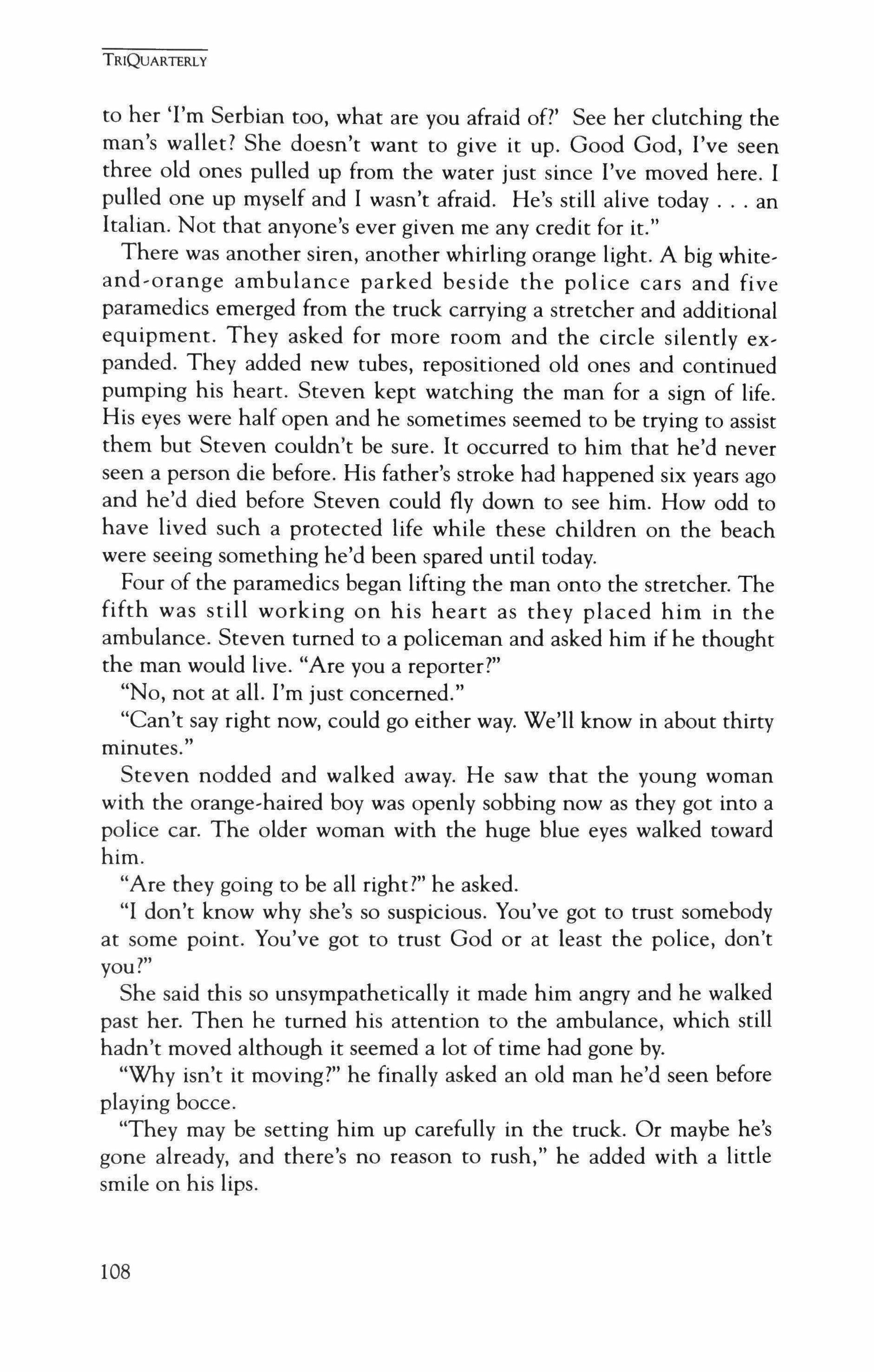
to her 'I'm Serbian too, what are you afraid of?' See her clutching the man's wallet? She doesn't want to give it up. Good God, I've seen three old ones pulled up from the water just since I've moved here. I pulled one up myself and I wasn't afraid. He's still alive today an Italian. Not that anyone's ever given me any credit for it."
There was another siren, another whirling orange light. A big whiteand-orange ambulance parked beside the police cars and five paramedics emerged from the truck carrying a stretcher and additional equipment. They asked for more room and the circle silently expanded. They added new tubes, repositioned old ones and continued pumping his heart. Steven kept watching the man for a sign of life. His eyes were half open and he sometimes seemed to be trying to assist them but Steven couldn't be sure. It occurred to him that he'd never seen a person die before. His father's stroke had happened six years ago and he'd died before Steven could fly down to see him. How odd to have lived such a protected life while these children on the beach were seeing something he'd been spared until today.
Four of the paramedics began lifting the man onto the stretcher. The fifth was still working on his heart as they placed him in the ambulance. Steven turned to a policeman and asked him if he thought the man would live. "Are you a reporter?"
"No, not at all. I'm just concerned."
"Can't say right now, could go either way. We'll know in about thirty minutes."
Steven nodded and walked away. He saw that the young woman with the orange-haired boy was openly sobbing now as they got into a police car. The older woman with the huge blue eyes walked toward him.
"Are they going to be all right?" he asked.
"I don't know why she's so suspicious. You've got to trust somebody at some point. You've got to trust God or at least the police, don't you?"
She said this so unsympathetically it made him angry and he walked past her. Then he turned his attention to the ambulance, which still hadn't moved although it seemed a lot of time had gone by.
"Why isn't it moving?" he finally asked an old man he'd seen before playing bocce.
"They may be setting him up carefully in the truck. Or maybe he's gone already, and there's no reason to rush," he added with a little smile on his lips.
108

Ten minutes later the ambulance began to drive away slowly and Steven concluded that the man must have died. The people from the circle had already dispersed. Some were back in the water swimming, others were already dancing again to a waltz he couldn't identify. This must happen all the time, he thought, looking at the dancers. Maybe it was part of some fatalistic code they held in common, which explained how they could resume their activities right after the drowning.
At any rate, he wouldn't brood about it or try to judge them. Instead he decided to go back to the condominium. He took a few steps in that direction before something caught his eye. It was the pink towel he'd given the policeman, lying tangled in the sand. Should he bring it home? His mother might notice it was missing and complain, but when he walked a step or two toward it he couldn't bear to pick it up-although he'd felt secretly proud to have contributed it to the rescue effort. He wondered now if he should even mention what had happened to his mother. She often got upset hearing about other people's pain or disasters. Also, if he didn't say anything about it she might never realize the towel was missing since there were dozens of others in her hall closet. It seemed that saying nothing really would be the best policy, especially since he felt that he really couldn't bear to touch the towel anyway and was already moving away from it.
When he opened the door to the condominium his mother was at her desk by the picture window looking at some papers.
"The beach boy returns, at last. How was your swim?"
"O.K."
"I've just got Silverman's bill. What a swindler! Do you want to see it? Do you want to see what he charged me?"
"You need to get a new accountant."
"Wait till I show you what Dr. Walters charged me for my cataract treatment. He's in the medical mafia too. Come here and look at this bill."
Steven walked toward her and looked at the bill, but in his mind's eye he was seeing the old man on the sand with the tubes in his mouth.
"Did you see that? Why does he do this to me? He acts so nice on the phone to hook me in and talks so sweetly while he examines me and then he sends me this. He's just like a male whore, if you ask me. I'm going to get rid of both of them. Starting tomorrow I'm getting a new knee man and a new cataract man, both."
TRIQUARTERLY
109

"It's not that much. It's just a standard bill."
"Not that much? You must have much more money than I realize if you don't think he's trying to rob me with a bill like that. Of course, you can earn money, can't you? I can't. I'm on a fixed income that's getting eaten up all the time by this marvelous economy while I can barely get around to help myself. You don't realize Stevie but it's a full, time job just keeping myself alive."
"You should get someone to help you. I've told you that. You have plenty of money and you've got to start spending some of it to help yourself. Believe me, you can definitely afford it."
"Not what they charge. They pretend to love you, too, and then they steal your jewelry or whatever else they can get their hands on."
She went on about the impossibility of getting honest, competent help, live'in, or otherwise. Steven began hearing the tone again but it wasn't providing any relief from his mother nor from the image of the old man on the sand that was still fresh in his mind.
"Why are you pacing around, Stevie? I wish my legs felt good enough to let me pace too, but they don't, and they probably never will."
"You don't understand. Something terrible happened on the beach." He looked at her and saw her face tum toward him, her dark eyes opening up wide in concentration.
"What's this?"
"A man drowned.
"I'm sorry, darling, but it happens all the time."
"You don't understand. I was reading at the far end of the beach so I didn't see it happen or hear anybody cry for help or I would have tried to save him myself. But then the police came and I ran down to see what happened. He'd had a heart attack and the police and the paramedics must have worked on him for a half-hour."
"Your father and I once watched something much worse than that at Pass Gille beach."
"I'm not trying to compete with you. It was just a shocking thing to see. I even got involved in a way. One of the cops working on him asked if anyone had a towel so I gave him mine."
"You mean you gave him my towel."
"Whatever."
"It wasn't a pink one with red embroidered poodles was it?"
"I don't know. What difference does it make?"
"Couldn't you have given him a less expensive one?"
TRIQUARTERLY
110

"Do you hear what you're saying? Do you realize how absurd you sound? The man was dying and I was asked to help. I didn't think about how much the towel cost. You have 22,000 others anyway, don't you?"
"Don't be fresh, Stevie. There's no reason to be fresh to me."
"O.K. But there's also no reason for you to be so stingy when you're really a very wealthy woman and there's no reason to be so inconsistent and crazy with me about money. I mean you keep hiring new doctors like they're some kind of escort service, and that costs money, yet you complain when I give a cop a towel to try to save a man's life."
She turned her head away with a shocked expression on her face and Steven felt himself begin to shake.
"Look, I need to be alone for a little while to calm down. I'll be back in ten minutes," he said as he walked to the bathroom, swallowed two Tylenols and then shut the door to his room.
After lying down in bed for a few minutes his shaking stopped. He closed his eyes and the image of the old man returned briefly as a blur, then was gone again, and stayed gone. He was feeling much better now and reassured himself that he hadn't really lost his temper yet. Certainly he mustn't expect rational humanism from his mother at this point, nor should he let its absence make him mad at her. He reminded himself of his commitment to make this visit the one in which they didn't fight. Still, he thought he should wait awhile longer to be as calm as possible before leaving his room. He turned on the clock radio and to his amazement found a classical-music station. Someone was playing a Debussy prelude softly, then later something that sounded like Satie. Steven closed his eyes again to listen and this time fell asleep.
When he woke up two hours later it was dark out. Immediately he left his room and found his mother in the kitchen by the sink holding her cane in one hand and boiling water with the other.
"The craziest thing happened. I turned on the radio to relax for a while and I fell asleep. I'm sorry I was away for so long. Anyway, I feel a lot better now."
She didn't speak.
"I told you I just needed some time by myself and now I'm back. I didn't plan to fall asleep and I'm sorry about that. So where were we? Which doctor were you telling me about?"
She said nothing. When he walked next to her he saw that she was
TRIQUARTERLY
111

crying-her face looking older and more frightened than he'd ever seen it.
"Mummy, what's the matter?"
"I'm sorry about what happened on the beach and that it upset you so much."
"I told you, I'm much better now."
"You're only here three days and now one of them's already gone and with that man on your mind all the time I thought I wouldn't get a chance to talk to you. Then you stayed in your room with the radio on and I was afraid to disturb you. I thought you'd get mad again or else were still mad at me and I've waited so long to see you."
"That was a misunderstanding about the radio," he said softly. He felt touched and scared and looked more closely at her, as if to be certain it was his mother speaking. Sometimes, especially after a drink or two, when he'd stare at people long enough they'd start to tum into other people. He thought this might happen now, that she might tum into the old man on the sand.
"Every day there's so much tragedy in the world drowning, dying. The television's full of it but what can you do?"
"I don't know, Mummy." She looked more like herself now. The image of the old man was still gone.
"I feel like I'm drowning myself, and no matter what I do, no matter how hard I fight I'm going to die soon and it scares me so much." She stooped forward a little as if she were in a rocking chair and he embraced her and kissed her hair while she continued crying softy in his arms. But when they moved apart he felt himself bum with shame.
"I'm sorry for the things I said to you, all the things I ever said. I never should have said them," he quickly added. "Never."
"It doesn't matter," she said, half-smiling through her tears now and looking strangely pretty again. "It never did."
He looked at her, then past her out the window at the black sky flecked with distant lights. Then he hugged her tightly once more, tight enough to feel her breathing, and for a moment he believed her.
TRIQUARTERLY
112

':,
Winter Peace
Nose Job
Paul Brownfield
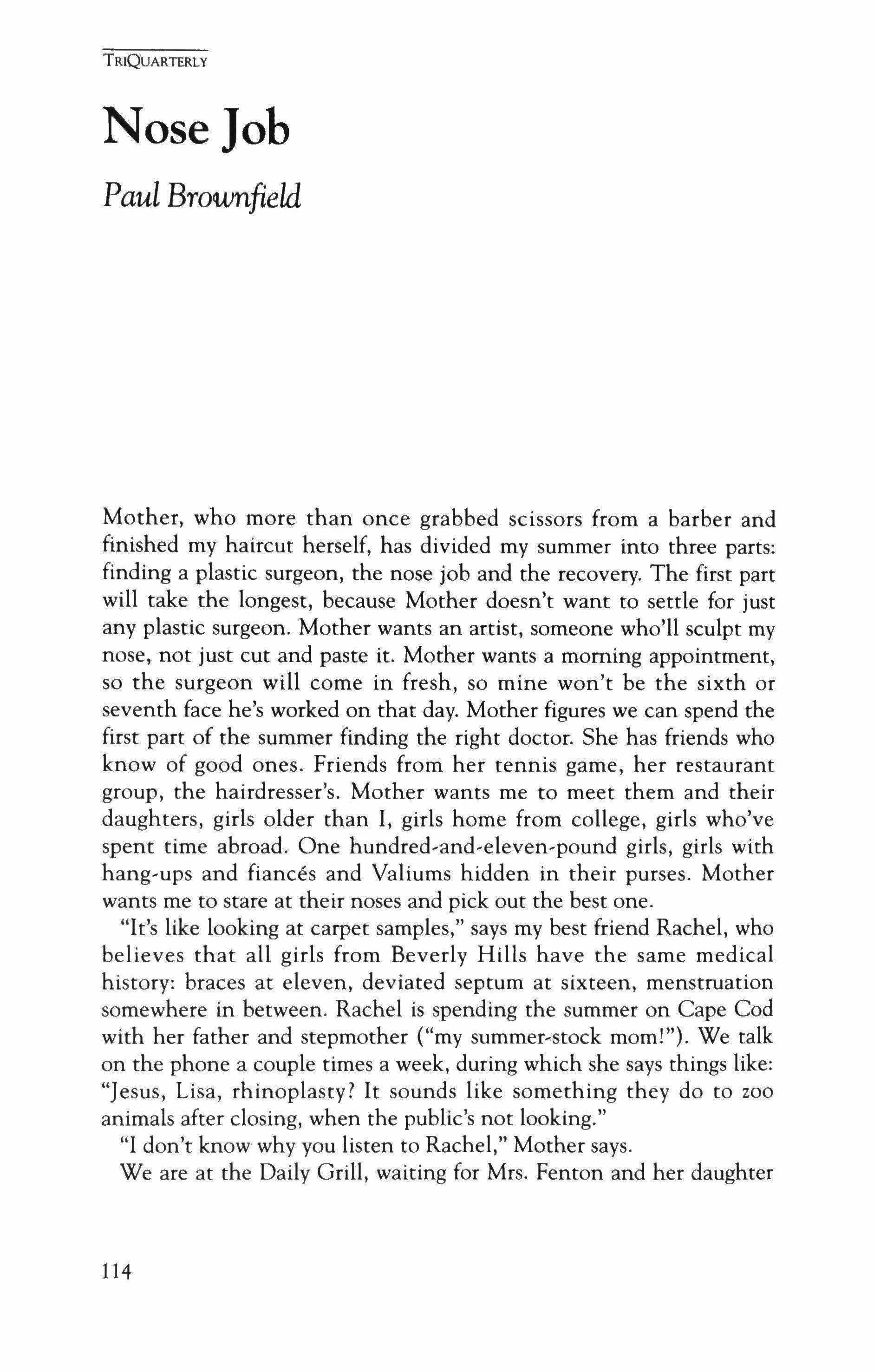
Mother, who more than once grabbed scissors from a barber and finished my haircut herself, has divided my summer into three parts: finding a plastic surgeon, the nose job and the recovery. The first part will take the longest, because Mother doesn't want to settle for just any plastic surgeon. Mother wants an artist, someone who'll sculpt my nose, not just cut and paste it. Mother wants a morning appointment, so the surgeon will come in fresh, so mine won't be the sixth or seventh face he's worked on that day. Mother figures we can spend the first part of the summer finding the right doctor. She has friends who know of good ones. Friends from her tennis game, her restaurant group, the hairdresser's. Mother wants me to meet them and their daughters, girls older than I, girls home from college, girls who've spent time abroad. One hundred-and-eleven-pound girls, girls with hang-ups and fiances and Valiums hidden in their purses. Mother wants me to stare at their noses and pick out the best one.
"It's like looking at carpet samples," says my best friend Rachel, who believes that all girls from Beverly Hills have the same medical history: braces at eleven, deviated septum at sixteen, menstruation somewhere in between. Rachel is spending the summer on Cape Cod with her father and stepmother ("my summer-stock mom!"). We talk on the phone a couple times a week, during which she says things like: ") esus, Lisa, rhinoplasty? It sounds like something they do to zoo animals after closing, when the public's not looking."
"I don't know why you listen to Rachel," Mother says.
We are at the Daily Grill, waiting for Mrs. Fenton and her daughter
TRIQUARTERLY
114

Shawna to arrive. This is the first lunch and Mother is nervous. She has ordered a glass of white wine, a Diet 7-Up for me. She isn't pleased about my outfit: Daddy's gray cardigan sweater with the hole in the elbow, T�shirt, jeans with more holes. Rachel personally cuts all the holes in my clothing. It's the one thing she feels she's very good at.
"Rachel says getting your nose fixed is like telling God to change the color of the sky, because blue clashes with your favorite outfits."
"This has nothing to do with Rachel or God," Mother says, teasing the bangs of my hair. "I only want you to be more beautiful. What color is Rachel's hair these days, anyway?"
"Black."
"Wasn't it blond before she left for the East Coast?"
"Yes."
"Well there, you see?" Mother says, adding that Rachel is in no position to comment on noses because she has an earring in hers. In fact, Mother says, she can't imagine what Rachel is in a position to comment on; because she wears pajamas in public and is dyslexic and overweight and because her mother has had a "difficult history with men."
"I never told you Rachel was dyslexic."
"Her mom and I are on the library board together," Mother says, spotting the waiter and waving him over. She sends her wine back, asking for a splash of water. She tells me how to behave. Study Shawna's nose, but don't stare at it. It's not a painting. Take subtle, feminine glances. And don't pass judgment until we're back in the car."
I sip my 7-Up and Mother tells me I'm squeaking.
"I'm sipping."
"You're squeaking, my sweetheart love."
"Sipping."
"Squeaking, dear."
"I don't want to meet these people. Shawna Fenton. I don't want to meet people named Shawna Fenton."
"I'm not asking you to meet her. Just her nose. And please don't slouch."
"I shouldn't drink diet sodas. They have one calorie but they also have tons of nuclear chemicals in them. I'll end up thin and with a new nose, but I'll have cancer and none of it will matter. I will produce deformed babies. You'll end up with a three-armed grandson in your lap. It will be able to clap and suck its thumb at the same time."
TRlQuARTERLY
115
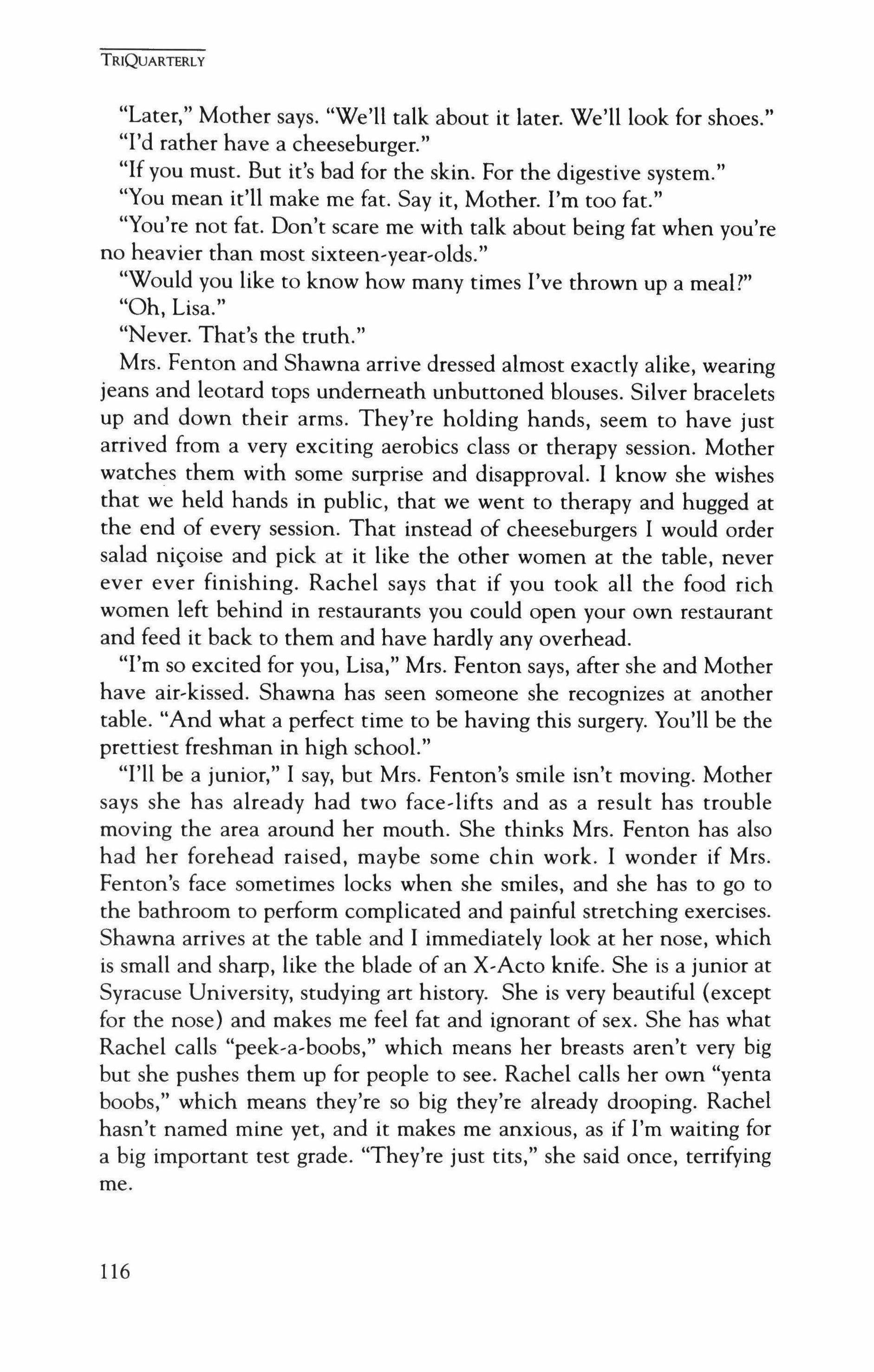
"Later," Mother says. "We'll talk about it later. We'll look for shoes."
"I'd rather have a cheeseburger."
"If you must. But it's bad for the skin. For the digestive system."
"You mean it'll make me fat. Say it, Mother. I'm too fat."
"You're not fat. Don't scare me with talk about being fat when you're no heavier than most sixteen-year-olds."
"Would you like to know how many times I've thrown up a meal?"
"Oh, Lisa."
"Never. That's the truth."
Mrs. Fenton and Shawna arrive dressed almost exactly alike, wearing jeans and leotard tops underneath unbuttoned blouses. Silver bracelets up and down their arms. They're holding hands, seem to have just arrived from a very exciting aerobics class or therapy session. Mother watches them with some surprise and disapproval. I know she wishes that we held hands in public, that we went to therapy and hugged at the end of every session. That instead of cheeseburgers I would order salad nicoise and pick at it like the other women at the table, never ever ever finishing. Rachel says that if you took all the food rich women left behind in restaurants you could open your own restaurant and feed it back to them and have hardly any overhead.
"I'm so excited for you, Lisa," Mrs. Fenton says, after she and Mother have air-kissed. Shawna has seen someone she recognizes at another table. "And what a perfect time to be having this surgery. You'll be the prettiest freshman in high school."
"I'll be a junior," I say, but Mrs. Fenton's smile isn't moving. Mother says she has already had two face-lifts and as a result has trouble moving the area around her mouth. She thinks Mrs. Fenton has also had her forehead raised, maybe some chin work. I wonder if Mrs. Fenton's face sometimes locks when she smiles, and she has to go to the bathroom to perform complicated and painful stretching exercises. Shawna arrives at the table and I immediately look at her nose, which is small and sharp, like the blade of an XvActo knife. She is a junior at Syracuse University, studying art history. She is very beautiful (except for the nose) and makes me feel fat and ignorant of sex. She has what Rachel calls "peek-a-boobs," which means her breasts aren't very big but she pushes them up for people to see. Rachel calls her own "yenta boobs," which means they're so big they're already drooping. Rachel hasn't named mine yet, and it makes me anxious, as if I'm waiting for a big important test grade. "They're just tits," she said once, terrifying me.
TRIQUARTERLY
116

When the waiter comes Mrs. Fenton orders a pasta salad, Shawna the salad nicoise and Mother the Chinese chicken salad.
I shake my head at the waiter.
"Aren't you eating, sweetheart?" Mother says.
I shake my head.
"Good for you," Mrs. Fenton says, stabbing my arm with her fingernails. "You're never too young to watch your diet."
"But she shouldn't starve," Mother says. "Why aren't you hungry?"
"I'm just not," I say.
"Good for you," Mrs. Fenton repeats.
I watch the women eat. The bites they take are like periods at the end of very long sentences. Mother asks a zillion questions about the surgeon who did Shawna's nose, but I can tell she doesn't really like it because she says: "You can hardly notice," over and over. They talk about Shawna's surgeon, an Iranian named Dr. Mirahmadi. "Jewish, of course," Mrs. Fenton says. "He came over with the Shah. Quite an interesting story." Mother glares at me when I make sucking sounds with the ice cubes in my mouth. I spit them out into the glass. Shawna says the nose job restored her "facial harmony." I don't know what to do with my hands, so I pick my fingernails underneath the table. During cappuccino, Mother holds my chin gently and the three women discuss what ought to be done. Remove the bump, of course. Refine the tip. Narrow the bridge slightly. Curtail the nostrils.
"She got her father's nose, unfortunately," Mother says. "The Hungarian nose."
"Oh," Mrs. Fenton says, full of pity, as if this is a pledge drive and she is about to pull out her checkbook.
Afterwards, in the car, on the way to Fred Segal's to buy me clothes so I won't wear Rachel's hole-designed outfits to these lunches, Mother says to me: "In the ladies' room, Mrs. Fenton asked if you were in therapy. She was alarmed by your not eating and brooding the whole time. And picking your fingernails beneath the table. She wanted to know if you were seeing a therapist. I had to lie and say 'yes.'"
"Why must you say 'ladies' room'? Say, 'bathroom.' It's queer, like saying 'passed away' instead of 'died.'"
"Shawna's nose," Mother says, "what did you think of it?"
"It was from Hungary. It was two holes in the middle of her face."
"Some of these surgeons take out far too much cartilage."
TRIQUARTERLY
117
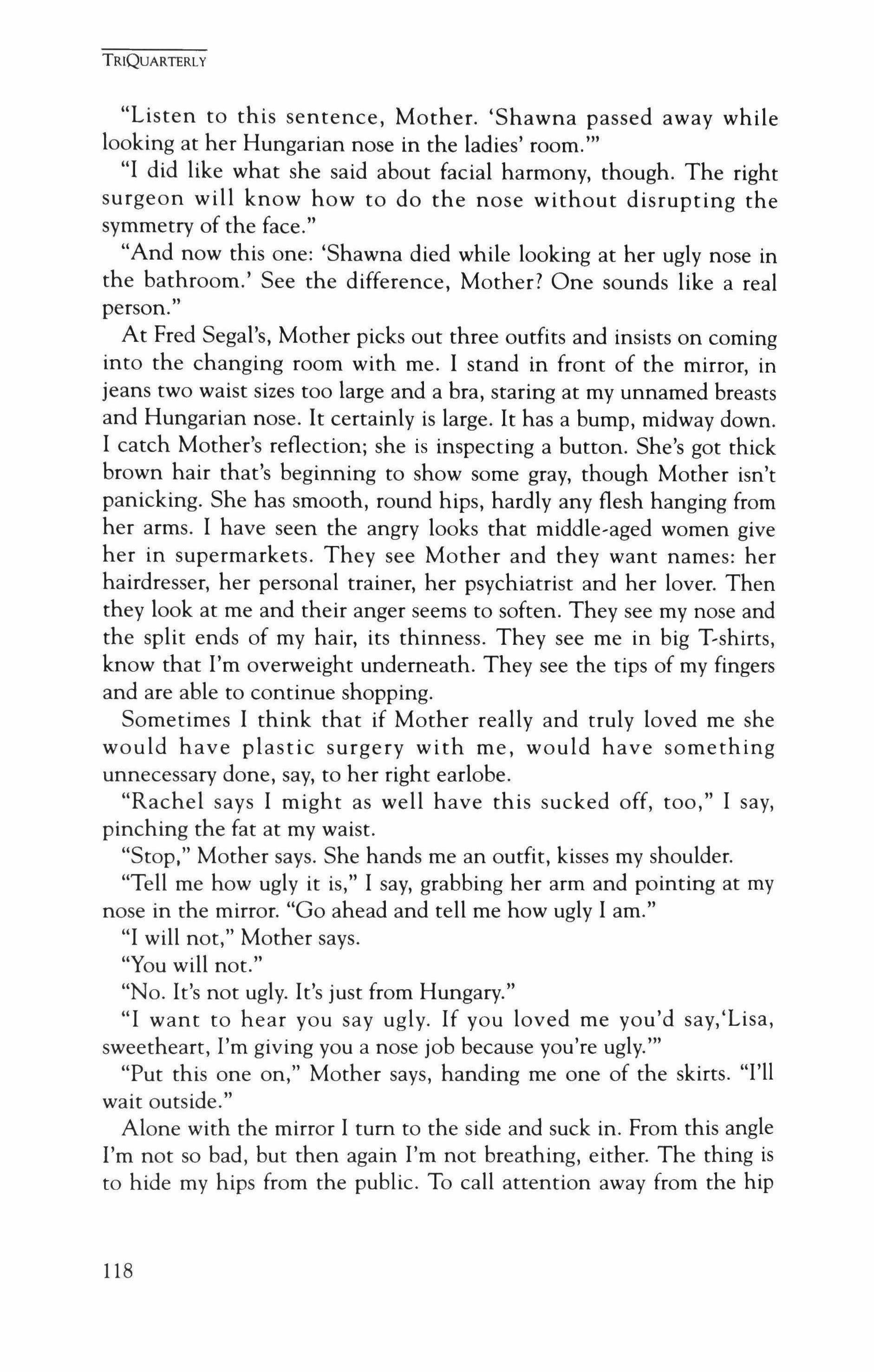
"Listen to this sentence, Mother. 'Shawna passed away while looking at her Hungarian nose in the ladies' room.'"
"I did like what she said about facial harmony, though. The right surgeon will know how to do the nose without disrupting the symmetry of the face."
"And now this one: 'Shawna died while looking at her ugly nose in the bathroom.' See the difference, Mother? One sounds like a real person."
At Fred Segal's, Mother picks out three outfits and insists on coming into the changing room with me. I stand in front of the mirror, in jeans two waist sizes too large and a bra, staring at my unnamed breasts and Hungarian nose. It certainly is large. It has a bump, midway down. I catch Mother's reflection; she is inspecting a button. She's got thick brown hair that's beginning to show some gray, though Mother isn't panicking. She has smooth, round hips, hardly any flesh hanging from her arms. I have seen the angry looks that middle-aged women give her in supermarkets. They see Mother and they want names: her hairdresser, her personal trainer, her psychiatrist and her lover. Then they look at me and their anger seems to soften. They see my nose and the split ends of my hair, its thinness. They see me in big T-shirts, know that I'm overweight underneath. They see the tips of my fingers and are able to continue shopping.
Sometimes I think that if Mother really and truly loved me she would have plastic surgery with me, would have something unnecessary done, say, to her right earlobe.
"Rachel says I might as well have this sucked off, too," I say, pinching the fat at my waist.
"Stop," Mother says. She hands me an outfit, kisses my shoulder.
"Tell me how ugly it is," I say, grabbing her arm and pointing at my nose in the mirror. "Go ahead and tell me how ugly I am."
"I will not," Mother says.
"You will not."
"No. It's not ugly. It's just from Hungary."
"I want to hear you say ugly. If you loved me you'd say,'Lisa, sweetheart, I'm giving you a nose job because you're ugly.'"
"Put this one on," Mother says, handing me one of the skirts. "I'll wait outside."
Alone with the mirror I tum to the side and suck in. From this angle I'm not so bad, but then again I'm not breathing, either. The thing is to hide my hips from the public. To call attention away from the hip
TRIQUARTERLY
118
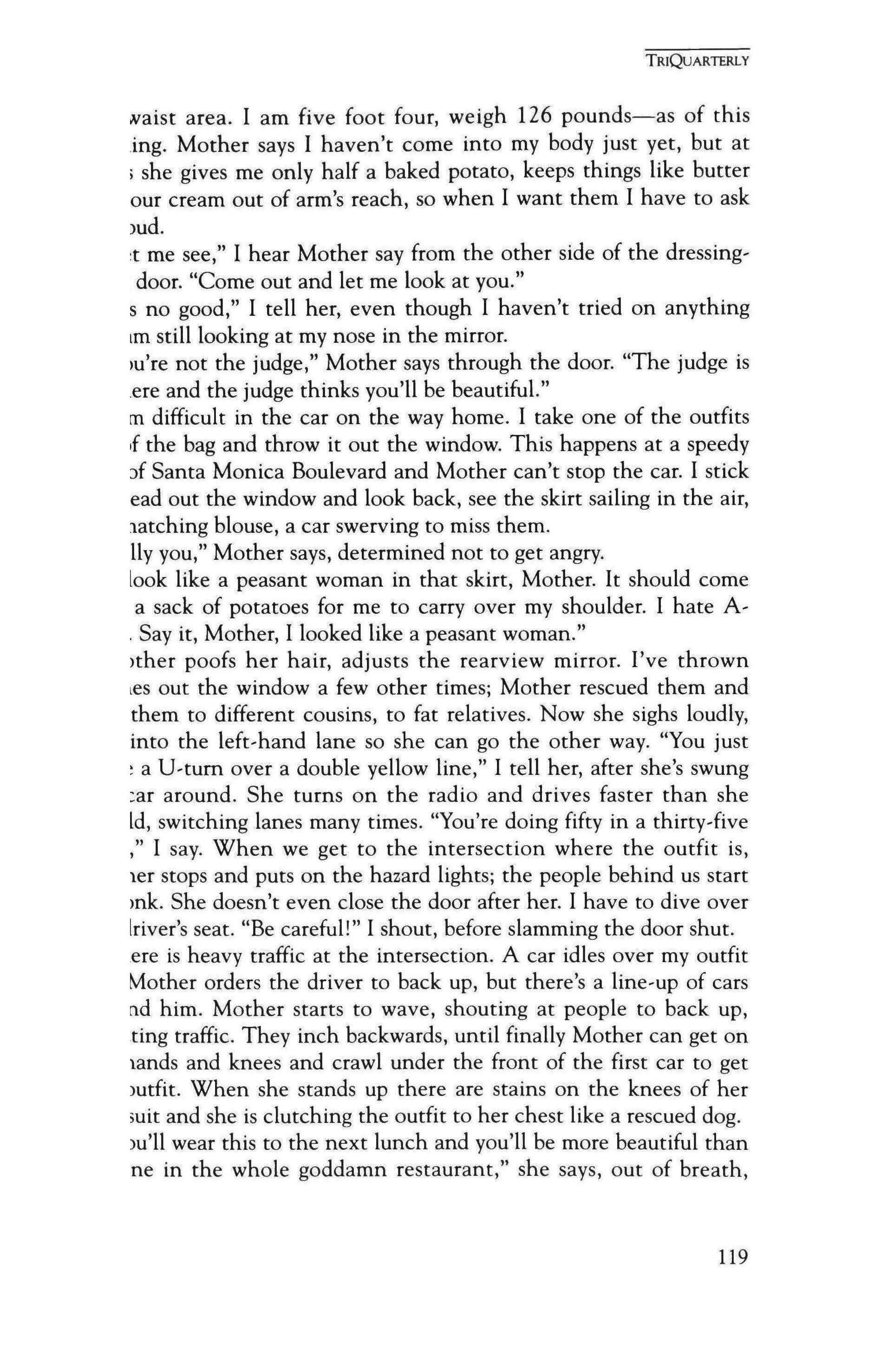
vaist area. I am five foot four, weigh 126 pounds-as of this ing. Mother says I haven't come into my body just yet, but at ; she gives me only half a baked potato, keeps things like butter our cream out of arm's reach, so when I want them I have to ask iud,
:t me see," I hear Mother say from the other side of the dressingdoor. "Come out and let me look at you."
s no good," I tell her, even though I haven't tried on anything un still looking at my nose in the mirror.
ni're not the judge," Mother says through the door. "The judge is .ere and the judge thinks you'll be beautiful."
m difficult in the car on the way home. I take one of the outfits f the bag and throw it out the window. This happens at a speedy of Santa Monica Boulevard and Mother can't stop the car. I stick ead out the window and look back, see the skirt sailing in the air, latching blouse, a car swerving to miss them. lly you," Mother says, determined not to get angry. look like a peasant woman in that skirt, Mother. It should come a sack of potatoes for me to carryover my shoulder. I hate A� Say it, Mother, I looked like a peasant woman."
ither poofs her hair, adjusts the rearview mirror. I've thrown ies out the window a few other times; Mother rescued them and them to different cousins, to fat relatives. Now she sighs loudly, into the left-hand lane so she can go the other way. "You just � a U-tum over a double yellow line," I tell her, after she's swung .ar around. She turns on the radio and drives faster than she ld, switching lanes many times. "You're doing fifty in a thirty-five ," I say. When we get to the intersection where the outfit is, ier stops and puts on the hazard lights; the people behind us start mk. She doesn't even close the door after her. I have to dive over lriver's seat. "Be careful!" I shout, before slamming the door shut.
ere is heavy traffic at the intersection. A car idles over my outfit Mother orders the driver to back up, but there's a line-up of cars nd him. Mother starts to wave, shouting at people to back up, ting traffic. They inch backwards, until finally Mother can get on lands and knees and crawl under the front of the first car to get iutfit. When she stands up there are stains on the knees of her mit and she is clutching the outfit to her chest like a rescued dog. ou'll wear this to the next lunch and you'll be more beautiful than ne in the whole goddamn restaurant," she says, out of breath, 119
TRIQuARTERLY

slamming her door shut. She doesn't speak as we drive home, as I fold the outfit neatly and return it to the bag, like something I have just purchased with my very own money.
The next lunch is with a boy. His name is Jamie and he won't look at me face to face, but takes quick glances, as if I'm direct sunlight. I'm wearing the peasant woman's outfit, the skirt a tangled mess between my knees. Jamie is tall and thin and I know he has a metabolism that allows him to eat and eat and eat, the pounds dribbling off him. We had Mr. Stevens's algebra class together as freshmen, and I remember that he usually sat in back and drew intently on the palm of his hand. Once, Mr. Stevens caught him in the act and made him stand up, display his hand to everyone. We all thought he had drawn something dirty, a swear word, but instead he'd drawn a human heart and was able to point to all the ventricles and atriums. Everyone, including Mr. Stevens, applauded.
Mrs. Cohen is from Mother's restaurant group. She wears sunglasses at the table and drinks beer with ice cubes, and the ash on her cigarette gets very long but never falls off. Every time Mother or I ask a question, she repeats it to Jamie in an overly loud voice, as if he is her old and senile father.
"Did it hurt?" I ask.
"WERE YOU IN PAIN?" Mrs. Cohen shouts.
"They put you to sleep," he says.
"For the whole time?"
"WERE YOU ASLEEP DURING THE ENTIRE SURGERY?"
"Most of it."
I imagine that right before the operation, Jamie put his hand in the air so the plastic surgeon could see what kind of nose he wanted, and that during the whole surgery a nurse held up the hand so the surgeon had a diagram to follow.
"How come you're getting a nose job?" Jamie asks me, after we're done eating (the women ordered salads, but Jamie asked for a hamburger, so I got one, too) and Mother and Mrs. Cohen have gone to the bathroom together.
"My mother thinks I should," I say.
"Do you?" he asks.
I blush. No one has asked me this yet, not Mother, not Rachel. No one has asked me point-blank if I think I need a nose job.
"Do you?" I say.
TRIQUARTERLY
120

"Yes," he says, innocently, like a little boy. I look away, wanting to hate him, but wondering why I feel grateful, why I could hug him, someone who would tell me such a thing.
Later, in the car, Mother says: "Mrs. Cohen thought you two might go to a movie some time."
"He hardly said a word the whole time you and Mrs. Cohen were in the bathroom talking about us, which don't think I don't know you were doing. Don't think I don't know that's what you do in the bathroom, Mother. You and Mrs. Cohen, you and Mrs. Fenton. You ask them what they think of me. And what do they say?"
"It wouldn't hurt you to see someone, with Rachel gone for the summer," Mother says. "I told Mrs. Cohen Jamie should call you."
"Mother!"
"I thought he seemed nice," Mother says. "You see what he says when he calls. I liked his nose, by the way, it really softened his other features I think I like this Dr. Kramer's work. You see what Jamie says when he calls."
That night Daddy comes home from work and makes himself a martini, undoes his tie and asks me if I am excited that I'm going to have a beautiful nose.
"I am not."
"I know," he says. In the evening his whole face seems to droop. When he comes home from work he goes to the den with his martini, at which point he turns into the dog I didn't get when I was ten. His eyes get glassy and I feel like taking him for a walk. I feel like holding him by a leash while he chats with other leashed, working fathers being walked by their teenaged daughters at dusk.
We eat dinner by the pool. In the summer Mother will announce that we are eating out there, a decision she makes secretly and finally, like the president deciding on a nuclear war. At the table my little brother Brian keeps putting his hands over his nose and making crunching noises. He's leaving for sleep-away camp at the end of the week. He's twelve years old and Mother is sending him to some sports camp in the mountains with his bratty friends. He says he's heard about cases where nose jobs go bad, where doctors break the bone and mush the cartilage to the left, only to discover it won't mush back in place.
"You are ugly," he says, chucking a watermelon rind into the deep end, "and the nose job proves it."
"Don't feed the pool," Mother says, and then she tells Daddy that
TRIQUARTERLY
121
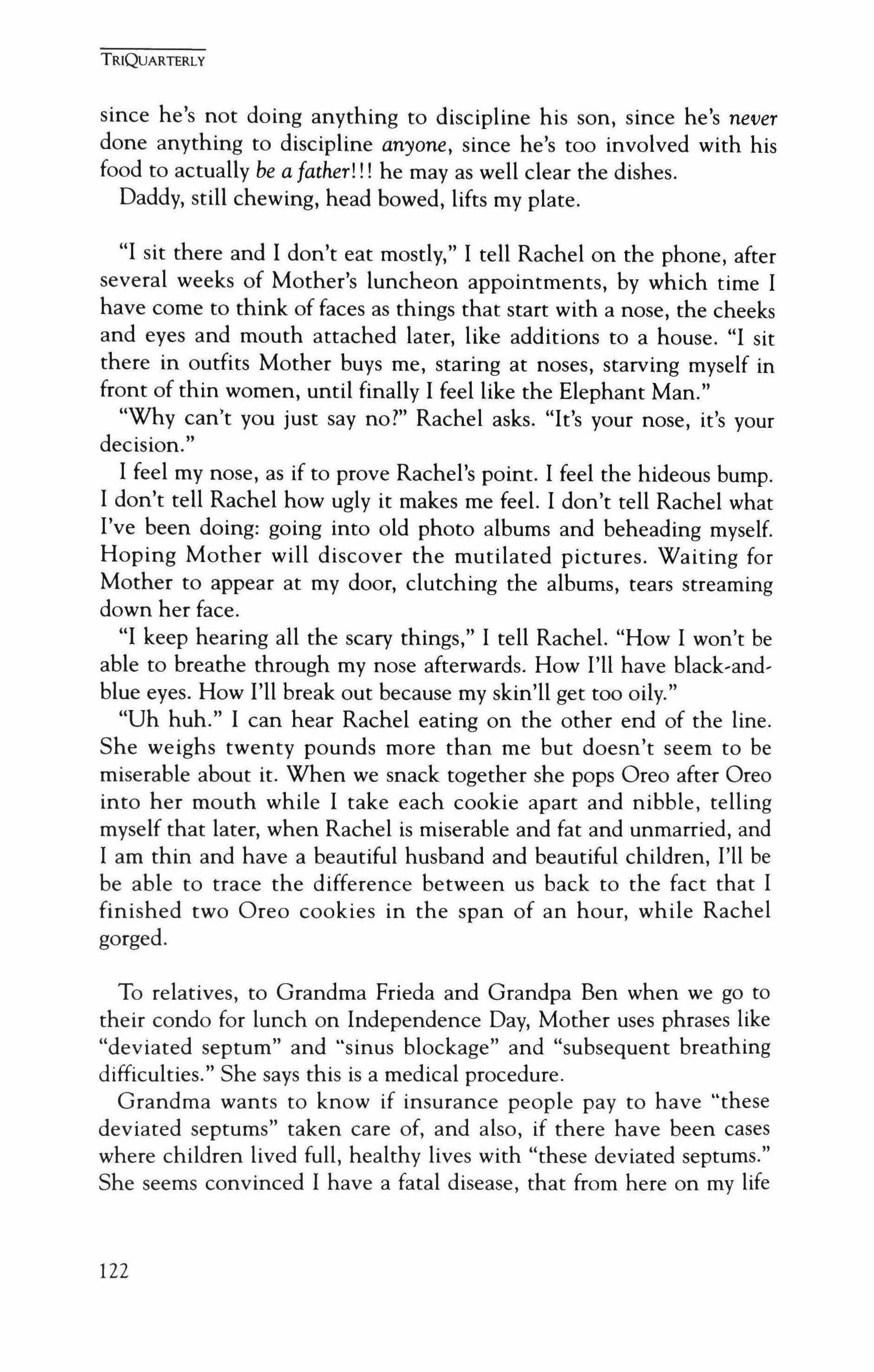
since he's not doing anything to discipline his son, since he's never done anything to discipline anyone, since he's too involved with his food to actually be a father!!! he may as well clear the dishes.
Daddy, still chewing, head bowed, lifts my plate.
"I sit there and I don't eat mostly," I tell Rachel on the phone, after several weeks of Mother's luncheon appointments, by which time I have come to think of faces as things that start with a nose, the cheeks and eyes and mouth attached later, like additions to a house. "I sit there in outfits Mother buys me, staring at noses, starving myself in front of thin women, until finally I feel like the Elephant Man."
"Why can't you just say no?" Rachel asks. "It's your nose, it's your decision."
I feel my nose, as if to prove Rachel's point. I feel the hideous bump. I don't tell Rachel how ugly it makes me feel. I don't tell Rachel what I've been doing: going into old photo albums and beheading myself. Hoping Mother will discover the mutilated pictures. Waiting for Mother to appear at my door, clutching the albums, tears streaming down her face.
"I keep hearing all the scary things," I tell Rachel. "How I won't be able to breathe through my nose afterwards. How I'll have black-andblue eyes. How I'll break out because my skin'll get too oily."
"Uh huh." I can hear Rachel eating on the other end of the line. She weighs twenty pounds more than me but doesn't seem to be miserable about it. When we snack together she pops Oreo after Oreo into her mouth while I take each cookie apart and nibble, telling myself that later, when Rachel is miserable and fat and unmarried, and I am thin and have a beautiful husband and beautiful children, I'll be be able to trace the difference between us back to the fact that I finished two Oreo cookies in the span of an hour, while Rachel gorged.
To relatives, to Grandma Frieda and Grandpa Ben when we go to their condo for lunch on Independence Day, Mother uses phrases like "deviated septum" and "sinus blockage" and "subsequent breathing difficulties." She says this is a medical procedure.
Grandma wants to know if insurance people pay to have "these deviated septums" taken care of, and also, if there have been cases where children lived full, healthy lives with "these deviated septums." She seems convinced I have a fatal disease, that from here on my life
TRIQUARTERLY
122
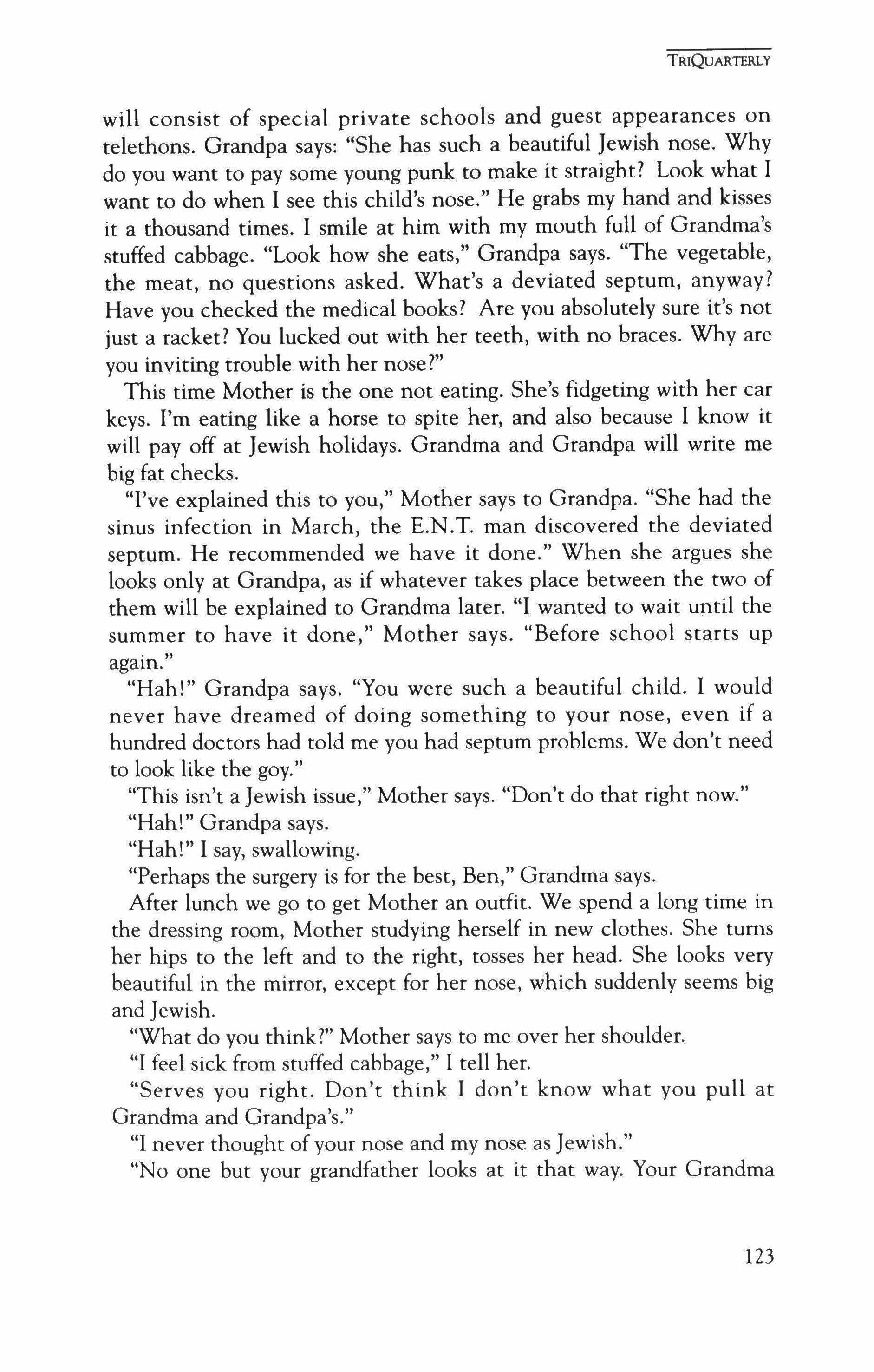
will consist of special private schools and guest appearances on telethons. Grandpa says: "She has such a beautiful Jewish nose. Why do you want to pay some young punk to make it straight? Look what I want to do when I see this child's nose." He grabs my hand and kisses it a thousand times. I smile at him with my mouth full of Grandma's stuffed cabbage. "Look how she eats," Grandpa says. "The vegetable, the meat, no questions asked. What's a deviated septum, anyway? Have you checked the medical books? Are you absolutely sure it's not just a racket? You lucked out with her teeth, with no braces. Why are you inviting trouble with her nose?"
This time Mother is the one not eating. She's fidgeting with her car keys. I'm eating like a horse to spite her, and also because I know it will payoff at Jewish holidays. Grandma and Grandpa will write me big fat checks.
"I've explained this to you," Mother says to Grandpa. "She had the sinus infection in March, the E.N.T. man discovered the deviated septum. He recommended we have it done." When she argues she looks only at Grandpa, as if whatever takes place between the two of them will be explained to Grandma later. "I wanted to wait until the summer to have it done," Mother says. "Before school starts up again."
"Hah!" Grandpa says. "You were such a beautiful child. I would never have dreamed of doing something to your nose, even if a hundred doctors had told me you had septum problems. We don't need to look like the goy."
"This isn't a Jewish issue," Mother says. "Don't do that right now."
"Hah!" Grandpa says.
"Hah!" I say, swallowing.
"Perhaps the surgery is for the best, Ben," Grandma says.
After lunch we go to get Mother an outfit. We spend a long time in the dressing room, Mother studying herself in new clothes. She turns her hips to the left and to the right, tosses her head. She looks very beautiful in the mirror, except for her nose, which suddenly seems big and Jewish.
"What do you think?" Mother says to me over her shoulder.
"I feel sick from stuffed cabbage," I tell her.
"Serves you right. Don't think I don't know what you pull at Grandma and Grandpa's."
"I never thought of your nose and my nose as Jewish."
"No one but your grandfather looks at it that way. Your Grandma
TRIQUARTERLY
123

Esther in Florida, for instance. She wants pictures as soon as your nose heals."
I watch Mother watching herself in the mirror, applying makeup: blush to the bridge of her nose, soft smears of rouge at the top of her cheeks. I think about how beautiful she must've been when she was my age, how she could cram her hips into the same pants she is cramming them into now. How she didn't need to wear Avlines, How she didn't need a nose job.
"What do you think?" Mother says, turning herself this way and that.
"You look nice," I say, though I am difficult again on the way home. I take Mother's outfit and throw it out the window. I heave it. I chuck it. I throw it so hard my arm slams against the door. I don't even bother to take it out of the bag.
"Sorry," I say, minutes later, when we're miles from the outfit, and I realize Mother is not going to go back to get it.
I have dreams like the one in which Mother and I are at the beach. We are holding hands and watching my nose, which is inflated to the size of a float in the Rose Bowl Parade. It is moving away from us, heading up, up and away, and the weird thing is I am looking down from the sky, as if I am the nose, looking down at Mother and the girl who is me, the two of us with our heads tilted upward and our mouths open, holding hands.
"What does it mean?" I ask Rachel. She isn't good at interpreting dreams, but she thinks this one involves the elusiveness of beauty, that no matter how much time and energy we spend achieving it, beauty will always be like that huge nose heading for the clouds, something we can only hold our mouths open and gape at. Something that we're doomed never to attain. Her examples are, for different reasons, Michael Jackson, an old Twilight Zone episode, and her dead Aunt Clara.
"But doesn't the dream have anything to do with my mother?" I ask.
"With you," Rachel says, "always."
Jamie Cohen calls at the end of July and asks if we have chosen a doctor. Mother has narrowed it down to several but hasn't made any appointments.
"No," I say.
There is a pause, and then he asks if I want to see a movie in Westwood this weekend. His voice is shaky and I imagine him on the
TRIQUARTERLY
124 / /

other end of the line, drawing frantically into his hand while Mrs. Cohen stands behind him, ready to get on the phone and ask me out in a loud voice if I say no to her son. I say no, anyway. It has to do with his fast metabolism.
"What did you say?" Mother asks me, coming into my room after I've hung up.
"I said no."
"Were you polite?" "Very."
"Are you sure?"
"I told him that I have to get a nose job and my Mother keeps stalling by taking me on lunch after lunch after lunch, and I also said that I'm beginning to think she's more nervous about it than me, because really what difference does it make which doctor we end up with."
Mother leaves. I think she is gone for the night but she returns minutes later, like a fly, like something that's been in the room the whole time.
"It's Jamie again," she says. "He wants to know if you're available this Thursday. Try to be polite this time. Do your mother a favor and get Mrs. Cohen off of her back."
Mrs. Cohen drives us to Westwood. Jamie is in the front seat and I'm in back. All the windows are up but Mrs. Cohen shouts anyway.
"WHERE WILL YOU TWO EAT AFTERWARDS?"
"We don't know," Jamie says.
"HOW ABOUT MEXICAN FOOD. YOU LIKE MEXICAN FOOD, LISA?"
"YES," I say, and Mrs. Cohen looks at me funny in the rearview mirror, because apparently she can tell when others are shouting.
We are dropped off in front of the movie theater, but as soon as Mrs. Cohen has disappeared into the traffic Jamie turns to me and says: "I don't want to see any movie."
"What do you want to do?" I ask, wondering if he has bigger plans, if what he really wants is to get away from his mother forever, to steal a car and convince me to go along with him, saying things like: "Your nose is fine. You think your mother loves you? She wants to reconstruct your face! Is that love? Forget about your mother. Come with me to Pittsburgh."
"I don't know," he says, his hair blowing in front of his face. "What
TRlQuARTERLY
125
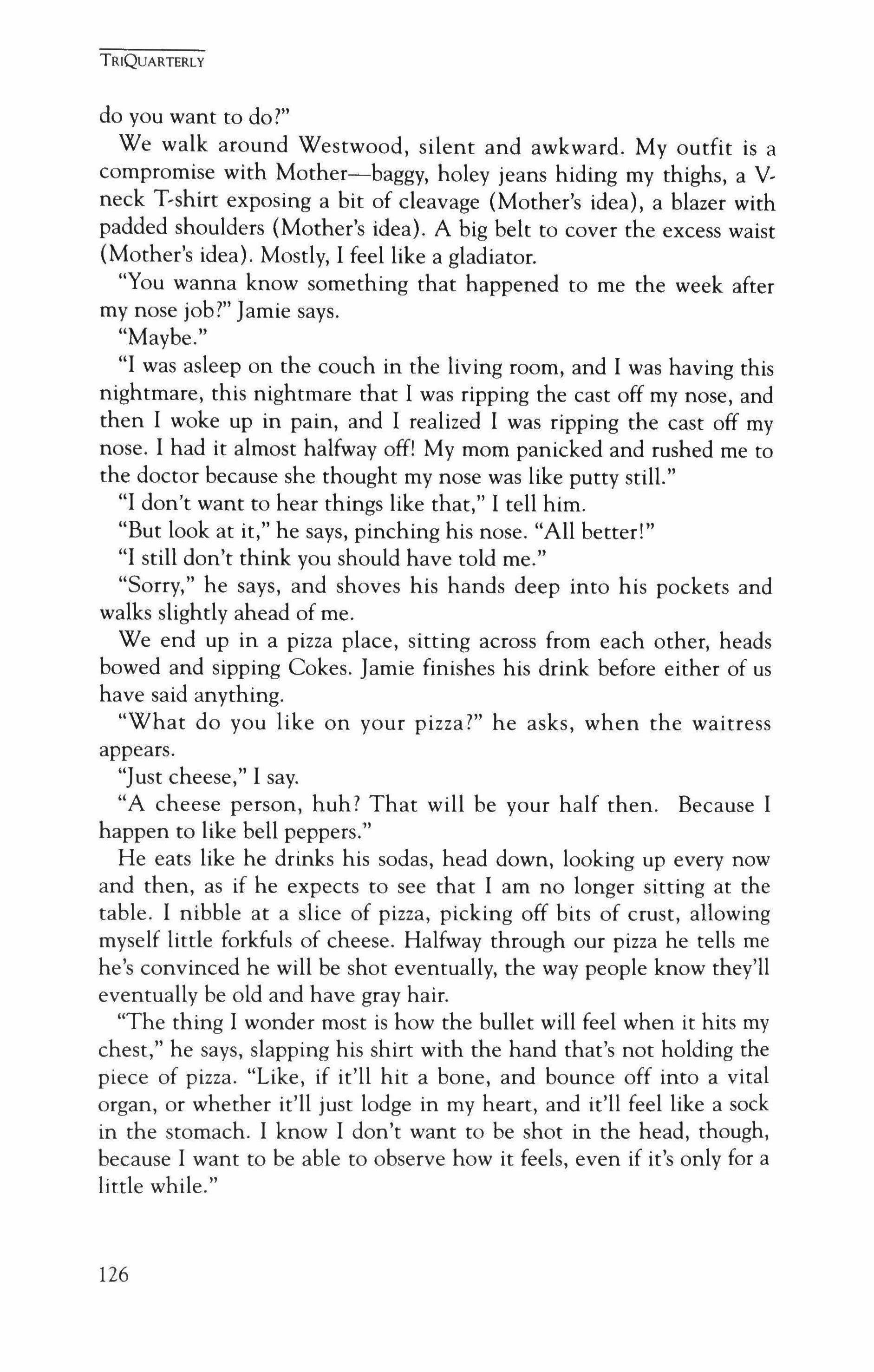
do you want to do?"
We walk around Westwood, silent and awkward. My outfit is a compromise with Mother-baggy, holey jeans hiding my thighs, a Vneck Tvshirt exposing a bit of cleavage (Mother's idea), a blazer with padded shoulders (Mother's idea). A big belt to cover the excess waist (Mother's idea). Mostly, I feel like a gladiator.
"You wanna know something that happened to me the week after my nose job?" Jamie says.
"Maybe."
"I was asleep on the couch in the living room, and I was having this nightmare, this nightmare that I was ripping the cast off my nose, and then I woke up in pain, and I realized I was ripping the cast off my nose. I had it almost halfway off! My mom panicked and rushed me to the doctor because she thought my nose was like putty still."
"I don't want to hear things like that," I tell him.
"But look at it," he says, pinching his nose. "All betted"
"I still don't think you should have told me."
"Sorry," he says, and shoves his hands deep into his pockets and walks slightly ahead of me.
We end up in a pizza place, sitting across from each other, heads bowed and sipping Cokes. Jamie finishes his drink before either of us have said anything.
"What do you like on your pizza?" he asks, when the waitress appears.
"Just cheese," I say.
"A cheese person, huh? That will be your half then. Because I happen to like bell peppers."
He eats like he drinks his sodas, head down, looking up every now and then, as if he expects to see that I am no longer sitting at the table. I nibble at a slice of pizza, picking off bits of crust, allowing myself little forkfuls of cheese. Halfway through our pizza he tells me he's convinced he will be shot eventually, the way people know they'll eventually be old and have gray hair.
"The thing I wonder most is how the bullet will feel when it hits my chest," he says, slapping his shirt with the hand that's not holding the piece of pizza. "Like, if it'll hit a bone, and bounce off into a vital organ, or whether it'll just lodge in my heart, and it'll feel like a sock in the stomach. I know I don't want to be shot in the head, though, because I want to be able to observe how it feels, even if it's only for a little while."
TRIQUARTERLY
126

Mother picks us up. She brings our dog Sandy along as a pawn, plunking him down in the passenger seat so Jamie and I will be forced to sit together in back. Mother and I stare at each other in the rearview mirror, in a silent, tense confrontation. Mother can tell by my expression that there aren't too many more things I will do for her this summer. Jamie and Sandy both have their heads out the window.
"So," Mother says later, as we watch Jamie walk toward his front door. "So how-"
"We didn't see a movie. He told me a terrible story about how he had nightmares after his surgery, how he woke up ripping the cast off of his face. How Mrs. Cohen rushed him to the doctor because she thought he'd ruined his nose. And then we ate pizza and all he talked about was getting shot. It was very odd, Mother."
"His mother shouts. Maybe that has something to do with it."
"I can't meet any more mothers, Mother. Or daughters or sons. I want this to end soon. I want to have this surgery and I want this to end."
"Only a few more to go," Mother says. "You've made me proud up to now. Only a few more to go, and then we'll be at the surgery phase. You'll see how fast it'll go then."
"Right afterwards," says Kara Nichol, who's definitely not a blond, and whose nose got turned up too much at the tip, making it look like a water slide, "you will not be a happy camper. You might feel as though you've been mugged, left for dead. And don't be surprised if your mother can't look at you. She eventually will."
We are in Le Chardonnay Restaurant, sitting at the table while Mother and Mrs. Nichol are in the bathroom talking about me. Kara lights a cigarette, takes a puff, puts it out in the ashtray.
"Why do you smoke like that?" I ask her. "Why don't you smoke the whole thing?"
"My mother thinks I've quit," she says. "Don't even tell her I did what I just did."
"O.K."
"Anyway, as I was saying-" "Avoid mirrors."
"Right. The worst part is-"
"The worst part is the first few weeks. Not being able to breathe through your nose. And having this huge uncomfortable cast on your face. And the black and blueness around your eyes."
TRIQUARTERLY
127
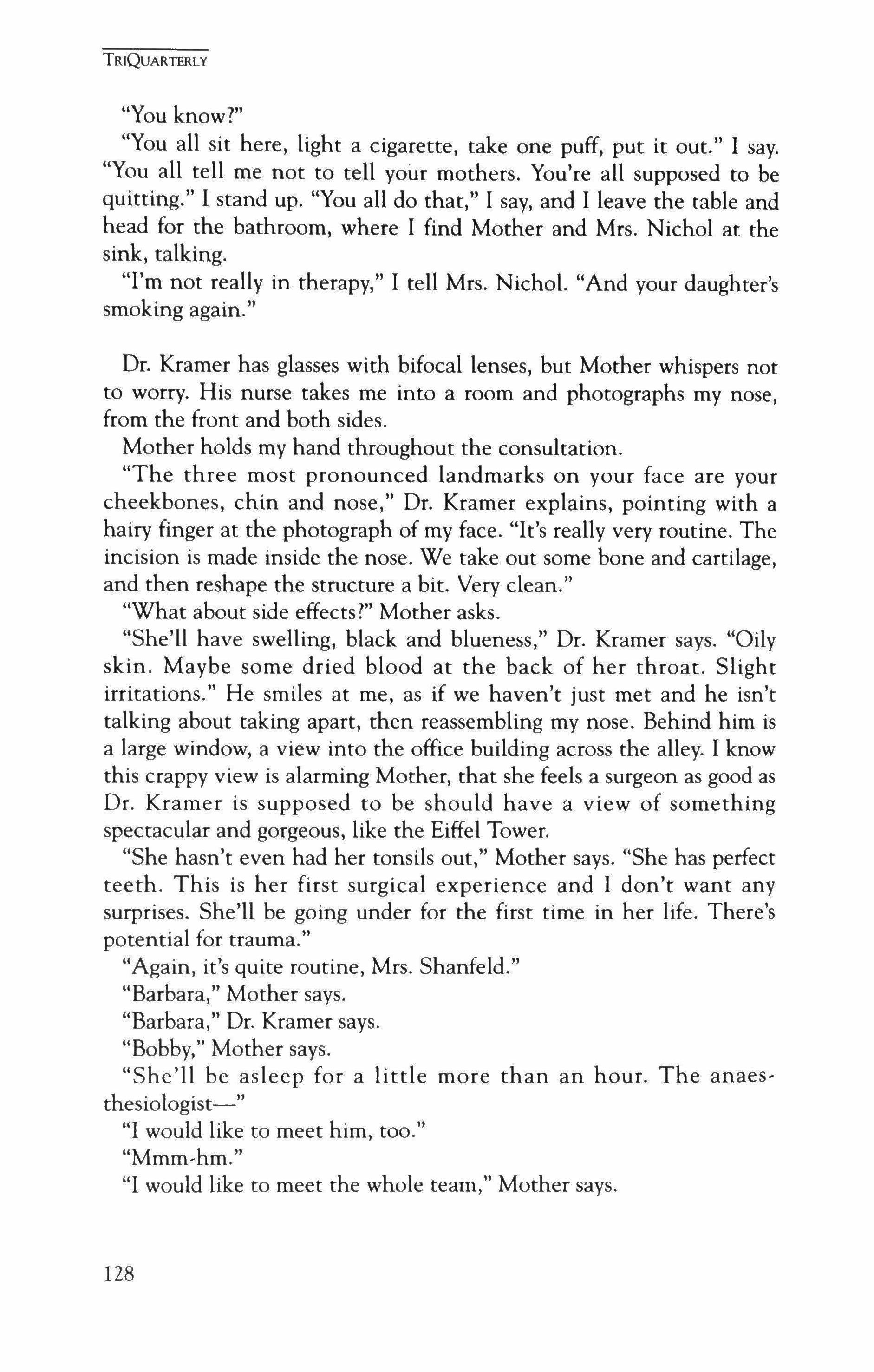
"You know?"
"You all sit here, light a cigarette, take one puff, put it out." I say. "You all tell me not to tell your mothers. You're all supposed to be quitting." I stand up. "You all do that," I say, and I leave the table and head for the bathroom, where I find Mother and Mrs. Nichol at the sink, talking.
"I'm not really in therapy," I tell Mrs. Nichol. "And your daughter's smoking again."
Dr. Kramer has glasses with bifocal lenses, but Mother whispers not to worry. His nurse takes me into a room and photographs my nose, from the front and both sides.
Mother holds my hand throughout the consultation.
"The three most pronounced landmarks on your face are your cheekbones, chin and nose," Dr. Kramer explains, pointing with a hairy finger at the photograph of my face. "It's really very routine. The incision is made inside the nose. We take out some bone and cartilage, and then reshape the structure a bit. Very clean."
"What about side effects?" Mother asks.
"She'll have swelling, black and blueness," Dr. Kramer says. "Oily skin. Maybe some dried blood at the back of her throat. Slight irritations." He smiles at me, as if we haven't just met and he isn't talking about taking apart, then reassembling my nose. Behind him is a large window, a view into the office building across the alley. I know this crappy view is alarming Mother, that she feels a surgeon as good as Dr. Kramer is supposed to be should have a view of something spectacular and gorgeous, like the Eiffel Tower.
"She hasn't even had her tonsils out," Mother says. "She has perfect teeth. This is her first surgical experience and I don't want any surprises. She'll be going under for the first time in her life. There's potential for trauma."
"Again, it's quite routine, Mrs. Shanfeld."
"Barbara," Mother says.
"Barbara," Dr. Kramer says.
"Bobby," Mother says.
"She'll be asleep for a little more than an hour. The anaesthesiologist-"
"I would like to meet him, too."
"Mrnm-hm."
"I would like to meet the whole team," Mother says.
TRIQUARTERLY
128

"What team," I say to Mother, taking my hand out of hers. "This isn't open-heart surgery."
"So brave," Mother says to me, with what seems like spite.
"So, Lisa," Dr. Kramer says, "what other things do you want to know?"
I know that if Rachel were in my place she would have the courage to ask if he's ever been sued-and why, if he is such a good plastic surgeon, he has never bothered to make himself look better. "What if I wake up before you're finished?" I ask.
"You won't," he says.
"But what if I do?"
"We can give you a little extra if it worries you."
"A little extra what?" Mother says.
"Anaesthesia," Dr. Kramer says. "Also, she shouldn't have anything to eat the night before. You should have her take a Valium and put her to bed by around eight."
"Is that really necessary?" Mother says, leaning forward as if she doesn't want me to hear.
"Yes," Dr. Kramer says. He excuses himself, leaves us alone in his office. Mother takes a small pad of paper from her purse and begins to write.
"What are you writing?"
"Notes to myself."
"You're worried about the Valium? I know about Valium. Rachel's mother has a whole bunch in their bathroom. Once Rachel and 1-"
"I don't want to know," Mother says.
Dr. Kramer returns and says: "I have a cancellation this coming Monday. Otherwise, the week after next I have a Wednesday morning open."
"Which do you suggest?" Mother asks.
"How about Monday," I say.
"Monday is fine," Dr. Kramer says.
Mother looks anxiously at Dr. Kramer and me, as if we are deciding when to have her committed.
"Monday," Mother says. She goes into her purse and gets out her datebook. "This Monday, then," she says, jotting it down.
Dr. Kramer claps his hands. "What else can I tell you?"
"Do you play golf?" Mother says.
"Motherrr."
"You want to know if I play golf?" Dr. Kramer says.
TRIQUARTERLY
129
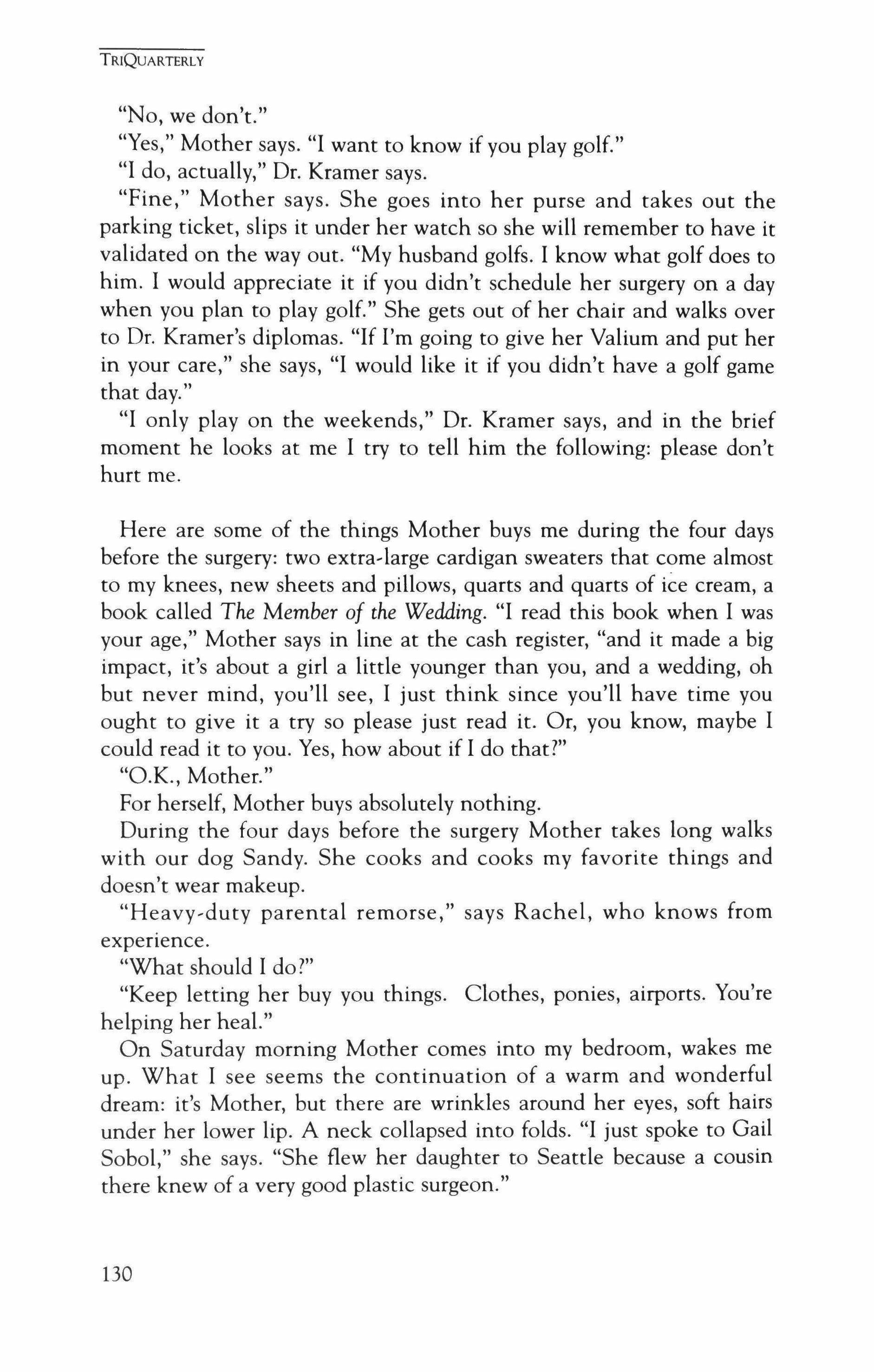
"No, we don't."
"Yes," Mother says. "I want to know if you play golf."
"I do, actually," Dr. Kramer says.
"Fine," Mother says. She goes into her purse and takes out the parking ticket, slips it under her watch so she will remember to have it validated on the way out. "My husband golfs. I know what golf does to him. I would appreciate it if you didn't schedule her surgery on a day when you plan to play golf." She gets out of her chair and walks over to Dr. Kramer's diplomas. "If I'm going to give her Valium and put her in your care," she says, "I would like it if you didn't have a golf game that day."
"I only play on the weekends," Dr. Kramer says, and in the brief moment he looks at me I try to tell him the following: please don't hurt me.
Here are some of the things Mother buys me during the four days before the surgery: two extra-large cardigan sweaters that come almost to my knees, new sheets and pillows, quarts and quarts of ice cream, a book called The Member of the Wedding. "I read this book when I was your age," Mother says in line at the cash register, "and it made a big impact, it's about a girl a little younger than you, and a wedding, oh but never mind, you'll see, I just think since you'll have time you ought to give it a try so please just read it. Or, you know, maybe I could read it to you. Yes, how about if I do that?"
"O.K., Mother."
For herself, Mother buys absolutely nothing.
During the four days before the surgery Mother takes long walks with our dog Sandy. She cooks and cooks my favorite things and doesn't wear makeup.
"Heavy-duty parental remorse," says Rachel, who knows from experience.
"What should I do?"
"Keep letting her buy you things. Clothes, ponies, airports. You're helping her heal."
On Saturday morning Mother comes into my bedroom, wakes me up. What I see seems the continuation of a warm and wonderful dream: it's Mother, but there are wrinkles around her eyes, soft hairs under her lower lip. A neck collapsed into folds. "I just spoke to Gail Sobol," she says. "She flew her daughter to Seattle because a cousin there knew of a very good plastic surgeon."
TRIQUARTERLY
130
"What are you saying, Mother?" I say, sitting up in bed. "I will not fly to Seattle to have lunch with anyone. Stop being scared."
"This guy in Seattle is apparently quite good," Mother says. It doesn't look like she's slept much. "We could even tum it into a little vacation. I realize you haven't gone anywhere this summer." She runs her hand through my hair. "I think Seattle might be the answer. It might be healthier for you to have the surgery done in a different city. We could stay in a hotel. You could have room service. Seattle is quite nice in the summer, I understand. The two of us could go, you and me, just the two of us."
"Read me that book, Mother," I say. "Read me that book you bought me the other day."
The night before the surgery Mother puts me in bed at eight. She hands me a glass of water and opens her palm, revealing the Valium. She looks down at it. "Lean your head back when you swallow," she says, putting it in my hand. I immediately put it in my mouth and swallow, wanting to show her my bravery. She fluffs my pillow and says she will come check on me later.
Daddy comes in a little while after Mother's left.
"Where's Mother?" I ask groggily.
"She's on the phone to the anaesthesiologist."
"What is she saying?" I ask, panicked that Mother is asking him about his golf game, too.
"She's just checking on some things," Daddy says. "Go to sleep."
Later, I swear I wake up and see Mother standing over by my bureau, laying out several potential outfits for the surgery. I swear I see her sitting in the wicker rocking chair covered in a blanket. I swear I can hear her rocking slowly back and forth, looking at the photo albums in which I am faceless, headless. She lingers at each picture.
I swear all of this happens, though when I wake up the next morning the only trace of her is the blanket, folded neatly in the chair.

"What's your favorite movie?" the anaesthesiologist asks. I am on a table and he's standing behind me, where I can't see him. He has very hairy arms, a beard and soft green eyes. Dr. Kramer has made a brief appearance over my body and then disappeared, like someone checking on dinner.
TRIQUARTERLY
* * *
131
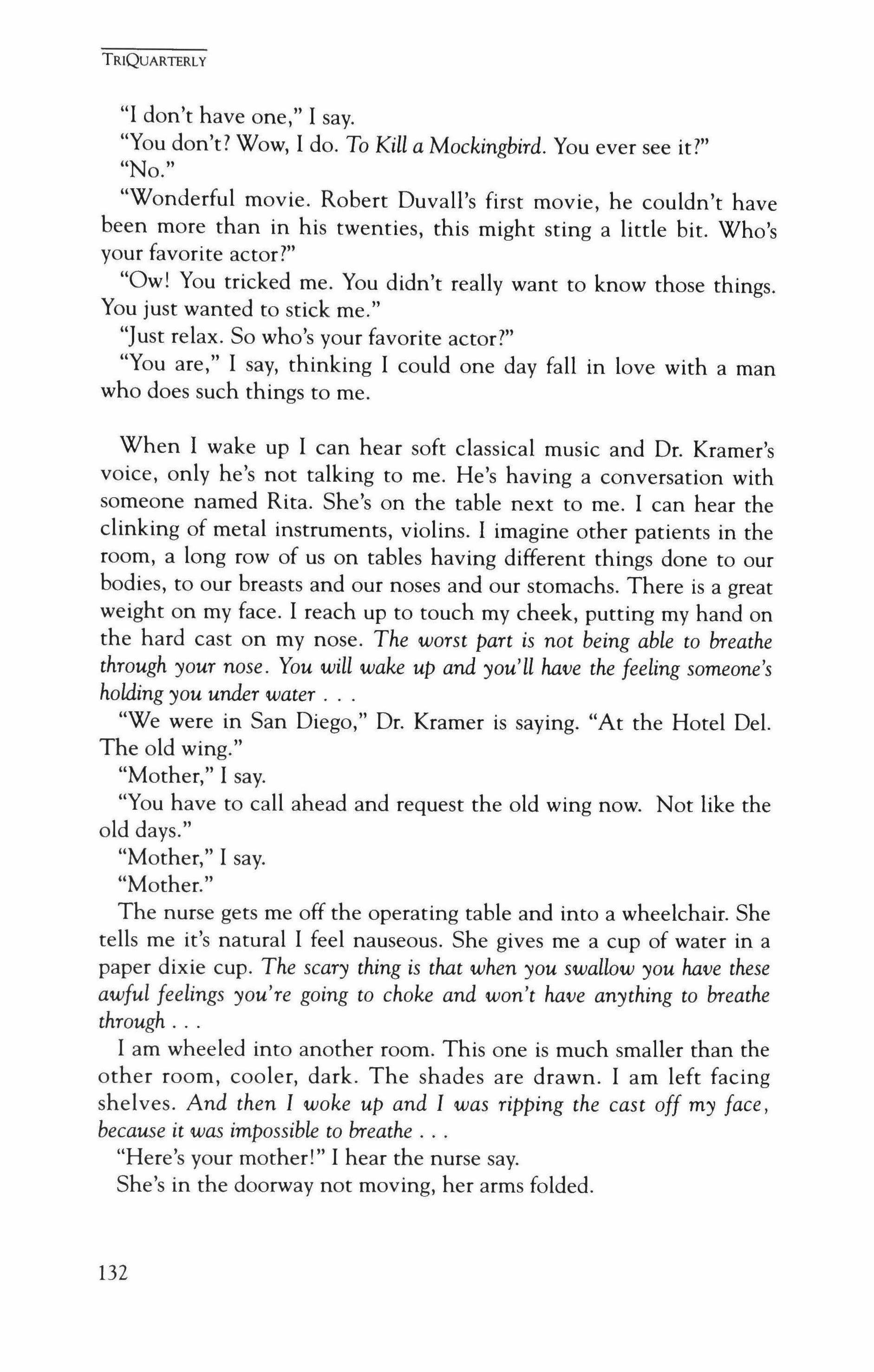
"1 don't have one," I say.
"You don't? Wow, I do. To Kill a Mockingbird. You ever see it?"
"No."
"Wonderful movie. Robert Duvall's first movie, he couldn't have been more than in his twenties, this might sting a little bit. Who's your favorite actor?"
"Ow! You tricked me. You didn't really want to know those things. You just wanted to stick me."
"Just relax. So who's your favorite actor?"
"You are," I say, thinking 1 could one day fall in love with a man who does such things to me.
When 1 wake up 1 can hear soft classical music and Dr. Kramer's voice, only he's not talking to me. He's having a conversation with someone named Rita. She's on the table next to me. 1 can hear the clinking of metal instruments, violins. 1 imagine other patients in the room, a long row of us on tables having different things done to our bodies, to our breasts and our noses and our stomachs. There is a great weight on my face. 1 reach up to touch my cheek, putting my hand on the hard cast on my nose. The worst part is not being able to breathe through your nose. You will wake up and you'll have the feeling someone's holding you under water
"We were in San Diego," Dr. Kramer is saying. "At the Hotel Del. The old wing."
"Mother," I say.
"You have to call ahead and request the old wing now. Not like the old days."
"Mother," I say. "Mother."
The nurse gets me off the operating table and into a wheelchair. She tells me it's natural I feel nauseous. She gives me a cup of water in a paper dixie cup. The scary thing is that when you swallow you have these awful feelings you're going to choke and won't have anything to breathe through
I am wheeled into another room. This one is much smaller than the other room, cooler, dark. The shades are drawn. 1 am left facing shelves. And then I woke up and I was ripping the cast off my face, because it was impossible to breathe
"Here's your mother!" I hear the nurse say.
She's in the doorway not moving, her arms folded.
TRIQUARTERLY
132
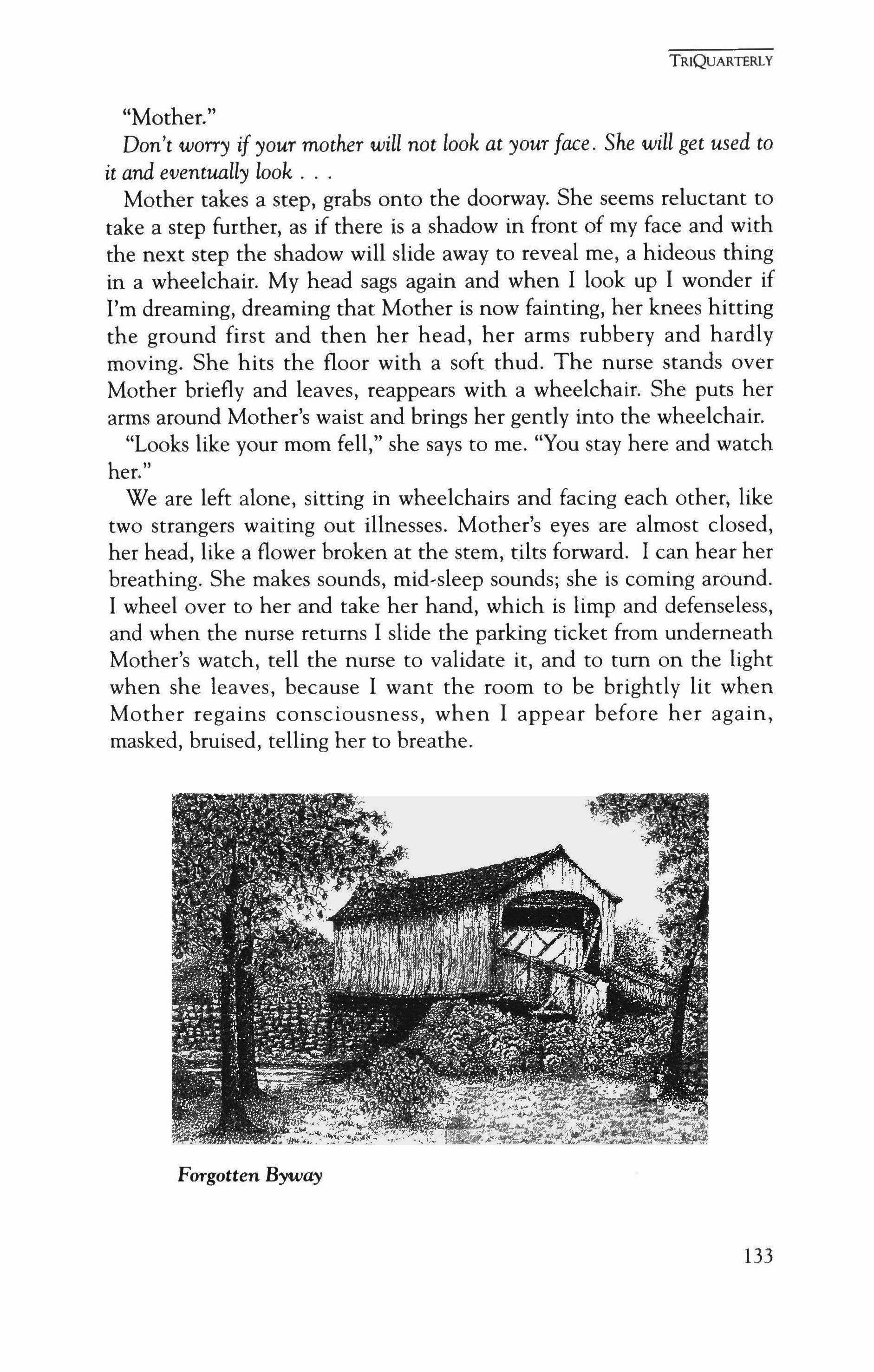
"Mother."
Don't worry if your mother will not look at your face. She will get used to it and eventually look
Mother takes a step, grabs onto the doorway. She seems reluctant to take a step further, as if there is a shadow in front of my face and with the next step the shadow will slide away to reveal me, a hideous thing in a wheelchair. My head sags again and when I look up I wonder if I'm dreaming, dreaming that Mother is now fainting, her knees hitting the ground first and then her head, her arms rubbery and hardly moving. She hits the floor with a soft thud. The nurse stands over Mother briefly and leaves, reappears with a wheelchair. She puts her arms around Mother's waist and brings her gently into the wheelchair. "Looks like your mom fell," she says to me. "You stay here and watch her."
We are left alone, sitting in wheelchairs and facing each other, like two strangers waiting out illnesses. Mother's eyes are almost closed, her head, like a flower broken at the stem, tilts forward. I can hear her breathing. She makes sounds, mid-sleep sounds; she is coming around. I wheel over to her and take her hand, which is limp and defenseless, and when the nurse returns I slide the parking ticket from underneath Mother's watch, tell the nurse to validate it, and to turn on the light when she leaves, because I want the room to be brightly lit when Mother regains consciousness, when I appear before her again, masked, bruised, telling her to breathe.
TRIQUARTERLY
Forgotten
133
Byway
The Greenskeeper
William Loizeoux

In the spring and summer, Hank gets up every morning in the pitch dark, with his window wide open. His bedroom is filled with smells of trees, dew, and cool mown grass. It is before there is a car far away on the winding road, before the newspaper thuds on his front step, long before there is even a sign of life way up at the clubhouse. Hank showers, then shaves in front of the small oval mirror. He puts on his work shirt, pants, and still before the first hint of light, comes down to his kitchen where he makes a cup of coffee, packs his lunchbox, pours milk for the cat, opens the curtains, then takes his coffee out on the back step and sits there to put on his boots.
He is an older man, getting on toward seventy, though he doesn't really look it. In the light from his kitchen door, his face and hands are smooth and tan. His hair is white, but thick. As he stands again, he holds himself with grace and dignity, something old-fashioned, the way that men once stood on ballroom floors. He walks a little ways from the house, stops, and leans against a fence post. His coffee is rich and strong. There are stars in the sky. He hears the first rasping caw of grackles. He smells the still air, thick with pollen. And this, he knows, is his time of day-when the golf course lies before him, dark and calm; when only he can feel the pitch and roll of hills, how they slide toward streams, how the streams meander, the ponds fill and drain, how they freeze and melt, and with this morning's light will lie brimmed, glassy, and covered white with dogwood blossoms.
Peace. How odd. Yet this is what Hank has found here: this mild acceptance, this strange giving over of himself, like water smooth down a spillway. It is so hard to believe after all these years. After all
TRIQUARTERLY
134

the long nights, the crazed drives, vowing never to return to this small stony house, never to set foot on this golf course again. Yet always turning back, always pulling down his long gravel driveway, seeing the light above his front door, thinking maybe, maybe But finding the door still locked, no coat in the closet, no silk scarf on the back of the kitchen chair. Then climbing the familiar stairs, his hand firm on the railing. Sliding into bed, the sheets cold, but the window open, the whirr of cicadas, the slow throb way out at the pump house, the whole night pouring in through his window. And dew falling like gauze. Like peace.
And like a strange purity, he thinks now as he finishes his coffee, goes back to the house, snaps off the kitchen light, then begins his long walk in the dark, straight out, away from his house, toward the distant place in the blackness that he knows is the garage. The grass where he walks is smooth, cropped, and slicked with wetness. For almost forty years he has taken care of this-seeded, fertilized, aerated, mowed, raked and watered. He has seen these fairways covered with leaves, frost, snow, turbid water and dried sludge. He has walked to the garage in snowshoes, hip boots. He would swim if he had to. But this morning, like most, he feels beneath him that slight sponginess that makes him smile. He knows the grass is thick and green. He has done something well. It is almost as if he is getting somewhere, making progress, as if by mowing back and forth in wide swaths on rolling hillsides-as if through sheer maintenance or ministry-he might work his life clean and polished.
But even this makes him smile. Because Hank can see himself, his life, as from a short distance. He knows he can't change what's already done. He can't rearrange these stars, can't flatten these hills that rise and fall away as gentle as shoulders. He can only do his work, and wait. So he plants rows of seedlings and banks of azaleas. He wraps them for the winter in burlap. In the spring, he sprays for fungus and parasites. He cuts dead limbs from trees and paints the wounds with tarry creosote. It will never be enough, but still he does it. For it makes him feel what he yearns to feel. It keeps him alive-this angular man walking briskly through the darkness, buoyant, purposeful, his windbreaker swishing as his arms sway. He is like a commuter catching a train, he thinks, heading home with roses and chocolates, the evening paper. Except that the tissue of light that glows now is on the eastern horizon. It is dawn. And his home is behind him, a half,mile away: a clump of trees, a split, rail fence, a narrow chimney against the sky.
TRlQuARTERLY
135

He crosses a plank bridge over a marshy stream. He goes into a thick patch of cool mist and heads uphill, keeping his pace and keeping a straight line. All around him the world is greenish gray, the color of weathered copper. He sees shapes of bushes and trees, to his left a small, elevated place, like a plateau, with a wooden bench, a wire wastebasket: the fourteenth tee. From further away, he hears the Canadian geese, their plaintive honking, and he knows that soon, as the mist rises, they too will rise from the pond, their wide wings slapping the water. As he reaches the crest of the hill, he is almost there at the garage, though for the mist, he can't make it out: the three big white doors for the truck and tractors, the gas pump, the sand pile and, on the far end of the garage, the smaller door, like a bedroom door, with the worn brass knob that opens into his office.
How strange, he thinks, to see the stars above and not see the garage but a few hundred yards away. He veers around a putting green that is coated with dew. There is a small flagpole in the middle and sand traps all around it. He pauses to look at the tiny tracks of birds that curve and interlace on the surface of the green. Then, as he turns again toward the garage, he feels something odd-like a breath, a slight breeze in the tops of the trees, or something present in the mist that he can't quite discern. Perhaps there are deer again on the fifth fairway, grazing along the edge of the woods. Or perhaps one of his men has come in early and is waiting beside his office door. "Men" he calls them, though they are boys, really-all five of them, fresh out of high school, their ropy muscles, pimples, T,shirts and tight jeans. Kids with their first jobs. In love with machines, torque, horsepower. Their rolled-up sleeves and slicked,back hair. So hard, so tough. So vulnerable.
Hank shakes his head and laughs aloud. He sees himself as he was back then. Awkward and gangly. Gagging on cigarettes. Those hours in the mirror, his hair just right, his collar opened, his tie loosedashing!-flung over his shoulder, like Lucky Lindy stepping out of a plane.
How can he not laugh and love this life? These cool, hard kids who call him "Pops." Their trumped,up stories about girls, "chicks," the curve of thighs, the slope of breasts they've never seen, or touched, or held. Hank is as sure of this as he is sure of anything. He sees the lie in their eyes, their hearts flinch, but he doesn't let on. As they tell their stories, he nods, smiles, claps them on the back. He feels their bony shoulders burdened with innocence. It is such a pity. But it is so
TRIQUARTERLY
136
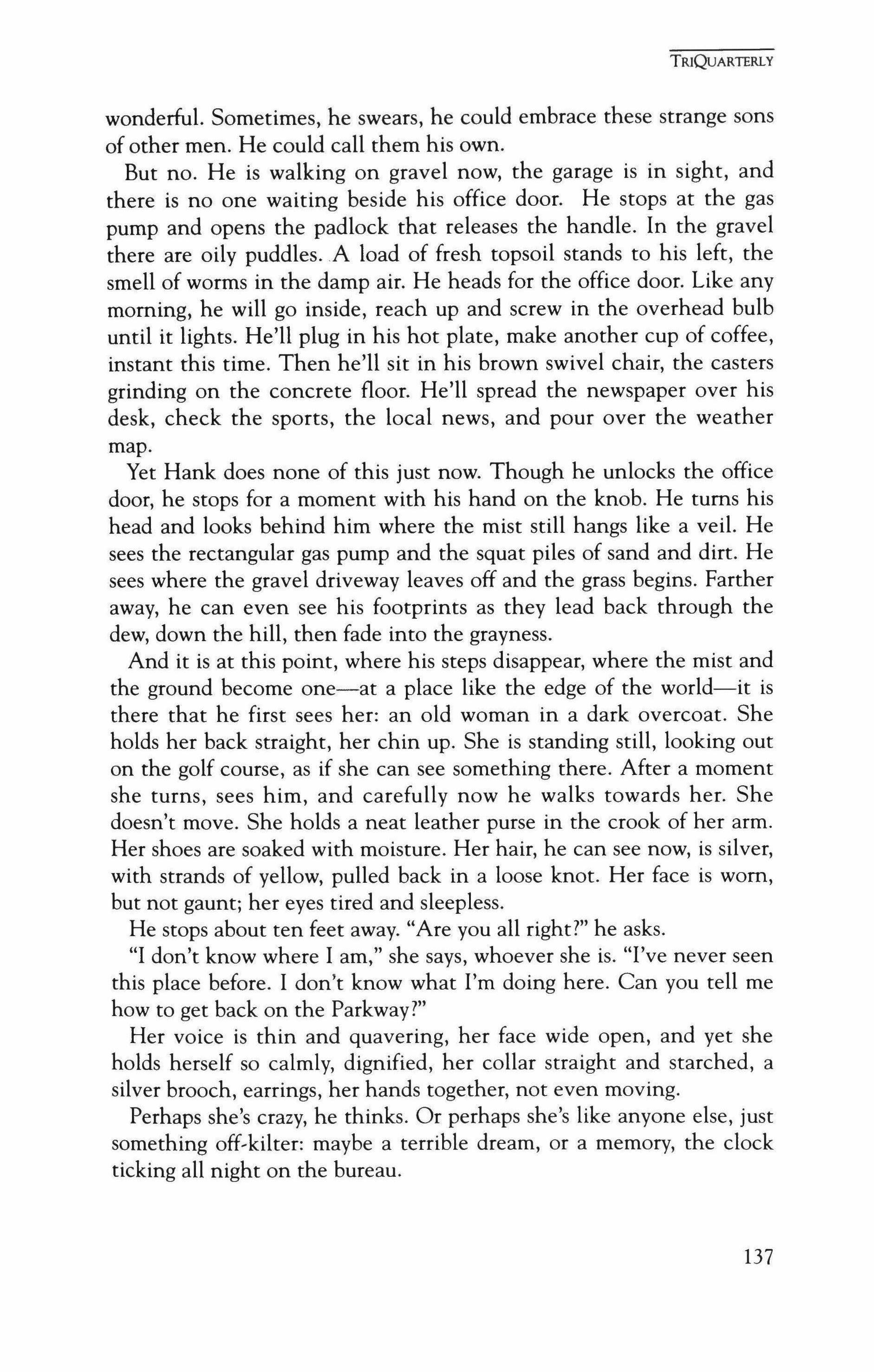
wonderful. Sometimes, he swears, he could embrace these strange sons of other men. He could call them his own.
But no. He is walking on gravel now, the garage is in sight, and there is no one waiting beside his office door. He stops at the gas pump and opens the padlock that releases the handle. In the gravel there are oily puddles A load of fresh topsoil stands to his left, the smell of worms in the damp air. He heads for the office door. Like any morning, he will go inside, reach up and screw in the overhead bulb until it lights. He'll plug in his hot plate, make another cup of coffee, instant this time. Then he'll sit in his brown swivel chair, the casters grinding on the concrete floor. He'll spread the newspaper over his desk, check the sports, the local news, and pour over the weather map.
Yet Hank does none of this just now. Though he unlocks the office door, he stops for a moment with his hand on the knob. He turns his head and looks behind him where the mist still hangs like a veil. He sees the rectangular gas pump and the squat piles of sand and dirt. He sees where the gravel driveway leaves off and the grass begins. Farther away, he can even see his footprints as they lead back through the dew, down the hill, then fade into the grayness.
And it is at this point, where his steps disappear, where the mist and the ground become one-at a place like the edge of the world-it is there that he first sees her: an old woman in a dark overcoat. She holds her back straight, her chin up. She is standing still, looking out on the golf course, as if she can see something there. After a moment she turns, sees him, and carefully now he walks towards her. She doesn't move. She holds a neat leather purse in the crook of her arm. Her shoes are soaked with moisture. Her hair, he can see now, is silver, with strands of yellow, pulled back in a loose knot. Her face is worn, but not gaunt; her eyes tired and sleepless.
He stops about ten feet away. "Are you all right?" he asks.
"I don't know where I am," she says, whoever she is. "I've never seen this place before. 1 don't know what I'm doing here. Can you tell me how to get back on the Parkway?"
Her voice is thin and quavering, her face wide open, and yet she holds herself so calmly, dignified, her collar straight and starched, a silver brooch, earrings, her hands together, not even moving.
Perhaps she's crazy, he thinks. Or perhaps she's like anyone else, just something off,kilter: maybe a terrible dream, or a memory, the clock ticking all night on the bureau.
TRIQUARTERLY
137

"Don't you want to sit down?" he asks. And something warm and protective flickers within him. It is an old, odd feeling, a tenderness that is very deep down. "Why don't you come into my office? There's a chair in there. I can draw you a map and show you your way home." He reaches out his hand as if to guide her, though something tells him not to approach. He turns and walks back toward the garage, and when he looks over his shoulder, she is following slowly, many yards back, nearly invisible in the mist.
He turns the knob and goes into his small, dim office. He screws in the light and waits as she comes to the door. He offers her his chair, yet she remains in the doorway, not inside or out, the knot at the back of her head lightly resting against the jamb. At his desk, he finds a pencil and a pad that says Agway Fertilizer across the top. He begins to draw routes and landmarks-he hasn't a clue as to how she has gotten this far out of the way.
"If you want to get back on the Parkway," he says, "follow the road here for three miles, go over the river, make another left at Nick's Stop 'N Shop, then follow the green and yellow signs." He wonders if she can tell that he is trying hard to keep his voice deep and even, as though this is all quite usual, this happens every day.
But she isn't even listening. She is somewhere else. She is staring at the far wall that is covered with pegboard, hooks, hanging ropes, chains, and grimy wrenches. She laughs softly, and for an instant Hank considers calling the police or the rescue squad-they would know what to do. But of course he can't bring himself to that. It would be cruel, uncalled for. These things can happen to anyone, these things in the middle of the night. So instead he asks gently, "Can you hear me?"
Her face is soft in the light from the doorway. At some point, he thinks, she must have been very beautiful. She still is, though in a way that he can't put his finger on. Her skin is pale, lined, and loose beneath her chin. Her shoulders are rounded, though unbent.
"Would you like to use the phone?" he asks.
She shakes her head, no.
"Can I make you a cup of coffee?"
She shakes her head again.
"Well, I've drawn you a map. Are you sure you can drive?"
"Of course," she says, now turning toward him. "How do you think I got here?"
It is a mild reproach-perhaps not even intended-but still it hurts
TRIQUARTERLY
138
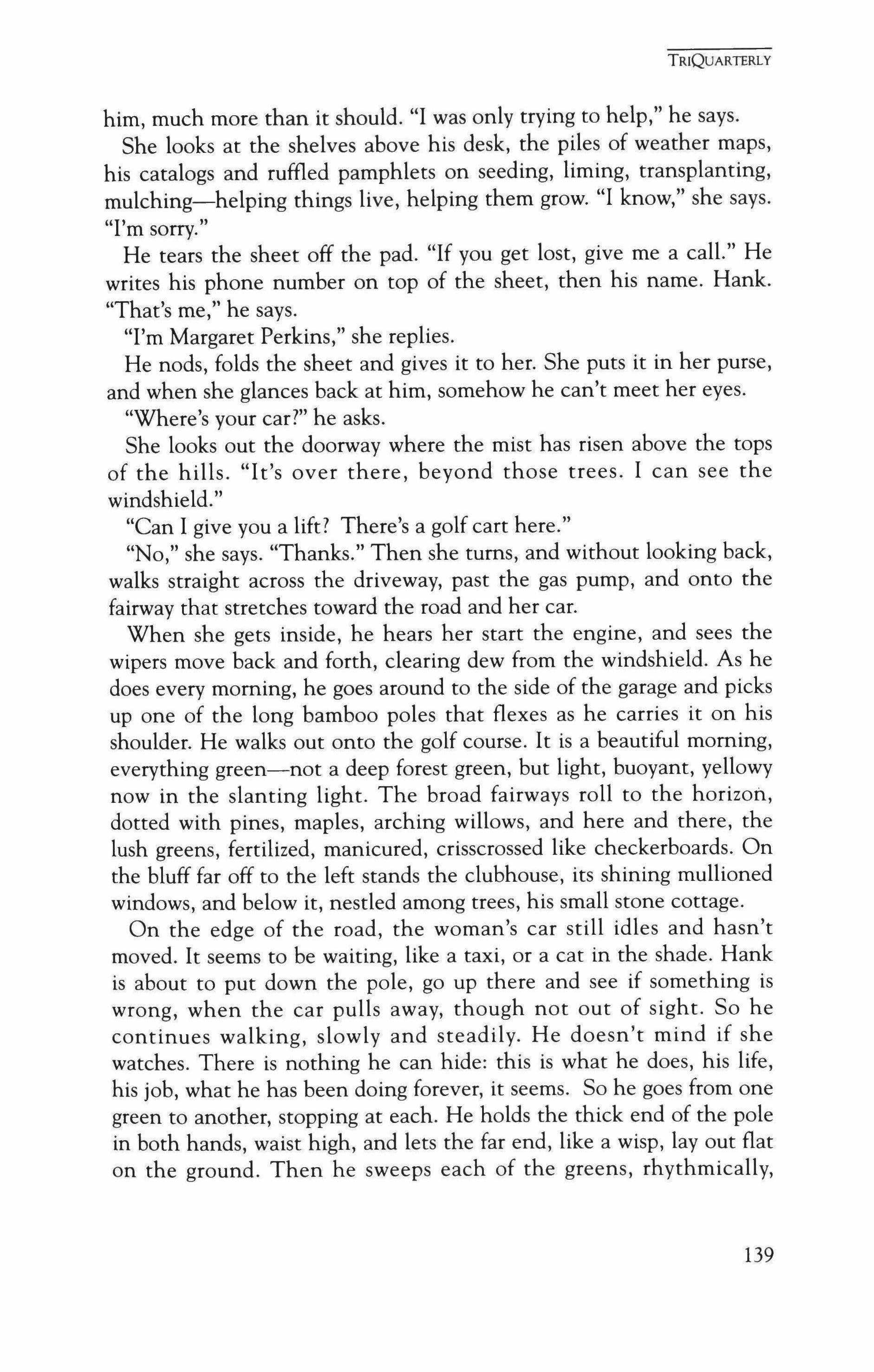
him, much more than it should. "I was only trying to help," he says.
She looks at the shelves above his desk, the piles of weather maps, his catalogs and ruffled pamphlets on seeding, liming, transplanting, mulching-helping things live, helping them grow. "I know," she says. "I'm sorry."
He tears the sheet off the pad. "If you get lost, give me a call." He writes his phone number on top of the sheet, then his name. Hank. "That's me," he says.
"I'm Margaret Perkins," she replies.
He nods, folds the sheet and gives it to her. She puts it in her purse, and when she glances back at him, somehow he can't meet her eyes.
"Where's your car?" he asks.
She looks out the doorway where the mist has risen above the tops of the hills. "It's over there, beyond those trees. I can see the windshield."
"Can I give you a lift? There's a golf cart here."
"No," she says. "Thanks." Then she turns, and without looking back, walks straight across the driveway, past the gas pump, and onto the fairway that stretches toward the road and her car.
When she gets inside, he hears her start the engine, and sees the wipers move back and forth, clearing dew from the windshield. As he does every morning, he goes around to the side of the garage and picks up one of the long bamboo poles that flexes as he carries it on his shoulder. He walks out onto the golf course. It is a beautiful morning, everything green-not a deep forest green, but light, buoyant, yellowy now in the slanting light. The broad fairways roll to the horizon, dotted with pines, maples, arching willows, and here and there, the lush greens, fertilized, manicured, crisscrossed like checkerboards. On the bluff far off to the left stands the clubhouse, its shining mullioned windows, and below it, nestled among trees, his small stone cottage.
On the edge of the road, the woman's car still idles and hasn't moved. It seems to be waiting, like a taxi, or a cat in the shade. Hank is about to put down the pole, go up there and see if something is wrong, when the car pulls away, though not out of sight. So he continues walking, slowly and steadily. He doesn't mind if she watches. There is nothing he can hide: this is what he does, his life, his job, what he has been doing forever, it seems. So he goes from one green to another, stopping at each. He holds the thick end of the pole in both hands, waist high, and lets the far end, like a wisp, layout flat on the ground. Then he sweeps each of the greens, rhythmically,
TRIQUARTERLY
139
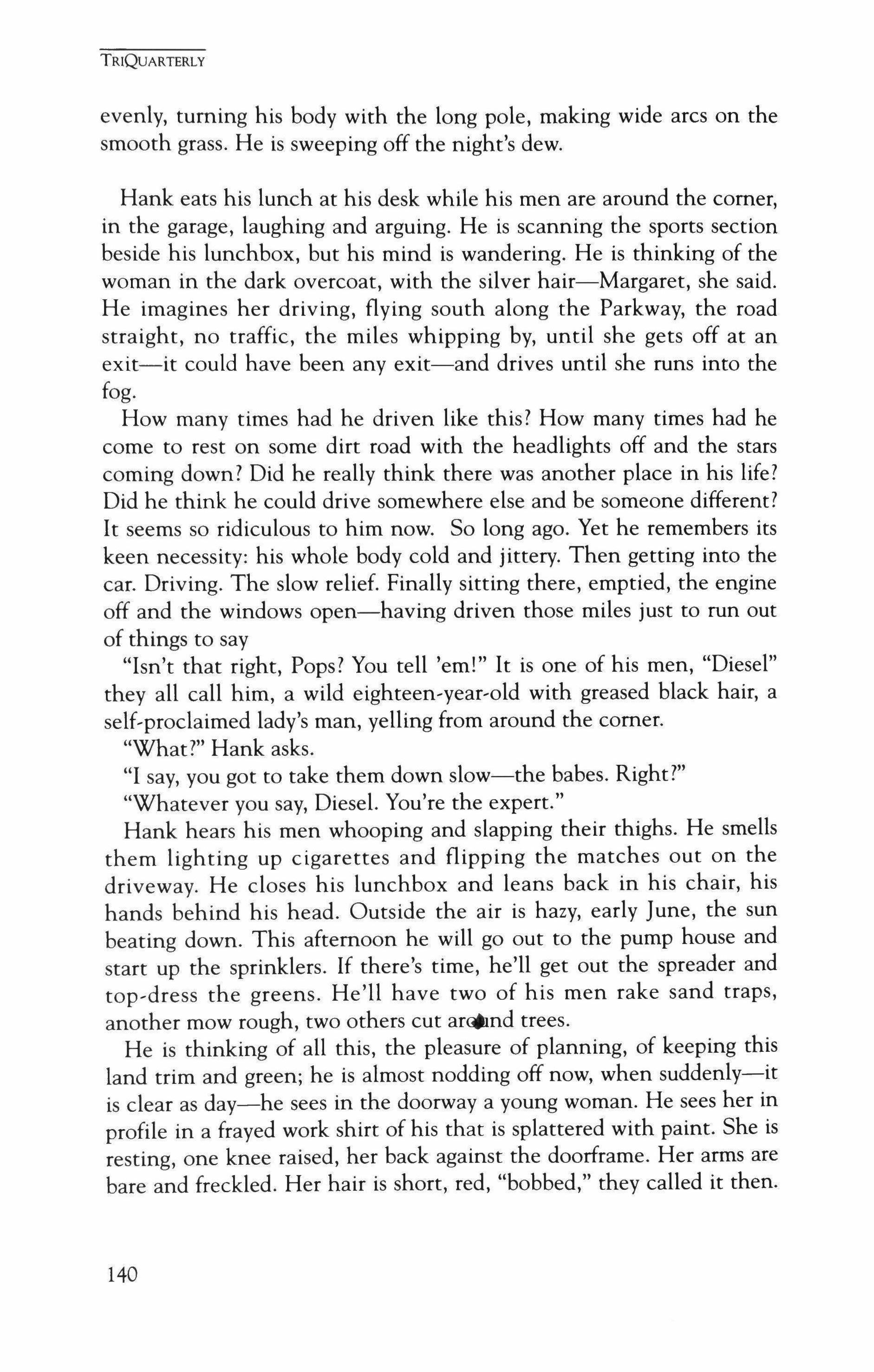
evenly, turning his body with the long pole, making wide arcs on the smooth grass. He is sweeping off the night's dew.
Hank eats his lunch at his desk while his men are around the comer, in the garage, laughing and arguing. He is scanning the sports section beside his lunchbox, but his mind is wandering. He is thinking of the woman in the dark overcoat, with the silver hair-Margaret, she said. He imagines her driving, flying south along the Parkway, the road straight, no traffic, the miles whipping by, until she gets off at an exit-it could have been any exit-and drives until she runs into the fog.
How many times had he driven like this? How many times had he come to rest on some dirt road with the headlights off and the stars coming down? Did he really think there was another place in his life? Did he think he could drive somewhere else and be someone different? It seems so ridiculous to him now. So long ago. Yet he remembers its keen necessity: his whole body cold and jittery. Then getting into the car. Driving. The slow relief. Finally sitting there, emptied, the engine off and the windows open-having driven those miles just to run out of things to say "Isn't that right, Pops? You tell 'em!" It is one of his men, "Diesel" they all call him, a wild eighteen-year-old with greased black hair, a self,proclaimed lady's man, yelling from around the comer.
"What?" Hank asks.
"I say, you got to take them down slow-the babes. Right?"
"Whatever you say, Diesel. You're the expert."
Hank hears his men whooping and slapping their thighs. He smells them lighting up cigarettes and flipping the matches out on the driveway. He closes his lunchbox and leans back in his chair, his hands behind his head. Outside the air is hazy, early June, the sun beating down. This afternoon he will go out to the pump house and start up the sprinklers. If there's time, he'll get out the spreader and top-dress the greens. He'll have two of his men rake sand traps, another mow rough, two others cut ar�nd trees.
He is thinking of all this, the pleasure of planning, of keeping this land trim and green; he is almost nodding off now, when suddenly-it is clear as day-he sees in the doorway a young woman. He sees her in profile in a frayed work shirt of his that is splattered with paint. She is resting, one knee raised, her back against the doorframe. Her arms are bare and freckled. Her hair is short, red, "bobbed," they called it then.
TRIQUARTERLY
140
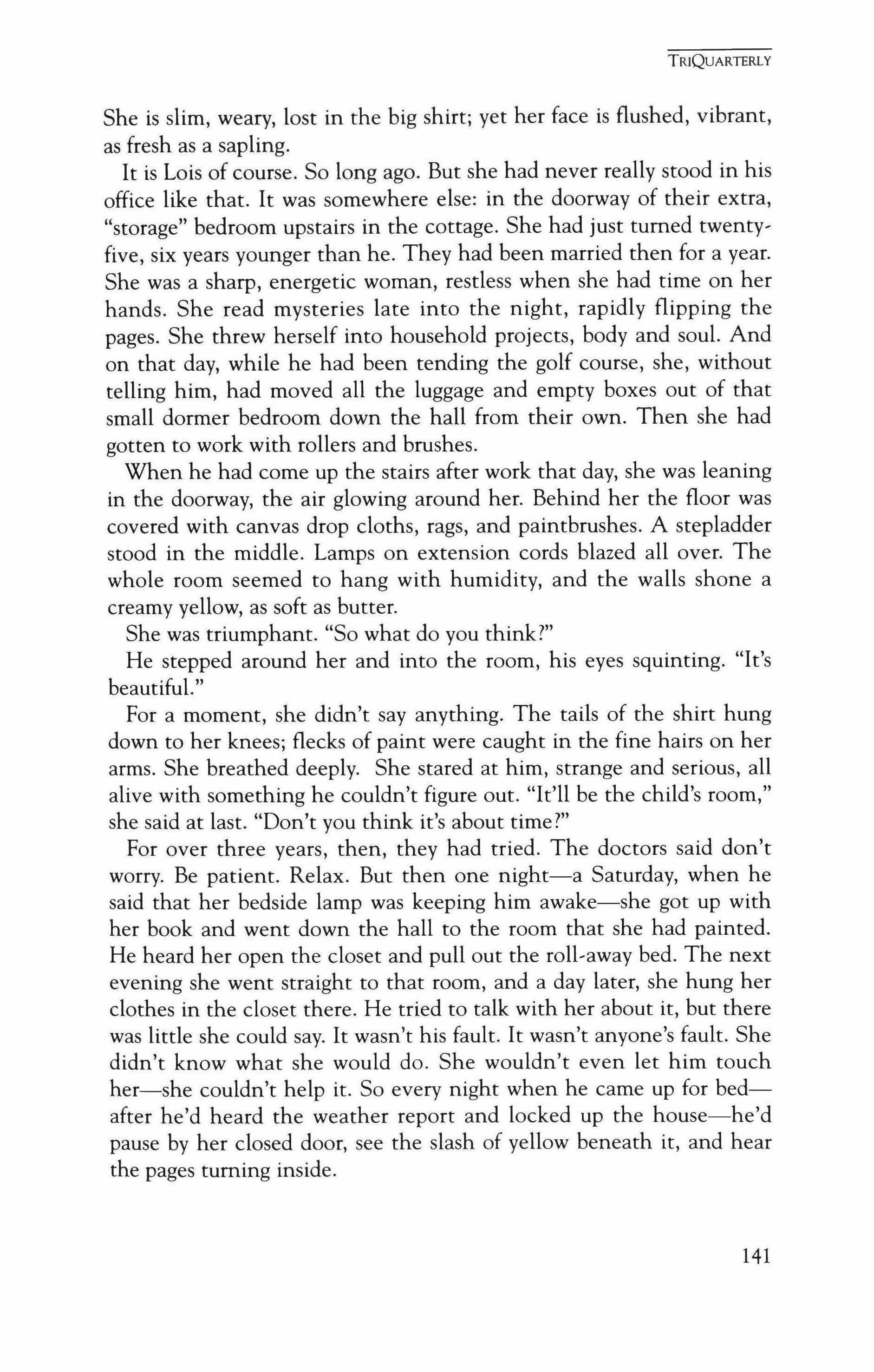
She is slim, weary, lost in the big shirt; yet her face is flushed, vibrant, as fresh as a sapling.
It is Lois of course. So long ago. But she had never really stood in his office like that. It was somewhere else: in the doorway of their extra, "storage" bedroom upstairs in the cottage. She had just turned twenty' five, six years younger than he. They had been married then for a year. She was a sharp, energetic woman, restless when she had time on her hands. She read mysteries late into the night, rapidly flipping the pages. She threw herself into household projects, body and soul. And on that day, while he had been tending the golf course, she, without telling him, had moved all the luggage and empty boxes out of that small dormer bedroom down the hall from their own. Then she had gotten to work with rollers and brushes.
When he had come up the stairs after work that day, she was leaning in the doorway, the air glowing around her. Behind her the floor was covered with canvas drop cloths, rags, and paintbrushes. A stepladder stood in the middle. Lamps on extension cords blazed all over. The whole room seemed to hang with humidity, and the walls shone a creamy yellow, as soft as butter.
She was triumphant. "So what do you think?"
He stepped around her and into the room, his eyes squinting. "It's beautiful."
For a moment, she didn't say anything. The tails of the shirt hung down to her knees; flecks of paint were caught in the fine hairs on her arms. She breathed deeply. She stared at him, strange and serious, all alive with something he couldn't figure out. "It'll be the child's room," she said at last. "Don't you think it's about time?"
For over three years, then, they had tried. The doctors said don't worry. Be patient. Relax. But then one night-a Saturday, when he said that her bedside lamp was keeping him awake-she got up with her book and went down the hall to the room that she had painted. He heard her open the closet and pull out the roll-away bed. The next evening she went straight to that room, and a day later, she hung her clothes in the closet there. He tried to talk with her about it, but there was little she could say. It wasn't his fault. It wasn't anyone's fault. She didn't know what she would do. She wouldn't even let him touch her-she couldn't help it. So every night when he came up for bedafter he'd heard the weather report and locked up the house-he'd pause by her closed door, see the slash of yellow beneath it, and hear the pages turning inside.
TRIQUARTERLY
141
TRIQUARTERLY

Now Hank stands quickly and walks to the small sink in the corner of his office where he washes his face and lets the cool water pour over his wrists. He hasn't thought of all this in a long time, or at least not in such detail: the way she had laid her book, tented, on her lap and put her face in her narrow hands. How he had tried to put his arms around her, but she had tensed, flung off the sheets-and then the sound of her steps almost running down the hall.
Drying his hands with a towel, he goes into the garage. His men are sitting on barrels and cinder blocks, their shiny black combs in their back pockets. They smell of cigarettes, baloney, clean sweat and open air. With the towel, he snaps Wayne and Jeff lightly on the back. "Hop to!" They close their lunchboxes, get up, and he gives them their afternoon assignments. He stands in the wide doorway, hands on hips, as Diesel pulls away in the tractor, a gang of mowers trailing behind. Eddie and Jim take off in a golf cart clattering with rakes and shovels. Then the final two push rotary mowers across the fairways toward a stand of birches beyond the stream. They walk cocky, carefree, never once looking back. Their bare shoulders shine in the sun. Their shirts hang over their belts and sway like tails.
One of the things that Hank most likes is the feel of a summer storm coming on, when the day's work is done, the garage closed up, everything put away, when he has come up to his cottage to find the windows open, curtains billowing, when outside half the sky is clear, while to the west a line of clouds, dark as charcoal, is rolling in, the flags on the greens snapping straight out, leaves spinning, and in the air that smell: cold, galvanic, thunder on the way.
And it is at times like this that he goes up to his bedroom, crawls out the window and onto the roof where the wind is strong but the chimney is solid, where he smells that smell and feels it all coming: first hail, then a wall of rain, gusts, an instant of pure, white violence that seems so near, terrific. But it does not shake his house, nor him.
Hank is sitting out on his slate roof, his back against the chimney, watching the clouds roll in, when he hears the phone ring through his bedroom window. He lets it ring and ring. It stops. Then it starts again, and he climbs back through his window, feet first, sliding carefully over the radiator. He sits in his straight,back chair with his work clothes folded over the top. He picks up the receiver. It is the woman, Margaret, on the line. She says that she is sorry to bother him, but she wants him to know that she had gotten home all right. She is
142
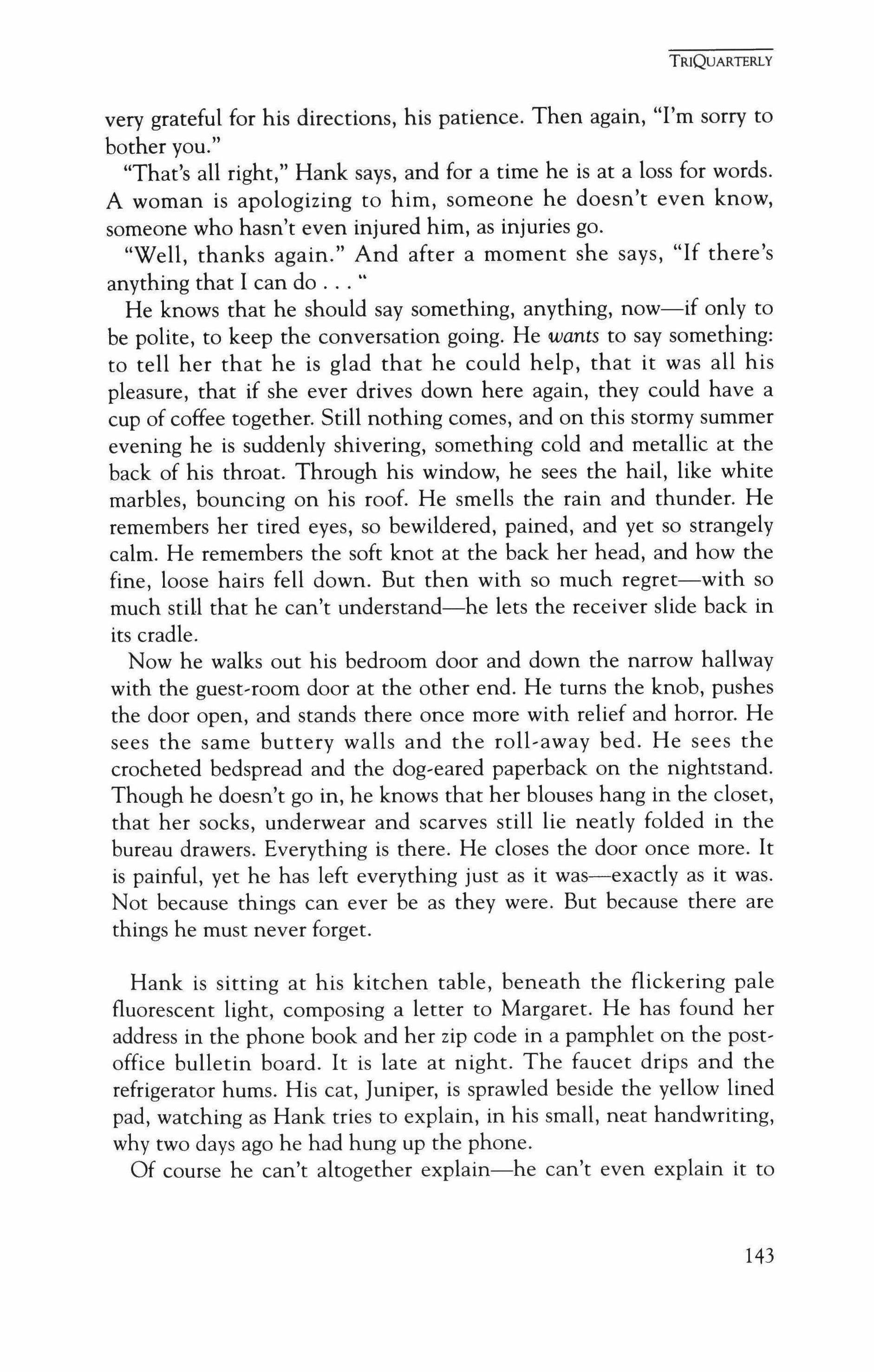
very grateful for his directions, his patience. Then again, "I'm sorry to bother you."
"That's all right," Hank says, and for a time he is at a loss for words. A woman is apologizing to him, someone he doesn't even know, someone who hasn't even injured him, as injuries go.
"Well, thanks again." And after a moment she says, "If there's anything that I can do
He knows that he should say something, anything, now-if only to be polite, to keep the conversation going. He wants to say something: to tell her that he is glad that he could help, that it was all his pleasure, that if she ever drives down here again, they could have a cup of coffee together. Still nothing comes, and on this stormy summer evening he is suddenly shivering, something cold and metallic at the back of his throat. Through his window, he sees the hail, like white marbles, bouncing on his roof. He smells the rain and thunder. He remembers her tired eyes, so bewildered, pained, and yet so strangely calm. He remembers the soft knot at the back her head, and how the fine, loose hairs fell down. But then with so much regret-with so much still that he can't understand-he lets the receiver slide back in its cradle.
Now he walks out his bedroom door and down the narrow hallway with the guest-room door at the other end. He turns the knob, pushes the door open, and stands there once more with relief and horror. He sees the same buttery walls and the roll-away bed. He sees the crocheted bedspread and the dog-eared paperback on the nightstand. Though he doesn't go in, he knows that her blouses hang in the closet, that her socks, underwear and scarves still lie neatly folded in the bureau drawers. Everything is there. He closes the door once more. It is painful, yet he has left everything just as it was-exactly as it was. Not because things can ever be as they were. But because there are things he must never forget.
Hank is sitting at his kitchen table, beneath the flickering pale fluorescent light, composing a letter to Margaret. He has found her address in the phone book and her zip code in a pamphlet on the postoffice bulletin board. It is late at night. The faucet drips and the refrigerator hums. His cat, Juniper, is sprawled beside the yellow lined pad, watching as Hank tries to explain, in his small, neat handwriting, why two days ago he had hung up the phone.
Of course he can't altogether explain-he can't even explain it to
TRIQUARTERLY
143
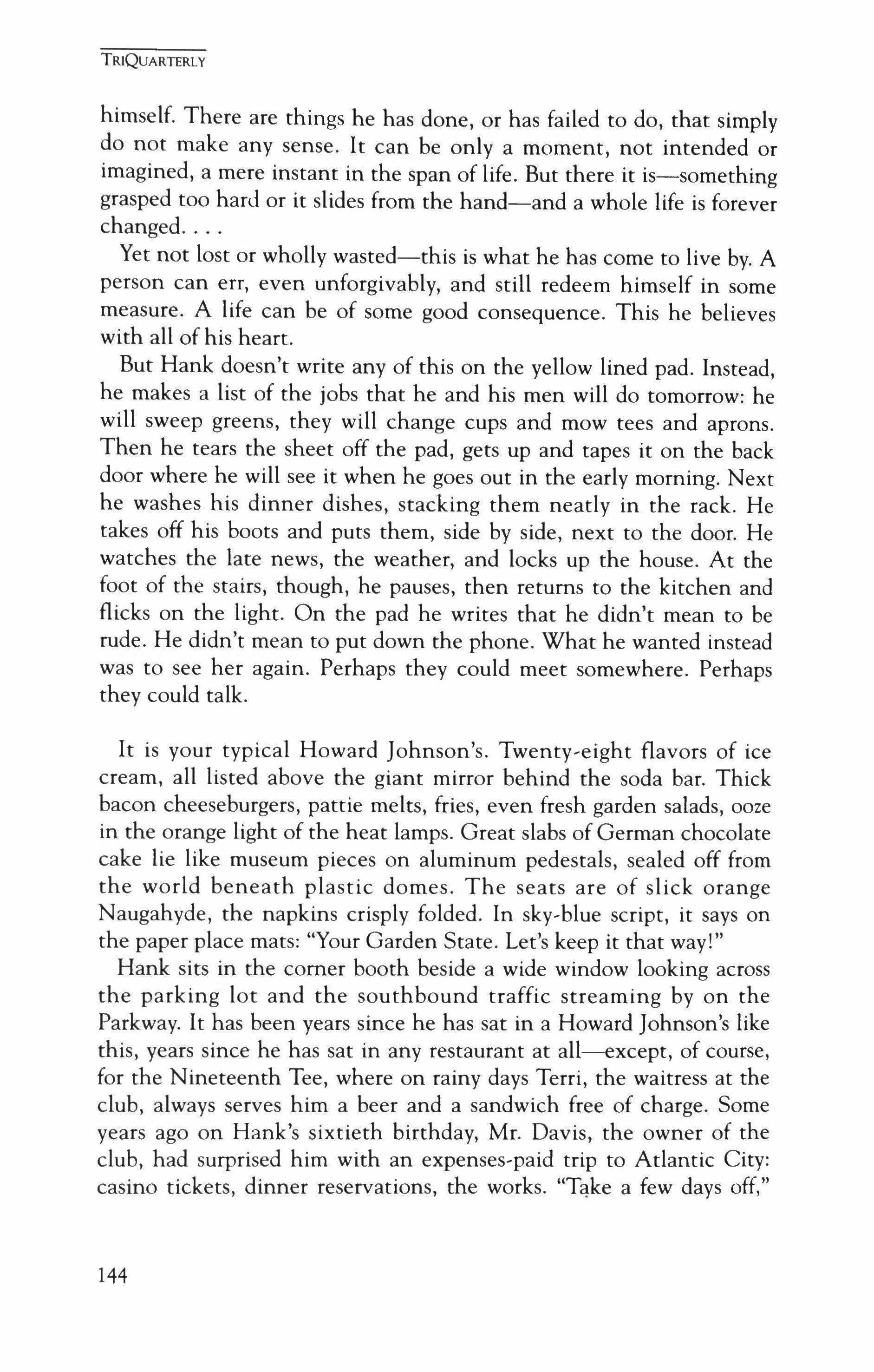
himself. There are things he has done, or has failed to do, that simply do not make any sense. It can be only a moment, not intended or imagined, a mere instant in the span of life. But there it is-something grasped too hard or it slides from the hand-and a whole life is forever changed
Yet not lost or wholly wasted-this is what he has come to live by. A person can err, even unforgivably, and still redeem himself in some measure. A life can be of some good consequence. This he believes with all of his heart.
But Hank doesn't write any of this on the yellow lined pad. Instead, he makes a list of the jobs that he and his men will do tomorrow: he will sweep greens, they will change cups and mow tees and aprons. Then he tears the sheet off the pad, gets up and tapes it on the back door where he will see it when he goes out in the early morning. Next he washes his dinner dishes, stacking them neatly in the rack. He takes off his boots and puts them, side by side, next to the door. He watches the late news, the weather, and locks up the house. At the foot of the stairs, though, he pauses, then returns to the kitchen and flicks on the light. On the pad he writes that he didn't mean to be rude. He didn't mean to put down the phone. What he wanted instead was to see her again. Perhaps they could meet somewhere. Perhaps they could talk.
It is your typical Howard Johnson's. Twenty-eight flavors of ice cream, all listed above the giant mirror behind the soda bar. Thick bacon cheeseburgers, pattie melts, fries, even fresh garden salads, ooze in the orange light of the heat lamps. Great slabs of German chocolate cake lie like museum pieces on aluminum pedestals, sealed off from the world beneath plastic domes. The seats are of slick orange Naugahyde, the napkins crisply folded. In sky-blue script, it says on the paper place mats: "Your Garden State. Let's keep it that way!"
Hank sits in the corner booth beside a wide window looking across the parking lot and the southbound traffic streaming by on the Parkway. It has been years since he has sat in a Howard Johnson's like this, years since he has sat in any restaurant at all--except, of course, for the Nineteenth Tee, where on rainy days Terri, the waitress at the club, always serves him a beer and a sandwich free of charge. Some years ago on Hank's sixtieth birthday, Mr. Davis, the owner of the club, had surprised him with an expenses-paid trip to Atlantic City: casino tickets, dinner reservations, the works. "Take a few days off,"
TRIQUARTERLY
144

Mr. D had said. "Get away for a while. Live it up. You deserve it." So Hank had gone down there on a bus full of rollicking Kiwanis Club members. He had walked on the crowded beach with his shoes in his hands and his slacks rolled over his smooth, white calves. In the mornings he watched the sun rise over the ocean; in the evenings he sat on a bench with carry-out food and the Philadelphia Inquirer. He never went into the casinos or used the dinner reservations. He returned a day earlier than planned, not because he was particularly bored or lonely, but because he had seen all that he wanted to see.
Now the waitress stands before him and asks if he wants to order. He says no, he'll wait; he is expecting "a friend." He says it with no anxiety, with none of that nervousness with which, just an hour before, he had nearly knocked over a lamp, the electric cords tangled, as he ironed his slacks and his white Oxford shirt. Somehow he feels soothed by this wide-hipped waitress, reassured by the pictures of malted milks on the menu, and the voice of Sinatra wafting down from the little round speakers in the ceiling. It is almost as if the world had stopped here at this Howard Johnson's nearly four decades ago. Hank was barely thirty then, not even married. He wore wide-cuffed pants and drove a sleek Buick Dynaflow, his elbow out the window. Now it strikes him as miraculous that any of that world is left, that you can still order a Deluxe Apple Pie a la Mode. That as long as there are clams, you can have them here every Friday night. "Fried to Per, fection." All you can eat.
When Margaret comes in, led by the hostess, Hank stands in his crepe-soled shoes, his sleeves rolled just below his elbows. She waves to him from a distance. She is carrying the same purse, and again she has her hair pulled softly back, those few loose strands hanging down. But as she approaches, she seems altogether different from the woman he had met that day on the misty golf course. Her eyes are bright, darting around the restaurant. She wears a light yellow sweater with stylish shoulder pads, and when she slides into the seat opposite him, a thin, green necklace sways from her neck. She seems so attractive, vivacious-and Hank isn't sure if he likes her this way. She extends her hand and he shakes it. She orders the tossed salad, he orders the pie, and almost immediately she is talking, nonstop, with irrepressible good cheer. From her wallet in her purse, she pulls out a thick plastic packet of photographs: her children and grandchildren, one after another, all smiling, posed, as urgently happy as Margaret is now.
Soon their orders arrive, Hank's pie listing in a thick puddle of ice
TRIQUARTERLY
145

cream. Margaret is describing her oldest son, a pediatrician in Los Angeles-"He was always so good with kids!"-when all at once, in mid-sentence, she stops. She closes her wallet and puts it back in her purse. She gazes off toward the soda bar, her hand lightly touching the base of her neck. In the afternoon light from the window, he sees the dark pouches below her eyes, the spark gone from her face, and something else filling it, something so suddenly old and beautiful.
"What a fool I must be," she says. "Blathering on like this."
"No. Not at all." He looks out the window where the sun is skating on the parking lot, where buses idle and kids are sitting on open tailgates with hotdogs and melting ice-cream cones. Beyond the streaming lanes of the Parkway, a hill of buttercups and ragged grasses curves away as it ascends, where he can't quite see the top.
Margaret fools with the corner of her place mat. Then after a moment she says, "You know, my daughter looks at me sometimes like I've lost my mind. She doesn't see how I can live without him, my husband that is. He died last year." She turns toward Hank and looks right at him. "You don't have any children, do you!"
He shakes his head. And though he knows exactly where this can lead-a few more questions, a pause, and then politely and firmly she'd say she'd better go, she must-still he says, "I had a wife once.
Many years ago."
Now he sees Margaret's face change and her head tilt slightly to the side. In her eyes, he sees a question form, a whole series of questions that he can never answer.
But then Margaret does something simple and extraordinary. It is something he will never forget. She spreads her hands wide on the place mat. Then she takes in her breath and, as she lets it out, she seems to lay all of her questions aside-not forever, but for now. Because it seems more important for them to hold themselves there. To be calm. To do nothing that could lead to regret. To just hold this moment-not altogether comfortable or complete, but pleasant enough, poised for a time, her hands like that, all splayed and gnarled, their knees almost touching beneath the table.
"Coffee!" she says.
And over cups of decaf they talk and watch the dusk come sifting down. On the highway the traffic thickens and slows; a car here and there has its parking lights on. It is a Sunday evening, sultry and hectic, the start of another summer. It is like all of New Jersey is
TRIQUARTERLY
146
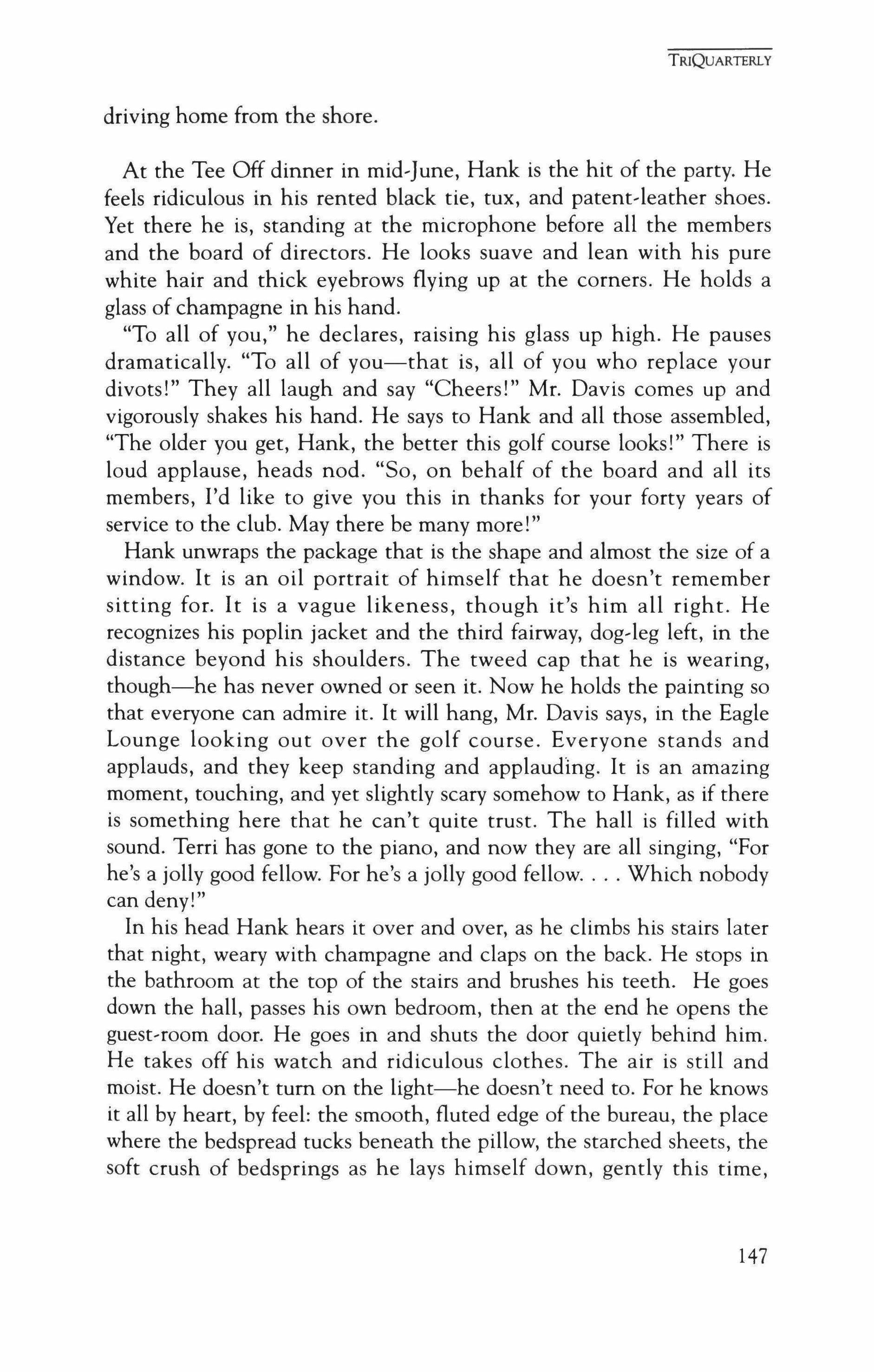
driving horne from the shore.
At the Tee Off dinner in mid-june, Hank is the hit of the party. He feels ridiculous in his rented black tie, tux, and patent-leather shoes. Yet there he is, standing at the microphone before all the members and the board of directors. He looks suave and lean with his pure white hair and thick eyebrows flying up at the corners. He holds a glass of champagne in his hand.
"To all of you," he declares, raising his glass up high. He pauses dramatically. "To all of you-that is, all of you who replace your divots!" They all laugh and say "Cheers!" Mr. Davis comes up and vigorously shakes his hand. He says to Hank and all those assembled, "The older you get, Hank, the better this golf course looks!" There is loud applause, heads nod. "So, on behalf of the board and all its members, I'd like to give you this in thanks for your forty years of service to the club. May there be many more!"
Hank unwraps the package that is the shape and almost the size of a window. It is an oil portrait of himself that he doesn't remember sitting for. It is a vague likeness, though it's him all right. He recognizes his poplin jacket and the third fairway, dog-leg left, in the distance beyond his shoulders. The tweed cap that he is wearing, though-he has never owned or seen it. Now he holds the painting so that everyone can admire it. It will hang, Mr. Davis says, in the Eagle Lounge looking out over the golf course. Everyone stands and applauds, and they keep standing and applauding. It is an amazing moment, touching, and yet slightly scary somehow to Hank, as if there is something here that he can't quite trust. The hall is filled with sound. Terri has gone to the piano, and now they are all singing, "For he's a jolly good fellow. For he's a jolly good fellow Which nobody can deny!"
In his head Hank hears it over and over, as he climbs his stairs later that night, weary with champagne and claps on the back. He stops in the bathroom at the top of the stairs and brushes his teeth. He goes down the hall, passes his own bedroom, then at the end he opens the guest-room door. He goes in and shuts the door quietly behind him. He takes off his watch and ridiculous clothes. The air is still and moist. He doesn't turn on the light-he doesn't need to. For he knows it all by heart, by feel: the smooth, fluted edge of the bureau, the place where the bedspread tucks beneath the pillow, the starched sheets, the soft crush of bedsprings as he lays himself down, gently this time,
TRIQUARTERLY
147
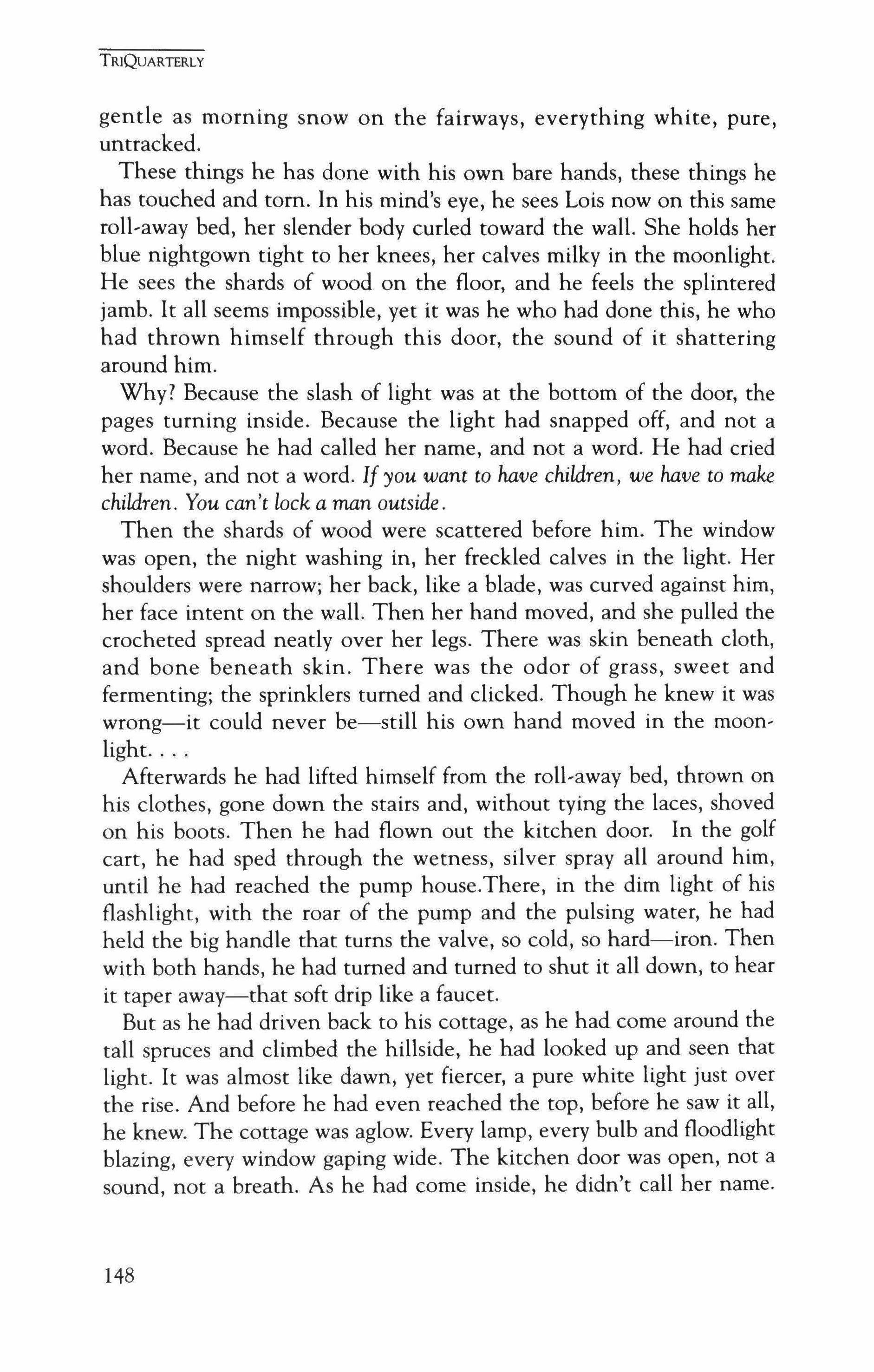
gentle as morning snow on the fairways, everything white, pure, untracked.
These things he has done with his own bare hands, these things he has touched and tom. In his mind's eye, he sees Lois now on this same roll-away bed, her slender body curled toward the wall. She holds her blue nightgown tight to her knees, her calves milky in the moonlight. He sees the shards of wood on the floor, and he feels the splintered jamb. It all seems impossible, yet it was he who had done this, he who had thrown himself through this door, the sound of it shattering around him.
Why? Because the slash of light was at the bottom of the door, the pages turning inside. Because the light had snapped off, and not a word. Because he had called her name, and not a word. He had cried her name, and not a word. If you want to have children, we have to make children. You can't lock a man outside.
Then the shards of wood were scattered before him. The window was open, the night washing in, her freckled calves in the light. Her shoulders were narrow; her back, like a blade, was curved against him, her face intent on the wall. Then her hand moved, and she pulled the crocheted spread neatly over her legs. There was skin beneath cloth, and bone beneath skin. There was the odor of grass, sweet and fermenting; the sprinklers turned and clicked. Though he knew it was wrong-it could never be-still his own hand moved in the moonlight
Afterwards he had lifted himself from the roll-away bed, thrown on his clothes, gone down the stairs and, without tying the laces, shoved on his boots. Then he had flown out the kitchen door. In the golf cart, he had sped through the wetness, silver spray all around him, until he had reached the pump house.There, in the dim light of his flashlight, with the roar of the pump and the pulsing water, he had held the big handle that turns the valve, so cold, so hard-iron. Then with both hands, he had turned and turned to shut it all down, to hear it taper away-that soft drip like a faucet.
But as he had driven back to his cottage, as he had come around the tall spruces and climbed the hillside, he had looked up and seen that light. It was almost like dawn, yet fiercer, a pure white light just over the rise. And before he had even reached the top, before he saw it all, he knew. The cottage was aglow. Every lamp, every bulb and floodlight blazing, every window gaping wide. The kitchen door was open, not a sound, not a breath. As he had come inside, he didn't call her name.
TRIQUARTERLY
148
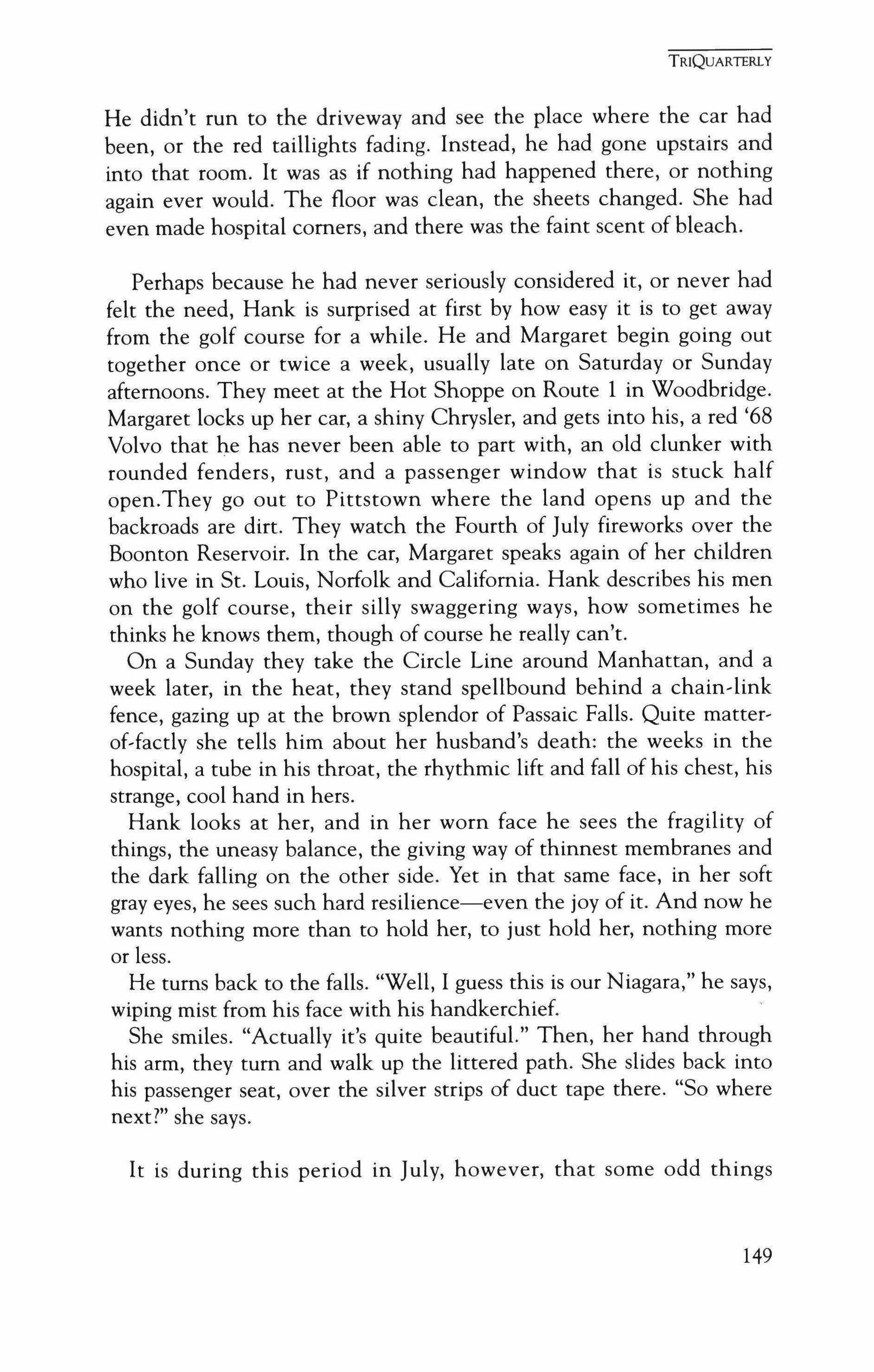
He didn't run to the driveway and see the place where the car had been, or the red taillights fading. Instead, he had gone upstairs and into that room. It was as if nothing had happened there, or nothing again ever would. The floor was clean, the sheets changed. She had even made hospital corners, and there was the faint scent of bleach.
Perhaps because he had never seriously considered it, or never had felt the need, Hank is surprised at first by how easy it is to get away from the golf course for a while. He and Margaret begin going out together once or twice a week, usually late on Saturday or Sunday afternoons. They meet at the Hot Shoppe on Route 1 in Woodbridge. Margaret locks up her car, a shiny Chrysler, and gets into his, a red '68 Volvo that he has never been able to part with, an old clunker with rounded fenders, rust, and a passenger window that is stuck half open.They go out to Pittstown where the land opens up and the backroads are dirt. They watch the Fourth of July fireworks over the Boonton Reservoir. In the car, Margaret speaks again of her children who live in St. Louis, Norfolk and California. Hank describes his men on the golf course, their silly swaggering ways, how sometimes he thinks he knows them, though of course he really can't.
On a Sunday they take the Circle Line around Manhattan, and a week later, in the heat, they stand spellbound behind a chain-link fence, gazing up at the brown splendor of Passaic Falls. Quite matterof-factly she tells him about her husband's death: the weeks in the hospital, a tube in his throat, the rhythmic lift and fall of his chest, his strange, cool hand in hers.
Hank looks at her, and in her worn face he sees the fragility of things, the uneasy balance, the giving way of thinnest membranes and the dark falling on the other side. Yet in that same face, in her soft gray eyes, he sees such hard resilience-even the joy of it. And now he wants nothing more than to hold her, to just hold her, nothing more or less.
He turns back to the falls. "Well, I guess this is our Niagara," he says, wiping mist from his face with his handkerchief.
She smiles. "Actually it's quite beautiful." Then, her hand through his arm, they turn and walk up the littered path. She slides back into his passenger seat, over the silver strips of duct tape there. "So where next!" she says.
It is during this period in July, however, that some odd things
TRIQUARTERLY
149

happen on the golf course-pure coincidences of course, though as they occur, almost one after another, they don't altogether feel that way to Hank. For starters, two of his men get poison ivy while trimming weeds along the woods, and they are out of work for a week. Then when one of them, Wayne, returns, his first job is to replace the battery in the pickup truck. This he does, though he installs it backwards, hooking the hot leads to the negative terminal, frying the entire electrical system, the wires sizzling in a stinking cloud of white smoke. On top of this come five days of solid rain, followed by the annual father-and-son weekend tournament, and Hank is behind in his mowing schedule. So he postpones for a week his next outing with Margaret. Each day he works frantically until nightfall, skipping his dinners, mowing the tees, aprons and greens-e-triple-mowing, first with the grain, then against it, then finally on the diagonal.
By the next Saturday, he has everything mowed and back on schedule. In the late afternoon, he leaves a few sprinklers going where two weeks before he had reseeded a patch of the twelfth fairway-the fragile seedlings, like fine hair, just emerging now from the soil. Then he drives to meet Margaret at the Hot Shoppe in Woodbridge. They have dinner, they stroll through a park and, still warm with the remembrance of her hand in his arm, Hank returns home about ten that night. In his kitchen, he switches on the fluorescent light, goes out the back door, and now, in the golf cart, he is driving through the darkness toward the pump house where he will shut down the watering system.
He takes his usual route over the bridge, around the pond, steering clear of the ball-washer by the sixteenth tee. Approaching the twelfth fairway, he hears the familiar clicking of the sprinklers, though there is something strange in their sound, something softened and slowed; and beyond their sound is yet a stranger sound: a deep whoosing, almost a crashing, like the sound that a waterfall could make.
Along the edge of the fairway then, he sees the four sprinklers, but they are turning slowly, barely clicking, so limp and pitiful in the starlight. The water pressure is low, something has happened, something has clogged or blown. Accelerating, he peers toward the deepening sound, and soon in the darkness he can make it out: a huge silvery column of water, a geyser, straight up, flowering at the top, as tall and wide as an oak.
In a second he knows it, and then he is there. The main pipe has burst and blown a ten-foot crater in the twelfth green. While he has
TRIQUARTERLY
150
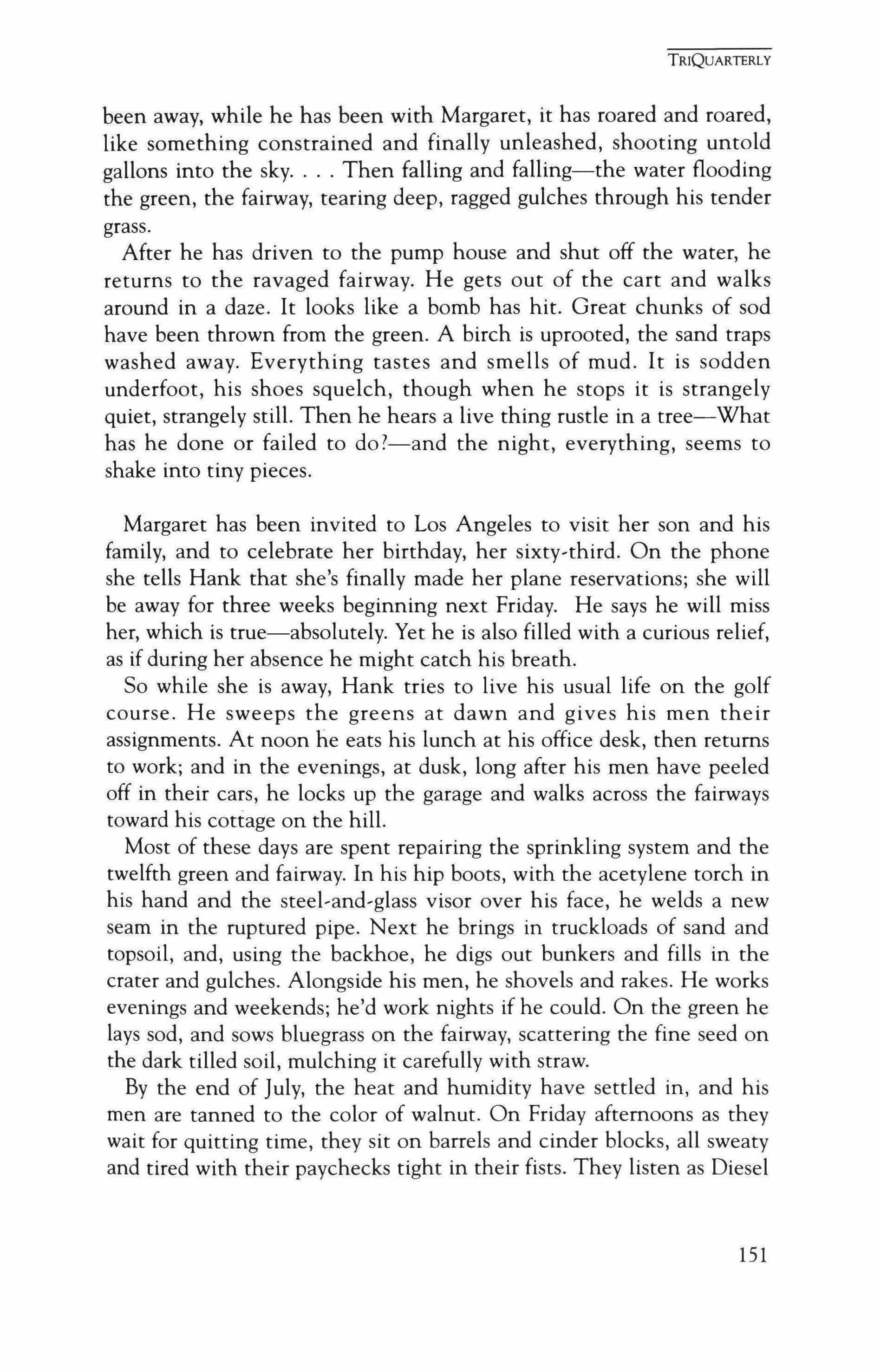
been away, while he has been with Margaret, it has roared and roared, like something constrained and finally unleashed, shooting untold gallons into the sky Then falling and falling-the water flooding the green, the fairway, tearing deep, ragged gulches through his tender grass.
After he has driven to the pump house and shut off the water, he returns to the ravaged fairway. He gets out of the cart and walks around in a daze. It looks like a bomb has hit. Great chunks of sad have been thrown from the green. A birch is uprooted, the sand traps washed away. Everything tastes and smells of mud. It is sodden underfoot, his shoes squelch, though when he stops it is strangely quiet, strangely still. Then he hears a live thing rustle in a tree-What has he done or failed to do?-and the night, everything, seems to shake into tiny pieces.
Margaret has been invited to Los Angeles to visit her son and his family, and to celebrate her birthday, her sixty-third. On the phone she tells Hank that she's finally made her plane reservations; she will be away for three weeks beginning next Friday. He says he will miss her, which is true-absolutely. Yet he is also filled with a curious relief, as if during her absence he might catch his breath.
So while she is away, Hank tries to live his usual life on the golf course. He sweeps the greens at dawn and gives his men their assignments. At noon he eats his lunch at his office desk, then returns to work; and in the evenings, at dusk, long after his men have peeled off in their cars, he locks up the garage and walks across the fairways toward his cottage on the hill.
Most of these days are spent repairing the sprinkling system and the twelfth green and fairway. In his hip boots, with the acetylene torch in his hand and the steel-and-glass visor over his face, he welds a new seam in the ruptured pipe. Next he brings in truckloads of sand and topsoil, and, using the backhoe, he digs out bunkers and fills in the crater and gulches. Alongside his men, he shovels and rakes. He works evenings and weekends; he'd work nights if he could. On the green he lays sad, and sows bluegrass on the fairway, scattering the fine seed on the dark tilled soil, mulching it carefully with straw.
By the end of July, the heat and humidity have settled in, and his men are tanned to the color of walnut. On Friday afternoons as they wait for quitting time, they sit on barrels and cinder blocks, all sweaty and tired with their paychecks tight in their fists. They listen as Diesel
TRIQUARTERLY
151
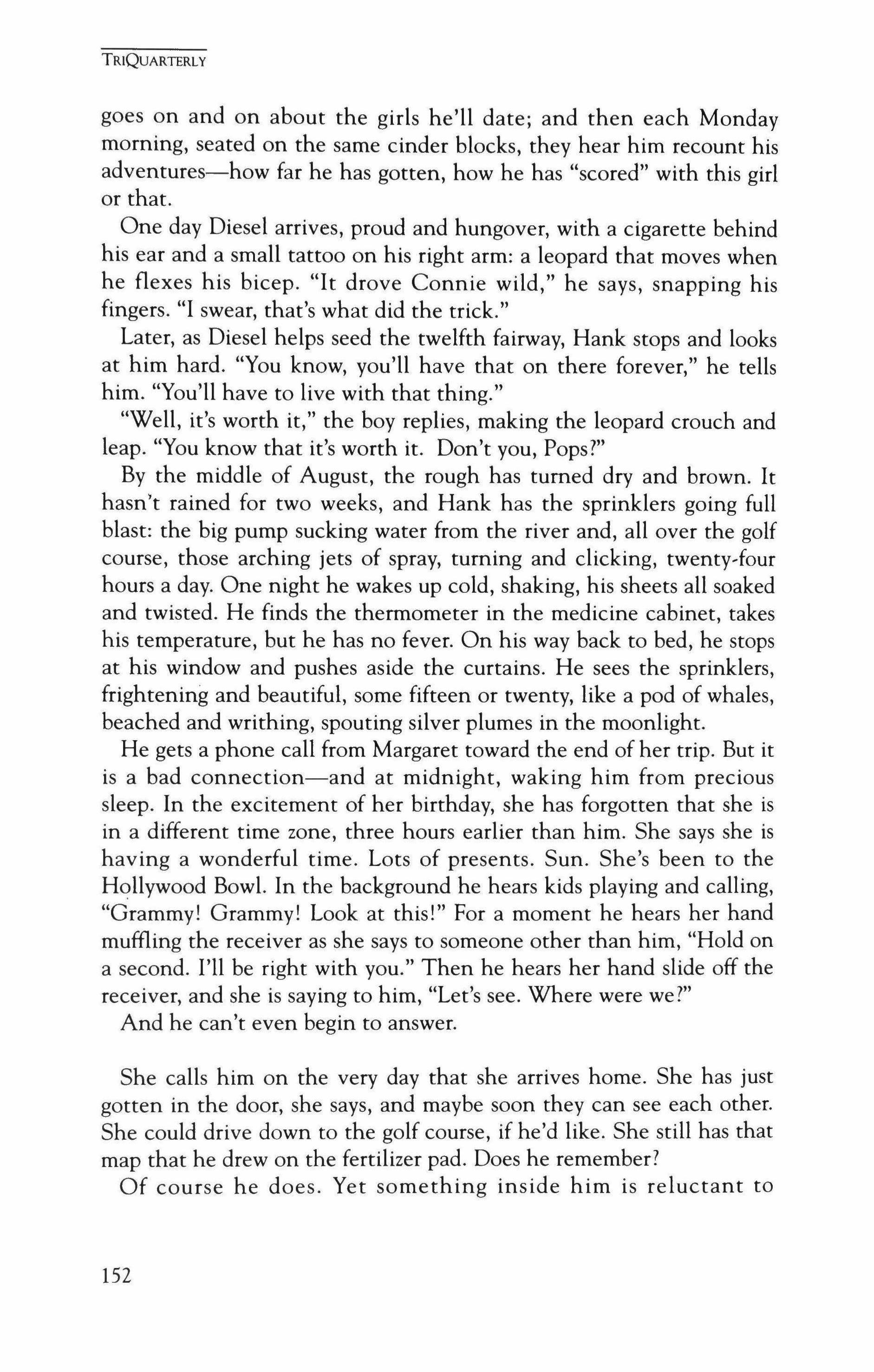
goes on and on about the girls he'll date; and then each Monday morning, seated on the same cinder blocks, they hear him recount his adventures-how far he has gotten, how he has "scored" with this girl or that.
One day Diesel arrives, proud and hungover, with a cigarette behind his ear and a small tattoo on his right arm: a leopard that moves when he flexes his bicep. "It drove Connie wild," he says, snapping his fingers. "I swear, that's what did the trick."
Later, as Diesel helps seed the twelfth fairway, Hank stops and looks at him hard. "You know, you'll have that on there forever," he tells him. "You'll have to live with that thing."
"Well, it's worth it," the boy replies, making the leopard crouch and leap. "You know that it's worth it. Don't you, Pops?"
By the middle of August, the rough has turned dry and brown. It hasn't rained for two weeks, and Hank has the sprinklers going full blast: the big pump sucking water from the river and, all over the golf course, those arching jets of spray, turning and clicking, twenty,four hours a day. One night he wakes up cold, shaking, his sheets all soaked and twisted. He finds the thermometer in the medicine cabinet, takes his temperature, but he has no fever. On his way back to bed, he stops at his window and pushes aside the curtains. He sees the sprinklers, frightening and beautiful, some fifteen or twenty, like a pod of whales, beached and writhing, spouting silver plumes in the moonlight.
He gets a phone call from Margaret toward the end of her trip. But it is a bad connection-and at midnight, waking him from precious sleep. In the excitement of her birthday, she has forgotten that she is in a different time zone, three hours earlier than him. She says she is having a wonderful time. Lots of presents. Sun. She's been to the Hollywood Bowl. In the background he hears kids playing and calling, "Grammy! Grammy! Look at this!" For a moment he hears her hand muffling the receiver as she says to someone other than him, "Hold on a second. I'll be right with you." Then he hears her hand slide off the receiver, and she is saying to him, "Let's see. Where were we?"
And he can't even begin to answer.
She calls him on the very day that she arrives horne. She has just gotten in the door, she says, and maybe soon they can see each other. She could drive down to the golf course, if he'd like. She still has that map that he drew on the fertilizer pad. Does he remember?
Of course he does. Yet something inside him is reluctant to
TRIQUARTERLY
152
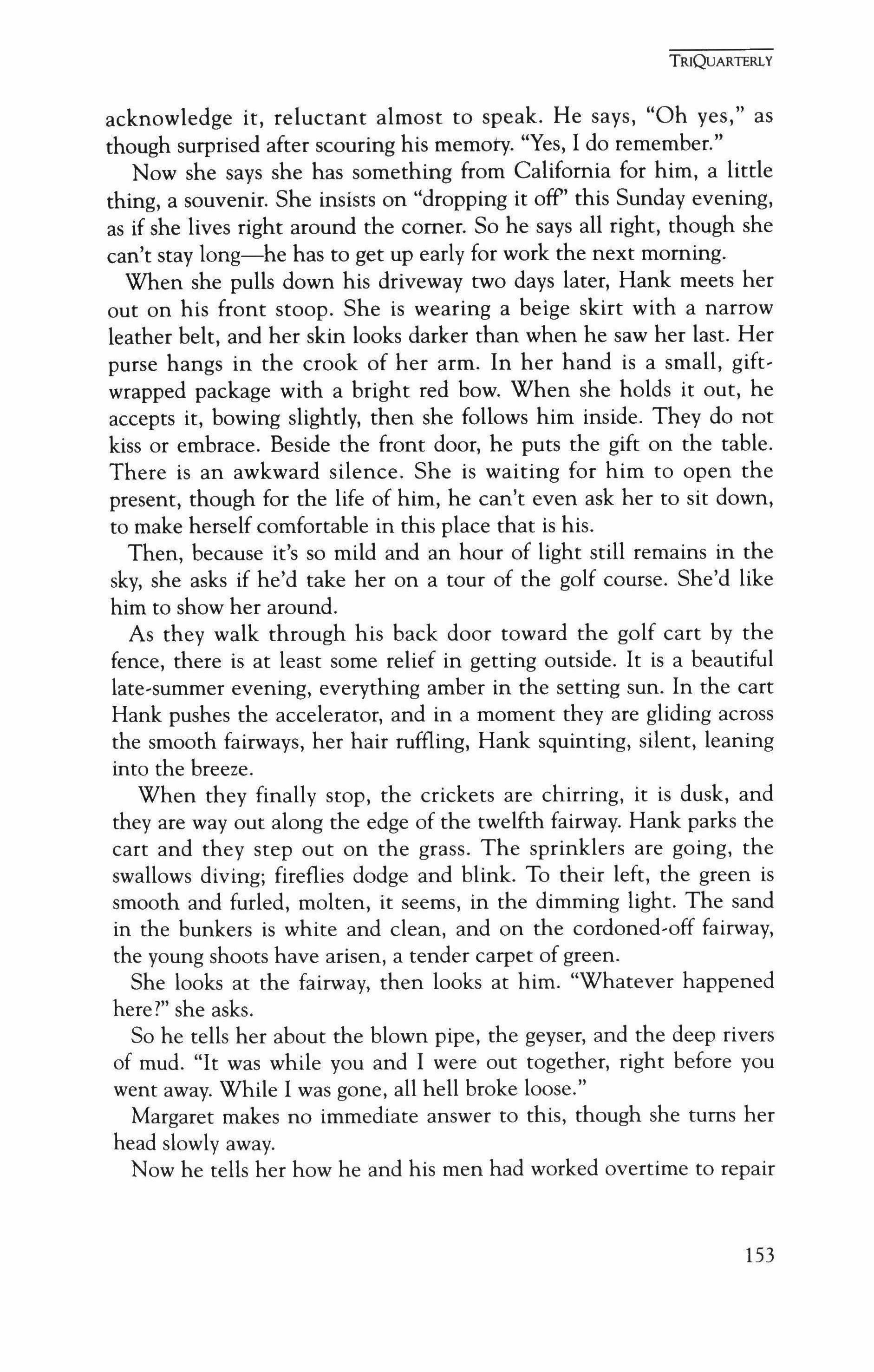
acknowledge it, reluctant almost to speak. He says, "Oh yes," as though surprised after scouring his memoty. "Yes, I do remember."
Now she says she has something from California for him, a little thing, a souvenir. She insists on "dropping it off" this Sunday evening, as if she lives right around the comer. So he says all right, though she can't stay long-he has to get up early for work the next morning.
When she pulls down his driveway two days later, Hank meets her out on his front stoop. She is wearing a beige skirt with a narrow leather belt, and her skin looks darker than when he saw her last. Her purse hangs in the crook of her arm. In her hand is a small, giftwrapped package with a bright red bow. When she holds it out, he accepts it, bowing slightly, then she follows him inside. They do not kiss or embrace. Beside the front door, he puts the gift on the table. There is an awkward silence. She is waiting for him to open the present, though for the life of him, he can't even ask her to sit down, to make herself comfortable in this place that is his.
Then, because it's so mild and an hour of light still remains in the sky, she asks if he'd take her on a tour of the golf course. She'd like him to show her around.
As they walk through his back door toward the golf cart by the fence, there is at least some relief in getting outside. It is a beautiful late-summer evening, everything amber in the setting sun. In the cart Hank pushes the accelerator, and in a moment they are gliding across the smooth fairways, her hair ruffling, Hank squinting, silent, leaning into the breeze.
When they finally stop, the crickets are chirring, it is dusk, and they are way out along the edge of the twelfth fairway. Hank parks the cart and they step out on the grass. The sprinklers are going, the swallows diving; fireflies dodge and blink. To their left, the green is smooth and furled, molten, it seems, in the dimming light. The sand in the bunkers is white and clean, and on the cordoned-off fairway, the young shoots have arisen, a tender carpet of green.
She looks at the fairway, then looks at him. "Whatever happened here!" she asks.
So he tells her about the blown pipe, the geyser, and the deep rivers of mud. "It was while you and I were out together, right before you went away. While I was gone, all hell broke loose."
Margaret makes no immediate answer to this, though she turns her head slowly away.
Now he tells her how he and his men had worked overtime to repair
TRIQUARTERLY
153
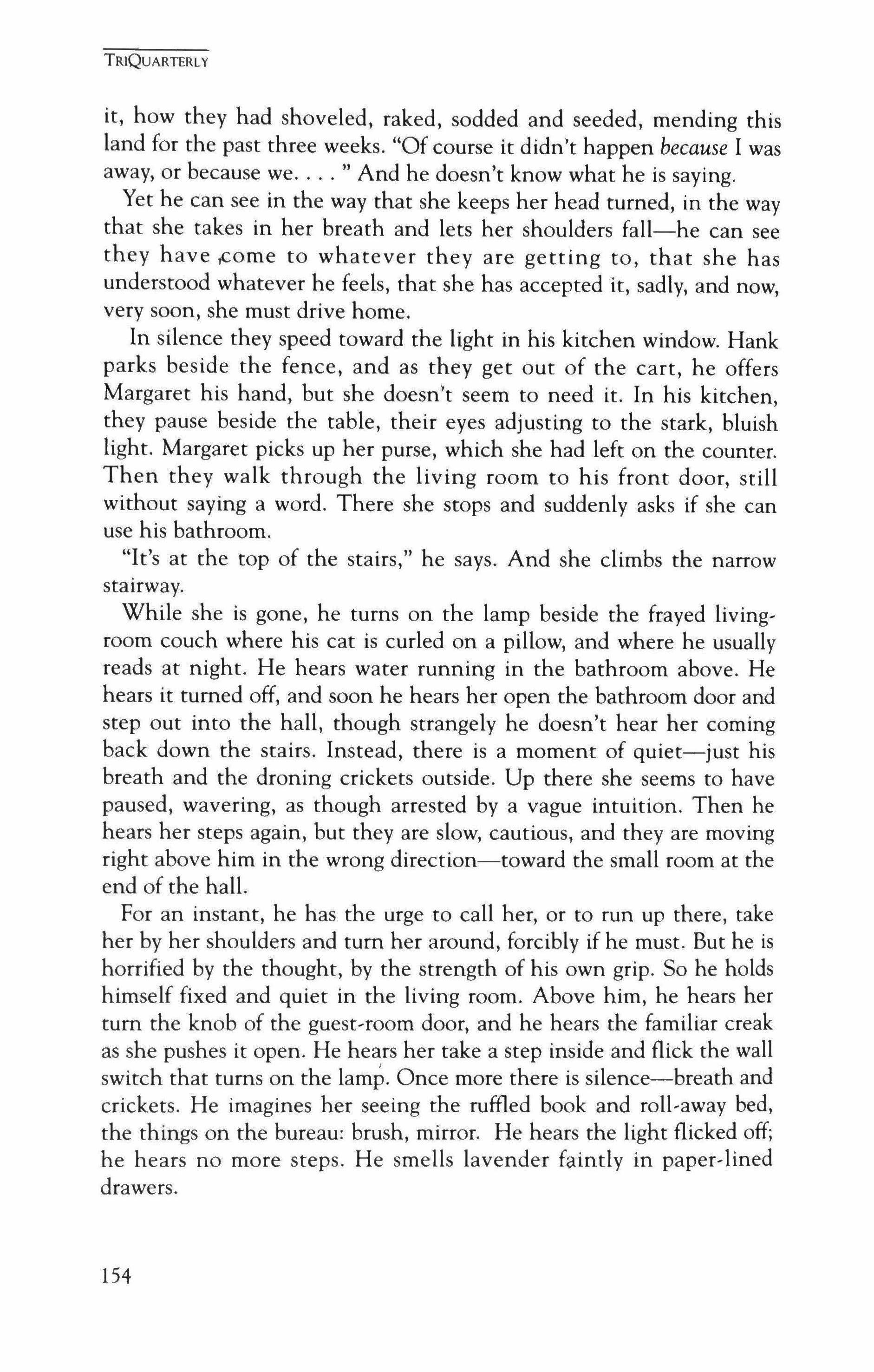
it, how they had shoveled, raked, sodded and seeded, mending this land for the past three weeks. "Of course it didn't happen because I was away, or because we And he doesn't know what he is saying.
Yet he can see in the way that she keeps her head turned, in the way that she takes in her breath and lets her shoulders fall-he can see they have ,come to whatever they are getting to, that she has understood whatever he feels, that she has accepted it, sadly, and now, very soon, she must drive home.
In silence they speed toward the light in his kitchen window. Hank parks beside the fence, and as they get out of the cart, he offers Margaret his hand, but she doesn't seem to need it. In his kitchen, they pause beside the table, their eyes adjusting to the stark, bluish light. Margaret picks up her purse, which she had left on the counter. Then they walk through the living room to his front door, still without saying a word. There she stops and suddenly asks if she can use his bathroom.
"It's at the top of the stairs," he says. And she climbs the narrow stairway.
While she is gone, he turns on the lamp beside the frayed livingroom couch where his cat is curled on a pillow, and where he usually reads at night. He hears water running in the bathroom above. He hears it turned off, and soon he hears her open the bathroom door and step out into the hall, though strangely he doesn't hear her coming back down the stairs. Instead, there is a moment of quiet-just his breath and the droning crickets outside. Up there she seems to have paused, wavering, as though arrested by a vague intuition. Then he hears her steps again, but they are slow, cautious, and they are moving right above him in the wrong direction-toward the small room at the end of the hall.
For an instant, he has the urge to call her, or to run up there, take her by her shoulders and turn her around, forcibly if he must. But he is horrified by the thought, by the strength of his own grip. So he holds himself fixed and quiet in the living room. Above him, he hears her turn the knob of the guest-room door, and he hears the familiar creak as she pushes it open. He hears her take a step inside and flick the wall switch that turns on the lamp. Once more there is silence-breath and crickets. He imagines her seeing the ruffled book and roll-away bed, the things on the bureau: brush, mirror. He hears the light flicked off; he hears no more steps. He smells lavender faintly in paper-lined drawers.
TRIQUARTERLY
154
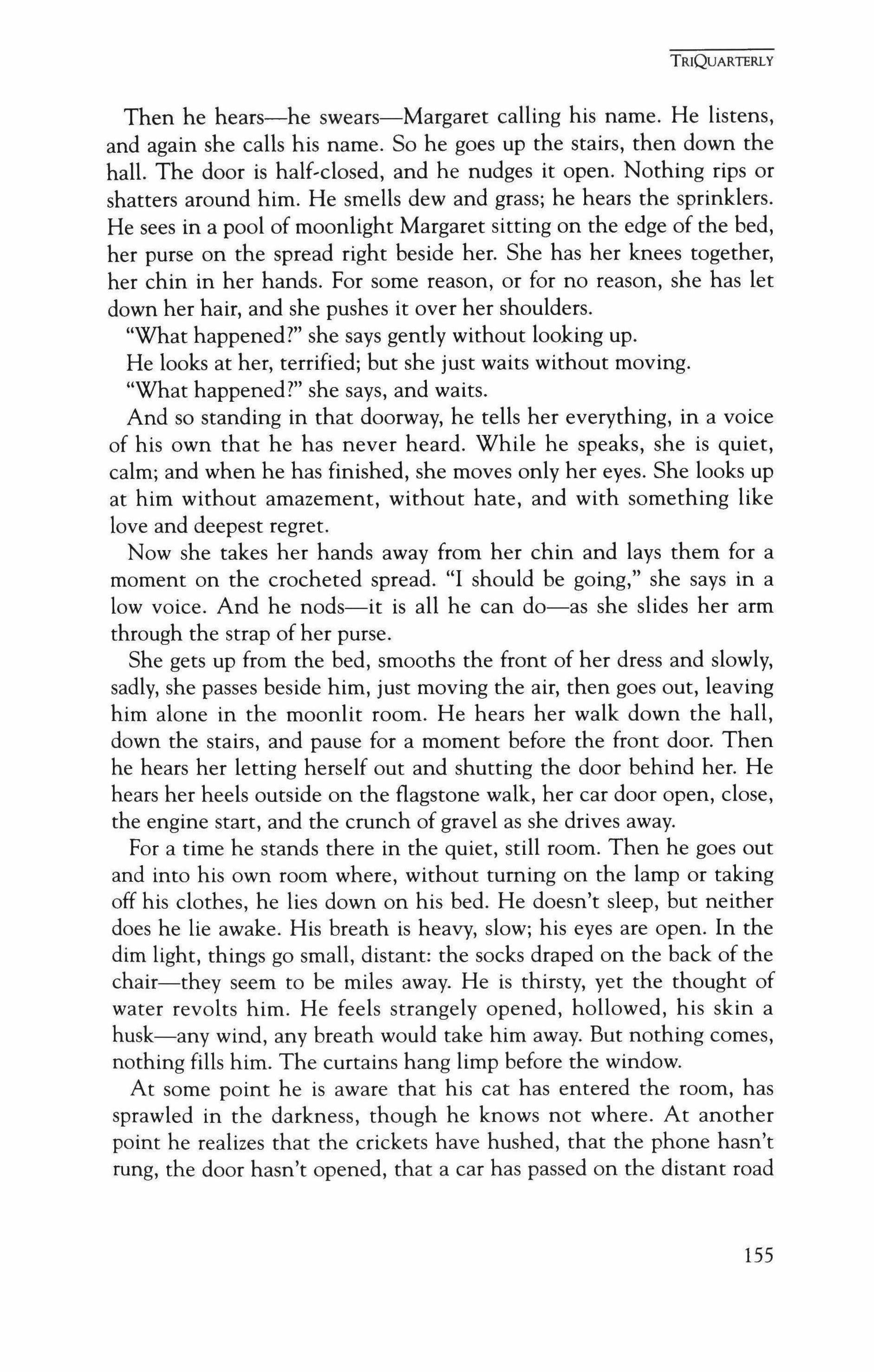
Then he hears-he swears-Margaret calling his name. He listens, and again she calls his name. So he goes up the stairs, then down the hall. The door is half-closed, and he nudges it open. Nothing rips or shatters around him. He smells dew and grass; he hears the sprinklers. He sees in a pool of moonlight Margaret sitting on the edge of the bed, her purse on the spread right beside her. She has her knees together, her chin in her hands. For some reason, or for no reason, she has let down her hair, and she pushes it over her shoulders.
"What happened?" she says gently without looking up.
He looks at her, terrified; but she just waits without moving.
"What happened?" she says, and waits.
And so standing in that doorway, he tells her everything, in a voice of his own that he has never heard. While he speaks, she is quiet, calm; and when he has finished, she moves only her eyes. She looks up at him without amazement, without hate, and with something like love and deepest regret.
Now she takes her hands away from her chin and lays them for a moment on the crocheted spread. "I should be going," she says in a low voice. And he nods-it is all he can do-as she slides her arm through the strap of her purse.
She gets up from the bed, smooths the front of her dress and slowly, sadly, she passes beside him, just moving the air, then goes out, leaving him alone in the moonlit room. He hears her walk down the hall, down the stairs, and pause for a moment before the front door. Then he hears her letting herself out and shutting the door behind her. He hears her heels outside on the flagstone walk, her car door open, close, the engine start, and the crunch of gravel as she drives away.
For a time he stands there in the quiet, still room. Then he goes out and into his own room where, without turning on the lamp or taking off his clothes, he lies down on his bed. He doesn't sleep, but neither does he lie awake. His breath is heavy, slow; his eyes are open. In the dim light, things go small, distant: the socks draped on the back of the chair-they seem to be miles away. He is thirsty, yet the thought of water revolts him. He feels strangely opened, hollowed, his skin a husk-any wind, any breath would take him away. But nothing comes, nothing fills him. The curtains hang limp before the window.
At some point he is aware that his cat has entered the room, has sprawled in the darkness, though he knows not where. At another point he realizes that the crickets have hushed, that the phone hasn't rung, the door hasn't opened, that a car has passed on the distant road
TRIQUARTERLY
155
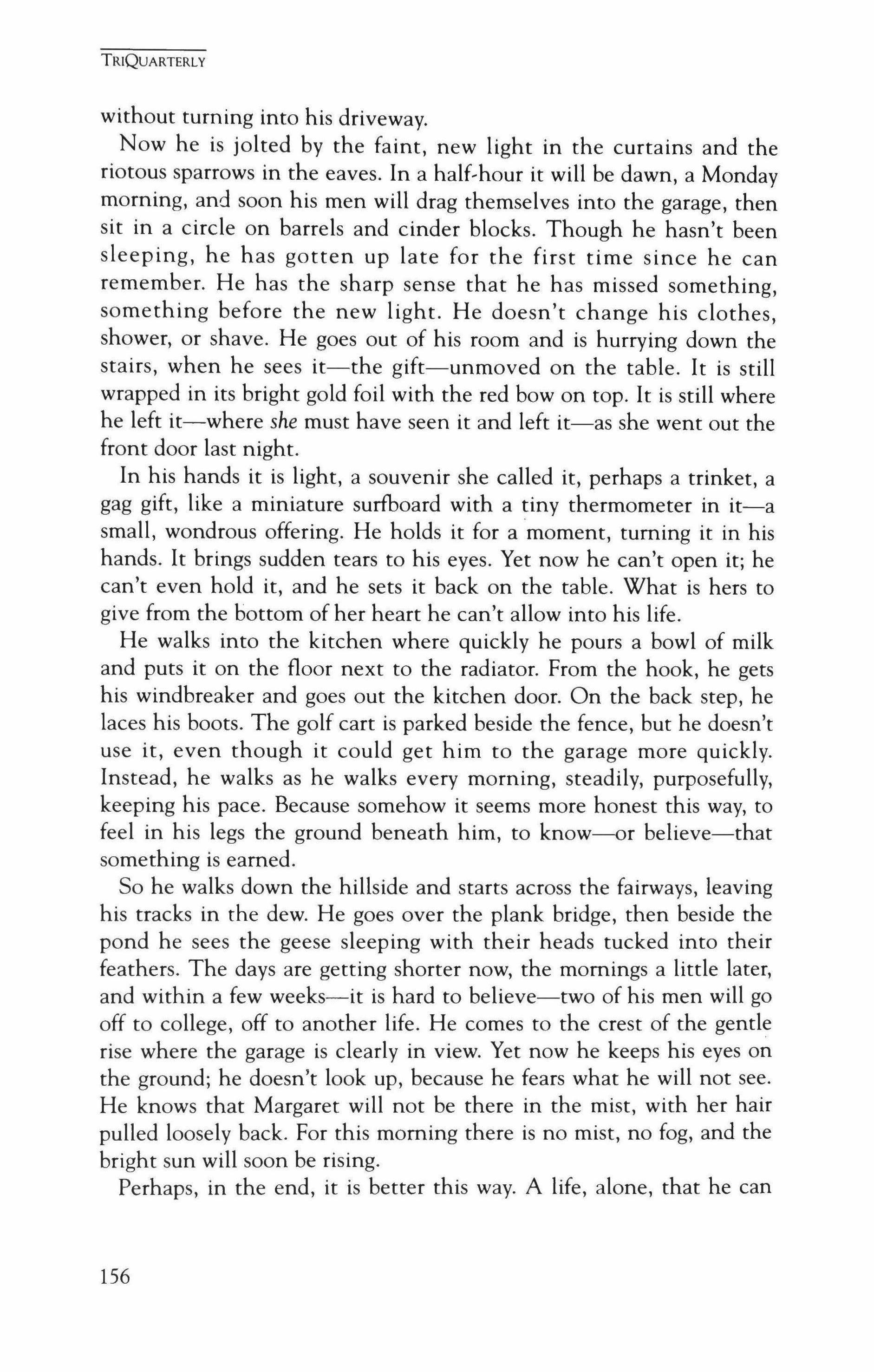
without turning into his driveway.
Now he is jolted by the faint, new light in the curtains and the riotous sparrows in the eaves. In a half-hour it will be dawn, a Monday morning, and soon his men will drag themselves into the garage, then sit in a circle on barrels and cinder blocks. Though he hasn't been sleeping, he has gotten up late for the first time since he can remember. He has the sharp sense that he has missed something, something before the new light. He doesn't change his clothes, shower, or shave. He goes out of his room and is hurrying down the stairs, when he sees it-the gift-unmoved on the table. It is still wrapped in its bright gold foil with the red bow on top. It is still where he left it-where she must have seen it and left it-as she went out the front door last night.
In his hands it is light, a souvenir she called it, perhaps a trinket, a gag gift, like a miniature surfboard with a tiny thermometer in it-a small, wondrous offering. He holds it for a moment, turning it in his hands. It brings sudden tears to his eyes. Yet now he can't open it; he can't even hold it, and he sets it back on the table. What is hers to give from the bottom of her heart he can't allow into his life.
He walks into the kitchen where quickly he pours a bowl of milk and puts it on the floor next to the radiator. From the hook, he gets his windbreaker and goes out the kitchen door. On the back step, he laces his boots. The golf cart is parked beside the fence, but he doesn't use it, even though it could get him to the garage more quickly. Instead, he walks as he walks every morning, steadily, purposefully, keeping his pace. Because somehow it seems more honest this way, to feel in his legs the ground beneath him, to know-or believe-that something is earned.
So he walks down the hillside and starts across the fairways, leaving his tracks in the dew. He goes over the plank bridge, then beside the pond he sees the geese sleeping with their heads tucked into their feathers. The days are getting shorter now, the mornings a little later, and within a few weeks-it is hard to believe-two of his men will go off to college, off to another life. He comes to the crest of the gentle rise where the garage is clearly in view. Yet now he keeps his eyes on the ground; he doesn't look up, because he fears what he will not see. He knows that Margaret will not be there in the mist, with her hair pulled loosely back. For this morning there is no mist, no fog, and the bright sun will soon be rising.
Perhaps, in the end, it is better this way. A life, alone, that he can
TRIQUARTERLY
156

hold in his hands. No secrets, surprises, or false impressions. What would Margaret think if she saw him like this? His hair disheveled. A gray, stubbly beard. And this same shirt that he wore last night: now wrinkled, damp with the cold sweat of an old man.
As he reaches the gravel driveway, he hears as from a dream a high, pitched wailing, a keening sound without any words, like the sound that a woman could make. It might be the geese, but they sleep by the pond. It could be the wind, but the breeze is soft. So he looks up, and what he sees is a slouched shape against his office door. It is one of his men. Diesel. He is seated beneath the brass doorknob, his head bowed between his knees. He seems like a lost child or someone who might be praying, so Hank approaches him slowly. The boy's dark muscled arms rest on his knees. He wears his usual jeans, boots, a pack of Camels in his 'Tshirt pocket. His shoulders are thick and wide. The leopard is crouching, black and bold, though the boy's whole body quakes. He is wailing into his big, brown hands, tears catching in the coarse hairs on his arms, then falling in splatters on the ground.
When at last the boy looks up, there is all of the shame there can be in a man. Something has gone wrong-everything wrong-and there are no words to say. The boy returns his face to the bowl of his hands, and Hank sits in the doorway beside him. He doesn't touch him, but he is there. He doesn't speak, but he is there. He sees the light splashed on the hills and soon in the tops of the oaks. He sees a car pass far away on the road. Then he stands and unlocks his office door, though neither he nor the boy goes in. Along the side of the garage Hank gets a bamboo pole and walks out toward the filmy greens. The morning is crisp and washed, pure and pitiless. With his shoulders swaying, he sweeps the first green, and on his way to the next, he stops. Before he turns around, he can actually feel it; before he sees, he knows. The boy has gone and gotten another pole which bends as he carries it on his shoulder. His wailing has stopped, but his eyes are red. He is following at a distance in the damp, lush grass.
TRIQUARTERLY
157
On Building a Violin
Arthur H. Kuriloff

II watch the silver flakes of maple curl from under my scraper. How curious, I think-I am demonstrating the time-binding capacity of the human animal. I am practicing the craft of Stradivari as he did in his Cremona workshop-and as Guarneri del Gesu is reputed to have done in a jail cell, supplied with tools and wood by the jailer's daughter.
I lift my eyes from the violin back taking form under my fingers as if by some magic outside of my control, and look down at the cluster of glowing red taillights flowing north on New York's First Avenue, twenty-one stories below. How strange this would have seemed to Stradivari-this silent, swift-moving caravan of vehicles, contrasted with the clip-clop of horses' hooves on the cobbles of his Cremonese street.
And yet, I imagine, were he to come back to life, he would feel at home here under the brilliant white electric light. He would recognize the shape of this violin back, its curves and contours. For I am working to a model that he designed two-and-a-half centuries ago. Through drawings of a 1710 Stradivarius, made long ago by some forgotten artisan, I am able to shape the back and sculpt its subtle contours to the Stradivarian model. I am working to data carried through time by symbols men invented.
Last night I heard a gifted violinist play the unaccompanied Bach B Minor Partita on a 285-year-old Stradivari. The notes rang precise and clear, in velvety and resonant Stradivarian tones. Again, the vagrant
TRIQUARTERLY
158
IIACK PLATE
THE COMPONENT PARTS OF THE MODERN VIOLIN. from Its Origins to 1761 by David D. Boyden (Oxford University mission of Oxford University Press.


thought-a time-binding phenomenon combining the arts of luthier and composer long dead with the living art of a great musician, satisfying the ancient longing of two thousand listeners for rhythmic repetition of musical sound.
I once hiked with a timber cruiser through a spruce forest on the Oregon Coast. We were searching for Thuja plicata, giant Western red cedar, in the damp ravines between the hills. We walked in the gloom of tall spruces. An occasional raindrop penetrated the dense needles far above our heads and splatted on our hunter's hats or fell hissing into the mat of brown needles and twigs at our feet.
The wind was from the west, blowing in gentle gusts on our backs. Once in a while we could hear the dull boom of the surf a thousand yatds behind us, carried to our ears by the wind. We were eight hun, dred to a thousand feet above the sea.
We came to a small clearing in the trees. There on the hillside before us was a giant spruce. It stood tall, towering perhaps a hundred and eighty feet. Its trunk was gray, darker than the sky. It became obscured by the rain, which had grown heavier, falling like a curtain in the clearing.
I estimated the diameter of the trunk-at least eleven feet, and a straight sixty feet to the first limb. The wind had died and the raindrops now fell in vertical lines. Each drop hit the brown mat underfoot with a distinct note, creating a linear melody that was somehow disturbing, yet somehow satisfying. I have had this feeling before, I thought, listening to Heifetz conjure the rhythmic, hard, beating, unaccompanied Bach. And I wondered what fiddle was he using then, his Guarneri or his Stradivari?
Recognizing that the auditorium was the vast outdoor Hollywood Bowl, it would take a violin of special acoustic characteristics to reach the last row. Thus, it would require a Guarneri, such as Paganini used and which he called his "cannon." Itzhak Perlman and Pincus Zukerman both use Guarneri instruments. Playing at the White House, Zukerman explained that his Guarneri viola was the "Mama," and Perlman's violin, the "Baby."
I looked up at the blue-gray spruce above me-spruce, the wood chosen above all others by the old master makers for their violin bellies. What great fiddles could be made from this giant spruce-such conditioning for music, with its roots buried deep in the rich earth of this Oregon mountain, the rain pelting through its branches and the
TRIQUARTERLY
160
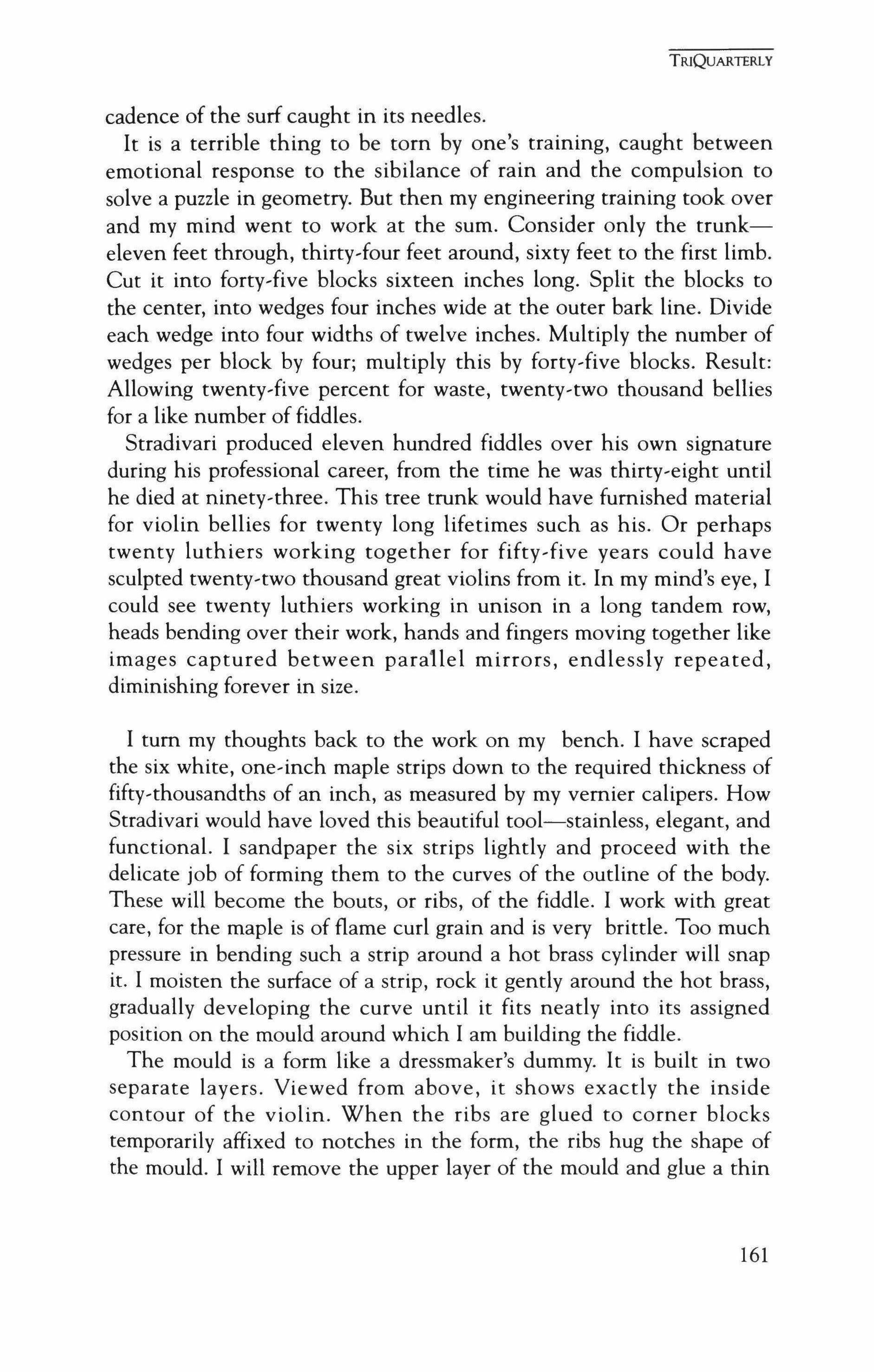
cadence of the surf caught in its needles.
It is a terrible thing to be torn by one's training, caught between emotional response to the sibilance of rain and the compulsion to solve a puzzle in geometry. But then my engineering training took over and my mind went to work at the sum. Consider only the trunkeleven feet through, thirty-four feet around, sixty feet to the first limb. Cut it into forty-five blocks sixteen inches long. Split the blocks to the center, into wedges four inches wide at the outer bark line. Divide each wedge into four widths of twelve inches. Multiply the number of wedges per block by four; multiply this by forty-five blocks. Result: Allowing twenty-five percent for waste, twenty-two thousand bellies for a like number of fiddles.
Stradivari produced eleven hundred fiddles over his own signature during his professional career, from the time he was thirty-eight until he died at ninety-three, This tree trunk would have furnished material for violin bellies for twenty long lifetimes such as his. Or perhaps twenty luthiers working together for fifty-five years could have sculpted twenty,two thousand great violins from it. In my mind's eye, I could see twenty luthiers working in unison in a long tandem row, heads bending over their work, hands and fingers moving together like images captured between para1lel mirrors, endlessly repeated, diminishing forever in size.
I tum my thoughts back to the work on my bench. I have scraped the six white, one, inch maple strips down to the required thickness of fifty,thousandths of an inch, as measured by my vernier calipers. How Stradivari would have loved this beautiful tool-stainless, elegant, and functional. I sandpaper the six strips lightly and proceed with the delicate job of forming them to the curves of the outline of the body. These will become the bouts, or ribs, of the fiddle. I work with great care, for the maple is of flame curl grain and is very brittle. Too much pressure in bending such a strip around a hot brass cylinder will snap it. I moisten the surface of a strip, rock it gently around the hot brass, gradually developing the curve until it fits neatly into its assigned position on the mould around which I am building the fiddle.
The mould is a form like a dressmaker's dummy. It is built in two separate layers. Viewed from above, it shows exactly the inside contour of the violin. When the ribs are glued to corner blocks temporarily affixed to notches in the form, the ribs hug the shape of the mould. I will remove the upper layer of the mould and glue a thin
TRIQUARTERLY
161

triangular liner around the inner periphery of the ribs. Smoothed flush with the upper edges of the ribs, the liners will make an extension of these edges, providing a surface or shelf, some three-sixteenths of an inch wide to which the finished back will be glued.
Making a violin, painstaking endeavor as it is, is soothing, tension, relieving work. Each step requires the utmost concentration. A slip or false move can undo many hours of work. And yet the old masters were very clever, for they evolved the sequence of fiddle making so that each step seems to be designed to overcome any minor slips in the last.
If I cut a bit too deeply in shaping the scroll of the fiddleneck, I can smooth the surface and trim the opposite curve to the same depth. Or I can glue in a small chip of maple to fill the cut. And if I work with reasonable skill, no human eye will be likely to find the flaw. If I do not get a perfect fit at the joint where the two ribs come together at the back of the violin, I can cut a little groove and glue in a bit of purfling-an expedient resorted to by Stradivari himself when even his master's eye let him down. Purfling is a narrow sandwich made of three thin strips of wood. The outer strips are black and the inner, white. The total thickness of the purfling is less than one-sixteenth of an inch.
Purfling is usually inlaid around the contour of the back and the belly, about three-sixteenths of an inch in from the edges. Cutting the trough into which it is glued demands great care, for the purfling should fit neatly. And the back and belly are made of woods of different hardness and grain, requiring different pressure and technique in the use of the carving knife and purfling chisel. The maple of the back is hard and brittle and chips readily. In contrast, the spruce of the belly is fibrous and stringy with appreciably different hardness between winter and summer grain.
The debility of age that crept into Stradivari's last work is most clearly evident in his purfling. The rough grooves and irregular purfling of the "Muntz" violin, made in 1736 when Stradivari was ninety-two years old, show an old man's trembling hand.
It is now time to glue the back to the ribs and remove the upper layer of the mould. With these operations accomplished, the back now holds the ribs in position. The process is repeated to receive the belly.
I work slowly and carefully to bring the belly down to its required thicknesses, for this is a most critical element in determining the quality of tone my violin will produce. Here too, I think, wouldn't
TRIQUARTERLY
162
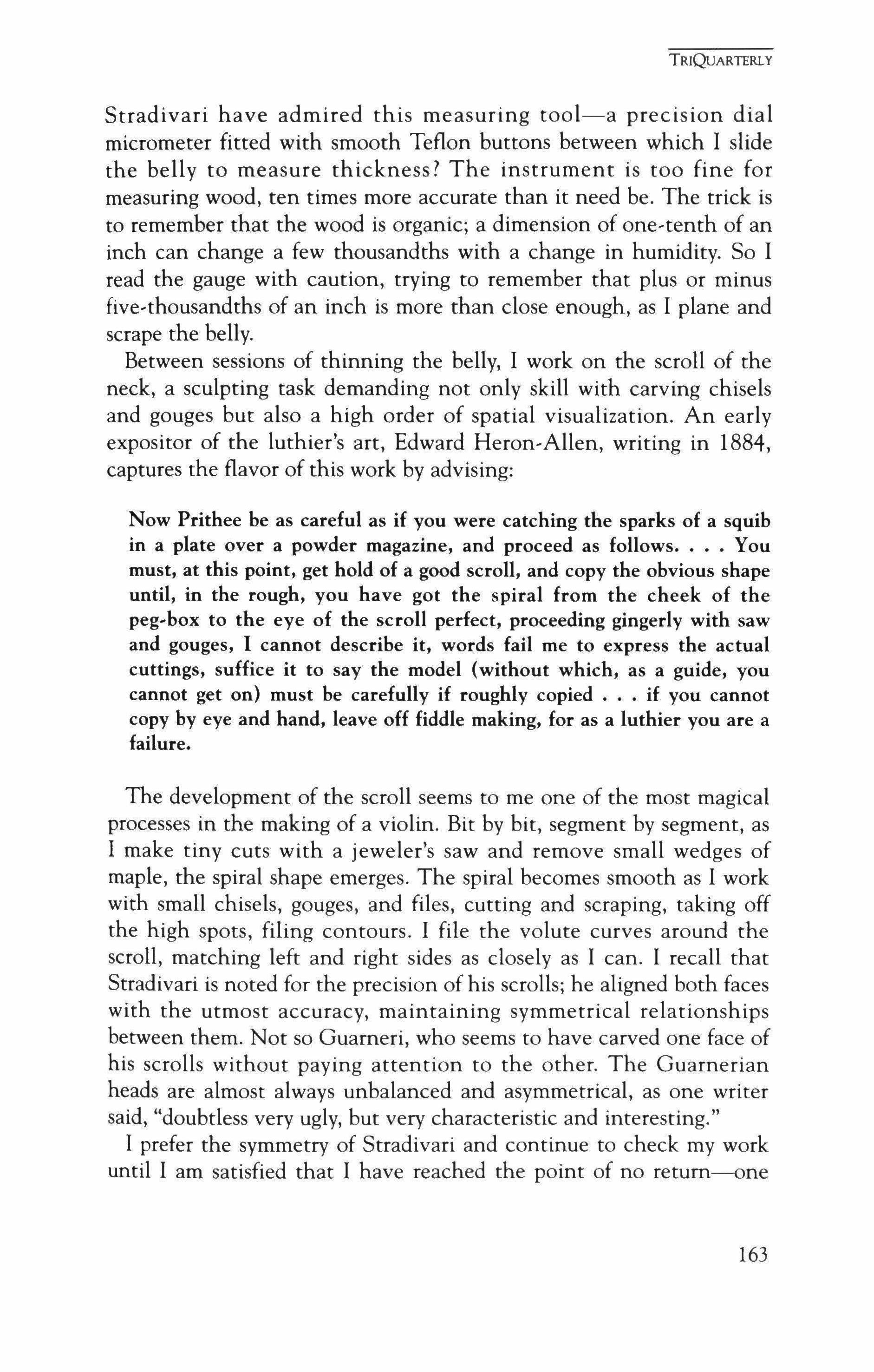
Stradivari have admired this measuring tool-a precision dial micrometer fitted with smooth Teflon buttons between which I slide the belly to measure thickness? The instrument is too fine for measuring wood, ten times more accurate than it need be. The trick is to remember that the wood is organic; a dimension of one,tenth of an inch can change a few thousandths with a change in humidity. So I read the gauge with caution, trying to remember that plus or minus five,thousandths of an inch is more than close enough, as I plane and scrape the belly.
Between sessions of thinning the belly, I work on the scroll of the neck, a sculpting task demanding not only skill with carving chisels and gouges but also a high order of spatial visualization. An early expositor of the luthier's art, Edward Heron-Allen, writing in 1884, captures the flavor of this work by advising:
Now Prithee be as careful as if you were catching the sparks of a squib in a plate over a powder magazine, and proceed as follows. You must, at this point, get hold of a good scroll, and copy the obvious shape until, in the rough, you have got the spiral from the cheek of the peg,box to the eye of the scroll perfect, proceeding gingerly with saw and gouges, I cannot describe it, words fail me to express the actual cuttings, suffice it to say the model (without which, as a guide, you cannot get on) must be carefully if roughly copied if you cannot copy by eye and hand, leave off fiddle making, for as a luthier you are a failure.
The development of the scroll seems to me one of the most magical processes in the making of a violin. Bit by bit, segment by segment, as I make tiny cuts with a jeweler's saw and remove small wedges of maple, the spiral shape emerges. The spiral becomes smooth as I work with small chisels, gouges, and files, cutting and scraping, taking off the high spots, filing contours. I file the volute curves around the scroll, matching left and right sides as closely as I can. I recall that Stradivari is noted for the precision of his scrolls; he aligned both faces with the utmost accuracy, maintaining symmetrical relationships between them. Not so Guarneri, who seems to have carved one face of his scrolls without paying attention to the other. The Guarnerian heads are almost always unbalanced and asymmetrical, as one writer said, "doubtless very ugly, but very characteristic and interesting."
I prefer the symmetry of Stradivari and continue to check my work until I am satisfied that I have reached the point of no return-one
TRIQUARTERLY
163
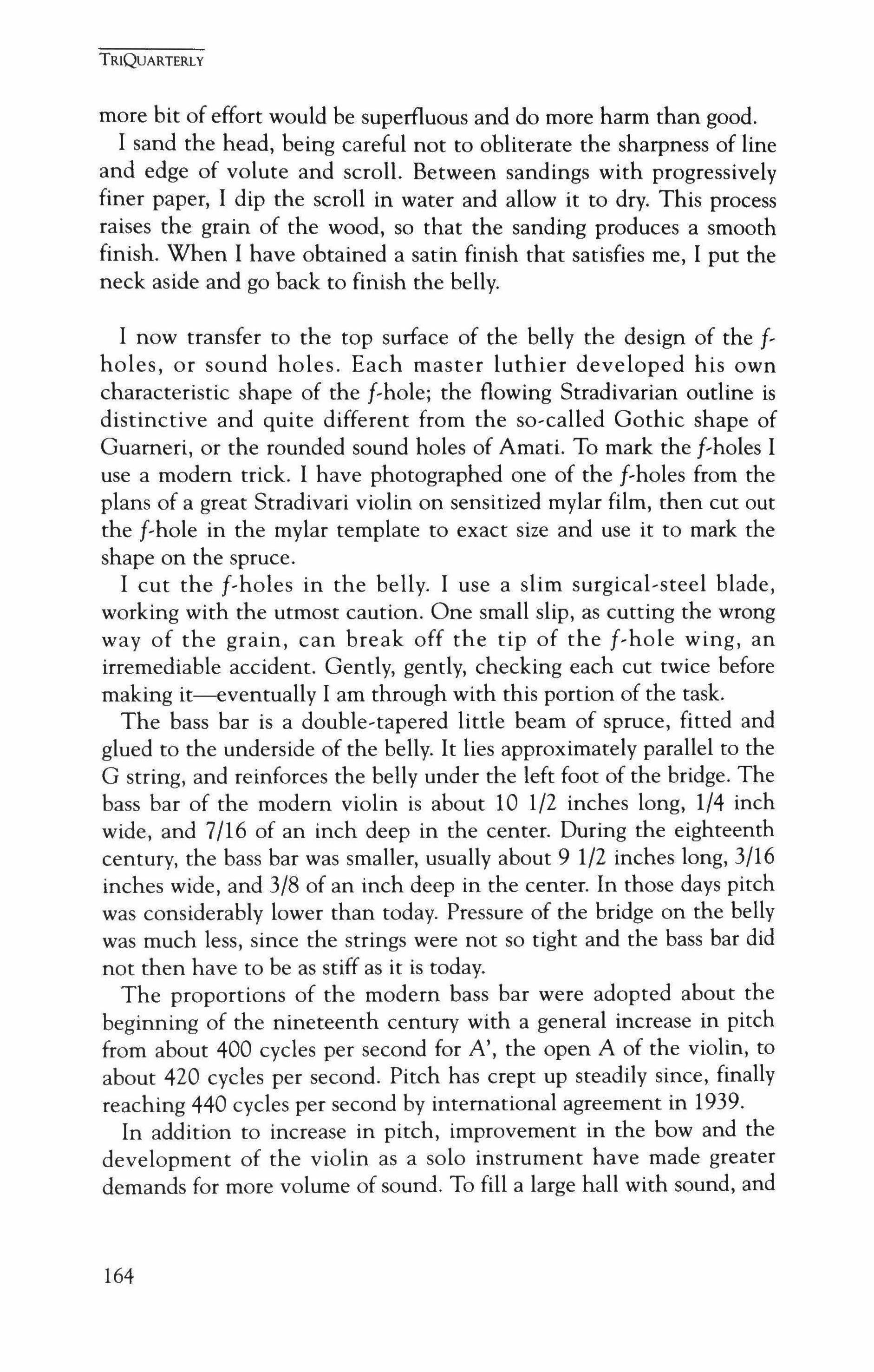
more bit of effort would be superfluous and do more harm than good. I sand the head, being careful not to obliterate the sharpness of line and edge of volute and scroll. Between sandings with progressively finer paper, I dip the scroll in water and allow it to dry. This process raises the grain of the wood, so that the sanding produces a smooth finish. When I have obtained a satin finish that satisfies me, I put the neck aside and go back to finish the belly.
I now transfer to the top surface of the belly the design of the [holes, or sound holes. Each master luthier developed his own characteristic shape of the j-hole; the flowing Stradivarian outline is distinctive and quite different from the so'called Gothic shape of Guarneri, or the rounded sound holes of Amati. To mark the j-holes I use a modem trick. I have photographed one of the j-holes from the plans of a great Stradivari violin on sensitized mylar film, then cut out the j-hole in the mylar template to exact size and use it to mark the shape on the spruce.
I cut the j-holes in the belly. I use a slim surgical-steel blade, working with the utmost caution. One small slip, as cutting the wrong way of the grain, can break off the tip of the j-hole wing, an irremediable accident. Gently, gently, checking each cut twice before making it-eventually I am through with this portion of the task.
The bass bar is a double,tapered little beam of spruce, fitted and glued to the underside of the belly. It lies approximately parallel to the G string, and reinforces the belly under the left foot of the bridge. The bass bar of the modem violin is about 10 1/2 inches long, 1/4 inch wide, and 7/16 of an inch deep in the center. During the eighteenth century, the bass bar was smaller, usually about 9 1/2 inches long, 3/16 inches wide, and 3/8 of an inch deep in the center. In those days pitch was considerably lower than today. Pressure of the bridge on the belly was much less, since the strings were not so tight and the bass bar did not then have to be as stiff as it is today.
The proportions of the modem bass bar were adopted about the beginning of the nineteenth century with a general increase in pitch from about 400 cycles per second for A', the open A of the violin, to about 420 cycles per second. Pitch has crept up steadily since, finally reaching 440 cycles per second by international agreement in 1939.
In addition to increase in pitch, improvement in the bow and the development of the violin as a solo instrument have made greater demands for more volume of sound. To fill a large hall with sound, and
TRIQUARTERLY
164
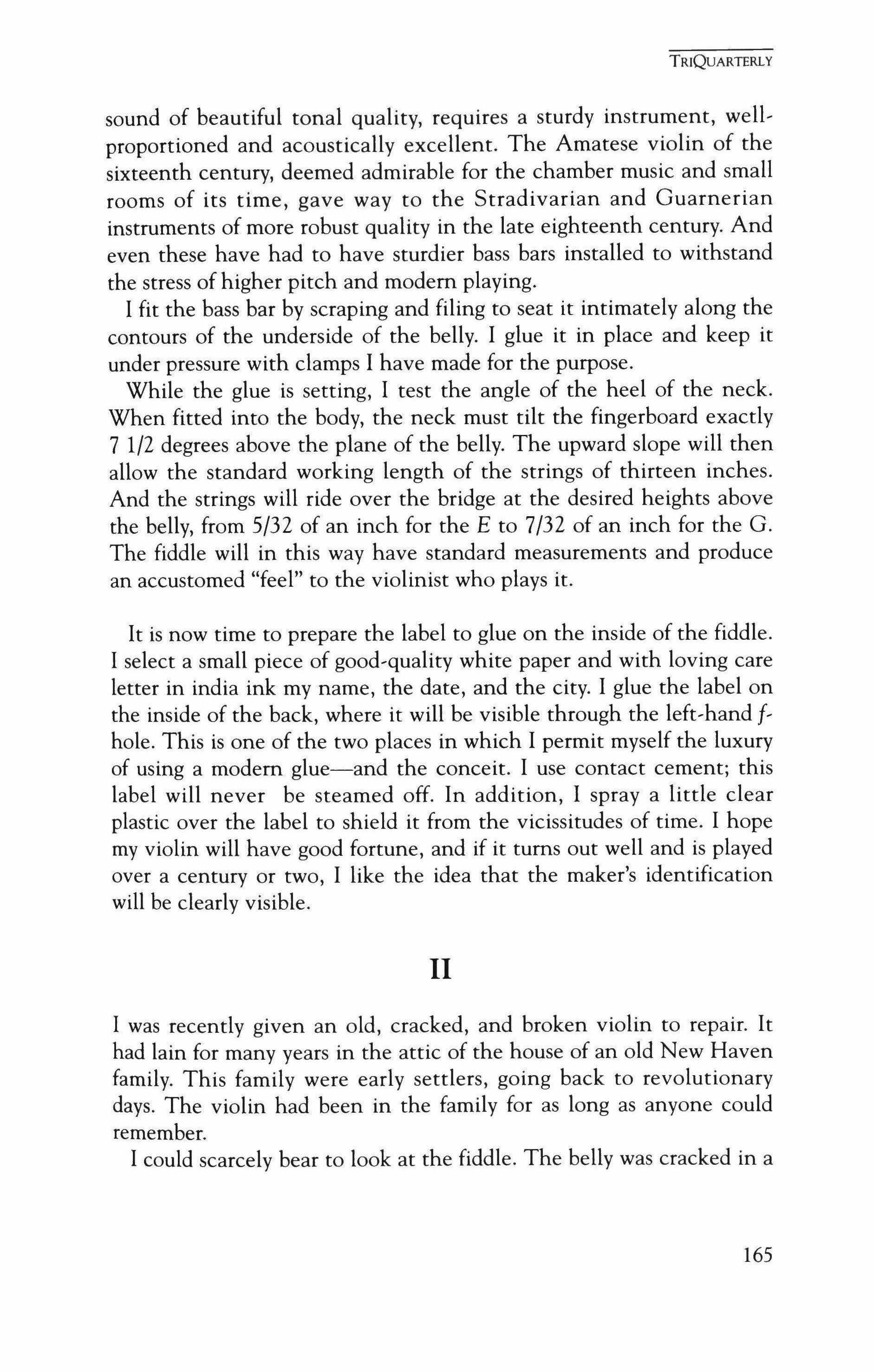
sound of beautiful tonal quality, requires a sturdy instrument, wellproportioned and acoustically excellent. The Amatese violin of the sixteenth century, deemed admirable for the chamber music and small rooms of its time, gave way to the Stradivarian and Guarnerian instruments of more robust quality in the late eighteenth century. And even these have had to have sturdier bass bars installed to withstand the stress of higher pitch and modern playing.
I fit the bass bar by scraping and filing to seat it intimately along the contours of the underside of the belly. I glue it in place and keep it under pressure with clamps I have made for the purpose.
While the glue is setting, I test the angle of the heel of the neck. When fitted into the body, the neck must tilt the fingerboard exactly 7 1/2 degrees above the plane of the belly. The upward slope will then allow the standard working length of the strings of thirteen inches. And the strings will ride over the bridge at the desired heights above the belly, from 5/32 of an inch for the E to 7/32 of an inch for the G. The fiddle will in this way have standard measurements and produce an accustomed "feel" to the violinist who plays it.
It is now time to prepare the label to glue on the inside of the fiddle. I select a small piece of good-quality white paper and with loving care letter in india ink my name, the date, and the city. I glue the label on the inside of the back, where it will be visible through the left-hand [hole. This is one of the two places in which I permit myself the luxury of using a modern glue-and the conceit. I use contact cement; this label will never be steamed off. In addition, I spray a little clear plastic over the label to shield it from the vicissitudes of time. I hope my violin will have good fortune, and if it turns out well and is played over a century or two, I like the idea that the maker's identification will be clearly visible.
II
I was recently given an old, cracked, and broken violin to repair. It had lain for many years in the attic of the house of an old New Haven family. This family were early settlers, going back to revolutionary days. The violin had been in the family for as long as anyone could remember.
I could scarcely bear to look at the fiddle. The belly was cracked in a 165
TRIQUARTERLY
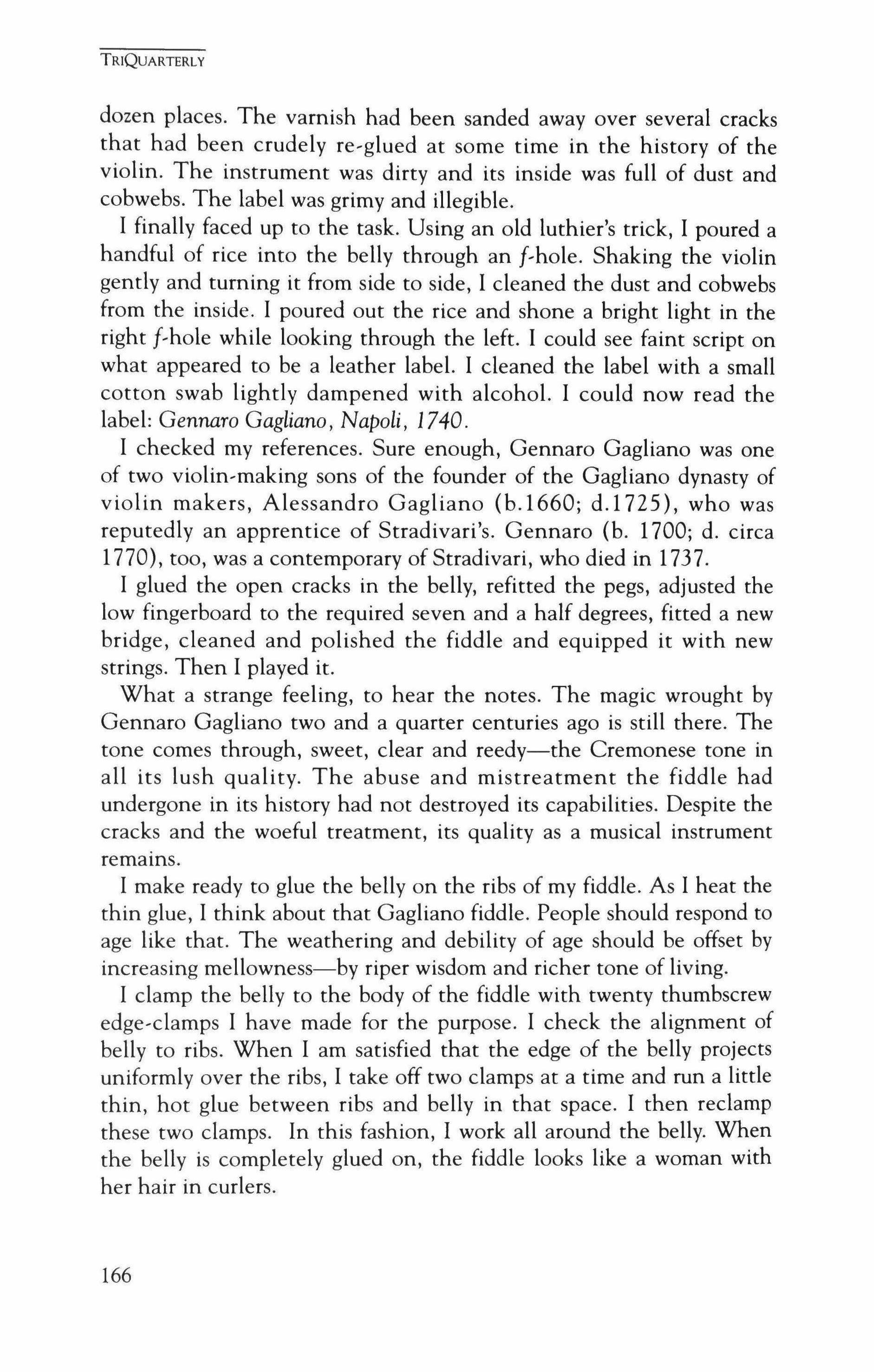
dozen places. The varnish had been sanded away over several cracks that had been crudely re-glued at some time in the history of the violin. The instrument was dirty and its inside was full of dust and cobwebs. The label was grimy and illegible.
I finally faced up to the task. Using an old luthier's trick, I poured a handful of rice into the belly through an j-hole. Shaking the violin gently and turning it from side to side, I cleaned the dust and cobwebs from the inside. I poured out the rice and shone a bright light in the right j-hole while looking through the left. I could see faint script on what appeared to be a leather label. I cleaned the label with a small cotton swab lightly dampened with alcohol. I could now read the label: Gennaro Gagliano, Napoli, 1740.
I checked my references. Sure enough, Gennaro Gagliano was one of two violin,making sons of the founder of the Gagliano dynasty of violin makers, Alessandro Gagliano (b.1660j d.I725), who was reputedly an apprentice of Stradivari's. Gennaro (b. 1700j d. circa 1770), too, was a contemporary of Stradivari, who died in 1737.
I glued the open cracks in the belly, refitted the pegs, adjusted the low fingerboard to the required seven and a half degrees, fitted a new bridge, cleaned and polished the fiddle and equipped it with new strings. Then I played it.
What a strange feeling, to hear the notes. The magic wrought by Gennaro Gagliano two and a quarter centuries ago is still there. The tone comes through, sweet, clear and reedy-the Cremonese tone in all its lush quality. The abuse and mistreatment the fiddle had undergone in its history had not destroyed its capabilities. Despite the cracks and the woeful treatment, its quality as a musical instrument remains.
I make ready to glue the belly on the ribs of my fiddle. As I heat the thin glue, I think about that Gagliano fiddle. People should respond to age like that. The weathering and debility of age should be offset by increasing mellowness-by riper wisdom and richer tone of living.
I clamp the belly to the body of the fiddle with twenty thumbscrew edge,clamps I have made for the purpose. I check the alignment of belly to ribs. When I am satisfied that the edge of the belly projects uniformly over the ribs, I take off two clamps at a time and run a little thin, hot glue between ribs and belly in that space. I then reclamp these two clamps. In this fashion, I work all around the belly. When the belly is completely glued on, the fiddle looks like a woman with her hair in curlers.
TRIQUARTERLY
166
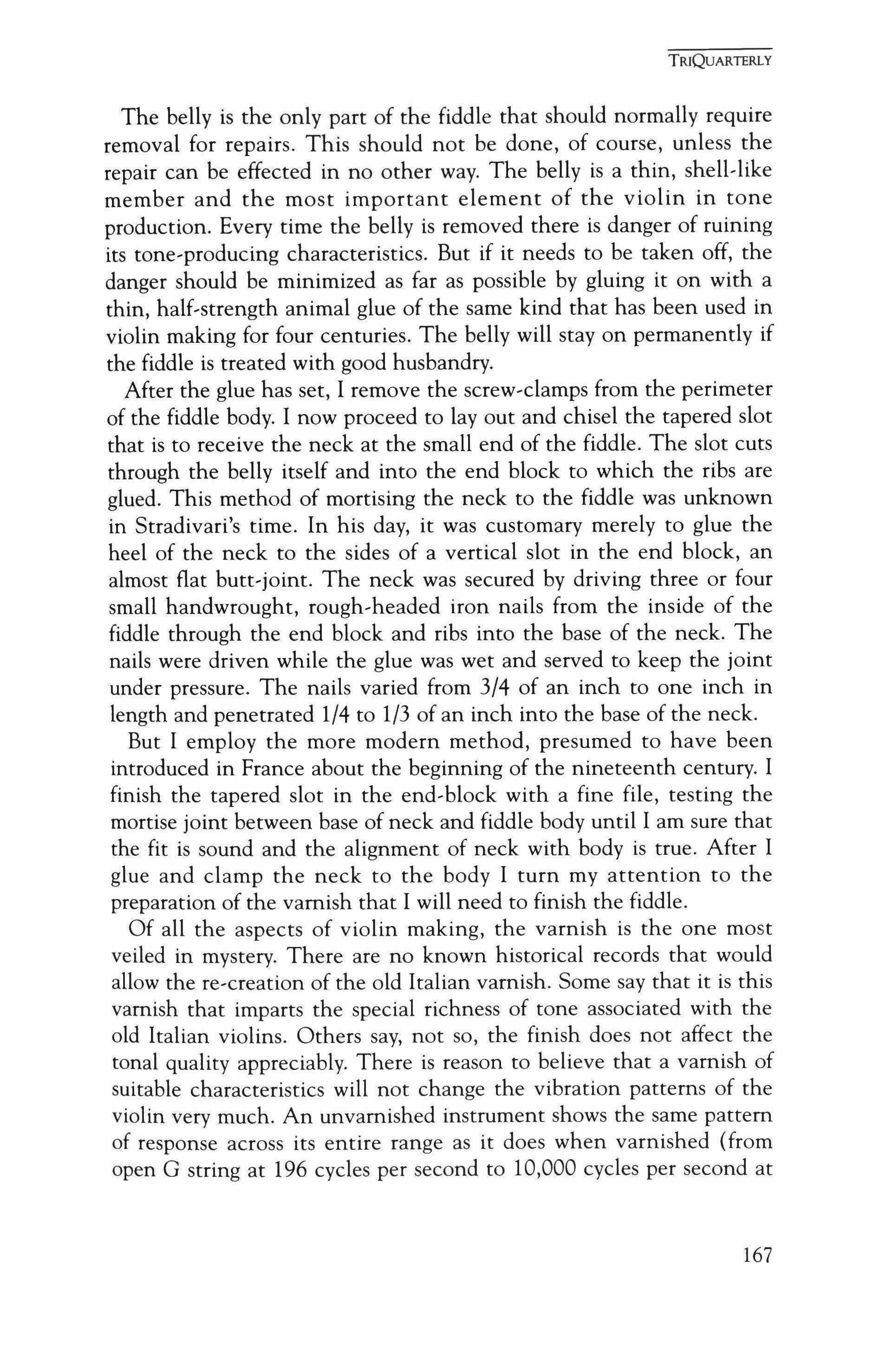
The belly is the only part of the fiddle that should normally require removal for repairs. This should not be done, of course, unless the repair can be effected in no other way. The belly is a thin, shell-like member and the most important element of the violin in tone production. Every time the belly is removed there is danger of ruining its tone-producing characteristics. But if it needs to be taken off, the danger should be minimized as far as possible by gluing it on with a thin, half-strength animal glue of the same kind that has been used in violin making for four centuries. The belly will stay on permanently if the fiddle is treated with good husbandry.
After the glue has set, I remove the screw-clamps from the perimeter of the fiddle body. I now proceed to layout and chisel the tapered slot that is to receive the neck at the small end of the fiddle. The slot cuts through the belly itself and into the end block to which the ribs are glued. This method of mortising the neck to the fiddle was unknown in Stradivari's time. In his day, it was customary merely to glue the heel of the neck to the sides of a vertical slot in the end block, an almost flat butt-joint. The neck was secured by driving three or four small handwrought, rough-headed iron nails from the inside of the fiddle through the end block and ribs into the base of the neck. The nails were driven while the glue was wet and served to keep the joint under pressure. The nails varied from 3/4 of an inch to one inch in length and penetrated 1/4 to 1/3 of an inch into the base of the neck.
But I employ the more modern method, presumed to have been introduced in France about the beginning of the nineteenth century. I finish the tapered slot in the end-block with a fine file, testing the mortise joint between base of neck and fiddle body until I am sure that the fit is sound and the alignment of neck with body is true. After I glue and clamp the neck to the body I turn my attention to the preparation of the varnish that I will need to finish the fiddle.
Of all the aspects of violin making, the varnish is the one most veiled in mystery. There are no known historical records that would allow the re-creation of the old Italian varnish. Some say that it is this varnish that imparts the special richness of tone associated with the old Italian violins. Others say, not so, the finish does not affect the tonal quality appreciably. There is reason to believe that a varnish of suitable characteristics will not change the vibration patterns of the violin very much. An unvarnished instrument shows the same pattern of response across its entire range as it does when varnished (from open G string at 196 cycles per second to 10,000 cycles per second at
TRIQUARTERLY
167
TRIQUARTERLY
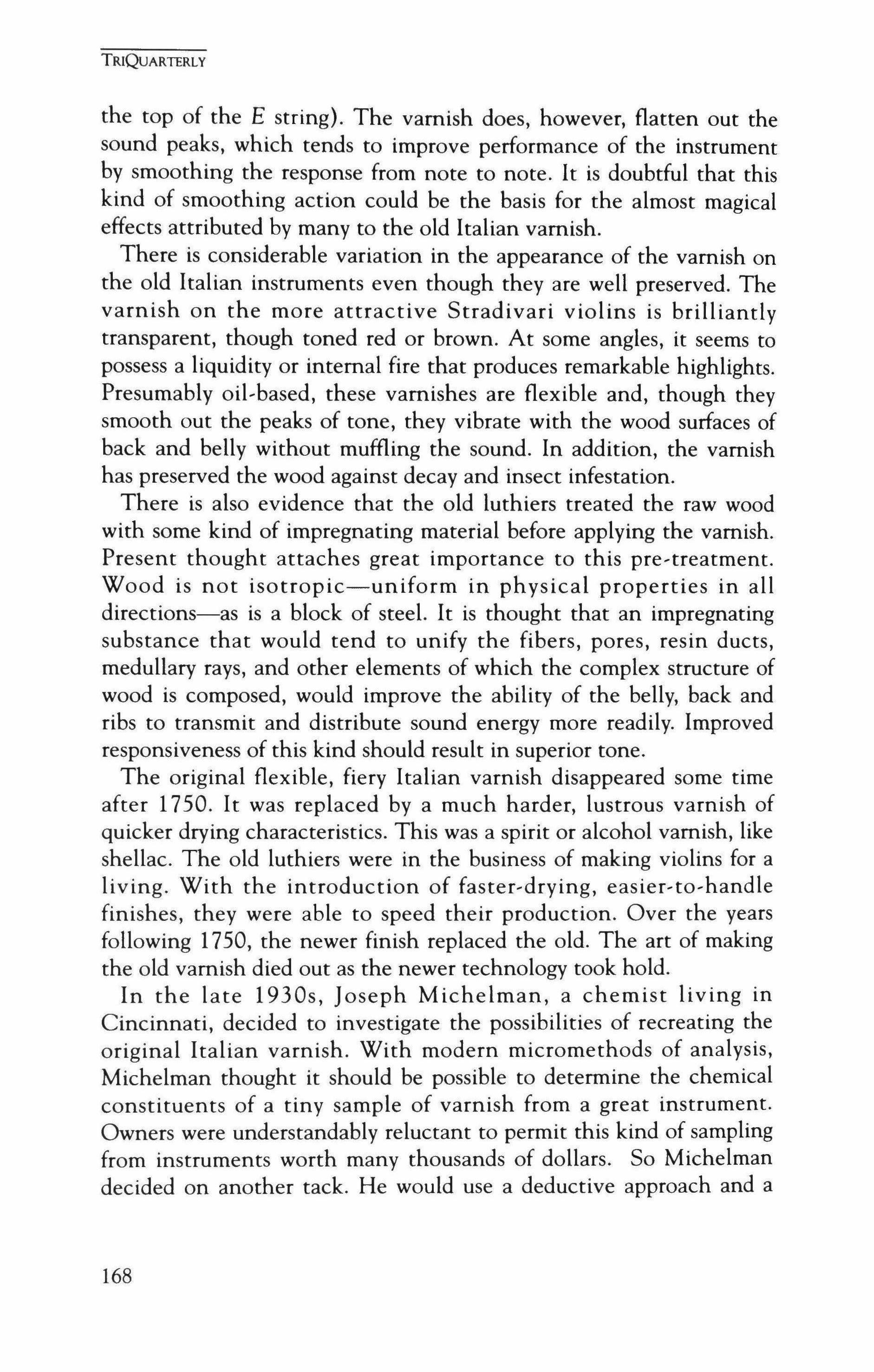
the top of the E string}. The varnish does, however, flatten out the sound peaks, which tends to improve performance of the instrument by smoothing the response from note to note. It is doubtful that this kind of smoothing action could be the basis for the almost magical effects attributed by many to the old Italian varnish.
There is considerable variation in the appearance of the varnish on the old Italian instruments even though they are well preserved. The varnish on the more attractive Stradivari violins is brilliantly transparent, though toned red or brown. At some angles, it seems to possess a liquidity or internal fire that produces remarkable highlights. Presumably oil-based, these varnishes are flexible and, though they smooth out the peaks of tone, they vibrate with the wood surfaces of back and belly without muffling the sound. In addition, the varnish has preserved the wood against decay and insect infestation.
There is also evidence that the old luthiers treated the raw wood with some kind of impregnating material before applying the varnish. Present thought attaches great importance to this pre,treatment. Wood is not isotropic-uniform in physical properties in all directions-as is a block of steel. It is thought that an impregnating substance that would tend to unify the fibers, pores, resin ducts, medullary rays, and other elements of which the complex structure of wood is composed, would improve the ability of the belly, back and ribs to transmit and distribute sound energy more readily. Improved responsiveness of this kind should result in superior tone.
The original flexible, fiery Italian varnish disappeared some time after 1750. It was replaced by a much harder, lustrous varnish of quicker drying characteristics. This was a spirit or alcohol varnish, like shellac. The old luthiers were in the business of making violins for a living. With the introduction of faster-drying, easier-to-handle finishes, they were able to speed their production. Over the years following 1750, the newer finish replaced the old. The art of making the old varnish died out as the newer technology took hold.
In the late 1930s, Joseph Michelman, a chemist living in Cincinnati, decided to investigate the possibilities of recreating the original Italian varnish. With modern micromethods of analysis, Michelman thought it should be possible to determine the chemical constituents of a tiny sample of varnish from a great instrument. Owners were understandably reluctant to permit this kind of sampling from instruments worth many thousands of dollars. So Michelrnan decided on another tack. He would use a deductive approach and a
168

synthetic technique in trying to reconstruct the varnish.
He reasoned that any method used in the preparation of violin varnish before 1750 must have depended on the simplest equipment and processes. There were no chemical laboratories then. Whatever had to be done must have been possible with ordinary utensils on the kitchen stove.
Furthermore, whatever materials went into the formulation must have been common in the commerce of the day. Michelman searched the literature of the Italian Renaissance. Turpentine and linseed oil were known, as were many natural coloring agents and dyestuffs. Clay, wood ashes, madder root and metallic salts of various kinds were well known in the trade of the day. Rosin, derived from turpentine, was commonly used for bows of stringed instruments.
Michelman discovered that in 1683, Galileo, the great astronomer, received a letter from his former pupil, the Servite monk Fra Flugentius Micanzio, whom he had asked to procure a good violin in Cremona for his nephew. Fra Micanzio apologized for the delay in delivery of the instrument, saying, "It cannot be brought to perfection without the strong heat of the sun." Though the violin maker's name is not mentioned, he was probably one of the Amati family-perhaps Nicolo, who at that time was in his prime as a craftsman. And Stradivari, too, apologized for delay in delivery of an instrument he had repaired in 1708 because of the slow drying of the varnish.
These data led Michelman to believe that it was sunlight that set the varnish. Therefore, any finish formulated to re-create the old Italian varnish should not fade in sunlight but, rather, have its color developed and fixed by the sun. After several years of experimenting, Michelman arrived at a simple process based on dissolving ordinary rosin in potassa lye, derived from wood ash, and precipitating a colorless resin by adding alum solution. He dissolved this resin in linseed oil and turpentine to make the fundamental varnish. The addition of alum and copperas to the original solution of rosin produces a brown resin; alum and madder root extract an orange resin; zinc sulfate and madder root extract a red resin varnish. By simple methods that can be performed in the kitchen, the various colored varnishes can be made. The interesting point is that these varnishes are all set by sunlight-or to be exact, as Michelman discovered, the ultraviolet rays in sunlight.
To prepare the violin for the varnish, Michelman found it desirable to paint the unfinished wood with raw linseed oil, which too is dried
TRIQuARTERLY
169

in the heat and light of the sun. The linseed oil acts to bind the fibers and cells of the wood together to produce a more homogeneous material. In addition, wood so treated seems to duplicate in appearance the wood exposed by the wearing away of varnish in places on great old Italian violins.
Some years ago, Michelman got his chance to analyze varnish from a cello made by Stradivari, and some from other fine old Italian instruments. He states: "The original principles concerning the composition and the preparation of the varnishes have been confirmed by analyses of old Italian varnishes." Michelman's findings have been substantiated by others who have made spectrographic analyses of varnish from Italian violins made by Andrea Guarneri and Zanetto. This work, therefore, makes it possible for the modern violin maker to prepare his own varnish on the kitchen stove-varnish that uses only materials and methods known to be available in Italy during the period between 1550 and 1750 and that satisfies the criteria of the old Italian varnish: liquid-brilliant luster, flexibility, light weight, ease of compounding, ease of application by brush, and fixing by sunlight. In Michelman's words, "The varnish is a plausible re-creation" of the old Italian varnish.
There are some, however, who do not accept Michelman's violin varnish as the last word. They believe that even the simple procedures required to make this varnish are more complicated than the old luthiers could, or perhaps would, wish to handle. Materials for the varnish, they argue, should be close at hand, readily available, and easily formulated with native substances-without controls such as weighing or measuring other than in the grossest way. The recipe should be like that of an old-fashioned cook's-a pinch of this, a dollop of that.
William Fulton, a member of the Southern California Violin Makers Association, a group of professional and amateur luthiers, suggests the merit of a varnish derived from propolis, the resinous material bees gather from various sources and use within the hive as a cement and sealant. It acts as a preservative and appears to inhibit decay.
Propolis oxidizes within the hive as the bees circulate air at a high rate to evaporate moisture from the nectar in the honey cells. The propolis darkens in color as it is oxidized. In addition to the oxidized resin, the bees transform some of the propolis they bring into the hive into a bee varnish by a natural process not yet well understood. They use this varnish to coat the brood cells. It is somewhat more plastic
TRIQUARTERLY
170
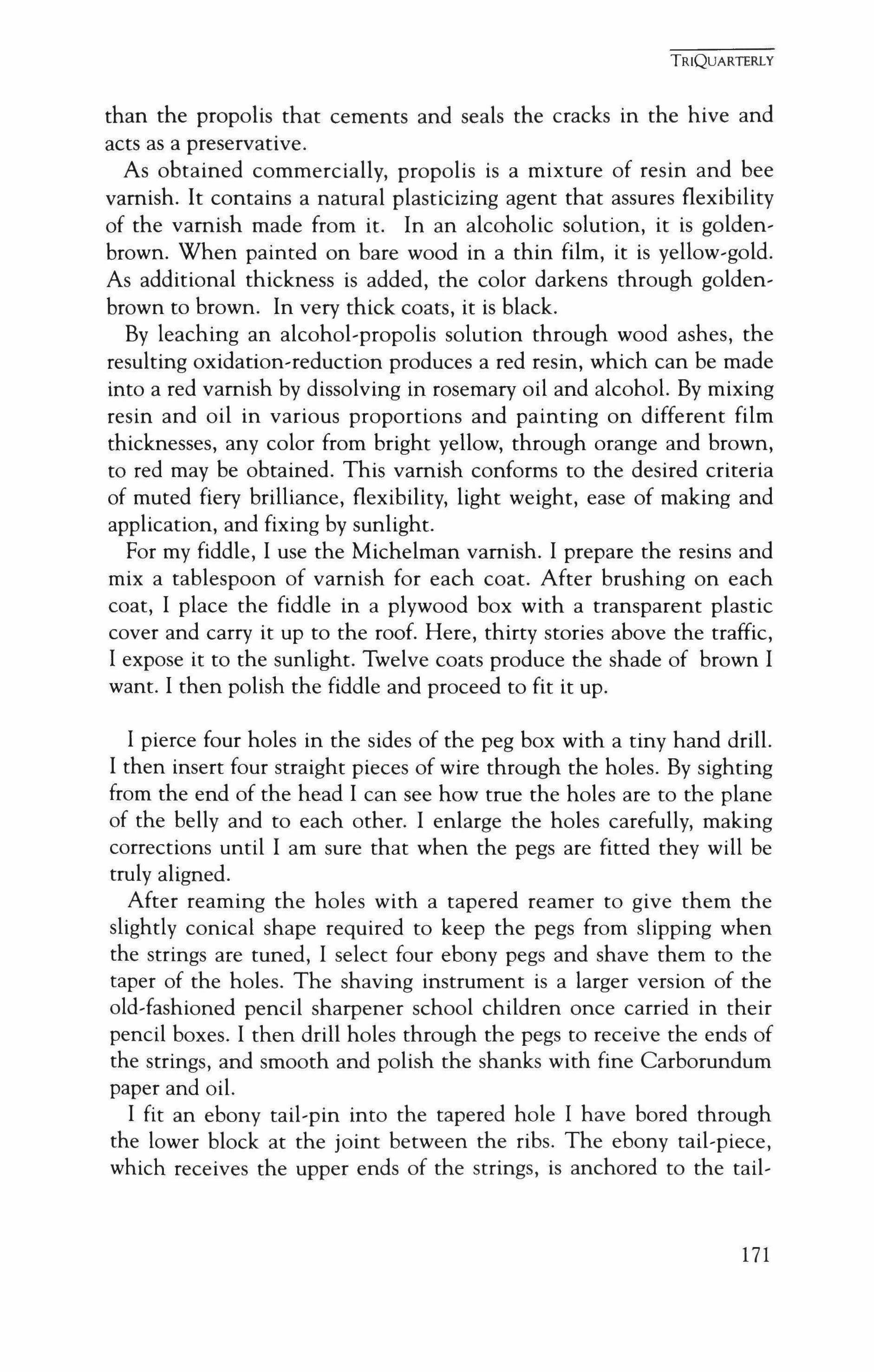
than the propolis that cements and seals the cracks in the hive and acts as a preservative.
As obtained commercially, propolis is a mixture of resin and bee varnish. It contains a natural plasticizing agent that assures flexibility of the varnish made from it. In an alcoholic solution, it is golden, brown. When painted on bare wood in a thin film, it is vellow-gold. As additional thickness is added, the color darkens through golden, brown to brown. In very thick coats, it is black.
By leaching an alcohol-propolis solution through wood ashes, the resulting oxidation'reduction produces a red resin, which can be made into a red varnish by dissolving in rosemary oil and alcohol. By mixing resin and oil in various proportions and painting on different film thicknesses, any color from bright yellow, through orange and brown, to red may be obtained. This varnish conforms to the desired criteria of muted fiery brilliance, flexibility, light weight, ease of making and application, and fixing by sunlight.
For my fiddle, I use the Michelman varnish. I prepare the resins and mix a tablespoon of varnish for each coat. After brushing on each coat, I place the fiddle in a plywood box with a transparent plastic cover and carry it up to the roof. Here, thirty stories above the traffic, I expose it to the sunlight. Twelve coats produce the shade of brown I want. I then polish the fiddle and proceed to fit it up.
I pierce four holes in the sides of the peg box with a tiny hand drill. I then insert four straight pieces of wire through the holes. By sighting from the end of the head I can see how true the holes are to the plane of the belly and to each other. I enlarge the holes carefully, making corrections until I am sure that when the pegs are fitted they will be truly aligned.
After reaming the holes with a tapered reamer to give them the slightly conical shape required to keep the pegs from slipping when the strings are tuned, I select four ebony pegs and shave them to the taper of the holes. The shaving instrument is a larger version of the old-fashioned pencil sharpener school children once carried in their pencil boxes. I then drill holes through the pegs to receive the ends of the strings, and smooth and polish the shanks with fine Carborundum paper and oil.
I fit an ebony tail-pin into the tapered hole I have bored through the lower block at the joint between the ribs. The ebony tail-piece, which receives the upper ends of the strings, is anchored to the tail,
TRIQUARTERLY
171
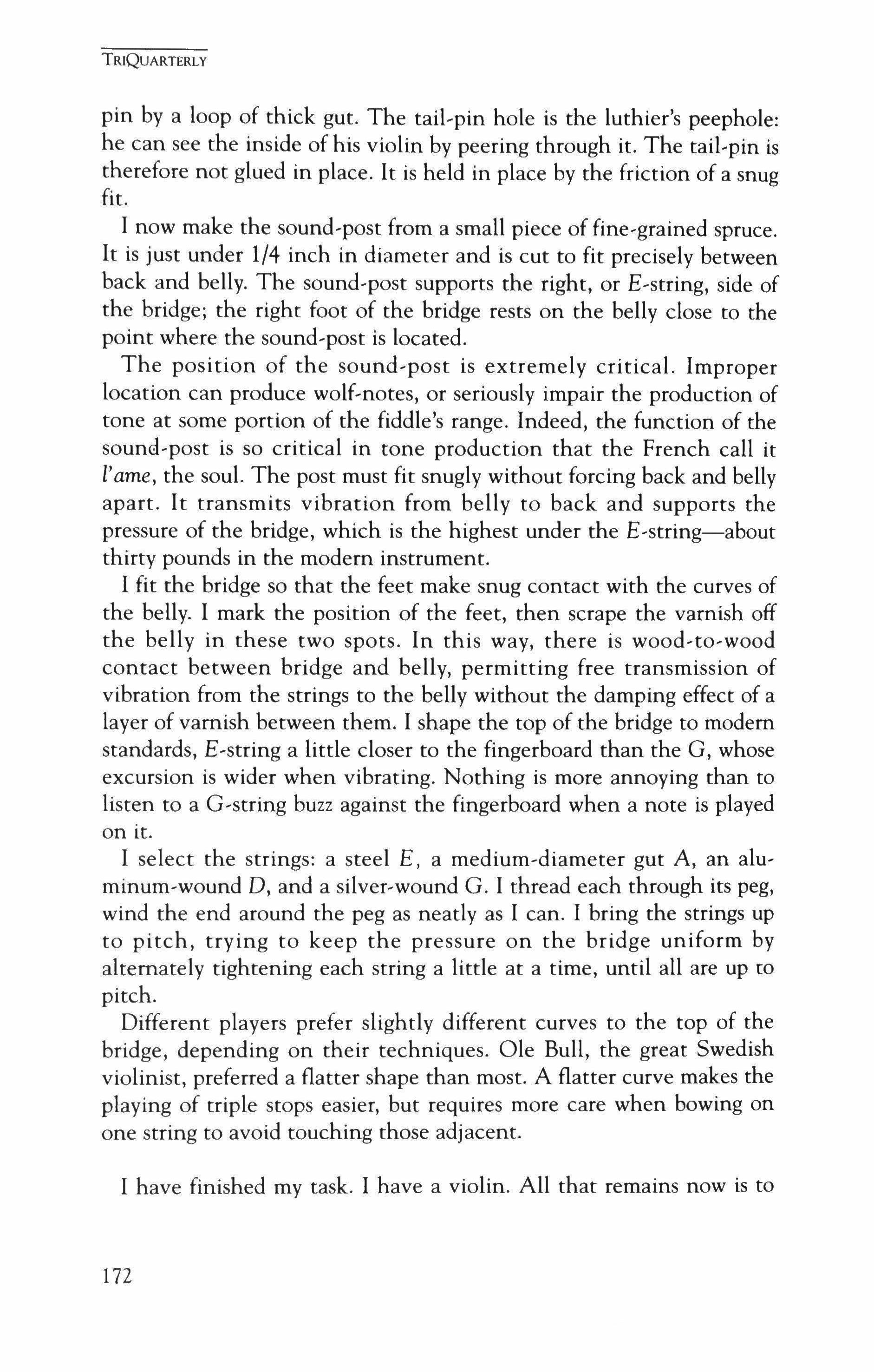
pin by a loop of thick gut. The tail-pin hole is the luthier's peephole: he can see the inside of his violin by peering through it. The tail-pin is therefore not glued in place. It is held in place by the friction of a snug fit.
I now make the sound-post from a small piece of fine-grained spruce. It is just under 1/4 inch in diameter and is cut to fit precisely between back and belly. The sound-post supports the right, or E,string, side of the bridge; the right foot of the bridge rests on the belly close to the point where the sound-post is located.
The position of the sound-post is extremely critical. Improper location can produce wolf-notes, or seriously impair the production of tone at some portion of the fiddle's range. Indeed, the function of the sound-post is so critical in tone production that the French call it l'arne, the soul. The post must fit snugly without forcing back and belly apart. It transmits vibration from belly to back and supports the pressure of the bridge, which is the highest under the E,string-about thirty pounds in the modem instrument.
I fit the bridge so that the feet make snug contact with the curves of the belly. I mark the position of the feet, then scrape the varnish off the belly in these two spots. In this way, there is wood-to-wood contact between bridge and belly, permitting free transmission of vibration from the strings to the belly without the damping effect of a layer of varnish between them. I shape the top of the bridge to modem standards, E,string a little closer to the fingerboard than the G, whose excursion is wider when vibrating. Nothing is more annoying than to listen to a Gvstring buzz against the fingerboard when a note is played on it.
I select the strings: a steel E, a medium-diameter gut A, an aluminum-wound D, and a silver-wound G. I thread each through its peg, wind the end around the peg as neatly as I can. I bring the strings up to pitch, trying to keep the pressure on the bridge uniform by alternately tightening each string a little at a time, until all are up to pitch.
Different players prefer slightly different curves to the top of the bridge, depending on their techniques. Ole Bull, the great Swedish violinist, preferred a flatter shape than most. A flatter curve makes the playing of triple stops easier, but requires more care when bowing on one string to avoid touching those adjacent.
I have finished my task. I have a violin. All that remains now is to
TRIQUARTERLY
172
play it and keep playing it until it settles in. The new violin tends to be rough and harsh in tone. Only after heing played for a few months does it settle down and begin to exhibit its true quality. If it is well made and has the potential for producing good tone, it will gradually improve with use and age. If it is inferior, no amount of playing will improve it.
I am fortunate in having a friend who is a renowned violinist a lady of charm and sufficient courage to play my violin so that I may hear it at its best. I made a tape recording of that session. I know now how a proud mother might feel watching her child perform in public. As the opening bars of the Sibelius violin concerto come from my fiddle, I feel the chills walk up and down my spine. She plays a bit of Tchaikovsky, a section of a Bach Partita. And when she has finished, she looks at the fiddle and says, somewhat surprised, "It has an Italian resonance." What more could an amateur fiddle maker desire?
 By Roder Fountain
By Roder Fountain
TRIQI A,RTERL)
173
Two Poems
Edward Hirsch
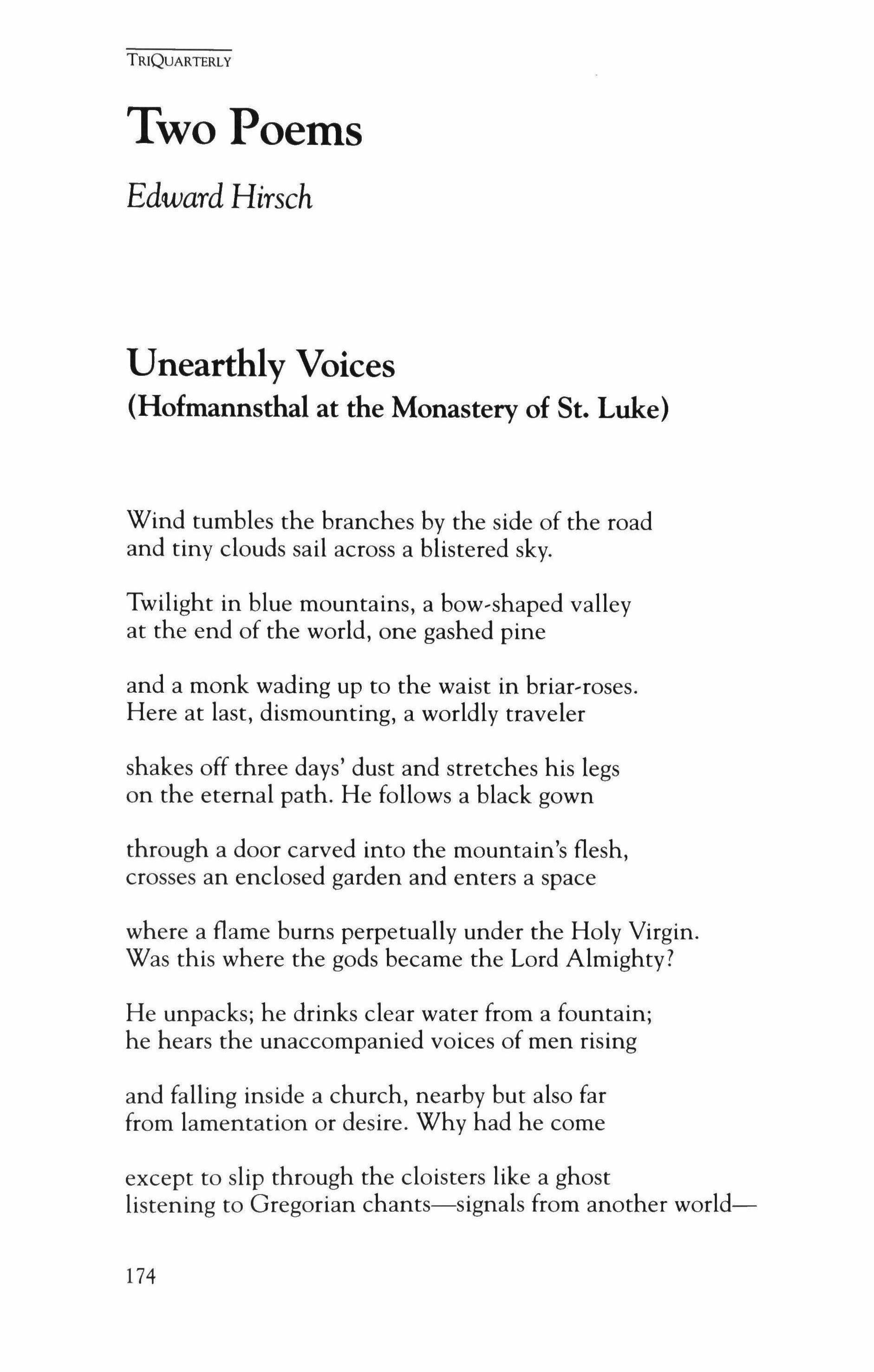
Unearthly Voices
(Hofmannsthal at the Monastery of St. Luke)
Wind tumbles the branches by the side of the road and tiny clouds sail across a blistered sky.
Twilight in blue mountains, a bow-shaped valley at the end of the world, one gashed pine
and a monk wading up to the waist in briar-roses. Here at last, dismounting, a worldly traveler
shakes off three days' dust and stretches his legs on the eternal path. He follows a black gown
through a door carved into the mountain's flesh, crosses an enclosed garden and enters a space where a flame burns perpetually under the Holy Virgin. Was this where the gods became the Lord Almighty?
He unpacks; he drinks clear water from a fountain; he hears the unaccompanied voices of men rising and falling inside a church, nearby but also far from lamentation or desire. Why had he come
except to slip through the cloisters like a ghost listening to Gregorian chants-signals from another world-
TRIQUARTERLY
174

to smell the incense and honey that load the air and contemplate the humility of kneeling
at Vespers, or lying on a stone-cold floor in the early morning, or standing in meditation?
Why had he come except to prove to himself that he could never be one of them? Suddenly
he hears a woman's tremulous voice glorying from an open window, faithful, chanting, and a second voice echoing hers, insubstantial, as if the mysteries had borrowed a human breast for singing, and then a third voice rising beyond the others, a messenger whose flare gleams
over the walls of a darkened orchard, the cloudy depths of a ruined city. The singing stops and a smooth face appears at the window, a novice whose hair falls across his shoulders to his waist.
The choirboys whisper together in the courtyard. Tomorrow he leaves for Athens, but tonight
he is gazing at a thousand-year-old olive grove that grows over broken columns, climbing the stairs and standing on a balcony between two fig trees, watching the evening star punctual over the mountains.
Now and then a light ascends, as if from water: the shepherds keeping warm under a lonely crescent.
He peers into the darkness as into a cistern and feels the centuries welling up beneath him.
An Unnamable is present, the Unreachable exists in shuddering sheep-bells and loud cicadas,
TRIQUARTERLY
175

in dogs barking at each other across the hills, answering questions, piercing the night's skin,
in stars blazing like torches, one by one, on the earthly horizon. He lies down
on a cot-he will not sleep-and hears church bells flecking the snow-capped mountains, far from home, somewhere near Delphi, and then angels waking in the treetops, and owls calling to wolves howling far away. Candles waver, bodies flicker through the windy corridors and soon they are praying and singing, kneeling in adoration before an absolute presence, God, the unfathomable One. He turns over and listens to voices floating unearthly over the rooftops
He drifts toward his family in another country, almost in another century, on a different floor
of the dream. He broods: a stranger who visits an ancient monastery is a tourist of eternity.
He believes nothing. He sees himself walking on a narrow path, alone between bare mountains while a single sparrow-hawk circles overhead and an icy stream threads its way underground.
He passes into the shade of a gigantic rock as angels disappear into cypresses and stone-pines,
The silence is wide and overwhelming, calm blanket of oblivion, peacefulness of death
At daybreak the voices begin again, ringing out the darkness, bringing back the sun.
TRIQUARTERLY
176
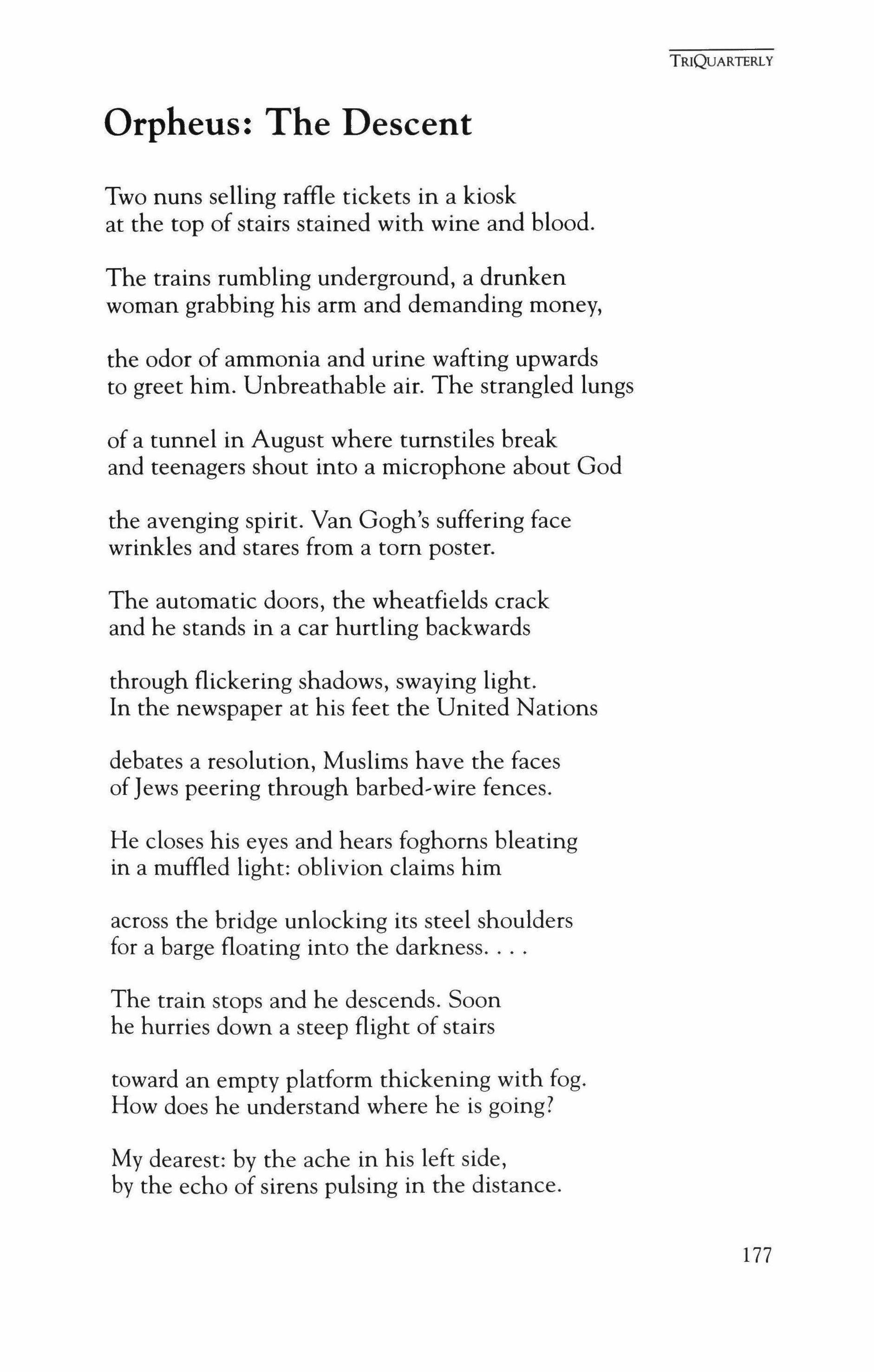
Orpheus: The Descent
Two nuns selling raffle tickets in a kiosk at the top of stairs stained with wine and blood.
The trains rumbling underground, a drunken woman grabbing his arm and demanding money, the odor of ammonia and urine wafting upwards to greet him. Unbreathable air. The strangled lungs of a tunnel in August where turnstiles break and teenagers shout into a microphone about God the avenging spirit. Van Gogh's suffering face wrinkles and stares from a tom poster.
The automatic doors, the wheatfields crack and he stands in a car hurtling backwards
through flickering shadows, swaying light. In the newspaper at his feet the United Nations
debates a resolution, Muslims have the faces ofJews peering through barbed-wire fences.
He closes his eyes and hears foghorns bleating in a muffled light: oblivion claims him
across the bridge unlocking its steel shoulders for a barge floating into the darkness
The train stops and he descends. Soon he hurries down a steep flight of stairs
toward an empty platform thickening with fog. How does he understand where he is going?
My dearest: by the ache in his left side, by the echo of sirens pulsing in the distance.
TRIQUARTERLY 177
Parting with a View
Wisfawa Szymborska
Translated by Stanislaw Baranczak and Clare Cavanagh

I don't reproach the spring for starting up again. I can't blame it for doing what it must year after year.
I know that my grief will not stop the green. The grass blade may bend but only in the wind.
It doesn't pain me to see that clumps'of alders above the water have something to rustle with again,
I take note of the fact that the shore of a certain lake is still-as if you were livingas lovely as before.
I don't resent the view for its vista of a sun-dazzled bay.
TRIQUARTERLY
178
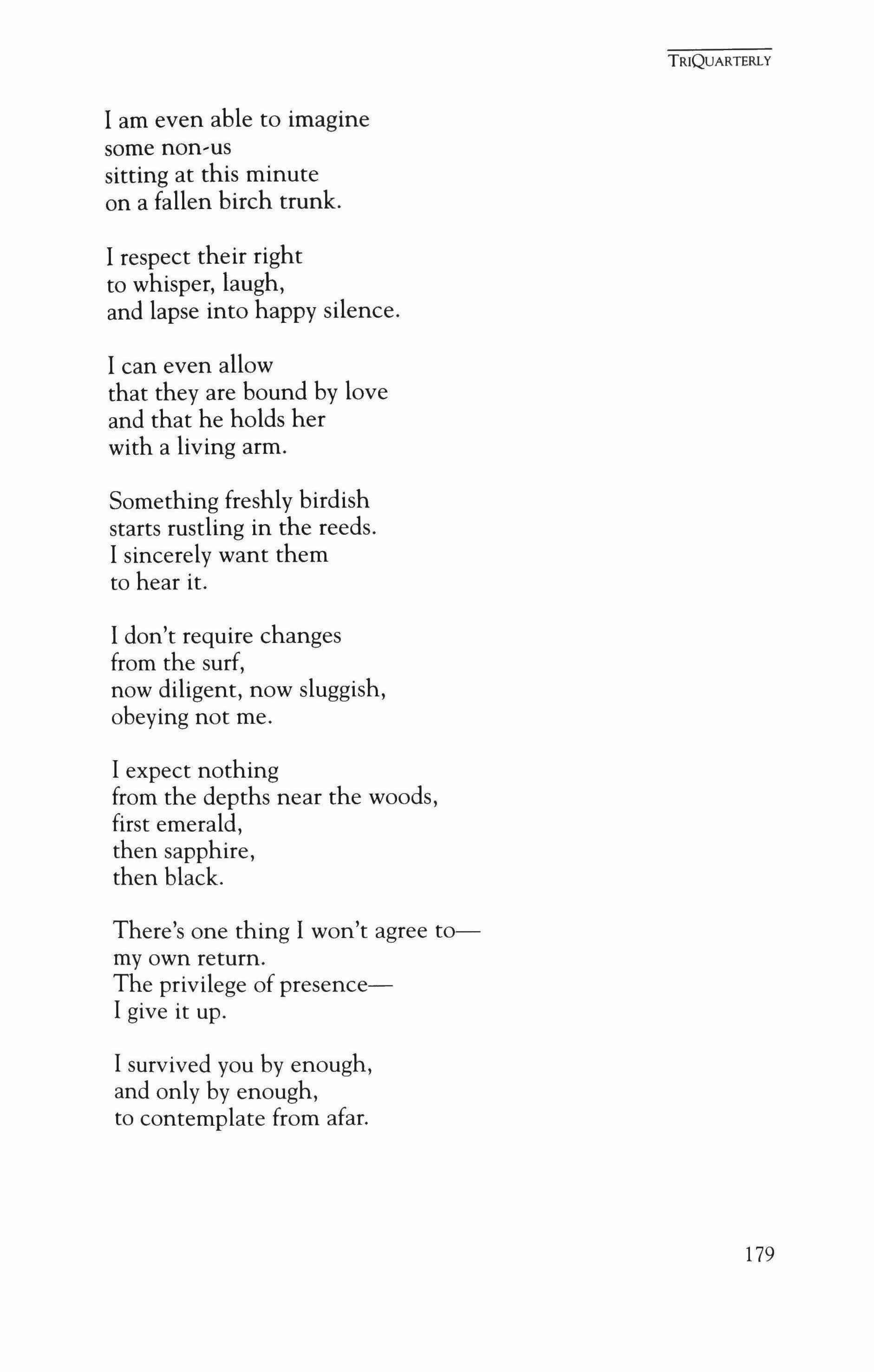
I am even able to imagine some non-us sitting at this minute on a fallen birch trunk.
I respect their right to whisper, laugh, and lapse into happy silence.
I can even allow that they are bound by love and that he holds her with a living arm.
Something freshly birdish starts rustling in the reeds. I sincerely want them to hear it.
I don't require changes from the surf, now diligent, now sluggish, obeying not me.
I expect nothing from the depths near the woods, first emerald, then sapphire, then black.
There's one thing I won't agree tomy own return. The privilege of presenceI give it up.
I survived you by enough, and only by enough, to contemplate from afar.
TRIQUARTERLY
179
Magpie
Alan Michael Parker
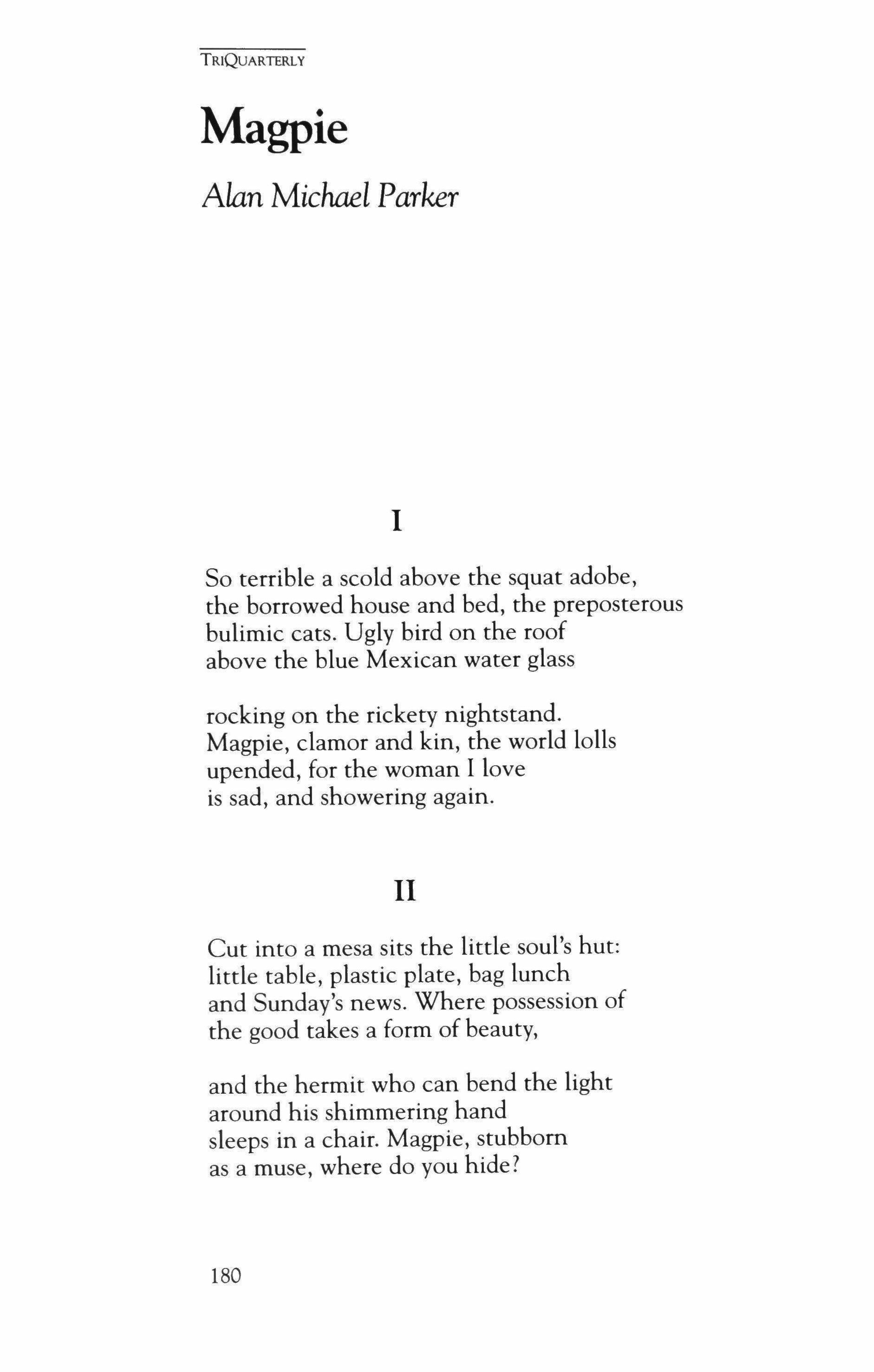
I
So terrible a scold above the squat adobe, the borrowed house and bed, the preposterous bulimic cats. Ugly bird on the roof above the blue Mexican water glass
rocking on the rickety nightstand. Magpie, clamor and kin, the world lolls upended, for the woman I love is sad, and showering again.
II
Cut into a mesa sits the little soul's hut: little table, plastic plate, bag lunch and Sunday's news. Where possession of the good takes a form of beauty,
and the hermit who can bend the light around his shimmering hand sleeps in a chair. Magpie, stubborn as a muse, where do you hide?
TRIQUARTERLY
180
Particle and wave, ball and chain, the body tethered to the body. A magpie flies in the empty, crooked palace of the sky, as everything falls west with everything we say, sliding into hieroglyph sidelong as a coachwhip snake, sibilant and obsolete.

Of appetite, and what I know cannot be mine. Of indiscriminance. Of the magpie on the roof, who will eat what there is, and in whose call our lives are satirized. The woman I love dries her hair, leaning into a towel, persistent as a wish, in this borrowed house.
TRIQUARTERLY III
IV
181
Two Poems
Taslima Nosteen
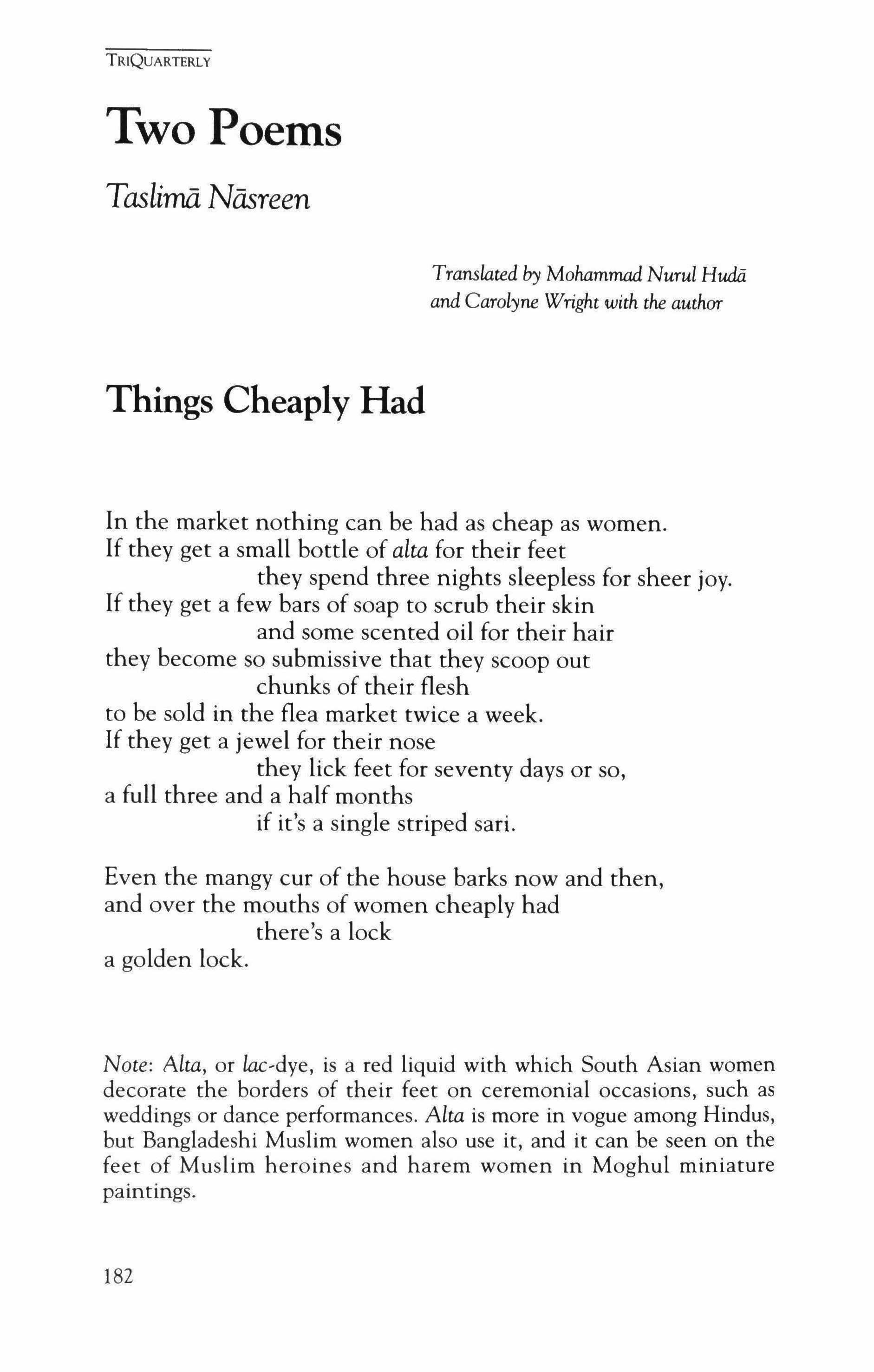 Translated by Mohammad Nurul Hudii and Carolyne Wright with the author
Translated by Mohammad Nurul Hudii and Carolyne Wright with the author
Things Cheaply Had
In the market nothing can be had as cheap as women. If they get a small bottle of alta for their feet they spend three nights sleepless for sheer joy. If they get a few bars of soap to scrub their skin and some scented oil for their hair they become so submissive that they scoop out chunks of their flesh to be sold in the flea market twice a week. If they get a jewel for their nose they lick feet for seventy days or so, a full three and a half months if it's a single striped sari.
Even the mangy cur of the house barks now and then, and over the mouths of women cheaply had there's a lock a golden lock.
Note: Alta, or lac�dye, is a red liquid with which South Asian women decorate the borders of their feet on ceremonial occasions, such as weddings or dance performances. Alta is more in vogue among Hindus, but Bangladeshi Muslim women also use it, and it can be seen on the feet of Muslim heroines and harem women in Moghul miniature paintings.
TRIQUARTERLY
182
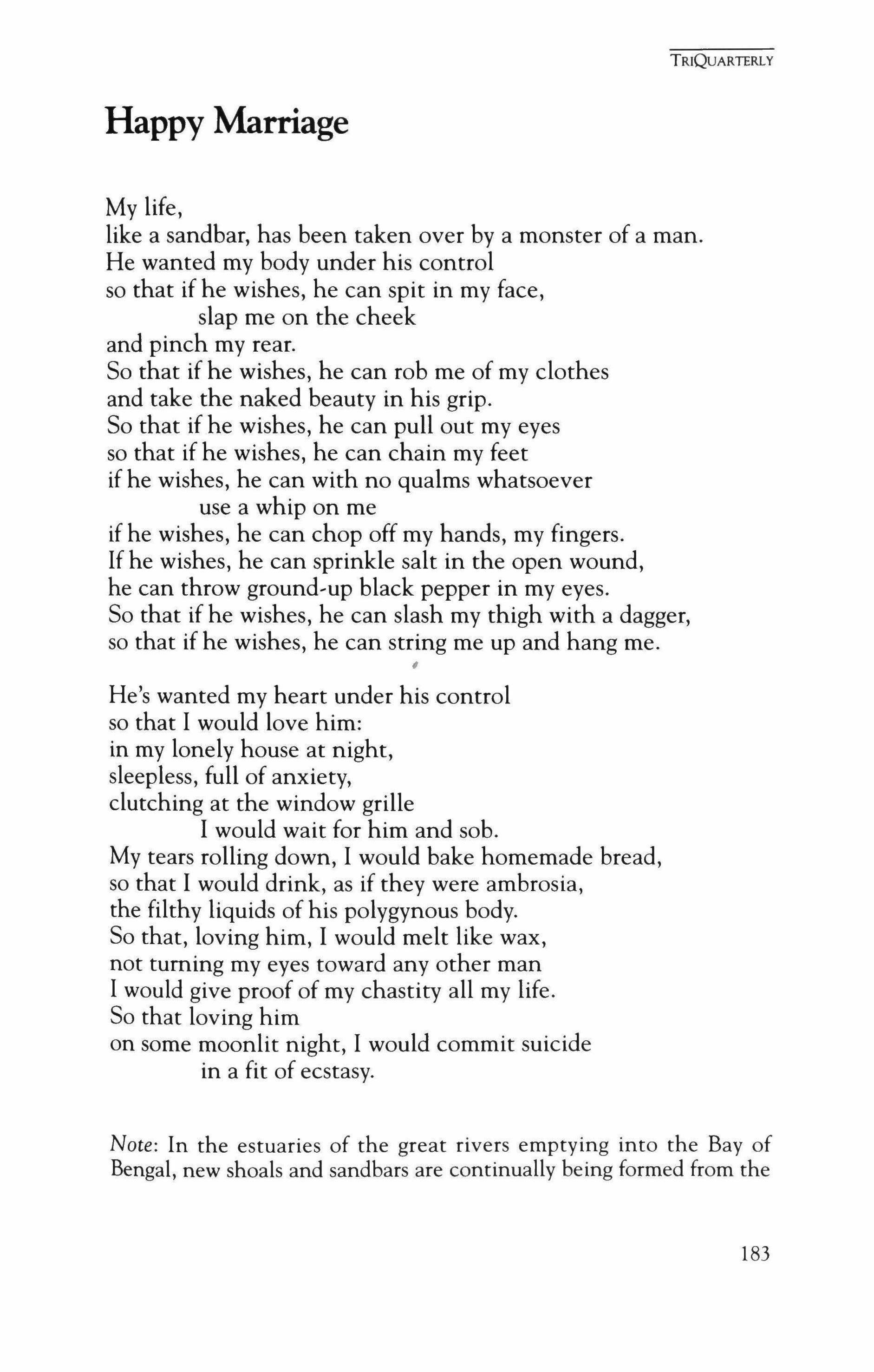
Happy Marriage
My life, like a sandbar, has been taken over by a monster of a man. He wanted my body under his control so that if he wishes, he can spit in my face, slap me on the cheek and pinch my rear. So that if he wishes, he can rob me of my clothes and take the naked beauty in his grip. So that if he wishes, he can pull out my eyes so that if he wishes, he can chain my feet if he wishes, he can with no qualms whatsoever use a whip on me if he wishes, he can chop off my hands, my fingers. If he wishes, he can sprinkle salt in the open wound, he can throw ground-up black pepper in my eyes. So that if he wishes, he can slash my thigh with a dagger, so that if he wishes, he can string me up and hang me.
He's wanted my heart under his control so that I would love him: in my lonely house at night, sleepless, full of anxiety, clutching at the window grille I would wait for him and sob. My tears rolling down, I would bake homemade bread, so that I would drink, as if they were ambrosia, the filthy liquids of his polygynous body. So that, loving him, I would melt like wax, not turning my eyes toward any other man I would give proof of my chastity all my life. So that loving him on some moonlit night, I would commit suicide in a fit of ecstasy.
Note: In the estuaries of the great rivers emptying into the Bay of Bengal, new shoals and sandbars are continually being formed from the
TRIQUARTERLY
I
183
TRIQUARTERLY

tons of silt washed downstream every year. In overpopulated Bangladesh, these formations are zealously watched: as soon as they rise even a fraction above the normal tideline, they are settled and cultivated. The first to take possession is the owner. It was from such exposed and fragile islands that an estimated 139,000 people were washed away in the devastating cyclone and tidal bore of April 29�30, 1991.
184
Jamaican Bough
The Dwelling
Caroline Finkelstein

So many times I offered my house, painted the big walls white for you and set out bowls where Oriental birds showed in the concavities. I gave you long halls of wide boards and the windows, doors, and the height of the rooms were more invitations: come in, observe, sit still; even disapprove if you have to.
And in the bedroom, so many times, I was sure you didn't hear me because I couldn't read your looks, but listen, I was like that then, even the dog resting on the rug worried me; maybe he was a sick dog.
I wanted you to like the roses.
Finally, I loved you. In the humid air of late summer, it wasn't easy. You lay next to me asleep and I hated you asleep and I hated your silent, withheld body.
Then I walked toward the garden dreaming invisible hands weeding the perfect gravel paths you made and I see now how we abetted one another, forcing beauty to control imagination. I am no longer young.
Something releases the wind that flickers the lights. The walls begin to fail and cool air enters. Can you see me?
TRIQUARTERLY
185
Two Poems
Kay Ryan

A Certain Kind of Eden
It seems like you could, but you can't go back and pull the roots and runners and replant. It's all too deep for that. You've overprized intention, have mistaken any bent you're given for control. You thought you chose the bean and chose the soil. You even thought you abandoned one or two gardens. But those things keep growing where we put themif we put them at all. A certain kind of Eden holds us thrall. Even the one vine that tendrils out alone in time turns on its own impulse, twisting back down its upward course a strong and then a stronger rope, the greenest saddest strongest kind of hope.
TRIQUARTERLY
186

Glass Slippers
Despite the hard luck of the ugly stepsisters, most people's feet will fit into glass slippers. The arch rises, the heel tapers, the toes align in descending order and the whole thing slides without talcum powder into the test slipper. We can shape to the dreams of another; we are eager to yield. It is a mutual pleasure to the holder of the slipper and to the foot held. It is a singular moment-tender, improbable, and as yet unclouded by the problems that hobble the pair when they discover that the matching slipper isn't anywhere, nor does the bare foot even share the shape of the other. When they compare, the slippered foot makes the other odder: it looks like a hoof. So many miracles don't start far back enough.
TRIQUARTERLY
187
Video
Charles Wasserburg

So, through the lithic canyons (old filmstock rinsing the clay of riverbanks to violet), the finned convertible glides through New Mexico. The Super-S is new, it whirs excitedly in your father's grasp. You think you hear him urging her "loosen up," "go for it." Her hair in a shellacked black hive stiff as her smile, she squints toward you, the lens probes, closing in. She shifts and waves. Her lips quiver.
Outside a diner now, your father, radiant in tennis whites, is mugging: just one stop before the marriage goes extinct. Their figures puppet-stutter backwards, forwards, it will not change, distracted, boyish, he will not change, the tape squeals forward, you clutch
TRIQUARTERLY
188
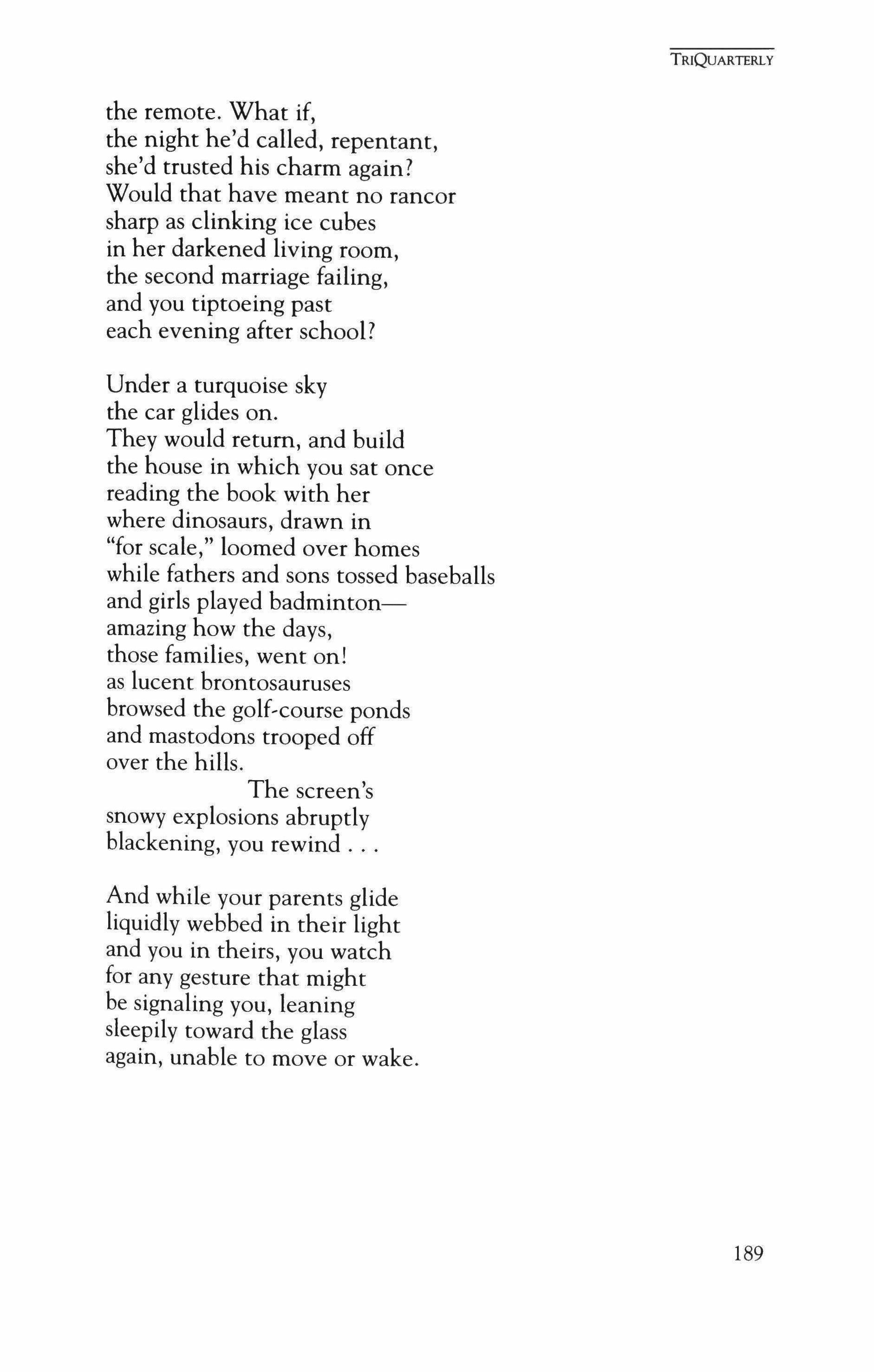
the remote. What if, the night he'd called, repentant, she'd trusted his charm again? Would that have meant no rancor sharp as clinking ice cubes in her darkened living room, the second marriage failing, and you tiptoeing past each evening after school?
Under a turquoise sky the car glides on. They would return, and build the house in which you sat once reading the book with her where dinosaurs, drawn in "for scale," loomed over homes while fathers and sons tossed baseballs and girls played badmintonamazing how the days, those families, went on! as lucent brontosauruses browsed the golf-course ponds and mastodons trooped off over the hills.
The screen's snowy explosions abruptly blackening, you rewind
And while your parents glide liquidly webbed in their light and you in theirs, you watch for any gesture that might be signaling you, leaning sleepily toward the glass again, unable to move or wake.
TRIQUARTERLY
189
Three Poems
Dean Shavit
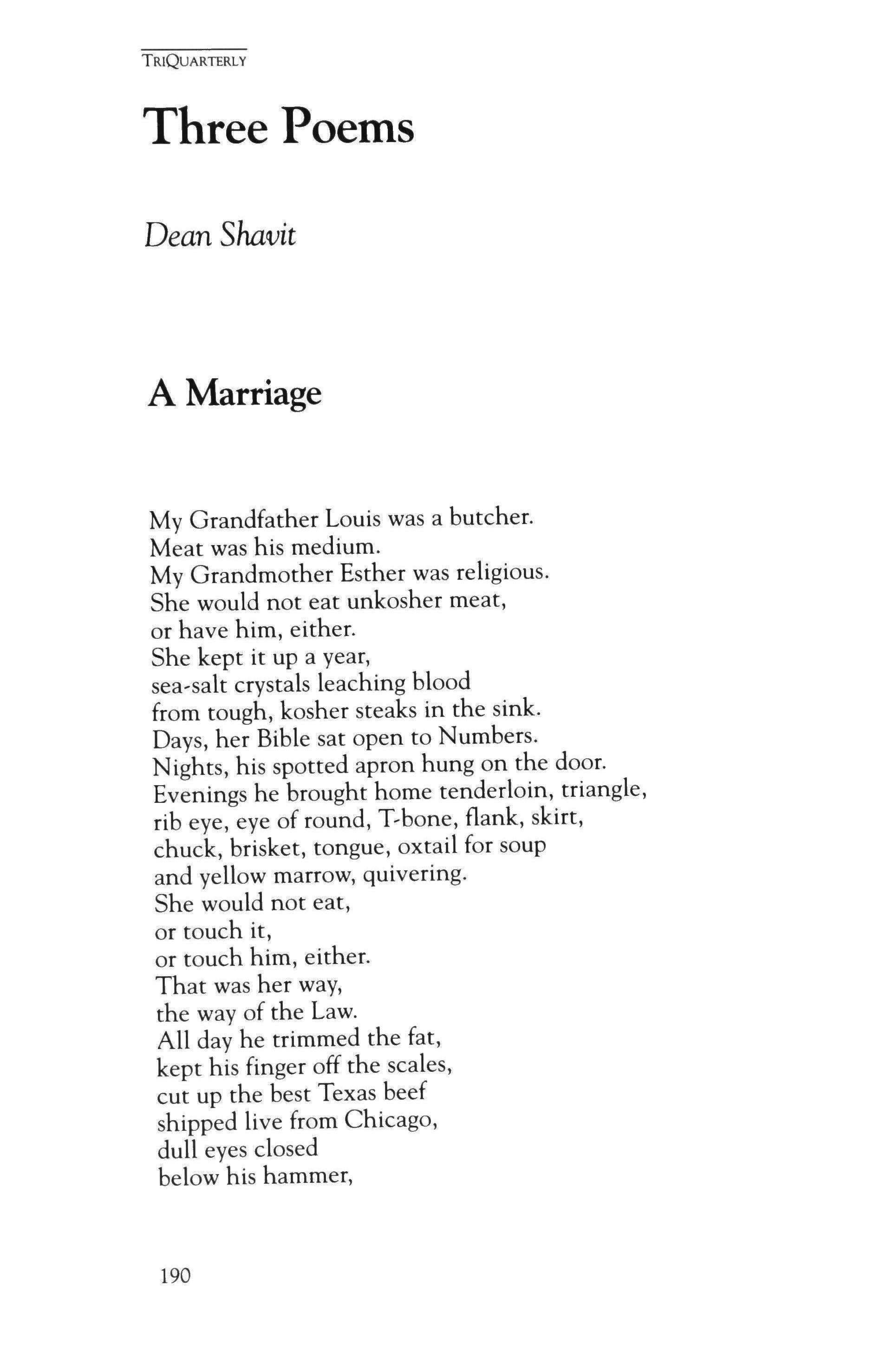
A Marriage
My Grandfather Louis was a butcher. Meat was his medium. My Grandmother Esther was religious. She would not eat unkosher meat, or have him, either. She kept it up a year, sea-salt crystals leaching blood from tough, kosher steaks in the sink. Days, her Bible sat open to Numbers. Nights, his spotted apron hung on the door. Evenings he brought home tenderloin, triangle, rib eye, eye of round, T,bone, flank, skirt, chuck, brisket, tongue, oxtail for soup and yellow marrow, quivering. She would not eat, or touch it, or touch him, either. That was her way, the way of the Law. All day he trimmed the fat, kept his finger off the scales, cut up the best Texas beef shipped live from Chicago, dull eyes closed below his hammer, 190
TRIQUARTERLY
skinner's knife slipped between the hides. All night he thought of ways and words to break her, until he weighed what she brought home, exposed the shochet*, "a cheat." They ate lobster, Alaskan crab, prawns, catfish, spareribs, pig's feet, bacon, rabbit, and Florida shark steaks, quivering. My Grandfather was a butcher, meat was his medium until he bought a store. One day he boxed his apron and shelved it in the closet. One day she closed her Bible on his cleaver, marked her ending place.
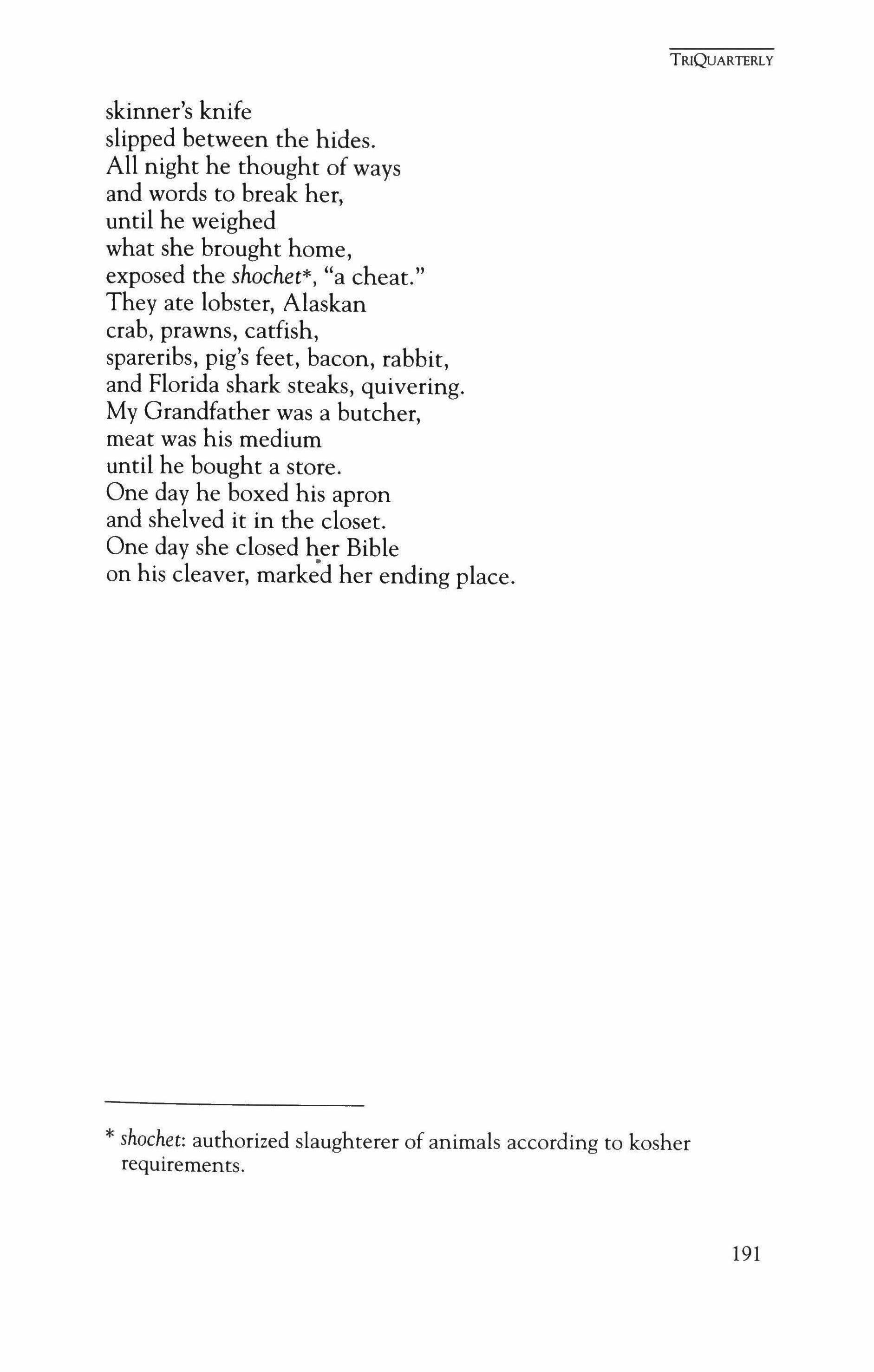
* shochet: authorized slaughterer of animals according to kosher requirements.
TRIQUARTERLY
191
In Her Kitchen

The creases in my father's mother's hand curl back, the lifeline of her palm pinned to the ball of her thumb,
a tiny pit engraved by knitting needles, tacks, and knives. Her blurring eyes
hover, pleading: eat. At the peak of morning, she grinds turkey thighs for hamburger, whips
egg whites for mayonnaise, her perfume garlic, dill and pepper. So many years of grandmotherly whispers, watermelon pickles in a low glass bowl, an apple peel coiling on the counter like a snake. Shhh,
she knows a secret: when to add a pinch of sage, when to waive the chicken foot.
Look, potato latkes, flour, spaghetti squash. A lump of sour cream floating in her bloodred borscht.
TRIQUARTERLY
192
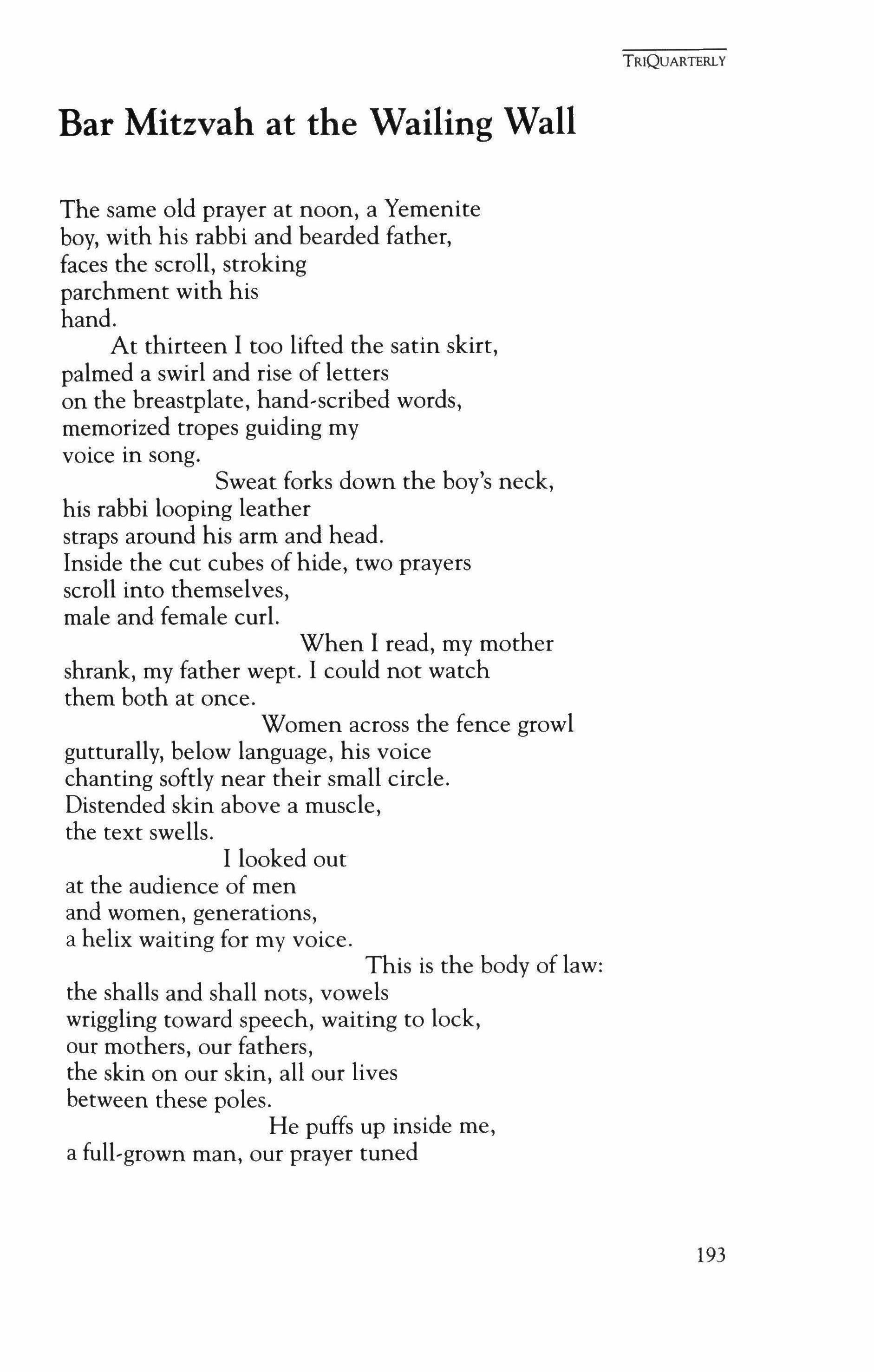
Bar Mitzvah at the Wailing Wall
The same old prayer at noon, a Yemenite boy, with his rabbi and bearded father, faces the scroll, stroking parchment with his hand.
At thirteen I too lifted the satin skirt, palmed a swirl and rise of letters on the breastplate, hand,scribed words, memorized tropes guiding my voice in song.
Sweat forks down the boy's neck, his rabbi looping leather straps around his arm and head. Inside the cut cubes of hide, two prayers scroll into themselves, male and female curl.
When I read, my mother shrank, my father wept. I could not watch them both at once.
Women across the fence growl gutturally, below language, his voice chanting softly near their small circle. Distended skin above a muscle, the text swells.
I looked out at the audience of men and women, generations, a helix waiting for my voice.
This is the body of law: the shalls and shall nots, vowels wriggling toward speech, waiting to lock, our mothers, our fathers, the skin on our skin, all our lives between these poles.
He puffs up inside me, a full,grown man, our prayer tuned
TRIQUARTERLY 193
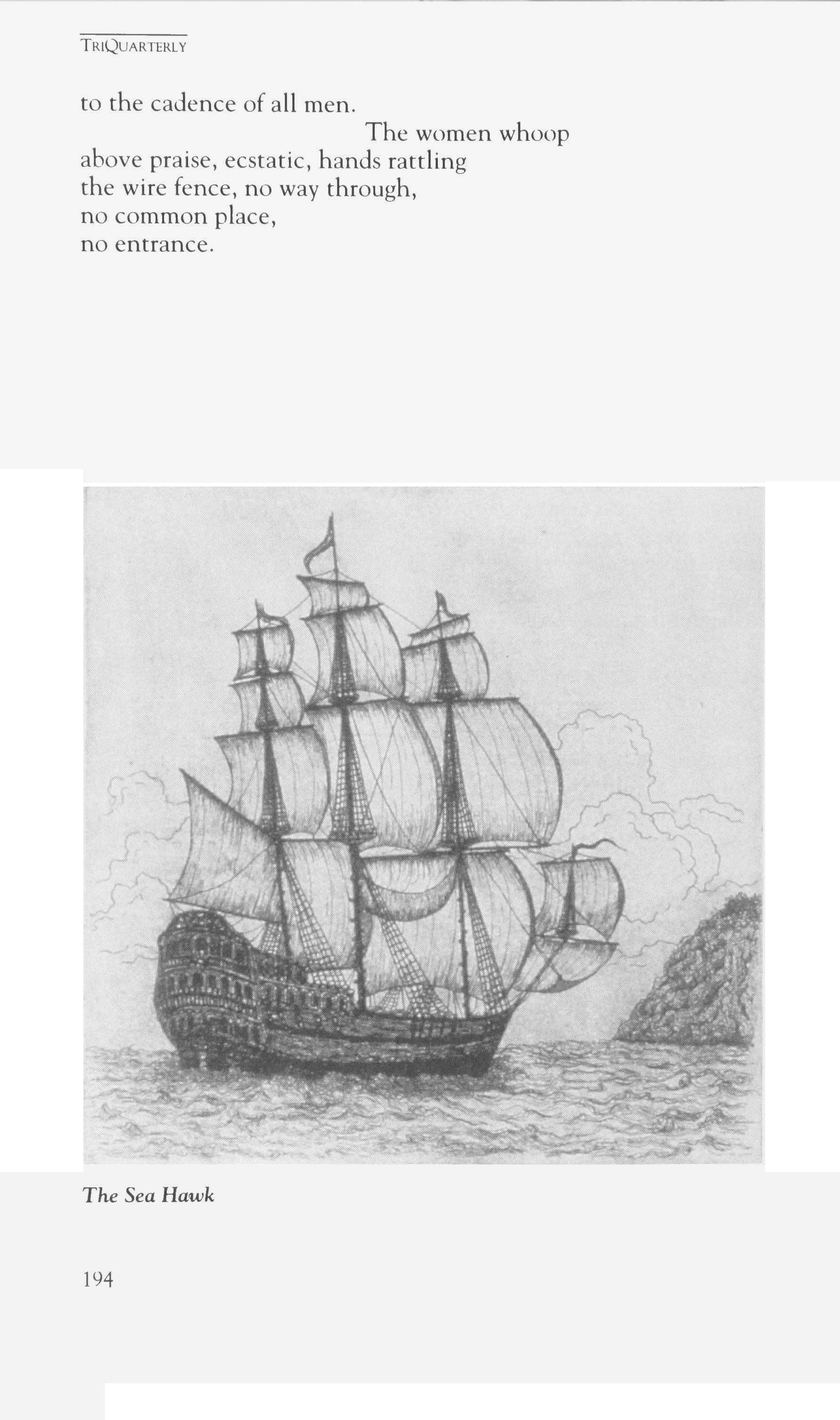
to the cadence of all men.
The women whoop above praise, ecstatic, hands rattling the wire fence, no way through, no common place, no entrance.
TR1QUARTERLY
194
The Sea Hawk
Three Poems
Alicia Ostriker

Saturday Night
Music is most sovereign because more than anything else, rhythm and harmony find their way to the inmost soul and take strongest hold upon it, bringing with them and imparting grace.
-Plato, The Republic
The cranes are flying
-Chekhov
And here it comes: around the world, In Chicago, Petersburg, Tokyo, the dancers Hit the floor running (the communal dance floor
Here, there, at intervals, sometimes paved, Sometimes rotted linoleum awash in beer, Sometimes a field across which the dancers streak
Like violets across grass, sometimes packed dirt In a township of corrugated metal roofs) And what was once prescribed ritual, the profuse
TRIQUARTERLY
195
TRIQUARTERLY
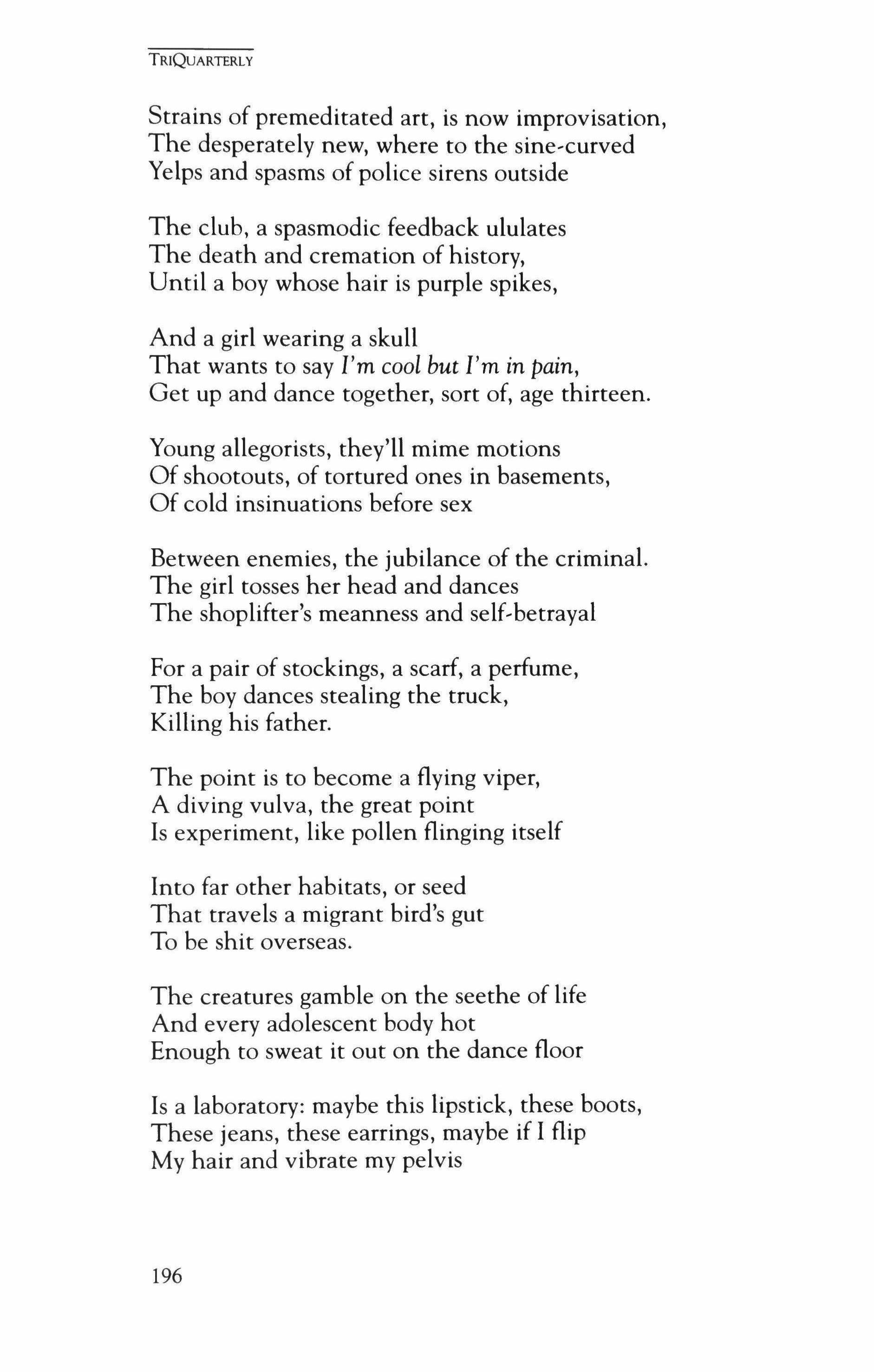
Strains of premeditated art, is now improvisation, The desperately new, where to the sine-curved Yelps and spasms of police sirens outside
The club, a spasmodic feedback ululates
The death and cremation of history, Until a boy whose hair is purple spikes,
And a girl wearing a skull
That wants to say I'm cool but I'm in pain, Get up and dance together, sort of, age thirteen.
Young allegorists, they'll mime motions Of shootouts, of tortured ones in basements, Of cold insinuations before sex
Between enemies, the jubilance of the criminal. The girl tosses her head and dances
The shoplifter's meanness and self-betrayal
For a pair of stockings, a scarf, a perfume, The boy dances stealing the truck, Killing his father.
The point is to become a flying viper, A diving vulva, the great point Is experiment, like pollen flinging itself
Into far other habitats, or seed That travels a migrant bird's gut To be shit overseas.
The creatures gamble on the seethe of life And every adolescent body hot Enough to sweat it out on the dance floor
Is a laboratory: maybe this lipstick, these boots, These jeans, these earrings, maybe if I flip
My hair and vibrate my pelvis
196
TRIQUARTERLY
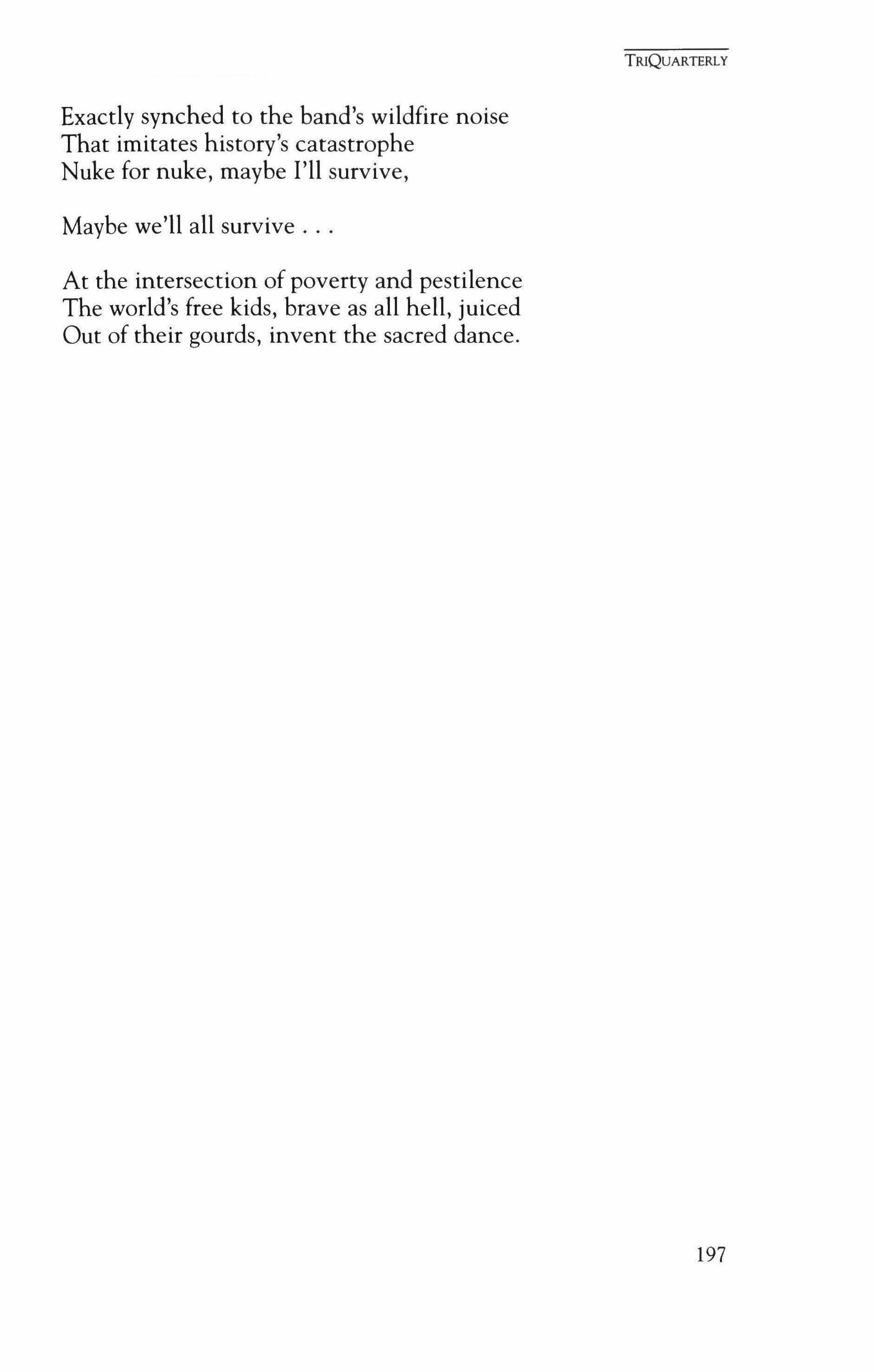
Exactly synched to the band's wildfire noise
That imitates history's catastrophe
Nuke for nuke, maybe I'll survive,
Maybe we'll all survive
At the intersection of poverty and pestilence
The world's free kids, brave as all hell, juiced Out of their gourds, invent the sacred dance.
197
Disco
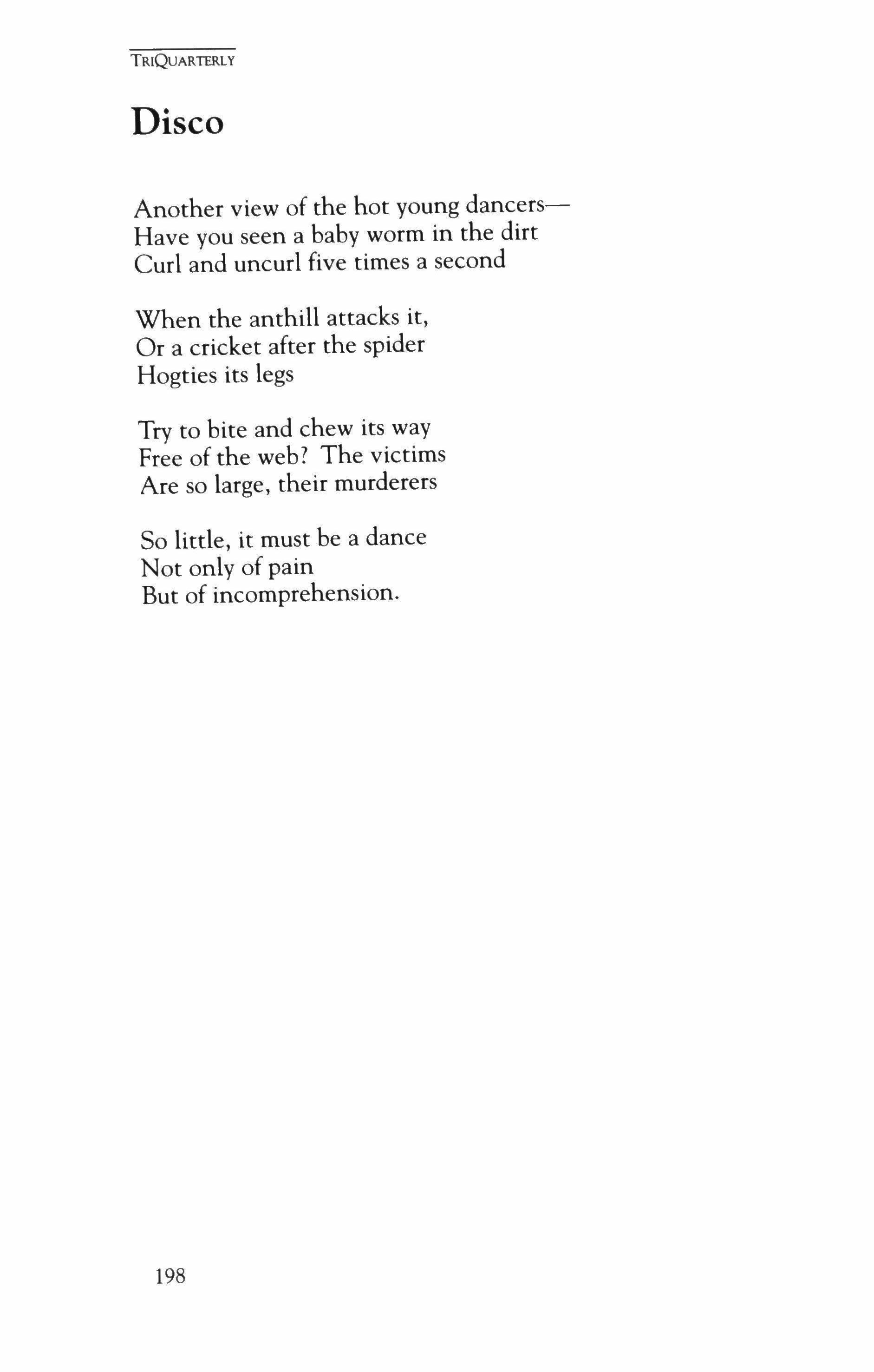
Another view of the hot young dancersHave you seen a baby worm in the dirt Curl and uncurl five times a second
When the anthill attacks it, Or a cricket after the spider Hogties its legs
Try to bite and chew its way Free of the web? The victims Are so large, their murderers
So little, it must be a dance Not only of pain But of incomprehension.
TRIQUARTERlY
198
At the Van Gogh Museum
for Rebecca and Eve
No, we say-·it wouldn't have looked like that To us-but it did look like that
To Vincent Van Gogh, we admit And when we look at it, A whole street painted yellow From the wide pear-colored gutter In sketchy curly brushstrokes, like peelings, To the sidewalks and buildings With their pinkish awnings
And potato or apricot shuttered windows, We see thick different yellows, Squash tinted and clear Citron, then when we keep
Looking we see it isn't the afternoon Light-which wouldn't have looked like that Ever-there are no shadows, no Shadows in the painting! We see it's that For him a yellow light Source came from within, Welled from within everything, And was pushing up, up Through the willing surfaces.
We see the yellowest is Vincent's house On the comer, the one Painted with the purest Most childlike passion, We see its windowpanes Black, smack In the center of the canvas Even blacker than the navy sky.

Vincent's House in Aries, Riksmuseum Vincent Van Gogh, Amsterdam
TRIQUARTERLY
199
Peasant Fare: At the Museum of Fine Arts
Kevin Bowen

Why in these paintings of the Middle Ages the peasants are so plump and healthy, always posed in inns and taverns drinking, grabbing loaves of bread in dark, knotted hands stained with blood, large with work?
The men and women drown in conversation, nod with lustful eyes, or plot as they brush away gobs of beef that hang above their open mouths. Off to the side, the mandatory dwarf or giant who plays with the children sits. It's as if the painter thought the peasants' life only a homelier version of the nobles', that the bounty of the good old days spread to plain and simple folk who made it. More likely, the painter was well paid for his subterfuge. By the age of ten half we know were dead; the rest, beaten and worked to stupor.
TRIQUARTERLY
200

The women raped and sold on a regular basis, and a whole science of torture for doubters. All this missing from these paintings. Only far off in a corner a look of treason beneath a cap, in green eyes, a hint of truth, the pure and honest terror.
TRIQl ARTERLY
201
Sentinels of Notre Dame
Street Scenes
Marilyn Hacker

IWool scarf and leather jacket weather on the rue de Turenne this June, any June.
Rain again, or just a fine film of construction workers' dust from the new posh shop,
front being installed downstairs, or the roofers across the street? Dust. Tentative sun
cheers the freshly-scaled facade, then a cloud passes, and it fades.
Three Algerian
men in blue denim wait for the bus, while a slim black woman with a red briefcase
shelters in the door' way of the upscale children's clothing store, not dressed for the wind.
TR1QUARTERLY
202
The Home Visitor from the Secu knocks politely next door, politely's let in.
The names of clouds are more relevant than the names of flowers. Wind,tattered roses
lean over the stairs going down to the Quai Saint,Bernard, where it's too cold to go, but the young couple opposite have a window box: yellow and purple pansies.
Now the rain. Thunder, a real storm-will my salmon begonia breathe, or be battered?
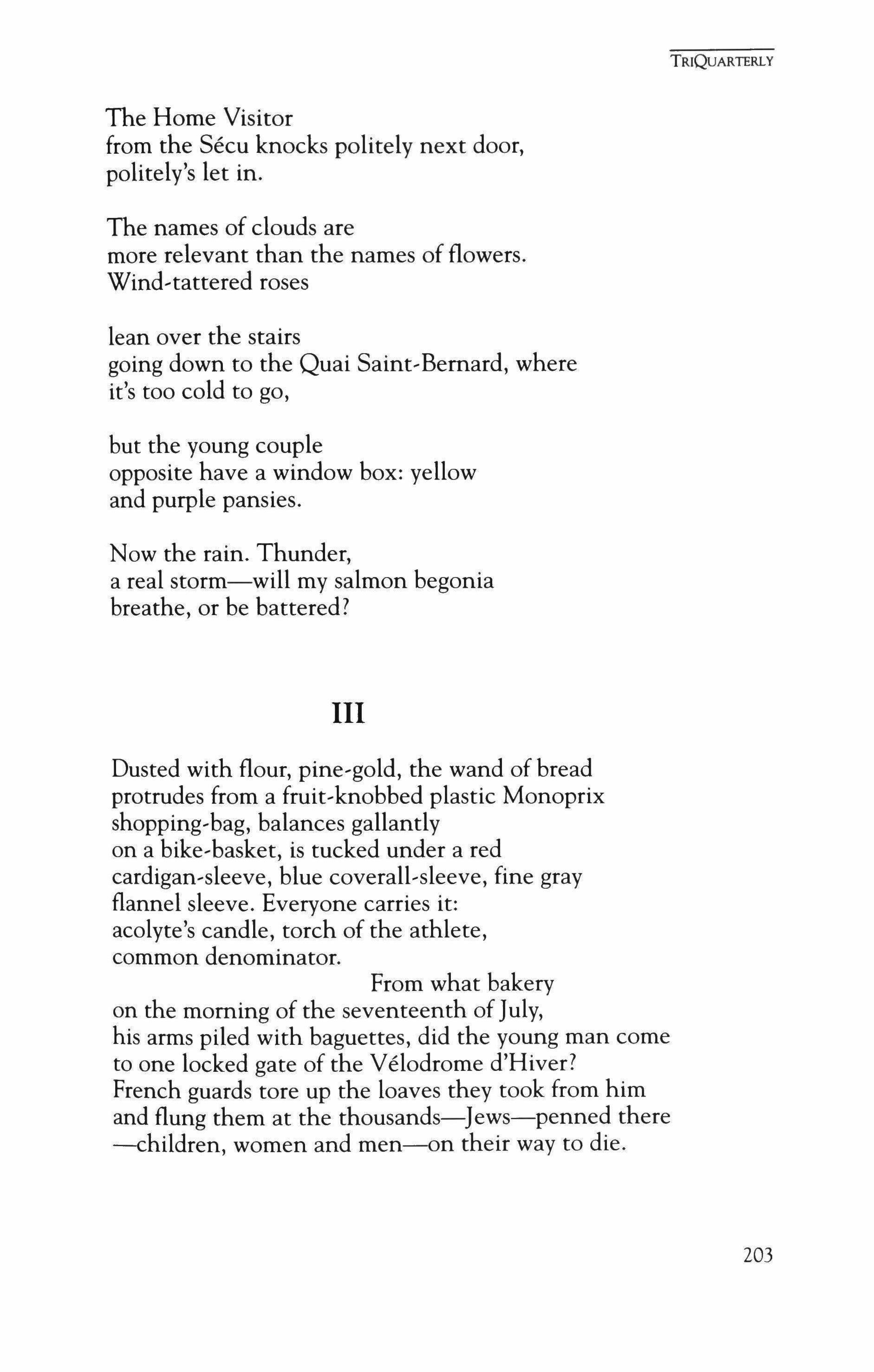
Dusted with flour, pine-gold, the wand of bread protrudes from a fruit-knobbed plastic Monoprix shopping-bag, balances gallantly on a bike-basket, is tucked under a red cardigan-sleeve, blue coverall,sleeve, fine gray flannel sleeve. Everyone carries it: acolyte's candle, torch of the athlete, common denominator.
From what bakery on the morning of the seventeenth ofJuly, his arms piled with baguettes, did the young man come to one locked gate of the Velodrome d'Hiver?
French guards tore up the loaves they took from him and flung them at the thousands-Jews-penned there -children, women and men-on their way to die.
III
TRIQUARTERLY 203

Seven-thirty and lightly the rain continues. Yes I am one of them and also I am not one of them: late shoppers buying what they forgot in the morning, tired workers jostling from various venues, kids on the loose to loaf. Waiters place menus on outdoor tables they've just optimistically set. The Germans eat early, the younger British eat late, but not outdoors in the rain. Umbrellas in use joust on the narrow sidewalk: the shoppers pass the workers pass the tourists pass the waiters stay put. I am a shopper going home which is where I've come from work, which is where I'll later wait on myself. I'm a stranger who'll be somewhere else when thesatcheled children file back to class.
VThe German tour bus pulls out of the sleepy street. No one is sorry.
After group dinner they sang group songs in German under our windows.
Neighbors remember songs in the street like that in nineteen forty-one.
They're European brothers and sisters now, but they pull their curtains.
Two streets over, some neighbors didn't come back from the Vel d'Hiv, Draney.
TRIQUARTERLY
IV
204
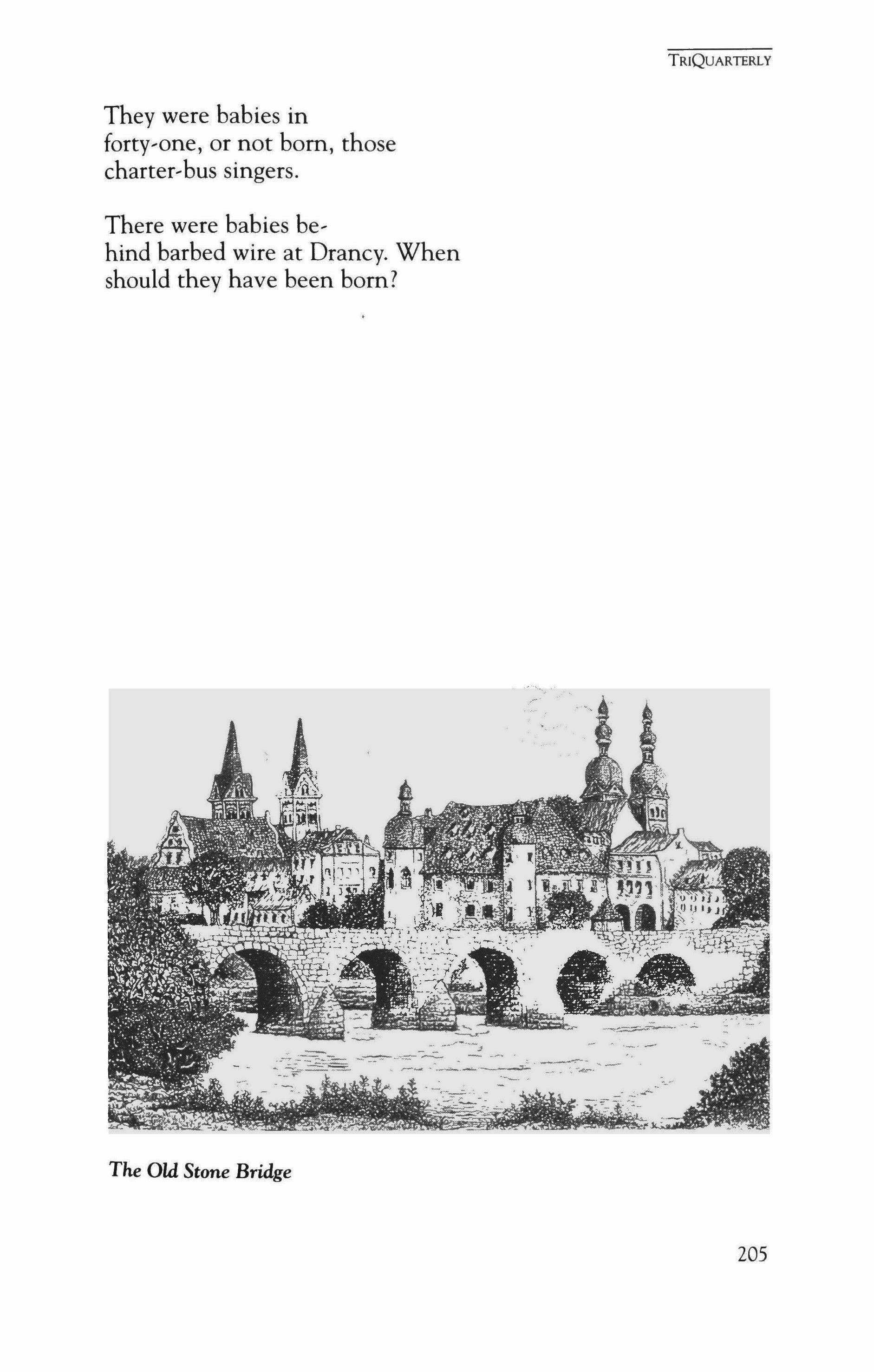
They were babies in forty-one, or not born, those charter-bus singers.
There were babies be, hind barbed wire at Draney. When should they have been born?
TRIQUARTERLY
205
The Old Stone Bridge
Two Poems
Steven Cramer
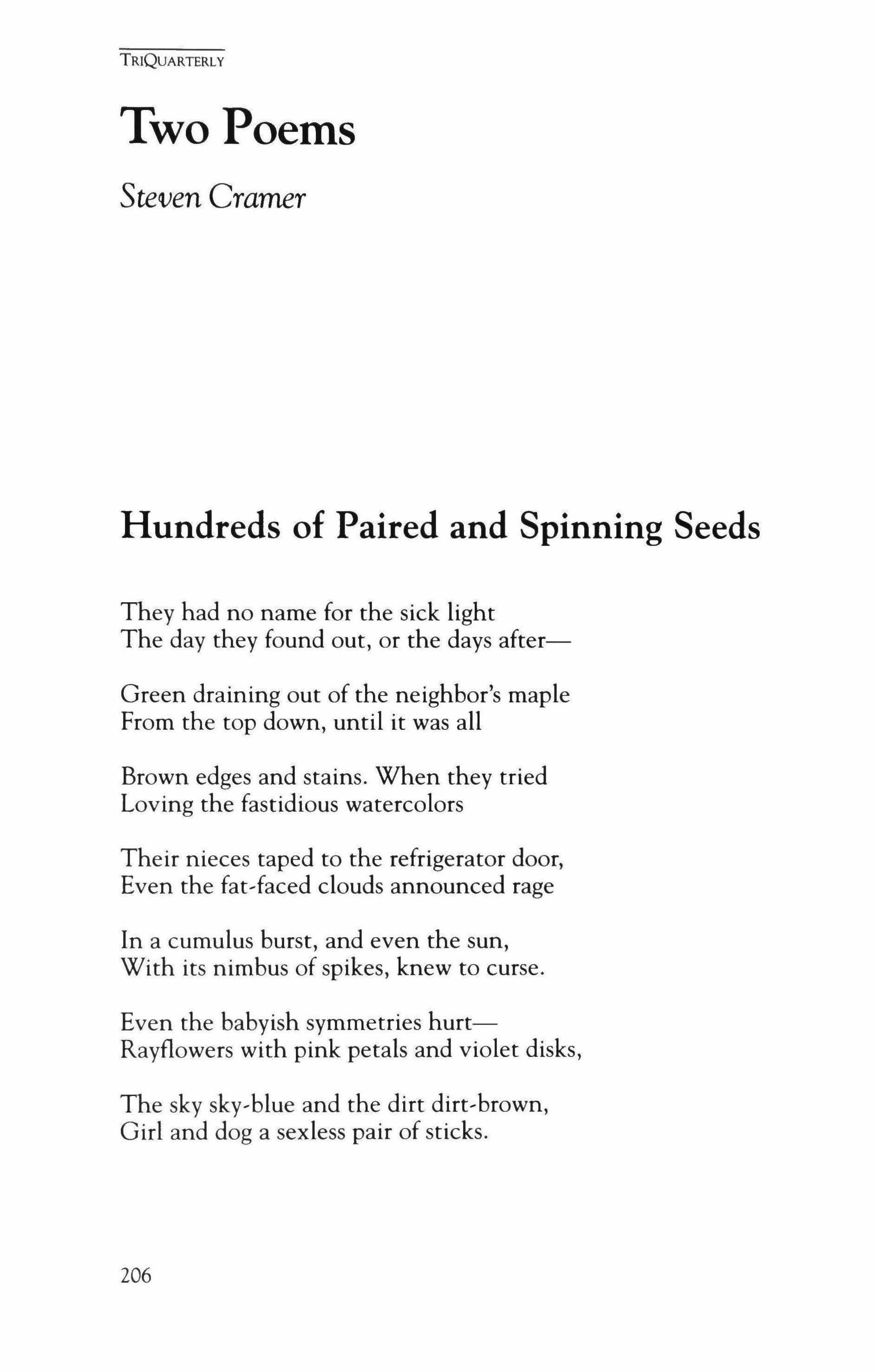
Hundreds of Paired and Spinning Seeds
They had no name for the sick light
The day they found out, or the days after-
Green draining out of the neighbor's maple From the top down, until it was all
Brown edges and stains. When they tried Loving the fastidious watercolors
Their nieces taped to the refrigerator door, Even the fat-faced clouds announced rage
In a cumulus burst, and even the sun, With its nimbus of spikes, knew to curse.
Even the babyish symmetries hurtRayflowers with pink petals and violet disks,
The sky sky-blue and the dirt dirt-brown, Girl and dog a sexless pair of sticks.
TRIQUARTERLY
206

And still they stared and stared, Until she exhaled such a bodily grief
They called it: After the Miscarriage, Or Not the End of the World. That was before
The maple flooded their neighbor's porch With hundreds of paired and spinning seeds.
TRIQUARTERLY
207

The Long Haul
Then the morning arrived, and the idea
Of you surfaced, almond-shaped, on the ultrasound. I looked but wasn't sure of what I saw, Like the faithless who peer into their hands. But you, gene braiding gene, helix Of filaments, mote of multiplying cells, This is your trimester of blindness, After which your salmon,eyes narrow. In you The ocean rises, establishing memory. You're passive as eelgrass, sleek as a seal, And Mother's at best two watery syllables, a radio wave. How I hope Father won't be that grittier sound, The male bellow I shrank from,
As from the stink of live bait. Asleep, I've kissed you. Asleep, I've stroked your hair. I've heard the heartbeat where there is no heart, A wish wish wish at two beats per second. I've even troubled you into a troubled child, Child eyeing the world through a straw When the world's bad company-
Oh, leave it to grown,ups to press Thumb dents into your fontanel, To awaken shame, to scare up Numbness, to follow you
The way the moon follows on long drives, Unveiling more of its funhouse face each night. Little nuance, don't perfect your courage yet, The time will come to tumble downstairs.
Don't cope as talking dolls cope, button,eyed vacancies You are the self Untouched by fibs about the self.
Dividing inside you, wrinkle of our flesh, There's sadness and happiness enough for the long haul.
TRIQUARTERLY
208
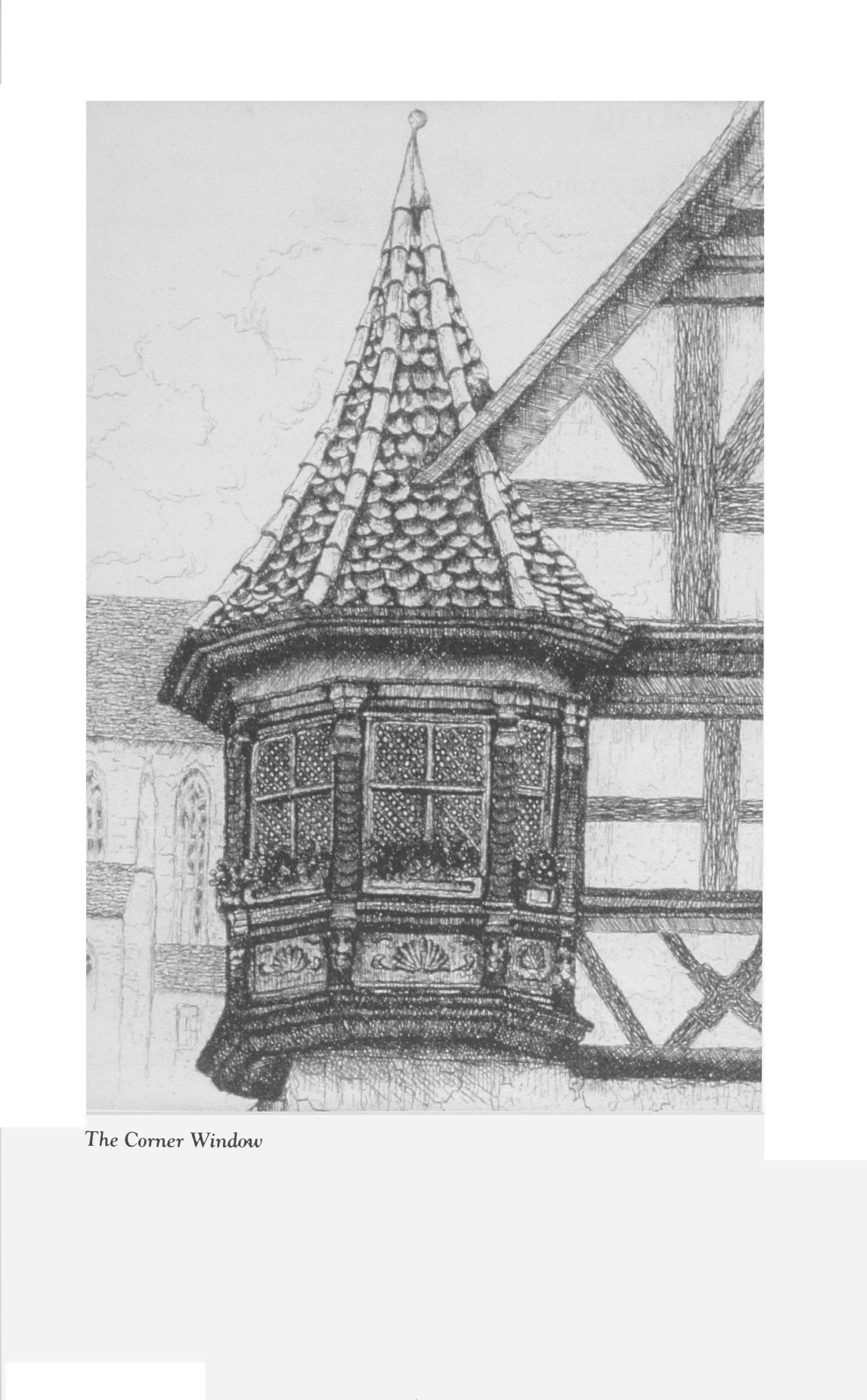
The Comer Window
t .r'
Bunting
Linda Gregerson

"They're sleeping," said Emma, "they're very tired," as the footage came on again, child after child in the chalk embrace of chemical death. We saw again the elegant economy with which God sculpts the infant face. Not one not cast in heaven's mold. Not one -and how could this be true ?-dis, figured by what brought them here, by death throe and the bland assimilations of the evening news, by lunatic cal, culation or malevolence, which launched the gas,
TRIQUARTERLY
210
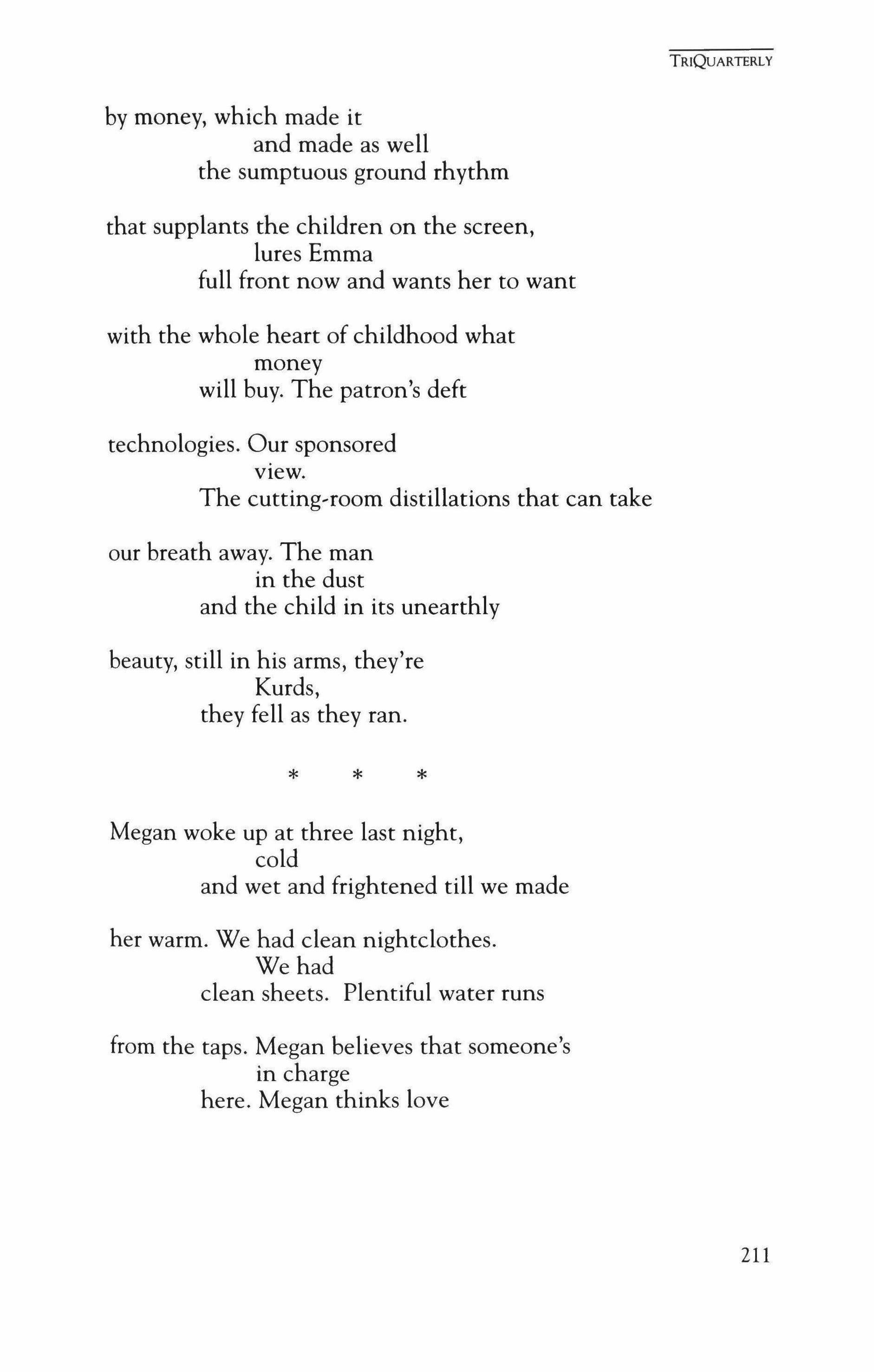
by money, which made it and made as well the sumptuous ground rhythm that supplants the children on the screen, lures Emma full front now and wants her to want with the whole heart of childhood what money will buy. The patron's deft technologies. Our sponsored view. The cutting,room distillations that can take our breath away. The man in the dust and the child in its unearthly beauty, still in his arms, they're Kurds, they fell as they ran. *
Megan woke up at three last night, cold and wet and frightened till we made her warm. We had clean nightclothes. We had clean sheets. Plentiful water runs from the taps. Megan believes that someone's in charge here. Megan thinks love
* *
TRIQUARTERLY 211
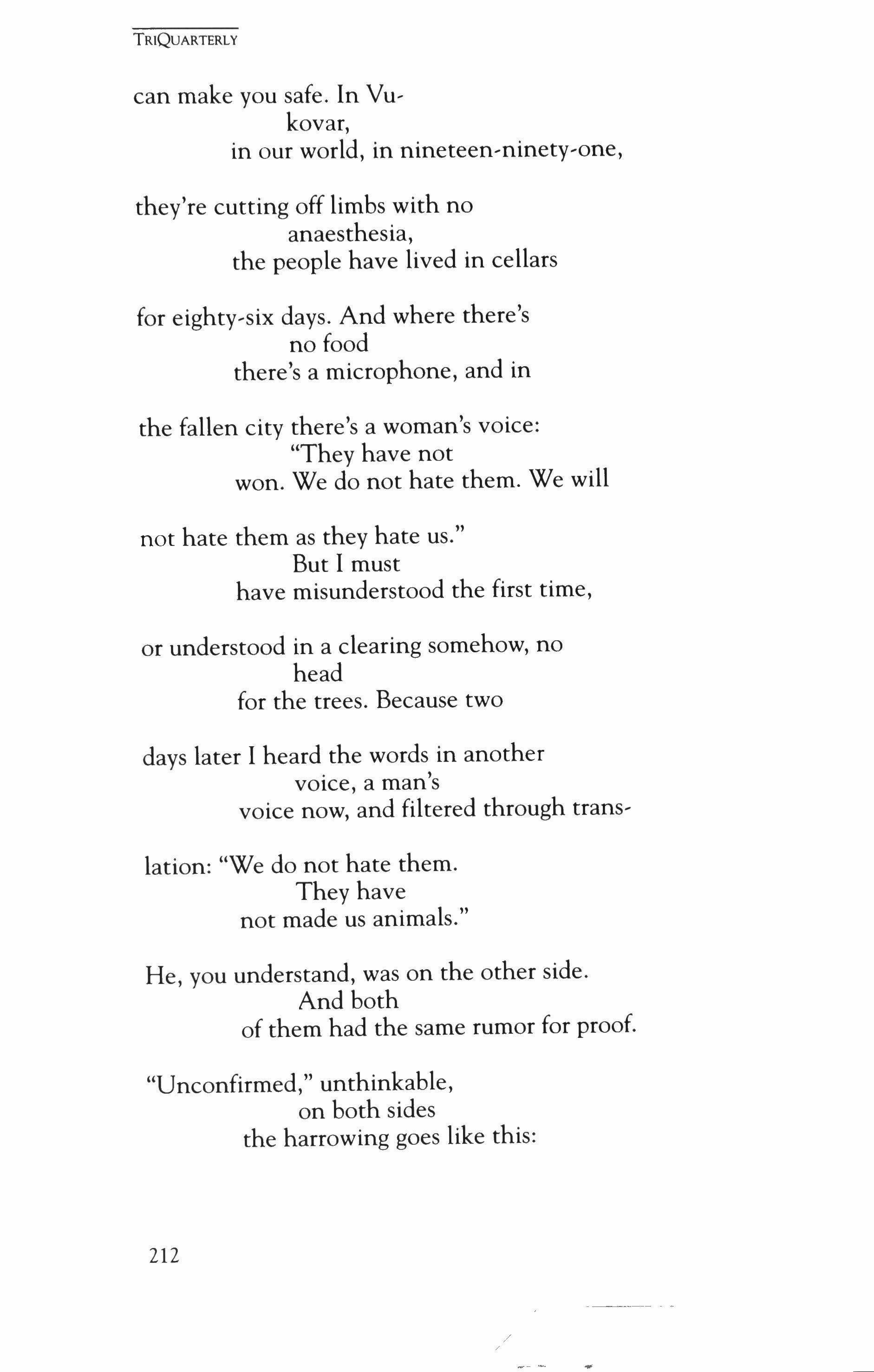
can make you safe. In Vukovar, in our world, in nineteen-ninety-one, they're cutting off limbs with no anaesthesia, the people have lived in cellars for eighty-six days. And where there's no food there's a microphone, and in the fallen city there's a woman's voice: "They have not won. We do not hate them. We will not hate them as they hate us." But I must have misunderstood the first time, or understood in a clearing somehow, no head for the trees. Because two days later I heard the words in another voice, a man s voice now, and filtered through trans, lation: "We do not hate them. They have not made us animals."
He, you understand, was on the other side. And both of them had the same rumor for proof. "Unconfirmed," unthinkable, on both sides the harrowing goes like this: 212
TRIQUARTERLY
We-we're like you-we protected the children, even while the mortars made rubble of our town. They left forty-seven children lying with their throats cut on the schoolroom floor.

Faster than thought, or the kind that still seems to us human, faster than fear or the flaring neuron, upward, now toward us, now dazzlingly away, the missile describes in liquid fire its deadly, adaptable notion of "home" and makes a sort of conscript of the midnight sky. Silicon matrix, father, land. The groundlings in their gas masks need some ground for hope, but hope's the very substance of dis, pute, and who will draw its boundaries? Here is the man of seventy-four whose heart quite foolishly stopped, though the sirens went off for no reason that time. Here is the infant who smothered. It seems that the valves on the breathing device
TRIQUARTERLY
* * *
213

can be turned the wrong way. Here is the mother who turned them. The missile-seeking missile is a "Patriot," and see how the camera loves it. Heart hard-wired to a mobile launcher, faithlessness keeping the software true.
No wonder there's confusion on the homefront. This isn't the shelter we thought we'd bought, who've wrapped the child in bunting, rocked her in the cradle of the state.
TRIQUARTERLY
214
Two Poems
David Wojahn

Human Form
(Loyola Park)
Two weeks past Labor Day, the lifeguard towers pulled down, replaced by Ukrainian crones on benches, chattering beyond the Yuppie jogging suit, scoring crack from a second jogging suit, which nods. Blink eyes and the deal's done, the black guy ambling off, the doctor/lawyer/investment banker unlocking the door of his BMW. Mexican Independence Day, raised banderas snapping beside braziers, women in armchair circles, men kicking soccer balls, careful not to spill their cans of Pabst. Local color: that's the way to start. Voice off, long shot of the lake. Caption: portrait of the author circa Nineteen Ninety One (or Two or Three). Time when the gods descend to walk the evening, human form. May the author now erase himself? He is tired of his small mourning self. He has a working title: Poem Without A Body Count. And yet. Did the gods descend to bring his mother back in last night's dream, bald from the chemo, raising herself from the car, one shoe off, that's all?
TRIQUARTERLY
215
TRIQUARTERLY

Close up to the author, long shot of the lake, empty beach but for this couple, operatically obese, each of them headphoned to a metal detector, cumbersome back and forth along the sand, like stitchery. The woman gestures and the man grunts back. (May the author now erase himself?) The woman bends down. This shape she's taken, how slowly it sifts through the sand with a trowel. Catch anything? Bottlecaps, quarters, someone's cheap wedding ring, electroplated, gleaming. Yet this is not a wedding ring but a coal, glowing as the womanbelieve me as I say this-places it upon the author's tongue. For do the gods not have the power to bestow such gifts of vision? And does the coal not bum me even now as I speak? I am nine again and helping her to stack the canned goods and radio batteries in the basement fallout shelter, for Khrushchev is sending missiles to Cuba, and if my father comes home, tomorrow or next week, the room will be prepared and we shall enter it as if we were whole, a family. The coal searing orange, my tongue composed of fire. My happiness as I hand her soup cans, bags of rice. And from the flame I watch her hand reach out to touch my hair, run fingers through it absently. Of fire she has fashioned me, of sparks flaring out with her strokes, cascading, acetylene white.
216
Tomis

Twenty miles south of Gary and Chicago Spanish stations die, fields half,lit at 6 A.M. SO Tito Puente slurs to white noise-static, transformed to hog futures, a talk,show doctor of forensics droning on about plane-crash data"half the bodies are mislabeled, for even dental records lie. Insurance fraud is money too Speedometer at eighty, eighty-five, Elena's weekly drive to Tomis, Indiana. Spanish for grades 10,12, ninety-five miles one way to the Loop, and six
thousand more to Buenos Aires, where spring's begun, her mother planting squash in the backyard garden plot. At Tomis Ovid ate red seaweed all one winter, and took years to learn the natives' guttural tongue. His pleas to Caesar, in elegant hexameters, went unanswered. And these acned faces, Elena thinks, with their Guns N' Roses T,Shirts, and their twenty different names for getting loaded on Friday nights, must be her version of Ovid's bearded, squirrel-eating Scythians.
Conjugate the verb vivir, the verb Hamar. Hola muchachos y muchachas, lque tal? Ovid died still begging for permission to go back. Elena has her green card and refuses to return, for the past is fragments, itself a kind of exile.
TRIQUARTERLY
217

Her mother keeps her sister's room exactly as it was, the walls a shrine of photographs: Conchita in the opera chorus, her first communion; obligatory yearbook shot. And, atop the bookshelf with its volumes of Camus
and Marx, what must have been her final photo-grinning at the rally with her college friends, one hand raised in a fist, in the other a small black flag. There's nothing dramatic to tell. One night she disappeared. No ink-dark Mercedes idling at her mother's door, no scowling men in trench coats jostling her away. No TV footage of a hundred demonstrators handcuffed, clubbed and brought before some drunken civil magistrate, camera lenses flitting from face to face.
Only the call that afternoon that she'd be late, and the days of waiting arcing into years, her mother at her vigil in the Plaza de Mayo, the desaparecido madres circling the square, the children's blown-up grinning faces almost solemn
on the placards, almost abstract. The past is fragments. Conjugate the verb morir. Conjugate the verb esperar, to hope-the new regime, its promises. And now see what they mean. The years of waiting ending with the phone call, Elena
and her mother in the waiting room, the city morgue at Cordoba where the acres of mass graves were found, Conchita's dental records in a file the doctor
TRIQUARTERLY
218

rifles as he ushers them into the chilly basement room. Is it here the exile
starts or ends? Fluorescent lights, the verb Hamar, the verb morir, the glittering bones, the skull. "Your sister's left arm, was it ever broken?"
Latinate barrage: he scribbles on his pad. Supraorbital Foramen, Occipital
and Temporal. "You see here where the bullet exited."
He makes a red circle with a highlight pen. Is it here the exile starts or ends? Skull and twenty'seven bone fragments. They could fit in a shoebox, a hatbox, a larger purse.
The doctor nods, shuts the folder, caps his pen. "If you'd like I could leave you alone here for awhile."
TRIQUARTERLY
219


Special Section:
Dante's Inferno, Canto XXII: Among
the Malebranche
Translated and with a note by
Robert Pinsky

Infenw, Canto :XXII: A Translator's Note
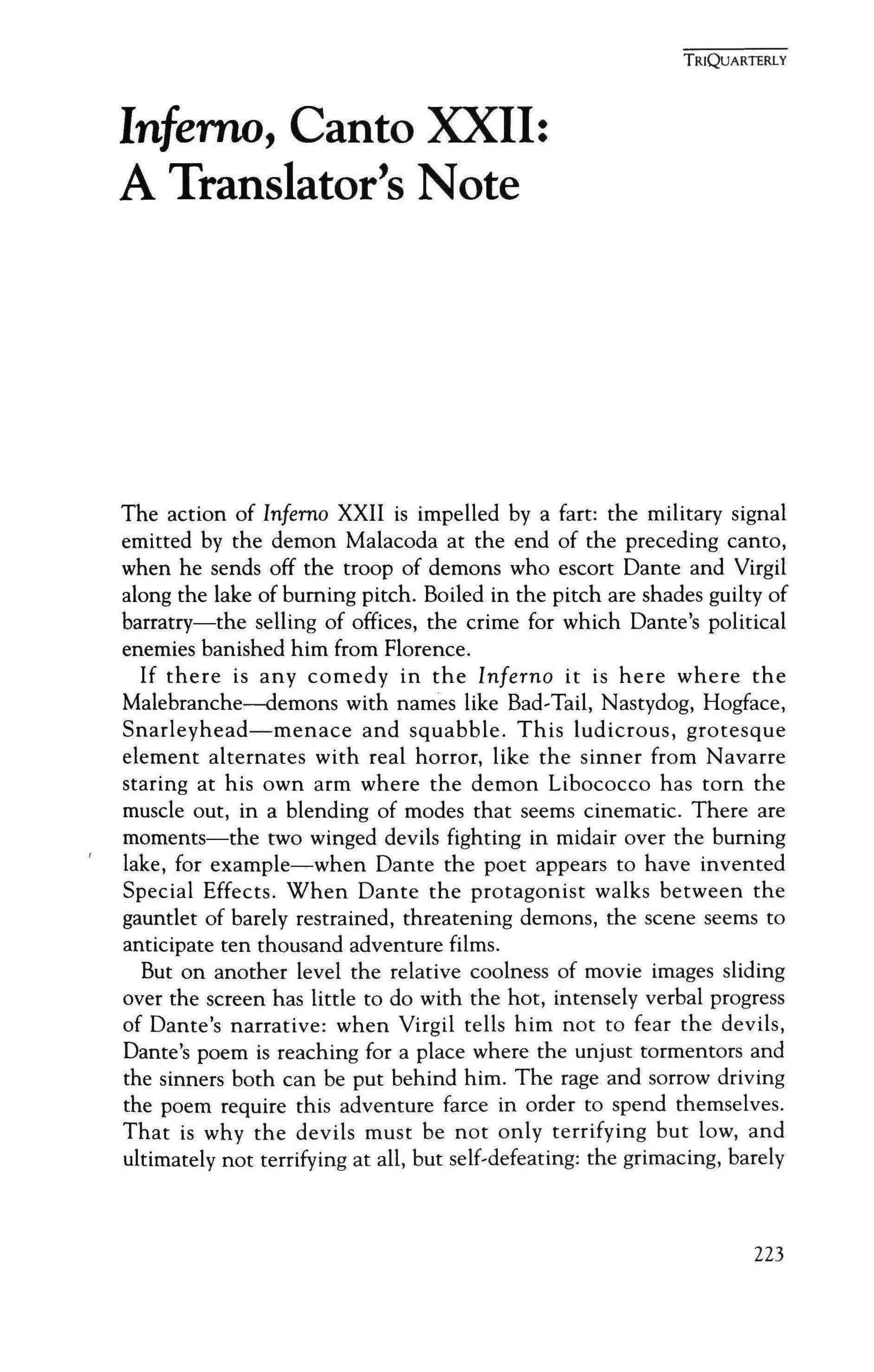
The action of Inferno XXII is impelled by a fart: the military signal emitted by the demon Malacoda at the end of the preceding canto, when he sends off the troop of demons who escort Dante and Virgil along the lake of burning pitch. Boiled in the pitch are shades guilty of barratry-the selling of offices, the crime for which Dante's political enemies banished him from Florence.
If there is any comedy in the Inferno it is here where the Malebranche--demons with names like Bad-Tail, Nastydog, Hogface, Snarleyhead-menace and squabble. This ludicrous, grotesque element alternates with real horror, like the sinner from Navarre staring at his own arm where the demon Libococco has torn the muscle out, in a blending of modes that seems cinematic. There are moments-the two winged devils fighting in midair over the burning lake, for example-when Dante the poet appears to have invented Special Effects. When Dante the protagonist walks between the gauntlet of barely restrained, threatening demons, the scene seems to anticipate ten thousand adventure films.
But on another level the relative coolness of movie images sliding over the screen has little to do with the hot, intensely verbal progress of Dante's narrative: when Virgil tells him not to fear the devils, Dante's poem is reaching for a place where the unjust tormentors and the sinners both can be put behind him. The rage and sorrow driving the poem require this adventure farce in order to spend themselves. That is why the devils must be not only terrifying but low, and ultimately not terrifying at all, but self-defeating: the grimacing, barely
TRIQUARTERLY
223

substantial creatures of bad air.
The translator of this material must convey as much of such multiple movement as possible, including the fierce moral pressure of Dante's quest along with the physical comedy of the demons: creatures who may represent vanquished dream,images of Dante's earthly enemies, the Florentine politicians who thwarted him and blighted his life. In the Italian, this kind of dual energy is attained partly by terza rima, the linking rhyme scheme of aha bcb cdc, et cetera, which Dante invented for the Commedia. Orderly yet flowing, the stream of the terza rima carries along disparate tones and incidents within its powerful formal course. In English, where like sounds are much less frequent than in Italian, triple rhymes can pose problems: threatening to protrude, to stretch ingenuity past breaking, and to distort word order, which English uses to make fine gestures of meaning that other languages might achieve with inflected endings. In the past, successful English translations of the poem have either abandoned terza rima or sacrificed the natural word order-sometimes even the natural word choice-of the English language. Convinced that the form of terza rima, conclusive yet propulsive, is integral to the poem, I have tried to find another way to go about rendering it in English.
This translation lets the sentences run over the ends of lines and tercets, and defines rhyme more liberally than the hard, "perfect" rhyme of, say, "before / adore." Those words are treated as rhyming which have the same terminal consonant, regardless how much the vowel may vary. Thus, the opening lines of XXII contain the pair "before / retire" and such rhymes as "church / arch," "warn / return" and "ditch / approach." These consonantal rhymes, in a sense, rhyme for English-with its immense, diverse vocabulary and its poverty of rhymes-as much as such combinations as "campo / scampo" stand out as rhyming in the different fabric of Italian.
The action of this canto seems to be a gesture of watching while moving on-an all-but-detached witnessing epitomized in the saying about going "among boozers in the tavern and saints in church." The violence, the boiling pitch, the torn muscles, the menacing athleticism of the winged demons, the cunning of the barrator, the canto's whole pitch-cauldron of anger, grasping and subterfuge-all these elements are here partly so that Dante can pass through them and away from them in the Inferno's narrative process, as purposeful as the surging, formal energy of his verse itself.
TRIQuARTERlY
224
Dante's Inferno, Canto :XXII:
Among the Malebranche
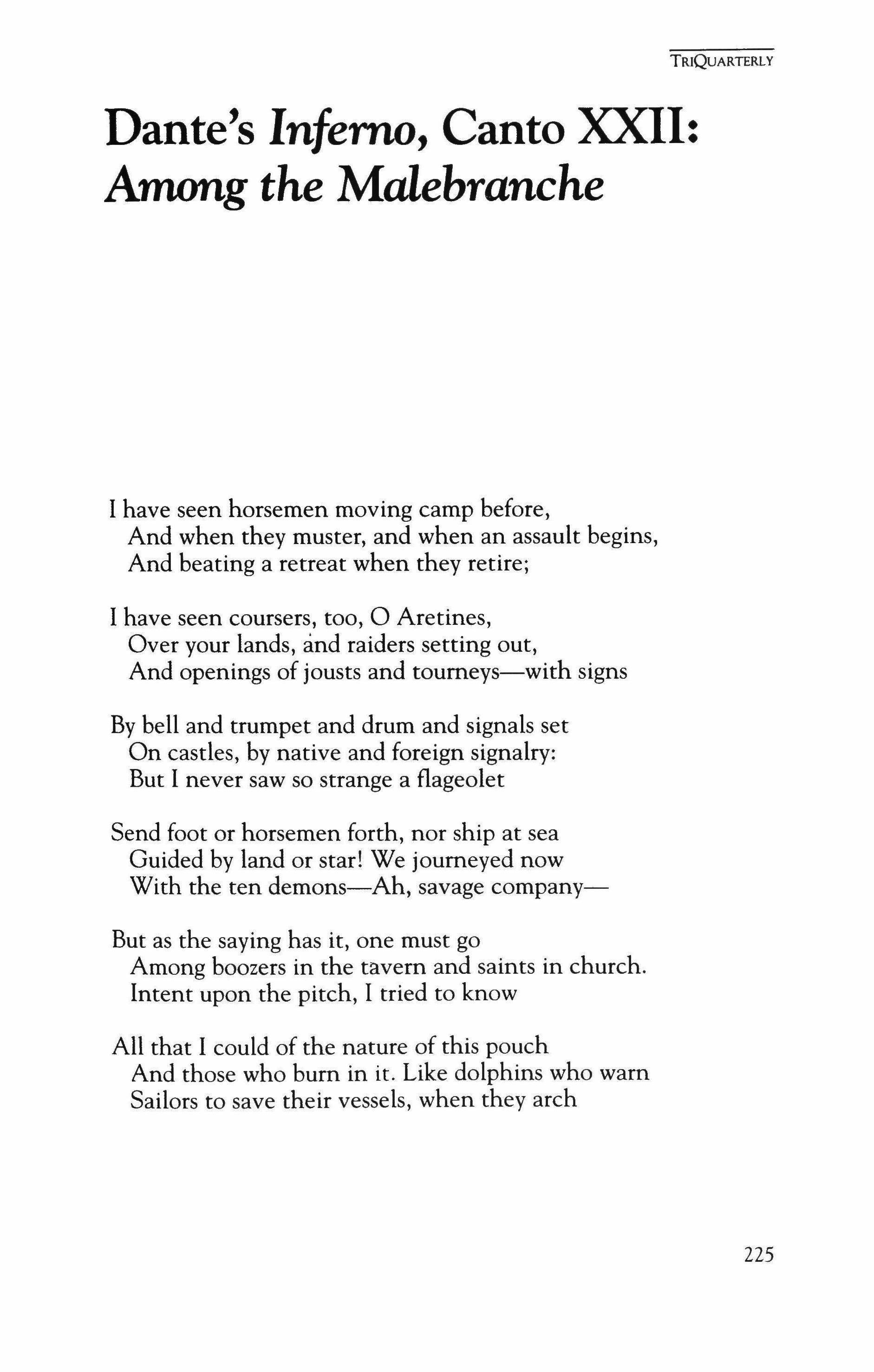
I have seen horsemen moving camp before, And when they muster, and when an assault begins, And beating a retreat when they retire;
I have seen coursers, too, a Aretines, Over your lands, and raiders setting out, And openings of jousts and tourneys-with signs
By bell and trumpet and drum and signals set On castles, by native and foreign signalry: But I never saw so strange a flageolet
Send foot or horsemen forth, nor ship at sea Guided by land or star! We journeyed now With the ten demons-Ah, savage company-
But as the saying has it, one must go Among boozers in the tavern and saints in church. Intent upon the pitch, I tried to know
All that I could of the nature of this pouch And those who bum in it. Like dolphins who warn Sailors to save their vessels, when they arch
TRIQUARTERLY
225
TRIQUARTERlY
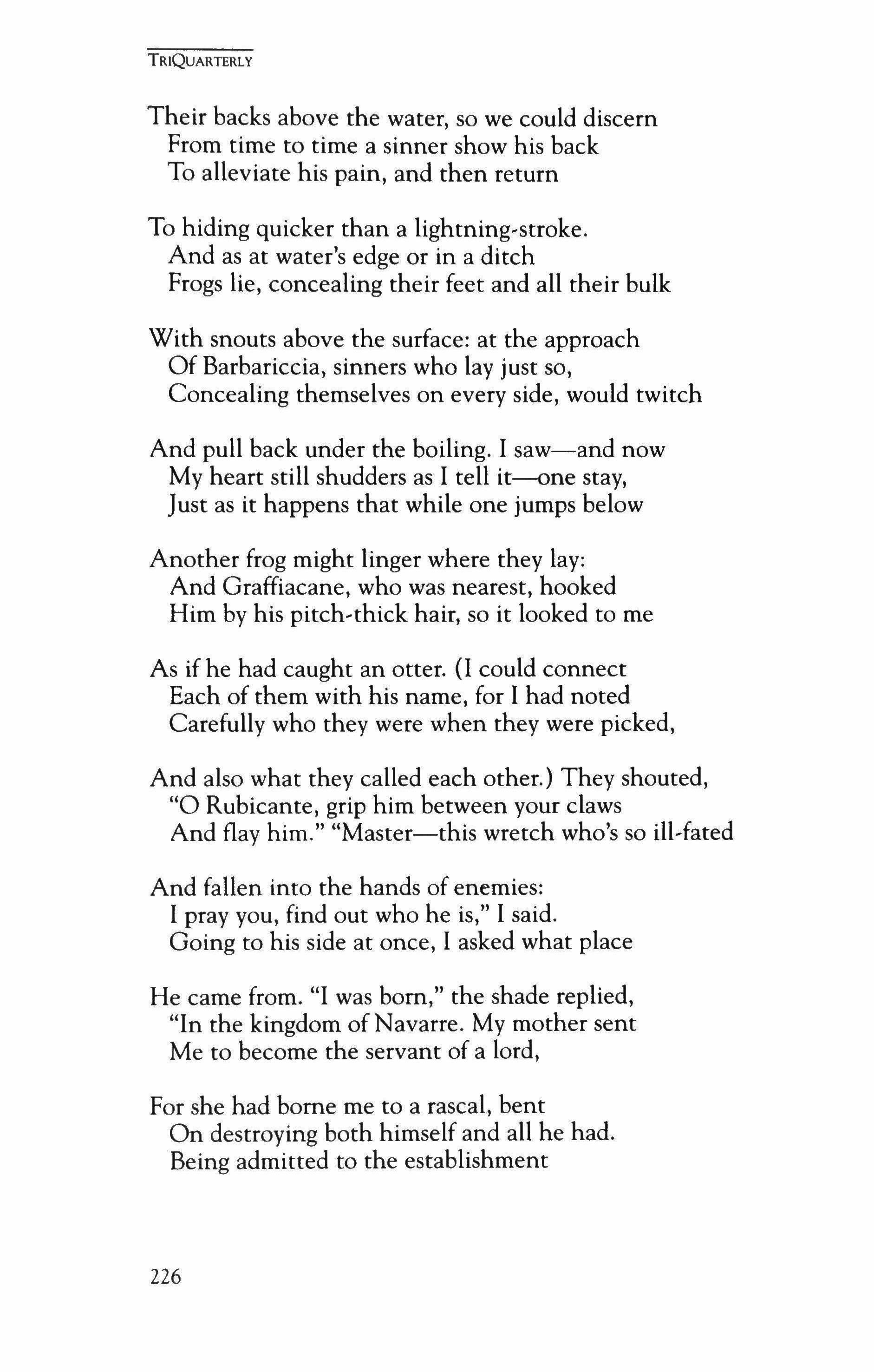
Their backs above the water, so we could discern From time to time a sinner show his back To alleviate his pain, and then return
To hiding quicker than a lightning-stroke. And as at water's edge or in a ditch Frogs lie, concealing their feet and all their bulk
With snouts above the surface: at the approach Of Barbariccia, sinners who lay just so, Concealing themselves on every side, would twitch
And pull back under the boiling. I saw-and now My heart still shudders as I tell it-one stay, Just as it happens that while one jumps below
Another frog might linger where they lay: And Graffiacane, who was nearest, hooked Him by his pitch,thick hair, so it looked to me
As if he had caught an otter. (I could connect Each of them with his name, for I had noted Carefully who they were when they were picked,
And also what they called each other.) They shouted, "0 Rubicante, grip him between your claws And flay him." "Master-this wretch who's so ill-fated
And fallen into the hands of enemies: I pray you, find out who he is," I said. Going to his side at once, I asked what place
He came from. "I was born," the shade replied, "In the kingdom of Navarre. My mother sent Me to become the servant of a lord,
For she had borne me to a rascal, bent On destroying both himself and all he had. Being admitted to the establishment
226
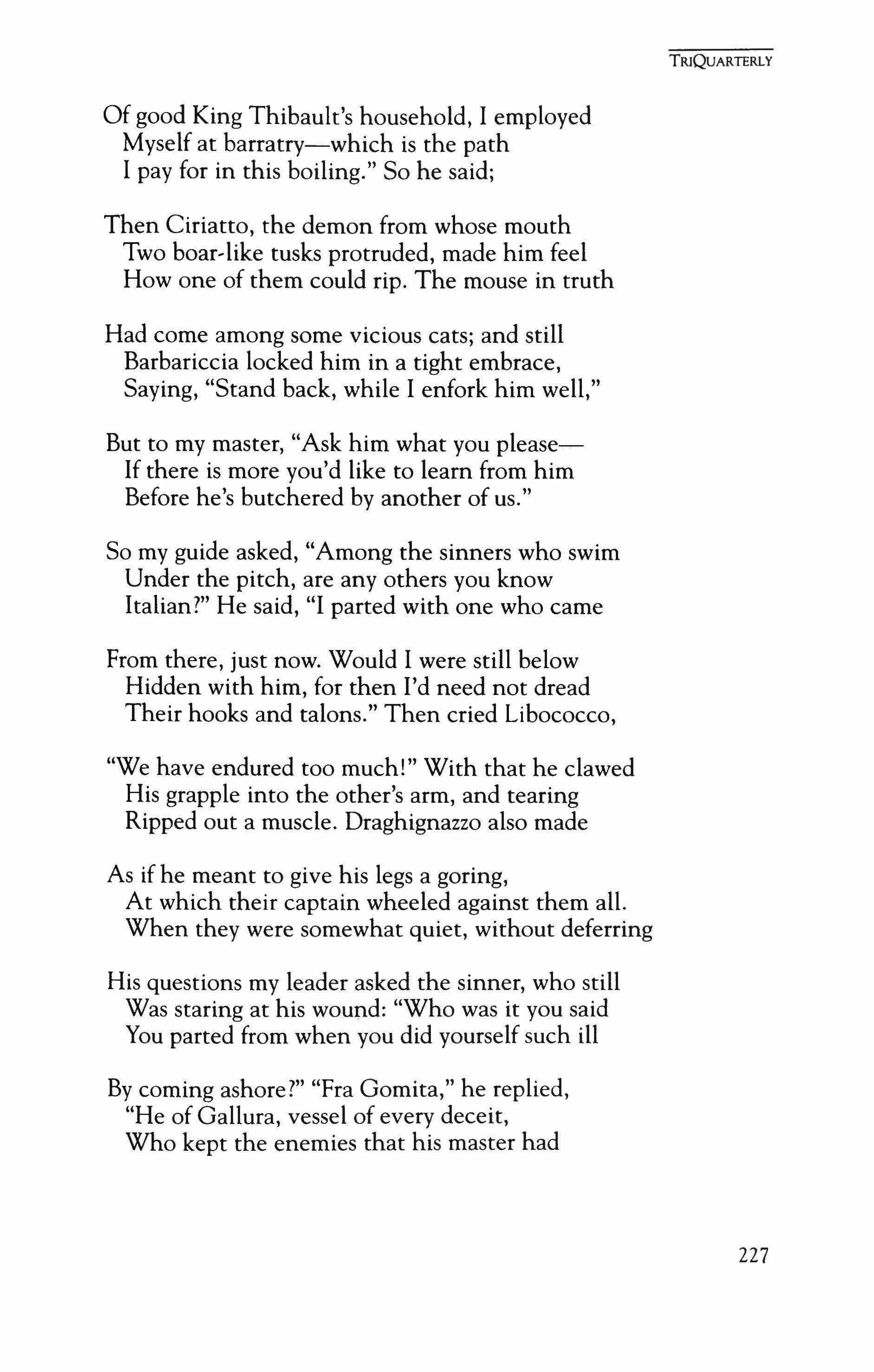
Of good King Thibault's household, I employed Myself at barratry-which is the path I pay for in this boiling." So he said;
Then Ciriatto, the demon from whose mouth Two boar,like tusks protruded, made him feel How one of them could rip. The mouse in truth
Had come among some vicious cats; and still Barbariccia locked him in a tight embrace, Saying, "Stand back, while I enfork him well,"
But to my master, "Ask him what you pleaseIf there is more you'd like to learn from him Before he's butchered by another of us."
So my guide asked, "Among the sinners who swim Under the pitch, are any others you know Italian?" He said, "I parted with one who came
From there, just now. Would I were still below Hidden with him, for then I'd need not dread Their hooks and talons." Then cried Libococco,
"We have endured too much!" With that he clawed His grapple into the other's arm, and tearing Ripped out a muscle. Draghignazzo also made
As if he meant to give his legs a goring, At which their captain wheeled against them all. When they were somewhat quiet, without deferring
His questions my leader asked the sinner, who still Was staring at his wound: "Who was it you said You parted from when you did yourself such ill
By coming ashore?" "Fra Gomita," he replied, "He of Gallura, vessel of every deceit, Who kept the enemies that his master had
TRIQUARTERLY 227
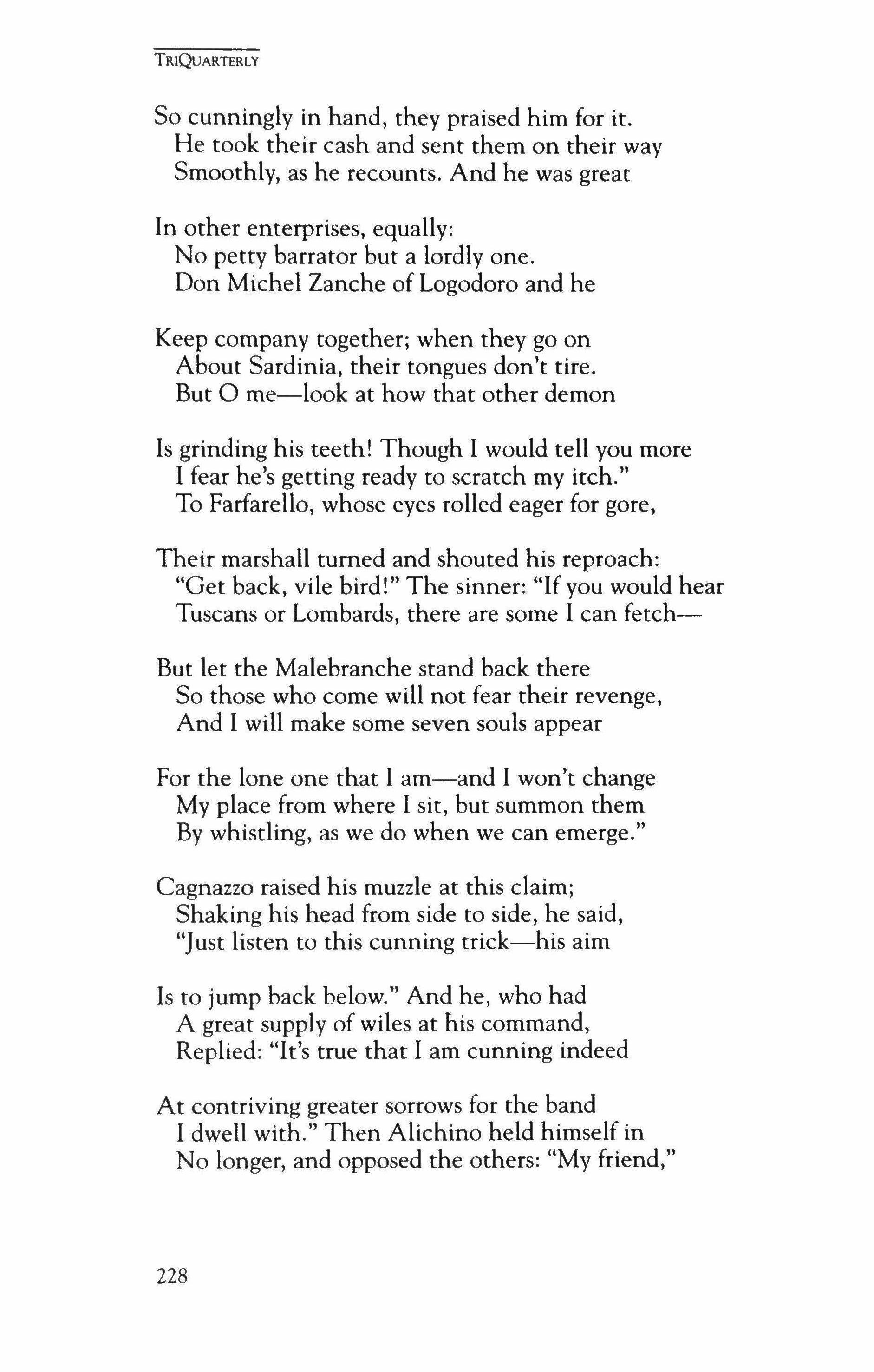
So cunningly in hand, they praised him for it. He took their cash and sent them on their way Smoothly, as he recounts. And he was great
In other enterprises, equally: No petty barrator but a lordly one. Don Michel Zanche of Logodoro and he
Keep company together; when they go on About Sardinia, their tongues don't tire. But 0 me-look at how that other demon
Is grinding his teeth! Though I would tell you more I fear he's getting ready to scratch my itch."
To Farfarello, whose eyes rolled eager for gore,
Their marshall turned and shouted his reproach: "Get back, vile bird!" The sinner: "If you would hear Tuscans or Lombards, there are some I can fetch-
But let the Malebranche stand back there
So those who come will not fear their revenge, And I will make some seven souls appear
For the lone one that I am-and I won't change My place from where I sit, but summon them By whistling, as we do when we can emerge."
Cagnazzo raised his muzzle at this claim; Shaking his head from side to side, he said, ")ust listen to this cunning trick-his aim
Is to jump back below." And he, who had A great supply of wiles at his command, Replied: "It's true that I am cunning indeed
At contriving greater sorrows for the band I dwell with." Then Alichino held himself in No longer, and opposed the others: "My friend,"
TRIQUARTERLY
228
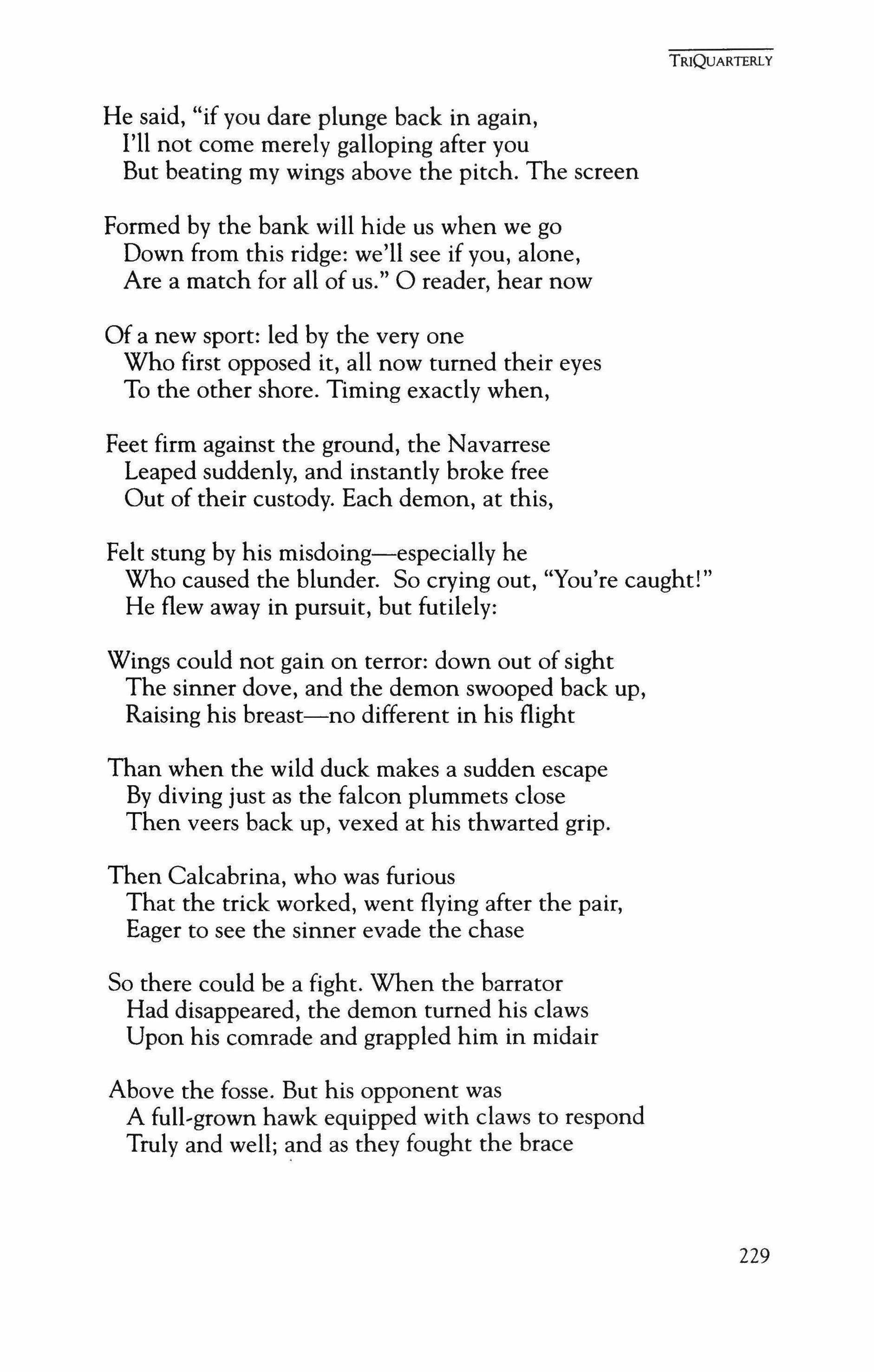
He said, "if you dare plunge back in again, I'll not come merely galloping after you But beating my wings above the pitch. The screen
Formed by the bank will hide us when we go Down from this ridge: we'll see if you, alone, Are a match for all of US." 0 reader, hear now
Of a new sport: led by the very one Who first opposed it, all now turned their eyes To the other shore. Timing exactly when,
Feet firm against the ground, the Navarrese Leaped suddenly, and instantly broke free Out of their custody. Each demon, at this,
Felt stung by his misdoing-especially he Who caused the blunder. So crying out, "You're caught!" He flew away in pursuit, but futilely:
Wings could not gain on terror: down out of sight The sinner dove, and the demon swooped back up, Raising his breast-no different in his flight
Than when the wild duck makes a sudden escape By diving just as the falcon plummets close Then veers back up, vexed at his thwarted grip.
Then Calcabrina, who was furious That the trick worked, went flying after the pair, Eager to see the sinner evade the chase
So there could be a fight. When the barrator Had disappeared, the demon turned his claws Upon his comrade and grappled him in midair
Above the fosse. But his opponent was A full-grown hawk equipped with claws to respond Truly and well; and as they fought the brace
TRIQUARTERLY
229

Fell into the middle of the boiling pond. The heat unclenched them at once; but though released They could not rise, because their wings were gummed
And clotted. Barbariccia, like the rest
Lamenting, hastily dispatched a squad Of four who flew across to the bank we faced,
Each with a fork; hurrying from either side They descended to their posts with hooks extended To the mired pair, already baked inside
Their crusts; and we two left them thus confounded.
TRIQUARTERLY
230
Life Here Is Normal
(from A Lexicon of Terror: Argentina and the Legacies of Torture)
Marguerite Feitlowitz
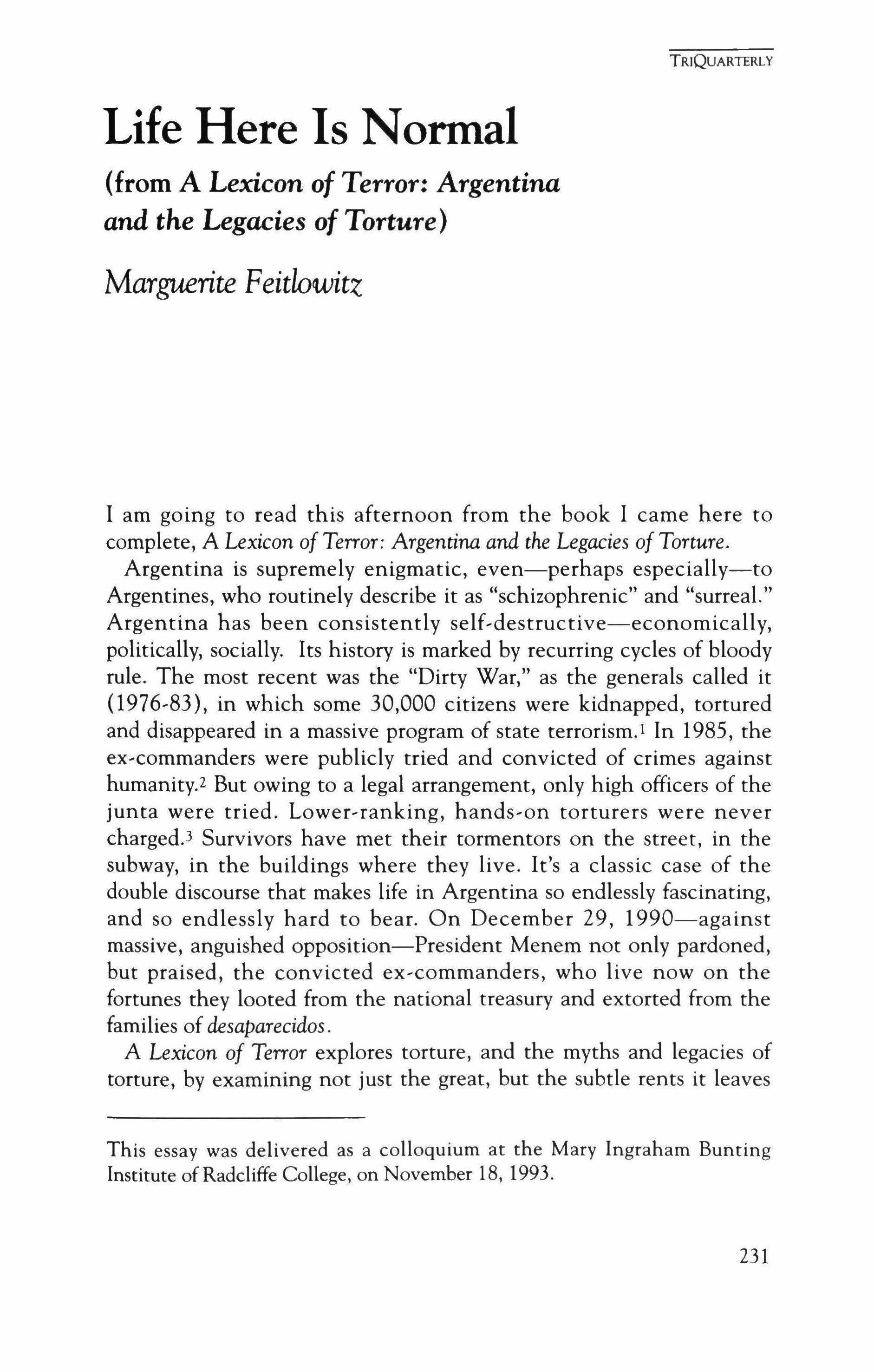
I am going to read this afternoon from the book I came here to complete, A Lexicon of Terror: Argentina and the Legacies of Torture. Argentina is supremely enigmatic, even-perhaps especially-to Argentines, who routinely describe it as "schizophrenic" and "surreal." Argentina has been consistently self�destructive-economically, politically, socially. Its history is marked by recurring cycles of bloody rule. The most recent was the "Dirty War," as the generals called it (l976�83), in which some 30,000 citizens were kidnapped, tortured and disappeared in a massive program of state terrorism'! In 1985, the ex-commanders were publicly tried and convicted of crimes against humanity.2 But owing to a legal arrangement, only high officers of the junta were tried. Lower-ranking, hands-on torturers were never charged." Survivors have met their tormentors on the street, in the subway, in the buildings where they live. It's a classic case of the double discourse that makes life in Argentina so endlessly fascinating, and so endlessly hard to bear. On December 29, 1990-against massive, anguished opposition-President Menem not only pardoned, but praised, the convicted ex-commanders, who live now on the fortunes they looted from the national treasury and extorted from the families of desaparecidos.
A Lexicon of Terror explores torture, and the myths and legacies of torture, by examining not just the great, but the subtle rents it leaves
This essay was delivered as a colloquium at the Mary Ingraham Bunting Institute of Radcliffe College, on November 18, 1993.
TRIQUARTERLY
231

in the fabric of human lives and public institutions. How do survivors cope with having been tortured? With the present glorification of those who damaged their bodies and minds, wrecked their careers, and destroyed their families? Can priests recover a Church again headed by an archbishop who supported the "Dirty War"? How do historians, journalists, politicians and artists formulate their responses when the language itself has been tainted?
The "Dirty War" dictatorship was intensely verbal, and had a diabolical genius for appropriating language to which it had no moral right. Intense anti-Semitism did not deter it from echoing "Never Again!," the Warsaw Ghetto cry. Nunca Mas! the generals wrote in their Final Report, claiming eternal victory over subversion+
The dynamics of terror were especially complicated and divisive in the Jewish community. I am a Jew, and this is one of the most vexing chapters in a book that is full of vexation. It's but a facet of the prism, albeit a crucial one, for certain themes-identity, memory, collective trauma, contamination of history-come into startling focus.
For this chapter, called "Life Here is Normal," I've had the privilege to work closely with a group of families in Argentina and I will soon be going to Israel. This excerpt focuses on but one family, the Mellibovskys.
Let us go back to July of 1990. Midwinter in Argentina. "Life here is surreal," people tell me over and over. And it is true. I am walking through downtown Buenos Aires-the very heart of Buenos Aireson my way to an appointment. A small crowd-mostly women, quite well-dressed-a-has gathered before a construction site at the comer of Florida and Viamonte. The younger ones push close to the large sign, call out the designers whose creations will soon fill the renovated mall. Galerfas Pacifico has been closed for several years. In the seventies, it was full of costly imports from Paris and Milan, London, New York, San Francisco. Shopping there epitomized leisure and luxury. One couldn't hear the screams of those being tortured in the basement. One was oblivious to the fifteen tiny cells, whose walls are still marked with the desperate graffiti of those who were murdered there. But everyone knows it now; we've known since 1987 when the secret camp was discovered. If we'd forgotten, we'd been reminded last month when the newspapers ran pictures of the renovations, showing the cells, the shooting gallery, the initials scratched into the walls. But on this bright, midwinter morning Dior, Chanel, Issey Miyake-these
TRIQUARTERLY
232

are the names that people want to read.
My appointment is with Matilde Mellibovsky, one of the founding Mothers of the Plaza de Mayo.i Matilde is a tall, fair, elegant woman in her sixties with long red hair, high cheekbones and green, Eastern European eyes. She lives in one of the most exquisite streets in the world, the small Svshaped Calle Arroyo whose ornate French and Italianate buildings seem to embrace you. It is mild enough to go out on the terrace.
"I saw a violent kidnapping there," she tells me, pointing to the house across street. "In '75.6 I was wandering around, unable to sleep, must have been three in the morning. I stood looking out the window, toward Nueve de Julio [a major boulevard], everything was so quiet. All of a sudden, there was an eruption of men in the son's bedroom." She points to the tall windows on the top floor. "Things were flying around-sheets, clothes, books. With a great deal of violence, they were taking the boy away. I turned off the light, and peeked through a tiny opening in the curtain. 'I'll be safer in the dark,' I remember thinking. Safer in the dark," she repeats with an edge, and looks away.
Next door is the Israeli Embassy. In this country where ant iSemitism is endemic, the Jewish State is represented in a great historical palace. It is more than a government outpost, it's a place for the community to gather. Parents like the Mellibovskys went there for help, after their children had disappeared.
This is our first meeting, and Matilde is watching me closely. I've been referred by a mutual friend; still, she is guarded, formal, vaguely defiant. She says her daughter was kidnapped not far from where I currently live. When I tell her I knew that, she seems to soften, ushers me back inside. All over the living room are pictures of Graciela Mellibovsky, who disappeared on September 25, 1976, at the age of twenty-nine.
"I'll introduce you," she says and leads me to a poster of Graciela wearing the uniform of the prestigious Colegio Nacional de Buenos Aires. She touches the picture, as though brushing a lock of hair from the young woman's eyes. Large, dramatic, almond-shaped eyes like Matilde's. "What a beautiful girl," I say.
"Graciela is a beautiful girl," says Matilde, stressing the verb. "Also nervous, obsessive, agitated, doing everything at once. I don't want to 'improve,' or 'recreate' her," she tells me. "I want her with all of her faults."
The two were alike-headstrong and quick, sometimes too quick, to
TRIQUARTERLY
233
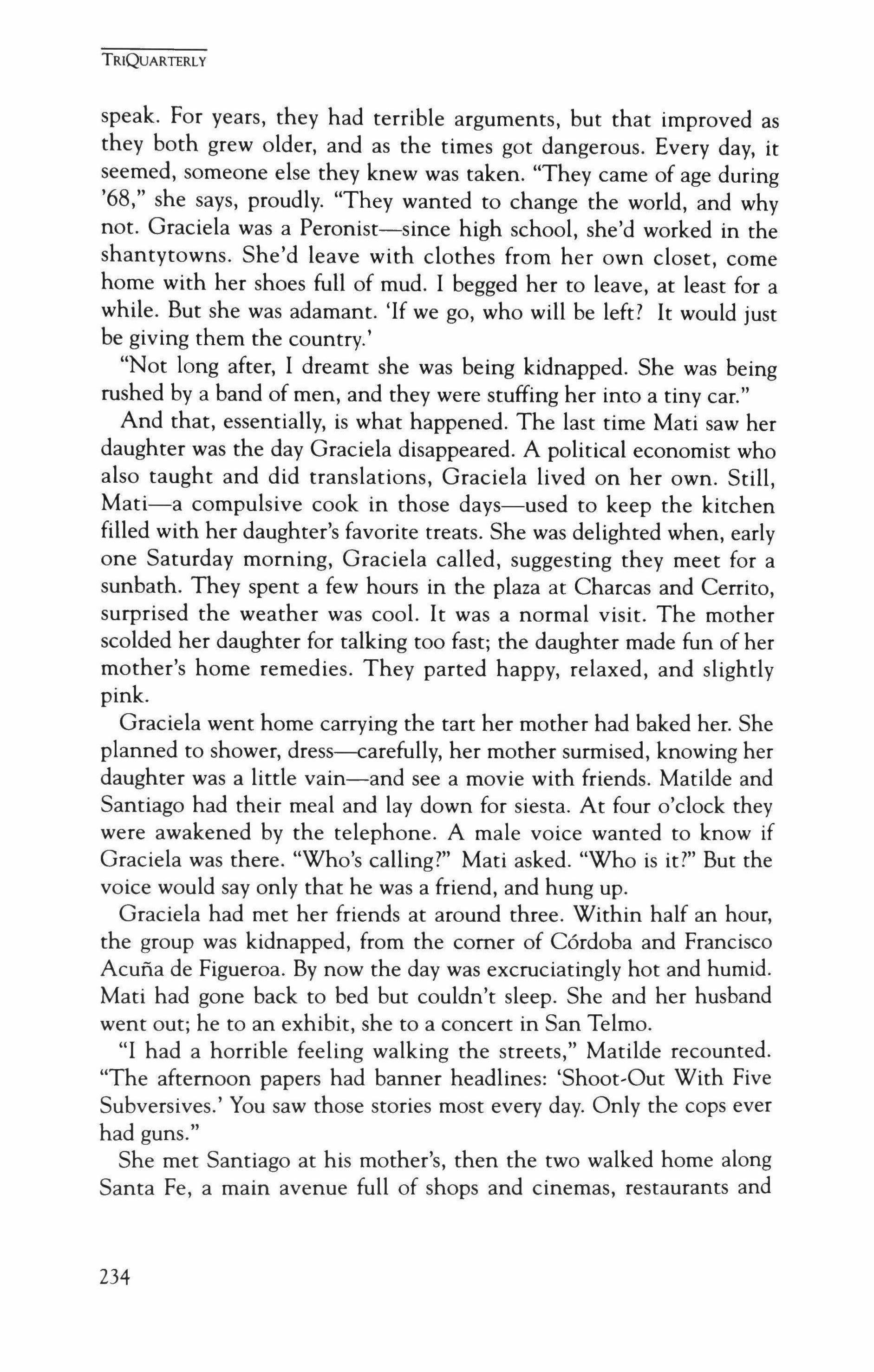
speak. For years, they had terrible arguments, but that improved as they both grew older, and as the times got dangerous. Every day, it seemed, someone else they knew was taken. "They came of age during '68," she says, proudly. "They wanted to change the world, and why not. Graciela was a Peronist-since high school, she'd worked in the shantytowns. She'd leave with clothes from her own closet, come home with her shoes full of mud. I begged her to leave, at least for a while. But she was adamant. 'If we go, who will be left? It would just be giving them the country.'
"Not long after, I dreamt she was being kidnapped. She was being rushed by a band of men, and they were stuffing her into a tiny car."
And that, essentially, is what happened. The last time Mati saw her daughter was the day Graciela disappeared. A political economist who also taught and did translations, Graciela lived on her own. Still, Mati-a compulsive cook in those days-used to keep the kitchen filled with her daughter's favorite treats. She was delighted when, early one Saturday morning, Graciela called, suggesting they meet for a sunbath. They spent a few hours in the plaza at Charcas and Cerrito, surprised the weather was cool. It was a normal visit. The mother scolded her daughter for talking too fast; the daughter made fun of her mother's home remedies. They parted happy, relaxed, and slightly pink.
Graciela went home carrying the tart her mother had baked her. She planned to shower, dress-carefully, her mother surmised, knowing her daughter was a little vain-and see a movie with friends. Matilde and Santiago had their meal and lay down for siesta. At four o'clock they were awakened by the telephone. A male voice wanted to know if Graciela was there. "Who's calling?" Mati asked. "Who is it?" But the voice would say only that he was a friend, and hung up.
Graciela had met her friends at around three. Within half an hour, the group was kidnapped, from the corner of Cordoba and Francisco Acuna de Figueroa. By now the day was excruciatingly hot and humid. Mari had gone back to bed but couldn't sleep. She and her husband went out; he to an exhibit, she to a concert in San Telmo.
"I had a horrible feeling walking the streets," Matilde recounted. "The afternoon papers had banner headlines: 'Shoot-Out With Five Subversives.' You saw those stories most every day. Only the cops ever had guns."
She met Santiago at his mother's, then the two walked home along Santa Fe, a main avenue full of shops and cinemas, restaurants and
TRIQUARTERLY
234

cafes. They were both tense and distracted, neither dared to mention the phone call. They entered a cafe but left without ordering, bought tickets for a film they didn't see. Unable to eat, drink or talk, they finally just went to bed.
At three,thirty in the morning, there was a violent commotion at their door. Fifteen heavily armed soldiers in civilian dress were breaking in. Apparently there'd been a mix-up: this was the second crew assigned to kidnap Graciela. They assaulted both Matilde and Santiago, hitting and kicking them, twisting their heads and limbs. They ransacked the house, took everything that belonged to Graciela-her schoolbooks, souvenirs, things she'd had as a child. They dragged Mati out of the apartment, shoved her into a car and sped to the family's other apartment. If Matilde didn't open they'd blow up the building, they said, producing a grenade. But Graciela wasn't there either, so they shoved Matilde back into the car, sped to her sister-in-law's, and tore apart that place, too. An hour later, they dragged her home again. "So now what are you gonna do?" one of the soldiers asked her. "I suppose I'm going to cry," she told him. But she didn't. By now it was dawn, and all they could do was collapse.
As soon as possible, they sent their son to Spain. Santiago's sister and her family went to Mexico. Other relatives made a point of never mentioning Graciela's disappearance. "So there we were," said Mati, "the two of us-alone and out of our minds."
She stared for a moment at a photo of her daughter. "One day I was walking down the street, just walking, going I don't know where. I suddenly realized there was a man keeping step a little behind me. He was laughing one of those soft, cultured laughs. I whirled around and demanded to know what was funny. 'But, senora,' he said con' descendinglv, 'don't you realize you're talking to yourself?' 'Yes!' I screamed at him. 'Yes, I am talking to myself because my daughter has been disappeared my daughter has been kidnapped my daughter is missing!' Well that shut him up. But he looked at me with loathing, and walked away.
"I am a very ordinary, common, vulgar woman," says Matilde. "Of course I read, my father taught me early. But I was always in the kitchen, I liked movies, I daydreamed. I had an idea of 'doing something' (as we used to say) once the kids were older. But they took my daughter and the next day I was a Mother of the Plaza de Mayo. There was no other choice. Now come into my kitchen."
The kitchen is enormous, tiled in royal blue. There is a large, round,
TRIQUARTERLY
235
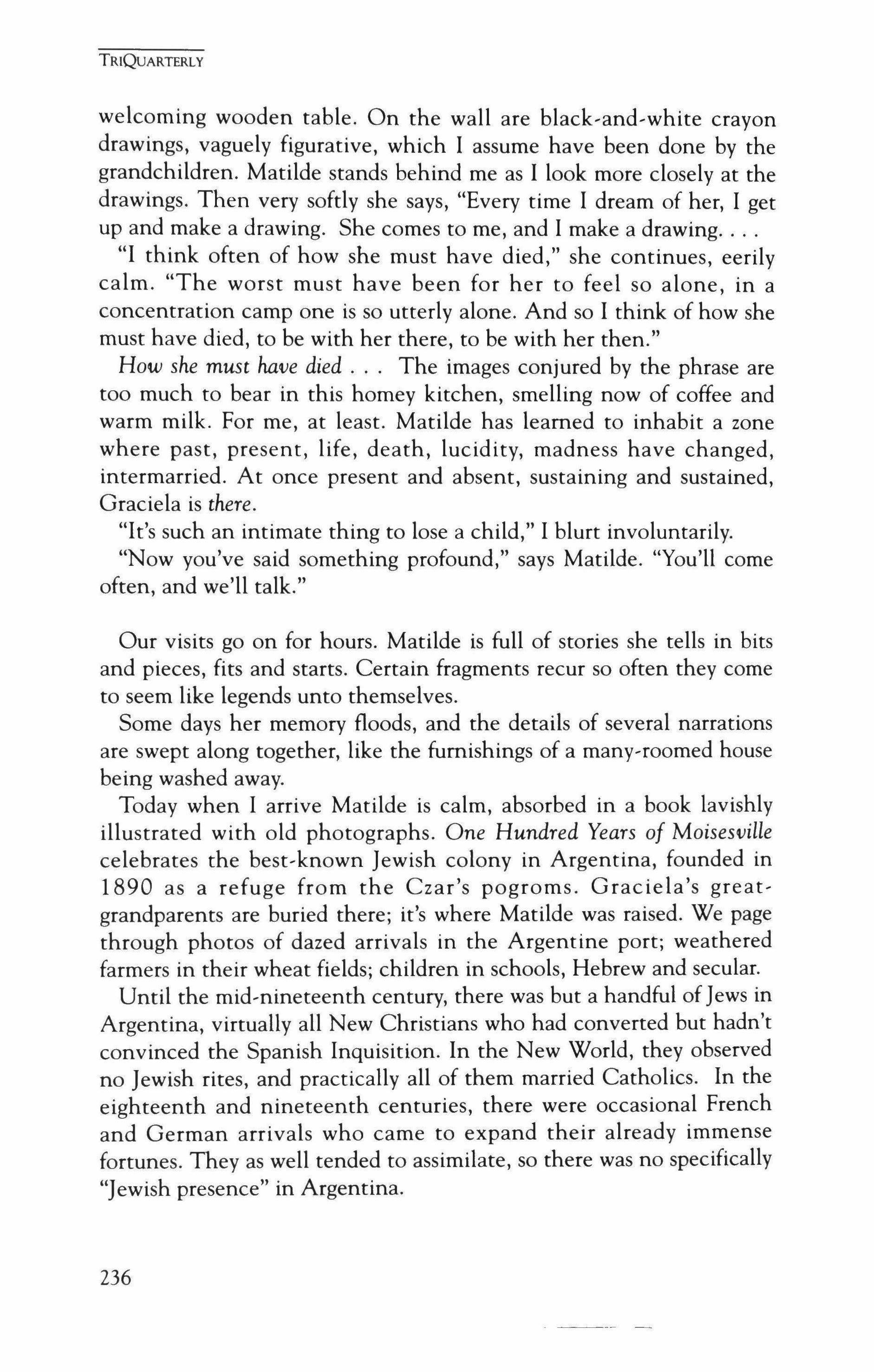
welcoming wooden table. On the wall are black-and-white crayon drawings, vaguely figurative, which I assume have been done by the grandchildren. Matilde stands behind me as I look more closely at the drawings. Then very softly she says, "Every time I dream of her, I get up and make a drawing. She comes to me, and I make a drawing
"I think often of how she must have died," she continues, eerily calm. "The worst must have been for her to feel so alone, in a concentration camp one is so utterly alone. And so I think of how she must have died, to be with her there, to be with her then."
How she must have died
The images conjured by the phrase are too much to bear in this homey kitchen, smelling now of coffee and warm milk. For me, at least. Matilde has learned to inhabit a zone where past, present, life, death, lucidity, madness have changed, intermarried. At once present and absent, sustaining and sustained, Graciela is there.
"It's such an intimate thing to lose a child," I blurt involuntarily.
"Now you've said something profound," says Matilde. "You'll come often, and we'll talk."
Our visits go on for hours. Matilde is full of stories she tells in bits and pieces, fits and starts. Certain fragments recur so often they come to seem like legends unto themselves.
Some days her memory floods, and the details of several narrations are swept along together, like the furnishings of a many-roomed house being washed away.
Today when I arrive Matilde is calm, absorbed in a book lavishly illustrated with old photographs. One Hundred Years of Moisesville celebrates the best-known Jewish colony in Argentina, founded in 1890 as a refuge from the Czar's pogroms. Graciela's greatgrandparents are buried there; it's where Matilde was raised. We page through photos of dazed arrivals in the Argentine port; weathered farmers in their wheat fields; children in schools, Hebrew and secular.
Until the mid-nineteenth century, there was but a handful ofJews in Argentina, virtually all New Christians who had converted but hadn't convinced the Spanish Inquisition. In the New World, they observed no Jewish rites, and practically all of them married Catholics. In the eighteenth and nineteenth centuries, there were occasional French and German arrivals who came to expand their already immense fortunes. They as well tended to assimilate, so there was no specifically "Jewish presence" in Argentina.
TRIQUARTERLY
236
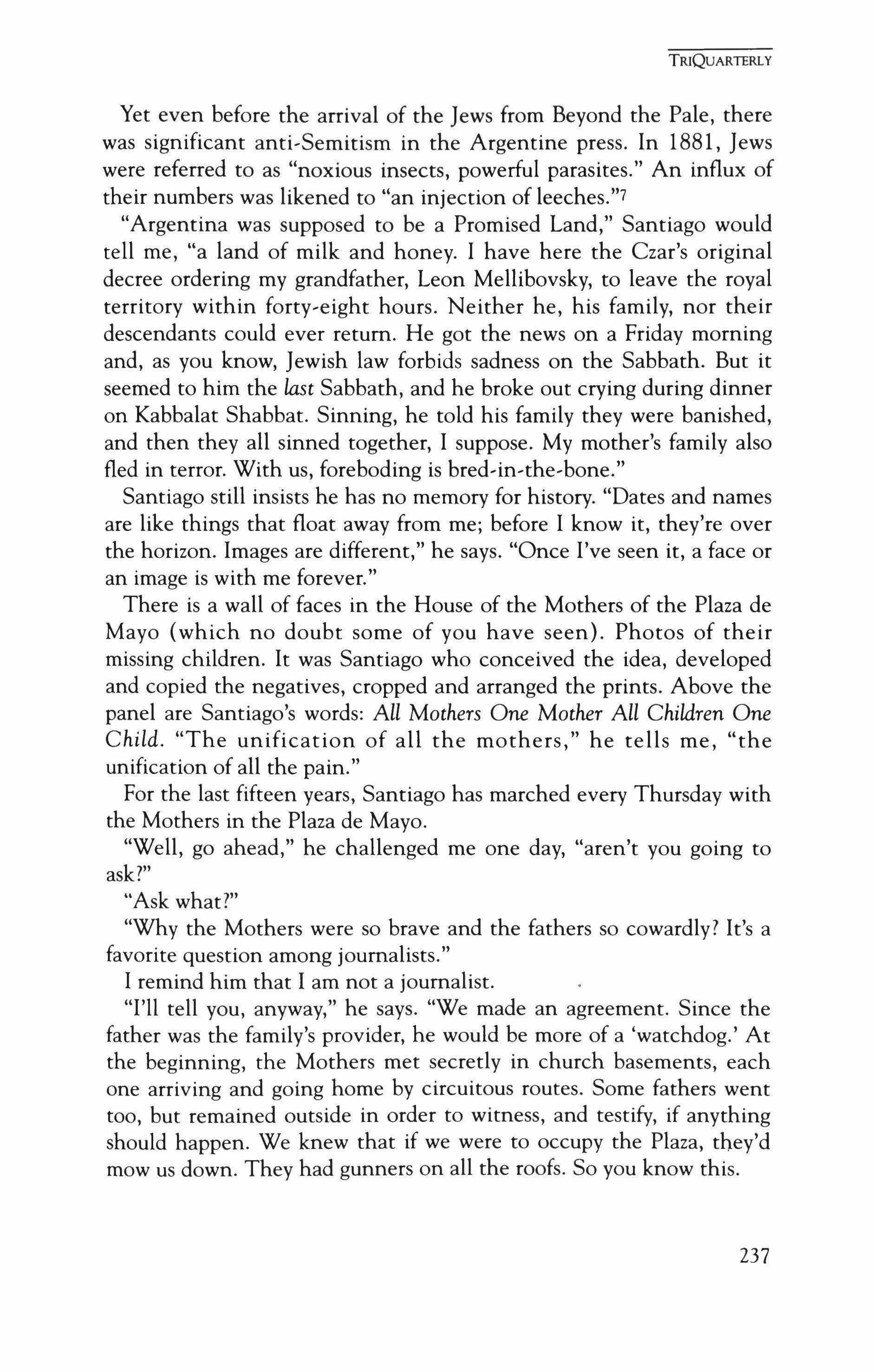
Yet even before the arrival of the Jews from Beyond the Pale, there was significant anti-Semitism in the Argentine press. In 1881, Jews were referred to as "noxious insects, powerful parasites." An influx of their numbers was likened to "an injection of leeches."?
"Argentina was supposed to be a Promised Land," Santiago would tell me, "a land of milk and honey. I have here the Czar's original decree ordering my grandfather, Leon Mellibovsky, to leave the royal territory within forty-eight hours. Neither he, his family, nor their descendants could ever return. He got the news on a Friday morning and, as you know, Jewish law forbids sadness on the Sabbath. But it seemed to him the last Sabbath, and he broke out crying during dinner on Kabbalat Shabbat. Sinning, he told his family they were banished, and then they all sinned together, I suppose. My mother's family also fled in terror. With us, foreboding is bred-in-the-bone."
Santiago still insists he has no memory for history. "Dates and names are like things that float away from me; before I know it, they're over the horizon. Images are different," he says. "Once I've seen it, a face or an image is with me forever."
There is a wall of faces in the House of the Mothers of the Plaza de Mayo {which no doubt some of you have seen}. Photos of their missing children. It was Santiago who conceived the idea, developed and copied the negatives, cropped and arranged the prints. Above the panel are Santiago's words: All Mothers One Mother All Children One Child. "The unification of all the mothers," he tells me, "the unification of all the pain."
For the last fifteen years, Santiago has marched every Thursday with the Mothers in the Plaza de Mayo.
"Well, go ahead," he challenged me one day, "aren't you going to ask?"
"Ask what?"
"Why the Mothers were so brave and the fathers so cowardly? It's a favorite question among journalists."
I remind him that I am not a journalist.
"I'll tell you, anyway," he says. "We made an agreement. Since the father was the family's provider, he would be more of a 'watchdog.' At the beginning, the Mothers met secretly in church basements, each one arriving and going home by circuitous routes. Some fathers went too, but remained outside in order to witness, and testify, if anything should happen. We knew that if we were to occupy the Plaza, they'd mow us down. They had gunners on all the roofs. So you know this.
TRIQUARTERLY
237

"But I tell you, we haven't held up. Many fathers have died, committed suicide. Fathers are pathetic, you see. The violence we feel toward the guiltyones we turn on ourselves. In Argentina, the guilty remain faceless. So when we look in the mirror, we want to draw blood.
"If it weren't for Matilde, I would be dead. Of this I am certain."
The two seem a study in contrasts. She appears nervous and jittery, blindly fiddles with small objects. His demeanor is reserved, fastidious and rather stern. He focuses on details his wife ignores, meditates before he speaks, is given to long periods of silence. He rarely pronounces his daughter's name, and cannot speak of her in any personal detail. When I ask if the two of us might talk alone, he says, "Bring batteries and lots of tape."
Our appointment is for the following Saturday." When I arrive, he is more subdued, more self-contained, than ever. When he speaks, his lips barely part; once seated, he hardly moves. He tells me he is medicated. I realize with a jolt that every time I've seen him he's been tranquilized, and is rather more 'so today.
He tells me he spent the morning making salad-washing four kinds of lettuce, chopping tomatoes, peppers, beans, mushrooms, sprouts. "Each ingredient must be done separately," he explains. "They each require different knives."
"We don't have to do this," I tell him.
"Oh, yes we do," he says, "I'm prepared."
I take out the tape recorder and say-lightly, I hope, "Now, don't be afraid."
"I'm always afraid"-right away he's talking-"I live in a permanent state of fear, I have known repression in the Republic of Argentina since I was six years old. My first image of terror goes back to 6 September 1930, when the fascist revolution broke out against the government of Yrigoven.? We had a house then right in the center of the city, we were hiding in the basement, hiding from 'The Cossacks,' that's what we called the Argentine cavalry. From the little windows that gave onto the street, we saw The Cossacks with their sabers unsheathed, hitting people with the broad, flat side of the blade. I was twelve, peering out at the young aristocrats who supported this revolution, the young nobles in their fancy cars, with soldiers on the running boards shooting their pistols we, we, we!"
He takes a breath.
TRIQUARTERLY
238
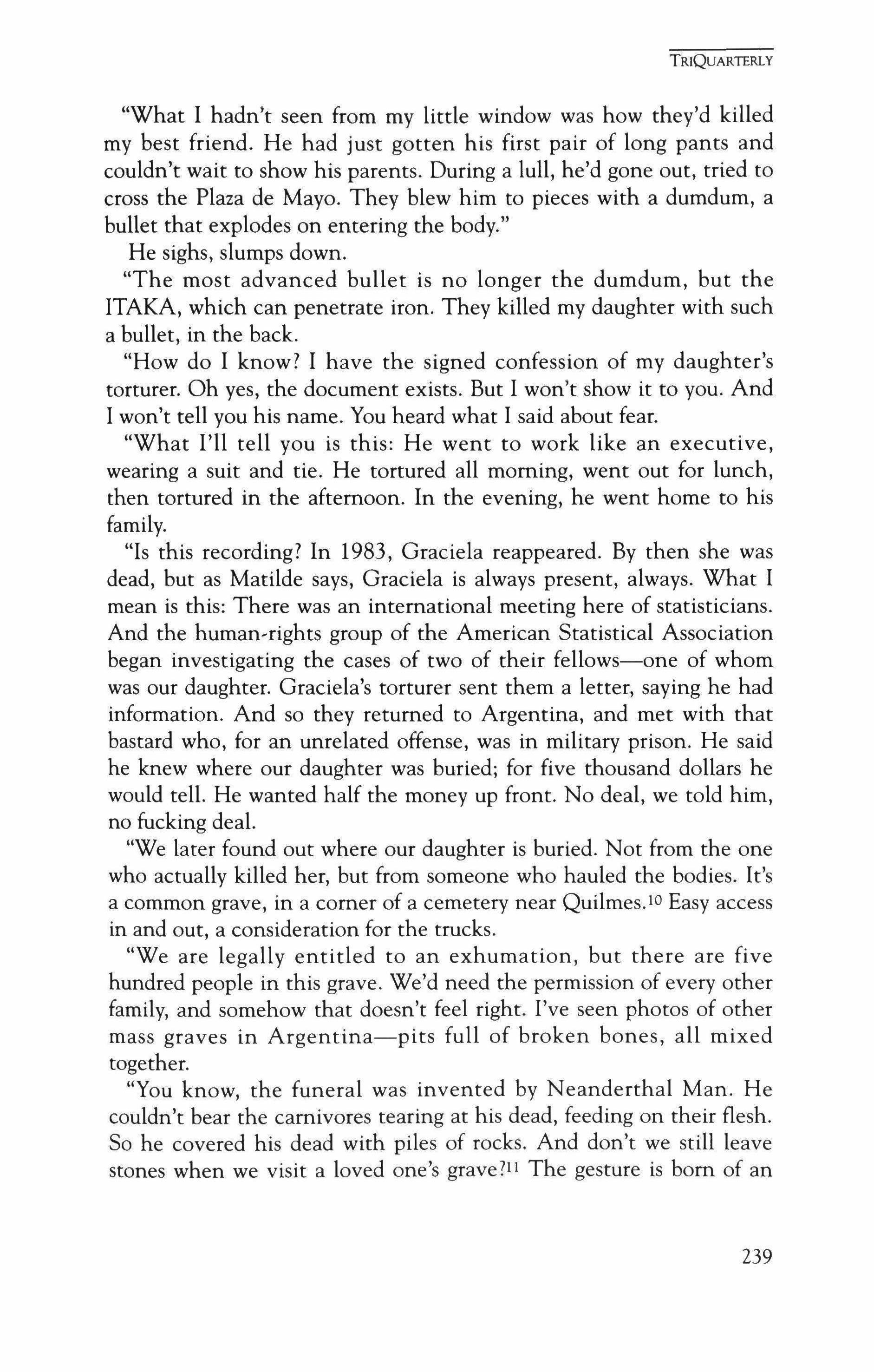
"What I hadn't seen from my little window was how they'd killed my best friend. He had just gotten his first pair of long pants and couldn't wait to show his parents. During a lull, he'd gone out, tried to cross the Plaza de Mayo. They blew him to pieces with a dumdum, a bullet that explodes on entering the body."
He sighs, slumps down.
"The most advanced bullet is no longer the dumdum, but the ITAKA, which can penetrate iron. They killed my daughter with such a bullet, in the back.
"How do I know? I have the signed confession of my daughter's torturer. Oh yes, the document exists. But I won't show it to you. And I won't tell you his name. You heard what I said about fear.
"What I'll tell you is this: He went to work like an executive, wearing a suit and tie. He tortured all morning, went out for lunch, then tortured in the afternoon. In the evening, he went home to his family.
"Is this recording? In 1983, Graciela reappeared. By then she was dead, but as Matilde says, Graciela is always present, always. What I mean is this: There was an international meeting here of statisticians. And the human-rights group of the American Statistical Association began investigating the cases of two of their fellows-one of whom was our daughter. Graciela's torturer sent them a letter, saying he had information. And so they returned to Argentina, and met with that bastard who, for an unrelated offense, was in military prison. He said he knew where our daughter was buried; for five thousand dollars he would tell. He wanted half the money up front. No deal, we told him, no fucking deal.
"We later found out where our daughter is buried. Not from the one who actually killed her, but from someone who hauled the bodies. It's a common grave, in a comer of a cemetery near Quilmes.tv Easy access in and out, a consideration for the trucks.
"We are legally entitled to an exhumation, but there are five hundred people in this grave. We'd need the permission of every other family, and somehow that doesn't feel right. I've seen photos of other mass graves in Argentina-pits full of broken bones, all mixed together.
"You know, the funeral was invented by Neanderthal Man. He couldn't bear the carnivores tearing at his dead, feeding on their flesh. So he covered his dead with piles of rocks. And don't we still leave stones when we visit a loved one's grave in The gesture is born of an
TRIQUARTERLY
239
ancient connection-the primal need for a tomb. The oppressors well know: Consume the dead, and you consume the living.
"What else can I tell you? After fourteen years, every day I feel more desperate. There's no anaesthesia for this pain, no scarring over. They say Time Heals-but no, el tiempo no lo cura, locura. Time doesn't heal, it makes you crazy.
"I see my daughter being tortured. I see her alone, about to die.
"I am holding the paper signed by the man who tormented her."
He stares down at his empty hands, is silent.

Antonio Francisco Valdez tortured many people, but Graciela Mellibovsky stood out in his memory: a political economist yes, she had a particular way of howling, a very particular howl under the electric prod."12
He stated this, as the document says, "In the city of Buenos Aires, on the seventeenth day of May, in the year 1984, in the headquarters of the Argentine National Commission on the Disappeared." Taking his testimony were Raul Aragon, Susana Aguad and Dr. Raul Rayes. All together Valdez deposed on six occasions: April 2, April 11, May 17, May 31, June 6, June 27, 1984. Sessions were relatively short, as he was a prisoner then in Penitentiary No. 17, having tried for more than his "fair share" of the spoils stolen from detainees.
He allowed that Graciela Mellibovsky was interrogated in the camp called Olympus. (From other accounts, we know that in the torture chamber there was a sign that read: "Welcome to the Olympus of the gods. Signed: The centurions.") He further allowed that, sometime during September 1976, Graciela Mellibovsky was taken out and shot, as her father had told me.
Valdez gave information on scores of former colleagues and desaparecidos. In the early seventies, he was a low-ranking army officer; in 1975, his career took an upward tum. He attended the School of the Americas, at Fort Gulick, in Panama, which specializes in counterinsurgency, intelligence and interrogation. Valdez said he studied primarily with Green Berets who had served in Vietnam and French Black Berets who had been in Cambodia. Upon returning to Argentina, he was promoted to a job in "intelligence," which, of course, was a euphemism.
Valdez's deposition was more an attempt at commerce than an act of
TRIQUARTERLY
* * *
240
confession. His words communicate no remorse. Susana Aguad put it to me this way, "He'd come forward to make a deal. He thought if he testified for us, he wouldn't be court-rnartialed by them. Anyway, he eventually found himself a deal. Some embassy got him out. He's got a new country, a new name, a 'normal' life with his family."13
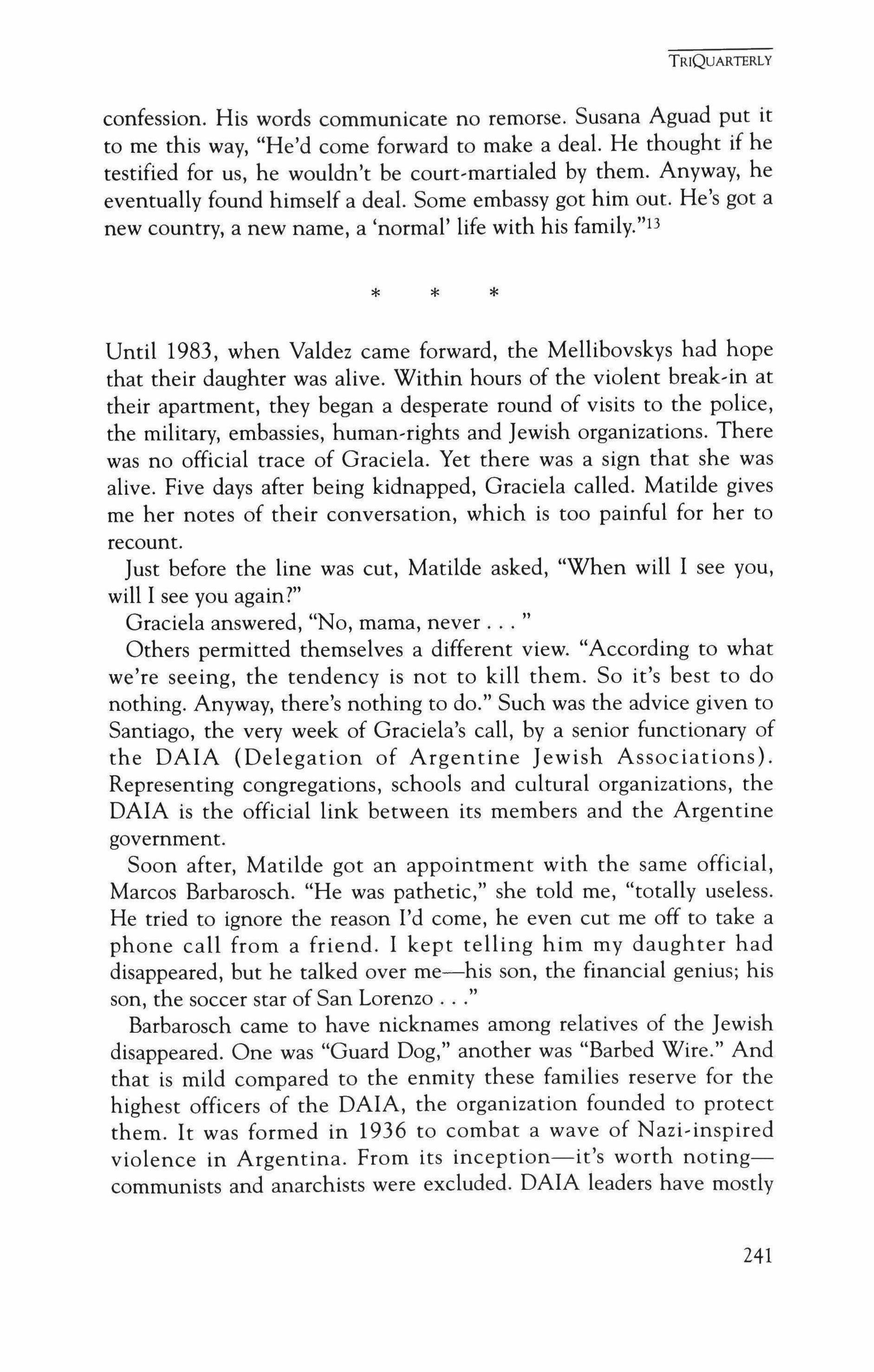
Until 1983, when Valdez came forward, the Mellibovskys had hope that their daughter was alive. Within hours of the violent break-in at their apartment, they began a desperate round of visits to the police, the military, embassies, human-rights and Jewish organizations. There was no official trace of Graciela. Yet there was a sign that she was alive. Five days after being kidnapped, Graciela called. Matilde gives me her notes of their conversation, which is too painful for her to recount.
Just before the line was cut, Matilde asked, "When will I see you, will I see you again?"
Graciela answered, "No, mama, never Others permitted themselves a different view. "According to what we're seeing, the tendency is not to kill them. So it's best to do nothing. Anyway, there's nothing to do." Such was the advice given to Santiago, the very week of Graciela's call, by a senior functionary of the DAIA (Delegation of Argentine Jewish Associations). Representing congregations, schools and cultural organizations, the DAIA is the official link between its members and the Argentine government.
Soon after, Matilde got an appointment with the same official, Marcos Barbarosch. "He was pathetic," she told me, "totally useless. He tried to ignore the reason I'd come, he even cut me off to take a phone call from a friend. I kept telling him my daughter had disappeared, but he talked over me-his son, the financial genius; his son, the soccer star of San Lorenzo Barbarosch came to have nicknames among relatives of the Jewish disappeared. One was "Guard Dog," another was "Barbed Wire." And that is mild compared to the enmity these families reserve for the highest officers of the DAIA, the organization founded to protect them. It was formed in 1936 to combat a wave of Nazi-inspired violence in Argentina. From its inception-it's worth notingcommunists and anarchists were excluded. DAIA leaders have mostly
TRIQUARTERLY
* * *
241
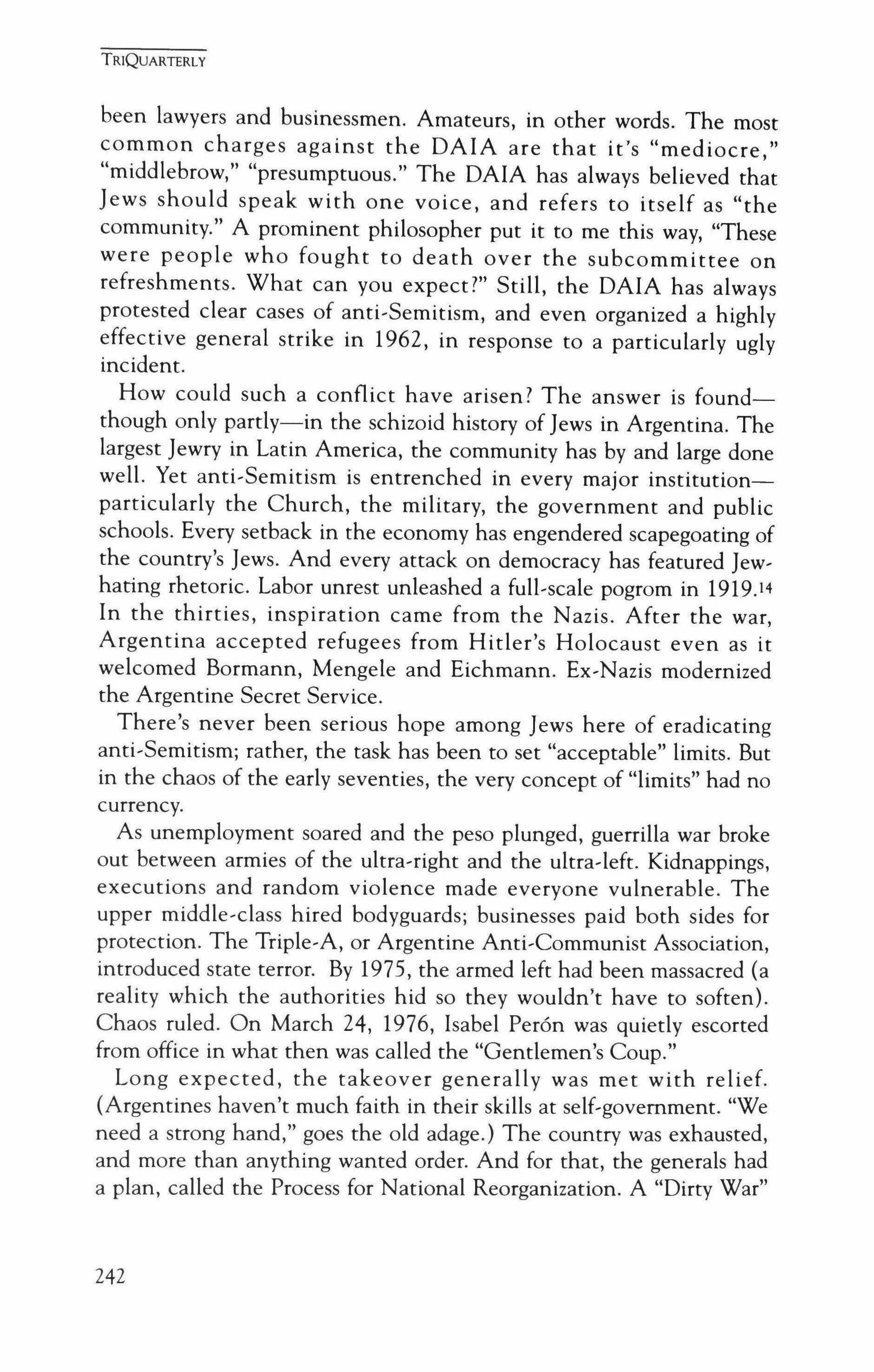
been lawyers and businessmen. Amateurs, in other words. The most common charges against the DAIA are that it's "mediocre," "middlebrow," "presumptuous." The DAIA has always believed that Jews should speak with one voice, and refers to itself as "the community." A prominent philosopher put it to me this way, "These were people who fought to death over the subcommittee on refreshments. What can you expect!" Still, the DAIA has always protested clear cases of anti-Semitism, and even organized a highly effective general strike in 1962, in response to a particularly ugly incident.
How could such a conflict have arisen? The answer is foundthough only partly-in the schizoid history of Jews in Argentina. The largest Jewry in Latin America, the community has by and large done well. Yet anti-Semitism is entrenched in every major institutionparticularly the Church, the military, the government and public schools. Every setback in the economy has engendered scapegoating of the country's Jews. And every attack on democracy has featured [ewhating rhetoric. Labor unrest unleashed a full-scale pogrom in 1919.14 In the thirties, inspiration came from the Nazis. After the war, Argentina accepted refugees from Hitler's Holocaust even as it welcomed Bormann, Mengele and Eichmann. Ex-Nazis modernized the Argentine Secret Service.
There's never been serious hope among Jews here of eradicating anti-Semitism; rather, the task has been to set "acceptable" limits. But in the chaos of the early seventies, the very concept of "limits" had no currency.
As unemployment soared and the peso plunged, guerrilla war broke out between armies of the ultra-right and the ultra-left. Kidnappings, executions and random violence made everyone vulnerable. The upper middle-class hired bodyguards; businesses paid both sides for protection. The Triple-A, or Argentine Anti-Communist Association, introduced state terror. By 1975, the armed left had been massacred (a reality which the authorities hid so they wouldn't have to soften). Chaos ruled. On March 24, 1976, Isabel Peron was quietly escorted from office in what then was called the "Gentlemen's Coup."
Long expected, the takeover generally was met with relief. (Argentines haven't much faith in their skills at self-government. "We need a strong hand," goes the old adage.) The country was exhausted, and more than anything wanted order. And for that, the generals had a plan, called the Process for National Reorganization. A "Dirty War"
TRIQUARTERLY
242
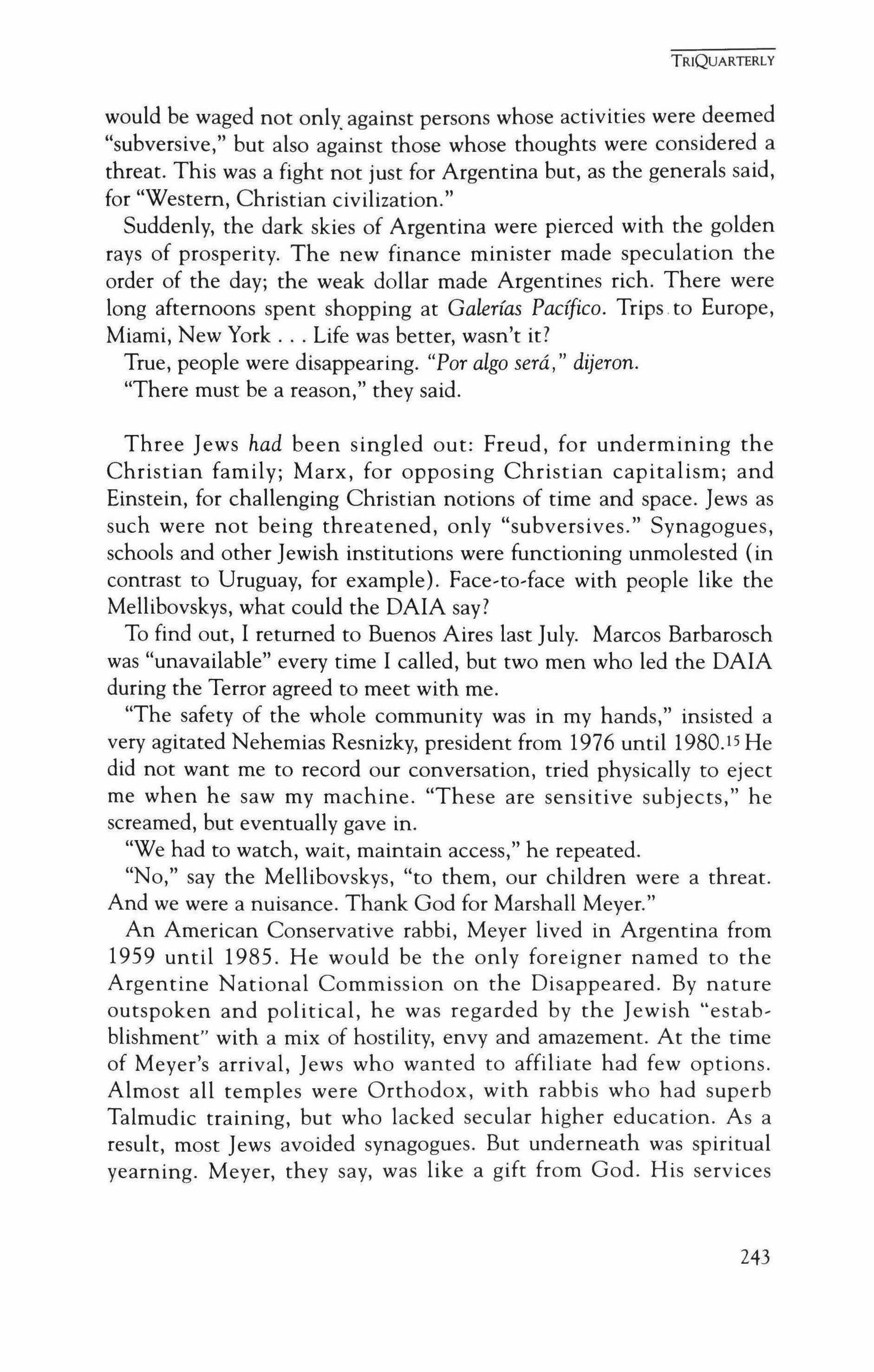
would be waged not only. against persons whose activities were deemed "subversive," but also against those whose thoughts were considered a threat. This was a fight not just for Argentina but, as the generals said, for "Western, Christian civilization."
Suddenly, the dark skies of Argentina were pierced with the golden rays of prosperity. The new finance minister made speculation the order of the day; the weak dollar made Argentines rich. There were long afternoons spent shopping at Galerias Pacifico. Trips. to Europe, Miami, New York Life was better, wasn't it?
True, people were disappearing. "Par alga sera," dijeron.
"There must be a reason," they said.
Three Jews had been singled out: Freud, for undermining the Christian family; Marx, for opposing Christian capitalism; and Einstein, for challenging Christian notions of time and space. Jews as such were not being threatened, only "subversives." Synagogues, schools and other Jewish institutions were functioning unmolested (in contrast to Uruguay, for example). Face-to-face with people like the Mellibovskys, what could the DAIA say?
To find out, I returned to Buenos Aires last July. Marcos Barbarosch was "unavailable" every time I called, but two men who led the DAIA during the Terror agreed to meet with me.
"The safety of the whole community was in my hands," insisted a very agitated Nehemias Resnizky, president from 1976 until 1980.15 He did not want me to record our conversation, tried physically to eject me when he saw my machine. "These are sensitive subjects," he screamed, but eventually gave in.
"We had to watch, wait, maintain access," he repeated. "No," say the Mellibovskys, "to them, our children were a threat. And we were a nuisance. Thank God for Marshall Meyer."
An American Conservative rabbi, Meyer lived in Argentina from 1959 until 1985. He would be the only foreigner named to the Argentine National Commission on the Disappeared. By nature outspoken and political, he was regarded by the Jewish "estabblishment" with a mix of hostility, envy and amazement. At the time of Meyer's arrival, Jews who wanted to affiliate had few options. Almost all temples were Orthodox, with rabbis who had superb Talmudic training, but who lacked secular higher education. As a result, most Jews avoided synagogues. But underneath was spiritual yearning. Meyer, they say, was like a gift from God. His services
TRIQUARTERLY
243

galvanized the community, particularly the young. A protege of Abraham Joshua Heschel, Meyer founded the first Conservative rabbinical seminary in Latin America, and the unprecedented Bet EI, a synagogue rooted in the Prophetic Tradition and Liberation Theology. From his pulpit, Meyer openly denounced the generals and their "Dirty War." Services overflowed, and not only with JewsCatholics, Protestants, atheists, and of course members of the Secret Service, came to hear Meyer's news. He got death threats every week, but still met with relatives of the disappeared, visited jails and marched with the Mothers of the Plaza de Mayo. Yet he agonized that he was endangering the community. "Should I stop?" he asked Heschel, who thought for a moment, then replied, "You'll endanger their souls if you are silent."16
"My political position," says Meyer, "was very clear, and I said it to Resnizky: 'You don't have cordial relations with Hitler.'
"It's not that I think the DAIA was evil," Meyer glosses, "but they were silent, acquiescent. They are guilty of sins of omission, which in Jewish Law are as bad as sins of commission."
The specter of acts omitted-and committed-by the DAIA still haunts the Jewish community.
By September 1976, when the Mellibovskys made their first desperate visit to the DAIA, reports of Nazi activity in Argentine jails were circulating internationally. Graciela had disappeared on the 25th, and called home on the 30th. On the 28th and 29th, the u.S. House of Representatives had a special session on human rights in Argentina. Burton Levinson, president of the Latin American Affairs Department of the Anti-Defamation League of B'nai B'rith, testified that anti-Semitism appeared to be a factor in abductions. Also testifying was Father James Weeks, an American priest who had been kidnapped, jailed, then expelled from Argentina. "In their talk and behavior," Weeks declared, "the kidnappers were like Nazis."!" The DAIA certainly knew of this session, as they were constantly in touch with the ADL.
Soon after the coup, an American rabbi in New York started getting visits from Argentines whose loved ones had disappeared. By the end of 1976, Morton Rosenthal, director of the Latin American Affairs Department of the Anti-Defamation League of B'nai B'rith, had a list of over six hundred desaparecidos. Most, but not all, were Jews. Rosenthal-like Meyer-received anyone who needed help. Of the Jews who went to him, many complained about the DAIA.
TRIQUARTERLY
244

"So I sent them these six hundred names," Rosenthal told me last summer.tf "and got no response. Then, about two months later, I had a visit from one Alfredo Baumetz-vice president of B'nai B'rith and a member of the DAIA. 'Where did you get those names?' he kept asking. He brought no information, and requested no cooperation. All he wanted to know was where I'd gotten the names."
Soon after, Rosenthal got a letter from the late Helmut Heinemann, German-born and a top leader of B'nai B'rith in Buenos Aires. "He was extremely irate," said Rosenthal. "I was endangering the community-according to him-and should stop."
Rosenthal would not stop. As he saw it, he had a moral obligation to act. Against the better wishes of his immediate superior, and over the opposition of B'nai B'rith, he forged on with The Argentine Prisoners Project, a series of booklets with photos and brief bios of detainees and desaparecidos. Rosenthal raised the monies himself, and eventually had 25,000 such pamphlets in circulation.
"Officially," said Rosenthal, "the DAIA didn't obstruct me. They just didn't help, though we promised them anonymity."
Nor would they publicly discuss the disappearances.
In 1977, however, they had no choice. On April 15, Jacobo Timerman-the country's most famous journalist, and perhaps its best, known Zionist-was kidnapped from his horne by a heavily armed military commando because the generals suspected that one of Timerman's business partners, David Graiver, was bankrolling the Montoneros.t? (Timerman, who survived torture, deprivation and two years of captivity, rendered the ordeal in Prisoner Without a Name, Cell Without a Number. An indispensable volume, Prisoner has been dissected all over the world, so I won't dwell on it today.w) There was immediate international protest to Timerman's abduction. A few days after Timerman disappeared, Meyer requested a special meeting at the DAIA, located in the heart of Once, a neighborhood full of Kosher stores and Yiddish signs.
"I said I was going to raise money for a full-page ad," Meyer recounted last summer in New York. "It would call for the immediate release of Timerman, and all the other disappeared. Well, all they heard was 'Timerman,' and their immediate reaction was, 'What if he's done something wrong?' As though anything could justify dis, appearance. What about habeas corpus, for God's sake? It was a terrible meeting, in fact the last."
Careful to stay uninvolved with Timerman, the DAIA nonetheless
TRIQUARTERLY
245

spoke out against several concrete instances of anti-Semitism. Then, on July 27, Nehemias Resnizky's twenty-two-year-old son Marcos was abducted. Of course the father did everything possible to save his son. As well he should. Given his position, he had extraordinary access. He went directly to the highest echelons, including Cyrus Vance and the Argentine minister of the interior, the notoriously anti-Semitic Albano Harguindeguy. Ninety-six hours after he'd been taken, Marcos-who'd been hideously tortured-was driven home by government agents. Recovering him had proved a bloody ordeal. He'd been taken by the First Army Corps, which didn't want to give him back. So Interior went in and murdered two of his captors. Marcos was then flown to Tel Aviv, where he'd been granted asylum. The father, too, could have left the country. But he did not. He continued as president of the DAIA and, at least for a time, bereaved parents sought his help.
"They couldn't refuse to receive us," said Matilde, "that would have been too obvious. But they wouldn't see individuals, or couples, only groups. They'd herd us around, make us wait in the hall. There would be more than a hundred of us, we'd fill an auditorium. All the officers were nervous, but Resnizky was a wreck. He kept leaping from his seat; the man next to him literally had to hold him down. To one of these meetings came a Polish couple by the name of Russ. Both had survived Nazi concentration camps; in fact that was where they'd met. After the war, they'd 'started life over' in Argentina. Now both of their children had disappeared. Senor Russ came with a letter of protest in which he compared the DAIA's conduct to that of the Polish bourgeoisie in the thirties. A number of us were taken aback, but his charges were so well formulated. And he'd been there, we had not. In any case, Resnizky should have resigned. After recovering his son, it was clear he couldn't agitate for anyone else."
From 1977 on, DAIA statements and publications indicate ever closer relations with Harguindeguy, minister of the interior. This Ministry was integrally involved in the disappearances, and had its own budget for arms. Harguindeguy was irritated with what he described as a "worldwide campaign against Argentina." By now, there was a large number of exiles-forced and voluntary, Jewish and gentile-and they were testifying to the press and human-rights groups. On March 4, 1978, the Hungarian novelist and painter Marek Halter wrote in Le Monde that "Jews in Argentina were more frightened than those in Hungary." Harguindeguy was furious, and told
TRIQUARTERLY
246

Resnizky to write a rebuttal. After some temporizing, Resnizky declared that "[Halter's] article was prejudicial, and harmful to our country [and] contained information that was absolutely inexact [sic]. Jewish religious, educational and cultural life was normal. That," he stressed, "has been and continues to be our objective. Jewish life and Zionist activity are free in Argentina." That statement was circulated internationally by the World Jewish Congress. In late April, the Congress met in Herzlia, Israel. In his address to that body, Resnizky focused on neo-Naztsm in the United States and Europe. Yes, he said, there were anti-Jewish incidents in Argentina as well, but they shouldn't be exaggerated "lest they benefit interests outside the Jewish community." The DAIA, he said, had made good use of its access to the government in order to have several anti-Semitic magazines banned. About detainees or desaparecidos, he didn't say a word. But he reminded his fellow delegates that chapters could not get involved in foreign domestic matters without the express prior permission of the local Congress authorities. In the case of Argentina, that meant the DAIA.zl
Resnizky was proving to be a good ambassador. And so the junta had him make a video of his recent statements. That film was seen by Esteban Takacs, Argentine Ambassador in Ottawa and a delegate to the Canadian Jewish Congress.22 The film seemed to prove that official Jewry in Argentina was "captive," the one exception in the Congress's nonintervention policy. That perception was strengthened by the visit of Renee Epelbaum, a prominent Mother of the Plaza whose three children were missing. When the Canadians made overtures, the DAIA threatened to bolt from the World Jewish Congress.
"So," said Rosenthal, "because the DAIA was dishonest about the situation in Argentina, organized world Jewry was essentially passive." Resnizky had also paved the way for General Videla's '78 visit to the States.
Rosenthal was fighting an uphill battle within his own organization. But that changed in 1979, when Ben Epstein, National Director of the ADL, traveled to Buenos Aires. What follows is from an internal memo, dated February 16, 1979:
As an American student in Berlin in the 1930s I saw Hitler ride to power and the almost immediate consequences. I have seen Spain under fascism and Russia under communism But [none] of this prepared me for the [time] I spent in Buenos Aires
TRlQuARTERLY
247
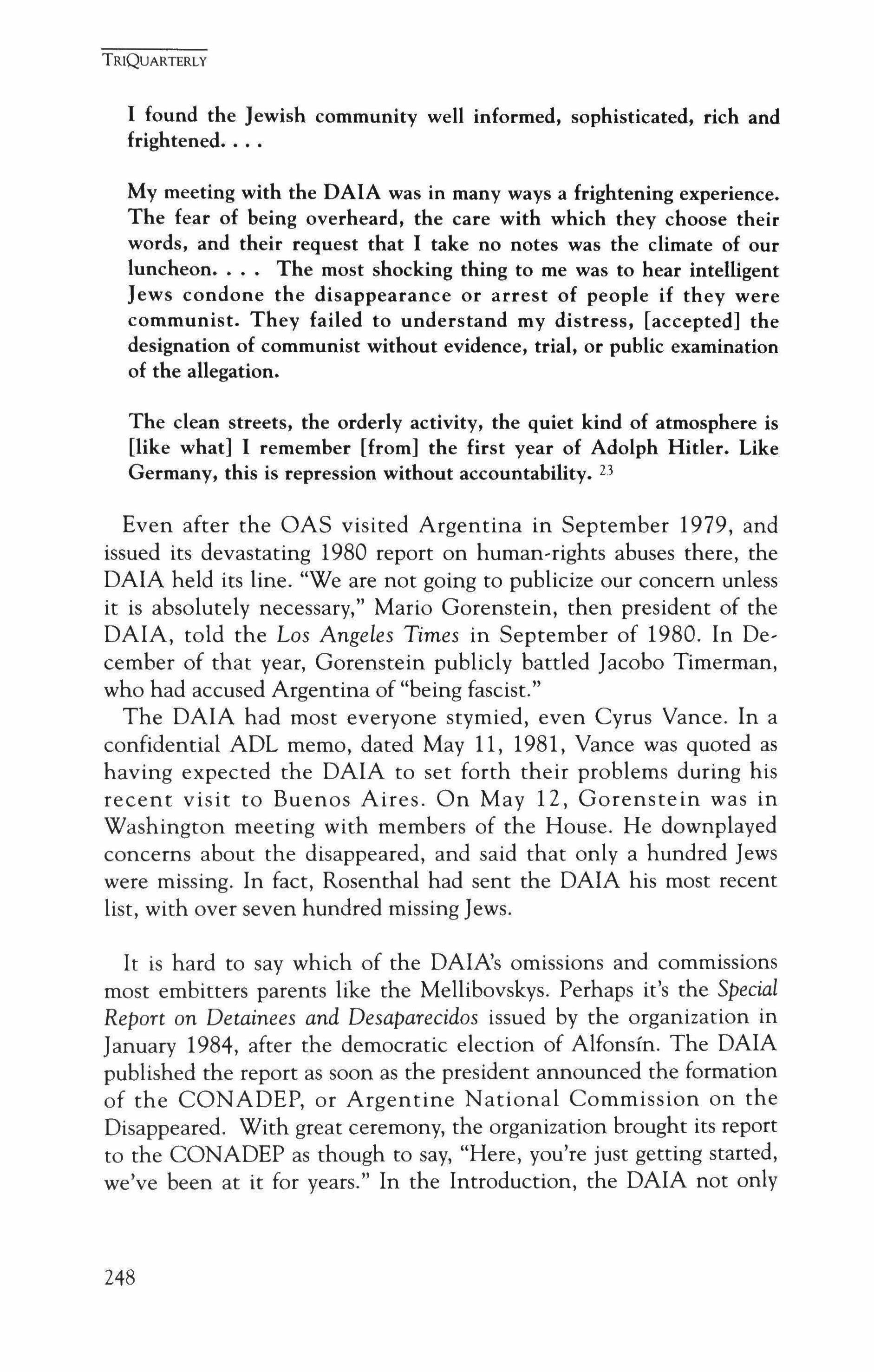
I found the Jewish community well informed, sophisticated, rich and frightened •••.
My meeting with the DAIA was in many ways a frightening experience. The fear of being overheard, the care with which they choose their words, and their request that I take no notes was the climate of our luncheon. The most shocking thing to me was to hear intelligent Jews condone the disappearance or arrest of people if they were communist. They failed to understand my distress, [accepted] the designation of communist without evidence, trial, or public examination of the allegation.
The clean streets, the orderly activity, the quiet kind of atmosphere is [like what] I remember [from] the first year of Adolph Hitler. Like Germany, this is repression without accountability. 23
Even after the OAS visited Argentina in September 1979, and issued its devastating 1980 report on human-rights abuses there, the DAIA held its line. "We are not going to publicize our concern unless it is absolutely necessary," Mario Gorenstein, then president of the DAIA, told the Los Angeles Times in September of 1980. In December of that year, Gorenstein publicly battled Jacobo Timerman, who had accused Argentina of "being fascist."
The DAIA had most everyone stymied, even Cyrus Vance. In a confidential ADL memo, dated May 11, 1981, Vance was quoted as having expected the DAIA to set forth their problems during his recent visit to Buenos Aires. On May 12, Gorenstein was in Washington meeting with members of the House. He downplayed concerns about the disappeared, and said that only a hundred Jews were missing. In fact, Rosenthal had sent the DAIA his most recent list, with over seven hundred missing Jews.
It is hard to say which of the DAIA's omissions and commissions most embitters parents like the Mellibovskys. Perhaps it's the Special Report on Detainees and Desaparecidos issued by the organization in January 1984, after the democratic election of Alfonsfn. The DAIA published the report as soon as the president announced the formation of the CONADEP, or Argentine National Commission on the Disappeared. With great ceremony, the organization brought its report to the CONADEP as though to say, "Here, you're just getting started, we've been at it for years." In the Introduction, the DAIA not only
TRIQUARTERLY
248

states, but underscores: "[We] assumed, with neither evasion nor vacillation, the defense of Jews whose disappearance was reported to our institution [This, from] our unconditional commitment to the integrity of Jewish life, the defense of Jewish interests, which are inseparable from human rights."
"Such lies stop the heart," says Matilde.
And then there is "Appendix 11," or the infamous "195." This consists of a list-195 detainees and desaparecidos. Why 195? No one seems to know. (By then, Rosenthal had sent the DAIA 1200 names.)
The list is remarkable in other ways, as well. For one thing, it's full of mistakes. Known survivors are listed as dead, or missing. Eusebio Fingerhut had the dubious pleasure of presenting himself at the DAIA and asking, "So, do I look dead?" Fingerhut had testified in exile, but apparently the DAIA hadn't been paying attention. According to this report, Santiago Mellibovskv waited nearly a year before reporting the disappearance of his daughter. And only one of Renee Epelbaum's missing children is included; it is well known in Argentina that she lost all three. Certain names have clarifying tags: "Presumed guerrilla"; "Presumed Montonero"; "Worked in shantytowns"; "Active since youth in politics."
"It's a police report," Matilde fumed. In protest, a group of families (including the Mellibovskys) wrote, and published, an extensive rebuttal.s+
I asked Gorenstein last summer why the Report was so controversial.o
"Look," he said, "anything was insufficient if it didn't bring back their relatives. No matter what you did, if it didn't work, they were suspicious. Blah, blah, blah, I've heard it all. The DAIA did try."
Gorenstein is a fair, portly man who flushes easily. He is an exquisitely dressed attorney given to emphatic gestures and imposing postures. Even when he is calm, he speaks loudly.
I tell him I'm puzzled by the ideological tags. That was not the kind of information supplied by parents. Could the list have come from the Ministry of the Interior?
"Very possible," he says, sitting up straight. "We were always in close contact."
I ask why the list is so small.
"Every case reported to the DAIA is on the list," he says, without blinking. "Not everyone came to us for help." He leans toward me, across his desk.
TRIQUARTERLY
249
TRIQUARTERLY
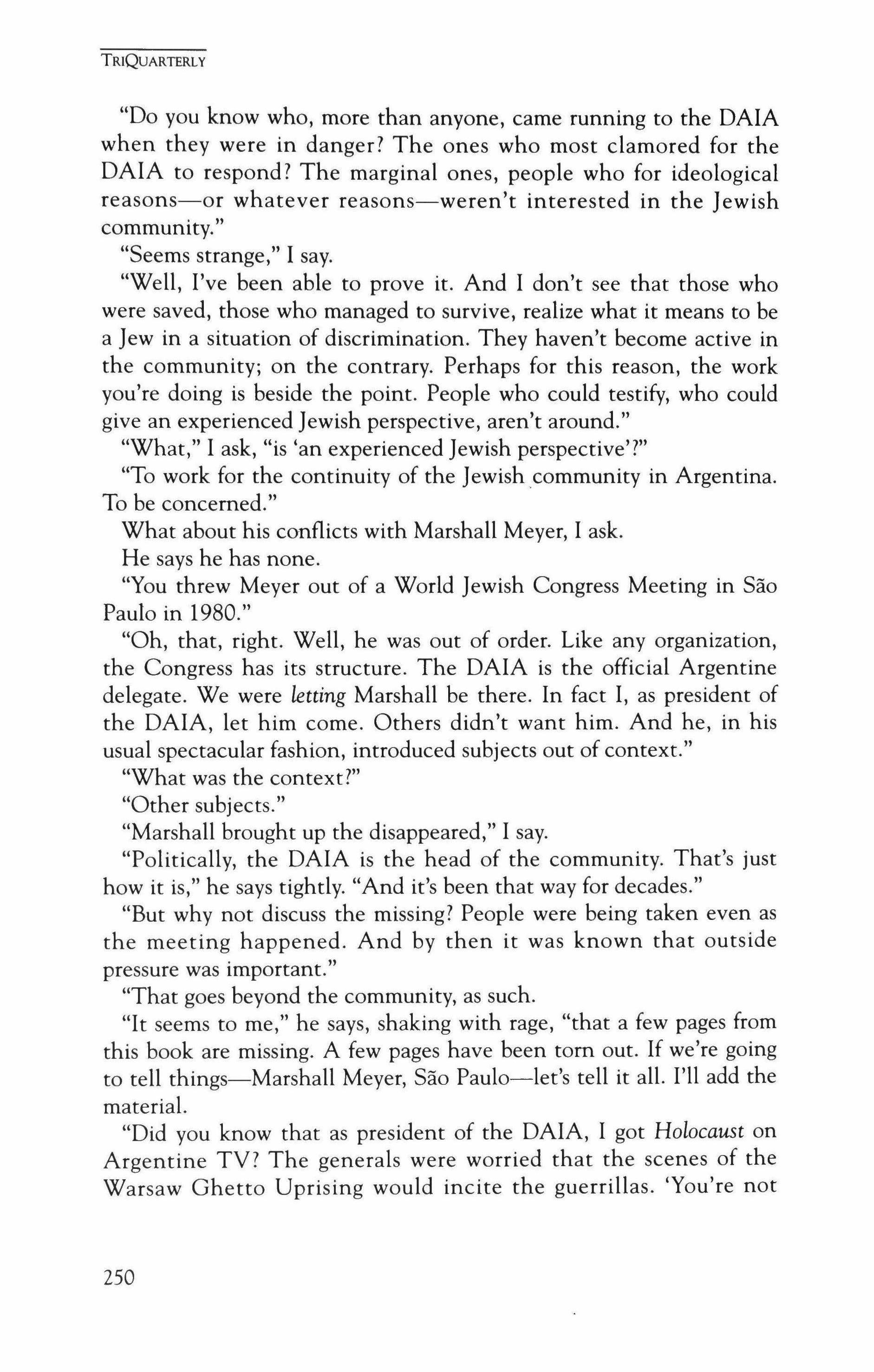
"Do you know who, more than anyone, came running to the DAIA when they were in danger? The ones who most clamored for the DAIA to respond? The marginal ones, people who for ideological reasons-or whatever reasons-weren't interested in the Jewish community."
"Seems strange," I say.
"Well, I've been able to prove it. And I don't see that those who were saved, those who managed to survive, realize what it means to be a Jew in a situation of discrimination. They haven't become active in the community; on the contrary. Perhaps for this reason, the work you're doing is beside the point. People who could testify, who could give an experienced Jewish perspective, aren't around."
"What," I ask, "is 'an experienced Jewish perspective'?"
"To work for the continuity of the Jewishcommunity in Argentina. To be concerned."
What about his conflicts with Marshall Meyer, I ask.
He says he has none.
"You threw Meyer out of a World Jewish Congress Meeting in Sao Paulo in 1980."
"Oh, that, right. Well, he was out of order. Like any organization, the Congress has its structure. The DAIA is the official Argentine delegate. We were letting Marshall be there. In fact I, as president of the DAIA, let him come. Others didn't want him. And he, in his usual spectacular fashion, introduced subjects out of context."
"What was the context?"
"Other subjects."
"Marshall brought up the disappeared," I say.
"Politically, the DAIA is the head of the community. That's just how it is," he says tightly. "And it's been that way for decades."
"But why not discuss the missing? People were being taken even as the meeting happened. And by then it was known that outside pressure was important."
"That goes beyond the community, as such.
"It seems to me," he says, shaking with rage, "that a few pages from this book are missing. A few pages have been tom out. If we're going to tell things-Marshall Meyer, Sao Paulo-let's tell it all. I'll add the material.
"Did you know that as president of the DAIA, I got Holocaust on Argentine TV? The generals were worried that the scenes of the Warsaw Ghetto Uprising would incite the guerrillas. 'You're not
250

thinking of Argentina's image,' I told them, and that did it. I'm not saying there weren't mistakes, there were, and some out of fear. I admit there was fear. And that's why I can't tell you everything, and I may change a few names
"Did you know they called me to have Jewish school children lead a parade through the streets of Buenos Aires in favor of the Malvinas war? 'Why me?' I said. 'What about the Catholic schools? They're far more numerous.' Well, that stopped them dead. I was opposed to any sort of acquiescence."
What he recounted about Holocaust is true. But there's more to the other story. On April 2, 1982, the country declared war on England over two small islands in the South Atlantic-the Malvinas, if you are Argentine; the Falklands, if you are British. As anyone could have predicted, Argentina hadn't a chance. (The ensuing fiasco would prove the undoing of the military regime, but that's another subject.)
Five days after the Argentine invasion, such as it was, the DAIA issued a long, flowery statement, from which I excerpt:
The Jewish community •.. celebrates this historic moment together with other sons of the land The Jewish people, pilgrims through the ages in search of their ancestors' land finally recovered, have had enough experience to understand and support the act of recovery of the Malvinas for the national patrimony.26
According to Morton Rosenthal's confidential memo of May 4, 1982, the statement was written by the Argentine government, and brought to the DAIA by government agents who asked the organization to issue the declaration as its own. Rosenthal got this information from an anonymous caller who said his father was active in the DAIA.
My interview with Gorenstein, which lasted nearly two hours, was full of such partial truths, untruths and calumny. I'll share one more story because, for all of Gorenstein's bluster, it reveals the tragic wages of "worldlessness," in Hannah Arendt's phrase, and the deadly potential of internalized shame.
"I'd got this call from Camps [the Buenos Aires chief of police]. He wanted to meet. I didn't want to, but people said I'd better. All right, but I set conditions. He meets my conditions. You see, I knew Camps was a real anti-Semite, but a real one, and I had an instinctive strategy. He would think I, as leader of the Jewish community, would be less than Argentine. Well, I wanted him to know that I am 251
TRIQUARTERLY
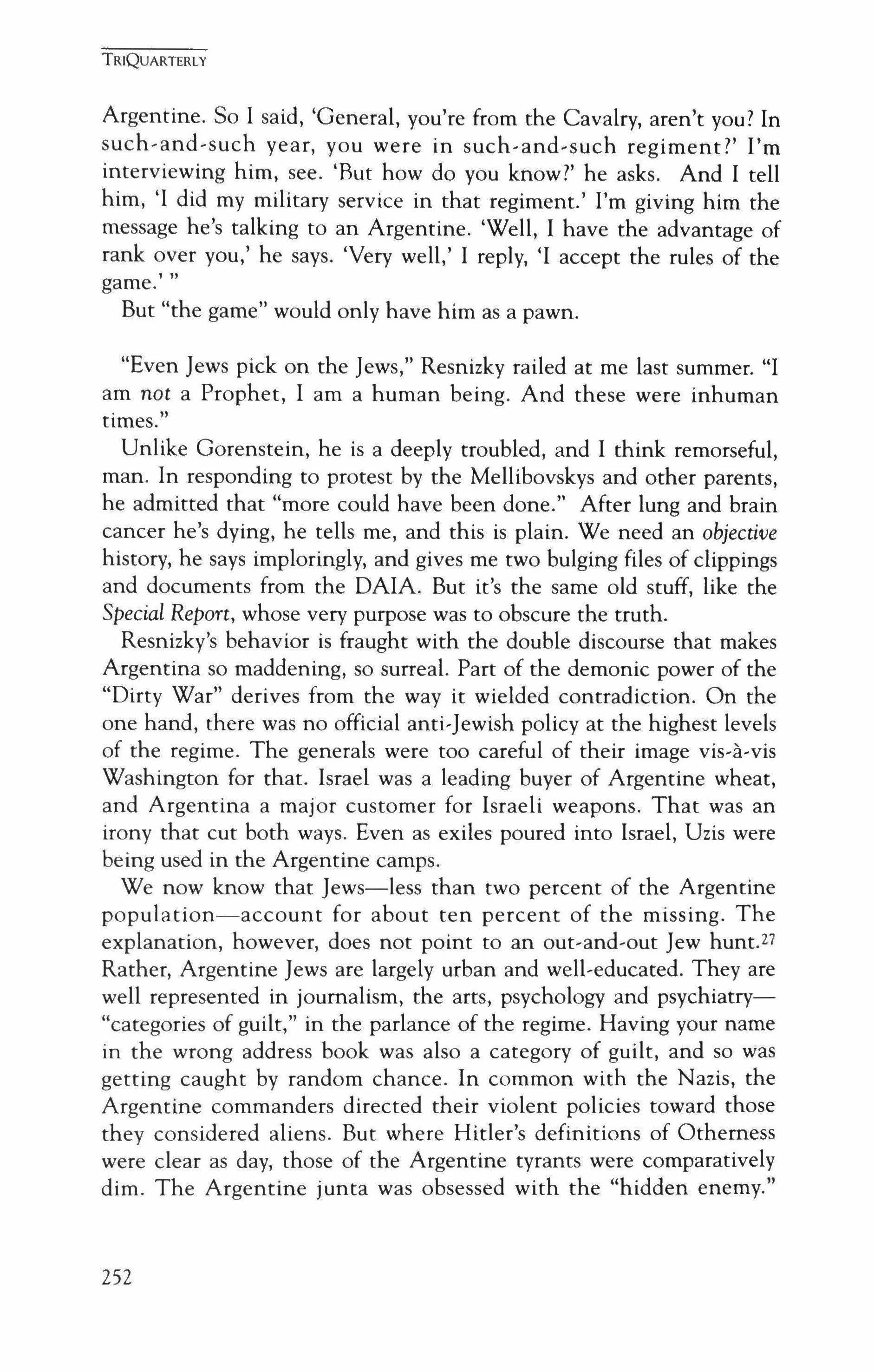
Argentine. So I said, 'General, you're from the Cavalry, aren't you? In such-and-such year, you were in such-and-such regiment?' I'm interviewing him, see. 'But how do you know?' he asks. And I tell him, 'I did my military service in that regiment.' I'm giving him the message he's talking to an Argentine. 'Well, I have the advantage of rank over you,' he says. 'Very well,' I reply, 'I accept the rules of the game.'
But "the game" would only have him as a pawn.
"Even Jews pick on the Jews," Resnizky railed at me last summer. "I am not a Prophet, I am a human being. And these were inhuman times."
Unlike Gorenstein, he is a deeply troubled, and I think remorseful, man. In responding to protest by the Mellibovskys and other parents, he admitted that "more could have been done." After lung and brain cancer he's dying, he tells me, and this is plain. We need an objective history, he says imploringly, and gives me two bulging files of clippings and documents from the DAIA. But it's the same old stuff, like the Special Report, whose very purpose was to obscure the truth.
Resnizky's behavior is fraught with the double discourse that makes Argentina so maddening, so surreal. Part of the demonic power of the "Dirty War" derives from the way it wielded contradiction. On the one hand, there was no official anti-jewish policy at the highest levels of the regime. The generals were too careful of their image vis-a-vis Washington for that. Israel was a leading buyer of Argentine wheat, and Argentina a major customer for Israeli weapons. That was an irony that cut both ways. Even as exiles poured into Israel, Uzis were being used in the Argentine camps.
We now know that Jews-less than two percent of the Argentine population-account for about ten percent of the missing. The explanation, however, does not point to an out-and-out Jew hunr.s? Rather, Argentine Jews are largely urban and well-educated. They are well represented in journalism, the arts, psychology and psychiatry"categories of guilt," in the parlance of the regime. Having your name in the wrong address book was also a category of guilt, and so was getting caught by random chance. In common with the Nazis, the Argentine commanders directed their violent policies toward those they considered aliens. But where Hitler's definitions of Otherness were clear as day, those of the Argentine tyrants were comparatively dim. The Argentine junta was obsessed with the "hidden enemy."
TRIQUARTERLY
252
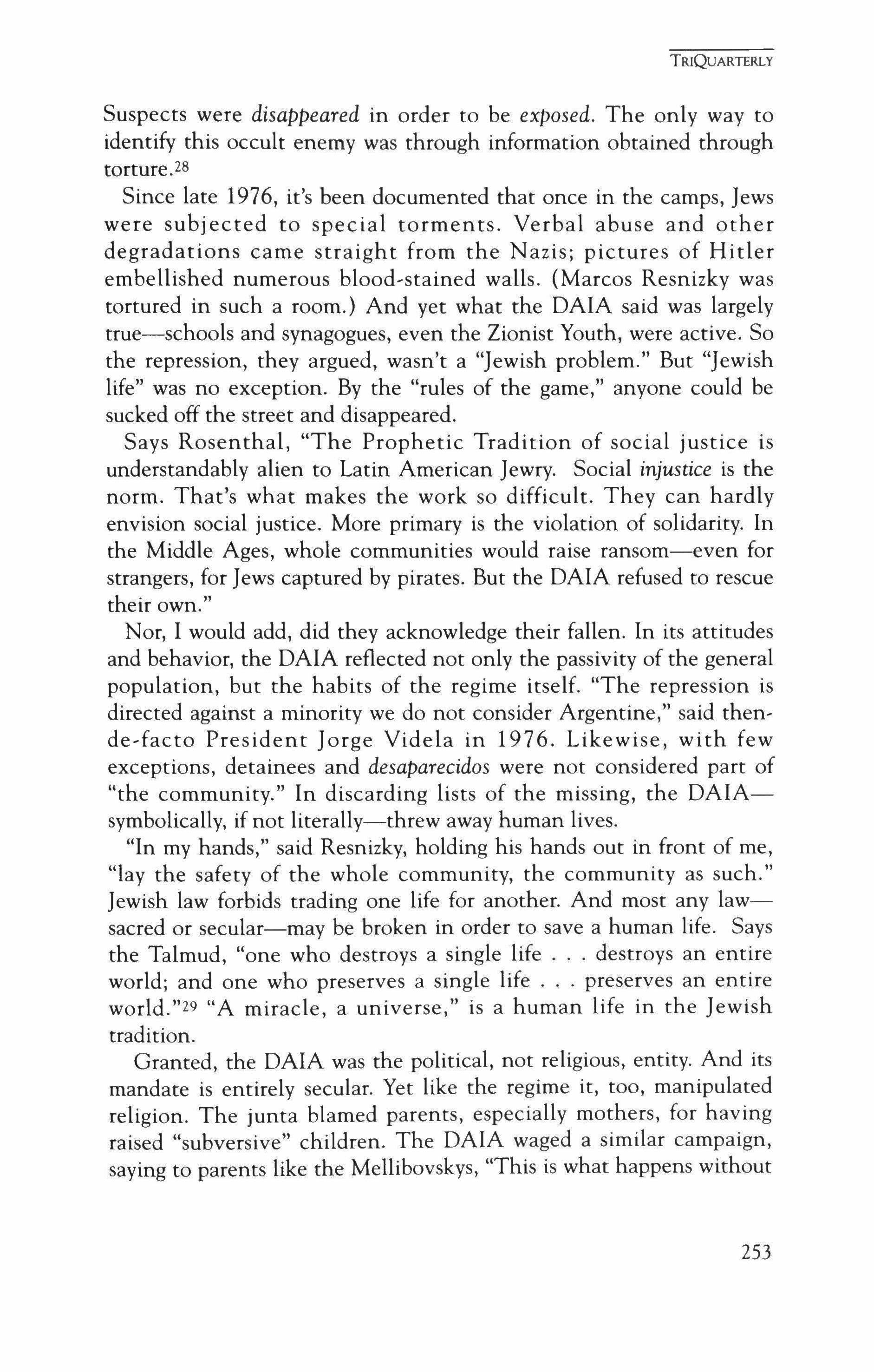
Suspects were disappeared in order to be exposed. The only way to identify this occult enemy was through information obtained through torture.28
Since late 1976, it's been documented that once in the camps, Jews were subjected to special torments. Verbal abuse and other degradations came straight from the Nazis; pictures of Hitler embellished numerous blood-stained walls. (Marcos Resnizky was tortured in such a room.) And yet what the DAIA said was largely true-schools and synagogues, even the Zionist Youth, were active. So the repression, they argued, wasn't a "Jewish problem." But "Jewish life" was no exception. By the "rules of the game," anyone could be sucked off the street and disappeared.
Says Rosenthal, "The Prophetic Tradition of social justice is understandably alien to Latin American Jewry. Social injustice is the norm. That's what makes the work so difficult. They can hardly envision social justice. More primary is the violation of solidarity. In the Middle Ages, whole communities would raise ransom-even for strangers, for Jews captured by pirates. But the DAIA refused to rescue their own."
Nor, I would add, did they acknowledge their fallen. In its attitudes and behavior, the DAIA reflected not only the passivity of the general population, but the habits of the regime itself. "The repression is directed against a minority we do not consider Argentine," said then, de-facto President Jorge Videla in 1976. Likewise, with few exceptions, detainees and desaparecidos were not considered part of "the community." In discarding lists of the missing, the DAIAsymbolically, if not literally-threw away human lives.
"In my hands," said Resnizky, holding his hands out in front of me, "lay the safety of the whole community, the community as such." Jewish law forbids trading one life for another. And most any lawsacred or secular-may be broken in order to save a human life. Says the Talmud, "one who destroys a single life destroys an entire world; and one who preserves a single life preserves an entire world."29 "A miracle, a universe," is a human life in the Jewish tradition.
Granted, the DAIA was the political, not religious, entity. And its mandate is entirely secular. Yet like the regime it, too, manipulated religion. The junta blamed parents, especially mothers, for having raised "subversive" children. The DAIA waged a similar campaign, saying to parents like the Mellibovskvs, "This is what happens without
TRIQUARTERLY
253
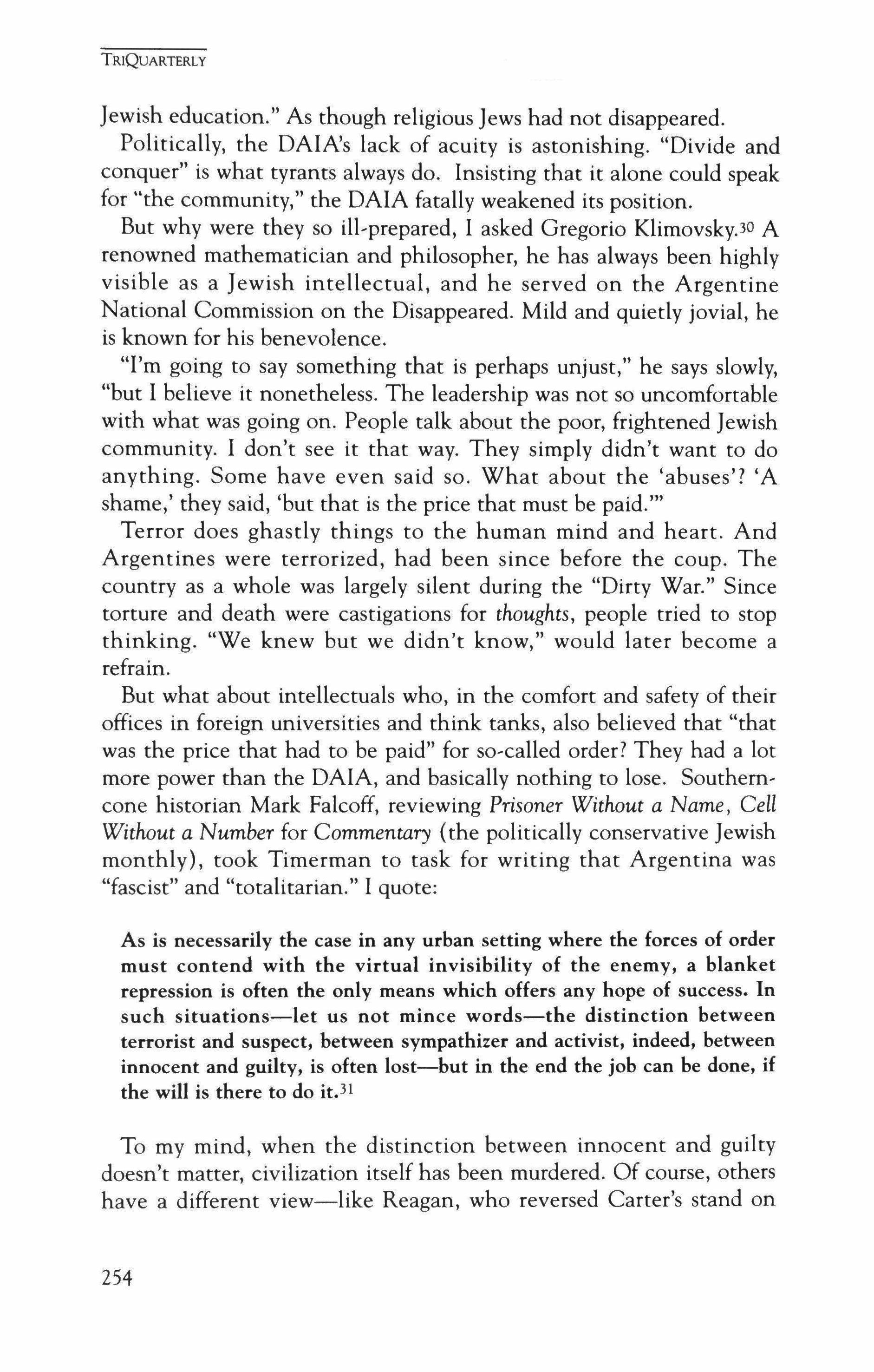
Jewish education." As though religious Jews had not disappeared. Politically, the DAIA's lack of acuity is astonishing. "Divide and conquer" is what tyrants always do. Insisting that it alone could speak for "the community," the DAIA fatally weakened its position.
But why were they so ill-prepared, I asked Gregorio Klimovsky.w A renowned mathematician and philosopher, he has always been highly visible as a Jewish intellectual, and he served on the Argentine National Commission on the Disappeared. Mild and quietly jovial, he is known for his benevolence.
"I'm going to say something that is perhaps unjust," he says slowly, "but I believe it nonetheless. The leadership was not so uncomfortable with what was going on. People talk about the poor, frightened Jewish community. I don't see it that way. They simply didn't want to do anything. Some have even said so. What about the 'abuses'? 'A shame,' they said, 'but that is the price that must be paid.'"
Terror does ghastly things to the human mind and heart. And Argentines were terrorized, had been since before the coup. The country as a whole was largely silent during the "Dirty War." Since torture and death were castigations for thoughts, people tried to stop thinking. "We knew but we didn't know," would later become a refrain.
But what about intellectuals who, in the comfort and safety of their offices in foreign universities and think tanks, also believed that "that was the price that had to be paid" for so'called order? They had a lot more power than the DAIA, and basically nothing to lose. Southern, cone historian Mark Falcoff, reviewing Prisoner Without a Name, Cell Without a Number for Commentary (the politically conservative Jewish monthly), took Timerman to task for writing that Argentina was "fascist" and "totalitarian." I quote:
As is necessarily the case in any urban setting where the forces of order must contend with the virtual invisibility of the enemy, a blanket repression is often the only means which offers any hope of success. In such situations-let us not mince words-the distinction between terrorist and suspect, between sympathizer and activist, indeed, between innocent and guilty, is often lost-but in the end the job can be done, if the will is there to do it.31
To my mind, when the distinction between innocent and guilty doesn't matter, civilization itself has been murdered. Of course, others have a different view-like Reagan, who reversed Carter's stand on
TRIQUARTERLY
254
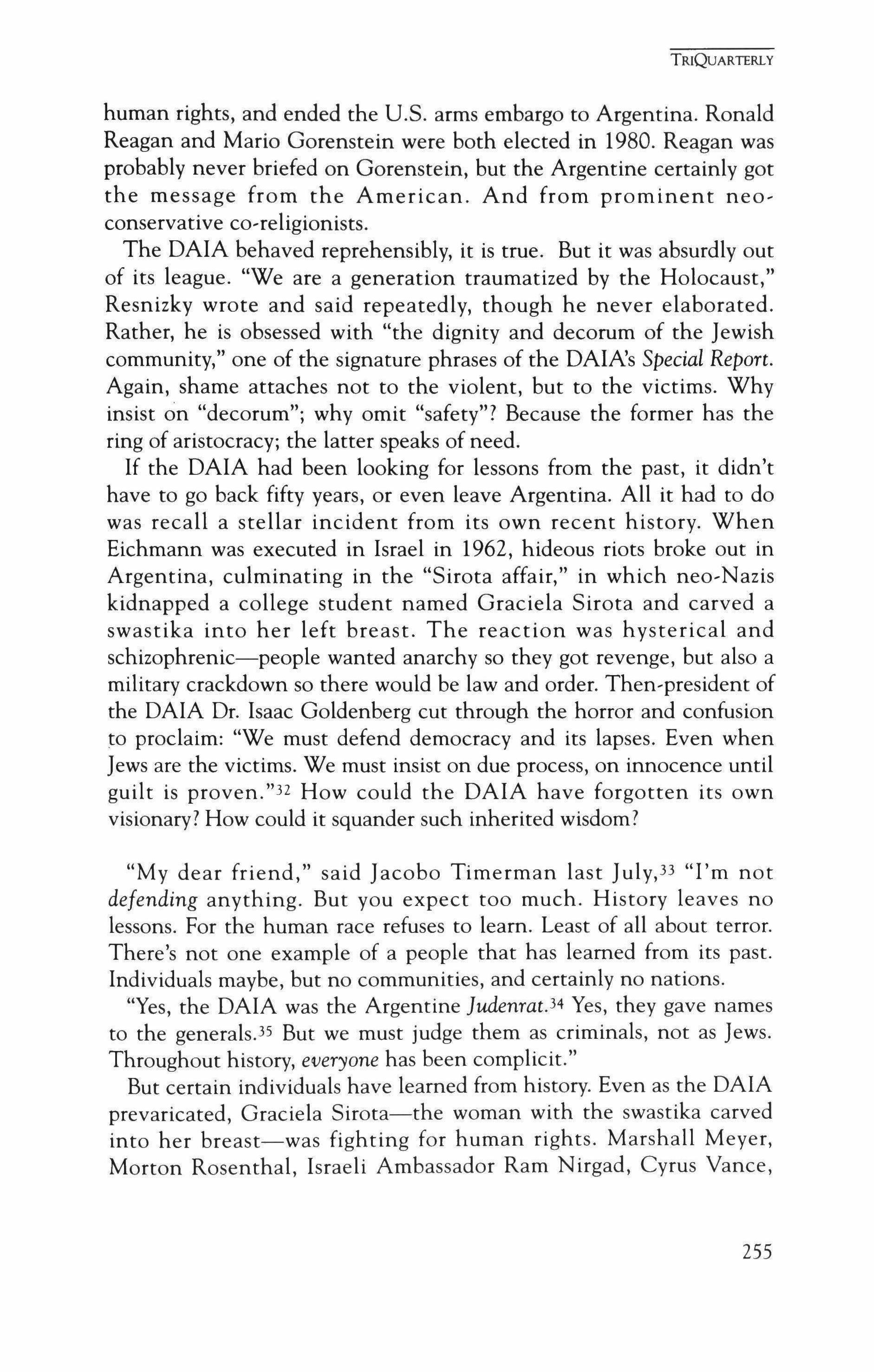
human rights, and ended the U.S. arms embargo to Argentina. Ronald Reagan and Mario Gorenstein were both elected in 1980. Reagan was probably never briefed on Gorenstein, but the Argentine certainly got the message from the American. And from prominent n e oconservative co-religionists.
The DAIA behaved reprehensibly, it is true. But it was absurdly out of its league. "We are a generation traumatized by the Holocaust," Resnizkv wrote and said repeatedly, though he never elaborated. Rather, he is obsessed with "the dignity and decorum of the Jewish community," one of the signature phrases of the DAIA's Special Report. Again, shame attaches not to the violent, but to the victims. Why insist on "decorum"; why omit "safety"? Because the former has the ring of aristocracy; the latter speaks of need.
If the DAIA had been looking for lessons from the past, it didn't have to go back fifty years, or even leave Argentina. All it had to do was recall a stellar incident from its own recent history. When Eichmann was executed in Israel in 1962, hideous riots broke out in Argentina, culminating in the "Sirota affair," in which neo-Nazis kidnapped a college student named Graciela Sirota and carved a swastika into her left breast. The reaction was hysterical and schizophrenic-people wanted anarchy so they got revenge, but also a military crackdown so there would be law and order. Then-president of the DAIA Dr. Isaac Goldenberg cut through the horror and confusion to proclaim: "We must defend democracy and its lapses. Even when Jews are the victims. We must insist on due process, on innocence until guilt is proven."32 How could the DAIA have forgotten its own visionary? How could it squander such inherited wisdom?
"My dear friend," said Jacobo Timerman last July,33 "I'm not defending anything. But you expect too much. History leaves no lessons. For the human race refuses to learn. Least of all about terror. There's not one example of a people that has learned from its past. Individuals maybe, but no communities, and certainly no nations.
"Yes, the DAIA was the Argentine Judenrat.34 Yes, they gave names to the generals." But we must judge them as criminals, not as Jews. Throughout history, everyone has been complicit."
But certain individuals have learned from history. Even as the DAIA prevaricated, Graciela Sirota-the woman with the swastika carved into her breast-was fighting for human rights. Marshall Meyer, Morton Rosenthal, Israeli Ambassador Ram Nirgad, Cyrus Vance,
TRIQUARTERLY
255
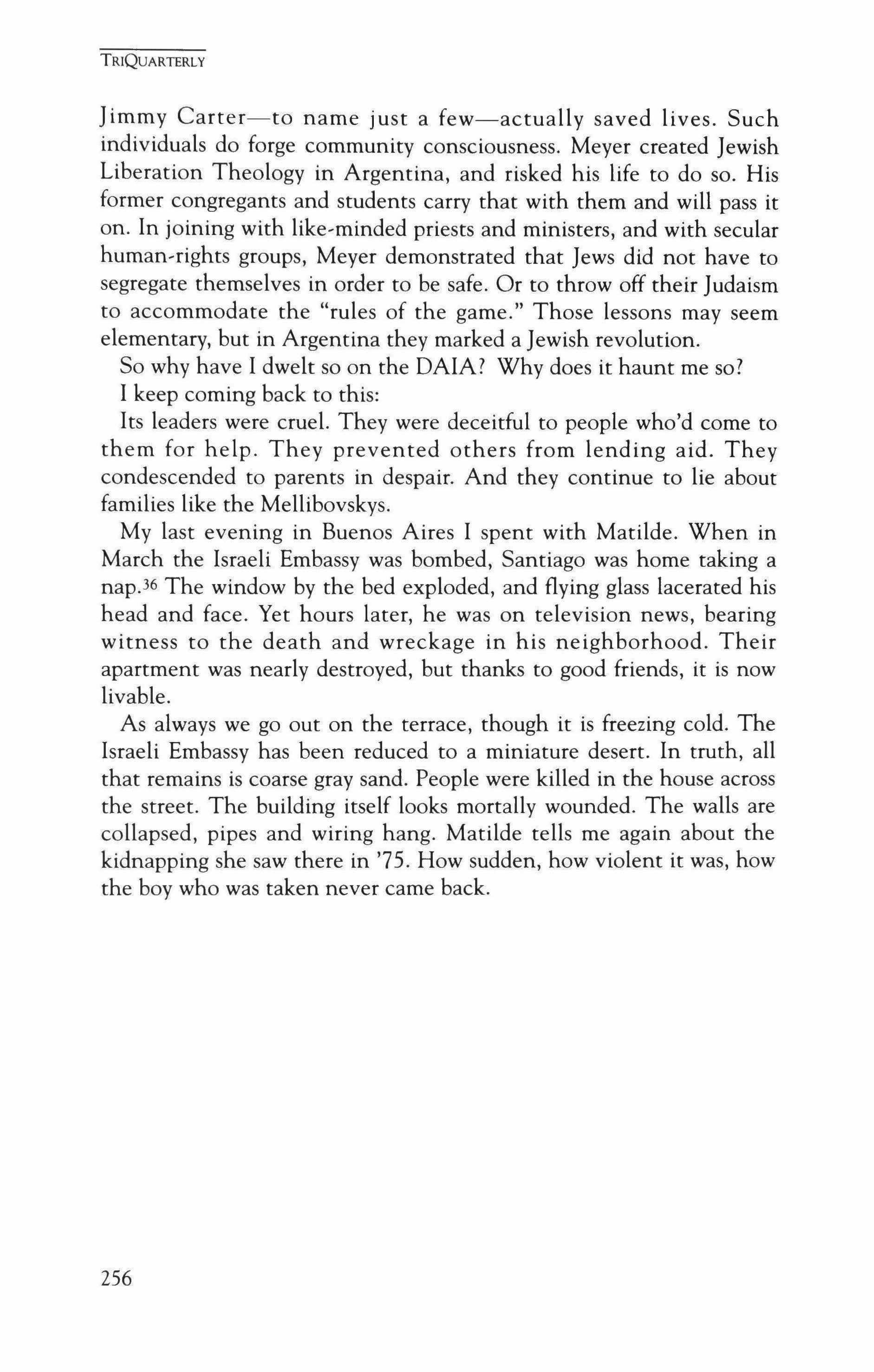
Jimmy Carter-to name just a few-actually saved lives. Such individuals do forge community consciousness. Meyer created Jewish Liberation Theology in Argentina, and risked his life to do so. His former congregants and students carry that with them and will pass it on. In joining with like-minded priests and ministers, and with secular human-rights groups, Meyer demonstrated that Jews did not have to segregate themselves in order to be safe. Or to throw off their Judaism to accommodate the "rules of the game." Those lessons may seem elementary, but in Argentina they marked a Jewish revolution.
So why have I dwelt so on the DAIA? Why does it haunt me so?
I keep coming back to this:
Its leaders were cruel. They were deceitful to people who'd come to them for help. They prevented others from lending aid. They condescended to parents in despair. And they continue to lie about families like the Mellibovskys.
My last evening in Buenos Aires I spent with Matilde. When in March the Israeli Embassy was bombed, Santiago was home taking a nap.36 The window by the bed exploded, and flying glass lacerated his head and face. Yet hours later, he was on television news, bearing witness to the death and wreckage in his neighborhood. Their apartment was nearly destroyed, but thanks to good friends, it is now livable.
As always we go out on the terrace, though it is freezing cold. The Israeli Embassy has been reduced to a miniature desert. In truth, all that remains is coarse gray sand. People were killed in the house across the street. The building itself looks mortally wounded. The walls are collapsed, pipes and wiring hang. Matilde tells me again about the kidnapping she saw there in '75. How sudden, how violent it was, how the boy who was taken never came back.
TRIQUARTERLY
256

Buenos Aires, 1989: Matilde Mellibovsky holds a photo of her daughter Graciela during a march protesting President Menem's Executive Pardon of military officers awaiting trial for crimes committed during the "Dirty War." In 1990 Menem also pardoned ex-commanders who had been convicted in 1985 of crimes against humanity.
Notes
1. Thirty thousand disappeared, the figure given by the Mothers of the Plaza de Mayo, has the greatest currency in Argentine human-rights circles.
2. General Jorge Rafael Videla, ex-commander of the army and the first president of the junta, and Admiral E. Eduardo Massera, ex-commander of the navy, got life sentences. The other commanders got sentences ranging from four-and-a-half to seventeen years.
3. In an extremely controversial gesture, Dr. Raul Alfonsfn (the first democratically elected president since the 1976 coup, taking office on December 10, 1983) invoked La Ley de la Obediencia Debida (the due-obedience law), according to which lower-ranking personnel who tortured were merely "following orders." Alfonsfn's rationale was to establish "degrees of responsibility," and prosecute only those "most responsible." Alfonsfn did not 257
TRIQL1i\RTERL)
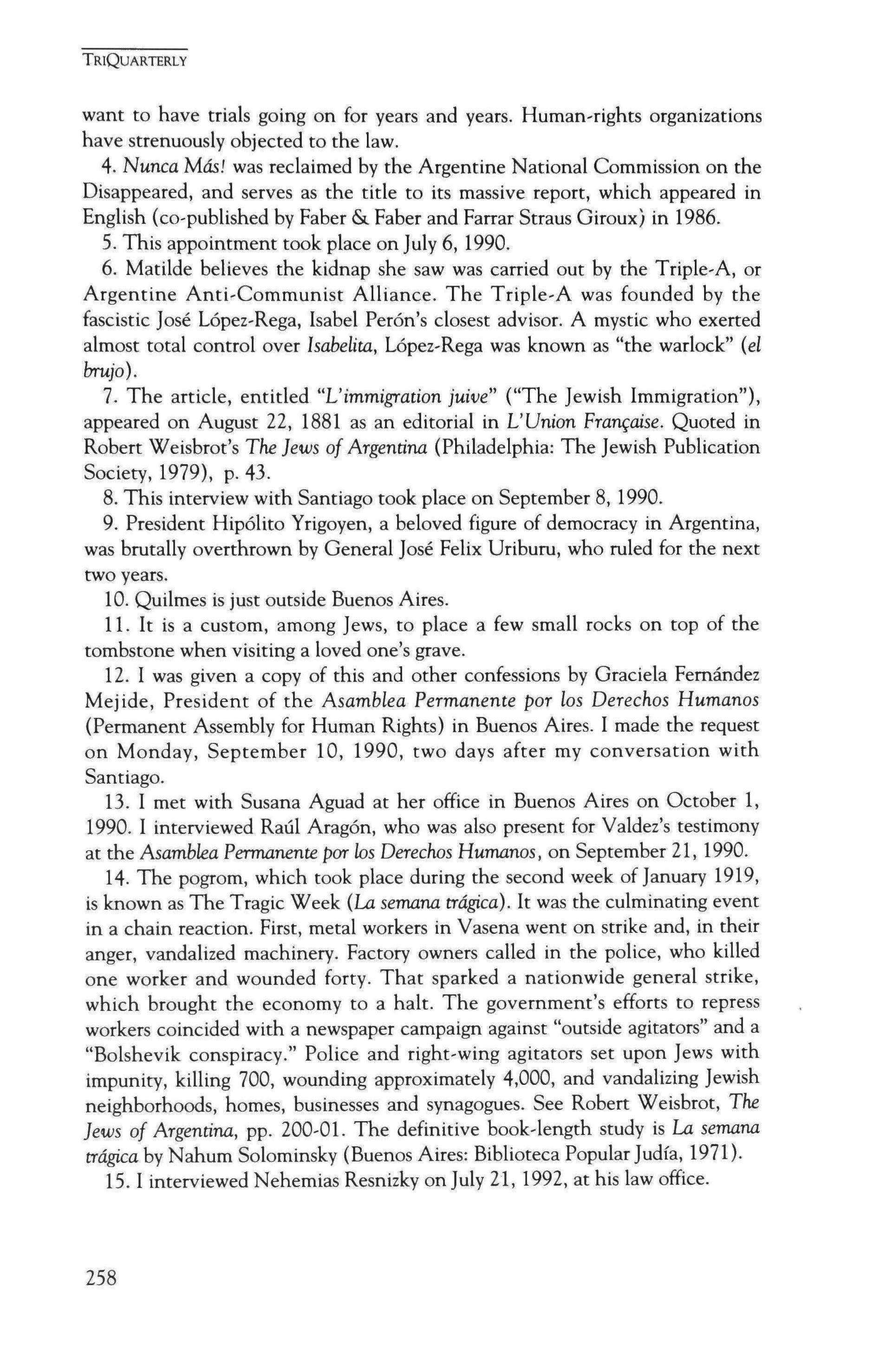
want to have trials going on for years and years. Human-rights organizations have strenuously objected to the law.
4. Nunca Mas! was reclaimed by the Argentine National Commission on the Disappeared, and serves as the title to its massive report, which appeared in English (co-published by Faber & Faber and Farrar Straus Giroux) in 1986.
5. This appointment took place on July 6, 1990.
6. Matilde believes the kidnap she saw was carried out by the Triple-A, or Argentine Anti-Communist Alliance. The Triple-A was founded by the fascistic Jose Lopez-Rega, Isabel Peron's closest advisor. A mystic who exerted almost total control over Isabelita, Lopez-Rega was known as "the warlock" (el brujo).
7. The article, entitled "L'immigration juive" ("The Jewish Immigration"), appeared on August 22, 1881 as an editorial in L'Union FraTlfaise. Quoted in Robert Weisbrot's The Jews ofArgentina (Philadelphia: The Jewish Publication Society, 1979), p.43.
8. This interview with Santiago took place on September 8, 1990.
9. President Hipolito Yrigoyen, a beloved figure of democracy in Argentina, was brutally overthrown by General Jose Felix Uriburu, who ruled for the next two years.
10. Quilrnes is just outside Buenos Aires.
11. It is a custom, among Jews, to place a few small rocks on top of the tombstone when visiting a loved one's grave.
12. I was given a copy of this and other confessions by Graciela Fernandez Mejide, President of the Asamblea Permanente por los Derechos Humanos (Permanent Assembly for Human Rights) in Buenos Aires. I made the request on Monday, September 10, 1990, two days after my conversation with Santiago.
13. I met with Susana Aguad at her office in Buenos Aires on October 1, 1990. I interviewed Raul Aragon, who was also present for Valdez's testimony at the Asamblea Permanente POT los Derechos Humanos, on September 21,1990.
14. The pogrom, which took place during the second week of January 1919, is known as The Tragic Week (La semana tragica). It was the culminating event in a chain reaction. First, metal workers in Vasena went on strike and, in their anger, vandalized machinery. Factory owners called in the police, who killed one worker and wounded forty. That sparked a nationwide general strike, which brought the economy to a halt. The government's efforts to repress workers coincided with a newspaper campaign against "outside agitators" and a "Bolshevik conspiracy." Police and right-wing agitators set upon Jews with impunity, killing 700, wounding approximately 4,000, and vandalizing Jewish neighborhoods, homes, businesses and synagogues. See Robert Weisbrot, The Jews of Argentina, pp. 200-01. The definitive book-length study is La semana tragica by Nahum Solominsky (Buenos Aires: Biblioteca Popularjudfa, 1971).
15. I interviewed Nehemias Resnizky on July 21, 1992, at his law office.
TRIQUARTERLY
258
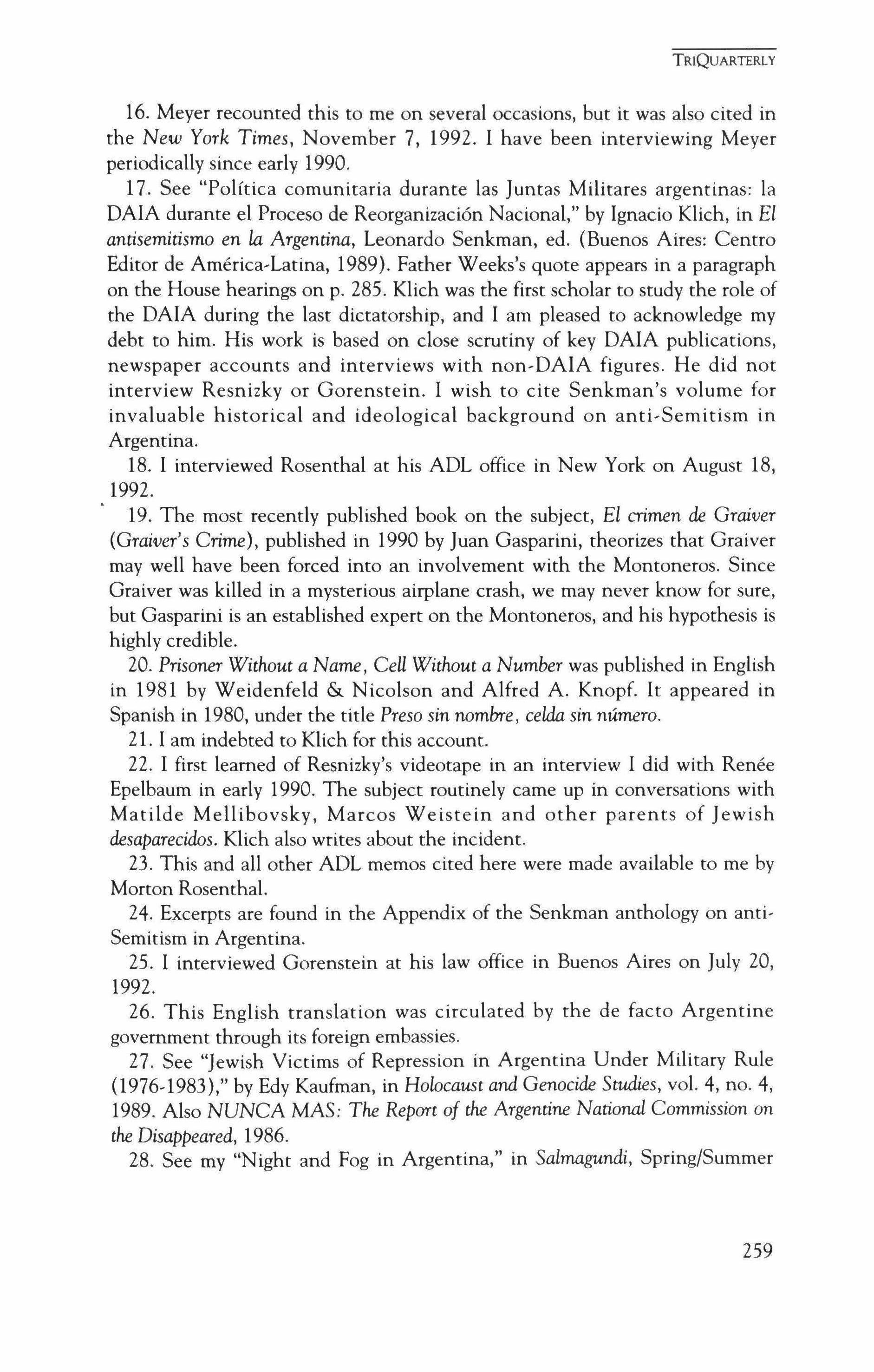
16. Meyer recounted this to me on several occasions, but it was also cited in the New York Times, November 7, 1992. I have been interviewing Meyer periodically since early 1990.
17. See "Polftica comunitaria durante las Juntas Militares argentinas: la DAIA durante el Proceso de Reorganizaclon Nacional," by Ignacio Klich, in EI antisemitismo en fa Argentina, Leonardo Senkman, ed. (Buenos Aires: Centro Editor de America-Latina, 1989). Father Weeks's quote appears in a paragraph on the House hearings on p. 285. Klich was the first scholar to study the role of the DAIA during the last dictatorship, and I am pleased to acknowledge my debt to him. His work is based on close scrutiny of key DAIA publications, newspaper accounts and interviews with non-DAIA figures. He did not interview Resnizky or Gorenstein. I wish to cite Senkman's volume for invaluable historical and ideological background on anti-Semitism in Argentina.
18. I interviewed Rosenthal at his ADL office in New York on August 18, 1992.
19. The most recently published book on the subject, El crimen de Graiver (Graiver's Crime), published in 1990 by Juan Gasparini, theorizes that Graiver may well have been forced into an involvement with the Montoneros. Since Graiver was killed in a mysterious airplane crash, we may never know for sure, but Gasparini is an established expert on the Montoneros, and his hypothesis is highly credible.
20. Prisoner Without a Name, Cell Without a Number was published in English in 1981 by Weidenfeld & Nicolson and Alfred A. Knopf. It appeared in Spanish in 1980, under the title Preso sin nombre, celda sin numero.
21. I am indebted to Klich for this account.
22. I first learned of Resnizky's videotape in an interview I did with Renee Epelbaum in early 1990. The subject routinely came up in conversations with Matilde Mellibovskv, Marcos Weistein and other parents of Jewish desaparecidos. Klich also writes about the incident.
23. This and all other ADL memos cited here were made available to me by Morton Rosenthal.
24. Excerpts are found in the Appendix of the Senkman anthology on antiSemitism in Argentina.
25. I interviewed Gorenstein at his law office in Buenos Aires on July 20, 1992.
26. This English translation was circulated by the de facto Argentine government through its foreign embassies.
27. See "Jewish Victims of Repression in Argentina Under Military Rule (1976-1983)," by Edy Kaufman, in Holocaust and Genocide Studies, vol. 4, no. 4, 1989. Also NUNCA MAS: The Report of the Argentine National Commission on the Disappeared, 1986.
28. See my "Night and Fog in Argentina," in Salmagundi, Spring/Summer
TRIQUARTERLY
259
1992.
29. The Mishnah, tractate Sanhedrin, chapter 4.
30. I interviewed Klimovsky on July 23, 1992 at his home in the Belgrano district of Buenos Aires.
31. Falcoffs review appeared in the July 1981 issue ofCommenwry.
32. Shortly before the "Sirota Affair," the democratically elected Argentine president Arturo Frondizi was overthrown by the military. Frondizi's appointed replacement, Jose Maria Guido, gave free rein to fascist anti-Jewish groups like the notorious Tacuara. Guido horrified the more moderate elements in the military, which is why some popular reaction called for a military crackdown.
33. I met with Timerman at his home in Bueno Aires on July 29, 1992.
34. Timerman's use of the word ludenrat is highly provocative and controversial. Strictly speaking, the ludenrat were Jewish administrative bodies appointed by, and responsible to, the Germans in Nazi-occupied territory during World War II. The ludenrat's assignments included taking censuses of Jews within their jurisdiction, arranging for the evacuation ofJews from ghettos to concentration camps, and making sure that German rules and regulations were obeyed. For an excellent discussion of the ludenrat, see Helen Fein's Accountingfor Genocide (Chicago: University of Chicago Press, 1979), pp. 12142.
35. Of all the people with whom I spoke (and my sources go beyond those quoted), only Timerman said the DAIA "gave names to the generals." I see no reason to censure Timerman's statement, but do emphasize that I have no hard evidence that would prove his declaration. Among my sources, the consensus is that the DAIA stopped short of "marking" (or suggesting) individuals for kidnap.
36. No group has come forward to claim responsibility for the March 17 bombing, which is highly unusual. Because two policemen walked off their beat exactly five minutes before the explosion, it is thought that the bombing was realized with Argentine help. But formal investigations have yielded no conclusive answers.
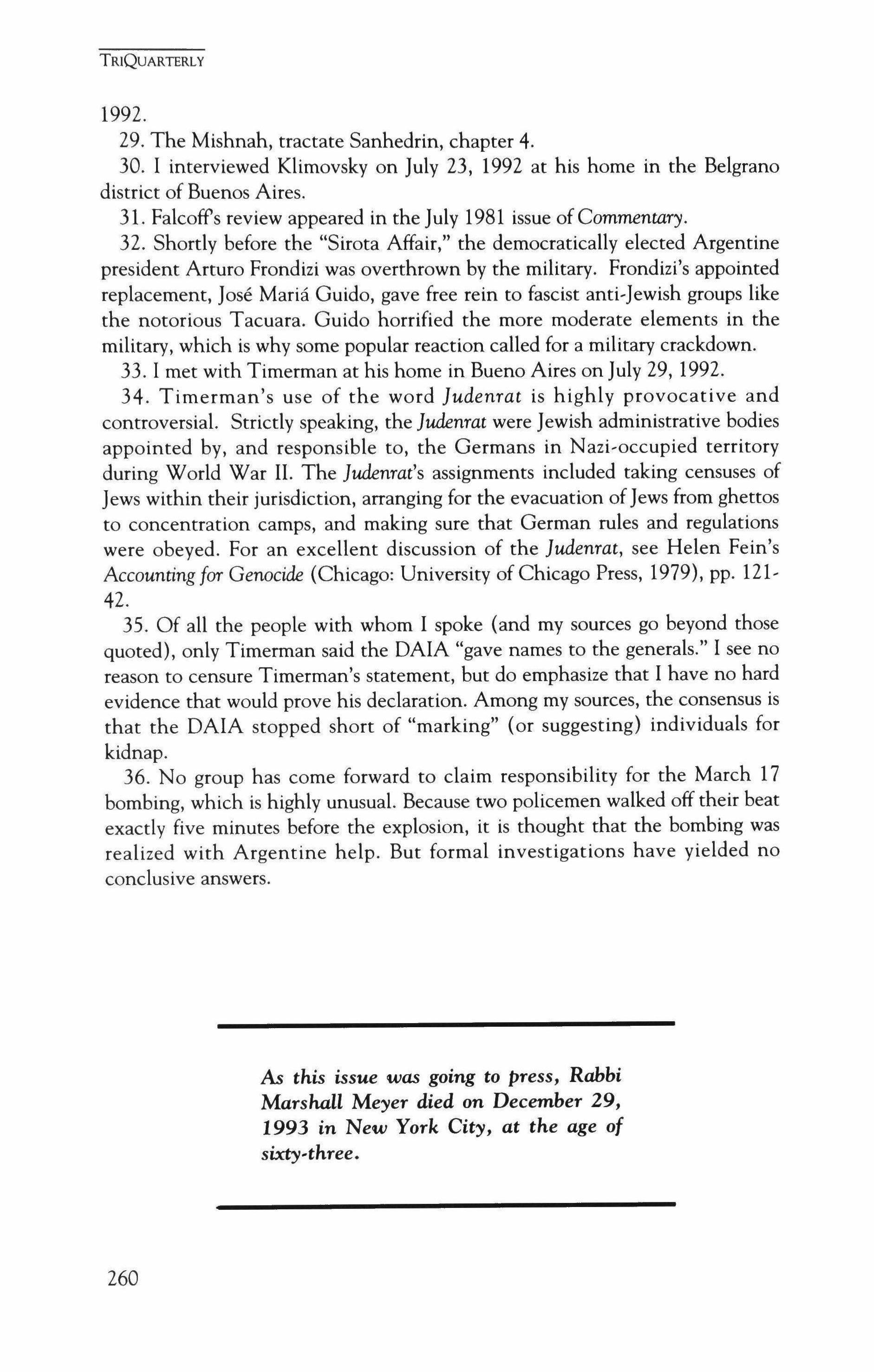
As this issue was going to press, Rabbi Marshall Meyer died on December 29, 1993 in New York City, at the age of sixty-three.
TRIQUARTERLY
260
Contributors
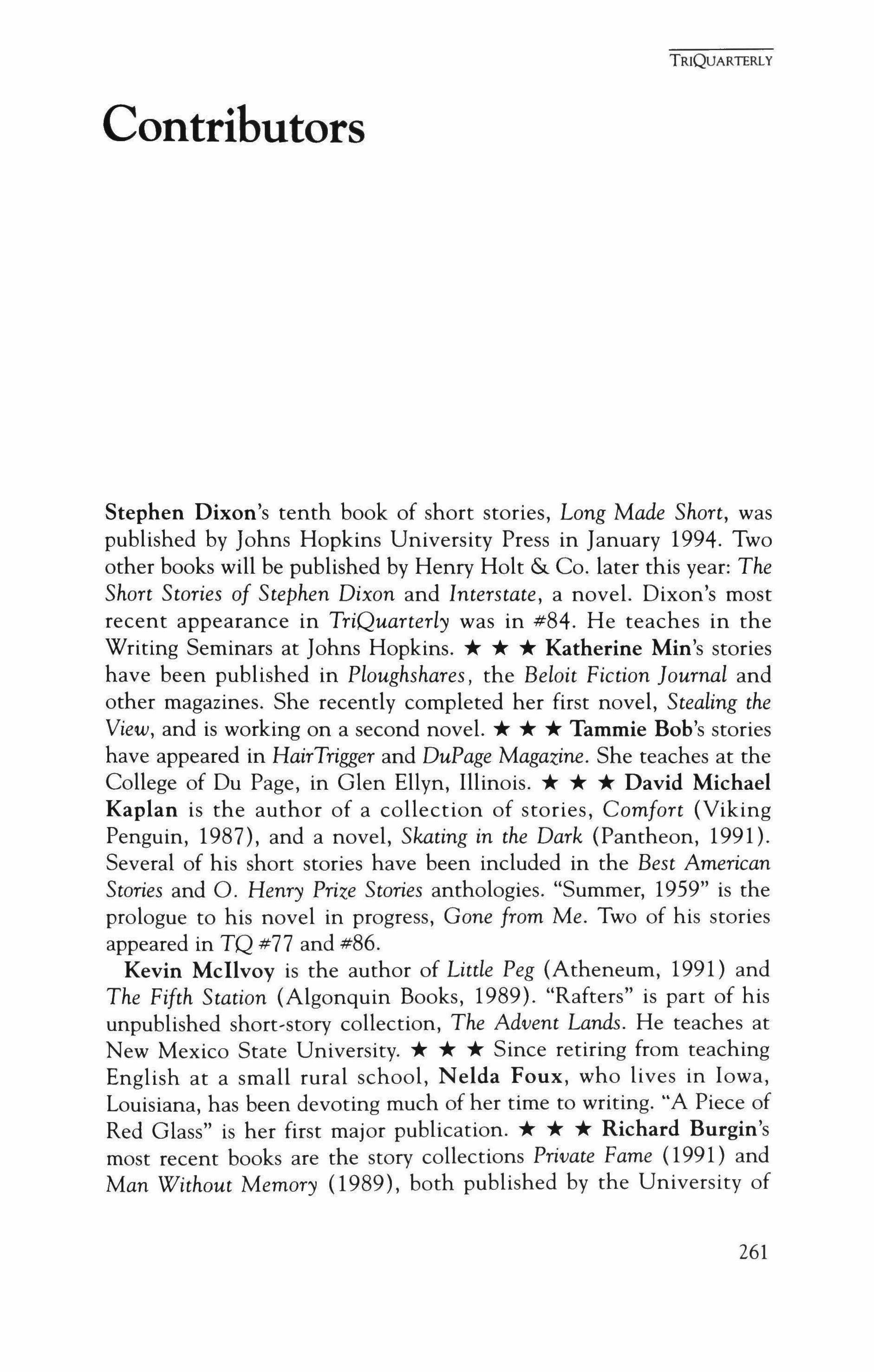
Stephen Dixon's tenth book of short stories, Long Made Short, was published by Johns Hopkins University Press in January 1994. Two other books will be published by Henry Holt & Co. later this year: The Short Stories of Stephen Dixon and Interstate, a novel. Dixon's most recent appearance in TriQuarterly was in #84. He teaches in the Writing Seminars at Johns Hopkins. * * * Katherine Min's stories have been published in Ploughshares, the Beloit Fiction]ournal and other magazines. She recently completed her first novel, Stealing the View, and is working on a second novel. * * * Tammie Bob's stories have appeared in HairTrigger and DuPage Magazine. She teaches at the College of Du Page, in Glen Ellyn, Illinois. * * * David Michael Kaplan is the author of a collection of stories, Comfort (Viking Penguin, 1987), and a novel, Skating in the Dark (Pantheon, 1991). Several of his short stories have been included in the Best American Stories and O. Henry Prize Stories anthologies. "Summer, 1959" is the prologue to his novel in progress, Gone from Me. Two of his stories appeared in TQ #77 and #86.
Kevin McIlvoy is the author of Little Peg (Atheneum, 1991) and The Fifth Station (Algonquin Books, 1989). "Rafters" is part of his unpublished short-story collection, The Advent Lands. He teaches at New Mexico State University. * * * Since retiring from teaching English at a small rural school, Nelda Foux, who lives in Iowa, Louisiana, has been devoting much of her time to writing. "A Piece of Red Glass" is her first major publication. * * * Richard Burgin's most recent books are the story collections Private Fame (1991) and Man Without Memory (1989), both published by the University of 261
TRIQUARTERLY

Illinois Press. His other books include Conversations with Jorge Luis Borges (Holt Rinehart & Winston, 1968; Avon, 1970) and Conversations with Isaac Bashevis Singer (Doubleday, 1985; Farrar, Straus & Giroux, paperback, 1986). A story of his appeared in TQ #81. He is the editor of Boulevard. * * * Paul Brownfield lives in Cambridge, Massachusetts. His stories have appeared in the Missouri Review and California Quarterly. * * * William Loizeaux's nonfiction book, Anna: A Daughter's Life was published by Arcade/Little Brown in 1993. His stories have appeared in Carolina Quarterly and the Massachusetts Review.
Formerly a management consultant, Arthur H. Kuriloff is the author of several nonfiction books, including Reality in Management (McGraw,Hill, 1966) and, with co-author John M. Hemphill, Starting and Managing the Small Business (McGraw-Hill, third edition, 1992). He has taught at Yale and the University of California, Los Angeles. His avocation is violins and violin making. * * * Edward Hirsch's fourth book of poems, Earthly Measures, will be published by Knopf early in 1994. He teaches at the University of Houston. * * * Wisl'awa Szymborska is the most popular woman poet now living in Poland. "Parking with a View" was part of her most recent volume of poems, The End and the Beginning, which was published in Poland in spring 1993. It will also be included in View with a Grain of Sand, a selection of her poems in English translation, now being completed by Stanislaw Baranczak and Clare Cavanagh. * * * Stanislaw Baranczak is the Alfred [urzykowski Professor of Polish Language and Literature at Harvard University. His most recent books include Breathing Under Water and Other East European Essays (Harvard University Press, 1991) and Selected Poems: The Weight of the Body (TriQuarterly/Another Chicago Press, 1989), which received the Terrence Des Pres Prize. His poems, translations and essays have appeared in several issues of TriQuarterly, including #57, vol. 1 (A Window on Poland) and #65 (The Writer in Our World). * * * Clare Cavanagh is an assistant professor of Slavic literature at the University of Wisconsin, Madison. Her most recent works include Polish Poetry of the Last Two Decades of Communist Rule: Spoiling Cannibals' Fun, which she co'authored with Stanislaw Baranczak (Northwestern University Press, 1992) and a forthcoming book on the poetry of Osip Mandelstam.
Alan Michael Parker's poems have appeared in Antaeus, the New Republic, the New Yorker and the Paris Review. He teaches at Rutgers
TRIQUARTERLY
262
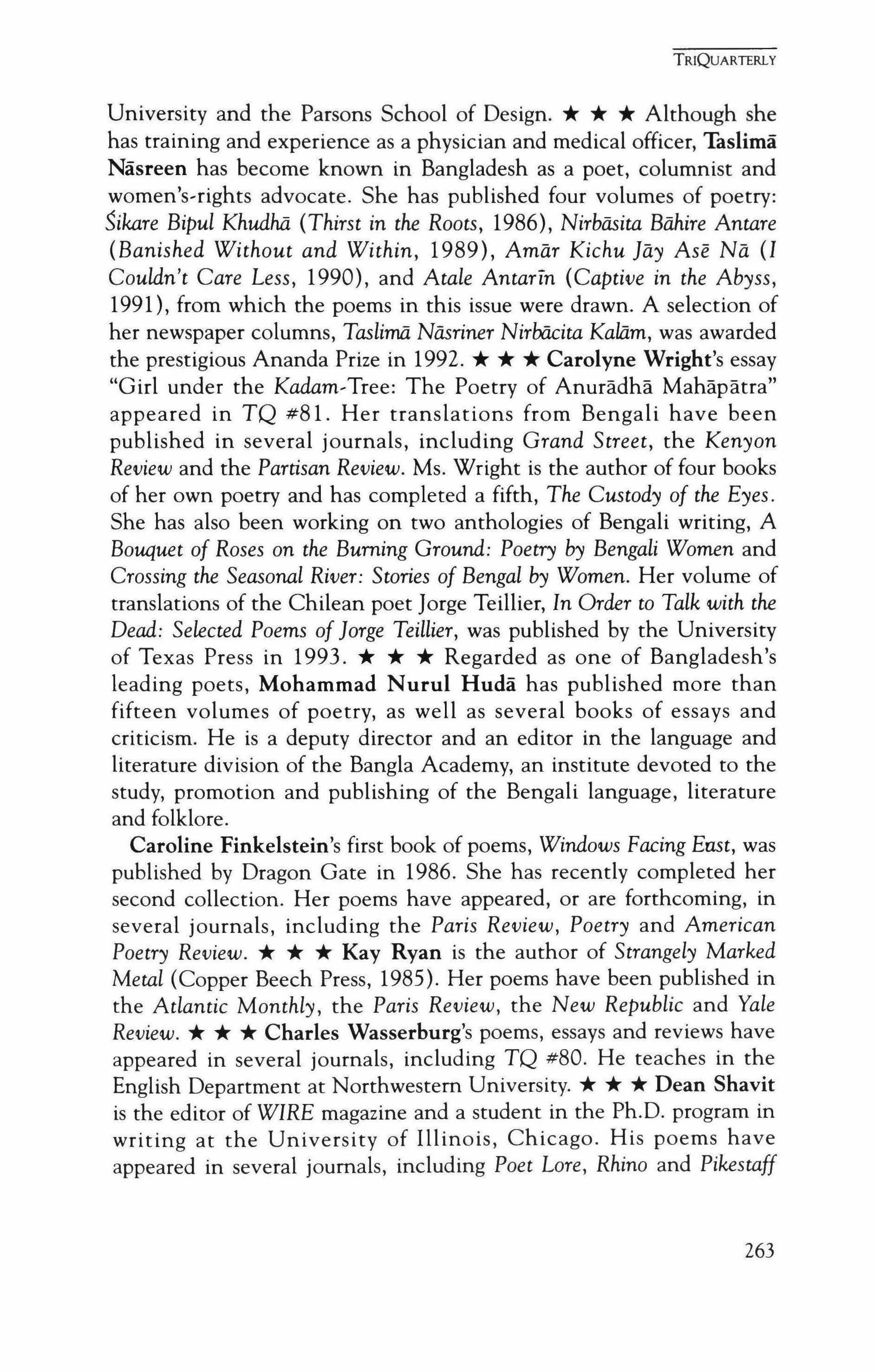
University and the Parsons School of Design. * * * Although she has training and experience as a physician and medical officer, Taslima Nasreen has become known in Bangladesh as a poet, columnist and women's-rights advocate. She has published four volumes of poetry: Sikare Bipul Khudhii (Thirst in the Roots, 1986), Nirbasita Bahire Antare (Banished Without and Within, 1989), Arnar Kichu Jay Ase Na (I Couldn't Care Less, 1990), and Atale Antarin (Captive in the Abyss, 1991), from which the poems in this issue were drawn. A selection of her newspaper columns, Taslima Nasrine: Nirbiicita Kaliim, was awarded the prestigious Ananda Prize in 1992. * * * Carolyne Wright's essay "Girl under the Kadam�Tree: The Poetry of Anuradha Mahapatra" appeared in TQ #81. Her translations from Bengali have been published in several journals, including Grand Street, the Kenyon Review and the Partisan Review. Ms. Wright is the author of four books of her own poetry and has completed a fifth, The Custody of the Eyes. She has also been working on two anthologies of Bengali writing, A Bouquet of Roses on the Burning Ground: Poetry by Bengali Women and Crossing the Seasonal River: Stories of Bengal by Women. Her volume of translations of the Chilean poet Jorge Teillier, In Order to Talk with the Dead: Selected Poems ofJorge Teillier, was published by the University of Texas Press in 1993. * * * Regarded as one of Bangladesh's leading poets, Mohammad Nurul Huda has published more than fifteen volumes of poetry, as well as several books of essays and criticism. He is a deputy director and an editor in the language and literature division of the Bangla Academy, an institute devoted to the study, promotion and publishing of the Bengali language, literature and folklore.
Caroline Finkelstein's first book of poems, Windows Facing Erut, was published by Dragon Gate in 1986. She has recently completed her second collection. Her poems have appeared, or are forthcoming, in several journals, including the Paris Review, Poetry and American Poetry Review. * * * Kay Ryan is the author of Strangely Marked Metal (Copper Beech Press, 1985). Her poems have been published in the Atlantic Monthly, the Paris Review, the New Republic and Yale Review. * * * Charles Wasserburg's poems, essays and reviews have appeared in several journals, including TQ #80. He teaches in the English Department at Northwestern University. * * * Dean Shavit is the editor of WIRE magazine and a student in the Ph.D. program in writing at the University of Illinois, Chicago. His poems have appeared in several journals, including Poet Lore, Rhino and Pikestaff
TRIQUARTERLY
263

Forum. He was the poetry winner of the Poets and Writers writers exchange contest for Illinois in 1991. * * * Alicia Ostriker's most recent volume of poems is Green Age (University of Pittsburgh Press, 1989). Her most recent book of criticism is Feminist Revision and the Bible (Blackwell, 1992). She teaches English and creative writing at Rutgers University. * * * Kevin Bowen is the co-director of the William Joiner Center for the Study of War and Social Consequences at the University of Massachusetts at Boston, where he also teaches. His poems have appeared in Agni, Prairie Schooner, American Poetry Review, Ohio Review and other journals. His volume of poems, Playing Basketball with the Viet Cong, will be published by Curbstone Press in 1994.
Marilyn Hacker is the author of seven books of poems, including most recently Going Back to the River (Random House, 1990), a Lambda Literary Award winner in 1991; and the verse novel Love, Death and the Changing of the Seasons (Arbor House/William Morrow, 1986; Onlywomen Press, British edition, 1987). W. W. Norton will publish two books in fall 1994: her selected poems and a new collection, entitled Winter Numbers. She is the editor of the Kenyon Review. * * * Steven Cramer has published two collections of poems, The Eye That Desires To Look Upward (Galileo Press, 1987) and The World Book (Copper Beech Press, 1991). He teaches at Tufts Uni� versityand is the staff editor for poetry at the Atlantic Monthly. * * * Linda Gregerson teaches Renaissance literature at the University of Michigan. Her poems have appeared in several journals, including Poetry, the Atlantic Monthly and the Colorado Review. The poem in this issue is part of a book in progress, entitled Alibi. * * * David Wojahn is the author of Icehouse Lights (Yale University Press, 1982), Glassworks (University of Pittsburgh Press, 1987) and Mystery Train (University of Pittsburgh Press, 1990). He teaches at Indiana University and in the MFA in Writing Program of Vermont College.
Robert Pinsky's translation of the Inferno is forthcoming from Farrar, Straus & Giroux in 1994. His most recent book of poems is The Want Bone (Ecco Press, 1990). Two of his essays have appeared in TQ #52 and #76. * * * Marguerite Feitlowitz received a Mary Ingraham Bunting Fellowship in 1992�93 in support of her book in progress, A Lexicon of Terror: Argentina and the Legacies of Torture, from which "Life Here Is Normal" is excerpted. She was a Fulbright Research Scholar in Argentina in 1990, when she conducted extensive interviews with survivors of the "Dirty War" torture centers. Her
TRIQUARTERLY
264
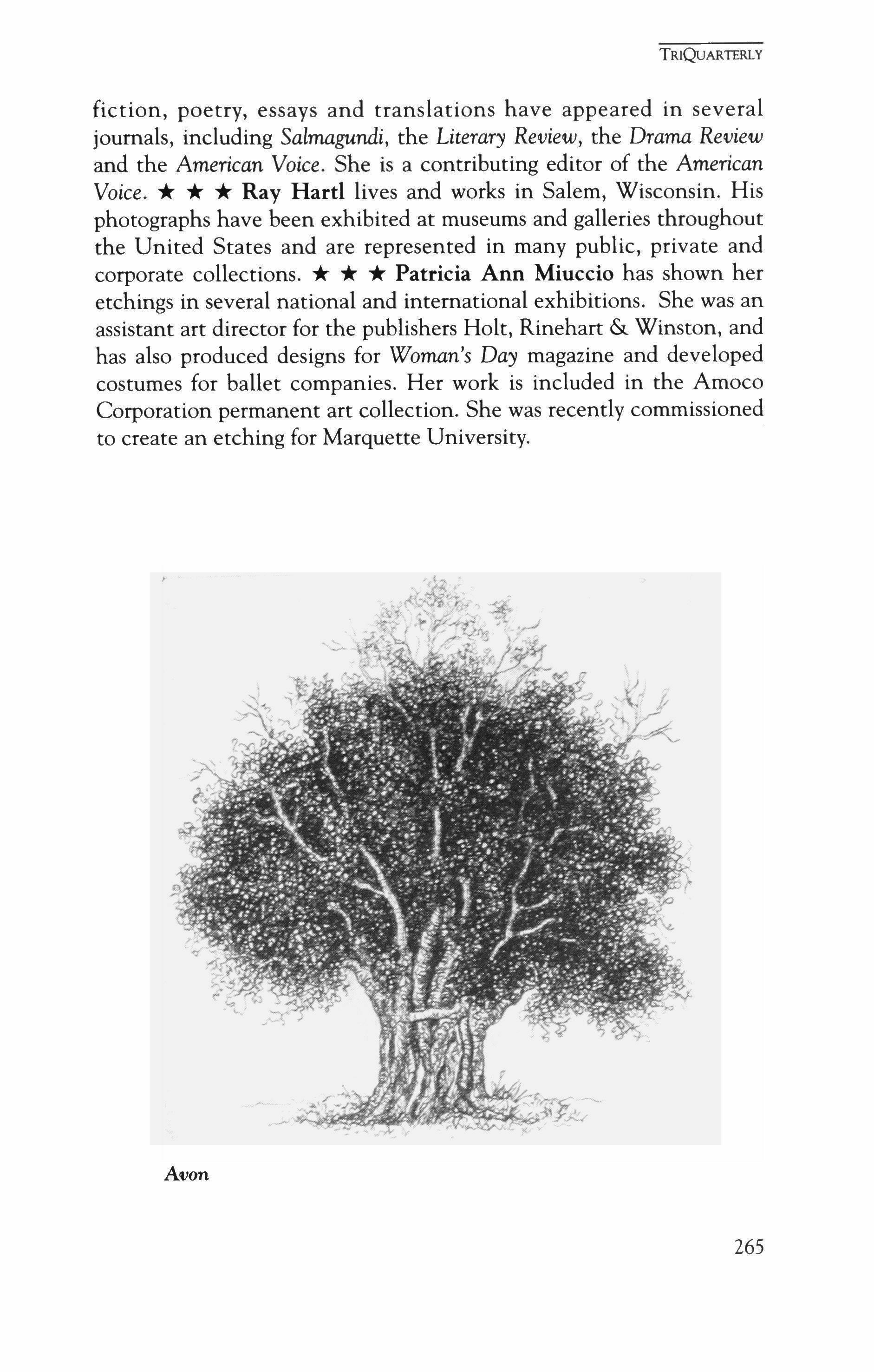
fiction, poetry, essays and translations have appeared in several journals, including Salmagundi, the Literary Review, the Drama Review and the American Voice. She is a contributing editor of the American Voice. * * * Ray Hartl lives and works in Salem, Wisconsin. His photographs have been exhibited at museums and galleries throughout the United States and are represented in many public, private and corporate collections. * * * Patricia Ann Miuccio has shown her etchings in several national and international exhibitions. She was an assistant art director for the publishers Holt, Rinehart & Winston, and has also produced designs for Woman's Day magazine and developed costumes for ballet companies. Her work is included in the Amoco Corporation permanent art collection. She was recently commissioned to create an etching for Marquette University.
TRIQUARTERLY
265
Avon
LONG
STORIES BY STEPHEN DIXON
This collection ls 0 nonboket's dozen ofwhat the author (0115 poSt-Frogfiitions, work wriHen sin(e his novel FrOfril finalist for the Notionol Book Award ond the PEN/Faulkner Prize.
MADE
"Dixon loves all sorts of tridcynlclrraliv�effe�. And "His grasp"ofthe ordinary Ameri(on (ity dwellers is he loves even more the tribulations ofthe f(Jntasizing suth thot he (00 shape it dromati(ally ta meet the mind, ti(klish in their (amedy, alarmingin.1heit deJ1lClndsofhis for from ordinary imagination.n imnfediaty.n-New York Times Book Re_ -r""es UterarySupplement
SHORT
S12.95 poperba(k. Available at your bookstore ortalll-800-537-5487. THE JOHNS HOPKINS UNIVERSITY PRESS Hampden Station, Bahimore, Maryland 21211
GUY
DAVENPORT
"Davenport's conception of the short-story form is remarkable. He has given it some of the intellectual density of the learned essay, some of the lyric concision of the modem poem�O(11e of its difficulty too-and a structure that often resembles a film documentary. The result is a tour deforce that adds something new to the art of fiction."
-Hilton Kramer, New York Times

Now in paperback. $12.95 each. Available at your bookstore or from THE JOHNS HOPKINS UNIVERSITY PRESS Hampden Station, Baltimore, MD 21211 To order, call 1-800-537-5487.
THE JULES VERNE STEAM BALLOON ECLOGUES
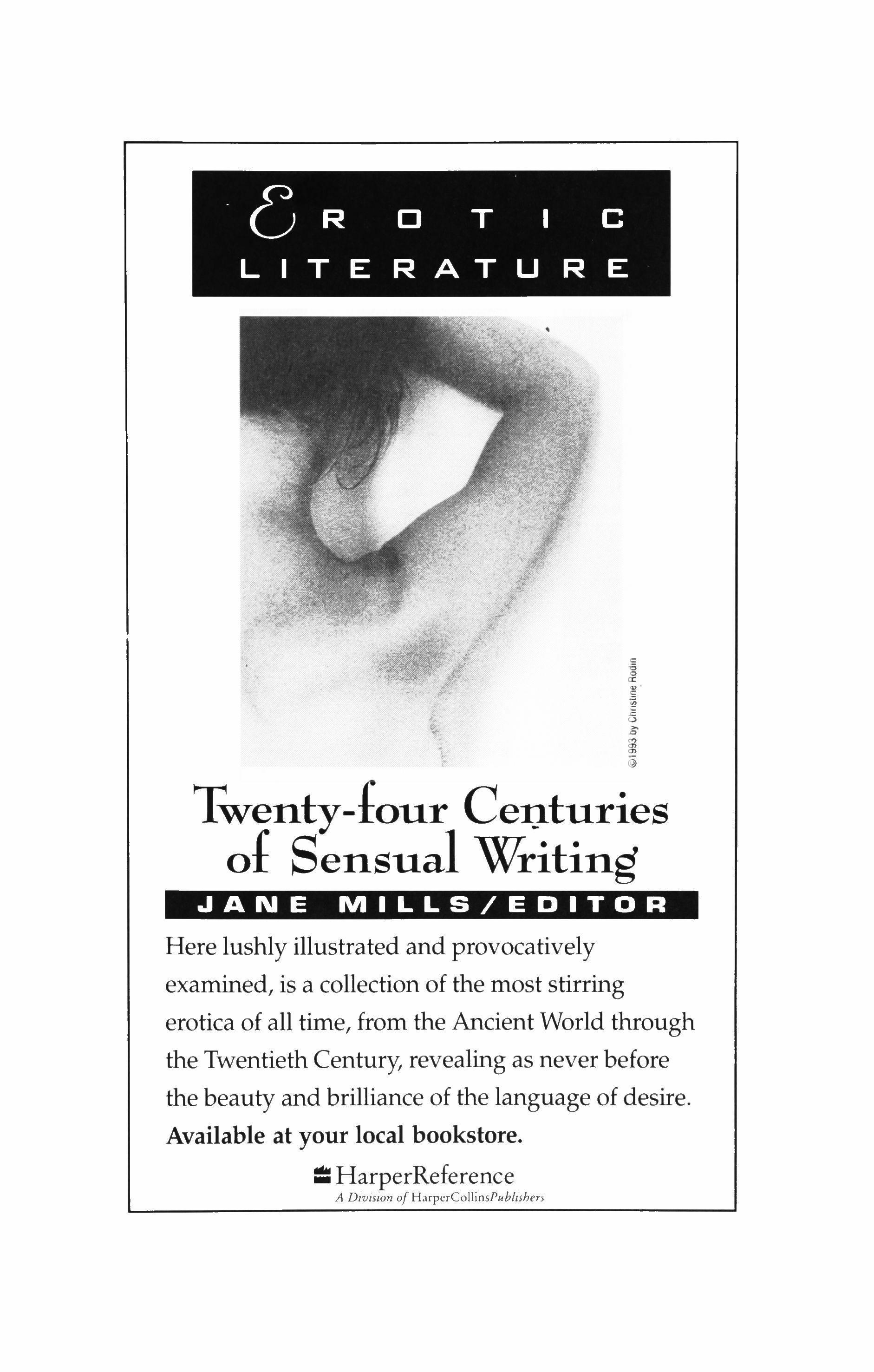
Here lushly illustrated and provocatively examined, is a collection of the most stirring erotica of all time, from the Ancient World through the Twentieth Century, revealing as never before the beauty and brilliance of the language of desire. Available at your local bookstore. =: HarperReference A D,vISIOn of
e
c LITERATURE Twenty-four Ce1).turies of Sensual Writing .JANE MILLS/EDITOR
ROT
HarpcrCollinsPubl.shers
® PLUME FICTION
Featuring such outstanding authors as Toni Morrison, Joyce Carol Oates, Isaac Bashevis Singer, and John Fowles, Plume Fiction remains one of the most distinguished imprints in publishing today.
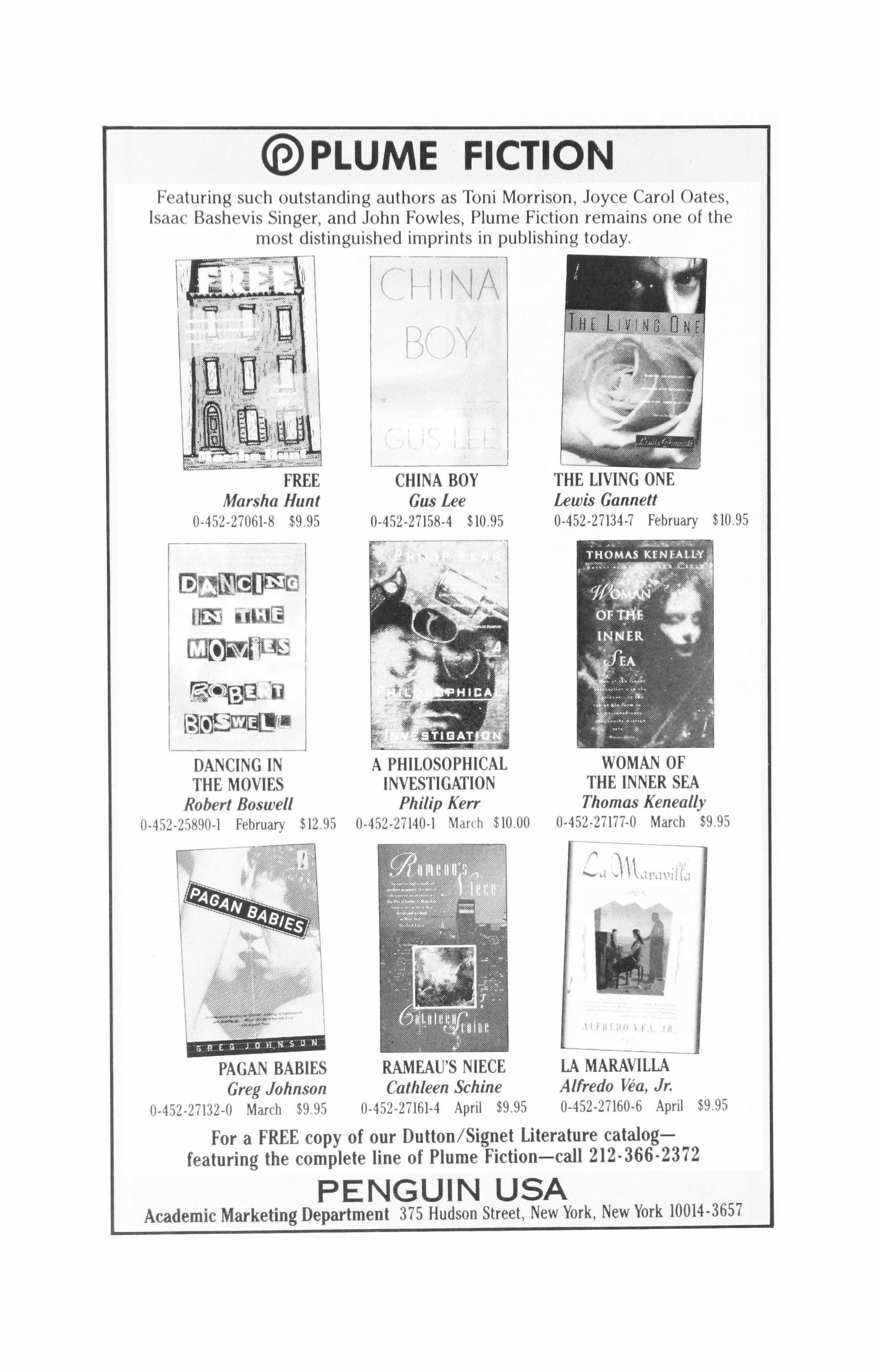
Robert
Gus
Lewis
FREE
0·452·27061·8 $9.95 I]� lmuc:J[3 �� ��IJ �-( � i I NA [3( )Y .1 CHINA BOY
Marsha Hunt
0·452·27158·4 $10.95 THE LIVING ONE
Lee
Gannett 0·452·27134·7 February $10.95 DANCING IN A PHILOSOPHICAL WOMAN OF THE MOVIES INVESTIGATION THE INNER SEA
Kerr
Keneally 0·452·25890·1 February $12.95 0·452·27140·1 March $10.00 0·452·27177·0 March $9.95 !:_.J J\�'11"1\',r'1� PAGAN BABIES RAMEAU'S NIECE LA MARAVILLA
Johnson Cathleen Schine Alfredo Vea, Jr. 0·452·27132·0 March $9.95 0·452·27161·4 April $9.95 0·452·27160·6 April $9.95
our
the complete line of Plume Fiction-call 212·366·2372 PENGUIN USA Academic Marketing Department 375 Hudson Street, New York, New York 10014·3657
Boswell Philip
Thomas
Greg
For a FREE copy of
Dutton/Signet Literature cataJogfeaturing
@CONTEMPORARY AMERICAN FICTION
 Don DeLillo
Don DeLillo
GREAT JONES STREET
Don DeLillo
0-14-017917-8 $10.95 AT THE SIGN OF THE NAKED WAITER
Amy Herrick
0-14-023189-7 $9.95
Charles Baxter
0-14-023510-8 February $10.95
Rebecca
Jameson Currier 0-14-017272-6 March $9.95
Beverly Coyle 0-14-023301-6 April $9.95
John l·Heureux
FAMILY AFFAIRS
John L'Herreux
0-14-015225-3 $9.95
froll GL(}Rla STRANGE ATTRACTORS WHORES FOR GLORIA
PENGUIN USA Academic Marketing Deparhnent 375 Hudson Street, New York, New York 10014-3657
Goldstein William T. Vol/mann 0-14-017246-7 February $9.95 0-14-023157-9 February $9.95 VAN GOGH'S ROOM ATARLES Stanley Elkin 0-14-023659-7 April $10.95 For a FREE copy of our Penguin Literature catalog, please call 212-366-2372
SHADOW PLAY
\"\ :" -,
DANCING ON THE MOON
IN TROUBLED WATERS
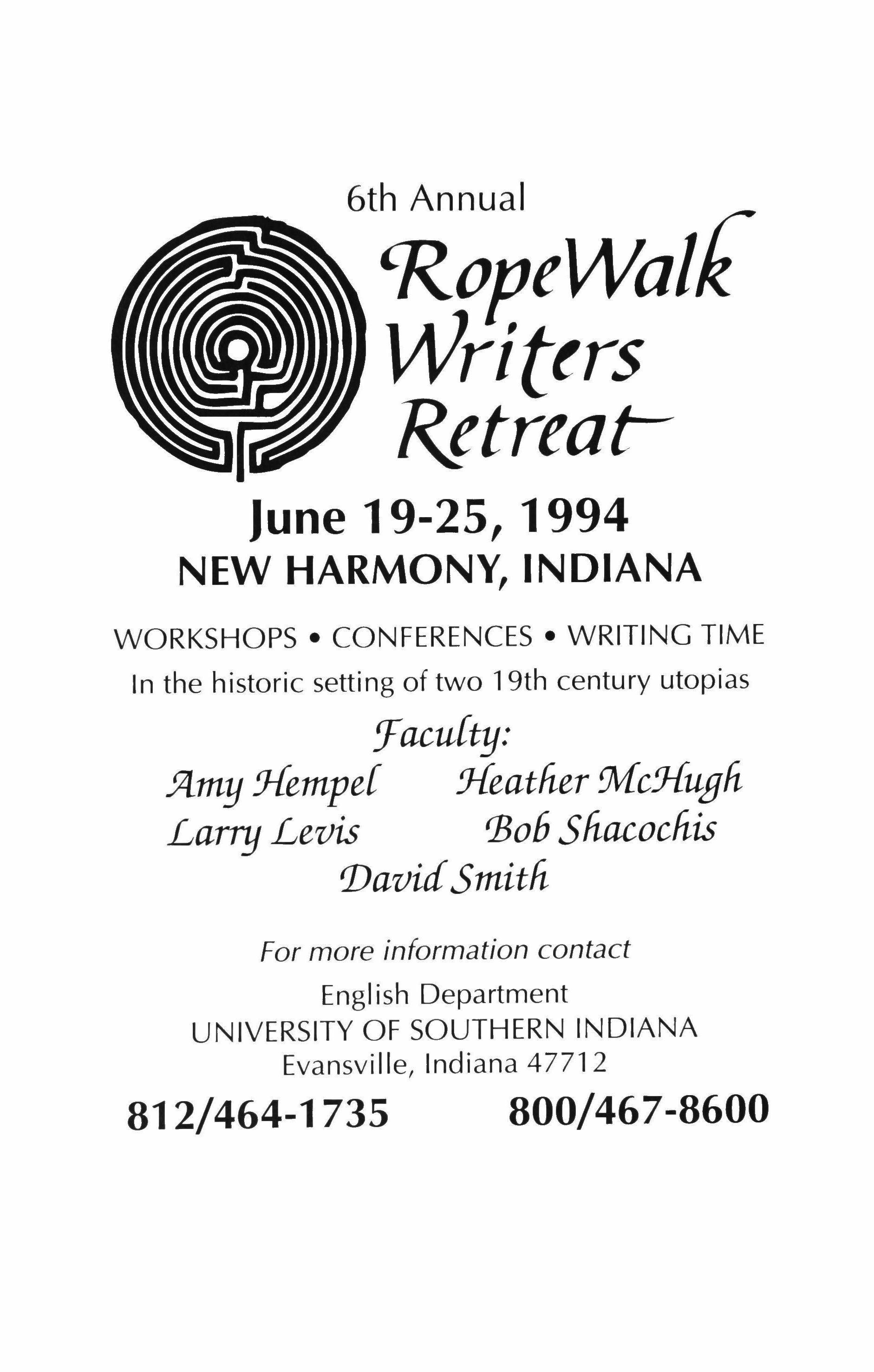
6th Annual 'RopeWalk Writlrs Ritreat: June 19-25, 1994 NEW HARMONY, INDIANA WORKSHOPS • CONFERENCES • WRITING TIME In the historic setting of two 19th century utopias �acu[ty: .9LmyHempel Heather McJ-(ugli Larry Levis 'Bob Shacochis DaoidSmith. For more information contact Engl ish Department UNIVERSITY OF SOUTHERN INDIANA Evansville, Indiana 47712 812/464-1735 800/467-8600

THE JAMES JONES
FIRST NOVEL FELLOWSIDP
The James Jones Society announces an
annual $2,000 award for a first unpub-
lished novel. Submission deadline: April 1, 1994. For eligibility and submission rules, send a SASE to:
The James Jones Society C/O Chairperson English Department Wilkes University Wilkes-Barre, PA 18766.
�
)
OUI "I..'io., �•. .,......, �Ili_ AIO c�.
1-1-
This Publication is available in Microform. University Microfilms International Please send additional information forT� Name ln-ntunoru.L. Street.Lc; Clly State Zip 300 North Zeeb Road Dept. P.R. Ann Arbor. Mi. 48106
TriQuarterly
thanks the following donors and life subscribers:
David C. Abercrombie
Mr. and Mrs. Walter L. Adams
Amin Alimard
Lois Ames
Richard H. Anderson
Roger Anderson
Sandy Anderson
I. N. C. Aniebo
Anonymous
University of Arizona Poetry Center
Gayle Arnzen
Michael Attas
Asa Baber
Hadassah Baskin
Tom G. Bell
Sandra Berris
Simon J. Blattner, Jr.
Mr. and Mrs. Andrew K. Block
Louise Blosten
Carol Bly
Susan DeWitt Bodemer
Kay Bonetti
Robert Boruch
Mr. and Mrs. Richard S. Brennan
Van K. Brock
Gwendolyn Brooks
Timothy Browne
Paul Bundy
Eric O. Cahn
David Cassak
Stephen Chapman
Anthony Chase
Michael Chwe
Willard Cook
Mr. and Mrs. William Cottle
Robert A. Creamer
Andrew Cvr
Doreen Davie
Kenneth Day
Mark W. DeBree
Elizabeth Des Pres
Alan Distler
Anstiss Drake
J. A. Dufresne
Mr. and Mrs. Donald Egan
John B. Elliott
Christopher English
Carol Erickson
Steven Finch

David R. Fine
Mr. and Mrs. H. Bernard Firestone
Melvin P. Firestone, M.D.
Mr. and Mrs. Solway Firestone
Paul Fjelstad
Torrence Fossland
Mr. and Mrs. C. Dwight Foster
Jeffrey Franklin
Martha Friedberg
Peter S. Fritz
Mrs. Angela M. Gannon
Kathy M. Garness
Robert Gislason
Mr. and Mrs. Stanford J. Goldblatt
Lawrence J. Gorman
Maxine Groffsky
Rev. Dr. Elliott Hagle
Jack Hagstrom
Mrs. Donald Haider
Mrs. Heidi Hall-jones
Mrs. James E. Hayes
Joanna Hearne
Ross B. Heath
Charles Hedde
Gene Helton
Donald Hey
Donald A. Hillel
Mr. and Mrs. David C. Hilliard
Mr. and Mrs. Thomas D. Hodgkins
Craig V. Hodson
Irwin L. Hoffman
Irwin T. Holtzman
P. Hosier
Mary Gray Hughes
Charles Huss
Curtis Imrie
Helen Jacob
Del Ivan Janik
Fran Katz
Gary Michael Katz
Dr. Alfred D. Klinger
Loy E. Knapp
Sydney Knowlton
Mr. and Mrs. Martin Koldvke
Mr. and Mrs. Carl A. Kroch
Greg Kunz
Judy Kunz
Conrad A. Langenberg
John Larroquette
Isaac Lassiter
Dorothy Latiak
Elizabeth Leibik
Patrick A. Lezark
Patricia W. Linton
Philip Lister
Mr. and Mrs. W. J. Lorentz de Haas
Kubet Luchterhand
Ellen 1. Marks
Richard Marmulstein
James Marquardt
Charles T. Martin, Jr.
Ms. Jane Mayer
Kevin McCanna
Robert D. McChesney
Charles Gene McDaniel
Martin H. McGrath
Robert McMillan
Mr. and Mrs. Andrew McNally
Michael Meaney
George Meredith
Lois Adele Meyer
Cliff Michel Gallery
University of Michigan Hopwood Room
Michal Miller
Ralph Miller
Kenneth Monroe
William T. Morgan
James E. Morrison IV
Max Nathan
Dean Neprud
Fred S. Novy
Lenrie Peters
Paul Peters and Rosemarie Kozdron
Scott Peters
Jane Petro
Lee Phillip
Mrs. Marlene Welsh Phillips
Evelyn Pine
Doyle Pitman
Fran Podulka
Geraldine R. Pratt
Alex T. Primm
Richard Prinz, M.D.
Honora Rankine-Galloway
Anne Katheryn Ream
J. M. Reese
Peter Reich
Susan Reiners
Don Reynolds
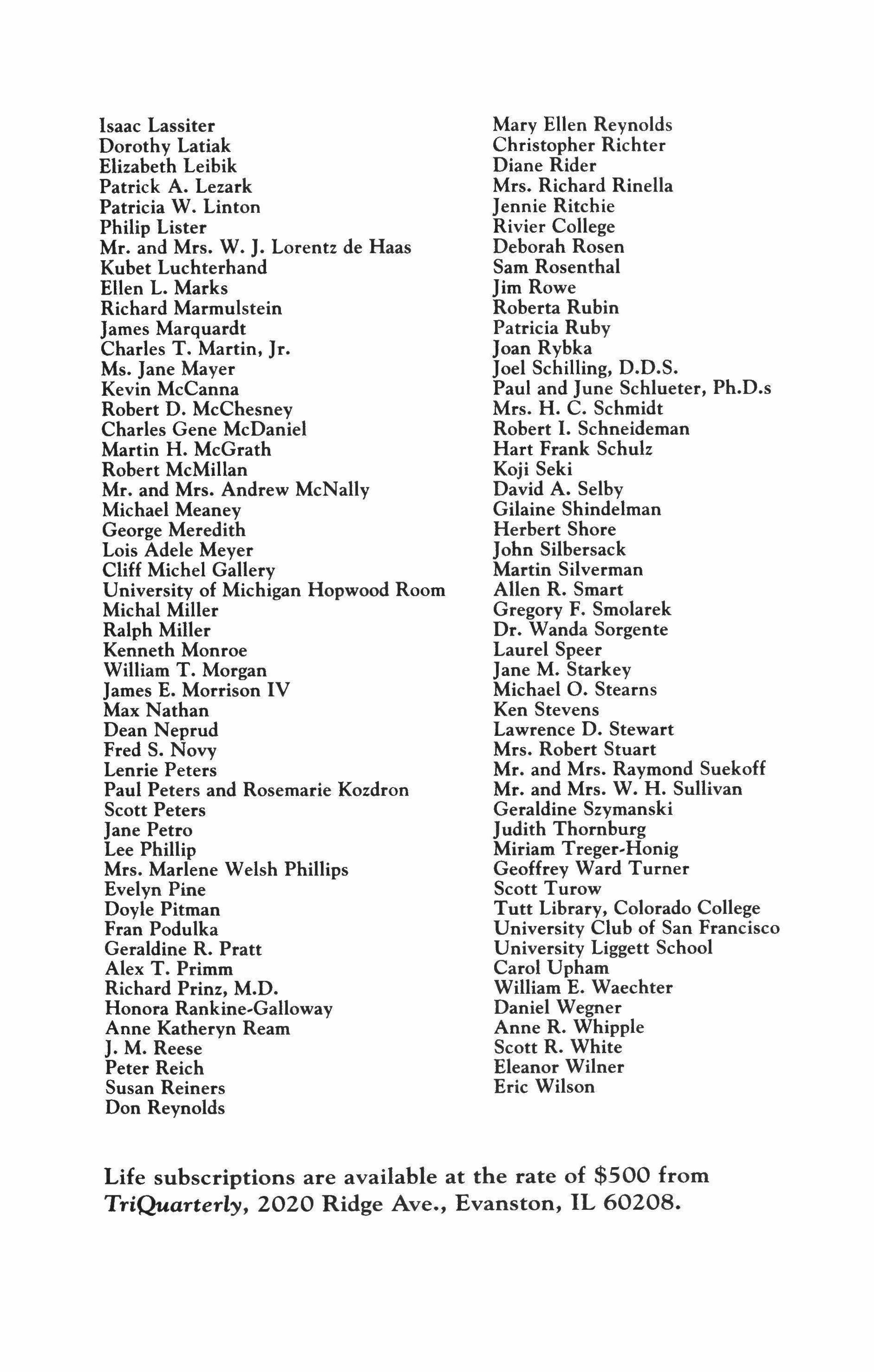
Mary Ellen Reynolds
Christopher Richter
Diane Rider
Mrs. Richard Rinella
Jennie Ritchie Rivier College
Deborah Rosen
Sam Rosenthal
Jim Rowe
Roberta Rubin
Patricia Ruby
Joan Rybka
Joel Schilling, D.D.S.
Paul and June Schlueter, Ph.D.s
Mrs. H. C. Schmidt
Robert I. Schneideman
Hart Frank Schulz
Koji Seki
David A. Selby
Gilaine Shindelman
Herbert Shore
John Silbersack
Martin Silverman
Allen R. Smart
Gregory F. Smolarek
Dr. Wanda Sorgente
Laurel Speer
Jane M. Starkey
Michael O. Stearns
Ken Stevens
Lawrence D. Stewart
Mrs. Robert Stuart
Mr. and Mrs. Raymond Suekoff
Mr. and Mrs. W. H. Sullivan
Geraldine Szymanski
Judith Thornburg
Miriam Treger-Honig
Geoffrey Ward Turner
Scott Turow
Tutt Library, Colorado College
University Club of San Francisco
University Liggett School
Carol Upham
William E. Waechter
Daniel Wegner
Anne R. Whipple
Scott R. White
Eleanor Wilner
Eric Wilson
Life subscriptions are available at the rate of $500 from TriQuarterly, 2020 Ridge Ave., Evanston, IL 60208.

••• •• •
MIN
MICHAEL KAPLAN
Foux
BROWNFIELD
H U R H. K URI L 0 F F
KATHERINE
DAVID
NELDA
PAUL
ART
SZYMBORSKA
KAY RYAN
BOWEN
WISIAWA
TASLIMA NASREEN
SHAVIT KEVIN
CRAMER
WOJAHN
FEITLOWITZ lRlQUARTERlY 44 o 74470 79069 3 $9.95
STEVEN
DAVID
MARGUERITE

















































































































































































 By Roder Fountain
By Roder Fountain








 Translated by Mohammad Nurul Hudii and Carolyne Wright with the author
Translated by Mohammad Nurul Hudii and Carolyne Wright with the author




















































































 Don DeLillo
Don DeLillo




